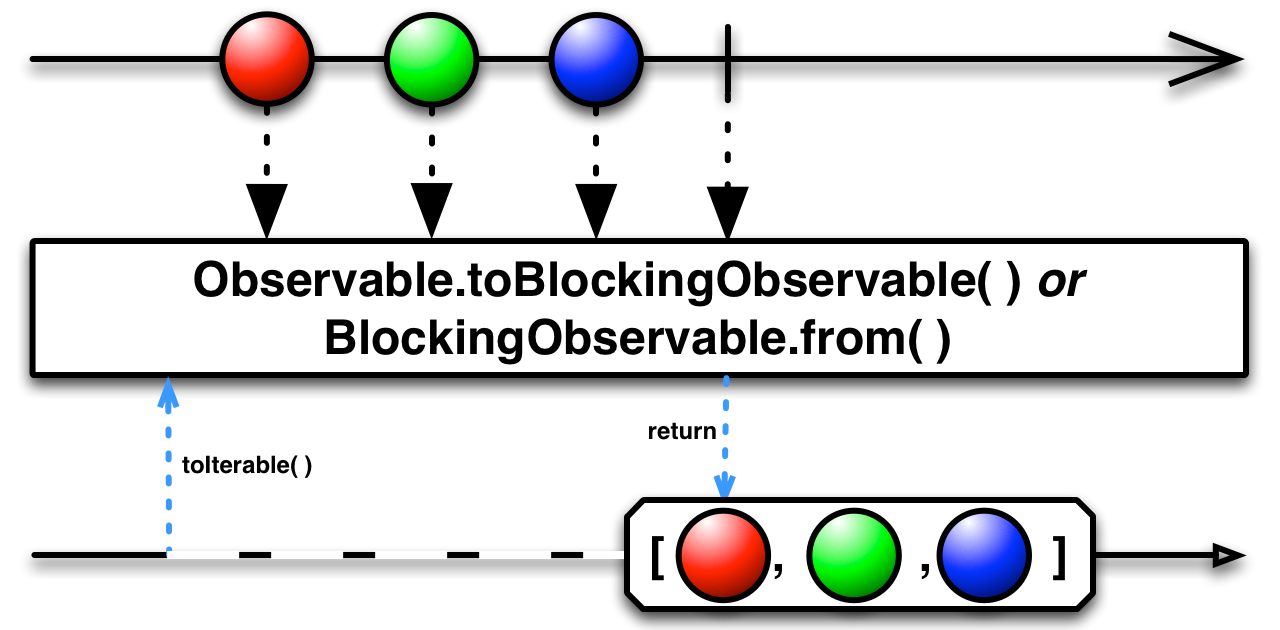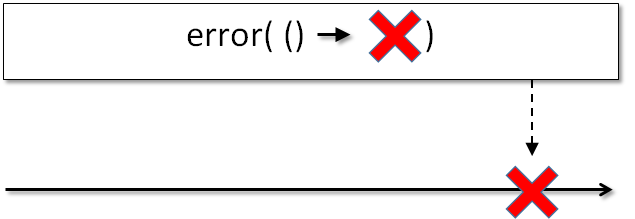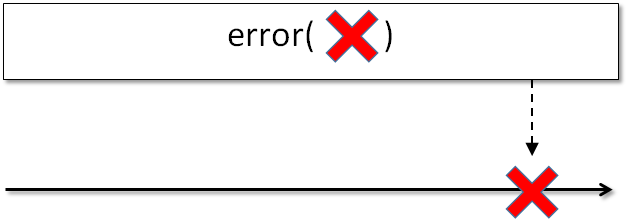| java.lang.Object | |
| ↳ | io.reactivex.Observable<T> |
 Known Direct Subclasses Known Direct Subclasses
|
 Known Indirect Subclasses Known Indirect Subclasses
|
Class Overview
The Observable class is the non-backpressured, optionally multi-valued base reactive class that offers factory methods, intermediate operators and the ability to consume synchronous and/or asynchronous reactive dataflows.
Many operators in the class accept ObservableSource(s), the base reactive interface
for such non-backpressured flows, which Observable itself implements as well.
The Observable's operators, by default, run with a buffer size of 128 elements (see bufferSize(),
that can be overridden globally via the system parameter rx2.buffer-size. Most operators, however, have
overloads that allow setting their internal buffer size explicitly.
The documentation for this class makes use of marble diagrams. The following legend explains these diagrams:

The design of this class was derived from the
Reactive-Streams design and specification
by removing any backpressure-related infrastructure and implementation detail, replacing the
org.reactivestreams.Subscription with Disposable as the primary means to cancel
a flow.
The Observable follows the protocol
onSubscribe onNext* (onError | onComplete)?
Disposable instance provided to consumers through
Observer.onSubscribe.
Unlike the Observable of version 1.x, subscribe(Observer) does not allow external cancellation
of a subscription and the Observer instance is expected to expose such capability.
Example:
Disposable d = Observable.just("Hello world!")
.delay(1, TimeUnit.SECONDS)
.subscribeWith(new DisposableObserver<String>() {
@Override public void onStart() {
System.out.println("Start!");
}
@Override public void onNext(Integer t) {
System.out.println(t);
}
@Override public void onError(Throwable t) {
t.printStackTrace();
}
@Override public void onComplete() {
System.out.println("Done!");
}
});
Thread.sleep(500);
// the sequence now can be cancelled via dispose()
d.dispose();
See Also
Summary
| Public Constructors | |||||||||||
|---|---|---|---|---|---|---|---|---|---|---|---|
| Observable() | |||||||||||
| Public Methods | |||||||||||
|---|---|---|---|---|---|---|---|---|---|---|---|
| final Single<Boolean> |
all(Predicate<? super T> predicate)
Returns an Observable that emits a Boolean that indicates whether all of the items emitted by the source
ObservableSource satisfy a condition.
| ||||||||||
| static <T> Observable<T> |
amb(Iterable<? extends ObservableSource<? extends T>> sources)
Mirrors the one ObservableSource in an Iterable of several ObservableSources that first either emits an item or sends
a termination notification.
| ||||||||||
| static <T> Observable<T> |
ambArray(ObservableSource...<? extends T> sources)
Mirrors the one ObservableSource in an array of several ObservableSources that first either emits an item or sends
a termination notification.
| ||||||||||
| final Observable<T> |
ambWith(ObservableSource<? extends T> other)
Mirrors the ObservableSource (current or provided) that first either emits an item or sends a termination
notification.
| ||||||||||
| final Single<Boolean> |
any(Predicate<? super T> predicate)
Returns an Observable that emits
true if any item emitted by the source ObservableSource satisfies a
specified condition, otherwise false. | ||||||||||
| final T |
blockingFirst(T defaultItem)
Returns the first item emitted by this
Observable, or a default value if it emits no
items. | ||||||||||
| final T |
blockingFirst()
Returns the first item emitted by this
Observable, or throws
NoSuchElementException if it emits no items. | ||||||||||
| final void |
blockingForEach(Consumer<? super T> onNext)
Invokes a method on each item emitted by this
Observable and blocks until the Observable
completes. | ||||||||||
| final Iterable<T> |
blockingIterable(int bufferSize)
Converts this
Observable into an Iterable. | ||||||||||
| final Iterable<T> |
blockingIterable()
Converts this
Observable into an Iterable. | ||||||||||
| final T |
blockingLast()
Returns the last item emitted by this
Observable, or throws
NoSuchElementException if this Observable emits no items. | ||||||||||
| final T |
blockingLast(T defaultItem)
Returns the last item emitted by this
Observable, or a default value if it emits no
items. | ||||||||||
| final Iterable<T> |
blockingLatest()
Returns an
Iterable that returns the latest item emitted by this Observable,
waiting if necessary for one to become available. | ||||||||||
| final Iterable<T> |
blockingMostRecent(T initialValue)
Returns an
Iterable that always returns the item most recently emitted by this
Observable. | ||||||||||
| final Iterable<T> |
blockingNext()
Returns an
Iterable that blocks until this Observable emits another item, then
returns that item. | ||||||||||
| final T |
blockingSingle(T defaultItem)
If this
Observable completes after emitting a single item, return that item; if it emits
more than one item, throw an IllegalArgumentException; if it emits no items, return a default
value. | ||||||||||
| final T |
blockingSingle()
If this
Observable completes after emitting a single item, return that item, otherwise
throw a NoSuchElementException. | ||||||||||
| final void |
blockingSubscribe(Consumer<? super T> onNext)
Subscribes to the source and calls the given callbacks on the current thread.
| ||||||||||
| final void |
blockingSubscribe(Observer<? super T> subscriber)
Subscribes to the source and calls the Observer methods on the current thread.
| ||||||||||
| final void |
blockingSubscribe(Consumer<? super T> onNext, Consumer<? super Throwable> onError)
Subscribes to the source and calls the given callbacks on the current thread.
| ||||||||||
| final void |
blockingSubscribe()
Runs the source observable to a terminal event, ignoring any values and rethrowing any exception.
| ||||||||||
| final void |
blockingSubscribe(Consumer<? super T> onNext, Consumer<? super Throwable> onError, Action onComplete)
Subscribes to the source and calls the given callbacks on the current thread.
| ||||||||||
| final <TOpening, TClosing> Observable<List<T>> |
buffer(ObservableSource<? extends TOpening> openingIndicator, Function<? super TOpening, ? extends ObservableSource<? extends TClosing>> closingIndicator)
Returns an Observable that emits buffers of items it collects from the source ObservableSource.
| ||||||||||
| final <TOpening, TClosing, U extends Collection<? super T>> Observable<U> |
buffer(ObservableSource<? extends TOpening> openingIndicator, Function<? super TOpening, ? extends ObservableSource<? extends TClosing>> closingIndicator, Callable<U> bufferSupplier)
Returns an Observable that emits buffers of items it collects from the source ObservableSource.
| ||||||||||
| final <U extends Collection<? super T>> Observable<U> |
buffer(long timespan, long timeskip, TimeUnit unit, Scheduler scheduler, Callable<U> bufferSupplier)
Returns an Observable that emits buffers of items it collects from the source ObservableSource.
| ||||||||||
| final Observable<List<T>> |
buffer(long timespan, long timeskip, TimeUnit unit, Scheduler scheduler)
Returns an Observable that emits buffers of items it collects from the source ObservableSource.
| ||||||||||
| final <U extends Collection<? super T>> Observable<U> |
buffer(int count, Callable<U> bufferSupplier)
Returns an Observable that emits buffers of items it collects from the source ObservableSource.
| ||||||||||
| final <B, U extends Collection<? super T>> Observable<U> |
buffer(Callable<? extends ObservableSource<B>> boundarySupplier, Callable<U> bufferSupplier)
Returns an Observable that emits buffers of items it collects from the source ObservableSource.
| ||||||||||
| final Observable<List<T>> |
buffer(long timespan, TimeUnit unit, Scheduler scheduler)
Returns an Observable that emits buffers of items it collects from the source ObservableSource.
| ||||||||||
| final <B> Observable<List<T>> |
buffer(ObservableSource<B> boundary, int initialCapacity)
Returns an Observable that emits non-overlapping buffered items from the source ObservableSource each time the
specified boundary ObservableSource emits an item.
| ||||||||||
| final Observable<List<T>> |
buffer(int count)
Returns an Observable that emits buffers of items it collects from the source ObservableSource.
| ||||||||||
| final <B> Observable<List<T>> |
buffer(Callable<? extends ObservableSource<B>> boundarySupplier)
Returns an Observable that emits buffers of items it collects from the source ObservableSource.
| ||||||||||
| final <B> Observable<List<T>> |
buffer(ObservableSource<B> boundary)
Returns an Observable that emits non-overlapping buffered items from the source ObservableSource each time the
specified boundary ObservableSource emits an item.
| ||||||||||
| final Observable<List<T>> |
buffer(long timespan, long timeskip, TimeUnit unit)
Returns an Observable that emits buffers of items it collects from the source ObservableSource.
| ||||||||||
| final Observable<List<T>> |
buffer(long timespan, TimeUnit unit, Scheduler scheduler, int count)
Returns an Observable that emits buffers of items it collects from the source ObservableSource.
| ||||||||||
| final Observable<List<T>> |
buffer(long timespan, TimeUnit unit)
Returns an Observable that emits buffers of items it collects from the source ObservableSource.
| ||||||||||
| final <U extends Collection<? super T>> Observable<U> |
buffer(long timespan, TimeUnit unit, Scheduler scheduler, int count, Callable<U> bufferSupplier, boolean restartTimerOnMaxSize)
Returns an Observable that emits buffers of items it collects from the source ObservableSource.
| ||||||||||
| final <B, U extends Collection<? super T>> Observable<U> |
buffer(ObservableSource<B> boundary, Callable<U> bufferSupplier)
Returns an Observable that emits non-overlapping buffered items from the source ObservableSource each time the
specified boundary ObservableSource emits an item.
| ||||||||||
| final Observable<List<T>> |
buffer(int count, int skip)
Returns an Observable that emits buffers of items it collects from the source ObservableSource.
| ||||||||||
| final Observable<List<T>> |
buffer(long timespan, TimeUnit unit, int count)
Returns an Observable that emits buffers of items it collects from the source ObservableSource.
| ||||||||||
| final <U extends Collection<? super T>> Observable<U> |
buffer(int count, int skip, Callable<U> bufferSupplier)
Returns an Observable that emits buffers of items it collects from the source ObservableSource.
| ||||||||||
| static int |
bufferSize()
Returns the default 'island' size or capacity-increment hint for unbounded buffers.
| ||||||||||
| final Observable<T> |
cache()
Returns an Observable that subscribes to this ObservableSource lazily, caches all of its events
and replays them, in the same order as received, to all the downstream subscribers.
| ||||||||||
| final Observable<T> |
cacheWithInitialCapacity(int initialCapacity)
Returns an Observable that subscribes to this ObservableSource lazily, caches all of its events
and replays them, in the same order as received, to all the downstream subscribers.
| ||||||||||
| final <U> Observable<U> |
cast(Class<U> clazz)
Returns an Observable that emits the items emitted by the source ObservableSource, converted to the specified
type.
| ||||||||||
| final <U> Single<U> |
collect(Callable<? extends U> initialValueSupplier, BiConsumer<? super U, ? super T> collector)
Collects items emitted by the source ObservableSource into a single mutable data structure and returns
a Single that emits this structure.
| ||||||||||
| final <U> Single<U> |
collectInto(U initialValue, BiConsumer<? super U, ? super T> collector)
Collects items emitted by the source ObservableSource into a single mutable data structure and returns
a Single that emits this structure.
| ||||||||||
| static <T1, T2, T3, R> Observable<R> |
combineLatest(ObservableSource<? extends T1> source1, ObservableSource<? extends T2> source2, ObservableSource<? extends T3> source3, Function3<? super T1, ? super T2, ? super T3, ? extends R> combiner)
Combines three source ObservableSources by emitting an item that aggregates the latest values of each of the
source ObservableSources each time an item is received from any of the source ObservableSources, where this
aggregation is defined by a specified function.
| ||||||||||
| static <T1, T2, T3, T4, T5, T6, T7, T8, R> Observable<R> |
combineLatest(ObservableSource<? extends T1> source1, ObservableSource<? extends T2> source2, ObservableSource<? extends T3> source3, ObservableSource<? extends T4> source4, ObservableSource<? extends T5> source5, ObservableSource<? extends T6> source6, ObservableSource<? extends T7> source7, ObservableSource<? extends T8> source8, Function8<? super T1, ? super T2, ? super T3, ? super T4, ? super T5, ? super T6, ? super T7, ? super T8, ? extends R> combiner)
Combines eight source ObservableSources by emitting an item that aggregates the latest values of each of the
source ObservableSources each time an item is received from any of the source ObservableSources, where this
aggregation is defined by a specified function.
| ||||||||||
| static <T, R> Observable<R> |
combineLatest(Iterable<? extends ObservableSource<? extends T>> sources, Function<? super Object[], ? extends R> combiner, int bufferSize)
Combines a collection of source ObservableSources by emitting an item that aggregates the latest values of each of
the source ObservableSources each time an item is received from any of the source ObservableSources, where this
aggregation is defined by a specified function.
| ||||||||||
| static <T, R> Observable<R> |
combineLatest(Iterable<? extends ObservableSource<? extends T>> sources, Function<? super Object[], ? extends R> combiner)
Combines a collection of source ObservableSources by emitting an item that aggregates the latest values of each of
the source ObservableSources each time an item is received from any of the source ObservableSources, where this
aggregation is defined by a specified function.
| ||||||||||
| static <T1, T2, T3, T4, T5, R> Observable<R> |
combineLatest(ObservableSource<? extends T1> source1, ObservableSource<? extends T2> source2, ObservableSource<? extends T3> source3, ObservableSource<? extends T4> source4, ObservableSource<? extends T5> source5, Function5<? super T1, ? super T2, ? super T3, ? super T4, ? super T5, ? extends R> combiner)
Combines five source ObservableSources by emitting an item that aggregates the latest values of each of the
source ObservableSources each time an item is received from any of the source ObservableSources, where this
aggregation is defined by a specified function.
| ||||||||||
| static <T1, T2, R> Observable<R> |
combineLatest(ObservableSource<? extends T1> source1, ObservableSource<? extends T2> source2, BiFunction<? super T1, ? super T2, ? extends R> combiner)
Combines two source ObservableSources by emitting an item that aggregates the latest values of each of the
source ObservableSources each time an item is received from either of the source ObservableSources, where this
aggregation is defined by a specified function.
| ||||||||||
| static <T1, T2, T3, T4, R> Observable<R> |
combineLatest(ObservableSource<? extends T1> source1, ObservableSource<? extends T2> source2, ObservableSource<? extends T3> source3, ObservableSource<? extends T4> source4, Function4<? super T1, ? super T2, ? super T3, ? super T4, ? extends R> combiner)
Combines four source ObservableSources by emitting an item that aggregates the latest values of each of the
source ObservableSources each time an item is received from any of the source ObservableSources, where this
aggregation is defined by a specified function.
| ||||||||||
| static <T, R> Observable<R> |
combineLatest(ObservableSource[]<? extends T> sources, Function<? super Object[], ? extends R> combiner)
Combines a collection of source ObservableSources by emitting an item that aggregates the latest values of each of
the source ObservableSources each time an item is received from any of the source ObservableSources, where this
aggregation is defined by a specified function.
| ||||||||||
| static <T1, T2, T3, T4, T5, T6, T7, R> Observable<R> |
combineLatest(ObservableSource<? extends T1> source1, ObservableSource<? extends T2> source2, ObservableSource<? extends T3> source3, ObservableSource<? extends T4> source4, ObservableSource<? extends T5> source5, ObservableSource<? extends T6> source6, ObservableSource<? extends T7> source7, Function7<? super T1, ? super T2, ? super T3, ? super T4, ? super T5, ? super T6, ? super T7, ? extends R> combiner)
Combines seven source ObservableSources by emitting an item that aggregates the latest values of each of the
source ObservableSources each time an item is received from any of the source ObservableSources, where this
aggregation is defined by a specified function.
| ||||||||||
| static <T, R> Observable<R> |
combineLatest(ObservableSource[]<? extends T> sources, Function<? super Object[], ? extends R> combiner, int bufferSize)
Combines a collection of source ObservableSources by emitting an item that aggregates the latest values of each of
the source ObservableSources each time an item is received from any of the source ObservableSources, where this
aggregation is defined by a specified function.
| ||||||||||
| static <T1, T2, T3, T4, T5, T6, R> Observable<R> |
combineLatest(ObservableSource<? extends T1> source1, ObservableSource<? extends T2> source2, ObservableSource<? extends T3> source3, ObservableSource<? extends T4> source4, ObservableSource<? extends T5> source5, ObservableSource<? extends T6> source6, Function6<? super T1, ? super T2, ? super T3, ? super T4, ? super T5, ? super T6, ? extends R> combiner)
Combines six source ObservableSources by emitting an item that aggregates the latest values of each of the
source ObservableSources each time an item is received from any of the source ObservableSources, where this
aggregation is defined by a specified function.
| ||||||||||
| static <T, R> Observable<R> |
combineLatest(Function<? super Object[], ? extends R> combiner, int bufferSize, ObservableSource...<? extends T> sources)
Combines a collection of source ObservableSources by emitting an item that aggregates the latest values of each of
the source ObservableSources each time an item is received from any of the source ObservableSources, where this
aggregation is defined by a specified function.
| ||||||||||
| static <T1, T2, T3, T4, T5, T6, T7, T8, T9, R> Observable<R> |
combineLatest(ObservableSource<? extends T1> source1, ObservableSource<? extends T2> source2, ObservableSource<? extends T3> source3, ObservableSource<? extends T4> source4, ObservableSource<? extends T5> source5, ObservableSource<? extends T6> source6, ObservableSource<? extends T7> source7, ObservableSource<? extends T8> source8, ObservableSource<? extends T9> source9, Function9<? super T1, ? super T2, ? super T3, ? super T4, ? super T5, ? super T6, ? super T7, ? super T8, ? super T9, ? extends R> combiner)
Combines nine source ObservableSources by emitting an item that aggregates the latest values of each of the
source ObservableSources each time an item is received from any of the source ObservableSources, where this
aggregation is defined by a specified function.
| ||||||||||
| static <T, R> Observable<R> |
combineLatestDelayError(Iterable<? extends ObservableSource<? extends T>> sources, Function<? super Object[], ? extends R> combiner, int bufferSize)
Combines a collection of source ObservableSources by emitting an item that aggregates the latest values of each of
the source ObservableSources each time an item is received from any of the source ObservableSources, where this
aggregation is defined by a specified function and delays any error from the sources until
all source ObservableSources terminate.
| ||||||||||
| static <T, R> Observable<R> |
combineLatestDelayError(Function<? super Object[], ? extends R> combiner, int bufferSize, ObservableSource...<? extends T> sources)
Combines a collection of source ObservableSources by emitting an item that aggregates the latest values of each of
the source ObservableSources each time an item is received from any of the source ObservableSources, where this
aggregation is defined by a specified function and delays any error from the sources until
all source ObservableSources terminate.
| ||||||||||
| static <T, R> Observable<R> |
combineLatestDelayError(Iterable<? extends ObservableSource<? extends T>> sources, Function<? super Object[], ? extends R> combiner)
Combines a collection of source ObservableSources by emitting an item that aggregates the latest values of each of
the source ObservableSources each time an item is received from any of the source ObservableSources, where this
aggregation is defined by a specified function and delays any error from the sources until
all source ObservableSources terminate.
| ||||||||||
| static <T, R> Observable<R> |
combineLatestDelayError(ObservableSource[]<? extends T> sources, Function<? super Object[], ? extends R> combiner, int bufferSize)
Combines a collection of source ObservableSources by emitting an item that aggregates the latest values of each of
the source ObservableSources each time an item is received from any of the source ObservableSources, where this
aggregation is defined by a specified function and delays any error from the sources until
all source ObservableSources terminate.
| ||||||||||
| static <T, R> Observable<R> |
combineLatestDelayError(ObservableSource[]<? extends T> sources, Function<? super Object[], ? extends R> combiner)
Combines a collection of source ObservableSources by emitting an item that aggregates the latest values of each of
the source ObservableSources each time an item is received from any of the source ObservableSources, where this
aggregation is defined by a specified function.
| ||||||||||
| final <R> Observable<R> |
compose(ObservableTransformer<? super T, ? extends R> composer)
Transform an ObservableSource by applying a particular Transformer function to it.
| ||||||||||
| static <T> Observable<T> |
concat(ObservableSource<? extends T> source1, ObservableSource<? extends T> source2, ObservableSource<? extends T> source3)
Returns an Observable that emits the items emitted by three ObservableSources, one after the other, without
interleaving them.
| ||||||||||
| static <T> Observable<T> |
concat(ObservableSource<? extends ObservableSource<? extends T>> sources, int prefetch)
Returns an Observable that emits the items emitted by each of the ObservableSources emitted by the source
ObservableSource, one after the other, without interleaving them.
| ||||||||||
| static <T> Observable<T> |
concat(ObservableSource<? extends ObservableSource<? extends T>> sources)
Returns an Observable that emits the items emitted by each of the ObservableSources emitted by the source
ObservableSource, one after the other, without interleaving them.
| ||||||||||
| static <T> Observable<T> |
concat(ObservableSource<? extends T> source1, ObservableSource<? extends T> source2)
Returns an Observable that emits the items emitted by two ObservableSources, one after the other, without
interleaving them.
| ||||||||||
| static <T> Observable<T> |
concat(Iterable<? extends ObservableSource<? extends T>> sources)
Concatenates elements of each ObservableSource provided via an Iterable sequence into a single sequence
of elements without interleaving them.
| ||||||||||
| static <T> Observable<T> |
concat(ObservableSource<? extends T> source1, ObservableSource<? extends T> source2, ObservableSource<? extends T> source3, ObservableSource<? extends T> source4)
Returns an Observable that emits the items emitted by four ObservableSources, one after the other, without
interleaving them.
| ||||||||||
| static <T> Observable<T> |
concatArray(ObservableSource...<? extends T> sources)
Concatenates a variable number of ObservableSource sources.
| ||||||||||
| static <T> Observable<T> |
concatArrayDelayError(ObservableSource...<? extends T> sources)
Concatenates a variable number of ObservableSource sources and delays errors from any of them
till all terminate.
| ||||||||||
| static <T> Observable<T> |
concatArrayEager(ObservableSource...<? extends T> sources)
Concatenates a sequence of ObservableSources eagerly into a single stream of values.
| ||||||||||
| static <T> Observable<T> |
concatArrayEager(int maxConcurrency, int prefetch, ObservableSource...<? extends T> sources)
Concatenates a sequence of ObservableSources eagerly into a single stream of values.
| ||||||||||
| static <T> Observable<T> |
concatDelayError(Iterable<? extends ObservableSource<? extends T>> sources)
Concatenates the Iterable sequence of ObservableSources into a single sequence by subscribing to each ObservableSource,
one after the other, one at a time and delays any errors till the all inner ObservableSources terminate.
| ||||||||||
| static <T> Observable<T> |
concatDelayError(ObservableSource<? extends ObservableSource<? extends T>> sources, int prefetch, boolean tillTheEnd)
Concatenates the ObservableSource sequence of ObservableSources into a single sequence by subscribing to each inner ObservableSource,
one after the other, one at a time and delays any errors till the all inner and the outer ObservableSources terminate.
| ||||||||||
| static <T> Observable<T> |
concatDelayError(ObservableSource<? extends ObservableSource<? extends T>> sources)
Concatenates the ObservableSource sequence of ObservableSources into a single sequence by subscribing to each inner ObservableSource,
one after the other, one at a time and delays any errors till the all inner and the outer ObservableSources terminate.
| ||||||||||
| static <T> Observable<T> |
concatEager(ObservableSource<? extends ObservableSource<? extends T>> sources, int maxConcurrency, int prefetch)
Concatenates an ObservableSource sequence of ObservableSources eagerly into a single stream of values.
| ||||||||||
| static <T> Observable<T> |
concatEager(Iterable<? extends ObservableSource<? extends T>> sources, int maxConcurrency, int prefetch)
Concatenates a sequence of ObservableSources eagerly into a single stream of values.
| ||||||||||
| static <T> Observable<T> |
concatEager(Iterable<? extends ObservableSource<? extends T>> sources)
Concatenates a sequence of ObservableSources eagerly into a single stream of values.
| ||||||||||
| static <T> Observable<T> |
concatEager(ObservableSource<? extends ObservableSource<? extends T>> sources)
Concatenates an ObservableSource sequence of ObservableSources eagerly into a single stream of values.
| ||||||||||
| final <R> Observable<R> |
concatMap(Function<? super T, ? extends ObservableSource<? extends R>> mapper, int prefetch)
Returns a new Observable that emits items resulting from applying a function that you supply to each item
emitted by the source ObservableSource, where that function returns an ObservableSource, and then emitting the items
that result from concatenating those resulting ObservableSources.
| ||||||||||
| final <R> Observable<R> |
concatMap(Function<? super T, ? extends ObservableSource<? extends R>> mapper)
Returns a new Observable that emits items resulting from applying a function that you supply to each item
emitted by the source ObservableSource, where that function returns an ObservableSource, and then emitting the items
that result from concatenating those resulting ObservableSources.
| ||||||||||
| final <R> Observable<R> |
concatMapDelayError(Function<? super T, ? extends ObservableSource<? extends R>> mapper)
Maps each of the items into an ObservableSource, subscribes to them one after the other,
one at a time and emits their values in order
while delaying any error from either this or any of the inner ObservableSources
till all of them terminate.
| ||||||||||
| final <R> Observable<R> |
concatMapDelayError(Function<? super T, ? extends ObservableSource<? extends R>> mapper, int prefetch, boolean tillTheEnd)
Maps each of the items into an ObservableSource, subscribes to them one after the other,
one at a time and emits their values in order
while delaying any error from either this or any of the inner ObservableSources
till all of them terminate.
| ||||||||||
| final <R> Observable<R> |
concatMapEager(Function<? super T, ? extends ObservableSource<? extends R>> mapper)
Maps a sequence of values into ObservableSources and concatenates these ObservableSources eagerly into a single
ObservableSource.
| ||||||||||
| final <R> Observable<R> |
concatMapEager(Function<? super T, ? extends ObservableSource<? extends R>> mapper, int maxConcurrency, int prefetch)
Maps a sequence of values into ObservableSources and concatenates these ObservableSources eagerly into a single
ObservableSource.
| ||||||||||
| final <R> Observable<R> |
concatMapEagerDelayError(Function<? super T, ? extends ObservableSource<? extends R>> mapper, boolean tillTheEnd)
Maps a sequence of values into ObservableSources and concatenates these ObservableSources eagerly into a single
ObservableSource.
| ||||||||||
| final <R> Observable<R> |
concatMapEagerDelayError(Function<? super T, ? extends ObservableSource<? extends R>> mapper, int maxConcurrency, int prefetch, boolean tillTheEnd)
Maps a sequence of values into ObservableSources and concatenates these ObservableSources eagerly into a single
ObservableSource.
| ||||||||||
| final <U> Observable<U> |
concatMapIterable(Function<? super T, ? extends Iterable<? extends U>> mapper)
Returns an Observable that concatenate each item emitted by the source ObservableSource with the values in an
Iterable corresponding to that item that is generated by a selector.
| ||||||||||
| final <U> Observable<U> |
concatMapIterable(Function<? super T, ? extends Iterable<? extends U>> mapper, int prefetch)
Returns an Observable that concatenate each item emitted by the source ObservableSource with the values in an
Iterable corresponding to that item that is generated by a selector.
| ||||||||||
| final Observable<T> |
concatWith(ObservableSource<? extends T> other)
Returns an Observable that emits the items emitted from the current ObservableSource, then the next, one after
the other, without interleaving them.
| ||||||||||
| final Single<Boolean> |
contains(Object element)
Returns an Observable that emits a Boolean that indicates whether the source ObservableSource emitted a
specified item.
| ||||||||||
| final Single<Long> |
count()
Returns a Single that counts the total number of items emitted by the source ObservableSource and emits
this count as a 64-bit Long.
| ||||||||||
| static <T> Observable<T> |
create(ObservableOnSubscribe<T> source)
Provides an API (via a cold Observable) that bridges the reactive world with the callback-style world.
| ||||||||||
| final Observable<T> |
debounce(long timeout, TimeUnit unit)
Returns an Observable that mirrors the source ObservableSource, except that it drops items emitted by the
source ObservableSource that are followed by newer items before a timeout value expires.
| ||||||||||
| final Observable<T> |
debounce(long timeout, TimeUnit unit, Scheduler scheduler)
Returns an Observable that mirrors the source ObservableSource, except that it drops items emitted by the
source ObservableSource that are followed by newer items before a timeout value expires on a specified
Scheduler.
| ||||||||||
| final <U> Observable<T> |
debounce(Function<? super T, ? extends ObservableSource<U>> debounceSelector)
Returns an Observable that mirrors the source ObservableSource, except that it drops items emitted by the
source ObservableSource that are followed by another item within a computed debounce duration.
| ||||||||||
| final Observable<T> |
defaultIfEmpty(T defaultItem)
Returns an Observable that emits the items emitted by the source ObservableSource or a specified default item
if the source ObservableSource is empty.
| ||||||||||
| static <T> Observable<T> |
defer(Callable<? extends ObservableSource<? extends T>> supplier)
Returns an Observable that calls an ObservableSource factory to create an ObservableSource for each new Observer
that subscribes.
| ||||||||||
| final Observable<T> |
delay(long delay, TimeUnit unit, boolean delayError)
Returns an Observable that emits the items emitted by the source ObservableSource shifted forward in time by a
specified delay.
| ||||||||||
| final Observable<T> |
delay(long delay, TimeUnit unit, Scheduler scheduler)
Returns an Observable that emits the items emitted by the source ObservableSource shifted forward in time by a
specified delay.
| ||||||||||
| final Observable<T> |
delay(long delay, TimeUnit unit, Scheduler scheduler, boolean delayError)
Returns an Observable that emits the items emitted by the source ObservableSource shifted forward in time by a
specified delay.
| ||||||||||
| final <U> Observable<T> |
delay(Function<? super T, ? extends ObservableSource<U>> itemDelay)
Returns an Observable that delays the emissions of the source ObservableSource via another ObservableSource on a
per-item basis.
| ||||||||||
| final <U, V> Observable<T> |
delay(ObservableSource<U> subscriptionDelay, Function<? super T, ? extends ObservableSource<V>> itemDelay)
Returns an Observable that delays the subscription to and emissions from the source ObservableSource via another
ObservableSource on a per-item basis.
| ||||||||||
| final Observable<T> |
delay(long delay, TimeUnit unit)
Returns an Observable that emits the items emitted by the source ObservableSource shifted forward in time by a
specified delay.
| ||||||||||
| final Observable<T> |
delaySubscription(long delay, TimeUnit unit, Scheduler scheduler)
Returns an Observable that delays the subscription to the source ObservableSource by a given amount of time,
both waiting and subscribing on a given Scheduler.
| ||||||||||
| final Observable<T> |
delaySubscription(long delay, TimeUnit unit)
Returns an Observable that delays the subscription to the source ObservableSource by a given amount of time.
| ||||||||||
| final <U> Observable<T> |
delaySubscription(ObservableSource<U> other)
Returns an Observable that delays the subscription to this Observable
until the other Observable emits an element or completes normally.
| ||||||||||
| final <T2> Observable<T2> |
dematerialize()
Returns an Observable that reverses the effect of
materialize by transforming the
Notification objects emitted by the source ObservableSource into the items or notifications they
represent. | ||||||||||
| final Observable<T> |
distinct()
Returns an Observable that emits all items emitted by the source ObservableSource that are distinct.
| ||||||||||
| final <K> Observable<T> |
distinct(Function<? super T, K> keySelector)
Returns an Observable that emits all items emitted by the source ObservableSource that are distinct according
to a key selector function.
| ||||||||||
| final <K> Observable<T> |
distinct(Function<? super T, K> keySelector, Callable<? extends Collection<? super K>> collectionSupplier)
Returns an Observable that emits all items emitted by the source ObservableSource that are distinct according
to a key selector function.
| ||||||||||
| final Observable<T> |
distinctUntilChanged(BiPredicate<? super T, ? super T> comparer)
Returns an Observable that emits all items emitted by the source ObservableSource that are distinct from their
immediate predecessors when compared with each other via the provided comparator function.
| ||||||||||
| final <K> Observable<T> |
distinctUntilChanged(Function<? super T, K> keySelector)
Returns an Observable that emits all items emitted by the source ObservableSource that are distinct from their
immediate predecessors, according to a key selector function.
| ||||||||||
| final Observable<T> |
distinctUntilChanged()
Returns an Observable that emits all items emitted by the source ObservableSource that are distinct from their
immediate predecessors.
| ||||||||||
| final Observable<T> |
doAfterNext(Consumer<? super T> onAfterNext)
Calls the specified consumer with the current item after this item has been emitted to the downstream.
| ||||||||||
| final Observable<T> | doAfterTerminate(Action onFinally) | ||||||||||
| final Observable<T> |
doFinally(Action onFinally)
Calls the specified action after this Observable signals onError or onCompleted or gets disposed by
the downstream.
| ||||||||||
| final Observable<T> |
doOnComplete(Action onComplete)
Modifies the source ObservableSource so that it invokes an action when it calls
onComplete. | ||||||||||
| final Observable<T> |
doOnDispose(Action onDispose)
Calls the dispose
Action if the downstream disposes the sequence. | ||||||||||
| final Observable<T> |
doOnEach(Observer<? super T> observer)
Modifies the source ObservableSource so that it notifies an Observer for each item and terminal event it emits.
| ||||||||||
| final Observable<T> |
doOnEach(Consumer<? super Notification<T>> onNotification)
Modifies the source ObservableSource so that it invokes an action for each item it emits.
| ||||||||||
| final Observable<T> |
doOnError(Consumer<? super Throwable> onError)
Modifies the source ObservableSource so that it invokes an action if it calls
onError. | ||||||||||
| final Observable<T> |
doOnLifecycle(Consumer<? super Disposable> onSubscribe, Action onDispose)
Calls the appropriate onXXX method (shared between all Observer) for the lifecycle events of
the sequence (subscription, cancellation, requesting).
| ||||||||||
| final Observable<T> |
doOnNext(Consumer<? super T> onNext)
Modifies the source ObservableSource so that it invokes an action when it calls
onNext. | ||||||||||
| final Observable<T> |
doOnSubscribe(Consumer<? super Disposable> onSubscribe)
Modifies the source
ObservableSource so that it invokes the given action when it is subscribed from
its subscribers. | ||||||||||
| final Observable<T> |
doOnTerminate(Action onTerminate)
Modifies the source ObservableSource so that it invokes an action when it calls
onComplete or
onError. | ||||||||||
| final Single<T> |
elementAt(long index, T defaultItem)
Returns a Single that emits the item found at a specified index in a sequence of emissions from
this Observable, or a default item if that index is out of range.
| ||||||||||
| final Maybe<T> |
elementAt(long index)
Returns a Maybe that emits the single item at a specified index in a sequence of emissions from
this Observable or completes if this Observable signals fewer elements than index.
| ||||||||||
| final Single<T> |
elementAtOrError(long index)
Returns a Single that emits the item found at a specified index in a sequence of emissions from this Observable
or signals a
NoSuchElementException if this Observable signals fewer elements than index. | ||||||||||
| static <T> Observable<T> |
empty()
Returns an Observable that emits no items to the
Observer and immediately invokes its
onComplete method. | ||||||||||
| static <T> Observable<T> | error(Callable<? extends Throwable> errorSupplier) | ||||||||||
| static <T> Observable<T> | error(Throwable exception) | ||||||||||
| final Observable<T> |
filter(Predicate<? super T> predicate)
Filters items emitted by an ObservableSource by only emitting those that satisfy a specified predicate.
| ||||||||||
| final Single<T> |
first(T defaultItem)
Returns a Single that emits only the very first item emitted by the source ObservableSource, or a default item
if the source ObservableSource completes without emitting any items.
| ||||||||||
| final Maybe<T> |
firstElement()
Returns a Maybe that emits only the very first item emitted by the source ObservableSource, or
completes if the source ObservableSource is empty.
| ||||||||||
| final Single<T> |
firstOrError()
Returns a Single that emits only the very first item emitted by this Observable or
signals a
NoSuchElementException if this Observable is empty. | ||||||||||
| final <U, R> Observable<R> |
flatMap(Function<? super T, ? extends ObservableSource<? extends U>> mapper, BiFunction<? super T, ? super U, ? extends R> combiner, boolean delayErrors, int maxConcurrency, int bufferSize)
Returns an Observable that emits the results of a specified function to the pair of values emitted by the
source ObservableSource and a specified collection ObservableSource, while limiting the maximum number of concurrent
subscriptions to these ObservableSources.
| ||||||||||
| final <R> Observable<R> |
flatMap(Function<? super T, ? extends ObservableSource<? extends R>> mapper)
Returns an Observable that emits items based on applying a function that you supply to each item emitted
by the source ObservableSource, where that function returns an ObservableSource, and then merging those resulting
ObservableSources and emitting the results of this merger.
| ||||||||||
| final <R> Observable<R> |
flatMap(Function<? super T, ? extends ObservableSource<? extends R>> onNextMapper, Function<Throwable, ? extends ObservableSource<? extends R>> onErrorMapper, Callable<? extends ObservableSource<? extends R>> onCompleteSupplier, int maxConcurrency)
Returns an Observable that applies a function to each item emitted or notification raised by the source
ObservableSource and then flattens the ObservableSources returned from these functions and emits the resulting items,
while limiting the maximum number of concurrent subscriptions to these ObservableSources.
| ||||||||||
| final <U, R> Observable<R> |
flatMap(Function<? super T, ? extends ObservableSource<? extends U>> mapper, BiFunction<? super T, ? super U, ? extends R> combiner, int maxConcurrency)
Returns an Observable that emits the results of a specified function to the pair of values emitted by the
source ObservableSource and a specified collection ObservableSource, while limiting the maximum number of concurrent
subscriptions to these ObservableSources.
| ||||||||||
| final <R> Observable<R> |
flatMap(Function<? super T, ? extends ObservableSource<? extends R>> mapper, boolean delayErrors)
Returns an Observable that emits items based on applying a function that you supply to each item emitted
by the source ObservableSource, where that function returns an ObservableSource, and then merging those resulting
ObservableSources and emitting the results of this merger.
| ||||||||||
| final <U, R> Observable<R> |
flatMap(Function<? super T, ? extends ObservableSource<? extends U>> mapper, BiFunction<? super T, ? super U, ? extends R> combiner, boolean delayErrors)
Returns an Observable that emits the results of a specified function to the pair of values emitted by the
source ObservableSource and a specified collection ObservableSource.
| ||||||||||
| final <R> Observable<R> |
flatMap(Function<? super T, ? extends ObservableSource<? extends R>> onNextMapper, Function<? super Throwable, ? extends ObservableSource<? extends R>> onErrorMapper, Callable<? extends ObservableSource<? extends R>> onCompleteSupplier)
Returns an Observable that applies a function to each item emitted or notification raised by the source
ObservableSource and then flattens the ObservableSources returned from these functions and emits the resulting items.
| ||||||||||
| final <U, R> Observable<R> |
flatMap(Function<? super T, ? extends ObservableSource<? extends U>> mapper, BiFunction<? super T, ? super U, ? extends R> combiner, boolean delayErrors, int maxConcurrency)
Returns an Observable that emits the results of a specified function to the pair of values emitted by the
source ObservableSource and a specified collection ObservableSource, while limiting the maximum number of concurrent
subscriptions to these ObservableSources.
| ||||||||||
| final <R> Observable<R> |
flatMap(Function<? super T, ? extends ObservableSource<? extends R>> mapper, boolean delayErrors, int maxConcurrency, int bufferSize)
Returns an Observable that emits items based on applying a function that you supply to each item emitted
by the source ObservableSource, where that function returns an ObservableSource, and then merging those resulting
ObservableSources and emitting the results of this merger, while limiting the maximum number of concurrent
subscriptions to these ObservableSources.
| ||||||||||
| final <R> Observable<R> |
flatMap(Function<? super T, ? extends ObservableSource<? extends R>> mapper, boolean delayErrors, int maxConcurrency)
Returns an Observable that emits items based on applying a function that you supply to each item emitted
by the source ObservableSource, where that function returns an ObservableSource, and then merging those resulting
ObservableSources and emitting the results of this merger, while limiting the maximum number of concurrent
subscriptions to these ObservableSources.
| ||||||||||
| final <R> Observable<R> |
flatMap(Function<? super T, ? extends ObservableSource<? extends R>> mapper, int maxConcurrency)
Returns an Observable that emits items based on applying a function that you supply to each item emitted
by the source ObservableSource, where that function returns an ObservableSource, and then merging those resulting
ObservableSources and emitting the results of this merger, while limiting the maximum number of concurrent
subscriptions to these ObservableSources.
| ||||||||||
| final <U, R> Observable<R> |
flatMap(Function<? super T, ? extends ObservableSource<? extends U>> mapper, BiFunction<? super T, ? super U, ? extends R> resultSelector)
Returns an Observable that emits the results of a specified function to the pair of values emitted by the
source ObservableSource and a specified collection ObservableSource.
| ||||||||||
| final Completable |
flatMapCompletable(Function<? super T, ? extends CompletableSource> mapper, boolean delayErrors)
Maps each element of the upstream Observable into CompletableSources, subscribes to them and
waits until the upstream and all CompletableSources complete, optionally delaying all errors.
| ||||||||||
| final Completable |
flatMapCompletable(Function<? super T, ? extends CompletableSource> mapper)
Maps each element of the upstream Observable into CompletableSources, subscribes to them and
waits until the upstream and all CompletableSources complete.
| ||||||||||
| final <U, V> Observable<V> |
flatMapIterable(Function<? super T, ? extends Iterable<? extends U>> mapper, BiFunction<? super T, ? super U, ? extends V> resultSelector)
Returns an Observable that emits the results of applying a function to the pair of values from the source
ObservableSource and an Iterable corresponding to that item that is generated by a selector.
| ||||||||||
| final <U> Observable<U> |
flatMapIterable(Function<? super T, ? extends Iterable<? extends U>> mapper)
Returns an Observable that merges each item emitted by the source ObservableSource with the values in an
Iterable corresponding to that item that is generated by a selector.
| ||||||||||
| final <R> Observable<R> |
flatMapMaybe(Function<? super T, ? extends MaybeSource<? extends R>> mapper, boolean delayErrors)
Maps each element of the upstream Observable into MaybeSources, subscribes to them and
waits until the upstream and all MaybeSources complete, optionally delaying all errors.
| ||||||||||
| final <R> Observable<R> |
flatMapMaybe(Function<? super T, ? extends MaybeSource<? extends R>> mapper)
Maps each element of the upstream Observable into MaybeSources, subscribes to them and
waits until the upstream and all MaybeSources complete.
| ||||||||||
| final <R> Observable<R> |
flatMapSingle(Function<? super T, ? extends SingleSource<? extends R>> mapper)
Maps each element of the upstream Observable into SingleSources, subscribes to them and
waits until the upstream and all SingleSources complete.
| ||||||||||
| final <R> Observable<R> |
flatMapSingle(Function<? super T, ? extends SingleSource<? extends R>> mapper, boolean delayErrors)
Maps each element of the upstream Observable into SingleSources, subscribes to them and
waits until the upstream and all SingleSources complete, optionally delaying all errors.
| ||||||||||
| final Disposable |
forEach(Consumer<? super T> onNext)
Subscribes to the
ObservableSource and receives notifications for each element. | ||||||||||
| final Disposable |
forEachWhile(Predicate<? super T> onNext, Consumer<? super Throwable> onError, Action onComplete)
Subscribes to the
ObservableSource and receives notifications for each element and the terminal events until the
onNext Predicate returns false. | ||||||||||
| final Disposable |
forEachWhile(Predicate<? super T> onNext, Consumer<? super Throwable> onError)
Subscribes to the
ObservableSource and receives notifications for each element and error events until the
onNext Predicate returns false. | ||||||||||
| final Disposable |
forEachWhile(Predicate<? super T> onNext)
Subscribes to the
ObservableSource and receives notifications for each element until the
onNext Predicate returns false. | ||||||||||
| static <T> Observable<T> |
fromArray(T... items)
Converts an Array into an ObservableSource that emits the items in the Array.
| ||||||||||
| static <T> Observable<T> |
fromCallable(Callable<? extends T> supplier)
Returns an Observable that, when an observer subscribes to it, invokes a function you specify and then
emits the value returned from that function.
| ||||||||||
| static <T> Observable<T> | fromFuture(Future<? extends T> future, Scheduler scheduler) | ||||||||||
| static <T> Observable<T> |
fromFuture(Future<? extends T> future, long timeout, TimeUnit unit, Scheduler scheduler)
Converts a
Future into an ObservableSource, with a timeout on the Future. | ||||||||||
| static <T> Observable<T> |
fromFuture(Future<? extends T> future, long timeout, TimeUnit unit)
Converts a
Future into an ObservableSource, with a timeout on the Future. | ||||||||||
| static <T> Observable<T> |
fromFuture(Future<? extends T> future)
Converts a
Future into an ObservableSource. | ||||||||||
| static <T> Observable<T> |
fromIterable(Iterable<? extends T> source)
Converts an
Iterable sequence into an ObservableSource that emits the items in the sequence. | ||||||||||
| static <T> Observable<T> |
fromPublisher(Publisher<? extends T> publisher)
Converts an arbitrary Reactive-Streams Publisher into an Observable.
| ||||||||||
| static <T, S> Observable<T> |
generate(Callable<S> initialState, BiFunction<S, Emitter<T>, S> generator, Consumer<? super S> disposeState)
Returns a cold, synchronous and stateful generator of values.
| ||||||||||
| static <T, S> Observable<T> |
generate(Callable<S> initialState, BiFunction<S, Emitter<T>, S> generator)
Returns a cold, synchronous and stateful generator of values.
| ||||||||||
| static <T, S> Observable<T> |
generate(Callable<S> initialState, BiConsumer<S, Emitter<T>> generator)
Returns a cold, synchronous and stateful generator of values.
| ||||||||||
| static <T, S> Observable<T> |
generate(Callable<S> initialState, BiConsumer<S, Emitter<T>> generator, Consumer<? super S> disposeState)
Returns a cold, synchronous and stateful generator of values.
| ||||||||||
| static <T> Observable<T> |
generate(Consumer<Emitter<T>> generator)
Returns a cold, synchronous and stateless generator of values.
| ||||||||||
| final <K> Observable<GroupedObservable<K, T>> |
groupBy(Function<? super T, ? extends K> keySelector, boolean delayError)
Groups the items emitted by an
ObservableSource according to a specified criterion, and emits these
grouped items as GroupedObservables. | ||||||||||
| final <K> Observable<GroupedObservable<K, T>> |
groupBy(Function<? super T, ? extends K> keySelector)
Groups the items emitted by an
ObservableSource according to a specified criterion, and emits these
grouped items as GroupedObservables. | ||||||||||
| final <K, V> Observable<GroupedObservable<K, V>> |
groupBy(Function<? super T, ? extends K> keySelector, Function<? super T, ? extends V> valueSelector)
Groups the items emitted by an
ObservableSource according to a specified criterion, and emits these
grouped items as GroupedObservables. | ||||||||||
| final <K, V> Observable<GroupedObservable<K, V>> |
groupBy(Function<? super T, ? extends K> keySelector, Function<? super T, ? extends V> valueSelector, boolean delayError)
Groups the items emitted by an
ObservableSource according to a specified criterion, and emits these
grouped items as GroupedObservables. | ||||||||||
| final <K, V> Observable<GroupedObservable<K, V>> |
groupBy(Function<? super T, ? extends K> keySelector, Function<? super T, ? extends V> valueSelector, boolean delayError, int bufferSize)
Groups the items emitted by an
ObservableSource according to a specified criterion, and emits these
grouped items as GroupedObservables. | ||||||||||
| final <TRight, TLeftEnd, TRightEnd, R> Observable<R> |
groupJoin(ObservableSource<? extends TRight> other, Function<? super T, ? extends ObservableSource<TLeftEnd>> leftEnd, Function<? super TRight, ? extends ObservableSource<TRightEnd>> rightEnd, BiFunction<? super T, ? super Observable<TRight>, ? extends R> resultSelector)
Returns an Observable that correlates two ObservableSources when they overlap in time and groups the results.
| ||||||||||
| final Observable<T> |
hide()
Hides the identity of this Observable and its Disposable.
| ||||||||||
| final Completable |
ignoreElements()
Ignores all items emitted by the source ObservableSource and only calls
onComplete or onError. | ||||||||||
| static Observable<Long> |
interval(long period, TimeUnit unit, Scheduler scheduler)
Returns an Observable that emits a sequential number every specified interval of time, on a
specified Scheduler.
| ||||||||||
| static Observable<Long> |
interval(long period, TimeUnit unit)
Returns an Observable that emits a sequential number every specified interval of time.
| ||||||||||
| static Observable<Long> |
interval(long initialDelay, long period, TimeUnit unit, Scheduler scheduler)
Returns an Observable that emits a
0L after the initialDelay and ever increasing numbers
after each period of time thereafter, on a specified Scheduler. | ||||||||||
| static Observable<Long> |
interval(long initialDelay, long period, TimeUnit unit)
Returns an Observable that emits a
0L after the initialDelay and ever increasing numbers
after each period of time thereafter. | ||||||||||
| static Observable<Long> |
intervalRange(long start, long count, long initialDelay, long period, TimeUnit unit, Scheduler scheduler)
Signals a range of long values, the first after some initial delay and the rest periodically after.
| ||||||||||
| static Observable<Long> |
intervalRange(long start, long count, long initialDelay, long period, TimeUnit unit)
Signals a range of long values, the first after some initial delay and the rest periodically after.
| ||||||||||
| final Single<Boolean> |
isEmpty()
Returns an Observable that emits
true if the source ObservableSource is empty, otherwise false. | ||||||||||
| final <TRight, TLeftEnd, TRightEnd, R> Observable<R> |
join(ObservableSource<? extends TRight> other, Function<? super T, ? extends ObservableSource<TLeftEnd>> leftEnd, Function<? super TRight, ? extends ObservableSource<TRightEnd>> rightEnd, BiFunction<? super T, ? super TRight, ? extends R> resultSelector)
Correlates the items emitted by two ObservableSources based on overlapping durations.
| ||||||||||
| static <T> Observable<T> |
just(T item1, T item2, T item3, T item4, T item5, T item6)
Converts six items into an ObservableSource that emits those items.
| ||||||||||
| static <T> Observable<T> |
just(T item1, T item2)
Converts two items into an ObservableSource that emits those items.
| ||||||||||
| static <T> Observable<T> |
just(T item1, T item2, T item3, T item4)
Converts four items into an ObservableSource that emits those items.
| ||||||||||
| static <T> Observable<T> |
just(T item)
Returns an Observable that emits a single item and then completes.
| ||||||||||
| static <T> Observable<T> |
just(T item1, T item2, T item3, T item4, T item5)
Converts five items into an ObservableSource that emits those items.
| ||||||||||
| static <T> Observable<T> |
just(T item1, T item2, T item3, T item4, T item5, T item6, T item7)
Converts seven items into an ObservableSource that emits those items.
| ||||||||||
| static <T> Observable<T> |
just(T item1, T item2, T item3, T item4, T item5, T item6, T item7, T item8)
Converts eight items into an ObservableSource that emits those items.
| ||||||||||
| static <T> Observable<T> |
just(T item1, T item2, T item3, T item4, T item5, T item6, T item7, T item8, T item9)
Converts nine items into an ObservableSource that emits those items.
| ||||||||||
| static <T> Observable<T> |
just(T item1, T item2, T item3, T item4, T item5, T item6, T item7, T item8, T item9, T item10)
Converts ten items into an ObservableSource that emits those items.
| ||||||||||
| static <T> Observable<T> |
just(T item1, T item2, T item3)
Converts three items into an ObservableSource that emits those items.
| ||||||||||
| final Single<T> |
last(T defaultItem)
Returns a Single that emits only the last item emitted by this Observable, or a default item
if this Observable completes without emitting any items.
| ||||||||||
| final Maybe<T> |
lastElement()
Returns a Maybe that emits the last item emitted by this Observable or
completes if this Observable is empty.
| ||||||||||
| final Single<T> |
lastOrError()
Returns a Single that emits only the last item emitted by this Observable or
signals a
NoSuchElementException if this Observable is empty. | ||||||||||
| final <R> Observable<R> |
lift(ObservableOperator<? extends R, ? super T> lifter)
This method requires advanced knowledge about building operators; please consider
other standard composition methods first;
Lifts a function to the current ObservableSource and returns a new ObservableSource that when subscribed to will pass
the values of the current ObservableSource through the Operator function.
| ||||||||||
| final <R> Observable<R> |
map(Function<? super T, ? extends R> mapper)
Returns an Observable that applies a specified function to each item emitted by the source ObservableSource and
emits the results of these function applications.
| ||||||||||
| final Observable<Notification<T>> |
materialize()
Returns an Observable that represents all of the emissions and notifications from the source
ObservableSource into emissions marked with their original types within
Notification objects. | ||||||||||
| static <T> Observable<T> |
merge(Iterable<? extends ObservableSource<? extends T>> sources)
Flattens an Iterable of ObservableSources into one ObservableSource, without any transformation.
| ||||||||||
| static <T> Observable<T> |
merge(ObservableSource<? extends ObservableSource<? extends T>> sources)
Flattens an ObservableSource that emits ObservableSources into a single ObservableSource that emits the items emitted by
those ObservableSources, without any transformation.
| ||||||||||
| static <T> Observable<T> |
merge(ObservableSource<? extends T> source1, ObservableSource<? extends T> source2)
Flattens two ObservableSources into a single ObservableSource, without any transformation.
| ||||||||||
| static <T> Observable<T> |
merge(Iterable<? extends ObservableSource<? extends T>> sources, int maxConcurrency, int bufferSize)
Flattens an Iterable of ObservableSources into one ObservableSource, without any transformation, while limiting the
number of concurrent subscriptions to these ObservableSources.
| ||||||||||
| static <T> Observable<T> |
merge(Iterable<? extends ObservableSource<? extends T>> sources, int maxConcurrency)
Flattens an Iterable of ObservableSources into one ObservableSource, without any transformation, while limiting the
number of concurrent subscriptions to these ObservableSources.
| ||||||||||
| static <T> Observable<T> |
merge(ObservableSource<? extends T> source1, ObservableSource<? extends T> source2, ObservableSource<? extends T> source3)
Flattens three ObservableSources into a single ObservableSource, without any transformation.
| ||||||||||
| static <T> Observable<T> |
merge(ObservableSource<? extends ObservableSource<? extends T>> sources, int maxConcurrency)
Flattens an ObservableSource that emits ObservableSources into a single ObservableSource that emits the items emitted by
those ObservableSources, without any transformation, while limiting the maximum number of concurrent
subscriptions to these ObservableSources.
| ||||||||||
| static <T> Observable<T> |
merge(ObservableSource<? extends T> source1, ObservableSource<? extends T> source2, ObservableSource<? extends T> source3, ObservableSource<? extends T> source4)
Flattens four ObservableSources into a single ObservableSource, without any transformation.
| ||||||||||
| static <T> Observable<T> |
mergeArray(int maxConcurrency, int bufferSize, ObservableSource...<? extends T> sources)
Flattens an Iterable of ObservableSources into one ObservableSource, without any transformation, while limiting the
number of concurrent subscriptions to these ObservableSources.
| ||||||||||
| static <T> Observable<T> |
mergeArray(ObservableSource...<? extends T> sources)
Flattens an Array of ObservableSources into one ObservableSource, without any transformation.
| ||||||||||
| static <T> Observable<T> |
mergeArrayDelayError(ObservableSource...<? extends T> sources)
Flattens an Iterable of ObservableSources into one ObservableSource, in a way that allows an Observer to receive all
successfully emitted items from each of the source ObservableSources without being interrupted by an error
notification from one of them.
| ||||||||||
| static <T> Observable<T> |
mergeArrayDelayError(int maxConcurrency, int bufferSize, ObservableSource...<? extends T> sources)
Flattens an array of ObservableSources into one ObservableSource, in a way that allows an Observer to receive all
successfully emitted items from each of the source ObservableSources without being interrupted by an error
notification from one of them, while limiting the number of concurrent subscriptions to these ObservableSources.
| ||||||||||
| static <T> Observable<T> |
mergeDelayError(ObservableSource<? extends T> source1, ObservableSource<? extends T> source2, ObservableSource<? extends T> source3, ObservableSource<? extends T> source4)
Flattens four ObservableSources into one ObservableSource, in a way that allows an Observer to receive all
successfully emitted items from all of the source ObservableSources without being interrupted by an error
notification from one of them.
| ||||||||||
| static <T> Observable<T> |
mergeDelayError(Iterable<? extends ObservableSource<? extends T>> sources)
Flattens an Iterable of ObservableSources into one ObservableSource, in a way that allows an Observer to receive all
successfully emitted items from each of the source ObservableSources without being interrupted by an error
notification from one of them.
| ||||||||||
| static <T> Observable<T> |
mergeDelayError(ObservableSource<? extends T> source1, ObservableSource<? extends T> source2)
Flattens two ObservableSources into one ObservableSource, in a way that allows an Observer to receive all
successfully emitted items from each of the source ObservableSources without being interrupted by an error
notification from one of them.
| ||||||||||
| static <T> Observable<T> |
mergeDelayError(ObservableSource<? extends T> source1, ObservableSource<? extends T> source2, ObservableSource<? extends T> source3)
Flattens three ObservableSources into one ObservableSource, in a way that allows an Observer to receive all
successfully emitted items from all of the source ObservableSources without being interrupted by an error
notification from one of them.
| ||||||||||
| static <T> Observable<T> |
mergeDelayError(ObservableSource<? extends ObservableSource<? extends T>> sources)
Flattens an ObservableSource that emits ObservableSources into one ObservableSource, in a way that allows an Observer to
receive all successfully emitted items from all of the source ObservableSources without being interrupted by
an error notification from one of them.
| ||||||||||
| static <T> Observable<T> |
mergeDelayError(Iterable<? extends ObservableSource<? extends T>> sources, int maxConcurrency, int bufferSize)
Flattens an Iterable of ObservableSources into one ObservableSource, in a way that allows an Observer to receive all
successfully emitted items from each of the source ObservableSources without being interrupted by an error
notification from one of them, while limiting the number of concurrent subscriptions to these ObservableSources.
| ||||||||||
| static <T> Observable<T> |
mergeDelayError(Iterable<? extends ObservableSource<? extends T>> sources, int maxConcurrency)
Flattens an Iterable of ObservableSources into one ObservableSource, in a way that allows an Observer to receive all
successfully emitted items from each of the source ObservableSources without being interrupted by an error
notification from one of them, while limiting the number of concurrent subscriptions to these ObservableSources.
| ||||||||||
| static <T> Observable<T> |
mergeDelayError(ObservableSource<? extends ObservableSource<? extends T>> sources, int maxConcurrency)
Flattens an ObservableSource that emits ObservableSources into one ObservableSource, in a way that allows an Observer to
receive all successfully emitted items from all of the source ObservableSources without being interrupted by
an error notification from one of them, while limiting the
number of concurrent subscriptions to these ObservableSources.
| ||||||||||
| final Observable<T> |
mergeWith(ObservableSource<? extends T> other)
Flattens this and another ObservableSource into a single ObservableSource, without any transformation.
| ||||||||||
| static <T> Observable<T> |
never()
Returns an Observable that never sends any items or notifications to an
Observer. | ||||||||||
| final Observable<T> |
observeOn(Scheduler scheduler, boolean delayError)
Modifies an ObservableSource to perform its emissions and notifications on a specified
Scheduler,
asynchronously with an unbounded buffer with bufferSize() "island size" and optionally delays onError notifications. | ||||||||||
| final Observable<T> |
observeOn(Scheduler scheduler)
Modifies an ObservableSource to perform its emissions and notifications on a specified
Scheduler,
asynchronously with an unbounded buffer with bufferSize() "island size". | ||||||||||
| final Observable<T> |
observeOn(Scheduler scheduler, boolean delayError, int bufferSize)
Modifies an ObservableSource to perform its emissions and notifications on a specified
Scheduler,
asynchronously with an unbounded buffer of configurable "island size" and optionally delays onError notifications. | ||||||||||
| final <U> Observable<U> |
ofType(Class<U> clazz)
Filters the items emitted by an ObservableSource, only emitting those of the specified type.
| ||||||||||
| final Observable<T> |
onErrorResumeNext(Function<? super Throwable, ? extends ObservableSource<? extends T>> resumeFunction)
Instructs an ObservableSource to pass control to another ObservableSource rather than invoking
onError if it encounters an error. | ||||||||||
| final Observable<T> |
onErrorResumeNext(ObservableSource<? extends T> next)
Instructs an ObservableSource to pass control to another ObservableSource rather than invoking
onError if it encounters an error. | ||||||||||
| final Observable<T> |
onErrorReturn(Function<? super Throwable, ? extends T> valueSupplier)
Instructs an ObservableSource to emit an item (returned by a specified function) rather than invoking
onError if it encounters an error. | ||||||||||
| final Observable<T> |
onErrorReturnItem(T item)
Instructs an ObservableSource to emit an item (returned by a specified function) rather than invoking
onError if it encounters an error. | ||||||||||
| final Observable<T> | onExceptionResumeNext(ObservableSource<? extends T> next) | ||||||||||
| final Observable<T> |
onTerminateDetach()
Nulls out references to the upstream producer and downstream Observer if
the sequence is terminated or downstream calls dispose().
| ||||||||||
| final ConnectableObservable<T> |
publish()
Returns a
ConnectableObservable, which is a variety of ObservableSource that waits until its
connect method is called before it begins emitting items to those
Observers that have subscribed to it. | ||||||||||
| final <R> Observable<R> |
publish(Function<? super Observable<T>, ? extends ObservableSource<R>> selector)
Returns an Observable that emits the results of invoking a specified selector on items emitted by a
ConnectableObservable that shares a single subscription to the underlying sequence. | ||||||||||
| static Observable<Integer> |
range(int start, int count)
Returns an Observable that emits a sequence of Integers within a specified range.
| ||||||||||
| static Observable<Long> |
rangeLong(long start, long count)
Returns an Observable that emits a sequence of Longs within a specified range.
| ||||||||||
| final Maybe<T> |
reduce(BiFunction<T, T, T> reducer)
Returns a Maybe that applies a specified accumulator function to the first item emitted by a source
ObservableSource, then feeds the result of that function along with the second item emitted by the source
ObservableSource into the same function, and so on until all items have been emitted by the source ObservableSource,
and emits the final result from the final call to your function as its sole item.
| ||||||||||
| final <R> Single<R> |
reduce(R seed, BiFunction<R, ? super T, R> reducer)
Returns a Single that applies a specified accumulator function to the first item emitted by a source
ObservableSource and a specified seed value, then feeds the result of that function along with the second item
emitted by an ObservableSource into the same function, and so on until all items have been emitted by the
source ObservableSource, emitting the final result from the final call to your function as its sole item.
| ||||||||||
| final <R> Single<R> |
reduceWith(Callable<R> seedSupplier, BiFunction<R, ? super T, R> reducer)
Returns a Single that applies a specified accumulator function to the first item emitted by a source
ObservableSource and a seed value derived from calling a specified seedSupplier, then feeds the result
of that function along with the second item emitted by an ObservableSource into the same function,
and so on until all items have been emitted by the source ObservableSource, emitting the final result
from the final call to your function as its sole item.
| ||||||||||
| final Observable<T> |
repeat()
Returns an Observable that repeats the sequence of items emitted by the source ObservableSource indefinitely.
| ||||||||||
| final Observable<T> |
repeat(long times)
Returns an Observable that repeats the sequence of items emitted by the source ObservableSource at most
count times. | ||||||||||
| final Observable<T> |
repeatUntil(BooleanSupplier stop)
Returns an Observable that repeats the sequence of items emitted by the source ObservableSource until
the provided stop function returns true.
| ||||||||||
| final Observable<T> |
repeatWhen(Function<? super Observable<Object>, ? extends ObservableSource<?>> handler)
Returns an Observable that emits the same values as the source ObservableSource with the exception of an
onComplete. | ||||||||||
| final <R> Observable<R> |
replay(Function<? super Observable<T>, ? extends ObservableSource<R>> selector, int bufferSize, Scheduler scheduler)
Returns an Observable that emits items that are the results of invoking a specified selector on items
emitted by a
ConnectableObservable that shares a single subscription to the source ObservableSource,
replaying a maximum of bufferSize items. | ||||||||||
| final <R> Observable<R> |
replay(Function<? super Observable<T>, ? extends ObservableSource<R>> selector, int bufferSize)
Returns an Observable that emits items that are the results of invoking a specified selector on items
emitted by a
ConnectableObservable that shares a single subscription to the source ObservableSource,
replaying bufferSize notifications. | ||||||||||
| final <R> Observable<R> |
replay(Function<? super Observable<T>, ? extends ObservableSource<R>> selector, int bufferSize, long time, TimeUnit unit, Scheduler scheduler)
Returns an Observable that emits items that are the results of invoking a specified selector on items
emitted by a
ConnectableObservable that shares a single subscription to the source ObservableSource,
replaying no more than bufferSize items that were emitted within a specified time window. | ||||||||||
| final ConnectableObservable<T> |
replay(int bufferSize, long time, TimeUnit unit)
Returns a
ConnectableObservable that shares a single subscription to the source ObservableSource and
replays at most bufferSize items that were emitted during a specified time window. | ||||||||||
| final ConnectableObservable<T> |
replay(int bufferSize, long time, TimeUnit unit, Scheduler scheduler)
Returns a
ConnectableObservable that shares a single subscription to the source ObservableSource and
that replays a maximum of bufferSize items that are emitted within a specified time window. | ||||||||||
| final ConnectableObservable<T> |
replay(int bufferSize)
Returns a
ConnectableObservable that shares a single subscription to the source ObservableSource that
replays at most bufferSize items emitted by that ObservableSource. | ||||||||||
| final ConnectableObservable<T> |
replay()
Returns a
ConnectableObservable that shares a single subscription to the underlying ObservableSource
that will replay all of its items and notifications to any future Observer. | ||||||||||
| final <R> Observable<R> |
replay(Function<? super Observable<T>, ? extends ObservableSource<R>> selector, int bufferSize, long time, TimeUnit unit)
Returns an Observable that emits items that are the results of invoking a specified selector on items
emitted by a
ConnectableObservable that shares a single subscription to the source ObservableSource,
replaying no more than bufferSize items that were emitted within a specified time window. | ||||||||||
| final ConnectableObservable<T> |
replay(long time, TimeUnit unit)
Returns a
ConnectableObservable that shares a single subscription to the source ObservableSource and
replays all items emitted by that ObservableSource within a specified time window. | ||||||||||
| final <R> Observable<R> |
replay(Function<? super Observable<T>, ? extends ObservableSource<R>> selector)
Returns an Observable that emits items that are the results of invoking a specified selector on the items
emitted by a
ConnectableObservable that shares a single subscription to the source ObservableSource. | ||||||||||
| final <R> Observable<R> |
replay(Function<? super Observable<T>, ? extends ObservableSource<R>> selector, Scheduler scheduler)
Returns an Observable that emits items that are the results of invoking a specified selector on items
emitted by a
ConnectableObservable that shares a single subscription to the source ObservableSource. | ||||||||||
| final ConnectableObservable<T> |
replay(Scheduler scheduler)
Returns a
ConnectableObservable that shares a single subscription to the source ObservableSource that
will replay all of its items and notifications to any future Observer on the given
Scheduler. | ||||||||||
| final ConnectableObservable<T> |
replay(int bufferSize, Scheduler scheduler)
Returns a
ConnectableObservable that shares a single subscription to the source ObservableSource and
replays at most bufferSize items emitted by that ObservableSource. | ||||||||||
| final <R> Observable<R> |
replay(Function<? super Observable<T>, ? extends ObservableSource<R>> selector, long time, TimeUnit unit)
Returns an Observable that emits items that are the results of invoking a specified selector on items
emitted by a
ConnectableObservable that shares a single subscription to the source ObservableSource,
replaying all items that were emitted within a specified time window. | ||||||||||
| final <R> Observable<R> |
replay(Function<? super Observable<T>, ? extends ObservableSource<R>> selector, long time, TimeUnit unit, Scheduler scheduler)
Returns an Observable that emits items that are the results of invoking a specified selector on items
emitted by a
ConnectableObservable that shares a single subscription to the source ObservableSource,
replaying all items that were emitted within a specified time window. | ||||||||||
| final ConnectableObservable<T> |
replay(long time, TimeUnit unit, Scheduler scheduler)
Returns a
ConnectableObservable that shares a single subscription to the source ObservableSource and
replays all items emitted by that ObservableSource within a specified time window. | ||||||||||
| final Observable<T> |
retry()
Returns an Observable that mirrors the source ObservableSource, resubscribing to it if it calls
onError
(infinite retry count). | ||||||||||
| final Observable<T> |
retry(long times)
Returns an Observable that mirrors the source ObservableSource, resubscribing to it if it calls
onError
up to a specified number of retries. | ||||||||||
| final Observable<T> |
retry(long times, Predicate<? super Throwable> predicate)
Retries at most times or until the predicate returns false, whichever happens first.
| ||||||||||
| final Observable<T> |
retry(BiPredicate<? super Integer, ? super Throwable> predicate)
Returns an Observable that mirrors the source ObservableSource, resubscribing to it if it calls
onError
and the predicate returns true for that specific exception and retry count. | ||||||||||
| final Observable<T> |
retry(Predicate<? super Throwable> predicate)
Retries the current Observable if the predicate returns true.
| ||||||||||
| final Observable<T> |
retryUntil(BooleanSupplier stop)
Retries until the given stop function returns true.
| ||||||||||
| final Observable<T> |
retryWhen(Function<? super Observable<Throwable>, ? extends ObservableSource<?>> handler)
Returns an Observable that emits the same values as the source ObservableSource with the exception of an
onError. | ||||||||||
| final void |
safeSubscribe(Observer<? super T> s)
Subscribes to the current Observable and wraps the given Observer into a SafeObserver
(if not already a SafeObserver) that
deals with exceptions thrown by a misbehaving Observer (that doesn't follow the
Reactive-Streams specification).
| ||||||||||
| final Observable<T> |
sample(long period, TimeUnit unit, Scheduler scheduler)
Returns an Observable that emits the most recently emitted item (if any) emitted by the source ObservableSource
within periodic time intervals, where the intervals are defined on a particular Scheduler.
| ||||||||||
| final Observable<T> |
sample(long period, TimeUnit unit)
Returns an Observable that emits the most recently emitted item (if any) emitted by the source ObservableSource
within periodic time intervals.
| ||||||||||
| final <U> Observable<T> |
sample(ObservableSource<U> sampler)
Returns an Observable that, when the specified
sampler ObservableSource emits an item or completes,
emits the most recently emitted item (if any) emitted by the source ObservableSource since the previous
emission from the sampler ObservableSource. | ||||||||||
| final Observable<T> |
sample(long period, TimeUnit unit, boolean emitLast)
Returns an Observable that emits the most recently emitted item (if any) emitted by the source ObservableSource
within periodic time intervals and optionally emit the very last upstream item when the upstream completes.
| ||||||||||
| final Observable<T> |
sample(long period, TimeUnit unit, Scheduler scheduler, boolean emitLast)
Returns an Observable that emits the most recently emitted item (if any) emitted by the source ObservableSource
within periodic time intervals, where the intervals are defined on a particular Scheduler
and optionally emit the very last upstream item when the upstream completes.
| ||||||||||
| final <U> Observable<T> |
sample(ObservableSource<U> sampler, boolean emitLast)
Returns an Observable that, when the specified
sampler ObservableSource emits an item or completes,
emits the most recently emitted item (if any) emitted by the source ObservableSource since the previous
emission from the sampler ObservableSource
and optionally emit the very last upstream item when the upstream or other ObservableSource complete. | ||||||||||
| final <R> Observable<R> |
scan(R initialValue, BiFunction<R, ? super T, R> accumulator)
Returns an Observable that applies a specified accumulator function to the first item emitted by a source
ObservableSource and a seed value, then feeds the result of that function along with the second item emitted by
the source ObservableSource into the same function, and so on until all items have been emitted by the source
ObservableSource, emitting the result of each of these iterations.
| ||||||||||
| final Observable<T> |
scan(BiFunction<T, T, T> accumulator)
Returns an Observable that applies a specified accumulator function to the first item emitted by a source
ObservableSource, then feeds the result of that function along with the second item emitted by the source
ObservableSource into the same function, and so on until all items have been emitted by the source ObservableSource,
emitting the result of each of these iterations.
| ||||||||||
| final <R> Observable<R> |
scanWith(Callable<R> seedSupplier, BiFunction<R, ? super T, R> accumulator)
Returns an Observable that applies a specified accumulator function to the first item emitted by a source
ObservableSource and a seed value, then feeds the result of that function along with the second item emitted by
the source ObservableSource into the same function, and so on until all items have been emitted by the source
ObservableSource, emitting the result of each of these iterations.
| ||||||||||
| static <T> Single<Boolean> |
sequenceEqual(ObservableSource<? extends T> source1, ObservableSource<? extends T> source2, int bufferSize)
Returns a Single that emits a Boolean value that indicates whether two ObservableSource sequences are the
same by comparing the items emitted by each ObservableSource pairwise.
| ||||||||||
| static <T> Single<Boolean> |
sequenceEqual(ObservableSource<? extends T> source1, ObservableSource<? extends T> source2, BiPredicate<? super T, ? super T> isEqual, int bufferSize)
Returns a Single that emits a Boolean value that indicates whether two ObservableSource sequences are the
same by comparing the items emitted by each ObservableSource pairwise based on the results of a specified
equality function.
| ||||||||||
| static <T> Single<Boolean> |
sequenceEqual(ObservableSource<? extends T> source1, ObservableSource<? extends T> source2, BiPredicate<? super T, ? super T> isEqual)
Returns a Single that emits a Boolean value that indicates whether two ObservableSource sequences are the
same by comparing the items emitted by each ObservableSource pairwise based on the results of a specified
equality function.
| ||||||||||
| static <T> Single<Boolean> |
sequenceEqual(ObservableSource<? extends T> source1, ObservableSource<? extends T> source2)
Returns a Single that emits a Boolean value that indicates whether two ObservableSource sequences are the
same by comparing the items emitted by each ObservableSource pairwise.
| ||||||||||
| final Observable<T> |
serialize()
Forces an ObservableSource's emissions and notifications to be serialized and for it to obey
the ObservableSource contract in other ways.
| ||||||||||
| final Observable<T> |
share()
Returns a new
ObservableSource that multicasts (shares) the original ObservableSource. | ||||||||||
| final Single<T> |
single(T defaultItem)
Returns a Single that emits the single item emitted by this Observable, if this Observable
emits only a single item, or a default item if the source ObservableSource emits no items.
| ||||||||||
| final Maybe<T> |
singleElement()
Returns a Maybe that emits the single item emitted by this Observable if this Observable
emits only a single item, otherwise if this Observable emits more than one item or no items, an
IllegalArgumentException or NoSuchElementException is signalled respectively. | ||||||||||
| final Single<T> |
singleOrError()
Returns a Single that emits the single item emitted by this Observable if this Observable
emits only a single item, otherwise
if this Observable completes without emitting any items or emits more than one item a
NoSuchElementException or IllegalArgumentException will be signalled respectively. | ||||||||||
| final Observable<T> |
skip(long count)
Returns an Observable that skips the first
count items emitted by the source ObservableSource and emits
the remainder. | ||||||||||
| final Observable<T> |
skip(long time, TimeUnit unit, Scheduler scheduler)
Returns an Observable that skips values emitted by the source ObservableSource before a specified time window
on a specified
Scheduler elapses. | ||||||||||
| final Observable<T> |
skip(long time, TimeUnit unit)
Returns an Observable that skips values emitted by the source ObservableSource before a specified time window
elapses.
| ||||||||||
| final Observable<T> |
skipLast(int count)
Returns an Observable that drops a specified number of items from the end of the sequence emitted by the
source ObservableSource.
| ||||||||||
| final Observable<T> |
skipLast(long time, TimeUnit unit)
Returns an Observable that drops items emitted by the source ObservableSource during a specified time window
before the source completes.
| ||||||||||
| final Observable<T> |
skipLast(long time, TimeUnit unit, boolean delayError)
Returns an Observable that drops items emitted by the source ObservableSource during a specified time window
before the source completes.
| ||||||||||
| final Observable<T> |
skipLast(long time, TimeUnit unit, Scheduler scheduler)
Returns an Observable that drops items emitted by the source ObservableSource during a specified time window
(defined on a specified scheduler) before the source completes.
| ||||||||||
| final Observable<T> |
skipLast(long time, TimeUnit unit, Scheduler scheduler, boolean delayError, int bufferSize)
Returns an Observable that drops items emitted by the source ObservableSource during a specified time window
(defined on a specified scheduler) before the source completes.
| ||||||||||
| final Observable<T> |
skipLast(long time, TimeUnit unit, Scheduler scheduler, boolean delayError)
Returns an Observable that drops items emitted by the source ObservableSource during a specified time window
(defined on a specified scheduler) before the source completes.
| ||||||||||
| final <U> Observable<T> |
skipUntil(ObservableSource<U> other)
Returns an Observable that skips items emitted by the source ObservableSource until a second ObservableSource emits
an item.
| ||||||||||
| final Observable<T> |
skipWhile(Predicate<? super T> predicate)
Returns an Observable that skips all items emitted by the source ObservableSource as long as a specified
condition holds true, but emits all further source items as soon as the condition becomes false.
| ||||||||||
| final Observable<T> |
sorted()
Returns an Observable that emits the events emitted by source ObservableSource, in a
sorted order.
| ||||||||||
| final Observable<T> |
sorted(Comparator<? super T> sortFunction)
Returns an Observable that emits the events emitted by source ObservableSource, in a
sorted order based on a specified comparison function.
| ||||||||||
| final Observable<T> |
startWith(ObservableSource<? extends T> other)
Returns an Observable that emits the items in a specified
ObservableSource before it begins to emit
items emitted by the source ObservableSource. | ||||||||||
| final Observable<T> |
startWith(Iterable<? extends T> items)
Returns an Observable that emits the items in a specified
Iterable before it begins to emit items
emitted by the source ObservableSource. | ||||||||||
| final Observable<T> |
startWith(T item)
Returns an Observable that emits a specified item before it begins to emit items emitted by the source
ObservableSource.
| ||||||||||
| final Observable<T> |
startWithArray(T... items)
Returns an Observable that emits the specified items before it begins to emit items emitted by the source
ObservableSource.
| ||||||||||
| final Disposable |
subscribe(Consumer<? super T> onNext, Consumer<? super Throwable> onError, Action onComplete, Consumer<? super Disposable> onSubscribe)
Subscribes to an ObservableSource and provides callbacks to handle the items it emits and any error or
completion notification it issues.
| ||||||||||
| final void |
subscribe(Observer<? super T> observer)
Subscribes the given Observer to this ObservableSource instance.
| ||||||||||
| final Disposable |
subscribe(Consumer<? super T> onNext, Consumer<? super Throwable> onError, Action onComplete)
Subscribes to an ObservableSource and provides callbacks to handle the items it emits and any error or
completion notification it issues.
| ||||||||||
| final Disposable |
subscribe()
Subscribes to an ObservableSource and ignores
onNext and onComplete emissions. | ||||||||||
| final Disposable |
subscribe(Consumer<? super T> onNext)
Subscribes to an ObservableSource and provides a callback to handle the items it emits.
| ||||||||||
| final Disposable |
subscribe(Consumer<? super T> onNext, Consumer<? super Throwable> onError)
Subscribes to an ObservableSource and provides callbacks to handle the items it emits and any error
notification it issues.
| ||||||||||
| final Observable<T> |
subscribeOn(Scheduler scheduler)
Asynchronously subscribes Observers to this ObservableSource on the specified
Scheduler. | ||||||||||
| final <E extends Observer<? super T>> E |
subscribeWith(E observer)
Subscribes a given Observer (subclass) to this Observable and returns the given
Observer as is.
| ||||||||||
| final Observable<T> |
switchIfEmpty(ObservableSource<? extends T> other)
Returns an Observable that emits the items emitted by the source ObservableSource or the items of an alternate
ObservableSource if the source ObservableSource is empty.
| ||||||||||
| final <R> Observable<R> |
switchMap(Function<? super T, ? extends ObservableSource<? extends R>> mapper)
Returns a new ObservableSource by applying a function that you supply to each item emitted by the source
ObservableSource that returns an ObservableSource, and then emitting the items emitted by the most recently emitted
of these ObservableSources.
| ||||||||||
| final <R> Observable<R> |
switchMap(Function<? super T, ? extends ObservableSource<? extends R>> mapper, int bufferSize)
Returns a new ObservableSource by applying a function that you supply to each item emitted by the source
ObservableSource that returns an ObservableSource, and then emitting the items emitted by the most recently emitted
of these ObservableSources.
| ||||||||||
| final <R> Observable<R> |
switchMapDelayError(Function<? super T, ? extends ObservableSource<? extends R>> mapper)
Returns a new ObservableSource by applying a function that you supply to each item emitted by the source
ObservableSource that returns an ObservableSource, and then emitting the items emitted by the most recently emitted
of these ObservableSources and delays any error until all ObservableSources terminate.
| ||||||||||
| final <R> Observable<R> |
switchMapDelayError(Function<? super T, ? extends ObservableSource<? extends R>> mapper, int bufferSize)
Returns a new ObservableSource by applying a function that you supply to each item emitted by the source
ObservableSource that returns an ObservableSource, and then emitting the items emitted by the most recently emitted
of these ObservableSources and delays any error until all ObservableSources terminate.
| ||||||||||
| final <R> Observable<R> |
switchMapSingle(Function<? super T, ? extends SingleSource<? extends R>> mapper)
Returns a new ObservableSource by applying a function that you supply to each item emitted by the source
ObservableSource that returns a SingleSource, and then emitting the item emitted by the most recently emitted
of these SingleSources.
| ||||||||||
| final <R> Observable<R> |
switchMapSingleDelayError(Function<? super T, ? extends SingleSource<? extends R>> mapper)
Returns a new ObservableSource by applying a function that you supply to each item emitted by the source
ObservableSource that returns a SingleSource, and then emitting the item emitted by the most recently emitted
of these SingleSources and delays any error until all SingleSources terminate.
| ||||||||||
| static <T> Observable<T> |
switchOnNext(ObservableSource<? extends ObservableSource<? extends T>> sources, int bufferSize)
Converts an ObservableSource that emits ObservableSources into an ObservableSource that emits the items emitted by the
most recently emitted of those ObservableSources.
| ||||||||||
| static <T> Observable<T> |
switchOnNext(ObservableSource<? extends ObservableSource<? extends T>> sources)
Converts an ObservableSource that emits ObservableSources into an ObservableSource that emits the items emitted by the
most recently emitted of those ObservableSources.
| ||||||||||
| static <T> Observable<T> |
switchOnNextDelayError(ObservableSource<? extends ObservableSource<? extends T>> sources, int prefetch)
Converts an ObservableSource that emits ObservableSources into an ObservableSource that emits the items emitted by the
most recently emitted of those ObservableSources and delays any exception until all ObservableSources terminate.
| ||||||||||
| static <T> Observable<T> |
switchOnNextDelayError(ObservableSource<? extends ObservableSource<? extends T>> sources)
Converts an ObservableSource that emits ObservableSources into an ObservableSource that emits the items emitted by the
most recently emitted of those ObservableSources and delays any exception until all ObservableSources terminate.
| ||||||||||
| final Observable<T> |
take(long time, TimeUnit unit)
Returns an Observable that emits those items emitted by source ObservableSource before a specified time runs
out.
| ||||||||||
| final Observable<T> |
take(long time, TimeUnit unit, Scheduler scheduler)
Returns an Observable that emits those items emitted by source ObservableSource before a specified time (on a
specified Scheduler) runs out.
| ||||||||||
| final Observable<T> |
take(long count)
Returns an Observable that emits only the first
count items emitted by the source ObservableSource. | ||||||||||
| final Observable<T> |
takeLast(long time, TimeUnit unit, boolean delayError)
Returns an Observable that emits the items from the source ObservableSource that were emitted in a specified
window of time before the ObservableSource completed.
| ||||||||||
| final Observable<T> |
takeLast(long count, long time, TimeUnit unit, Scheduler scheduler, boolean delayError, int bufferSize)
Returns an Observable that emits at most a specified number of items from the source ObservableSource that were
emitted in a specified window of time before the ObservableSource completed, where the timing information is
provided by a given Scheduler.
| ||||||||||
| final Observable<T> |
takeLast(long time, TimeUnit unit, Scheduler scheduler)
Returns an Observable that emits the items from the source ObservableSource that were emitted in a specified
window of time before the ObservableSource completed, where the timing information is provided by a specified
Scheduler.
| ||||||||||
| final Observable<T> |
takeLast(long time, TimeUnit unit, Scheduler scheduler, boolean delayError)
Returns an Observable that emits the items from the source ObservableSource that were emitted in a specified
window of time before the ObservableSource completed, where the timing information is provided by a specified
Scheduler.
| ||||||||||
| final Observable<T> |
takeLast(int count)
Returns an Observable that emits at most the last
count items emitted by the source ObservableSource. | ||||||||||
| final Observable<T> |
takeLast(long time, TimeUnit unit)
Returns an Observable that emits the items from the source ObservableSource that were emitted in a specified
window of time before the ObservableSource completed.
| ||||||||||
| final Observable<T> |
takeLast(long count, long time, TimeUnit unit)
Returns an Observable that emits at most a specified number of items from the source ObservableSource that were
emitted in a specified window of time before the ObservableSource completed.
| ||||||||||
| final Observable<T> |
takeLast(long count, long time, TimeUnit unit, Scheduler scheduler)
Returns an Observable that emits at most a specified number of items from the source ObservableSource that were
emitted in a specified window of time before the ObservableSource completed, where the timing information is
provided by a given Scheduler.
| ||||||||||
| final Observable<T> |
takeLast(long time, TimeUnit unit, Scheduler scheduler, boolean delayError, int bufferSize)
Returns an Observable that emits the items from the source ObservableSource that were emitted in a specified
window of time before the ObservableSource completed, where the timing information is provided by a specified
Scheduler.
| ||||||||||
| final Observable<T> |
takeUntil(Predicate<? super T> stopPredicate)
Returns an Observable that emits items emitted by the source Observable, checks the specified predicate
for each item, and then completes when the condition is satisfied.
| ||||||||||
| final <U> Observable<T> |
takeUntil(ObservableSource<U> other)
Returns an Observable that emits the items emitted by the source Observable until a second ObservableSource
emits an item.
| ||||||||||
| final Observable<T> |
takeWhile(Predicate<? super T> predicate)
Returns an Observable that emits items emitted by the source ObservableSource so long as each item satisfied a
specified condition, and then completes as soon as this condition is not satisfied.
| ||||||||||
| final TestObserver<T> |
test(boolean dispose)
Creates a TestObserver, optionally disposes it and then subscribes
it to this Observable.
| ||||||||||
| final TestObserver<T> |
test()
Creates a TestObserver and subscribes
it to this Observable.
| ||||||||||
| final Observable<T> |
throttleFirst(long windowDuration, TimeUnit unit)
Returns an Observable that emits only the first item emitted by the source ObservableSource during sequential
time windows of a specified duration.
| ||||||||||
| final Observable<T> |
throttleFirst(long skipDuration, TimeUnit unit, Scheduler scheduler)
Returns an Observable that emits only the first item emitted by the source ObservableSource during sequential
time windows of a specified duration, where the windows are managed by a specified Scheduler.
| ||||||||||
| final Observable<T> |
throttleLast(long intervalDuration, TimeUnit unit, Scheduler scheduler)
Returns an Observable that emits only the last item emitted by the source ObservableSource during sequential
time windows of a specified duration, where the duration is governed by a specified Scheduler.
| ||||||||||
| final Observable<T> |
throttleLast(long intervalDuration, TimeUnit unit)
Returns an Observable that emits only the last item emitted by the source ObservableSource during sequential
time windows of a specified duration.
| ||||||||||
| final Observable<T> |
throttleWithTimeout(long timeout, TimeUnit unit, Scheduler scheduler)
Returns an Observable that only emits those items emitted by the source ObservableSource that are not followed
by another emitted item within a specified time window, where the time window is governed by a specified
Scheduler.
| ||||||||||
| final Observable<T> |
throttleWithTimeout(long timeout, TimeUnit unit)
Returns an Observable that only emits those items emitted by the source ObservableSource that are not followed
by another emitted item within a specified time window.
| ||||||||||
| final Observable<Timed<T>> |
timeInterval(Scheduler scheduler)
Returns an Observable that emits records of the time interval between consecutive items emitted by the
source ObservableSource, where this interval is computed on a specified Scheduler.
| ||||||||||
| final Observable<Timed<T>> |
timeInterval(TimeUnit unit, Scheduler scheduler)
Returns an Observable that emits records of the time interval between consecutive items emitted by the
source ObservableSource, where this interval is computed on a specified Scheduler.
| ||||||||||
| final Observable<Timed<T>> |
timeInterval()
Returns an Observable that emits records of the time interval between consecutive items emitted by the
source ObservableSource.
| ||||||||||
| final Observable<Timed<T>> |
timeInterval(TimeUnit unit)
Returns an Observable that emits records of the time interval between consecutive items emitted by the
source ObservableSource.
| ||||||||||
| final <V> Observable<T> |
timeout(Function<? super T, ? extends ObservableSource<V>> itemTimeoutIndicator, ObservableSource<? extends T> other)
Returns an Observable that mirrors the source ObservableSource, but that switches to a fallback ObservableSource if
an item emitted by the source ObservableSource doesn't arrive within a window of time after the emission of the
previous item, where that period of time is measured by an ObservableSource that is a function of the previous
item.
| ||||||||||
| final Observable<T> |
timeout(long timeout, TimeUnit timeUnit, Scheduler scheduler, ObservableSource<? extends T> other)
Returns an Observable that mirrors the source ObservableSource but applies a timeout policy for each emitted
item using a specified Scheduler.
| ||||||||||
| final <U, V> Observable<T> |
timeout(ObservableSource<U> firstTimeoutIndicator, Function<? super T, ? extends ObservableSource<V>> itemTimeoutIndicator, ObservableSource<? extends T> other)
Returns an Observable that mirrors the source ObservableSource, but switches to a fallback ObservableSource if either
the first item emitted by the source ObservableSource or any subsequent item doesn't arrive within time windows
defined by other ObservableSources.
| ||||||||||
| final Observable<T> |
timeout(long timeout, TimeUnit timeUnit)
Returns an Observable that mirrors the source ObservableSource but applies a timeout policy for each emitted
item.
| ||||||||||
| final Observable<T> |
timeout(long timeout, TimeUnit timeUnit, ObservableSource<? extends T> other)
Returns an Observable that mirrors the source ObservableSource but applies a timeout policy for each emitted
item.
| ||||||||||
| final <U, V> Observable<T> |
timeout(ObservableSource<U> firstTimeoutIndicator, Function<? super T, ? extends ObservableSource<V>> itemTimeoutIndicator)
Returns an Observable that mirrors the source ObservableSource, but notifies observers of a
TimeoutException if either the first item emitted by the source ObservableSource or any subsequent item
doesn't arrive within time windows defined by other ObservableSources. | ||||||||||
| final Observable<T> |
timeout(long timeout, TimeUnit timeUnit, Scheduler scheduler)
Returns an Observable that mirrors the source ObservableSource but applies a timeout policy for each emitted
item, where this policy is governed on a specified Scheduler.
| ||||||||||
| final <V> Observable<T> |
timeout(Function<? super T, ? extends ObservableSource<V>> itemTimeoutIndicator)
Returns an Observable that mirrors the source ObservableSource, but notifies observers of a
TimeoutException if an item emitted by the source ObservableSource doesn't arrive within a window of
time after the emission of the previous item, where that period of time is measured by an ObservableSource that
is a function of the previous item. | ||||||||||
| static Observable<Long> |
timer(long delay, TimeUnit unit)
Returns an Observable that emits
0L after a specified delay, and then completes. | ||||||||||
| static Observable<Long> |
timer(long delay, TimeUnit unit, Scheduler scheduler)
Returns an Observable that emits
0L after a specified delay, on a specified Scheduler, and then
completes. | ||||||||||
| final Observable<Timed<T>> |
timestamp(TimeUnit unit, Scheduler scheduler)
Returns an Observable that emits each item emitted by the source ObservableSource, wrapped in a
Timed object whose timestamps are provided by a specified Scheduler. | ||||||||||
| final Observable<Timed<T>> |
timestamp()
Returns an Observable that emits each item emitted by the source ObservableSource, wrapped in a
Timed object. | ||||||||||
| final Observable<Timed<T>> |
timestamp(Scheduler scheduler)
Returns an Observable that emits each item emitted by the source ObservableSource, wrapped in a
Timed object whose timestamps are provided by a specified Scheduler. | ||||||||||
| final Observable<Timed<T>> |
timestamp(TimeUnit unit)
Returns an Observable that emits each item emitted by the source ObservableSource, wrapped in a
Timed object. | ||||||||||
| final <R> R |
to(Function<? super Observable<T>, R> converter)
Calls the specified converter function during assembly time and returns its resulting value.
| ||||||||||
| final Flowable<T> |
toFlowable(BackpressureStrategy strategy)
Converts the current Observable into a Flowable by applying the specified backpressure strategy.
| ||||||||||
| final Future<T> |
toFuture()
Returns a
Future representing the single value emitted by this Observable. | ||||||||||
| final <U extends Collection<? super T>> Single<U> |
toList(Callable<U> collectionSupplier)
Returns a Single that emits a single item, a list composed of all the items emitted by the
finite source ObservableSource.
| ||||||||||
| final Single<List<T>> |
toList()
Returns a Single that emits a single item, a list composed of all the items emitted by the
finite source ObservableSource.
| ||||||||||
| final Single<List<T>> |
toList(int capacityHint)
Returns a Single that emits a single item, a list composed of all the items emitted by the
finite source ObservableSource.
| ||||||||||
| final <K> Single<Map<K, T>> |
toMap(Function<? super T, ? extends K> keySelector)
Returns a Single that emits a single HashMap containing all items emitted by the source ObservableSource,
mapped by the keys returned by a specified
keySelector function. | ||||||||||
| final <K, V> Single<Map<K, V>> |
toMap(Function<? super T, ? extends K> keySelector, Function<? super T, ? extends V> valueSelector, Callable<? extends Map<K, V>> mapSupplier)
Returns a Single that emits a single Map, returned by a specified
mapFactory function, that
contains keys and values extracted from the items emitted by the source ObservableSource. | ||||||||||
| final <K, V> Single<Map<K, V>> |
toMap(Function<? super T, ? extends K> keySelector, Function<? super T, ? extends V> valueSelector)
Returns a Single that emits a single HashMap containing values corresponding to items emitted by the
source ObservableSource, mapped by the keys returned by a specified
keySelector function. | ||||||||||
| final <K> Single<Map<K, Collection<T>>> |
toMultimap(Function<? super T, ? extends K> keySelector)
Returns a Single that emits a single HashMap that contains an ArrayList of items emitted by the
source ObservableSource keyed by a specified
keySelector function. | ||||||||||
| final <K, V> Single<Map<K, Collection<V>>> |
toMultimap(Function<? super T, ? extends K> keySelector, Function<? super T, ? extends V> valueSelector, Callable<Map<K, Collection<V>>> mapSupplier)
Returns a Single that emits a single Map, returned by a specified
mapFactory function, that
contains an ArrayList of values, extracted by a specified valueSelector function from items
emitted by the source ObservableSource and keyed by the keySelector function. | ||||||||||
| final <K, V> Single<Map<K, Collection<V>>> |
toMultimap(Function<? super T, ? extends K> keySelector, Function<? super T, ? extends V> valueSelector)
Returns a Single that emits a single HashMap that contains an ArrayList of values extracted by a
specified
valueSelector function from items emitted by the source ObservableSource, keyed by a
specified keySelector function. | ||||||||||
| final <K, V> Single<Map<K, Collection<V>>> |
toMultimap(Function<? super T, ? extends K> keySelector, Function<? super T, ? extends V> valueSelector, Callable<? extends Map<K, Collection<V>>> mapSupplier, Function<? super K, ? extends Collection<? super V>> collectionFactory)
Returns a Single that emits a single Map, returned by a specified
mapFactory function, that
contains a custom collection of values, extracted by a specified valueSelector function from
items emitted by the source ObservableSource, and keyed by the keySelector function. | ||||||||||
| final Single<List<T>> |
toSortedList(Comparator<? super T> comparator, int capacityHint)
Returns a Single that emits a list that contains the items emitted by the source ObservableSource, in a
sorted order based on a specified comparison function.
| ||||||||||
| final Single<List<T>> |
toSortedList(Comparator<? super T> comparator)
Returns a Single that emits a list that contains the items emitted by the source ObservableSource, in a
sorted order based on a specified comparison function.
| ||||||||||
| final Single<List<T>> |
toSortedList()
Returns a Single that emits a list that contains the items emitted by the source ObservableSource, in a
sorted order.
| ||||||||||
| final Single<List<T>> |
toSortedList(int capacityHint)
Returns a Single that emits a list that contains the items emitted by the source ObservableSource, in a
sorted order.
| ||||||||||
| static <T> Observable<T> |
unsafeCreate(ObservableSource<T> onSubscribe)
Create an Observable by wrapping an ObservableSource which has to be implemented according
to the Reactive-Streams-based Observable specification by handling
cancellation correctly; no safeguards are provided by the Observable itself.
| ||||||||||
| final Observable<T> |
unsubscribeOn(Scheduler scheduler)
Modifies the source ObservableSource so that subscribers will dispose it on a specified
Scheduler. | ||||||||||
| static <T, D> Observable<T> |
using(Callable<? extends D> resourceSupplier, Function<? super D, ? extends ObservableSource<? extends T>> sourceSupplier, Consumer<? super D> disposer, boolean eager)
Constructs an ObservableSource that creates a dependent resource object which is disposed of just before
termination if you have set
disposeEagerly to true and a dispose() call does not occur
before termination. | ||||||||||
| static <T, D> Observable<T> |
using(Callable<? extends D> resourceSupplier, Function<? super D, ? extends ObservableSource<? extends T>> sourceSupplier, Consumer<? super D> disposer)
Constructs an ObservableSource that creates a dependent resource object which is disposed of when the downstream
calls dispose().
| ||||||||||
| final <B> Observable<Observable<T>> |
window(Callable<? extends ObservableSource<B>> boundary)
Returns an Observable that emits windows of items it collects from the source ObservableSource.
| ||||||||||
| final Observable<Observable<T>> |
window(long timespan, long timeskip, TimeUnit unit, Scheduler scheduler)
Returns an Observable that emits windows of items it collects from the source ObservableSource.
| ||||||||||
| final Observable<Observable<T>> |
window(long timespan, TimeUnit unit, Scheduler scheduler, long count, boolean restart)
Returns an Observable that emits windows of items it collects from the source ObservableSource.
| ||||||||||
| final <B> Observable<Observable<T>> |
window(ObservableSource<B> boundary)
Returns an Observable that emits non-overlapping windows of items it collects from the source ObservableSource
where the boundary of each window is determined by the items emitted from a specified boundary-governing
ObservableSource.
| ||||||||||
| final Observable<Observable<T>> |
window(long timespan, TimeUnit unit, Scheduler scheduler, long count, boolean restart, int bufferSize)
Returns an Observable that emits windows of items it collects from the source ObservableSource.
| ||||||||||
| final Observable<Observable<T>> |
window(long timespan, TimeUnit unit, Scheduler scheduler)
Returns an Observable that emits windows of items it collects from the source ObservableSource.
| ||||||||||
| final <B> Observable<Observable<T>> |
window(ObservableSource<B> boundary, int bufferSize)
Returns an Observable that emits non-overlapping windows of items it collects from the source ObservableSource
where the boundary of each window is determined by the items emitted from a specified boundary-governing
ObservableSource.
| ||||||||||
| final Observable<Observable<T>> |
window(long timespan, long timeskip, TimeUnit unit, Scheduler scheduler, int bufferSize)
Returns an Observable that emits windows of items it collects from the source ObservableSource.
| ||||||||||
| final <B> Observable<Observable<T>> |
window(Callable<? extends ObservableSource<B>> boundary, int bufferSize)
Returns an Observable that emits windows of items it collects from the source ObservableSource.
| ||||||||||
| final Observable<Observable<T>> |
window(long count)
Returns an Observable that emits windows of items it collects from the source ObservableSource.
| ||||||||||
| final Observable<Observable<T>> |
window(long count, long skip)
Returns an Observable that emits windows of items it collects from the source ObservableSource.
| ||||||||||
| final <U, V> Observable<Observable<T>> |
window(ObservableSource<U> openingIndicator, Function<? super U, ? extends ObservableSource<V>> closingIndicator)
Returns an Observable that emits windows of items it collects from the source ObservableSource.
| ||||||||||
| final Observable<Observable<T>> |
window(long timespan, long timeskip, TimeUnit unit)
Returns an Observable that emits windows of items it collects from the source ObservableSource.
| ||||||||||
| final <U, V> Observable<Observable<T>> |
window(ObservableSource<U> openingIndicator, Function<? super U, ? extends ObservableSource<V>> closingIndicator, int bufferSize)
Returns an Observable that emits windows of items it collects from the source ObservableSource.
| ||||||||||
| final Observable<Observable<T>> |
window(long timespan, TimeUnit unit, long count)
Returns an Observable that emits windows of items it collects from the source ObservableSource.
| ||||||||||
| final Observable<Observable<T>> |
window(long timespan, TimeUnit unit, long count, boolean restart)
Returns an Observable that emits windows of items it collects from the source ObservableSource.
| ||||||||||
| final Observable<Observable<T>> |
window(long timespan, TimeUnit unit, Scheduler scheduler, long count)
Returns an Observable that emits windows of items it collects from the source ObservableSource.
| ||||||||||
| final Observable<Observable<T>> |
window(long timespan, TimeUnit unit)
Returns an Observable that emits windows of items it collects from the source ObservableSource.
| ||||||||||
| final Observable<Observable<T>> |
window(long count, long skip, int bufferSize)
Returns an Observable that emits windows of items it collects from the source ObservableSource.
| ||||||||||
| final <R> Observable<R> |
withLatestFrom(Iterable<? extends ObservableSource<?>> others, Function<? super Object[], R> combiner)
Combines the value emission from this ObservableSource with the latest emissions from the
other ObservableSources via a function to produce the output item.
| ||||||||||
| final <T1, T2, R> Observable<R> |
withLatestFrom(ObservableSource<T1> o1, ObservableSource<T2> o2, Function3<? super T, ? super T1, ? super T2, R> combiner)
Combines the value emission from this ObservableSource with the latest emissions from the
other ObservableSources via a function to produce the output item.
| ||||||||||
| final <T1, T2, T3, T4, R> Observable<R> |
withLatestFrom(ObservableSource<T1> o1, ObservableSource<T2> o2, ObservableSource<T3> o3, ObservableSource<T4> o4, Function5<? super T, ? super T1, ? super T2, ? super T3, ? super T4, R> combiner)
Combines the value emission from this ObservableSource with the latest emissions from the
other ObservableSources via a function to produce the output item.
| ||||||||||
| final <U, R> Observable<R> |
withLatestFrom(ObservableSource<? extends U> other, BiFunction<? super T, ? super U, ? extends R> combiner)
Merges the specified ObservableSource into this ObservableSource sequence by using the
resultSelector
function only when the source ObservableSource (this instance) emits an item. | ||||||||||
| final <T1, T2, T3, R> Observable<R> |
withLatestFrom(ObservableSource<T1> o1, ObservableSource<T2> o2, ObservableSource<T3> o3, Function4<? super T, ? super T1, ? super T2, ? super T3, R> combiner)
Combines the value emission from this ObservableSource with the latest emissions from the
other ObservableSources via a function to produce the output item.
| ||||||||||
| final <R> Observable<R> |
withLatestFrom(ObservableSource[]<?> others, Function<? super Object[], R> combiner)
Combines the value emission from this ObservableSource with the latest emissions from the
other ObservableSources via a function to produce the output item.
| ||||||||||
| static <T> Observable<T> |
wrap(ObservableSource<T> source)
Wraps an ObservableSource into an Observable if not already an Observable.
| ||||||||||
| static <T1, T2, T3, T4, T5, T6, T7, R> Observable<R> |
zip(ObservableSource<? extends T1> source1, ObservableSource<? extends T2> source2, ObservableSource<? extends T3> source3, ObservableSource<? extends T4> source4, ObservableSource<? extends T5> source5, ObservableSource<? extends T6> source6, ObservableSource<? extends T7> source7, Function7<? super T1, ? super T2, ? super T3, ? super T4, ? super T5, ? super T6, ? super T7, ? extends R> zipper)
Returns an Observable that emits the results of a specified combiner function applied to combinations of
seven items emitted, in sequence, by seven other ObservableSources.
| ||||||||||
| static <T, R> Observable<R> |
zip(ObservableSource<? extends ObservableSource<? extends T>> sources, Function<? super Object[], ? extends R> zipper)
Returns an Observable that emits the results of a specified combiner function applied to combinations of
n items emitted, in sequence, by the n ObservableSources emitted by a specified ObservableSource.
| ||||||||||
| static <T1, T2, R> Observable<R> |
zip(ObservableSource<? extends T1> source1, ObservableSource<? extends T2> source2, BiFunction<? super T1, ? super T2, ? extends R> zipper, boolean delayError, int bufferSize)
Returns an Observable that emits the results of a specified combiner function applied to combinations of
two items emitted, in sequence, by two other ObservableSources.
| ||||||||||
| static <T1, T2, T3, R> Observable<R> |
zip(ObservableSource<? extends T1> source1, ObservableSource<? extends T2> source2, ObservableSource<? extends T3> source3, Function3<? super T1, ? super T2, ? super T3, ? extends R> zipper)
Returns an Observable that emits the results of a specified combiner function applied to combinations of
three items emitted, in sequence, by three other ObservableSources.
| ||||||||||
| static <T1, T2, R> Observable<R> |
zip(ObservableSource<? extends T1> source1, ObservableSource<? extends T2> source2, BiFunction<? super T1, ? super T2, ? extends R> zipper, boolean delayError)
Returns an Observable that emits the results of a specified combiner function applied to combinations of
two items emitted, in sequence, by two other ObservableSources.
| ||||||||||
| static <T, R> Observable<R> |
zip(Iterable<? extends ObservableSource<? extends T>> sources, Function<? super Object[], ? extends R> zipper)
Returns an Observable that emits the results of a specified combiner function applied to combinations of
items emitted, in sequence, by an Iterable of other ObservableSources.
| ||||||||||
| static <T1, T2, T3, T4, T5, R> Observable<R> |
zip(ObservableSource<? extends T1> source1, ObservableSource<? extends T2> source2, ObservableSource<? extends T3> source3, ObservableSource<? extends T4> source4, ObservableSource<? extends T5> source5, Function5<? super T1, ? super T2, ? super T3, ? super T4, ? super T5, ? extends R> zipper)
Returns an Observable that emits the results of a specified combiner function applied to combinations of
five items emitted, in sequence, by five other ObservableSources.
| ||||||||||
| static <T1, T2, R> Observable<R> |
zip(ObservableSource<? extends T1> source1, ObservableSource<? extends T2> source2, BiFunction<? super T1, ? super T2, ? extends R> zipper)
Returns an Observable that emits the results of a specified combiner function applied to combinations of
two items emitted, in sequence, by two other ObservableSources.
| ||||||||||
| static <T1, T2, T3, T4, R> Observable<R> |
zip(ObservableSource<? extends T1> source1, ObservableSource<? extends T2> source2, ObservableSource<? extends T3> source3, ObservableSource<? extends T4> source4, Function4<? super T1, ? super T2, ? super T3, ? super T4, ? extends R> zipper)
Returns an Observable that emits the results of a specified combiner function applied to combinations of
four items emitted, in sequence, by four other ObservableSources.
| ||||||||||
| static <T1, T2, T3, T4, T5, T6, R> Observable<R> |
zip(ObservableSource<? extends T1> source1, ObservableSource<? extends T2> source2, ObservableSource<? extends T3> source3, ObservableSource<? extends T4> source4, ObservableSource<? extends T5> source5, ObservableSource<? extends T6> source6, Function6<? super T1, ? super T2, ? super T3, ? super T4, ? super T5, ? super T6, ? extends R> zipper)
Returns an Observable that emits the results of a specified combiner function applied to combinations of
six items emitted, in sequence, by six other ObservableSources.
| ||||||||||
| static <T1, T2, T3, T4, T5, T6, T7, T8, R> Observable<R> |
zip(ObservableSource<? extends T1> source1, ObservableSource<? extends T2> source2, ObservableSource<? extends T3> source3, ObservableSource<? extends T4> source4, ObservableSource<? extends T5> source5, ObservableSource<? extends T6> source6, ObservableSource<? extends T7> source7, ObservableSource<? extends T8> source8, Function8<? super T1, ? super T2, ? super T3, ? super T4, ? super T5, ? super T6, ? super T7, ? super T8, ? extends R> zipper)
Returns an Observable that emits the results of a specified combiner function applied to combinations of
eight items emitted, in sequence, by eight other ObservableSources.
| ||||||||||
| static <T1, T2, T3, T4, T5, T6, T7, T8, T9, R> Observable<R> |
zip(ObservableSource<? extends T1> source1, ObservableSource<? extends T2> source2, ObservableSource<? extends T3> source3, ObservableSource<? extends T4> source4, ObservableSource<? extends T5> source5, ObservableSource<? extends T6> source6, ObservableSource<? extends T7> source7, ObservableSource<? extends T8> source8, ObservableSource<? extends T9> source9, Function9<? super T1, ? super T2, ? super T3, ? super T4, ? super T5, ? super T6, ? super T7, ? super T8, ? super T9, ? extends R> zipper)
Returns an Observable that emits the results of a specified combiner function applied to combinations of
nine items emitted, in sequence, by nine other ObservableSources.
| ||||||||||
| static <T, R> Observable<R> |
zipArray(Function<? super Object[], ? extends R> zipper, boolean delayError, int bufferSize, ObservableSource...<? extends T> sources)
Returns an Observable that emits the results of a specified combiner function applied to combinations of
items emitted, in sequence, by an array of other ObservableSources.
| ||||||||||
| static <T, R> Observable<R> |
zipIterable(Iterable<? extends ObservableSource<? extends T>> sources, Function<? super Object[], ? extends R> zipper, boolean delayError, int bufferSize)
Returns an Observable that emits the results of a specified combiner function applied to combinations of
items emitted, in sequence, by an Iterable of other ObservableSources.
| ||||||||||
| final <U, R> Observable<R> |
zipWith(ObservableSource<? extends U> other, BiFunction<? super T, ? super U, ? extends R> zipper)
Returns an Observable that emits items that are the result of applying a specified function to pairs of
values, one each from the source ObservableSource and another specified ObservableSource.
| ||||||||||
| final <U, R> Observable<R> |
zipWith(ObservableSource<? extends U> other, BiFunction<? super T, ? super U, ? extends R> zipper, boolean delayError)
Returns an Observable that emits items that are the result of applying a specified function to pairs of
values, one each from the source ObservableSource and another specified ObservableSource.
| ||||||||||
| final <U, R> Observable<R> |
zipWith(ObservableSource<? extends U> other, BiFunction<? super T, ? super U, ? extends R> zipper, boolean delayError, int bufferSize)
Returns an Observable that emits items that are the result of applying a specified function to pairs of
values, one each from the source ObservableSource and another specified ObservableSource.
| ||||||||||
| final <U, R> Observable<R> |
zipWith(Iterable<U> other, BiFunction<? super T, ? super U, ? extends R> zipper)
Returns an Observable that emits items that are the result of applying a specified function to pairs of
values, one each from the source ObservableSource and a specified Iterable sequence.
| ||||||||||
| Protected Methods | |||||||||||
|---|---|---|---|---|---|---|---|---|---|---|---|
| abstract void |
subscribeActual(Observer<? super T> observer)
Operator implementations (both source and intermediate) should implement this method that
performs the necessary business logic.
| ||||||||||
|
[Expand]
Inherited Methods | |||||||||||
|---|---|---|---|---|---|---|---|---|---|---|---|
 From class
java.lang.Object
From class
java.lang.Object
| |||||||||||
 From interface
io.reactivex.ObservableSource
From interface
io.reactivex.ObservableSource
| |||||||||||
Public Constructors
public Observable ()
Public Methods
public final Single<Boolean> all (Predicate<? super T> predicate)
Returns an Observable that emits a Boolean that indicates whether all of the items emitted by the source ObservableSource satisfy a condition.
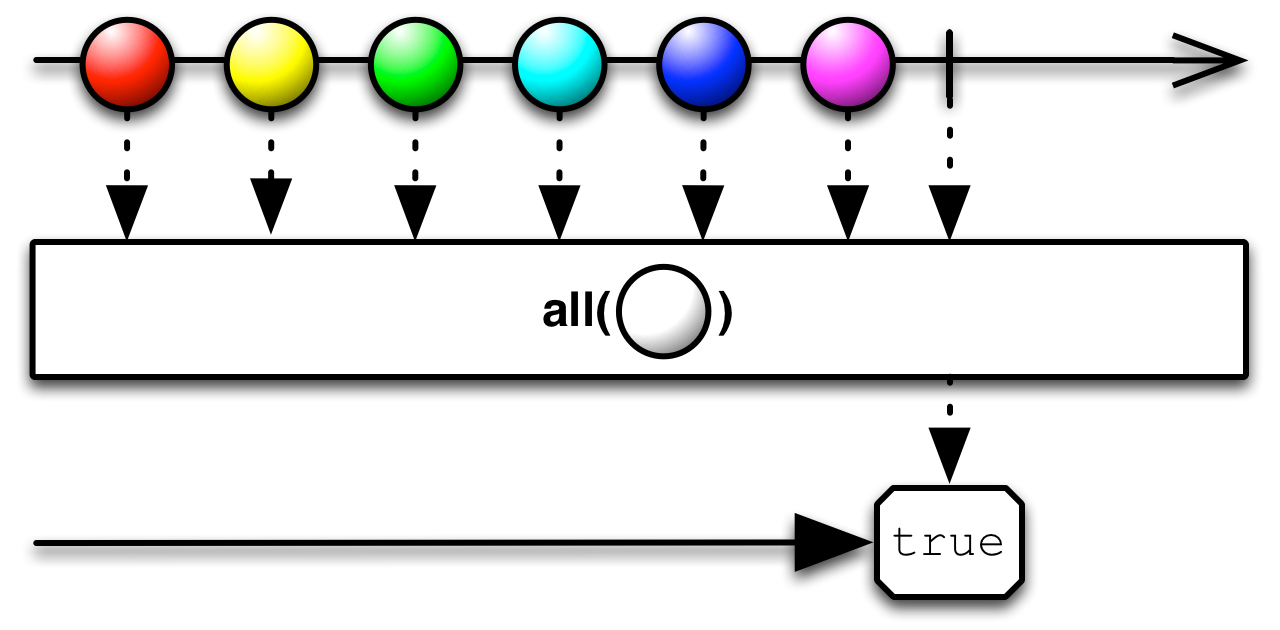
- Scheduler:
alldoes not operate by default on a particularScheduler.
Parameters
| predicate | a function that evaluates an item and returns a Boolean |
|---|
Returns
- a Single that emits
trueif all items emitted by the source ObservableSource satisfy the predicate; otherwise,false
public static Observable<T> amb (Iterable<? extends ObservableSource<? extends T>> sources)
Mirrors the one ObservableSource in an Iterable of several ObservableSources that first either emits an item or sends a termination notification.

- Scheduler:
ambdoes not operate by default on a particularScheduler.
Parameters
| sources | an Iterable of ObservableSource sources competing to react first. A subscription to each source will occur in the same order as in the Iterable. |
|---|
Returns
- an Observable that emits the same sequence as whichever of the source ObservableSources first emitted an item or sent a termination notification
public static Observable<T> ambArray (ObservableSource...<? extends T> sources)
Mirrors the one ObservableSource in an array of several ObservableSources that first either emits an item or sends a termination notification.

- Scheduler:
ambArraydoes not operate by default on a particularScheduler.
Parameters
| sources | an array of ObservableSource sources competing to react first. A subscription to each source will occur in the same order as in the array. |
|---|
Returns
- an Observable that emits the same sequence as whichever of the source ObservableSources first emitted an item or sent a termination notification
public final Observable<T> ambWith (ObservableSource<? extends T> other)
Mirrors the ObservableSource (current or provided) that first either emits an item or sends a termination notification.

- Scheduler:
ambWithdoes not operate by default on a particularScheduler.
Parameters
| other | an ObservableSource competing to react first. A subscription to this provided source will occur after subscribing to the current source. |
|---|
Returns
- an Observable that emits the same sequence as whichever of the source ObservableSources first emitted an item or sent a termination notification
public final Single<Boolean> any (Predicate<? super T> predicate)
Returns an Observable that emits true if any item emitted by the source ObservableSource satisfies a
specified condition, otherwise false. Note: this always emits false if the
source ObservableSource is empty.
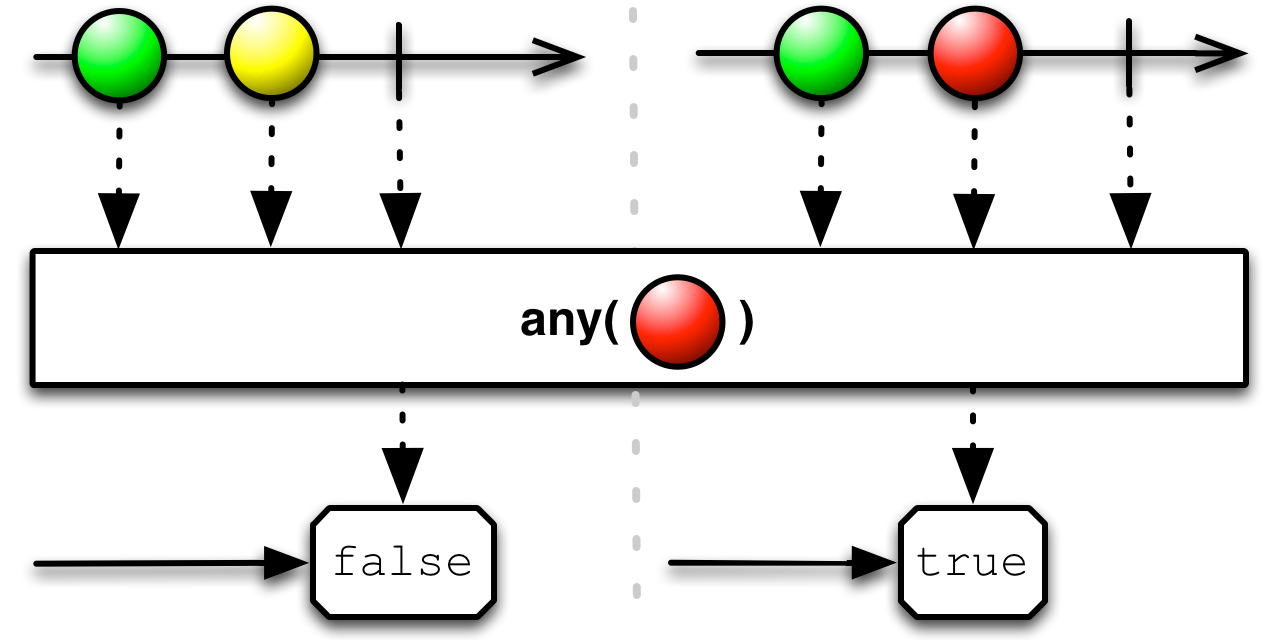
In Rx.Net this is the any Observer but we renamed it in RxJava to better match Java naming
idioms.
- Scheduler:
anydoes not operate by default on a particularScheduler.
Parameters
| predicate | the condition to test items emitted by the source ObservableSource |
|---|
Returns
- a Single that emits a Boolean that indicates whether any item emitted by the source
ObservableSource satisfies the
predicate
public final T blockingFirst (T defaultItem)
Returns the first item emitted by this Observable, or a default value if it emits no
items.
- Scheduler:
blockingFirstdoes not operate by default on a particularScheduler.
Parameters
| defaultItem | a default value to return if this Observable emits no items |
|---|
Returns
- the first item emitted by this
Observable, or the default value if it emits no items
See Also
public final T blockingFirst ()
Returns the first item emitted by this Observable, or throws
NoSuchElementException if it emits no items.
- Scheduler:
blockingFirstdoes not operate by default on a particularScheduler.
Returns
- the first item emitted by this
Observable
Throws
| NoSuchElementException | if this Observable emits no items |
|---|
See Also
public final void blockingForEach (Consumer<? super T> onNext)
Invokes a method on each item emitted by this Observable and blocks until the Observable
completes.
Note: This will block even if the underlying Observable is asynchronous.
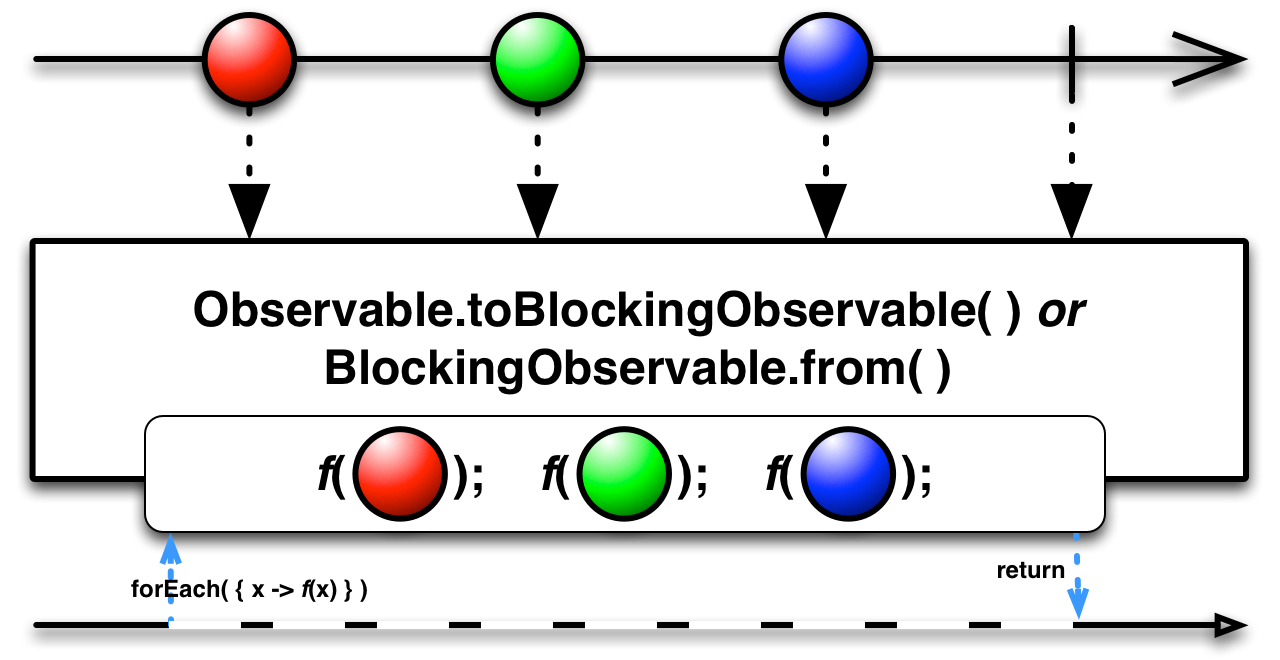
This is similar to subscribe(Observer), but it blocks. Because it blocks it does not
need the onComplete() or onError(Throwable) methods. If the
underlying Observable terminates with an error, rather than calling onError, this method will
throw an exception.
The difference between this method and subscribe(Consumer) is that the onNext action
is executed on the emission thread instead of the current thread.
- Scheduler:
blockingForEachdoes not operate by default on a particularScheduler.
Parameters
| onNext | the Consumer to invoke for each item emitted by the Observable |
|---|
Throws
| RuntimeException | if an error occurs |
|---|
public final Iterable<T> blockingIterable (int bufferSize)
public final Iterable<T> blockingIterable ()
public final T blockingLast ()
Returns the last item emitted by this Observable, or throws
NoSuchElementException if this Observable emits no items.
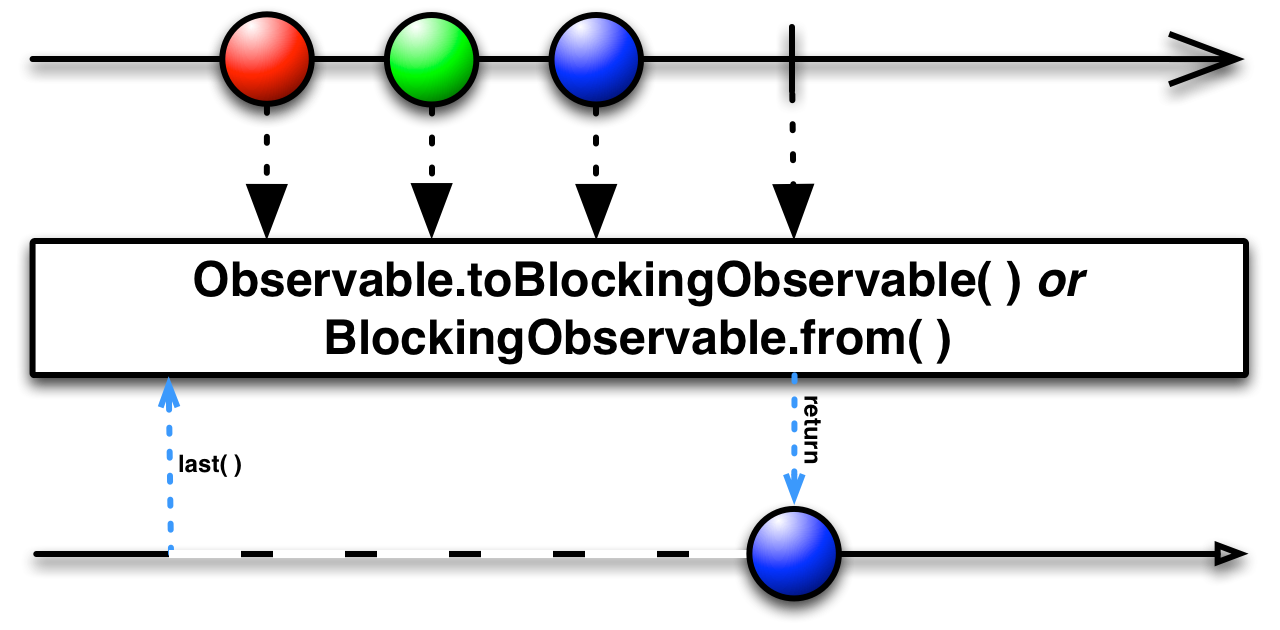
- Scheduler:
blockingLastdoes not operate by default on a particularScheduler.
Returns
- the last item emitted by this
Observable
Throws
| NoSuchElementException | if this Observable emits no items |
|---|
See Also
public final T blockingLast (T defaultItem)
Returns the last item emitted by this Observable, or a default value if it emits no
items.
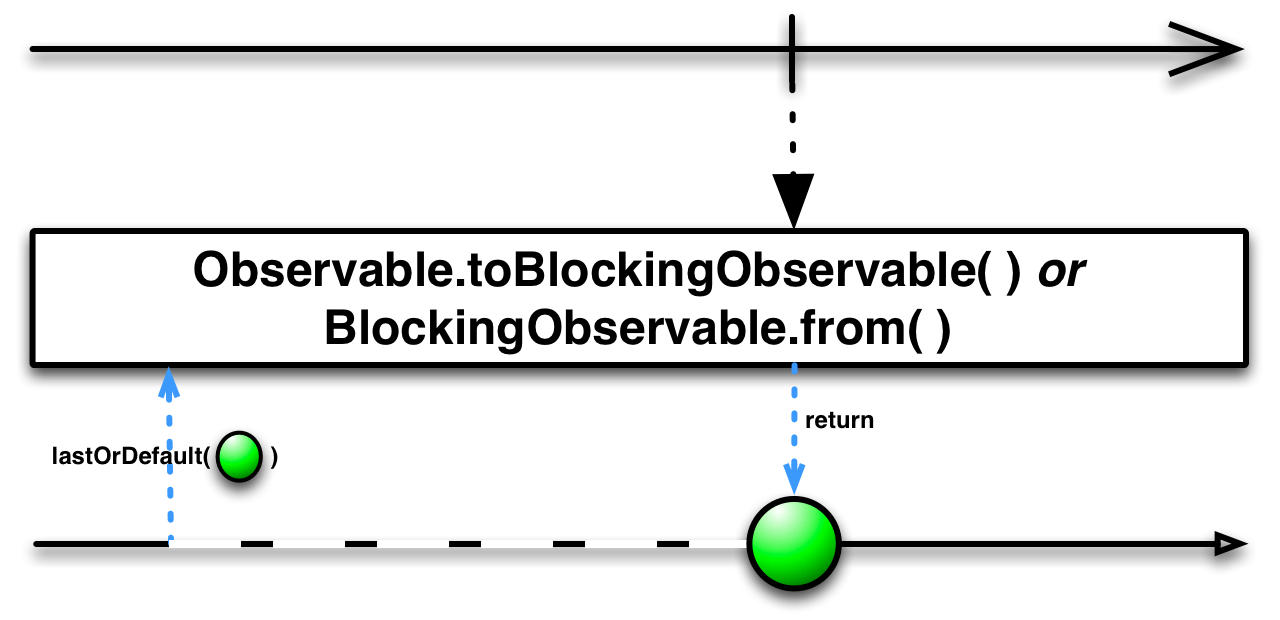
- Scheduler:
blockingLastdoes not operate by default on a particularScheduler.
Parameters
| defaultItem | a default value to return if this Observable emits no items |
|---|
Returns
- the last item emitted by the
Observable, or the default value if it emits no items
See Also
public final Iterable<T> blockingLatest ()
Returns an Iterable that returns the latest item emitted by this Observable,
waiting if necessary for one to become available.
If this Observable produces items faster than Iterator.next takes them,
onNext events might be skipped, but onError or onComplete events are not.
Note also that an onNext directly followed by onComplete might hide the onNext
event.
- Scheduler:
blockingLatestdoes not operate by default on a particularScheduler.
Returns
- an Iterable that always returns the latest item emitted by this
Observable
See Also
public final Iterable<T> blockingMostRecent (T initialValue)
Returns an Iterable that always returns the item most recently emitted by this
Observable.

- Scheduler:
blockingMostRecentdoes not operate by default on a particularScheduler.
Parameters
| initialValue | the initial value that the Iterable sequence will yield if this
Observable has not yet emitted an item |
|---|
Returns
- an
Iterablethat on each iteration returns the item that thisObservablehas most recently emitted
See Also
public final Iterable<T> blockingNext ()
Returns an Iterable that blocks until this Observable emits another item, then
returns that item.

- Scheduler:
blockingNextdoes not operate by default on a particularScheduler.
Returns
- an
Iterablethat blocks upon each iteration until thisObservableemits a new item, whereupon the Iterable returns that item
See Also
public final T blockingSingle (T defaultItem)
If this Observable completes after emitting a single item, return that item; if it emits
more than one item, throw an IllegalArgumentException; if it emits no items, return a default
value.
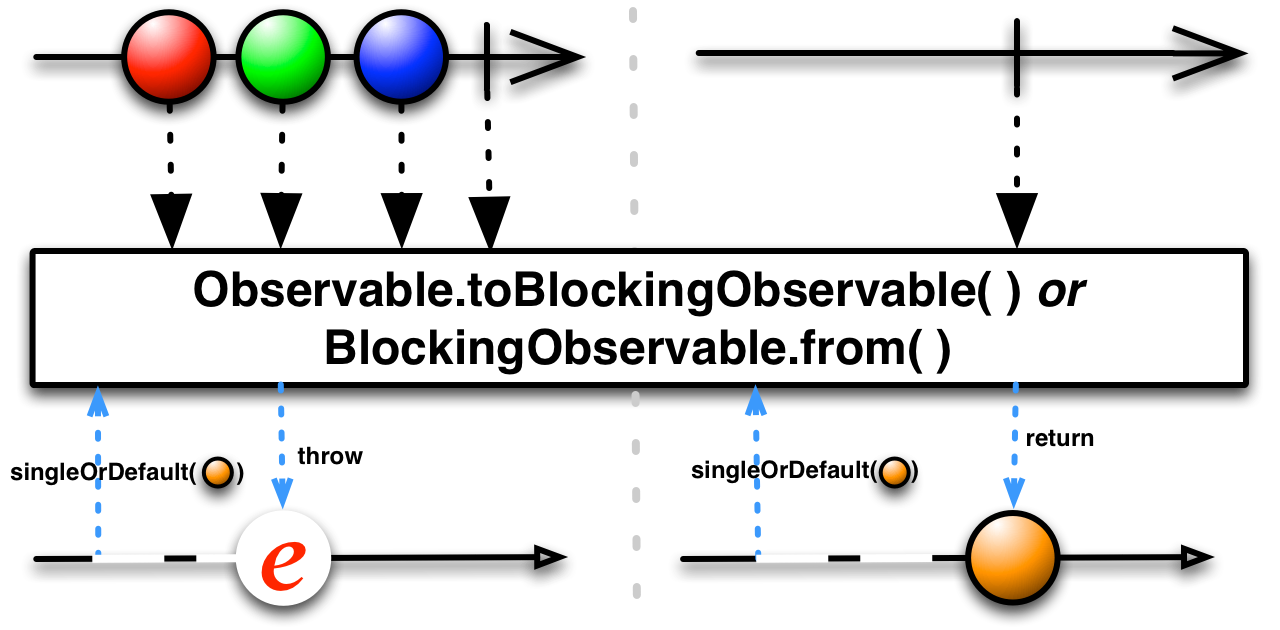
- Scheduler:
blockingSingledoes not operate by default on a particularScheduler.
Parameters
| defaultItem | a default value to return if this Observable emits no items |
|---|
Returns
- the single item emitted by this
Observable, or the default value if it emits no items
See Also
public final T blockingSingle ()
If this Observable completes after emitting a single item, return that item, otherwise
throw a NoSuchElementException.
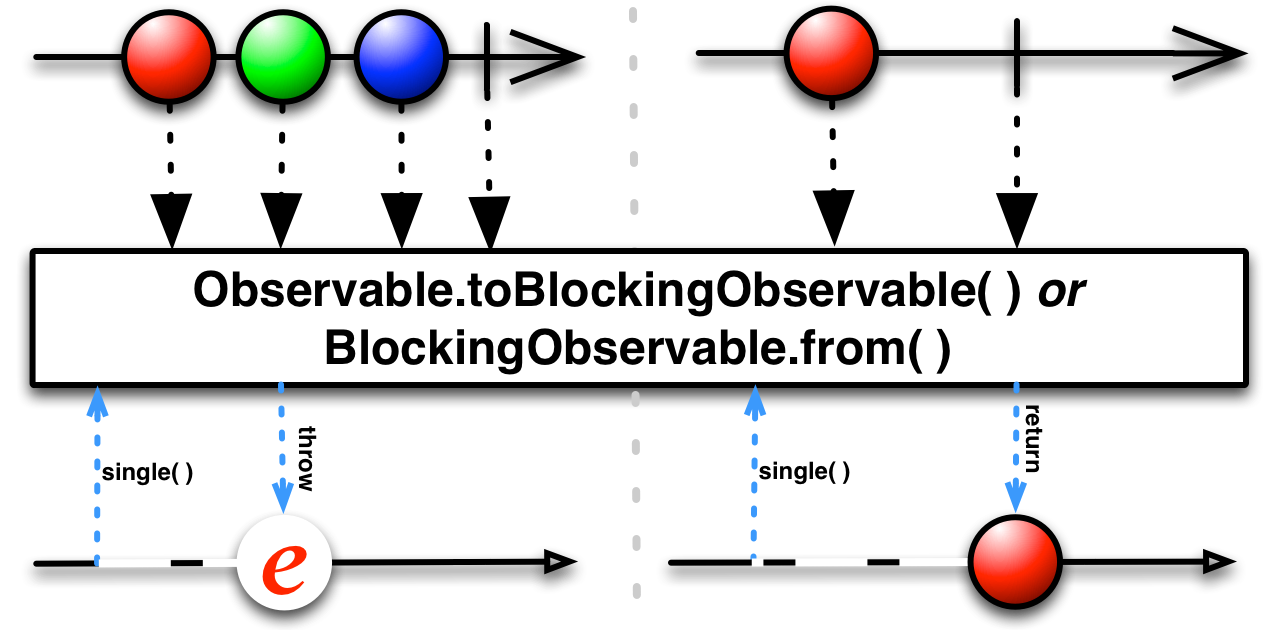
- Scheduler:
blockingSingledoes not operate by default on a particularScheduler.
Returns
- the single item emitted by this
Observable
See Also
public final void blockingSubscribe (Consumer<? super T> onNext)
Subscribes to the source and calls the given callbacks on the current thread.
If the Observable emits an error, it is wrapped into an
OnErrorNotImplementedException
and routed to the RxJavaPlugins.onError handler.
- Scheduler:
blockingSubscribedoes not operate by default on a particularScheduler.
Parameters
| onNext | the callback action for each source value |
|---|
public final void blockingSubscribe (Observer<? super T> subscriber)
Subscribes to the source and calls the Observer methods on the current thread.
- Scheduler:
blockingSubscribedoes not operate by default on a particularScheduler.
Parameters
| subscriber | the subscriber to forward events and calls to in the current thread |
|---|
public final void blockingSubscribe (Consumer<? super T> onNext, Consumer<? super Throwable> onError)
Subscribes to the source and calls the given callbacks on the current thread.
- Scheduler:
blockingSubscribedoes not operate by default on a particularScheduler.
Parameters
| onNext | the callback action for each source value |
|---|---|
| onError | the callback action for an error event |
public final void blockingSubscribe ()
Runs the source observable to a terminal event, ignoring any values and rethrowing any exception.
- Scheduler:
blockingSubscribedoes not operate by default on a particularScheduler.
public final void blockingSubscribe (Consumer<? super T> onNext, Consumer<? super Throwable> onError, Action onComplete)
Subscribes to the source and calls the given callbacks on the current thread.
- Scheduler:
blockingSubscribedoes not operate by default on a particularScheduler.
Parameters
| onNext | the callback action for each source value |
|---|---|
| onError | the callback action for an error event |
| onComplete | the callback action for the completion event. |
public final Observable<List<T>> buffer (ObservableSource<? extends TOpening> openingIndicator, Function<? super TOpening, ? extends ObservableSource<? extends TClosing>> closingIndicator)
Returns an Observable that emits buffers of items it collects from the source ObservableSource. The resulting
ObservableSource emits buffers that it creates when the specified openingIndicator ObservableSource emits an
item, and closes when the ObservableSource returned from closingIndicator emits an item.
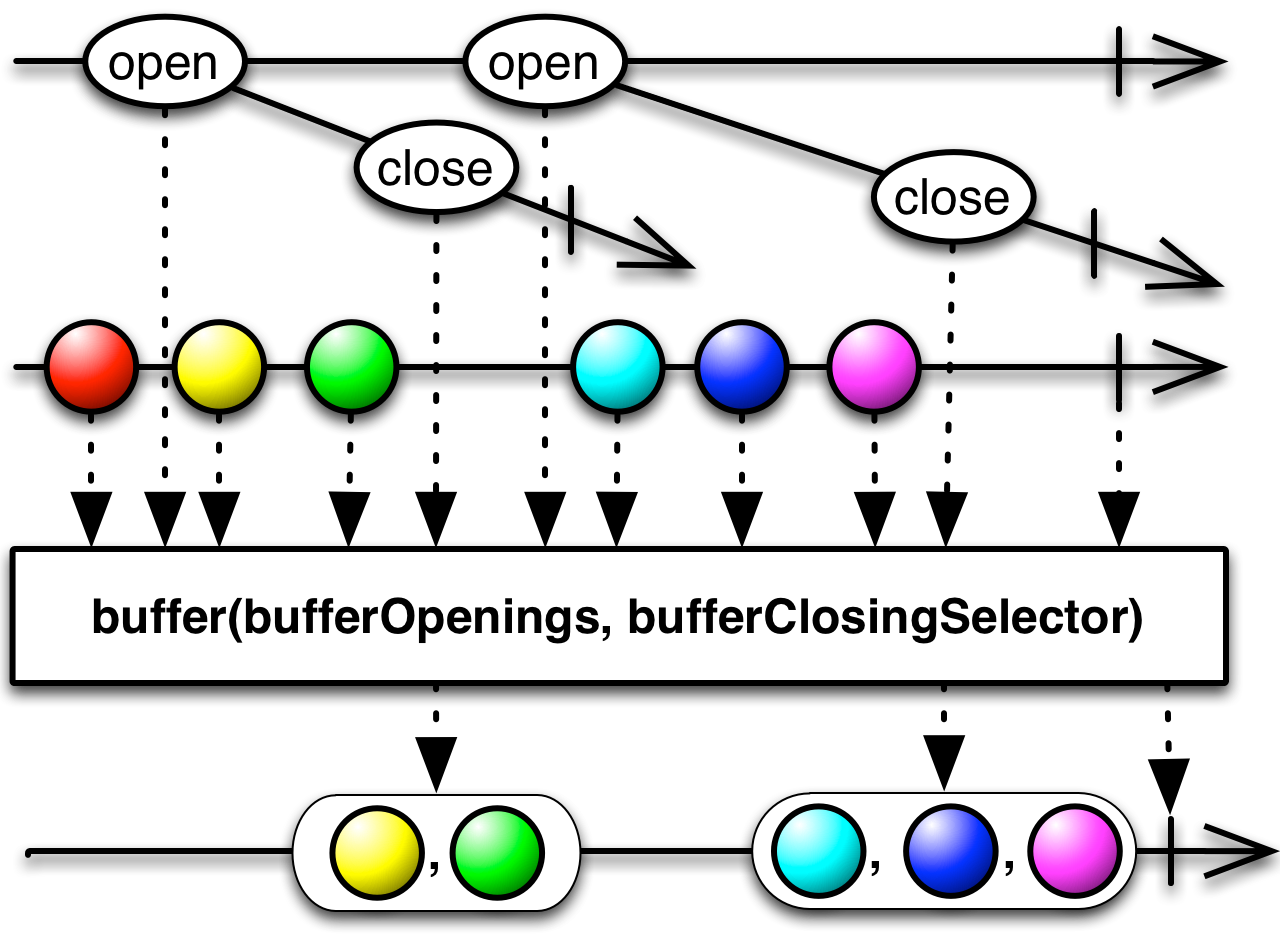
- Scheduler:
- This version of
bufferdoes not operate by default on a particularScheduler.
Parameters
| openingIndicator | the ObservableSource that, when it emits an item, causes a new buffer to be created |
|---|---|
| closingIndicator | the Function that is used to produce an ObservableSource for every buffer created. When this
ObservableSource emits an item, the associated buffer is emitted. |
Returns
- an Observable that emits buffers, containing items from the source ObservableSource, that are created and closed when the specified ObservableSources emit items
public final Observable<U> buffer (ObservableSource<? extends TOpening> openingIndicator, Function<? super TOpening, ? extends ObservableSource<? extends TClosing>> closingIndicator, Callable<U> bufferSupplier)
Returns an Observable that emits buffers of items it collects from the source ObservableSource. The resulting
ObservableSource emits buffers that it creates when the specified openingIndicator ObservableSource emits an
item, and closes when the ObservableSource returned from closingIndicator emits an item.

- Scheduler:
- This version of
bufferdoes not operate by default on a particularScheduler.
Parameters
| openingIndicator | the ObservableSource that, when it emits an item, causes a new buffer to be created |
|---|---|
| closingIndicator | the Function that is used to produce an ObservableSource for every buffer created. When this
ObservableSource emits an item, the associated buffer is emitted. |
| bufferSupplier | a factory function that returns an instance of the collection subclass to be used and returned as the buffer |
Returns
- an Observable that emits buffers, containing items from the source ObservableSource, that are created and closed when the specified ObservableSources emit items
public final Observable<U> buffer (long timespan, long timeskip, TimeUnit unit, Scheduler scheduler, Callable<U> bufferSupplier)
Returns an Observable that emits buffers of items it collects from the source ObservableSource. The resulting
ObservableSource starts a new buffer periodically, as determined by the timeskip argument, and on the
specified scheduler. It emits each buffer after a fixed timespan, specified by the
timespan argument. When the source ObservableSource completes or encounters an error, the resulting
ObservableSource emits the current buffer and propagates the notification from the source ObservableSource.
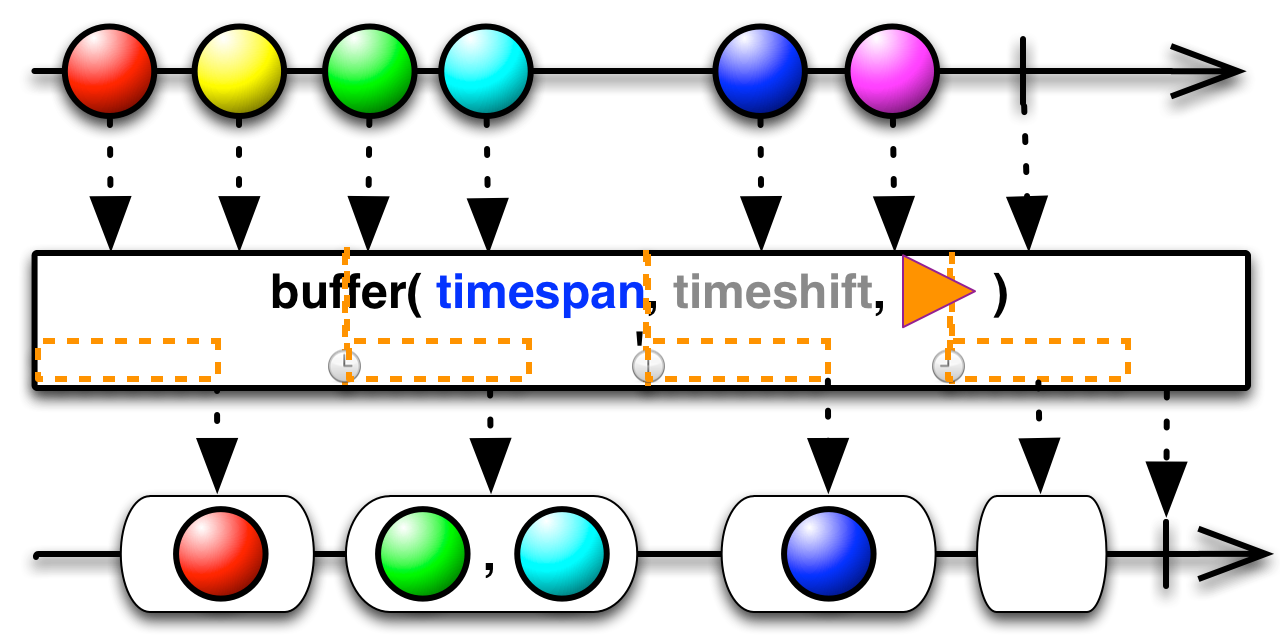
- Scheduler:
- You specify which
Schedulerthis operator will use
Parameters
| timespan | the period of time each buffer collects items before it is emitted |
|---|---|
| timeskip | the period of time after which a new buffer will be created |
| unit | the unit of time that applies to the timespan and timeskip arguments |
| scheduler | the Scheduler to use when determining the end and start of a buffer |
| bufferSupplier | a factory function that returns an instance of the collection subclass to be used and returned as the buffer |
Returns
- an Observable that emits new buffers of items emitted by the source ObservableSource periodically after a fixed timespan has elapsed
public final Observable<List<T>> buffer (long timespan, long timeskip, TimeUnit unit, Scheduler scheduler)
Returns an Observable that emits buffers of items it collects from the source ObservableSource. The resulting
ObservableSource starts a new buffer periodically, as determined by the timeskip argument, and on the
specified scheduler. It emits each buffer after a fixed timespan, specified by the
timespan argument. When the source ObservableSource completes or encounters an error, the resulting
ObservableSource emits the current buffer and propagates the notification from the source ObservableSource.

- Scheduler:
- You specify which
Schedulerthis operator will use
Parameters
| timespan | the period of time each buffer collects items before it is emitted |
|---|---|
| timeskip | the period of time after which a new buffer will be created |
| unit | the unit of time that applies to the timespan and timeskip arguments |
| scheduler | the Scheduler to use when determining the end and start of a buffer |
Returns
- an Observable that emits new buffers of items emitted by the source ObservableSource periodically after a fixed timespan has elapsed
public final Observable<U> buffer (int count, Callable<U> bufferSupplier)
Returns an Observable that emits buffers of items it collects from the source ObservableSource. The resulting
ObservableSource emits connected, non-overlapping buffers, each containing count items. When the source
ObservableSource completes or encounters an error, the resulting ObservableSource emits the current buffer and
propagates the notification from the source ObservableSource.
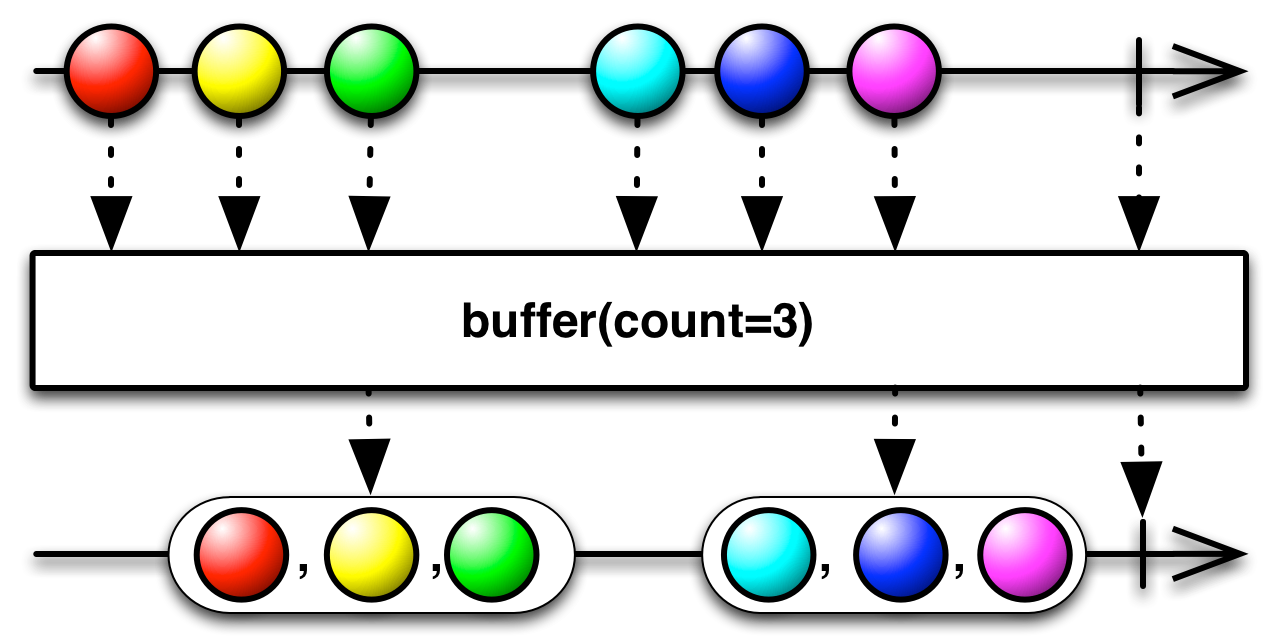
- Scheduler:
- This version of
bufferdoes not operate by default on a particularScheduler.
Parameters
| count | the maximum number of items in each buffer before it should be emitted |
|---|---|
| bufferSupplier | a factory function that returns an instance of the collection subclass to be used and returned as the buffer |
Returns
- an Observable that emits connected, non-overlapping buffers, each containing at most
countitems from the source ObservableSource
public final Observable<U> buffer (Callable<? extends ObservableSource<B>> boundarySupplier, Callable<U> bufferSupplier)
Returns an Observable that emits buffers of items it collects from the source ObservableSource. The resulting
ObservableSource emits connected, non-overlapping buffers. It emits the current buffer and replaces it with a
new buffer whenever the ObservableSource produced by the specified closingIndicator emits an item.
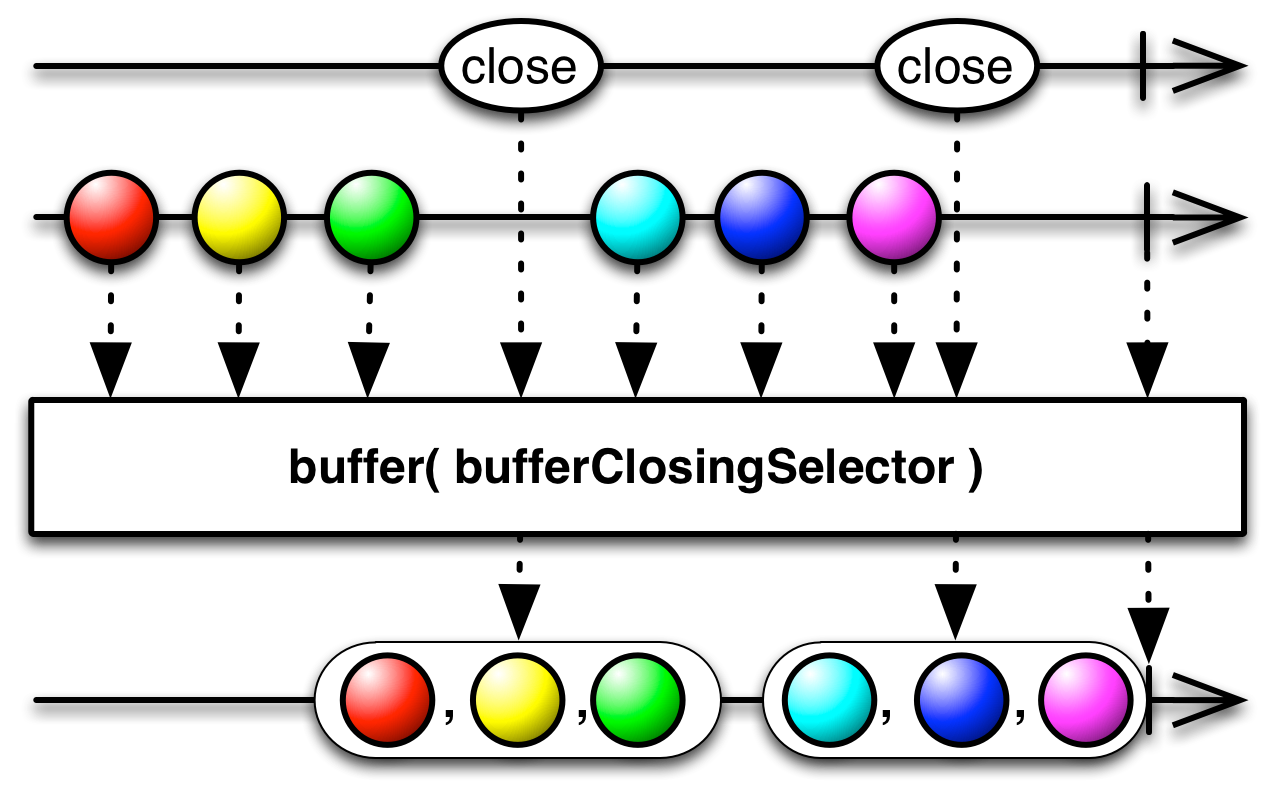
- Scheduler:
- This version of
bufferdoes not operate by default on a particularScheduler.
Parameters
| boundarySupplier | a Callable that produces an ObservableSource that governs the boundary between buffers.
Whenever the source ObservableSource emits an item, buffer emits the current buffer and
begins to fill a new one |
|---|---|
| bufferSupplier | a factory function that returns an instance of the collection subclass to be used and returned as the buffer |
Returns
- an Observable that emits a connected, non-overlapping buffer of items from the source ObservableSource
each time the ObservableSource created with the
closingIndicatorargument emits an item
public final Observable<List<T>> buffer (long timespan, TimeUnit unit, Scheduler scheduler)
Returns an Observable that emits buffers of items it collects from the source ObservableSource. The resulting
ObservableSource emits connected, non-overlapping buffers, each of a fixed duration specified by the
timespan argument and on the specified scheduler. When the source ObservableSource completes or
encounters an error, the resulting ObservableSource emits the current buffer and propagates the notification
from the source ObservableSource.
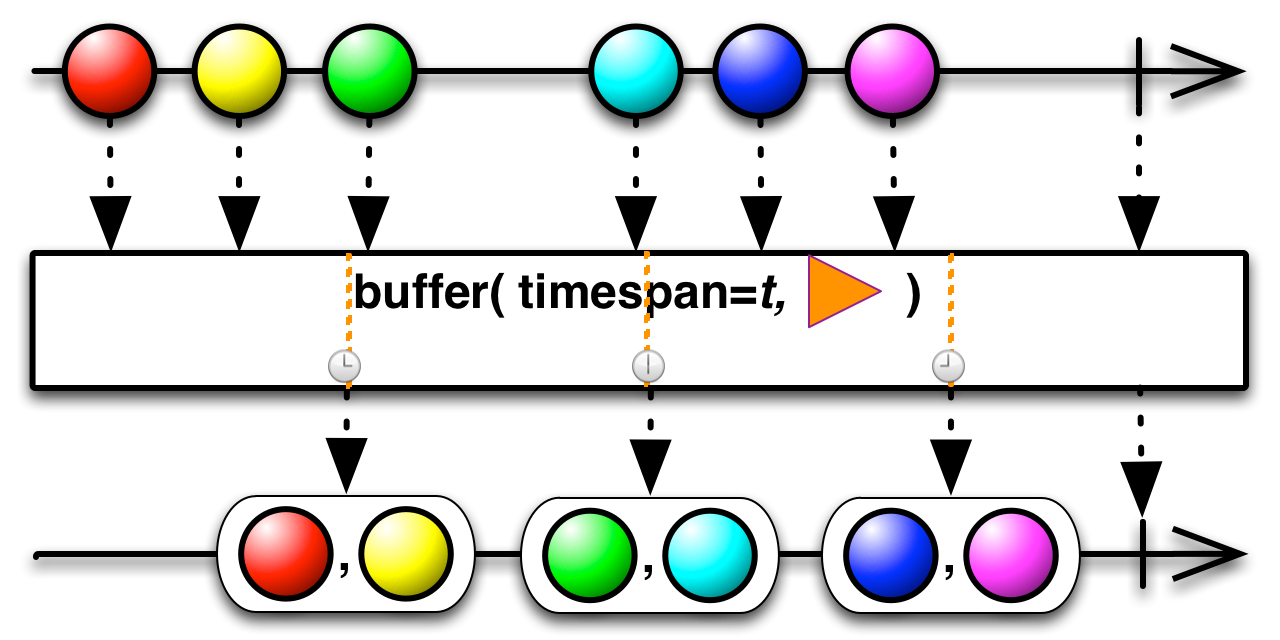
- Scheduler:
- You specify which
Schedulerthis operator will use
Parameters
| timespan | the period of time each buffer collects items before it is emitted and replaced with a new buffer |
|---|---|
| unit | the unit of time which applies to the timespan argument |
| scheduler | the Scheduler to use when determining the end and start of a buffer |
Returns
- an Observable that emits connected, non-overlapping buffers of items emitted by the source ObservableSource within a fixed duration
public final Observable<List<T>> buffer (ObservableSource<B> boundary, int initialCapacity)
Returns an Observable that emits non-overlapping buffered items from the source ObservableSource each time the specified boundary ObservableSource emits an item.
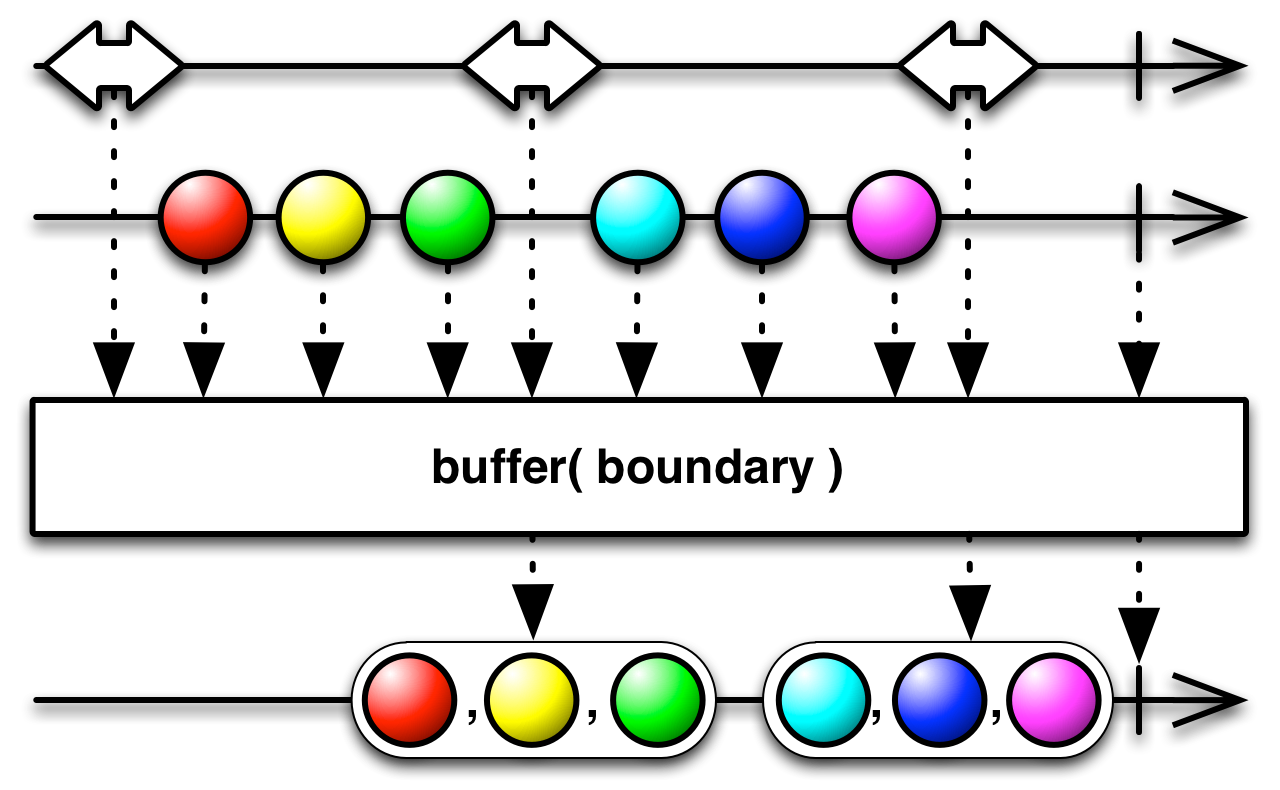
Completion of either the source or the boundary ObservableSource causes the returned ObservableSource to emit the latest buffer and complete.
- Scheduler:
- This version of
bufferdoes not operate by default on a particularScheduler.
Parameters
| boundary | the boundary ObservableSource |
|---|---|
| initialCapacity | the initial capacity of each buffer chunk |
Returns
- an Observable that emits buffered items from the source ObservableSource when the boundary ObservableSource emits an item
public final Observable<List<T>> buffer (int count)
Returns an Observable that emits buffers of items it collects from the source ObservableSource. The resulting
ObservableSource emits connected, non-overlapping buffers, each containing count items. When the source
ObservableSource completes or encounters an error, the resulting ObservableSource emits the current buffer and
propagates the notification from the source ObservableSource.

- Scheduler:
- This version of
bufferdoes not operate by default on a particularScheduler.
Parameters
| count | the maximum number of items in each buffer before it should be emitted |
|---|
Returns
- an Observable that emits connected, non-overlapping buffers, each containing at most
countitems from the source ObservableSource
public final Observable<List<T>> buffer (Callable<? extends ObservableSource<B>> boundarySupplier)
Returns an Observable that emits buffers of items it collects from the source ObservableSource. The resulting
ObservableSource emits connected, non-overlapping buffers. It emits the current buffer and replaces it with a
new buffer whenever the ObservableSource produced by the specified closingIndicator emits an item.

- Scheduler:
- This version of
bufferdoes not operate by default on a particularScheduler.
Parameters
| boundarySupplier | a Callable that produces an ObservableSource that governs the boundary between buffers.
Whenever the source ObservableSource emits an item, buffer emits the current buffer and
begins to fill a new one |
|---|
Returns
- an Observable that emits a connected, non-overlapping buffer of items from the source ObservableSource
each time the ObservableSource created with the
closingIndicatorargument emits an item
public final Observable<List<T>> buffer (ObservableSource<B> boundary)
Returns an Observable that emits non-overlapping buffered items from the source ObservableSource each time the specified boundary ObservableSource emits an item.

Completion of either the source or the boundary ObservableSource causes the returned ObservableSource to emit the latest buffer and complete.
- Scheduler:
- This version of
bufferdoes not operate by default on a particularScheduler.
Parameters
| boundary | the boundary ObservableSource |
|---|
Returns
- an Observable that emits buffered items from the source ObservableSource when the boundary ObservableSource emits an item
public final Observable<List<T>> buffer (long timespan, long timeskip, TimeUnit unit)
Returns an Observable that emits buffers of items it collects from the source ObservableSource. The resulting
ObservableSource starts a new buffer periodically, as determined by the timeskip argument. It emits
each buffer after a fixed timespan, specified by the timespan argument. When the source
ObservableSource completes or encounters an error, the resulting ObservableSource emits the current buffer and
propagates the notification from the source ObservableSource.
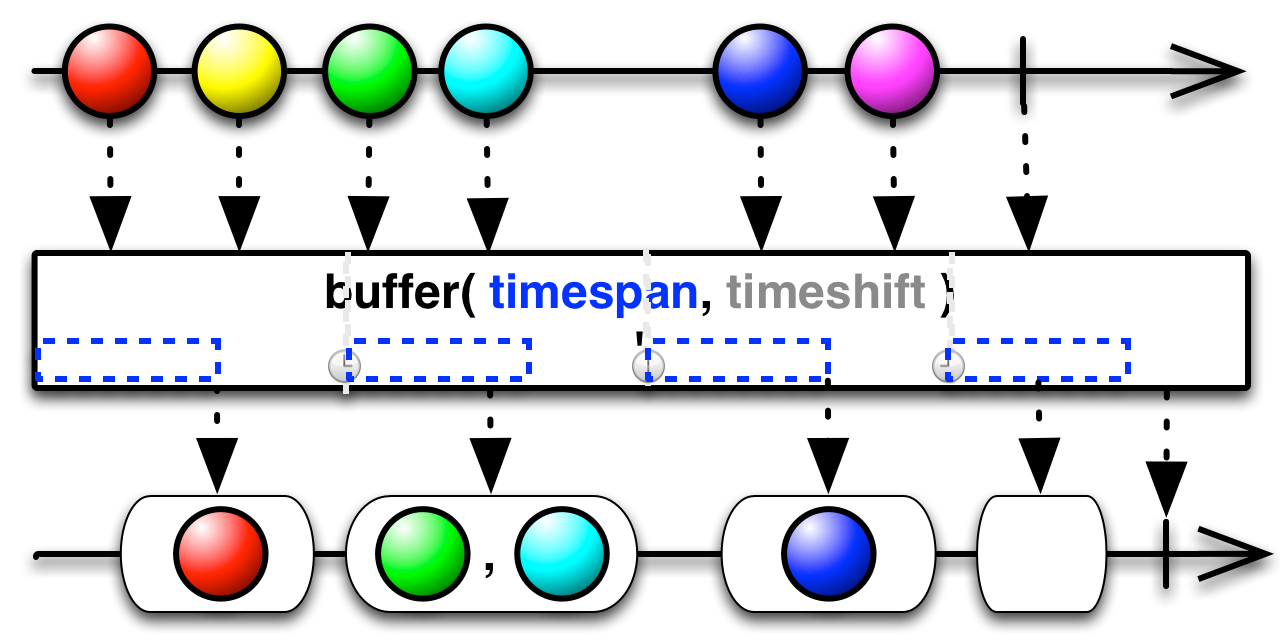
- Scheduler:
- This version of
bufferoperates by default on thecomputationScheduler.
Parameters
| timespan | the period of time each buffer collects items before it is emitted |
|---|---|
| timeskip | the period of time after which a new buffer will be created |
| unit | the unit of time that applies to the timespan and timeskip arguments |
Returns
- an Observable that emits new buffers of items emitted by the source ObservableSource periodically after a fixed timespan has elapsed
public final Observable<List<T>> buffer (long timespan, TimeUnit unit, Scheduler scheduler, int count)
Returns an Observable that emits buffers of items it collects from the source ObservableSource. The resulting
ObservableSource emits connected, non-overlapping buffers, each of a fixed duration specified by the
timespan argument as measured on the specified scheduler, or a maximum size specified by
the count argument (whichever is reached first). When the source ObservableSource completes or
encounters an error, the resulting ObservableSource emits the current buffer and propagates the notification
from the source ObservableSource.
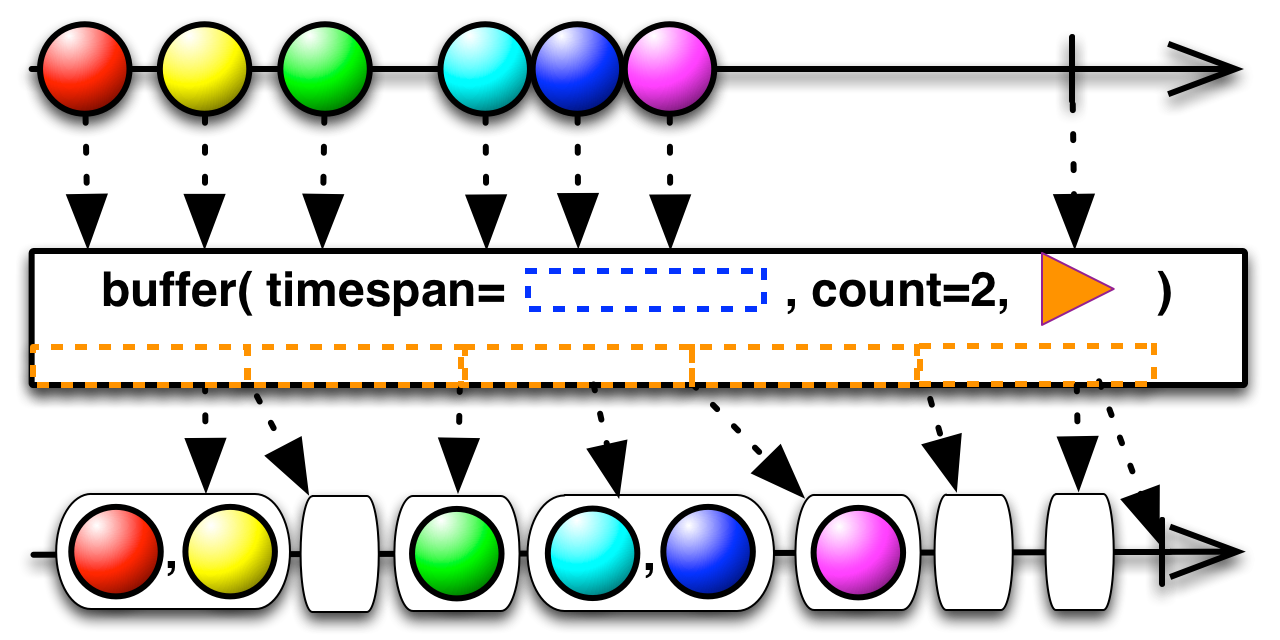
- Scheduler:
- You specify which
Schedulerthis operator will use
Parameters
| timespan | the period of time each buffer collects items before it is emitted and replaced with a new buffer |
|---|---|
| unit | the unit of time which applies to the timespan argument |
| scheduler | the Scheduler to use when determining the end and start of a buffer |
| count | the maximum size of each buffer before it is emitted |
Returns
- an Observable that emits connected, non-overlapping buffers of items emitted by the source ObservableSource after a fixed duration or when the buffer reaches maximum capacity (whichever occurs first)
public final Observable<List<T>> buffer (long timespan, TimeUnit unit)
Returns an Observable that emits buffers of items it collects from the source ObservableSource. The resulting
ObservableSource emits connected, non-overlapping buffers, each of a fixed duration specified by the
timespan argument. When the source ObservableSource completes or encounters an error, the resulting
ObservableSource emits the current buffer and propagates the notification from the source ObservableSource.
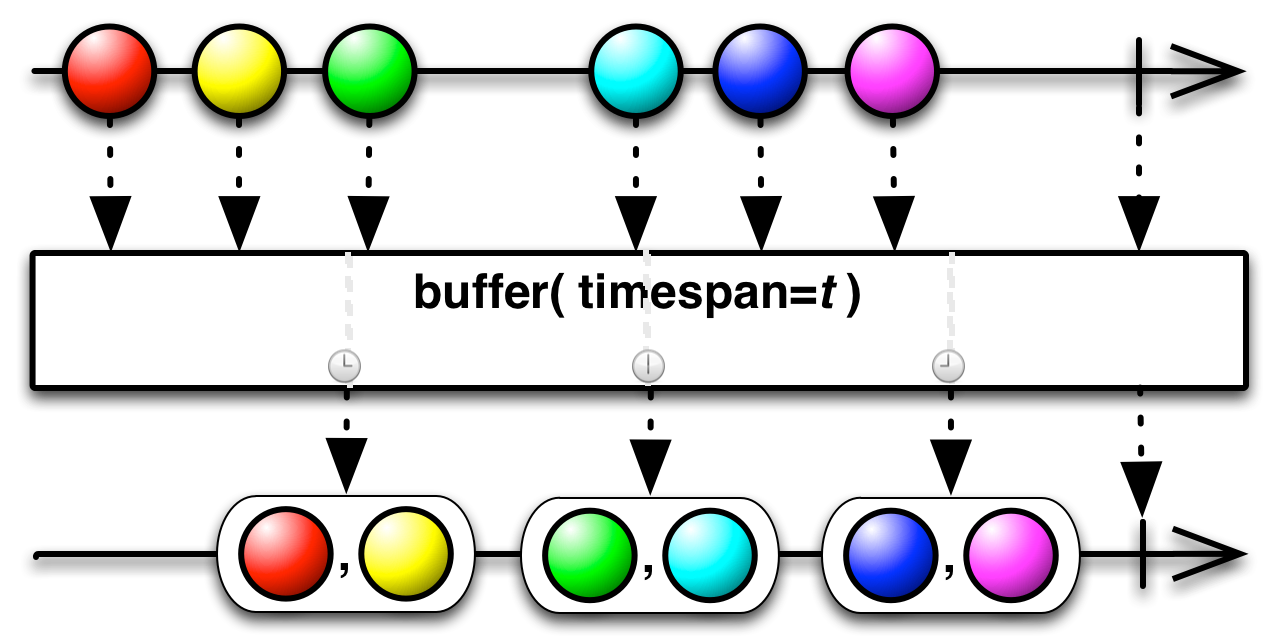
- Scheduler:
- This version of
bufferoperates by default on thecomputationScheduler.
Parameters
| timespan | the period of time each buffer collects items before it is emitted and replaced with a new buffer |
|---|---|
| unit | the unit of time that applies to the timespan argument |
Returns
- an Observable that emits connected, non-overlapping buffers of items emitted by the source ObservableSource within a fixed duration
public final Observable<U> buffer (long timespan, TimeUnit unit, Scheduler scheduler, int count, Callable<U> bufferSupplier, boolean restartTimerOnMaxSize)
Returns an Observable that emits buffers of items it collects from the source ObservableSource. The resulting
ObservableSource emits connected, non-overlapping buffers, each of a fixed duration specified by the
timespan argument as measured on the specified scheduler, or a maximum size specified by
the count argument (whichever is reached first). When the source ObservableSource completes or
encounters an error, the resulting ObservableSource emits the current buffer and propagates the notification
from the source ObservableSource.

- Scheduler:
- You specify which
Schedulerthis operator will use
Parameters
| timespan | the period of time each buffer collects items before it is emitted and replaced with a new buffer |
|---|---|
| unit | the unit of time which applies to the timespan argument |
| scheduler | the Scheduler to use when determining the end and start of a buffer |
| count | the maximum size of each buffer before it is emitted |
| bufferSupplier | a factory function that returns an instance of the collection subclass to be used and returned as the buffer |
| restartTimerOnMaxSize | if true the time window is restarted when the max capacity of the current buffer is reached |
Returns
- an Observable that emits connected, non-overlapping buffers of items emitted by the source ObservableSource after a fixed duration or when the buffer reaches maximum capacity (whichever occurs first)
public final Observable<U> buffer (ObservableSource<B> boundary, Callable<U> bufferSupplier)
Returns an Observable that emits non-overlapping buffered items from the source ObservableSource each time the specified boundary ObservableSource emits an item.

Completion of either the source or the boundary ObservableSource causes the returned ObservableSource to emit the latest buffer and complete.
- Scheduler:
- This version of
bufferdoes not operate by default on a particularScheduler.
Parameters
| boundary | the boundary ObservableSource |
|---|---|
| bufferSupplier | a factory function that returns an instance of the collection subclass to be used and returned as the buffer |
Returns
- an Observable that emits buffered items from the source ObservableSource when the boundary ObservableSource emits an item
public final Observable<List<T>> buffer (int count, int skip)
Returns an Observable that emits buffers of items it collects from the source ObservableSource. The resulting
ObservableSource emits buffers every skip items, each containing count items. When the source
ObservableSource completes or encounters an error, the resulting ObservableSource emits the current buffer and
propagates the notification from the source ObservableSource.
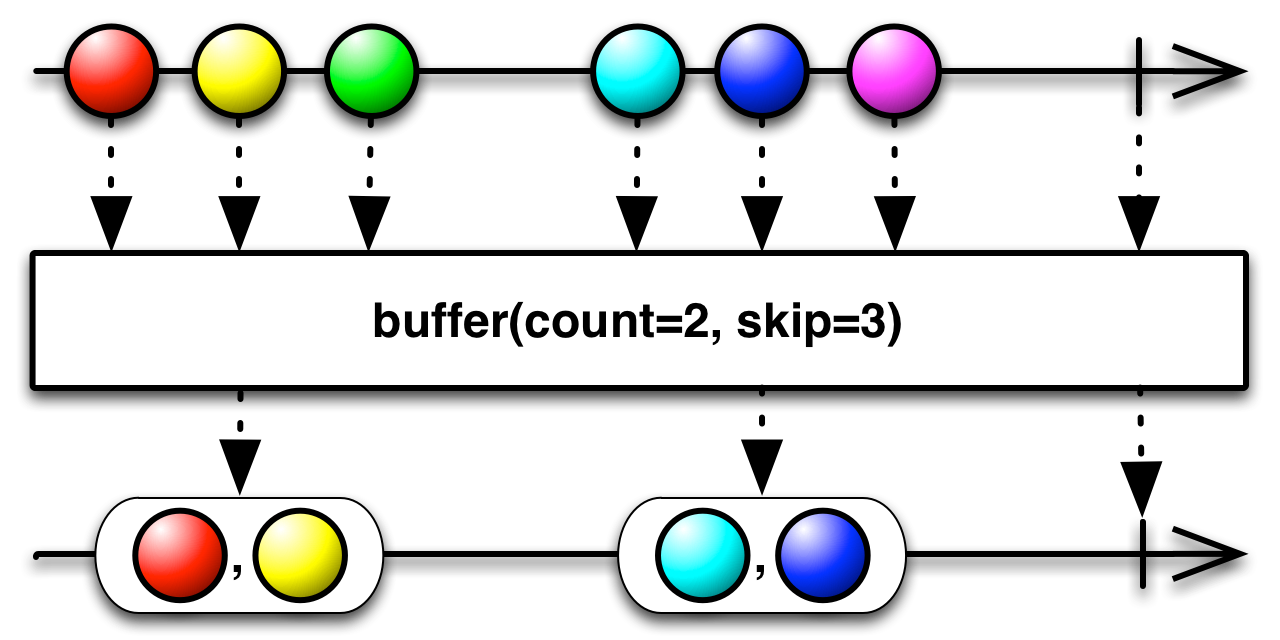
- Scheduler:
- This version of
bufferdoes not operate by default on a particularScheduler.
Parameters
| count | the maximum size of each buffer before it should be emitted |
|---|---|
| skip | how many items emitted by the source ObservableSource should be skipped before starting a new
buffer. Note that when skip and count are equal, this is the same operation as
buffer(int). |
Returns
- an Observable that emits buffers for every
skipitem from the source ObservableSource and containing at mostcountitems
public final Observable<List<T>> buffer (long timespan, TimeUnit unit, int count)
Returns an Observable that emits buffers of items it collects from the source ObservableSource. The resulting
ObservableSource emits connected, non-overlapping buffers, each of a fixed duration specified by the
timespan argument or a maximum size specified by the count argument (whichever is reached
first). When the source ObservableSource completes or encounters an error, the resulting ObservableSource emits the
current buffer and propagates the notification from the source ObservableSource.
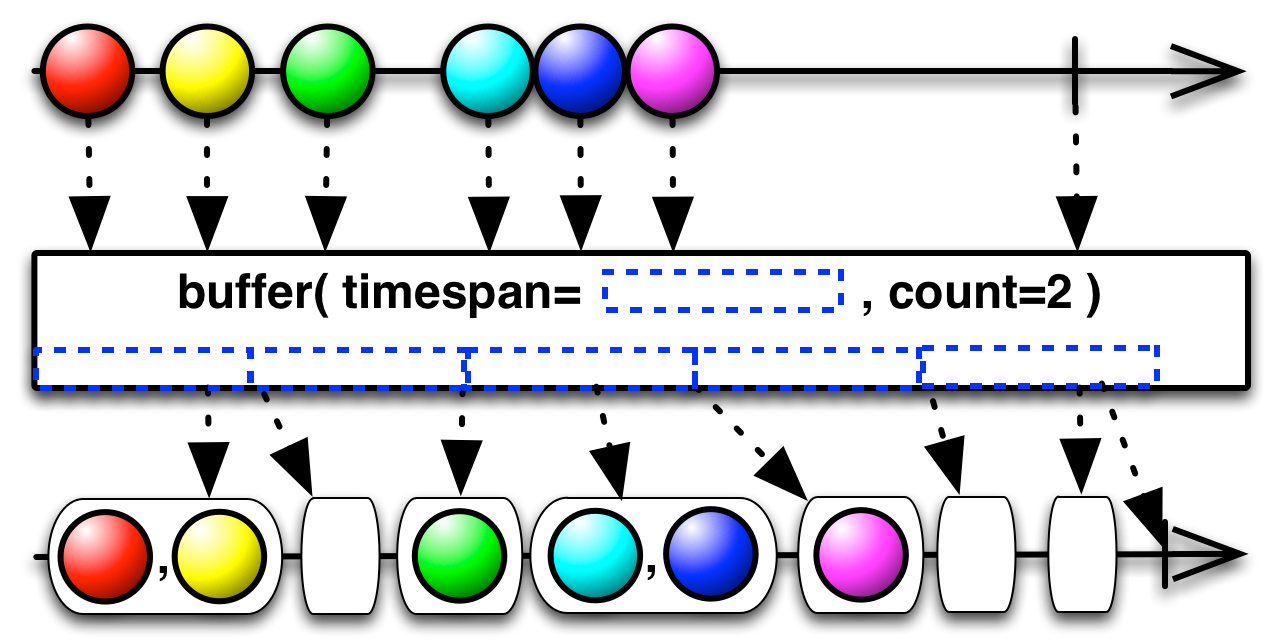
- Scheduler:
- This version of
bufferoperates by default on thecomputationScheduler.
Parameters
| timespan | the period of time each buffer collects items before it is emitted and replaced with a new buffer |
|---|---|
| unit | the unit of time which applies to the timespan argument |
| count | the maximum size of each buffer before it is emitted |
Returns
- an Observable that emits connected, non-overlapping buffers of items emitted by the source ObservableSource, after a fixed duration or when the buffer reaches maximum capacity (whichever occurs first)
public final Observable<U> buffer (int count, int skip, Callable<U> bufferSupplier)
Returns an Observable that emits buffers of items it collects from the source ObservableSource. The resulting
ObservableSource emits buffers every skip items, each containing count items. When the source
ObservableSource completes or encounters an error, the resulting ObservableSource emits the current buffer and
propagates the notification from the source ObservableSource.

- Scheduler:
- This version of
bufferdoes not operate by default on a particularScheduler.
Parameters
| count | the maximum size of each buffer before it should be emitted |
|---|---|
| skip | how many items emitted by the source ObservableSource should be skipped before starting a new
buffer. Note that when skip and count are equal, this is the same operation as
buffer(int). |
| bufferSupplier | a factory function that returns an instance of the collection subclass to be used and returned as the buffer |
Returns
- an Observable that emits buffers for every
skipitem from the source ObservableSource and containing at mostcountitems
public static int bufferSize ()
Returns the default 'island' size or capacity-increment hint for unbounded buffers.
Delegates to bufferSize() but is public for convenience.
The value can be overridden via system parameter rx2.buffer-size
before the Flowable class is loaded.
Returns
- the default 'island' size or capacity-increment hint
public final Observable<T> cache ()
Returns an Observable that subscribes to this ObservableSource lazily, caches all of its events and replays them, in the same order as received, to all the downstream subscribers.

This is useful when you want an ObservableSource to cache responses and you can't control the
subscribe/dispose behavior of all the Observers.
The operator subscribes only when the first downstream subscriber subscribes and maintains
a single subscription towards this ObservableSource. In contrast, the operator family of replay()
that return a ConnectableObservable require an explicit call to connect().
Note: You sacrifice the ability to dispose the origin when you use the cache
Observer so be careful not to use this Observer on ObservableSources that emit an infinite or very large number
of items that will use up memory.
A possible workaround is to apply `takeUntil` with a predicate or
another source before (and perhaps after) the application of cache().
AtomicBoolean shouldStop = new AtomicBoolean();
source.takeUntil(v -> shouldStop.get())
.cache()
.takeUntil(v -> shouldStop.get())
.subscribe(...);
onTerminateDetach() applied along with the previous
workaround:
AtomicBoolean shouldStop = new AtomicBoolean();
source.takeUntil(v -> shouldStop.get())
.onTerminateDetach()
.cache()
.takeUntil(v -> shouldStop.get())
.onTerminateDetach()
.subscribe(...);
- Scheduler:
cachedoes not operate by default on a particularScheduler.
Returns
- an Observable that, when first subscribed to, caches all of its items and notifications for the benefit of subsequent subscribers
public final Observable<T> cacheWithInitialCapacity (int initialCapacity)
Returns an Observable that subscribes to this ObservableSource lazily, caches all of its events and replays them, in the same order as received, to all the downstream subscribers.

This is useful when you want an ObservableSource to cache responses and you can't control the
subscribe/dispose behavior of all the Observers.
The operator subscribes only when the first downstream subscriber subscribes and maintains
a single subscription towards this ObservableSource. In contrast, the operator family of replay()
that return a ConnectableObservable require an explicit call to connect().
Note: You sacrifice the ability to dispose the origin when you use the cache
Observer so be careful not to use this Observer on ObservableSources that emit an infinite or very large number
of items that will use up memory.
A possible workaround is to apply `takeUntil` with a predicate or
another source before (and perhaps after) the application of cache().
AtomicBoolean shouldStop = new AtomicBoolean();
source.takeUntil(v -> shouldStop.get())
.cache()
.takeUntil(v -> shouldStop.get())
.subscribe(...);
onTerminateDetach() applied along with the previous
workaround:
AtomicBoolean shouldStop = new AtomicBoolean();
source.takeUntil(v -> shouldStop.get())
.onTerminateDetach()
.cache()
.takeUntil(v -> shouldStop.get())
.onTerminateDetach()
.subscribe(...);
- Scheduler:
cacheWithInitialCapacitydoes not operate by default on a particularScheduler.
Note: The capacity hint is not an upper bound on cache size. For that, consider
replay(int) in combination with autoConnect() or similar.
Parameters
| initialCapacity | hint for number of items to cache (for optimizing underlying data structure) |
|---|
Returns
- an Observable that, when first subscribed to, caches all of its items and notifications for the benefit of subsequent subscribers
public final Observable<U> cast (Class<U> clazz)
Returns an Observable that emits the items emitted by the source ObservableSource, converted to the specified type.

- Scheduler:
castdoes not operate by default on a particularScheduler.
Parameters
| clazz | the target class type that cast will cast the items emitted by the source ObservableSource
into before emitting them from the resulting ObservableSource |
|---|
Returns
- an Observable that emits each item from the source ObservableSource after converting it to the specified type
public final Single<U> collect (Callable<? extends U> initialValueSupplier, BiConsumer<? super U, ? super T> collector)
Collects items emitted by the source ObservableSource into a single mutable data structure and returns a Single that emits this structure.
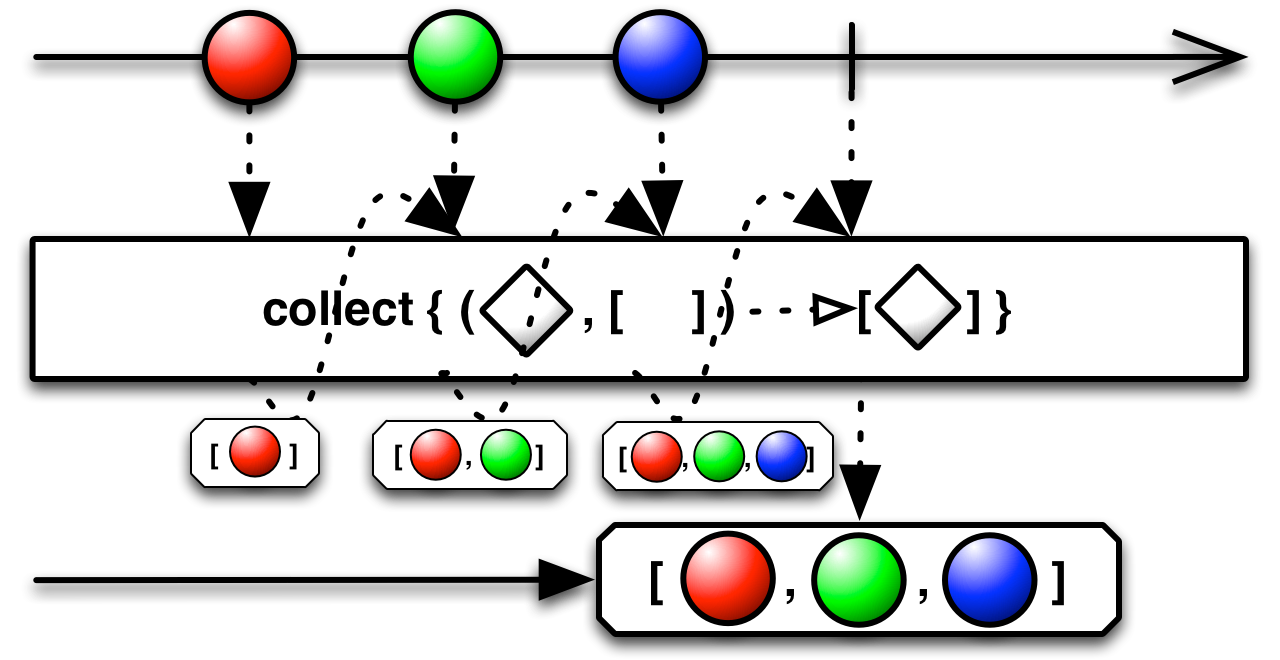
This is a simplified version of reduce that does not need to return the state on each pass.
- Scheduler:
collectdoes not operate by default on a particularScheduler.
Parameters
| initialValueSupplier | the mutable data structure that will collect the items |
|---|---|
| collector | a function that accepts the state and an emitted item, and modifies state
accordingly |
Returns
- a Single that emits the result of collecting the values emitted by the source ObservableSource into a single mutable data structure
public final Single<U> collectInto (U initialValue, BiConsumer<? super U, ? super T> collector)
Collects items emitted by the source ObservableSource into a single mutable data structure and returns a Single that emits this structure.

This is a simplified version of reduce that does not need to return the state on each pass.
- Scheduler:
collectIntodoes not operate by default on a particularScheduler.
Parameters
| initialValue | the mutable data structure that will collect the items |
|---|---|
| collector | a function that accepts the state and an emitted item, and modifies state
accordingly |
Returns
- a Single that emits the result of collecting the values emitted by the source ObservableSource into a single mutable data structure
public static Observable<R> combineLatest (ObservableSource<? extends T1> source1, ObservableSource<? extends T2> source2, ObservableSource<? extends T3> source3, Function3<? super T1, ? super T2, ? super T3, ? extends R> combiner)
Combines three source ObservableSources by emitting an item that aggregates the latest values of each of the source ObservableSources each time an item is received from any of the source ObservableSources, where this aggregation is defined by a specified function.
If any of the sources never produces an item but only terminates (normally or with an error), the resulting sequence terminates immediately (normally or with all the errors accumulated till that point). If that input source is also synchronous, other sources after it will not be subscribed to.
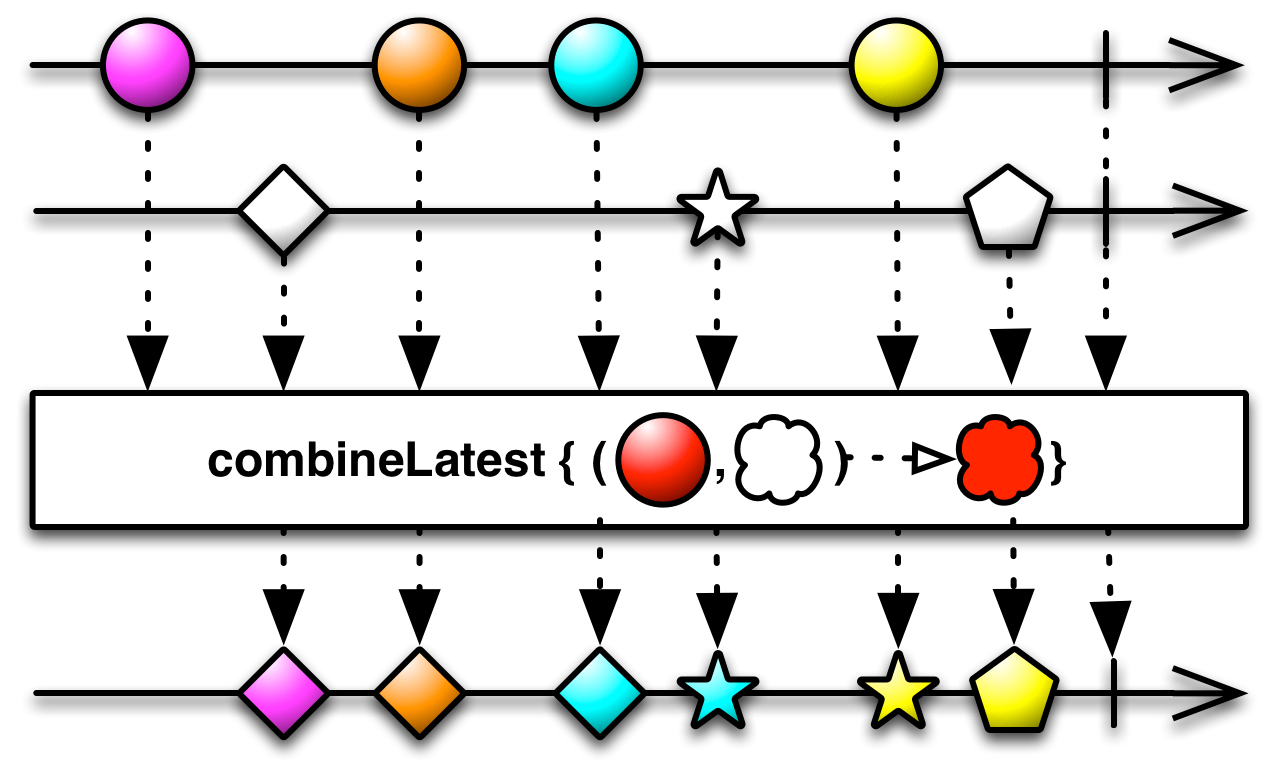
- Scheduler:
combineLatestdoes not operate by default on a particularScheduler.
Parameters
| source1 | the first source ObservableSource |
|---|---|
| source2 | the second source ObservableSource |
| source3 | the third source ObservableSource |
| combiner | the aggregation function used to combine the items emitted by the source ObservableSources |
Returns
- an Observable that emits items that are the result of combining the items emitted by the source ObservableSources by means of the given aggregation function
public static Observable<R> combineLatest (ObservableSource<? extends T1> source1, ObservableSource<? extends T2> source2, ObservableSource<? extends T3> source3, ObservableSource<? extends T4> source4, ObservableSource<? extends T5> source5, ObservableSource<? extends T6> source6, ObservableSource<? extends T7> source7, ObservableSource<? extends T8> source8, Function8<? super T1, ? super T2, ? super T3, ? super T4, ? super T5, ? super T6, ? super T7, ? super T8, ? extends R> combiner)
Combines eight source ObservableSources by emitting an item that aggregates the latest values of each of the source ObservableSources each time an item is received from any of the source ObservableSources, where this aggregation is defined by a specified function.
If any of the sources never produces an item but only terminates (normally or with an error), the resulting sequence terminates immediately (normally or with all the errors accumulated till that point). If that input source is also synchronous, other sources after it will not be subscribed to.

- Scheduler:
combineLatestdoes not operate by default on a particularScheduler.
Parameters
| source1 | the first source ObservableSource |
|---|---|
| source2 | the second source ObservableSource |
| source3 | the third source ObservableSource |
| source4 | the fourth source ObservableSource |
| source5 | the fifth source ObservableSource |
| source6 | the sixth source ObservableSource |
| source7 | the seventh source ObservableSource |
| source8 | the eighth source ObservableSource |
| combiner | the aggregation function used to combine the items emitted by the source ObservableSources |
Returns
- an Observable that emits items that are the result of combining the items emitted by the source ObservableSources by means of the given aggregation function
public static Observable<R> combineLatest (Iterable<? extends ObservableSource<? extends T>> sources, Function<? super Object[], ? extends R> combiner, int bufferSize)
Combines a collection of source ObservableSources by emitting an item that aggregates the latest values of each of the source ObservableSources each time an item is received from any of the source ObservableSources, where this aggregation is defined by a specified function.
Note on method signature: since Java doesn't allow creating a generic array with new T[], the
implementation of this operator has to create an Object[] instead. Unfortunately, a
Function<Integer[], R> passed to the method would trigger a ClassCastException.
If any of the sources never produces an item but only terminates (normally or with an error), the resulting sequence terminates immediately (normally or with all the errors accumulated till that point). If that input source is also synchronous, other sources after it will not be subscribed to.
If the provided iterable of ObservableSources is empty, the resulting sequence completes immediately without emitting any items and without any calls to the combiner function.

- Scheduler:
combineLatestdoes not operate by default on a particularScheduler.
Parameters
| sources | the collection of source ObservableSources |
|---|---|
| combiner | the aggregation function used to combine the items emitted by the source ObservableSources |
| bufferSize | the internal buffer size and prefetch amount applied to every source Observable |
Returns
- an Observable that emits items that are the result of combining the items emitted by the source ObservableSources by means of the given aggregation function
public static Observable<R> combineLatest (Iterable<? extends ObservableSource<? extends T>> sources, Function<? super Object[], ? extends R> combiner)
Combines a collection of source ObservableSources by emitting an item that aggregates the latest values of each of the source ObservableSources each time an item is received from any of the source ObservableSources, where this aggregation is defined by a specified function.
Note on method signature: since Java doesn't allow creating a generic array with new T[], the
implementation of this operator has to create an Object[] instead. Unfortunately, a
Function<Integer[], R> passed to the method would trigger a ClassCastException.
If any of the sources never produces an item but only terminates (normally or with an error), the resulting sequence terminates immediately (normally or with all the errors accumulated till that point). If that input source is also synchronous, other sources after it will not be subscribed to.
If the provided iterable of ObservableSources is empty, the resulting sequence completes immediately without emitting any items and without any calls to the combiner function.

- Scheduler:
combineLatestdoes not operate by default on a particularScheduler.
Parameters
| sources | the collection of source ObservableSources |
|---|---|
| combiner | the aggregation function used to combine the items emitted by the source ObservableSources |
Returns
- an Observable that emits items that are the result of combining the items emitted by the source ObservableSources by means of the given aggregation function
public static Observable<R> combineLatest (ObservableSource<? extends T1> source1, ObservableSource<? extends T2> source2, ObservableSource<? extends T3> source3, ObservableSource<? extends T4> source4, ObservableSource<? extends T5> source5, Function5<? super T1, ? super T2, ? super T3, ? super T4, ? super T5, ? extends R> combiner)
Combines five source ObservableSources by emitting an item that aggregates the latest values of each of the source ObservableSources each time an item is received from any of the source ObservableSources, where this aggregation is defined by a specified function.
If any of the sources never produces an item but only terminates (normally or with an error), the resulting sequence terminates immediately (normally or with all the errors accumulated till that point). If that input source is also synchronous, other sources after it will not be subscribed to.

- Scheduler:
combineLatestdoes not operate by default on a particularScheduler.
Parameters
| source1 | the first source ObservableSource |
|---|---|
| source2 | the second source ObservableSource |
| source3 | the third source ObservableSource |
| source4 | the fourth source ObservableSource |
| source5 | the fifth source ObservableSource |
| combiner | the aggregation function used to combine the items emitted by the source ObservableSources |
Returns
- an Observable that emits items that are the result of combining the items emitted by the source ObservableSources by means of the given aggregation function
public static Observable<R> combineLatest (ObservableSource<? extends T1> source1, ObservableSource<? extends T2> source2, BiFunction<? super T1, ? super T2, ? extends R> combiner)
Combines two source ObservableSources by emitting an item that aggregates the latest values of each of the source ObservableSources each time an item is received from either of the source ObservableSources, where this aggregation is defined by a specified function.
If any of the sources never produces an item but only terminates (normally or with an error), the resulting sequence terminates immediately (normally or with all the errors accumulated till that point). If that input source is also synchronous, other sources after it will not be subscribed to.

- Scheduler:
combineLatestdoes not operate by default on a particularScheduler.
Parameters
| source1 | the first source ObservableSource |
|---|---|
| source2 | the second source ObservableSource |
| combiner | the aggregation function used to combine the items emitted by the source ObservableSources |
Returns
- an Observable that emits items that are the result of combining the items emitted by the source ObservableSources by means of the given aggregation function
public static Observable<R> combineLatest (ObservableSource<? extends T1> source1, ObservableSource<? extends T2> source2, ObservableSource<? extends T3> source3, ObservableSource<? extends T4> source4, Function4<? super T1, ? super T2, ? super T3, ? super T4, ? extends R> combiner)
Combines four source ObservableSources by emitting an item that aggregates the latest values of each of the source ObservableSources each time an item is received from any of the source ObservableSources, where this aggregation is defined by a specified function.
If any of the sources never produces an item but only terminates (normally or with an error), the resulting sequence terminates immediately (normally or with all the errors accumulated till that point). If that input source is also synchronous, other sources after it will not be subscribed to.

- Scheduler:
combineLatestdoes not operate by default on a particularScheduler.
Parameters
| source1 | the first source ObservableSource |
|---|---|
| source2 | the second source ObservableSource |
| source3 | the third source ObservableSource |
| source4 | the fourth source ObservableSource |
| combiner | the aggregation function used to combine the items emitted by the source ObservableSources |
Returns
- an Observable that emits items that are the result of combining the items emitted by the source ObservableSources by means of the given aggregation function
public static Observable<R> combineLatest (ObservableSource[]<? extends T> sources, Function<? super Object[], ? extends R> combiner)
Combines a collection of source ObservableSources by emitting an item that aggregates the latest values of each of the source ObservableSources each time an item is received from any of the source ObservableSources, where this aggregation is defined by a specified function.
Note on method signature: since Java doesn't allow creating a generic array with new T[], the
implementation of this operator has to create an Object[] instead. Unfortunately, a
Function<Integer[], R> passed to the method would trigger a ClassCastException.
If any of the sources never produces an item but only terminates (normally or with an error), the resulting sequence terminates immediately (normally or with all the errors accumulated till that point). If that input source is also synchronous, other sources after it will not be subscribed to.
If the provided array of ObservableSources is empty, the resulting sequence completes immediately without emitting any items and without any calls to the combiner function.

- Scheduler:
combineLatestdoes not operate by default on a particularScheduler.
Parameters
| sources | the collection of source ObservableSources |
|---|---|
| combiner | the aggregation function used to combine the items emitted by the source ObservableSources |
Returns
- an Observable that emits items that are the result of combining the items emitted by the source ObservableSources by means of the given aggregation function
public static Observable<R> combineLatest (ObservableSource<? extends T1> source1, ObservableSource<? extends T2> source2, ObservableSource<? extends T3> source3, ObservableSource<? extends T4> source4, ObservableSource<? extends T5> source5, ObservableSource<? extends T6> source6, ObservableSource<? extends T7> source7, Function7<? super T1, ? super T2, ? super T3, ? super T4, ? super T5, ? super T6, ? super T7, ? extends R> combiner)
Combines seven source ObservableSources by emitting an item that aggregates the latest values of each of the source ObservableSources each time an item is received from any of the source ObservableSources, where this aggregation is defined by a specified function.
If any of the sources never produces an item but only terminates (normally or with an error), the resulting sequence terminates immediately (normally or with all the errors accumulated till that point). If that input source is also synchronous, other sources after it will not be subscribed to.

- Scheduler:
combineLatestdoes not operate by default on a particularScheduler.
Parameters
| source1 | the first source ObservableSource |
|---|---|
| source2 | the second source ObservableSource |
| source3 | the third source ObservableSource |
| source4 | the fourth source ObservableSource |
| source5 | the fifth source ObservableSource |
| source6 | the sixth source ObservableSource |
| source7 | the seventh source ObservableSource |
| combiner | the aggregation function used to combine the items emitted by the source ObservableSources |
Returns
- an Observable that emits items that are the result of combining the items emitted by the source ObservableSources by means of the given aggregation function
public static Observable<R> combineLatest (ObservableSource[]<? extends T> sources, Function<? super Object[], ? extends R> combiner, int bufferSize)
Combines a collection of source ObservableSources by emitting an item that aggregates the latest values of each of the source ObservableSources each time an item is received from any of the source ObservableSources, where this aggregation is defined by a specified function.
Note on method signature: since Java doesn't allow creating a generic array with new T[], the
implementation of this operator has to create an Object[] instead. Unfortunately, a
Function<Integer[], R> passed to the method would trigger a ClassCastException.
If any of the sources never produces an item but only terminates (normally or with an error), the resulting sequence terminates immediately (normally or with all the errors accumulated till that point). If that input source is also synchronous, other sources after it will not be subscribed to.
If the provided array of ObservableSources is empty, the resulting sequence completes immediately without emitting any items and without any calls to the combiner function.

- Scheduler:
combineLatestdoes not operate by default on a particularScheduler.
Parameters
| sources | the collection of source ObservableSources |
|---|---|
| combiner | the aggregation function used to combine the items emitted by the source ObservableSources |
| bufferSize | the internal buffer size and prefetch amount applied to every source Observable |
Returns
- an Observable that emits items that are the result of combining the items emitted by the source ObservableSources by means of the given aggregation function
public static Observable<R> combineLatest (ObservableSource<? extends T1> source1, ObservableSource<? extends T2> source2, ObservableSource<? extends T3> source3, ObservableSource<? extends T4> source4, ObservableSource<? extends T5> source5, ObservableSource<? extends T6> source6, Function6<? super T1, ? super T2, ? super T3, ? super T4, ? super T5, ? super T6, ? extends R> combiner)
Combines six source ObservableSources by emitting an item that aggregates the latest values of each of the source ObservableSources each time an item is received from any of the source ObservableSources, where this aggregation is defined by a specified function.
If any of the sources never produces an item but only terminates (normally or with an error), the resulting sequence terminates immediately (normally or with all the errors accumulated till that point). If that input source is also synchronous, other sources after it will not be subscribed to.

- Scheduler:
combineLatestdoes not operate by default on a particularScheduler.
Parameters
| source1 | the first source ObservableSource |
|---|---|
| source2 | the second source ObservableSource |
| source3 | the third source ObservableSource |
| source4 | the fourth source ObservableSource |
| source5 | the fifth source ObservableSource |
| source6 | the sixth source ObservableSource |
| combiner | the aggregation function used to combine the items emitted by the source ObservableSources |
Returns
- an Observable that emits items that are the result of combining the items emitted by the source ObservableSources by means of the given aggregation function
public static Observable<R> combineLatest (Function<? super Object[], ? extends R> combiner, int bufferSize, ObservableSource...<? extends T> sources)
Combines a collection of source ObservableSources by emitting an item that aggregates the latest values of each of the source ObservableSources each time an item is received from any of the source ObservableSources, where this aggregation is defined by a specified function.
Note on method signature: since Java doesn't allow creating a generic array with new T[], the
implementation of this operator has to create an Object[] instead. Unfortunately, a
Function<Integer[], R> passed to the method would trigger a ClassCastException.
If any of the sources never produces an item but only terminates (normally or with an error), the resulting sequence terminates immediately (normally or with all the errors accumulated till that point). If that input source is also synchronous, other sources after it will not be subscribed to.
If there are no ObservableSources provided, the resulting sequence completes immediately without emitting any items and without any calls to the combiner function.

- Scheduler:
combineLatestdoes not operate by default on a particularScheduler.
Parameters
| combiner | the aggregation function used to combine the items emitted by the source ObservableSources |
|---|---|
| bufferSize | the internal buffer size and prefetch amount applied to every source Observable |
| sources | the collection of source ObservableSources |
Returns
- an Observable that emits items that are the result of combining the items emitted by the source ObservableSources by means of the given aggregation function
public static Observable<R> combineLatest (ObservableSource<? extends T1> source1, ObservableSource<? extends T2> source2, ObservableSource<? extends T3> source3, ObservableSource<? extends T4> source4, ObservableSource<? extends T5> source5, ObservableSource<? extends T6> source6, ObservableSource<? extends T7> source7, ObservableSource<? extends T8> source8, ObservableSource<? extends T9> source9, Function9<? super T1, ? super T2, ? super T3, ? super T4, ? super T5, ? super T6, ? super T7, ? super T8, ? super T9, ? extends R> combiner)
Combines nine source ObservableSources by emitting an item that aggregates the latest values of each of the source ObservableSources each time an item is received from any of the source ObservableSources, where this aggregation is defined by a specified function.
If any of the sources never produces an item but only terminates (normally or with an error), the resulting sequence terminates immediately (normally or with all the errors accumulated till that point). If that input source is also synchronous, other sources after it will not be subscribed to.

- Scheduler:
combineLatestdoes not operate by default on a particularScheduler.
Parameters
| source1 | the first source ObservableSource |
|---|---|
| source2 | the second source ObservableSource |
| source3 | the third source ObservableSource |
| source4 | the fourth source ObservableSource |
| source5 | the fifth source ObservableSource |
| source6 | the sixth source ObservableSource |
| source7 | the seventh source ObservableSource |
| source8 | the eighth source ObservableSource |
| source9 | the ninth source ObservableSource |
| combiner | the aggregation function used to combine the items emitted by the source ObservableSources |
Returns
- an Observable that emits items that are the result of combining the items emitted by the source ObservableSources by means of the given aggregation function
public static Observable<R> combineLatestDelayError (Iterable<? extends ObservableSource<? extends T>> sources, Function<? super Object[], ? extends R> combiner, int bufferSize)
Combines a collection of source ObservableSources by emitting an item that aggregates the latest values of each of the source ObservableSources each time an item is received from any of the source ObservableSources, where this aggregation is defined by a specified function and delays any error from the sources until all source ObservableSources terminate.
Note on method signature: since Java doesn't allow creating a generic array with new T[], the
implementation of this operator has to create an Object[] instead. Unfortunately, a
Function<Integer[], R> passed to the method would trigger a ClassCastException.
If any of the sources never produces an item but only terminates (normally or with an error), the resulting sequence terminates immediately (normally or with all the errors accumulated till that point). If that input source is also synchronous, other sources after it will not be subscribed to.
If the provided iterable of ObservableSources is empty, the resulting sequence completes immediately without emitting any items and without any calls to the combiner function.
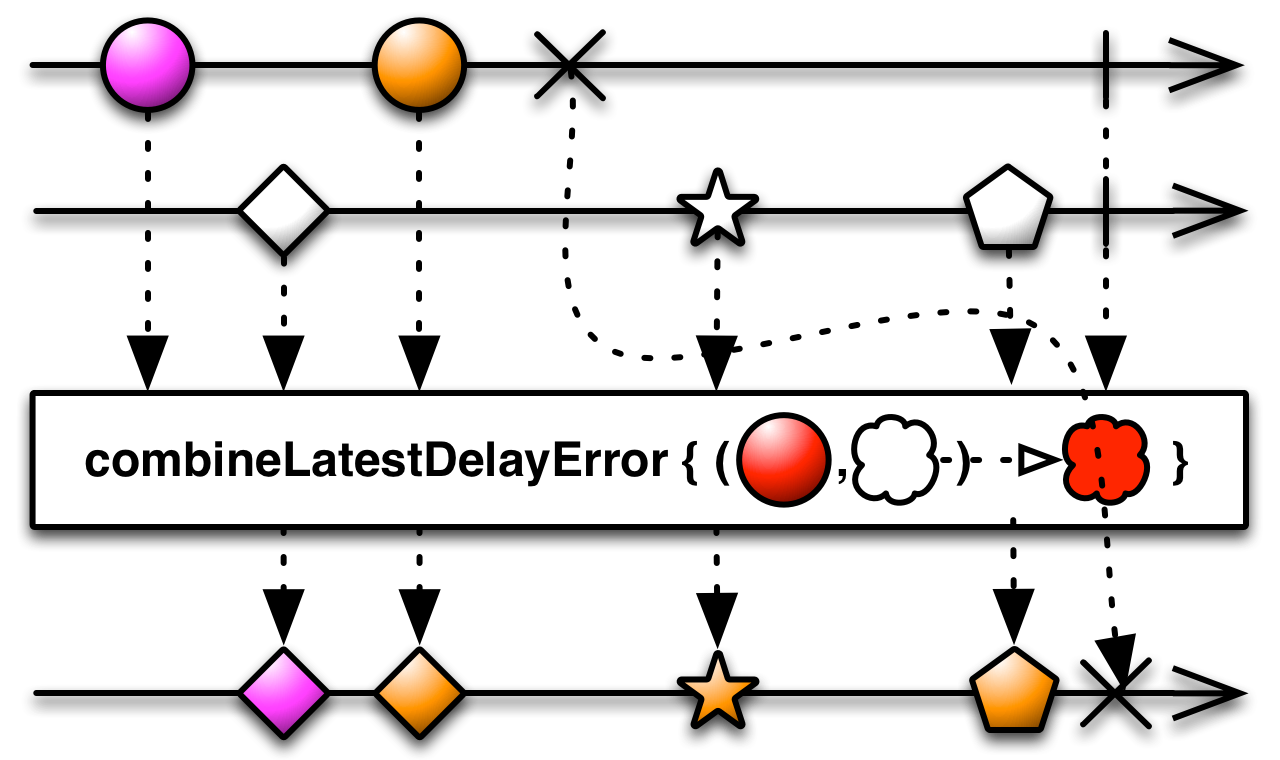
- Scheduler:
combineLatestDelayErrordoes not operate by default on a particularScheduler.
Parameters
| sources | the collection of source ObservableSources |
|---|---|
| combiner | the aggregation function used to combine the items emitted by the source ObservableSources |
| bufferSize | the internal buffer size and prefetch amount applied to every source Observable |
Returns
- an Observable that emits items that are the result of combining the items emitted by the source ObservableSources by means of the given aggregation function
public static Observable<R> combineLatestDelayError (Function<? super Object[], ? extends R> combiner, int bufferSize, ObservableSource...<? extends T> sources)
Combines a collection of source ObservableSources by emitting an item that aggregates the latest values of each of the source ObservableSources each time an item is received from any of the source ObservableSources, where this aggregation is defined by a specified function and delays any error from the sources until all source ObservableSources terminate.

Note on method signature: since Java doesn't allow creating a generic array with new T[], the
implementation of this operator has to create an Object[] instead. Unfortunately, a
Function<Integer[], R> passed to the method would trigger a ClassCastException.
If any of the sources never produces an item but only terminates (normally or with an error), the resulting sequence terminates immediately (normally or with all the errors accumulated till that point). If that input source is also synchronous, other sources after it will not be subscribed to.
If there are no ObservableSources provided, the resulting sequence completes immediately without emitting any items and without any calls to the combiner function.
- Scheduler:
combineLatestDelayErrordoes not operate by default on a particularScheduler.
Parameters
| combiner | the aggregation function used to combine the items emitted by the source ObservableSources |
|---|---|
| bufferSize | the internal buffer size and prefetch amount applied to every source Observable |
| sources | the collection of source ObservableSources |
Returns
- an Observable that emits items that are the result of combining the items emitted by the source ObservableSources by means of the given aggregation function
public static Observable<R> combineLatestDelayError (Iterable<? extends ObservableSource<? extends T>> sources, Function<? super Object[], ? extends R> combiner)
Combines a collection of source ObservableSources by emitting an item that aggregates the latest values of each of the source ObservableSources each time an item is received from any of the source ObservableSources, where this aggregation is defined by a specified function and delays any error from the sources until all source ObservableSources terminate.
Note on method signature: since Java doesn't allow creating a generic array with new T[], the
implementation of this operator has to create an Object[] instead. Unfortunately, a
Function<Integer[], R> passed to the method would trigger a ClassCastException.
If any of the sources never produces an item but only terminates (normally or with an error), the resulting sequence terminates immediately (normally or with all the errors accumulated till that point). If that input source is also synchronous, other sources after it will not be subscribed to.
If the provided iterable of ObservableSources is empty, the resulting sequence completes immediately without emitting any items and without any calls to the combiner function.

- Scheduler:
combineLatestDelayErrordoes not operate by default on a particularScheduler.
Parameters
| sources | the collection of source ObservableSources |
|---|---|
| combiner | the aggregation function used to combine the items emitted by the source ObservableSources |
Returns
- an Observable that emits items that are the result of combining the items emitted by the source ObservableSources by means of the given aggregation function
public static Observable<R> combineLatestDelayError (ObservableSource[]<? extends T> sources, Function<? super Object[], ? extends R> combiner, int bufferSize)
Combines a collection of source ObservableSources by emitting an item that aggregates the latest values of each of the source ObservableSources each time an item is received from any of the source ObservableSources, where this aggregation is defined by a specified function and delays any error from the sources until all source ObservableSources terminate.
Note on method signature: since Java doesn't allow creating a generic array with new T[], the
implementation of this operator has to create an Object[] instead. Unfortunately, a
Function<Integer[], R> passed to the method would trigger a ClassCastException.
If any of the sources never produces an item but only terminates (normally or with an error), the resulting sequence terminates immediately (normally or with all the errors accumulated till that point). If that input source is also synchronous, other sources after it will not be subscribed to.
If the provided array of ObservableSources is empty, the resulting sequence completes immediately without emitting any items and without any calls to the combiner function.

- Scheduler:
combineLatestDelayErrordoes not operate by default on a particularScheduler.
Parameters
| sources | the collection of source ObservableSources |
|---|---|
| combiner | the aggregation function used to combine the items emitted by the source ObservableSources |
| bufferSize | the internal buffer size and prefetch amount applied to every source Observable |
Returns
- an Observable that emits items that are the result of combining the items emitted by the source ObservableSources by means of the given aggregation function
public static Observable<R> combineLatestDelayError (ObservableSource[]<? extends T> sources, Function<? super Object[], ? extends R> combiner)
Combines a collection of source ObservableSources by emitting an item that aggregates the latest values of each of the source ObservableSources each time an item is received from any of the source ObservableSources, where this aggregation is defined by a specified function.

Note on method signature: since Java doesn't allow creating a generic array with new T[], the
implementation of this operator has to create an Object[] instead. Unfortunately, a
Function<Integer[], R> passed to the method would trigger a ClassCastException.
If any of the sources never produces an item but only terminates (normally or with an error), the resulting sequence terminates immediately (normally or with all the errors accumulated till that point). If that input source is also synchronous, other sources after it will not be subscribed to.
If the provided array of ObservableSources is empty, the resulting sequence completes immediately without emitting any items and without any calls to the combiner function.
- Scheduler:
combineLatestDelayErrordoes not operate by default on a particularScheduler.
Parameters
| sources | the collection of source ObservableSources |
|---|---|
| combiner | the aggregation function used to combine the items emitted by the source ObservableSources |
Returns
- an Observable that emits items that are the result of combining the items emitted by the source ObservableSources by means of the given aggregation function
public final Observable<R> compose (ObservableTransformer<? super T, ? extends R> composer)
Transform an ObservableSource by applying a particular Transformer function to it.
This method operates on the ObservableSource itself whereas lift(ObservableOperator) operates on the ObservableSource's
Observers.
If the operator you are creating is designed to act on the individual items emitted by a source
ObservableSource, use lift(ObservableOperator). If your operator is designed to transform the source ObservableSource as a whole
(for instance, by applying a particular set of existing RxJava operators to it) use compose.
- Scheduler:
composedoes not operate by default on a particularScheduler.
Parameters
| composer | implements the function that transforms the source ObservableSource |
|---|
Returns
- the source ObservableSource, transformed by the transformer function
public static Observable<T> concat (ObservableSource<? extends T> source1, ObservableSource<? extends T> source2, ObservableSource<? extends T> source3)
Returns an Observable that emits the items emitted by three ObservableSources, one after the other, without interleaving them.
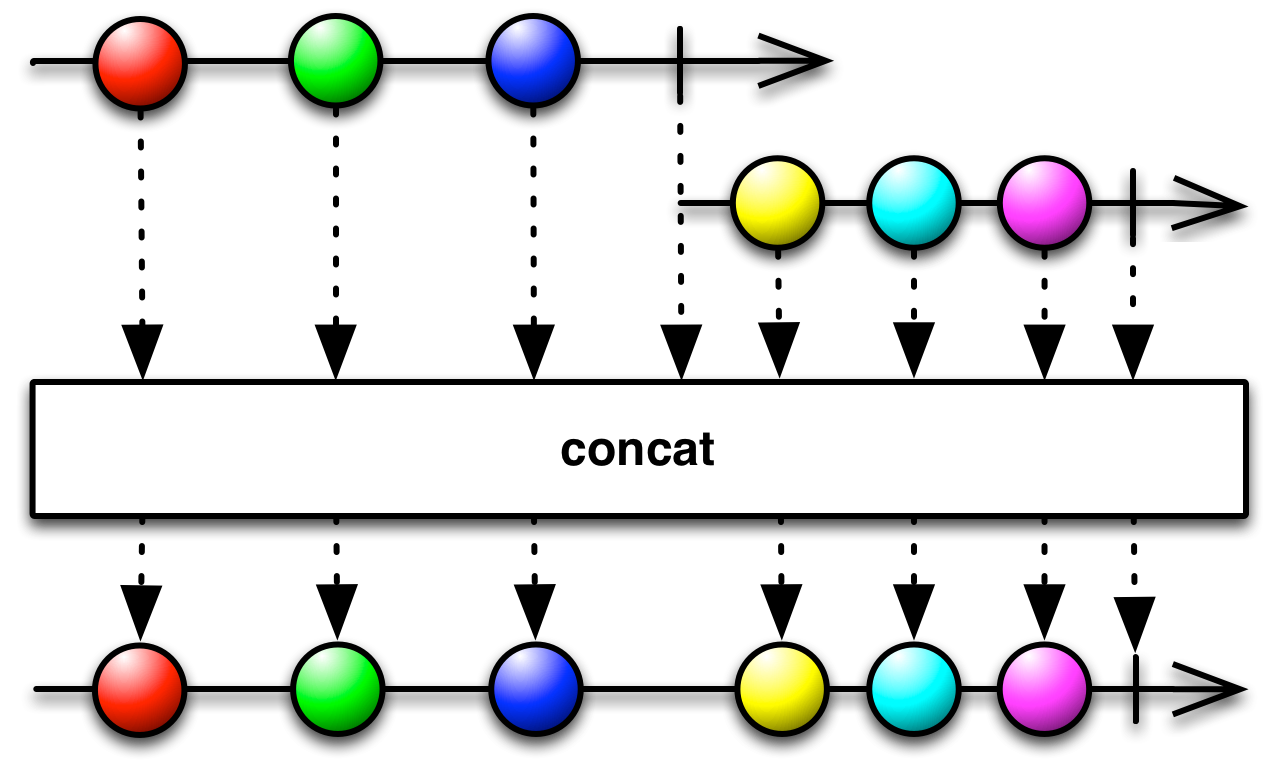
- Scheduler:
concatdoes not operate by default on a particularScheduler.
Parameters
| source1 | an ObservableSource to be concatenated |
|---|---|
| source2 | an ObservableSource to be concatenated |
| source3 | an ObservableSource to be concatenated |
Returns
- an Observable that emits items emitted by the three source ObservableSources, one after the other, without interleaving them
public static Observable<T> concat (ObservableSource<? extends ObservableSource<? extends T>> sources, int prefetch)
Returns an Observable that emits the items emitted by each of the ObservableSources emitted by the source ObservableSource, one after the other, without interleaving them.

- Scheduler:
concatdoes not operate by default on a particularScheduler.
Parameters
| sources | an ObservableSource that emits ObservableSources |
|---|---|
| prefetch | the number of ObservableSources to prefetch from the sources sequence. |
Returns
- an Observable that emits items all of the items emitted by the ObservableSources emitted by
ObservableSources, one after the other, without interleaving them
public static Observable<T> concat (ObservableSource<? extends ObservableSource<? extends T>> sources)
Returns an Observable that emits the items emitted by each of the ObservableSources emitted by the source ObservableSource, one after the other, without interleaving them.

- Scheduler:
concatdoes not operate by default on a particularScheduler.
Parameters
| sources | an ObservableSource that emits ObservableSources |
|---|
Returns
- an Observable that emits items all of the items emitted by the ObservableSources emitted by
ObservableSources, one after the other, without interleaving them
public static Observable<T> concat (ObservableSource<? extends T> source1, ObservableSource<? extends T> source2)
Returns an Observable that emits the items emitted by two ObservableSources, one after the other, without interleaving them.

- Scheduler:
concatdoes not operate by default on a particularScheduler.
Parameters
| source1 | an ObservableSource to be concatenated |
|---|---|
| source2 | an ObservableSource to be concatenated |
Returns
- an Observable that emits items emitted by the two source ObservableSources, one after the other, without interleaving them
public static Observable<T> concat (Iterable<? extends ObservableSource<? extends T>> sources)
Concatenates elements of each ObservableSource provided via an Iterable sequence into a single sequence of elements without interleaving them.

- Scheduler:
concatdoes not operate by default on a particularScheduler.
Parameters
| sources | the Iterable sequence of ObservableSources |
|---|
Returns
- the new Observable instance
public static Observable<T> concat (ObservableSource<? extends T> source1, ObservableSource<? extends T> source2, ObservableSource<? extends T> source3, ObservableSource<? extends T> source4)
Returns an Observable that emits the items emitted by four ObservableSources, one after the other, without interleaving them.

- Scheduler:
concatdoes not operate by default on a particularScheduler.
Parameters
| source1 | an ObservableSource to be concatenated |
|---|---|
| source2 | an ObservableSource to be concatenated |
| source3 | an ObservableSource to be concatenated |
| source4 | an ObservableSource to be concatenated |
Returns
- an Observable that emits items emitted by the four source ObservableSources, one after the other, without interleaving them
public static Observable<T> concatArray (ObservableSource...<? extends T> sources)
Concatenates a variable number of ObservableSource sources.
Note: named this way because of overload conflict with concat(ObservableSource<ObservableSource>)
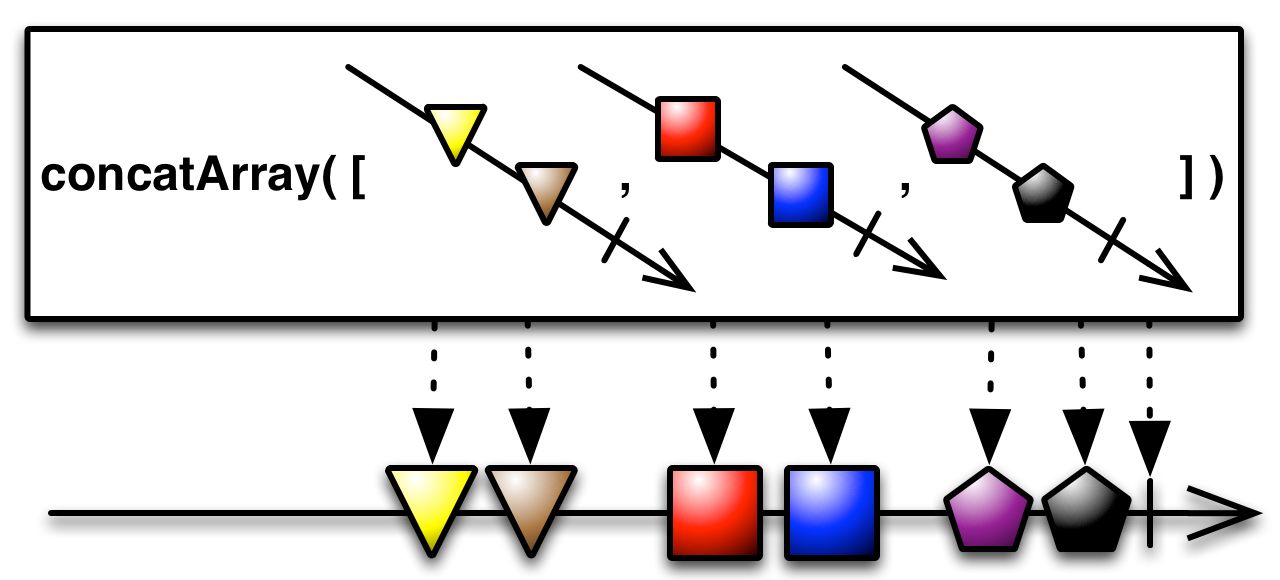
- Scheduler:
concatArraydoes not operate by default on a particularScheduler.
Parameters
| sources | the array of sources |
|---|
Returns
- the new Observable instance
Throws
| NullPointerException | if sources is null |
|---|
public static Observable<T> concatArrayDelayError (ObservableSource...<? extends T> sources)
Concatenates a variable number of ObservableSource sources and delays errors from any of them till all terminate.

- Scheduler:
concatArrayDelayErrordoes not operate by default on a particularScheduler.
Parameters
| sources | the array of sources |
|---|
Returns
- the new Observable instance
Throws
| NullPointerException | if sources is null |
|---|
public static Observable<T> concatArrayEager (ObservableSource...<? extends T> sources)
Concatenates a sequence of ObservableSources eagerly into a single stream of values.
Eager concatenation means that once a subscriber subscribes, this operator subscribes to all of the source ObservableSources. The operator buffers the values emitted by these ObservableSources and then drains them in order, each one after the previous one completes.
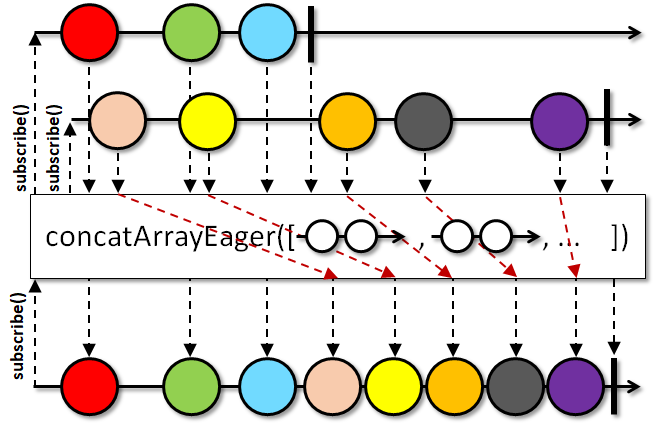
- Scheduler:
- This method does not operate by default on a particular
Scheduler.
Parameters
| sources | a sequence of ObservableSources that need to be eagerly concatenated |
|---|
Returns
- the new ObservableSource instance with the specified concatenation behavior
public static Observable<T> concatArrayEager (int maxConcurrency, int prefetch, ObservableSource...<? extends T> sources)
Concatenates a sequence of ObservableSources eagerly into a single stream of values.
Eager concatenation means that once a subscriber subscribes, this operator subscribes to all of the source ObservableSources. The operator buffers the values emitted by these ObservableSources and then drains them in order, each one after the previous one completes.
- Scheduler:
- This method does not operate by default on a particular
Scheduler.
Parameters
| maxConcurrency | the maximum number of concurrent subscriptions at a time, Integer.MAX_VALUE is interpreted as indication to subscribe to all sources at once |
|---|---|
| prefetch | the number of elements to prefetch from each ObservableSource source |
| sources | a sequence of ObservableSources that need to be eagerly concatenated |
Returns
- the new ObservableSource instance with the specified concatenation behavior
public static Observable<T> concatDelayError (Iterable<? extends ObservableSource<? extends T>> sources)
Concatenates the Iterable sequence of ObservableSources into a single sequence by subscribing to each ObservableSource, one after the other, one at a time and delays any errors till the all inner ObservableSources terminate.
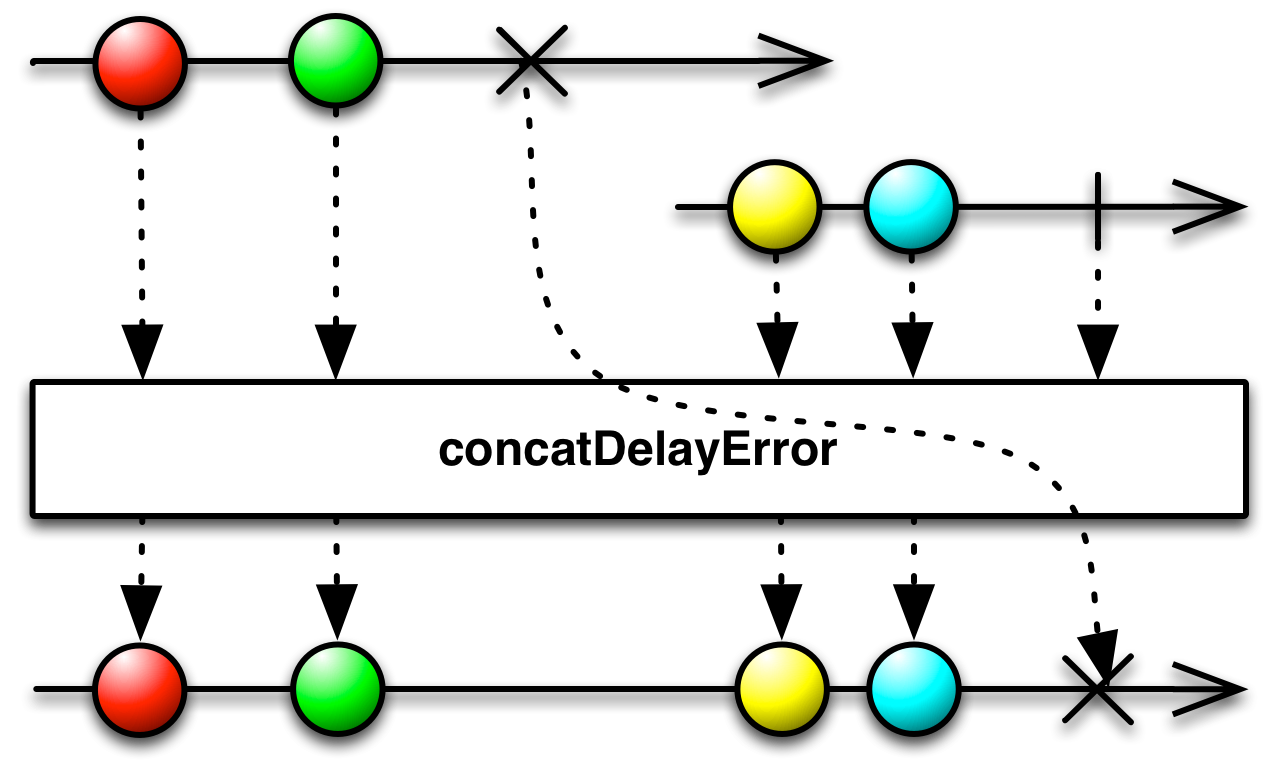
- Scheduler:
concatDelayErrordoes not operate by default on a particularScheduler.
Parameters
| sources | the Iterable sequence of ObservableSources |
|---|
Returns
- the new ObservableSource with the concatenating behavior
public static Observable<T> concatDelayError (ObservableSource<? extends ObservableSource<? extends T>> sources, int prefetch, boolean tillTheEnd)
Concatenates the ObservableSource sequence of ObservableSources into a single sequence by subscribing to each inner ObservableSource, one after the other, one at a time and delays any errors till the all inner and the outer ObservableSources terminate.

- Scheduler:
concatDelayErrordoes not operate by default on a particularScheduler.
Parameters
| sources | the ObservableSource sequence of ObservableSources |
|---|---|
| prefetch | the number of elements to prefetch from the outer ObservableSource |
| tillTheEnd | if true exceptions from the outer and all inner ObservableSources are delayed to the end if false, exception from the outer ObservableSource is delayed till the current ObservableSource terminates |
Returns
- the new ObservableSource with the concatenating behavior
public static Observable<T> concatDelayError (ObservableSource<? extends ObservableSource<? extends T>> sources)
Concatenates the ObservableSource sequence of ObservableSources into a single sequence by subscribing to each inner ObservableSource, one after the other, one at a time and delays any errors till the all inner and the outer ObservableSources terminate.

- Scheduler:
concatDelayErrordoes not operate by default on a particularScheduler.
Parameters
| sources | the ObservableSource sequence of ObservableSources |
|---|
Returns
- the new ObservableSource with the concatenating behavior
public static Observable<T> concatEager (ObservableSource<? extends ObservableSource<? extends T>> sources, int maxConcurrency, int prefetch)
Concatenates an ObservableSource sequence of ObservableSources eagerly into a single stream of values.
Eager concatenation means that once a subscriber subscribes, this operator subscribes to all of the emitted source ObservableSources as they are observed. The operator buffers the values emitted by these ObservableSources and then drains them in order, each one after the previous one completes.
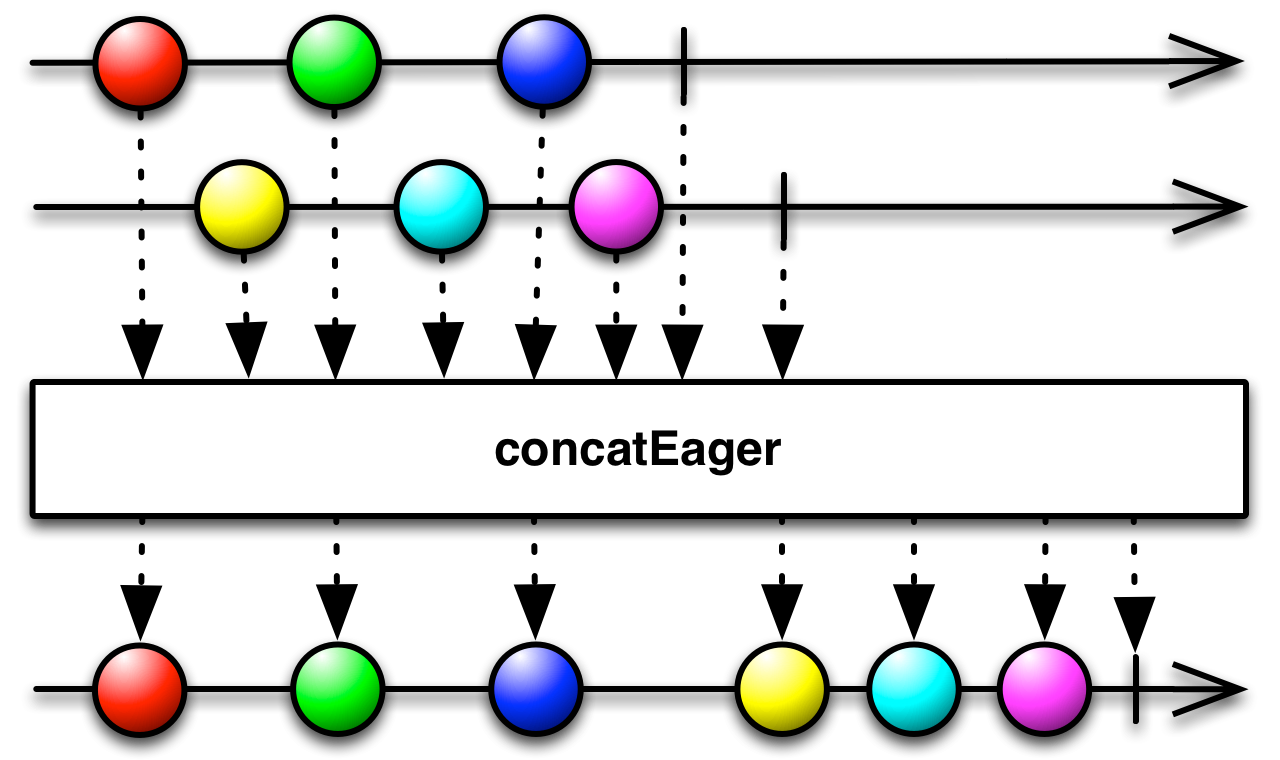
- Scheduler:
- This method does not operate by default on a particular
Scheduler.
Parameters
| sources | a sequence of ObservableSources that need to be eagerly concatenated |
|---|---|
| maxConcurrency | the maximum number of concurrently running inner ObservableSources; Integer.MAX_VALUE is interpreted as all inner ObservableSources can be active at the same time |
| prefetch | the number of elements to prefetch from each inner ObservableSource source |
Returns
- the new ObservableSource instance with the specified concatenation behavior
public static Observable<T> concatEager (Iterable<? extends ObservableSource<? extends T>> sources, int maxConcurrency, int prefetch)
Concatenates a sequence of ObservableSources eagerly into a single stream of values.
Eager concatenation means that once a subscriber subscribes, this operator subscribes to all of the source ObservableSources. The operator buffers the values emitted by these ObservableSources and then drains them in order, each one after the previous one completes.

- Scheduler:
- This method does not operate by default on a particular
Scheduler.
Parameters
| sources | a sequence of ObservableSources that need to be eagerly concatenated |
|---|---|
| maxConcurrency | the maximum number of concurrently running inner ObservableSources; Integer.MAX_VALUE is interpreted as all inner ObservableSources can be active at the same time |
| prefetch | the number of elements to prefetch from each inner ObservableSource source |
Returns
- the new ObservableSource instance with the specified concatenation behavior
public static Observable<T> concatEager (Iterable<? extends ObservableSource<? extends T>> sources)
Concatenates a sequence of ObservableSources eagerly into a single stream of values.
Eager concatenation means that once a subscriber subscribes, this operator subscribes to all of the source ObservableSources. The operator buffers the values emitted by these ObservableSources and then drains them in order, each one after the previous one completes.

- Scheduler:
- This method does not operate by default on a particular
Scheduler.
Parameters
| sources | a sequence of ObservableSources that need to be eagerly concatenated |
|---|
Returns
- the new ObservableSource instance with the specified concatenation behavior
public static Observable<T> concatEager (ObservableSource<? extends ObservableSource<? extends T>> sources)
Concatenates an ObservableSource sequence of ObservableSources eagerly into a single stream of values.
Eager concatenation means that once a subscriber subscribes, this operator subscribes to all of the emitted source ObservableSources as they are observed. The operator buffers the values emitted by these ObservableSources and then drains them in order, each one after the previous one completes.

- Scheduler:
- This method does not operate by default on a particular
Scheduler.
Parameters
| sources | a sequence of ObservableSources that need to be eagerly concatenated |
|---|
Returns
- the new ObservableSource instance with the specified concatenation behavior
public final Observable<R> concatMap (Function<? super T, ? extends ObservableSource<? extends R>> mapper, int prefetch)
Returns a new Observable that emits items resulting from applying a function that you supply to each item emitted by the source ObservableSource, where that function returns an ObservableSource, and then emitting the items that result from concatenating those resulting ObservableSources.
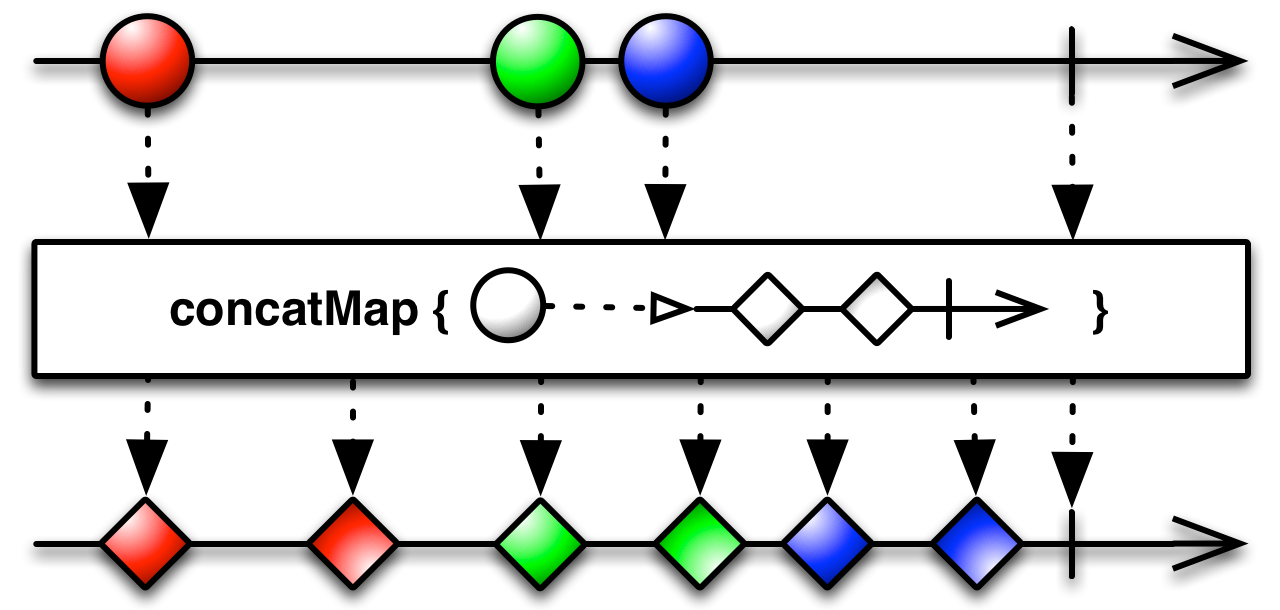
- Scheduler:
concatMapdoes not operate by default on a particularScheduler.
Parameters
| mapper | a function that, when applied to an item emitted by the source ObservableSource, returns an ObservableSource |
|---|---|
| prefetch | the number of elements to prefetch from the current Observable |
Returns
- an Observable that emits the result of applying the transformation function to each item emitted by the source ObservableSource and concatenating the ObservableSources obtained from this transformation
public final Observable<R> concatMap (Function<? super T, ? extends ObservableSource<? extends R>> mapper)
Returns a new Observable that emits items resulting from applying a function that you supply to each item emitted by the source ObservableSource, where that function returns an ObservableSource, and then emitting the items that result from concatenating those resulting ObservableSources.

- Scheduler:
concatMapdoes not operate by default on a particularScheduler.
Parameters
| mapper | a function that, when applied to an item emitted by the source ObservableSource, returns an ObservableSource |
|---|
Returns
- an Observable that emits the result of applying the transformation function to each item emitted by the source ObservableSource and concatenating the ObservableSources obtained from this transformation
public final Observable<R> concatMapDelayError (Function<? super T, ? extends ObservableSource<? extends R>> mapper)
Maps each of the items into an ObservableSource, subscribes to them one after the other, one at a time and emits their values in order while delaying any error from either this or any of the inner ObservableSources till all of them terminate.
- Scheduler:
concatMapDelayErrordoes not operate by default on a particularScheduler.
Parameters
| mapper | the function that maps the items of this ObservableSource into the inner ObservableSources. |
|---|
Returns
- the new ObservableSource instance with the concatenation behavior
public final Observable<R> concatMapDelayError (Function<? super T, ? extends ObservableSource<? extends R>> mapper, int prefetch, boolean tillTheEnd)
Maps each of the items into an ObservableSource, subscribes to them one after the other, one at a time and emits their values in order while delaying any error from either this or any of the inner ObservableSources till all of them terminate.
- Scheduler:
concatMapDelayErrordoes not operate by default on a particularScheduler.
Parameters
| mapper | the function that maps the items of this ObservableSource into the inner ObservableSources. |
|---|---|
| prefetch | the number of elements to prefetch from the current Observable |
| tillTheEnd | if true, all errors from the outer and inner ObservableSource sources are delayed until the end, if false, an error from the main source is signalled when the current ObservableSource source terminates |
Returns
- the new ObservableSource instance with the concatenation behavior
public final Observable<R> concatMapEager (Function<? super T, ? extends ObservableSource<? extends R>> mapper)
Maps a sequence of values into ObservableSources and concatenates these ObservableSources eagerly into a single ObservableSource.
Eager concatenation means that once a subscriber subscribes, this operator subscribes to all of the source ObservableSources. The operator buffers the values emitted by these ObservableSources and then drains them in order, each one after the previous one completes.
- Scheduler:
- This method does not operate by default on a particular
Scheduler.
Parameters
| mapper | the function that maps a sequence of values into a sequence of ObservableSources that will be eagerly concatenated |
|---|
Returns
- the new ObservableSource instance with the specified concatenation behavior
public final Observable<R> concatMapEager (Function<? super T, ? extends ObservableSource<? extends R>> mapper, int maxConcurrency, int prefetch)
Maps a sequence of values into ObservableSources and concatenates these ObservableSources eagerly into a single ObservableSource.
Eager concatenation means that once a subscriber subscribes, this operator subscribes to all of the source ObservableSources. The operator buffers the values emitted by these ObservableSources and then drains them in order, each one after the previous one completes.
- Scheduler:
- This method does not operate by default on a particular
Scheduler.
Parameters
| mapper | the function that maps a sequence of values into a sequence of ObservableSources that will be eagerly concatenated |
|---|---|
| maxConcurrency | the maximum number of concurrent subscribed ObservableSources |
| prefetch | hints about the number of expected values from each inner ObservableSource, must be positive |
Returns
- the new ObservableSource instance with the specified concatenation behavior
public final Observable<R> concatMapEagerDelayError (Function<? super T, ? extends ObservableSource<? extends R>> mapper, boolean tillTheEnd)
Maps a sequence of values into ObservableSources and concatenates these ObservableSources eagerly into a single ObservableSource.
Eager concatenation means that once a subscriber subscribes, this operator subscribes to all of the source ObservableSources. The operator buffers the values emitted by these ObservableSources and then drains them in order, each one after the previous one completes.
- Scheduler:
- This method does not operate by default on a particular
Scheduler.
Parameters
| mapper | the function that maps a sequence of values into a sequence of ObservableSources that will be eagerly concatenated |
|---|---|
| tillTheEnd | if true, all errors from the outer and inner ObservableSource sources are delayed until the end, if false, an error from the main source is signalled when the current ObservableSource source terminates |
Returns
- the new ObservableSource instance with the specified concatenation behavior
public final Observable<R> concatMapEagerDelayError (Function<? super T, ? extends ObservableSource<? extends R>> mapper, int maxConcurrency, int prefetch, boolean tillTheEnd)
Maps a sequence of values into ObservableSources and concatenates these ObservableSources eagerly into a single ObservableSource.
Eager concatenation means that once a subscriber subscribes, this operator subscribes to all of the source ObservableSources. The operator buffers the values emitted by these ObservableSources and then drains them in order, each one after the previous one completes.
- Scheduler:
- This method does not operate by default on a particular
Scheduler.
Parameters
| mapper | the function that maps a sequence of values into a sequence of ObservableSources that will be eagerly concatenated |
|---|---|
| maxConcurrency | the maximum number of concurrent subscribed ObservableSources |
| prefetch | the number of elements to prefetch from each source ObservableSource |
| tillTheEnd | if true, exceptions from the current Observable and all the inner ObservableSources are delayed until all of them terminate, if false, exception from the current Observable is delayed until the currently running ObservableSource terminates |
Returns
- the new ObservableSource instance with the specified concatenation behavior
public final Observable<U> concatMapIterable (Function<? super T, ? extends Iterable<? extends U>> mapper)
Returns an Observable that concatenate each item emitted by the source ObservableSource with the values in an Iterable corresponding to that item that is generated by a selector.
- Scheduler:
concatMapIterabledoes not operate by default on a particularScheduler.
Parameters
| mapper | a function that returns an Iterable sequence of values for when given an item emitted by the source ObservableSource |
|---|
Returns
- an Observable that emits the results of concatenating the items emitted by the source ObservableSource with
the values in the Iterables corresponding to those items, as generated by
collectionSelector
public final Observable<U> concatMapIterable (Function<? super T, ? extends Iterable<? extends U>> mapper, int prefetch)
Returns an Observable that concatenate each item emitted by the source ObservableSource with the values in an Iterable corresponding to that item that is generated by a selector.
- Scheduler:
concatMapIterabledoes not operate by default on a particularScheduler.
Parameters
| mapper | a function that returns an Iterable sequence of values for when given an item emitted by the source ObservableSource |
|---|---|
| prefetch | the number of elements to prefetch from the current Observable |
Returns
- an Observable that emits the results of concatenating the items emitted by the source ObservableSource with
the values in the Iterables corresponding to those items, as generated by
collectionSelector
public final Observable<T> concatWith (ObservableSource<? extends T> other)
Returns an Observable that emits the items emitted from the current ObservableSource, then the next, one after the other, without interleaving them.

- Scheduler:
concatWithdoes not operate by default on a particularScheduler.
Parameters
| other | an ObservableSource to be concatenated after the current |
|---|
Returns
- an Observable that emits items emitted by the two source ObservableSources, one after the other, without interleaving them
public final Single<Boolean> contains (Object element)
Returns an Observable that emits a Boolean that indicates whether the source ObservableSource emitted a specified item.
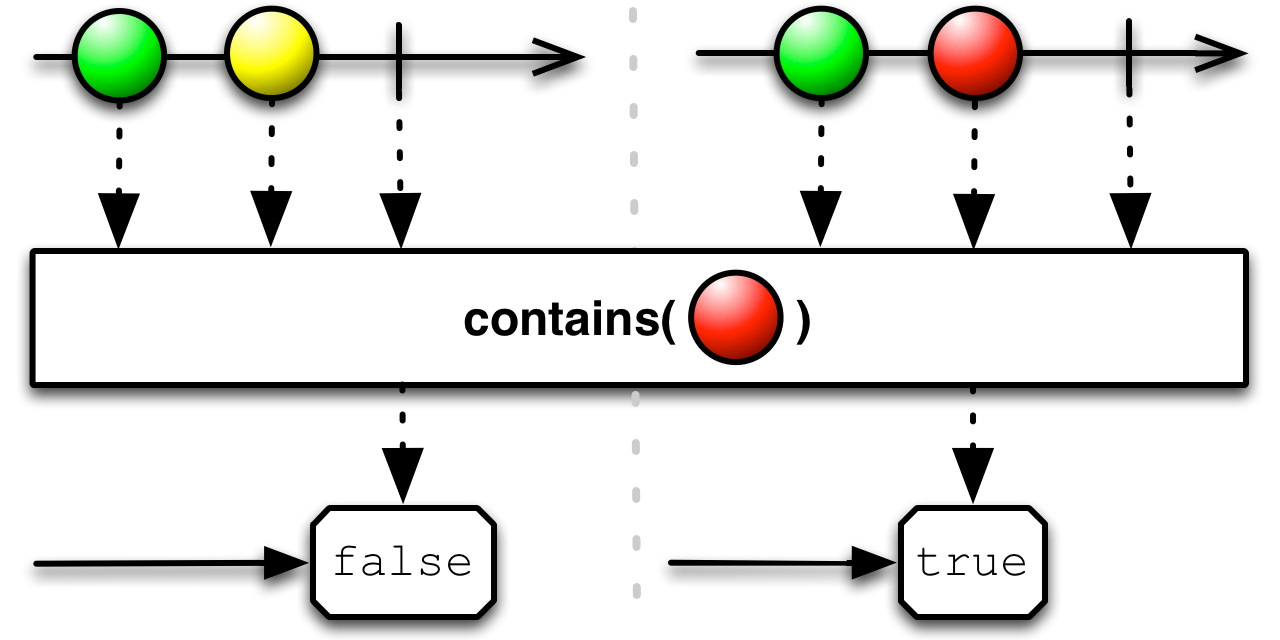
- Scheduler:
containsdoes not operate by default on a particularScheduler.
Parameters
| element | the item to search for in the emissions from the source ObservableSource |
|---|
Returns
- a Single that emits
trueif the specified item is emitted by the source ObservableSource, orfalseif the source ObservableSource completes without emitting that item
public final Single<Long> count ()
Returns a Single that counts the total number of items emitted by the source ObservableSource and emits this count as a 64-bit Long.
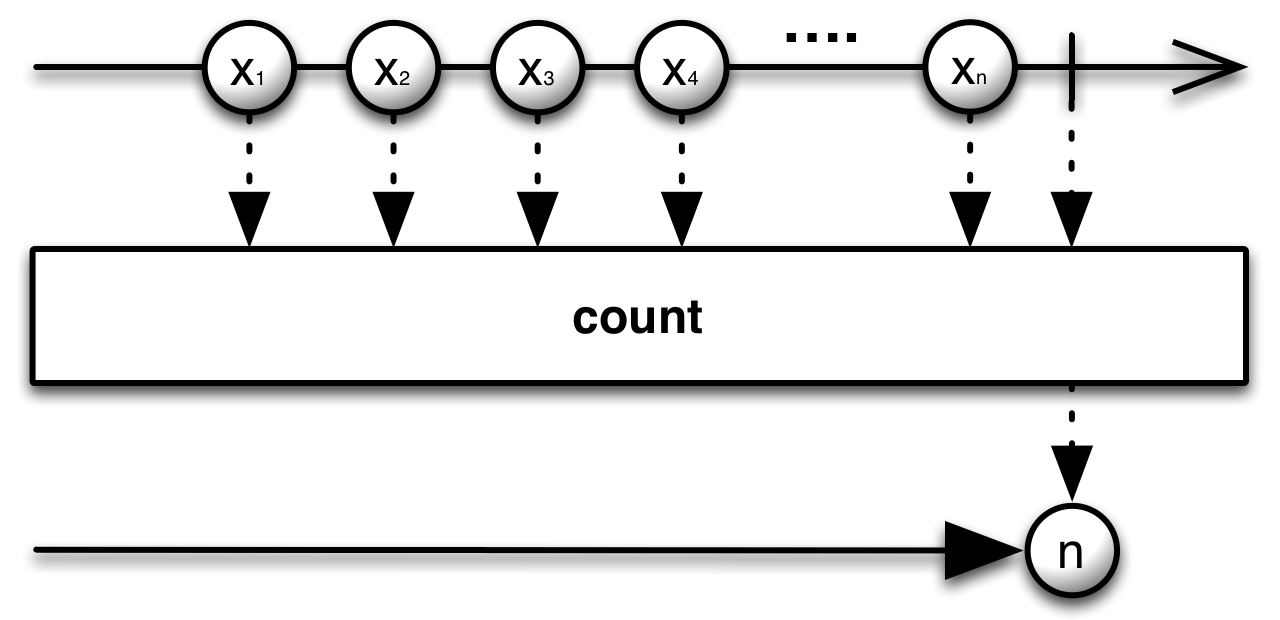
- Scheduler:
countdoes not operate by default on a particularScheduler.
Returns
- a Single that emits a single item: the number of items emitted by the source ObservableSource as a 64-bit Long item
public static Observable<T> create (ObservableOnSubscribe<T> source)
Provides an API (via a cold Observable) that bridges the reactive world with the callback-style world.
Example:
Observable.<Event>create(emitter -> {
Callback listener = new Callback() {
@Override
public void onEvent(Event e) {
emitter.onNext(e);
if (e.isLast()) {
emitter.onComplete();
}
}
@Override
public void onFailure(Exception e) {
emitter.onError(e);
}
};
AutoCloseable c = api.someMethod(listener);
emitter.setCancellable(c::close);
});

You should call the ObservableEmitter's onNext, onError and onComplete methods in a serialized fashion. The rest of its methods are thread-safe.
- Scheduler:
createdoes not operate by default on a particularScheduler.
Parameters
| source | the emitter that is called when an Observer subscribes to the returned Observable |
|---|
Returns
- the new Observable instance
public final Observable<T> debounce (long timeout, TimeUnit unit)
Returns an Observable that mirrors the source ObservableSource, except that it drops items emitted by the source ObservableSource that are followed by newer items before a timeout value expires. The timer resets on each emission.
Note: If items keep being emitted by the source ObservableSource faster than the timeout then no items will be emitted by the resulting ObservableSource.
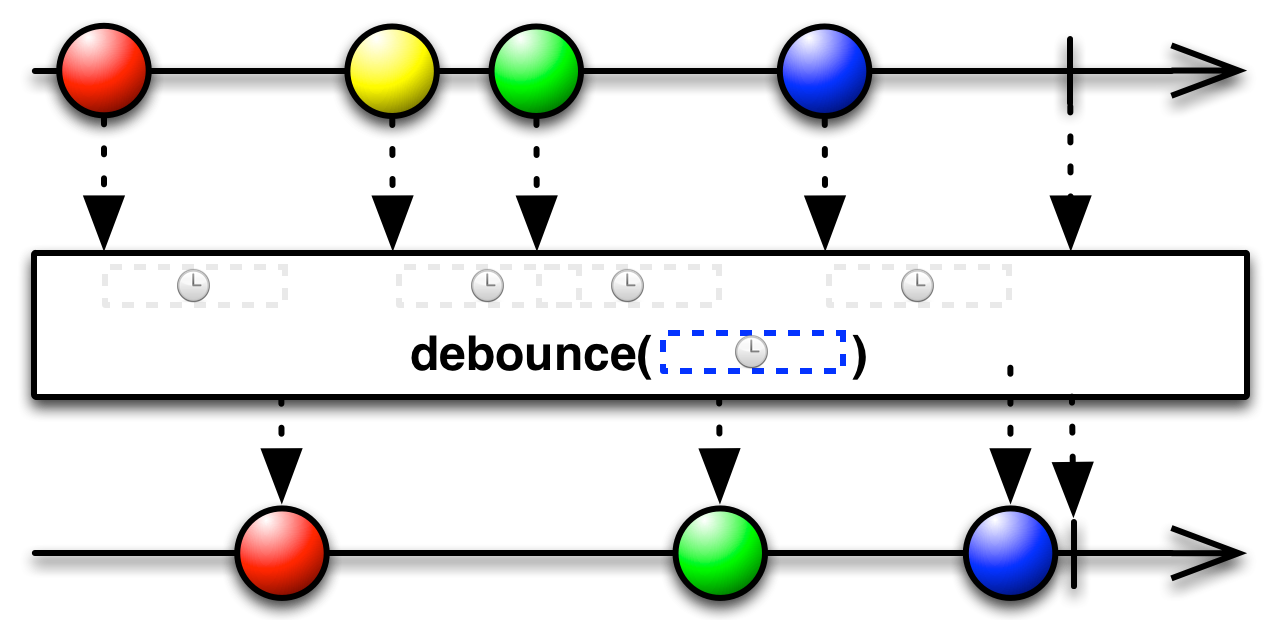
Information on debounce vs throttle:
- Debounce and Throttle: visual explanation
- Debouncing: javascript methods
- Javascript - don't spam your server: debounce and throttle
- Scheduler:
- This version of
debounceoperates by default on thecomputationScheduler.
Parameters
| timeout | the time each item has to be "the most recent" of those emitted by the source ObservableSource to ensure that it's not dropped |
|---|---|
| unit | the TimeUnit for the timeout |
Returns
- an Observable that filters out items from the source ObservableSource that are too quickly followed by newer items
public final Observable<T> debounce (long timeout, TimeUnit unit, Scheduler scheduler)
Returns an Observable that mirrors the source ObservableSource, except that it drops items emitted by the source ObservableSource that are followed by newer items before a timeout value expires on a specified Scheduler. The timer resets on each emission.
Note: If items keep being emitted by the source ObservableSource faster than the timeout then no items will be emitted by the resulting ObservableSource.
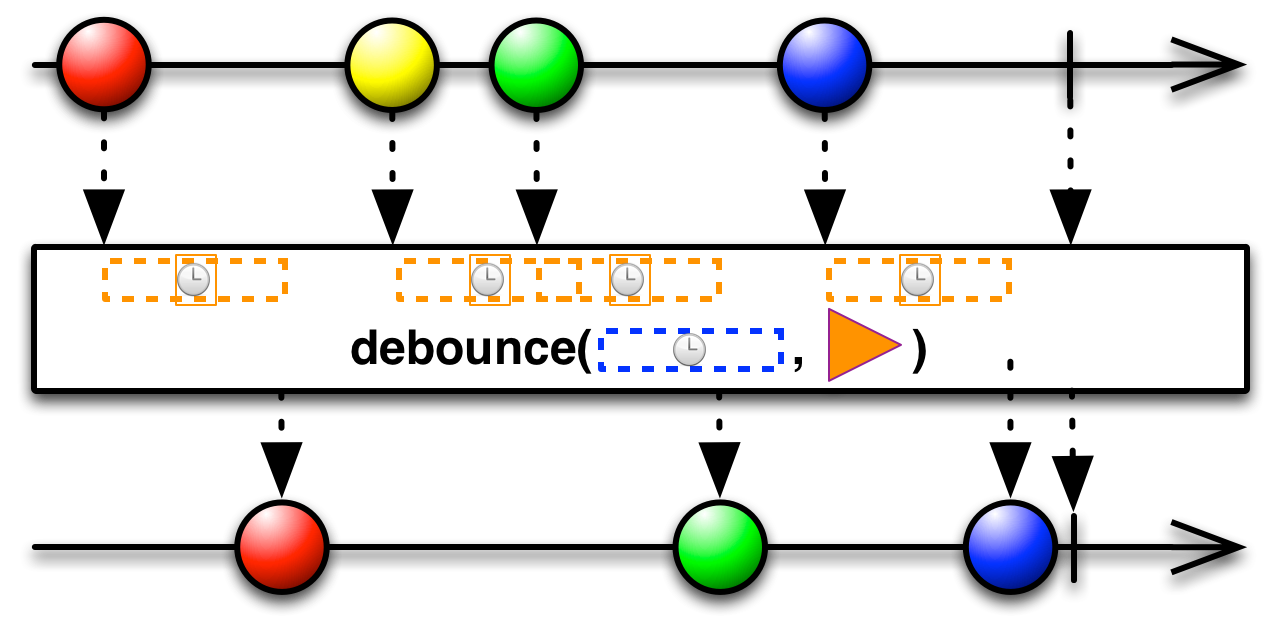
Information on debounce vs throttle:
- Debounce and Throttle: visual explanation
- Debouncing: javascript methods
- Javascript - don't spam your server: debounce and throttle
- Scheduler:
- You specify which
Schedulerthis operator will use
Parameters
| timeout | the time each item has to be "the most recent" of those emitted by the source ObservableSource to ensure that it's not dropped |
|---|---|
| unit | the unit of time for the specified timeout |
| scheduler | the Scheduler to use internally to manage the timers that handle the timeout for each
item |
Returns
- an Observable that filters out items from the source ObservableSource that are too quickly followed by newer items
public final Observable<T> debounce (Function<? super T, ? extends ObservableSource<U>> debounceSelector)
Returns an Observable that mirrors the source ObservableSource, except that it drops items emitted by the source ObservableSource that are followed by another item within a computed debounce duration.
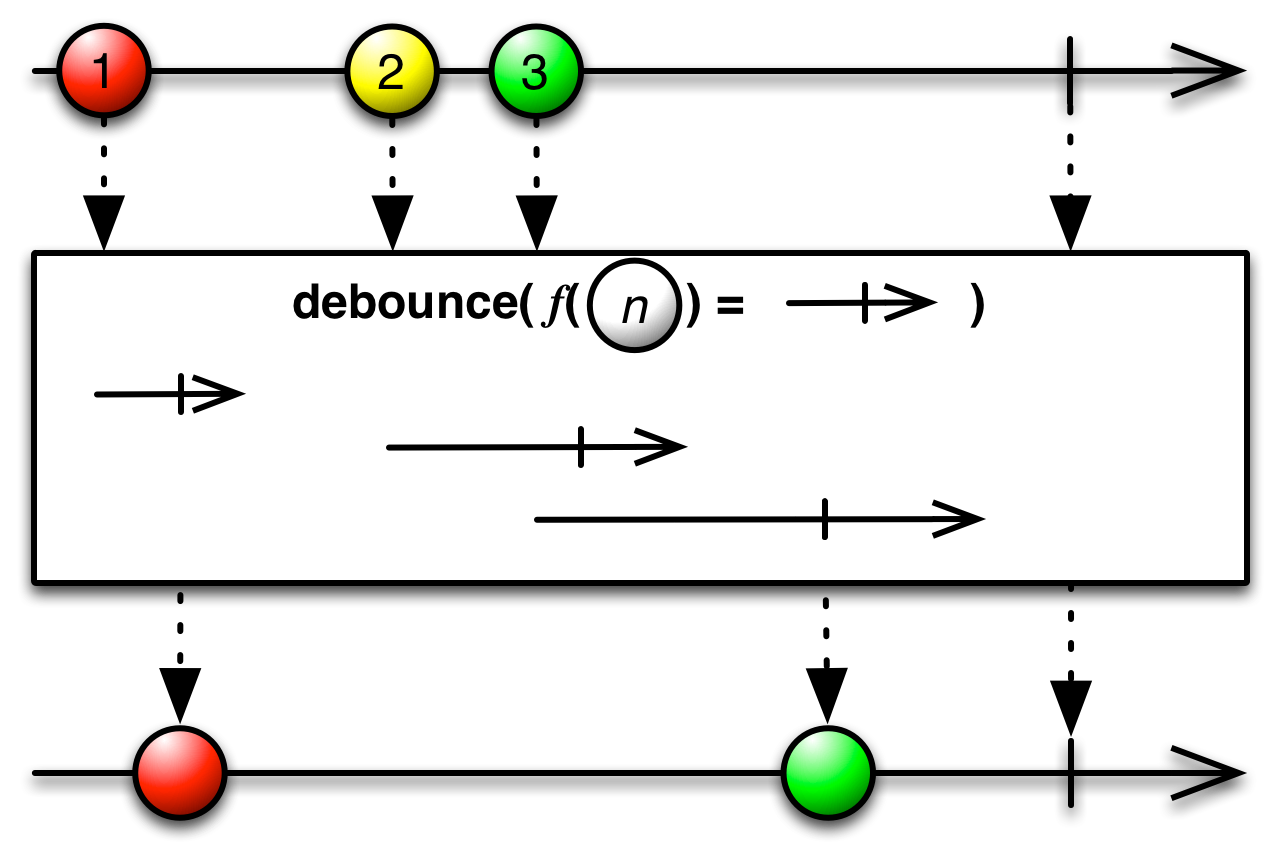
- Scheduler:
- This version of
debouncedoes not operate by default on a particularScheduler.
Parameters
| debounceSelector | function to retrieve a sequence that indicates the throttle duration for each item |
|---|
Returns
- an Observable that omits items emitted by the source ObservableSource that are followed by another item within a computed debounce duration
public final Observable<T> defaultIfEmpty (T defaultItem)
Returns an Observable that emits the items emitted by the source ObservableSource or a specified default item if the source ObservableSource is empty.
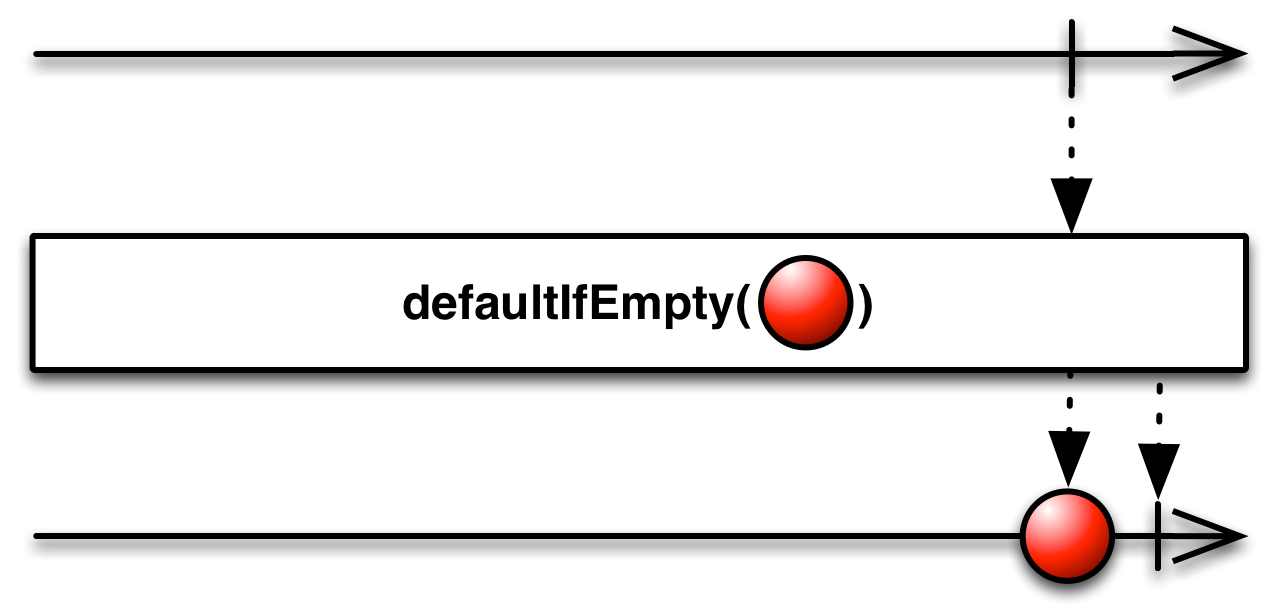
- Scheduler:
defaultIfEmptydoes not operate by default on a particularScheduler.
Parameters
| defaultItem | the item to emit if the source ObservableSource emits no items |
|---|
Returns
- an Observable that emits either the specified default item if the source ObservableSource emits no items, or the items emitted by the source ObservableSource
public static Observable<T> defer (Callable<? extends ObservableSource<? extends T>> supplier)
Returns an Observable that calls an ObservableSource factory to create an ObservableSource for each new Observer that subscribes. That is, for each subscriber, the actual ObservableSource that subscriber observes is determined by the factory function.
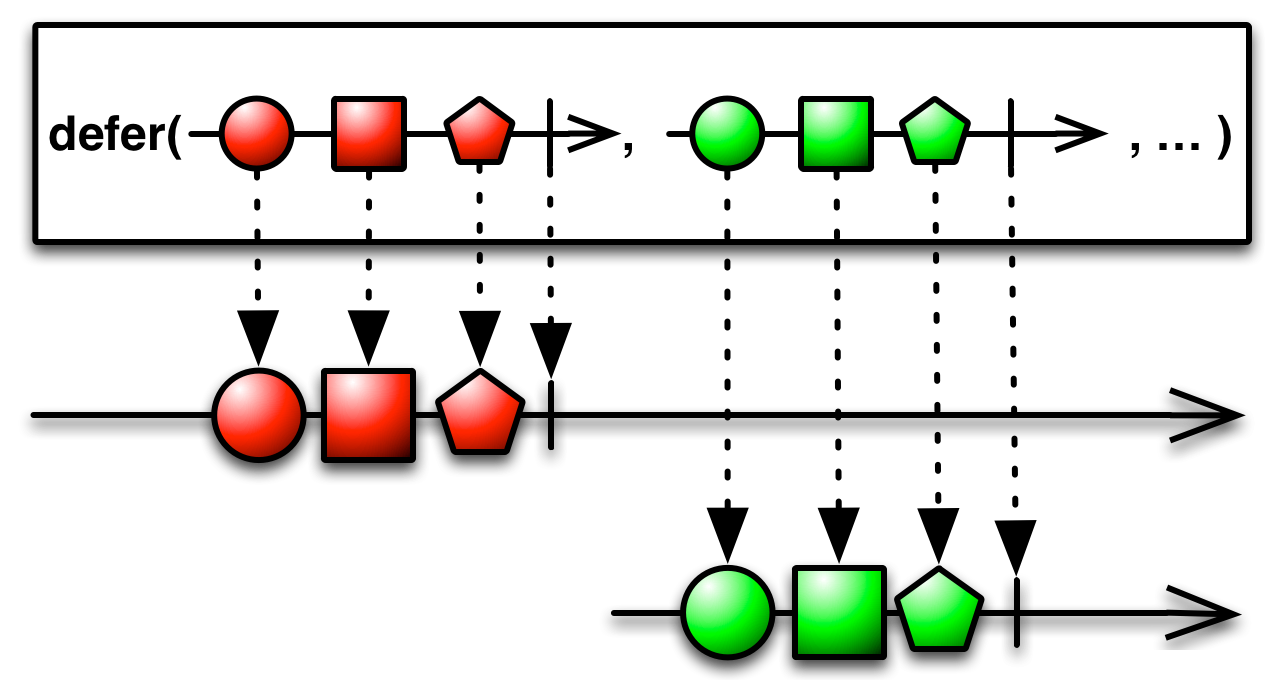
The defer Observer allows you to defer or delay emitting items from an ObservableSource until such time as an
Observer subscribes to the ObservableSource. This allows an Observer to easily obtain updates or a
refreshed version of the sequence.
- Scheduler:
deferdoes not operate by default on a particularScheduler.
Parameters
| supplier | the ObservableSource factory function to invoke for each Observer that subscribes to the
resulting ObservableSource |
|---|
Returns
- an Observable whose
Observers' subscriptions trigger an invocation of the given ObservableSource factory function
public final Observable<T> delay (long delay, TimeUnit unit, boolean delayError)
Returns an Observable that emits the items emitted by the source ObservableSource shifted forward in time by a specified delay. Error notifications from the source ObservableSource are not delayed.
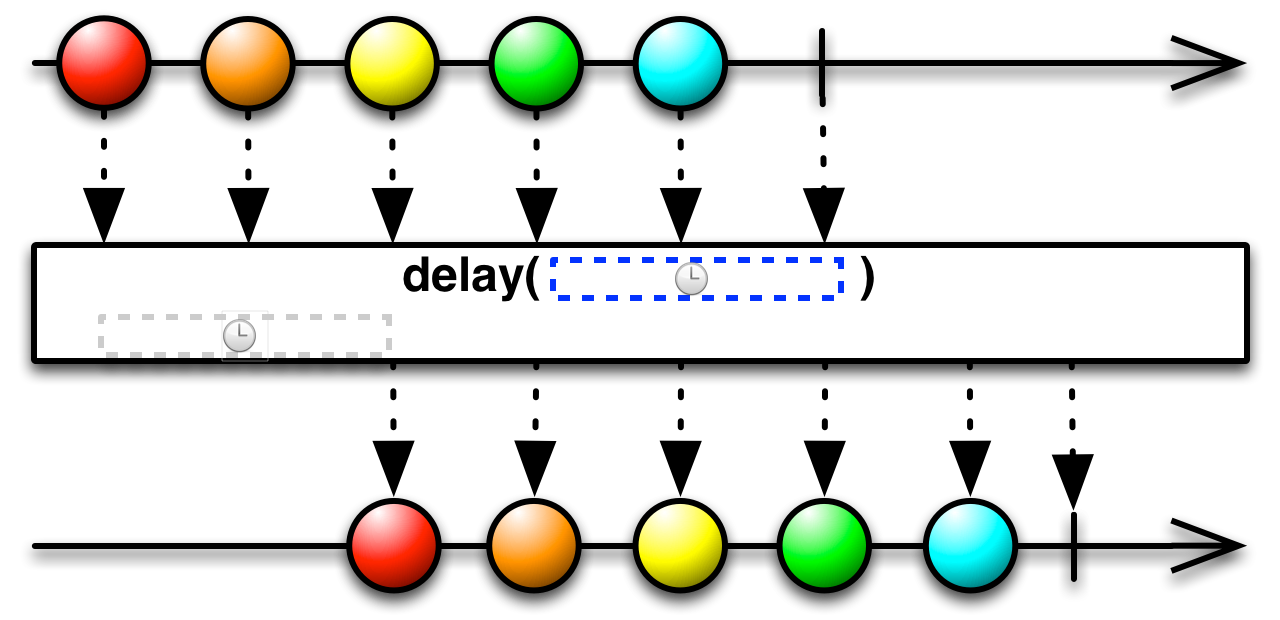
- Scheduler:
- This version of
delayoperates by default on thecomputationScheduler.
Parameters
| delay | the delay to shift the source by |
|---|---|
| unit | the TimeUnit in which period is defined |
| delayError | if true, the upstream exception is signalled with the given delay, after all preceding normal elements, if false, the upstream exception is signalled immediately |
Returns
- the source ObservableSource shifted in time by the specified delay
public final Observable<T> delay (long delay, TimeUnit unit, Scheduler scheduler)
Returns an Observable that emits the items emitted by the source ObservableSource shifted forward in time by a specified delay. Error notifications from the source ObservableSource are not delayed.
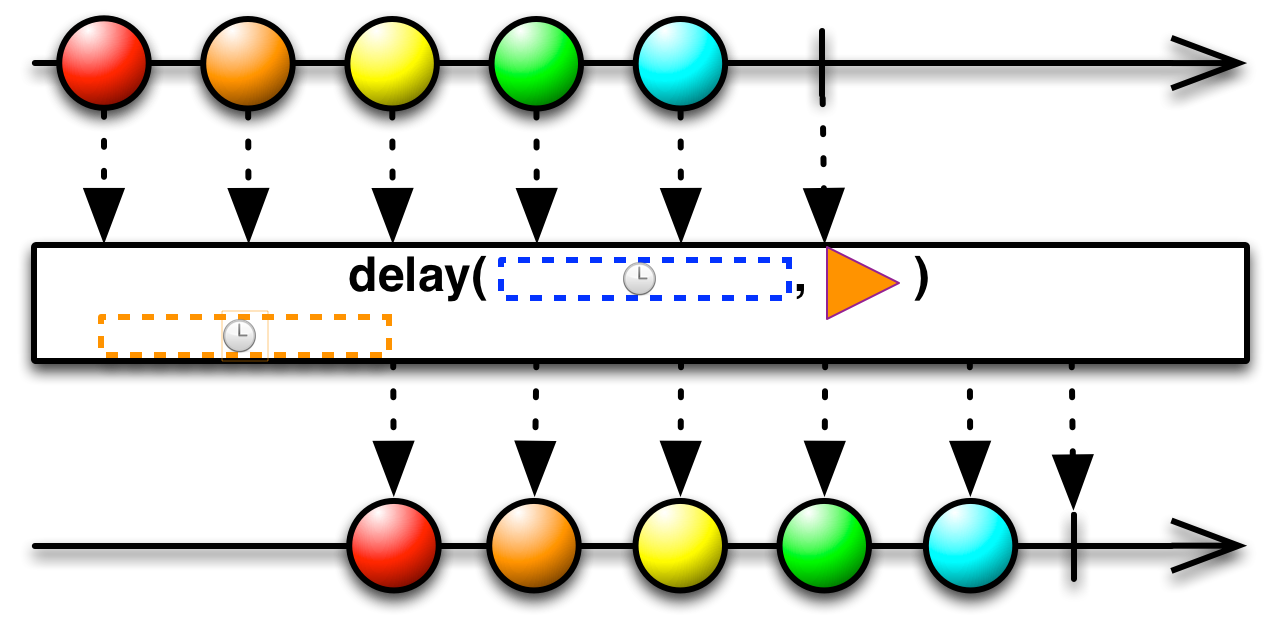
- Scheduler:
- You specify which
Schedulerthis operator will use
Parameters
| delay | the delay to shift the source by |
|---|---|
| unit | the time unit of delay |
| scheduler | the Scheduler to use for delaying |
Returns
- the source ObservableSource shifted in time by the specified delay
public final Observable<T> delay (long delay, TimeUnit unit, Scheduler scheduler, boolean delayError)
Returns an Observable that emits the items emitted by the source ObservableSource shifted forward in time by a specified delay. Error notifications from the source ObservableSource are not delayed.

- Scheduler:
- You specify which
Schedulerthis operator will use
Parameters
| delay | the delay to shift the source by |
|---|---|
| unit | the time unit of delay |
| scheduler | the Scheduler to use for delaying |
| delayError | if true, the upstream exception is signalled with the given delay, after all preceding normal elements, if false, the upstream exception is signalled immediately |
Returns
- the source ObservableSource shifted in time by the specified delay
public final Observable<T> delay (Function<? super T, ? extends ObservableSource<U>> itemDelay)
Returns an Observable that delays the emissions of the source ObservableSource via another ObservableSource on a per-item basis.
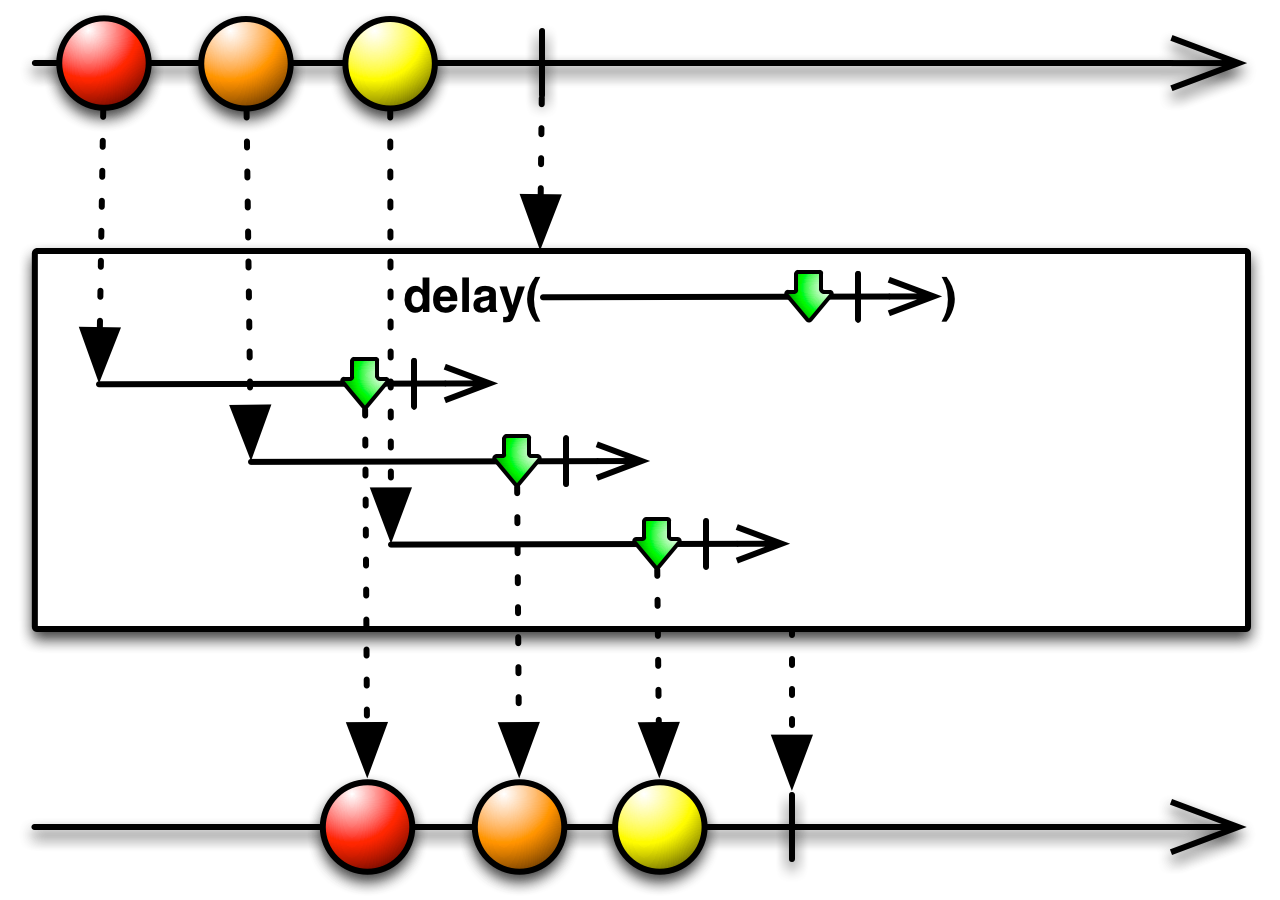
Note: the resulting ObservableSource will immediately propagate any onError notification
from the source ObservableSource.
- Scheduler:
- This version of
delaydoes not operate by default on a particularScheduler.
Parameters
| itemDelay | a function that returns an ObservableSource for each item emitted by the source ObservableSource, which is
then used to delay the emission of that item by the resulting ObservableSource until the ObservableSource
returned from itemDelay emits an item |
|---|
Returns
- an Observable that delays the emissions of the source ObservableSource via another ObservableSource on a per-item basis
public final Observable<T> delay (ObservableSource<U> subscriptionDelay, Function<? super T, ? extends ObservableSource<V>> itemDelay)
Returns an Observable that delays the subscription to and emissions from the source ObservableSource via another ObservableSource on a per-item basis.

Note: the resulting ObservableSource will immediately propagate any onError notification
from the source ObservableSource.
- Scheduler:
- This version of
delaydoes not operate by default on a particularScheduler.
Parameters
| subscriptionDelay | a function that returns an ObservableSource that triggers the subscription to the source ObservableSource once it emits any item |
|---|---|
| itemDelay | a function that returns an ObservableSource for each item emitted by the source ObservableSource, which is
then used to delay the emission of that item by the resulting ObservableSource until the ObservableSource
returned from itemDelay emits an item |
Returns
- an Observable that delays the subscription and emissions of the source ObservableSource via another ObservableSource on a per-item basis
public final Observable<T> delay (long delay, TimeUnit unit)
Returns an Observable that emits the items emitted by the source ObservableSource shifted forward in time by a specified delay. Error notifications from the source ObservableSource are not delayed.

- Scheduler:
- This version of
delayoperates by default on thecomputationScheduler.
Parameters
| delay | the delay to shift the source by |
|---|---|
| unit | the TimeUnit in which period is defined |
Returns
- the source ObservableSource shifted in time by the specified delay
public final Observable<T> delaySubscription (long delay, TimeUnit unit, Scheduler scheduler)
Returns an Observable that delays the subscription to the source ObservableSource by a given amount of time, both waiting and subscribing on a given Scheduler.
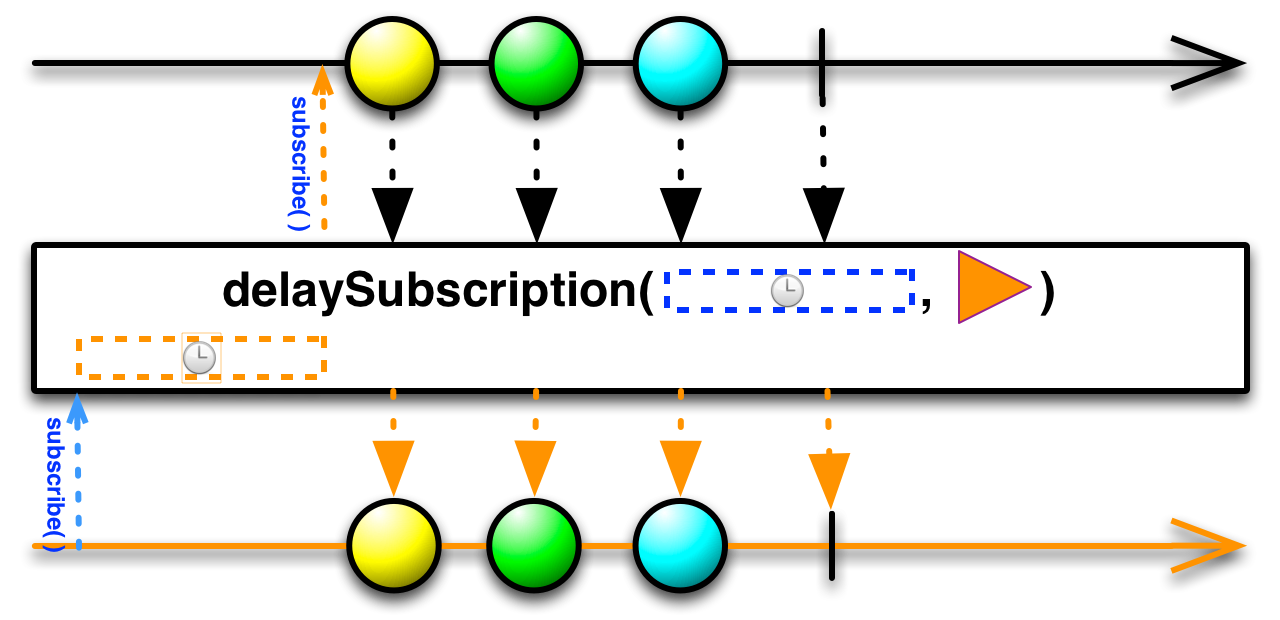
- Scheduler:
- You specify which
Schedulerthis operator will use
Parameters
| delay | the time to delay the subscription |
|---|---|
| unit | the time unit of delay |
| scheduler | the Scheduler on which the waiting and subscription will happen |
Returns
- an Observable that delays the subscription to the source ObservableSource by a given amount, waiting and subscribing on the given Scheduler
public final Observable<T> delaySubscription (long delay, TimeUnit unit)
Returns an Observable that delays the subscription to the source ObservableSource by a given amount of time.
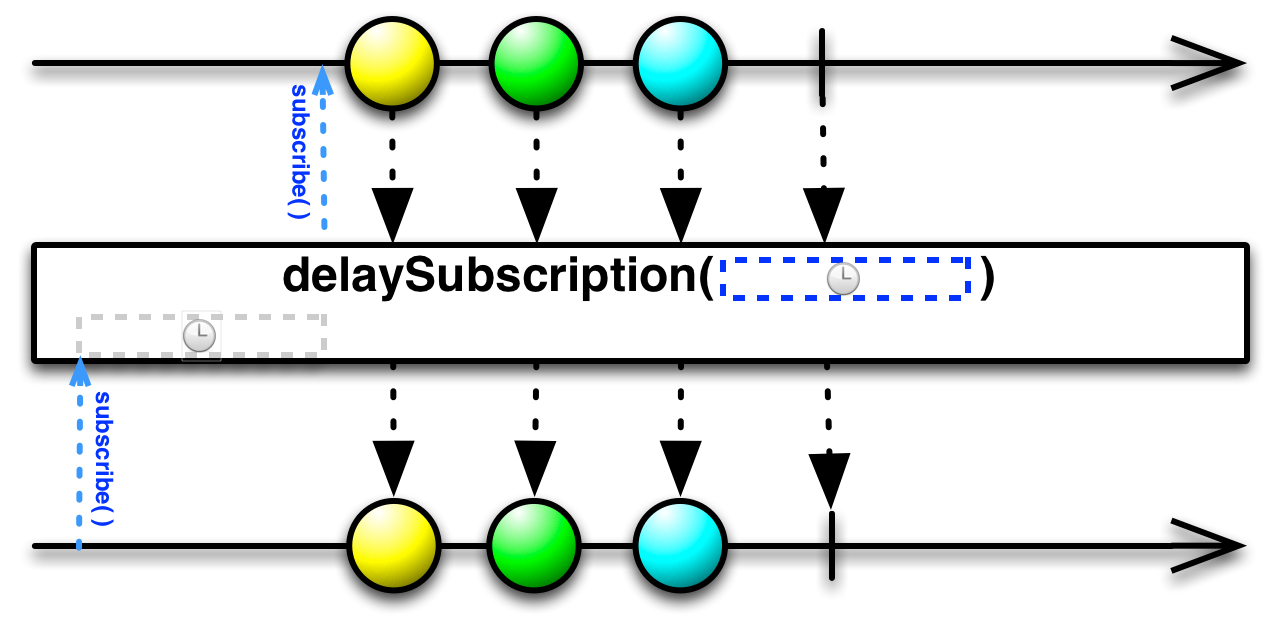
- Scheduler:
- This version of
delaySubscriptionoperates by default on thecomputationScheduler.
Parameters
| delay | the time to delay the subscription |
|---|---|
| unit | the time unit of delay |
Returns
- an Observable that delays the subscription to the source ObservableSource by the given amount
public final Observable<T> delaySubscription (ObservableSource<U> other)
Returns an Observable that delays the subscription to this Observable until the other Observable emits an element or completes normally.
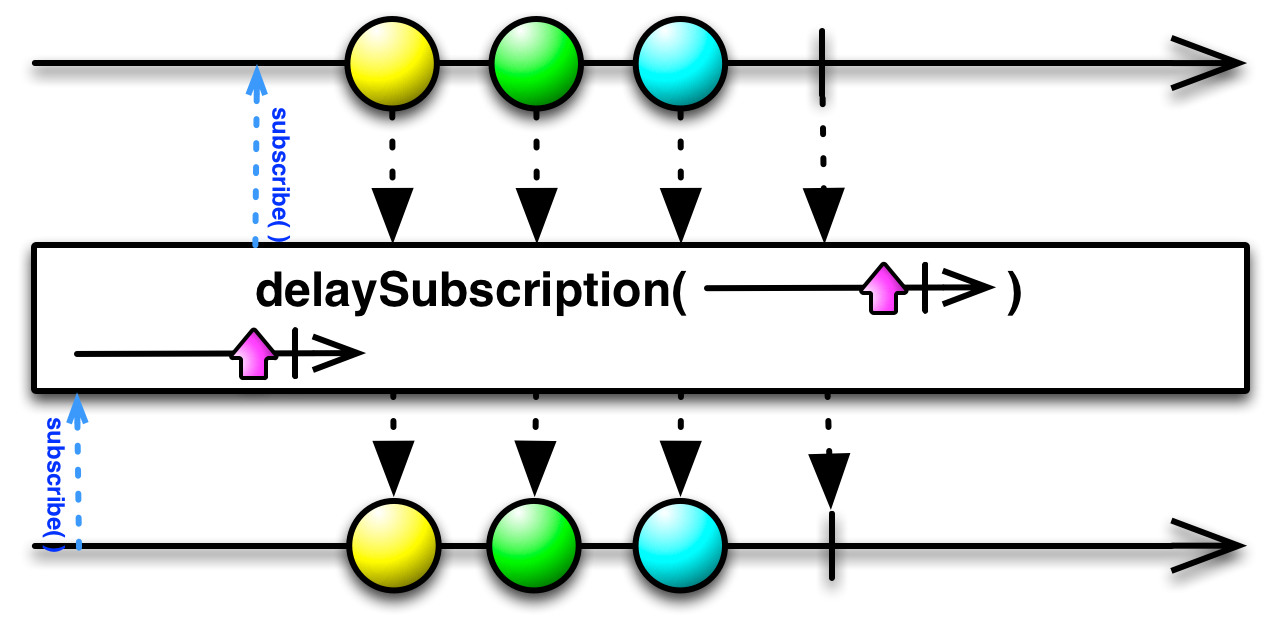
- Scheduler:
- This method does not operate by default on a particular
Scheduler.
Parameters
| other | the other Observable that should trigger the subscription to this Observable. |
|---|
Returns
- an Observable that delays the subscription to this Observable until the other Observable emits an element or completes normally.
public final Observable<T2> dematerialize ()
Returns an Observable that reverses the effect of materialize by transforming the
Notification objects emitted by the source ObservableSource into the items or notifications they
represent.
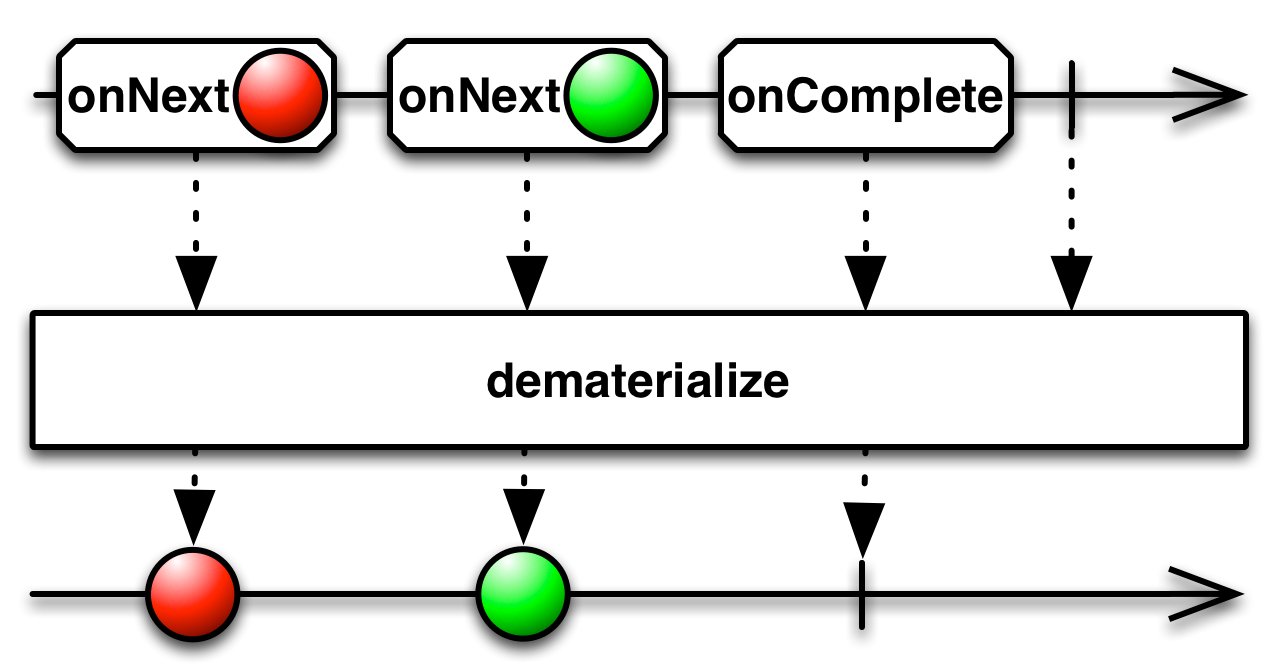
- Scheduler:
dematerializedoes not operate by default on a particularScheduler.
Returns
- an Observable that emits the items and notifications embedded in the
Notificationobjects emitted by the source ObservableSource
public final Observable<T> distinct ()
Returns an Observable that emits all items emitted by the source ObservableSource that are distinct.
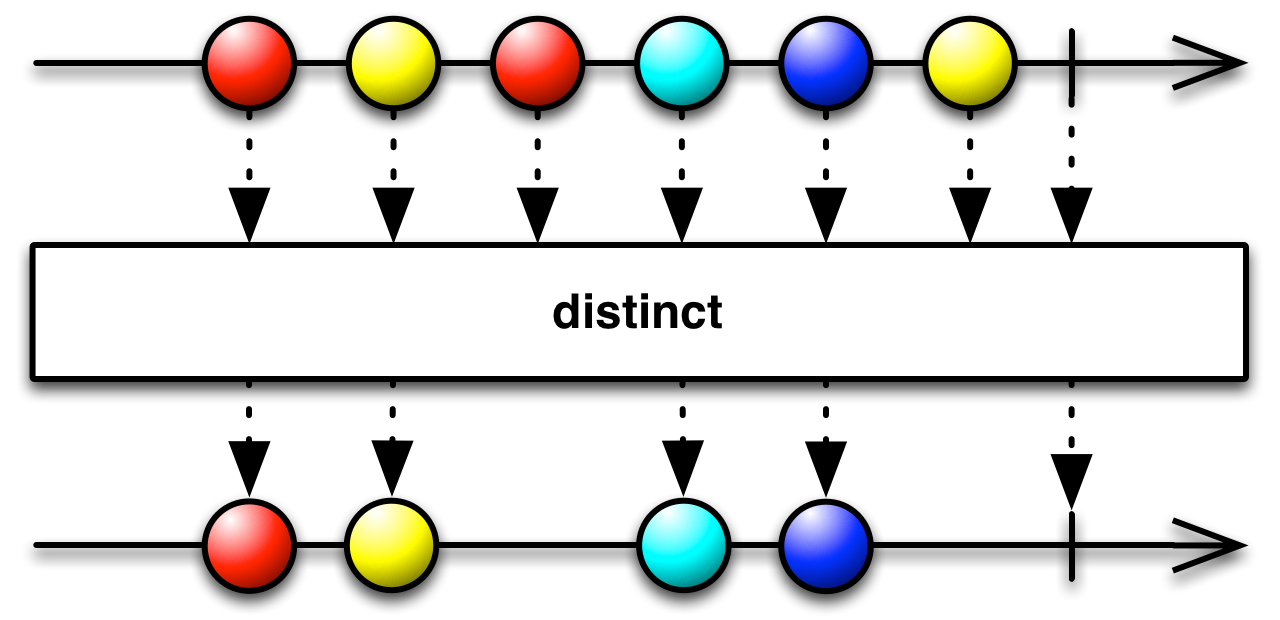
- Scheduler:
distinctdoes not operate by default on a particularScheduler.
Returns
- an Observable that emits only those items emitted by the source ObservableSource that are distinct from each other
public final Observable<T> distinct (Function<? super T, K> keySelector)
Returns an Observable that emits all items emitted by the source ObservableSource that are distinct according to a key selector function.
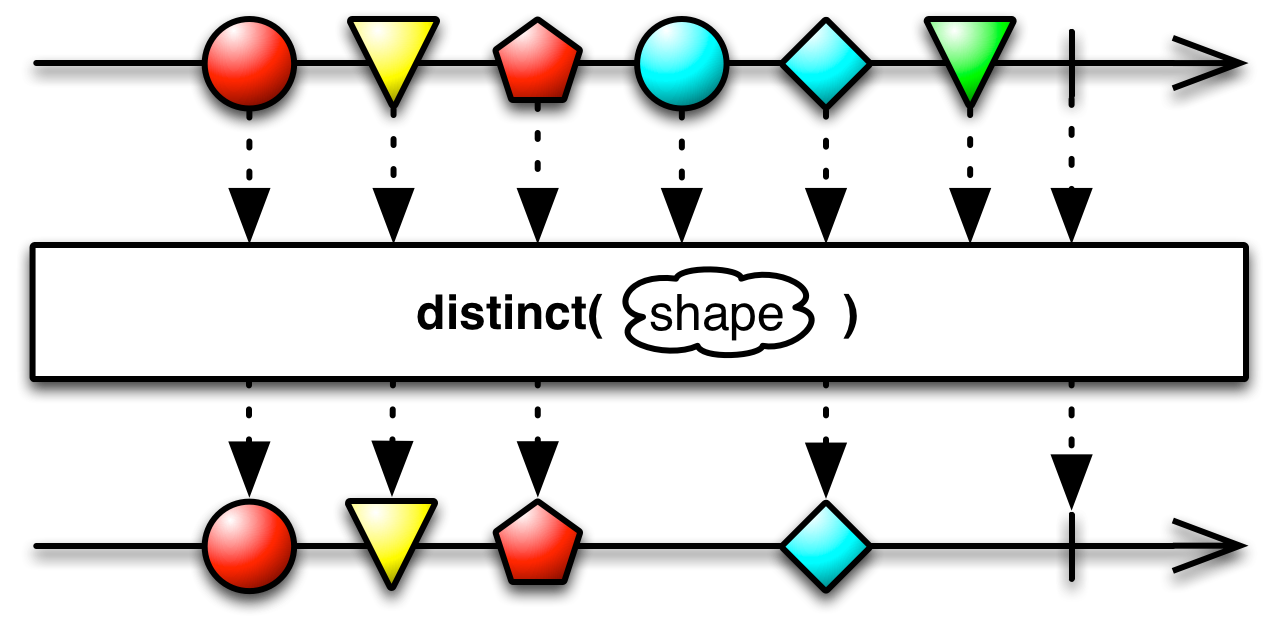
- Scheduler:
distinctdoes not operate by default on a particularScheduler.
Parameters
| keySelector | a function that projects an emitted item to a key value that is used to decide whether an item is distinct from another one or not |
|---|
Returns
- an Observable that emits those items emitted by the source ObservableSource that have distinct keys
public final Observable<T> distinct (Function<? super T, K> keySelector, Callable<? extends Collection<? super K>> collectionSupplier)
Returns an Observable that emits all items emitted by the source ObservableSource that are distinct according to a key selector function.

- Scheduler:
distinctdoes not operate by default on a particularScheduler.
Parameters
| keySelector | a function that projects an emitted item to a key value that is used to decide whether an item is distinct from another one or not |
|---|---|
| collectionSupplier | function called for each individual Observer to return a Collection subtype for holding the extracted keys and whose add() method's return indicates uniqueness. |
Returns
- an Observable that emits those items emitted by the source ObservableSource that have distinct keys
public final Observable<T> distinctUntilChanged (BiPredicate<? super T, ? super T> comparer)
Returns an Observable that emits all items emitted by the source ObservableSource that are distinct from their immediate predecessors when compared with each other via the provided comparator function.
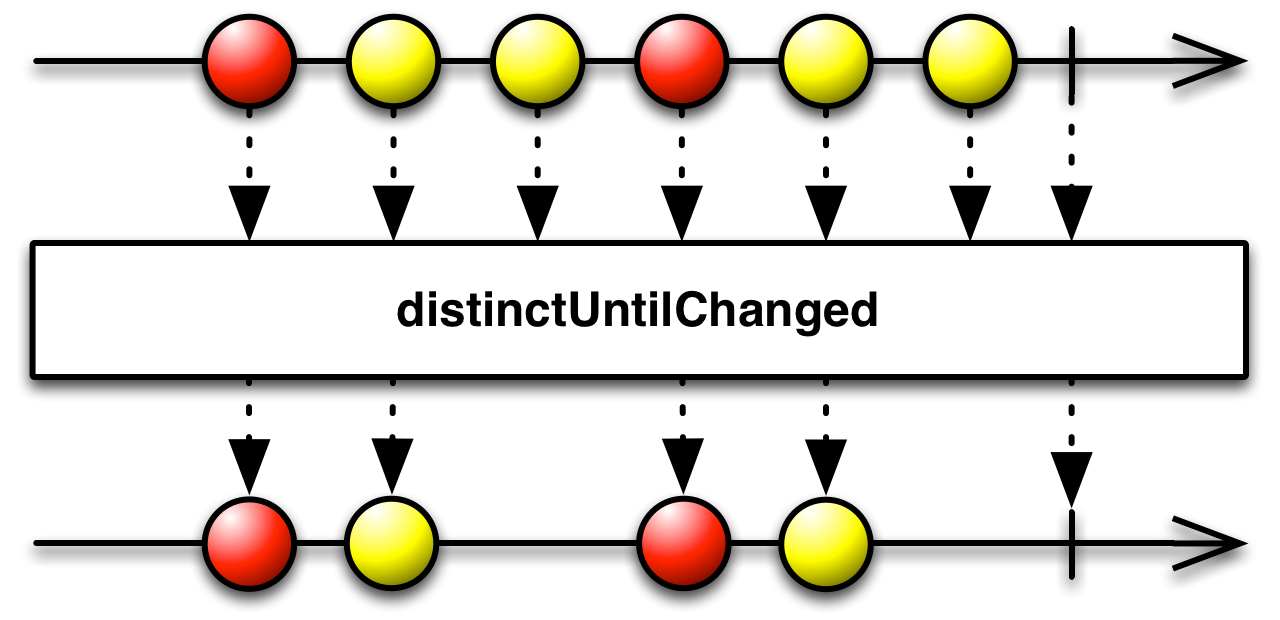
- Scheduler:
distinctUntilChangeddoes not operate by default on a particularScheduler.
Parameters
| comparer | the function that receives the previous item and the current item and is expected to return true if the two are equal, thus skipping the current value. |
|---|
Returns
- an Observable that emits those items from the source ObservableSource that are distinct from their immediate predecessors
public final Observable<T> distinctUntilChanged (Function<? super T, K> keySelector)
Returns an Observable that emits all items emitted by the source ObservableSource that are distinct from their immediate predecessors, according to a key selector function.
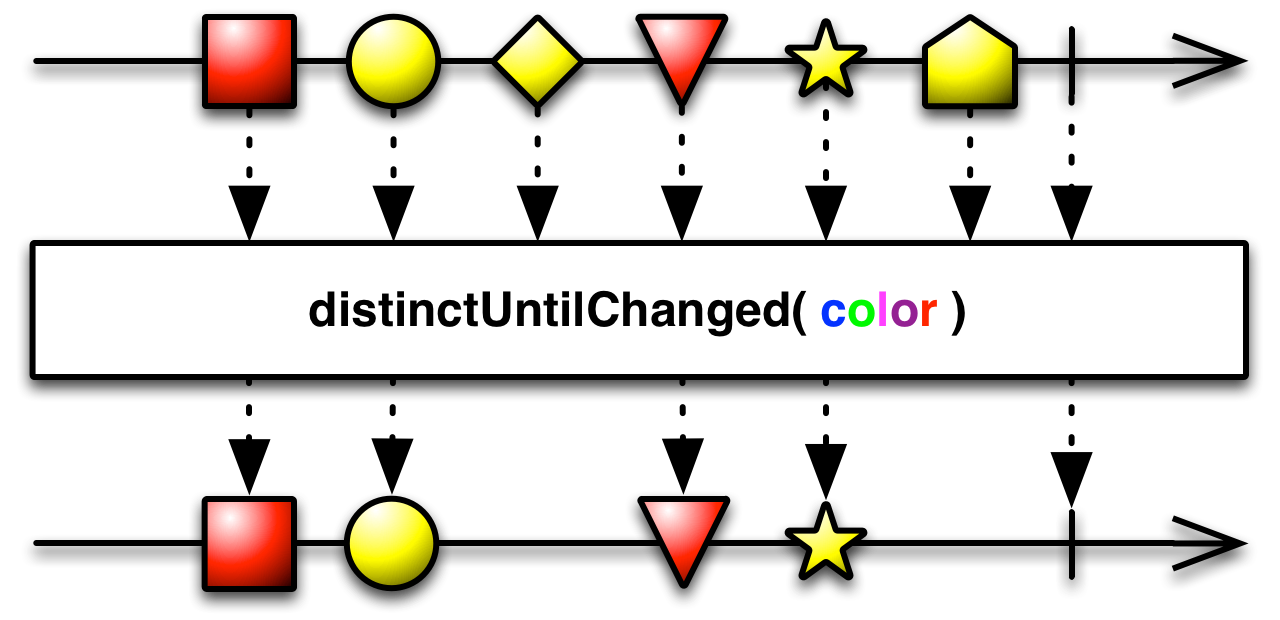
- Scheduler:
distinctUntilChangeddoes not operate by default on a particularScheduler.
Parameters
| keySelector | a function that projects an emitted item to a key value that is used to decide whether an item is distinct from another one or not |
|---|
Returns
- an Observable that emits those items from the source ObservableSource whose keys are distinct from those of their immediate predecessors
public final Observable<T> distinctUntilChanged ()
Returns an Observable that emits all items emitted by the source ObservableSource that are distinct from their immediate predecessors.

- Scheduler:
distinctUntilChangeddoes not operate by default on a particularScheduler.
Returns
- an Observable that emits those items from the source ObservableSource that are distinct from their immediate predecessors
public final Observable<T> doAfterNext (Consumer<? super T> onAfterNext)
Calls the specified consumer with the current item after this item has been emitted to the downstream.
Note that the onAfterNext action is shared between subscriptions and as such
should be thread-safe.
- Scheduler:
doAfterNextdoes not operate by default on a particularScheduler.- Operator-fusion:
- This operator supports boundary-limited synchronous or asynchronous queue-fusion.
History: 2.0.1 - experimental
Parameters
| onAfterNext | the Consumer that will be called after emitting an item from upstream to the downstream |
|---|
Returns
- the new Observable instance
public final Observable<T> doAfterTerminate (Action onFinally)
Registers an Action to be called when this ObservableSource invokes either
onComplete or onError.
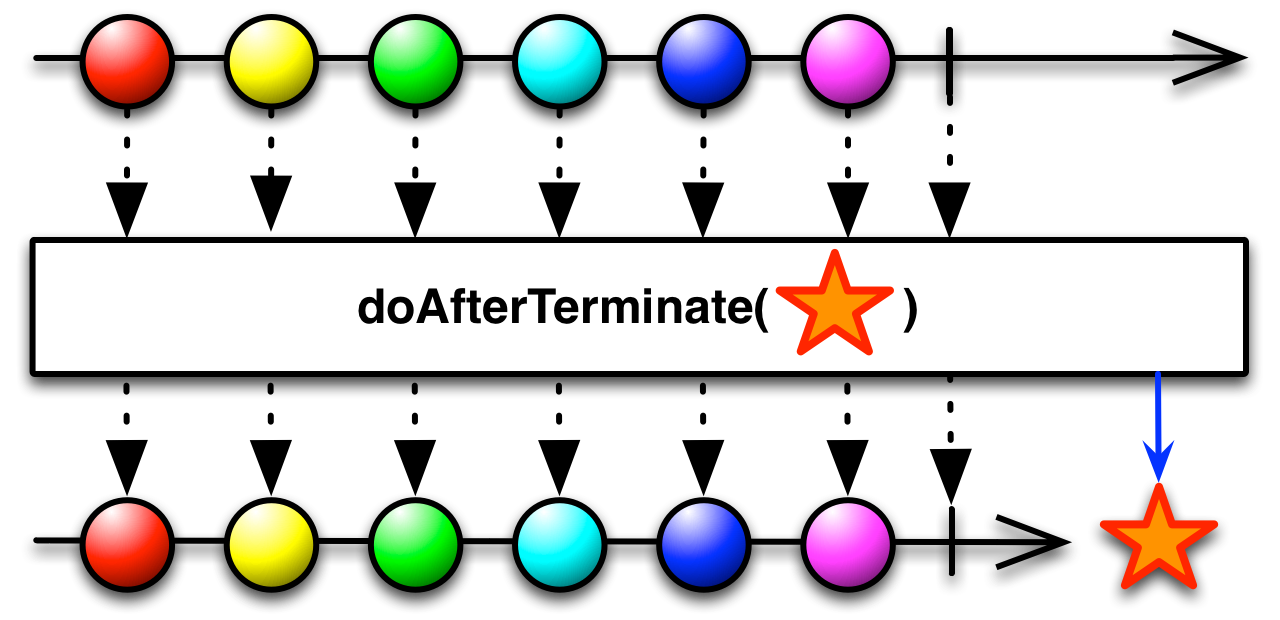
- Scheduler:
doAfterTerminatedoes not operate by default on a particularScheduler.
Parameters
| onFinally | an Action to be invoked when the source ObservableSource finishes |
|---|
Returns
- an Observable that emits the same items as the source ObservableSource, then invokes the
Action
public final Observable<T> doFinally (Action onFinally)
Calls the specified action after this Observable signals onError or onCompleted or gets disposed by the downstream.
In case of a race between a terminal event and a dispose call, the provided onFinally action
is executed once per subscription.
Note that the onFinally action is shared between subscriptions and as such
should be thread-safe.
- Scheduler:
doFinallydoes not operate by default on a particularScheduler.- Operator-fusion:
- This operator supports boundary-limited synchronous or asynchronous queue-fusion.
History: 2.0.1 - experimental
Parameters
| onFinally | the action called when this Observable terminates or gets cancelled |
|---|
Returns
- the new Observable instance
public final Observable<T> doOnComplete (Action onComplete)
Modifies the source ObservableSource so that it invokes an action when it calls onComplete.
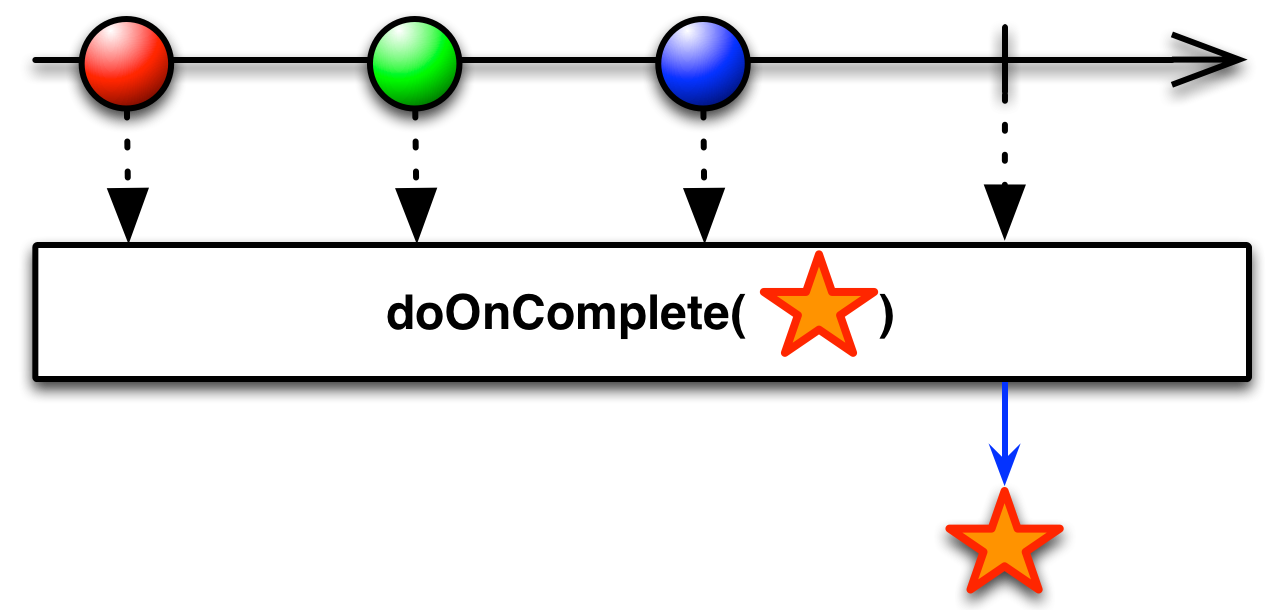
- Scheduler:
doOnCompletedoes not operate by default on a particularScheduler.
Parameters
| onComplete | the action to invoke when the source ObservableSource calls onComplete |
|---|
Returns
- the source ObservableSource with the side-effecting behavior applied
public final Observable<T> doOnDispose (Action onDispose)
Calls the dispose Action if the downstream disposes the sequence.
The action is shared between subscriptions and thus may be called concurrently from multiple threads; the action must be thread safe.
If the action throws a runtime exception, that exception is rethrown by the dispose() call,
sometimes as a CompositeException if there were multiple exceptions along the way.
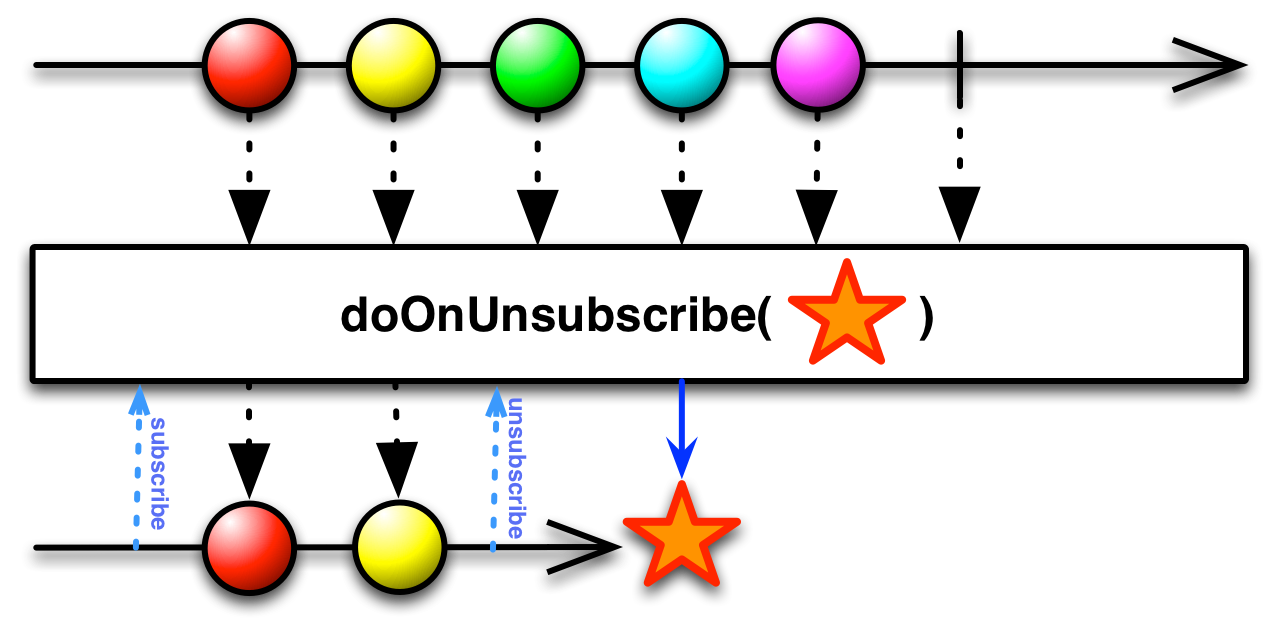
- Scheduler:
doOnDisposedoes not operate by default on a particularScheduler.
Parameters
| onDispose | the action that gets called when the source ObservableSource's Disposable is disposed |
|---|
Returns
- the source
ObservableSourcemodified so as to call this Action when appropriate
Throws
| NullPointerException | if onDispose is null |
|---|
public final Observable<T> doOnEach (Observer<? super T> observer)
Modifies the source ObservableSource so that it notifies an Observer for each item and terminal event it emits.
In case the onError of the supplied observer throws, the downstream will receive a composite
exception containing the original exception and the exception thrown by onError. If either the
onNext or the onComplete method of the supplied observer throws, the downstream will be
terminated and will receive this thrown exception.
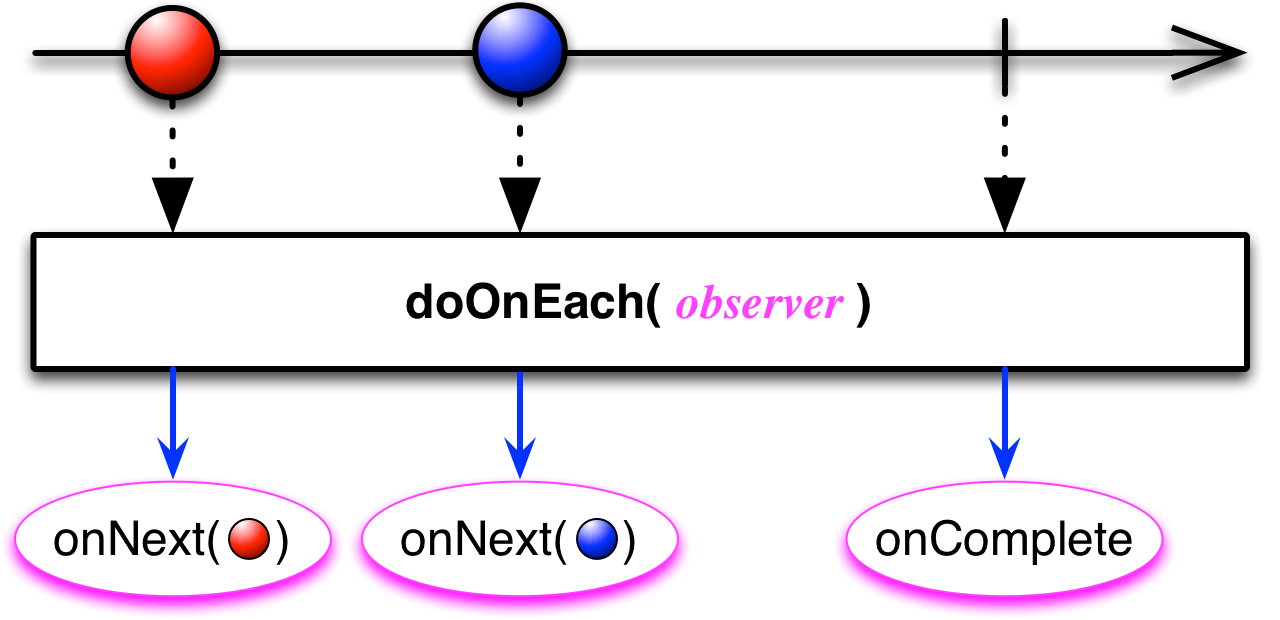
- Scheduler:
doOnEachdoes not operate by default on a particularScheduler.
Parameters
| observer | the observer to be notified about onNext, onError and onComplete events on its respective methods before the actual downstream Observer gets notified. |
|---|
Returns
- the source ObservableSource with the side-effecting behavior applied
public final Observable<T> doOnEach (Consumer<? super Notification<T>> onNotification)
Modifies the source ObservableSource so that it invokes an action for each item it emits.
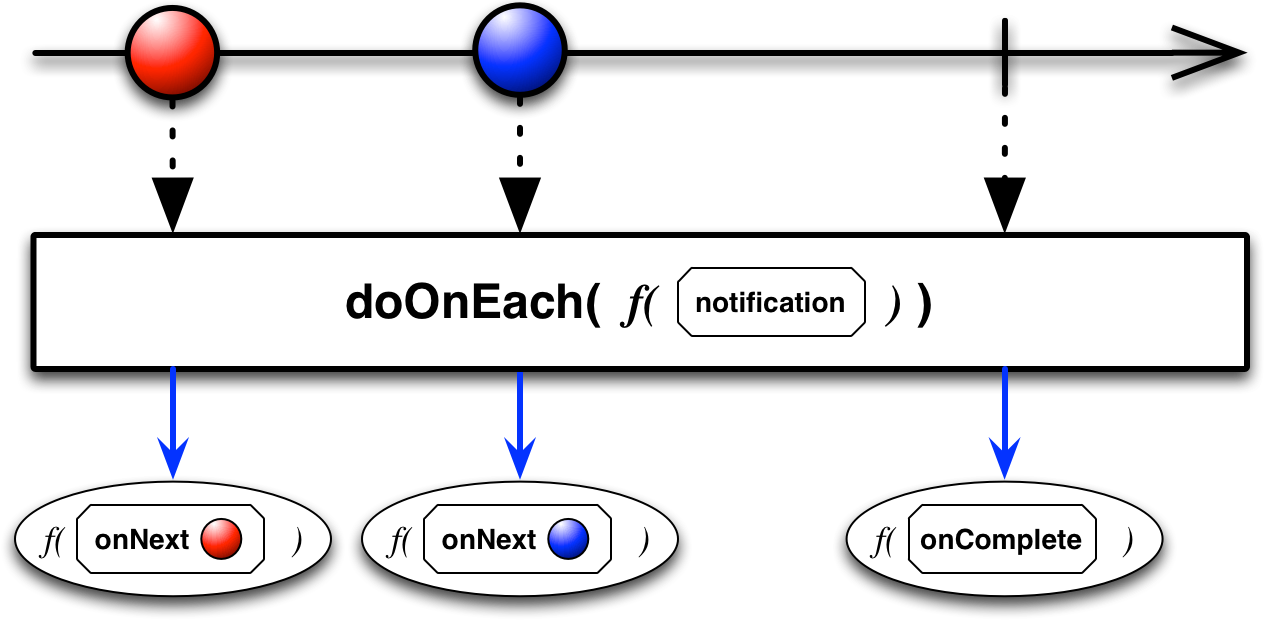
- Scheduler:
doOnEachdoes not operate by default on a particularScheduler.
Parameters
| onNotification | the action to invoke for each item emitted by the source ObservableSource |
|---|
Returns
- the source ObservableSource with the side-effecting behavior applied
public final Observable<T> doOnError (Consumer<? super Throwable> onError)
Modifies the source ObservableSource so that it invokes an action if it calls onError.
In case the onError action throws, the downstream will receive a composite exception containing
the original exception and the exception thrown by onError.
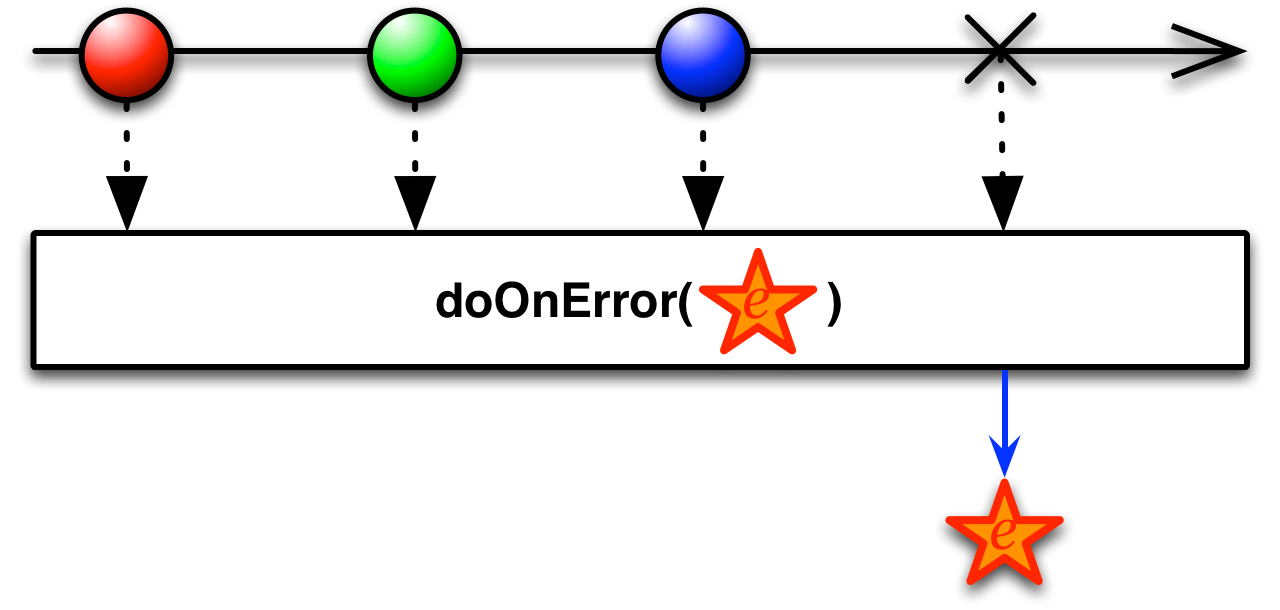
- Scheduler:
doOnErrordoes not operate by default on a particularScheduler.
Parameters
| onError | the action to invoke if the source ObservableSource calls onError |
|---|
Returns
- the source ObservableSource with the side-effecting behavior applied
public final Observable<T> doOnLifecycle (Consumer<? super Disposable> onSubscribe, Action onDispose)
Calls the appropriate onXXX method (shared between all Observer) for the lifecycle events of the sequence (subscription, cancellation, requesting).
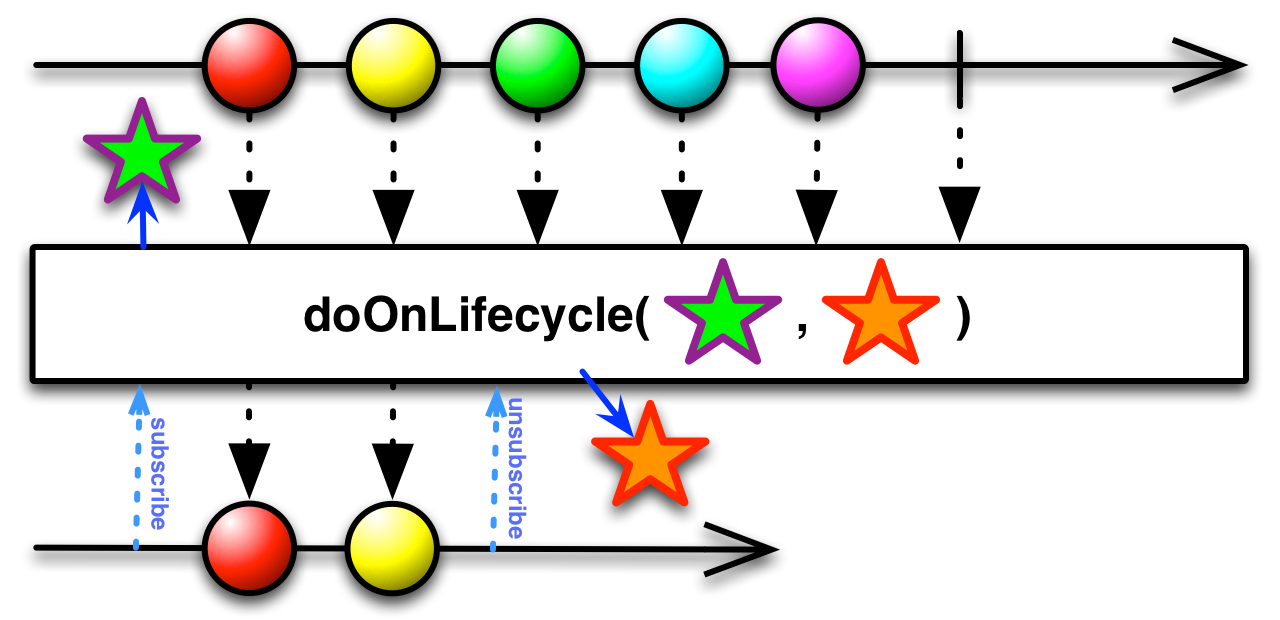
- Scheduler:
doOnLifecycledoes not operate by default on a particularScheduler.
Parameters
| onSubscribe | a Consumer called with the Disposable sent via Observer.onSubscribe() |
|---|---|
| onDispose | called when the downstream disposes the Disposable via dispose() |
Returns
- the source ObservableSource with the side-effecting behavior applied
public final Observable<T> doOnNext (Consumer<? super T> onNext)
Modifies the source ObservableSource so that it invokes an action when it calls onNext.
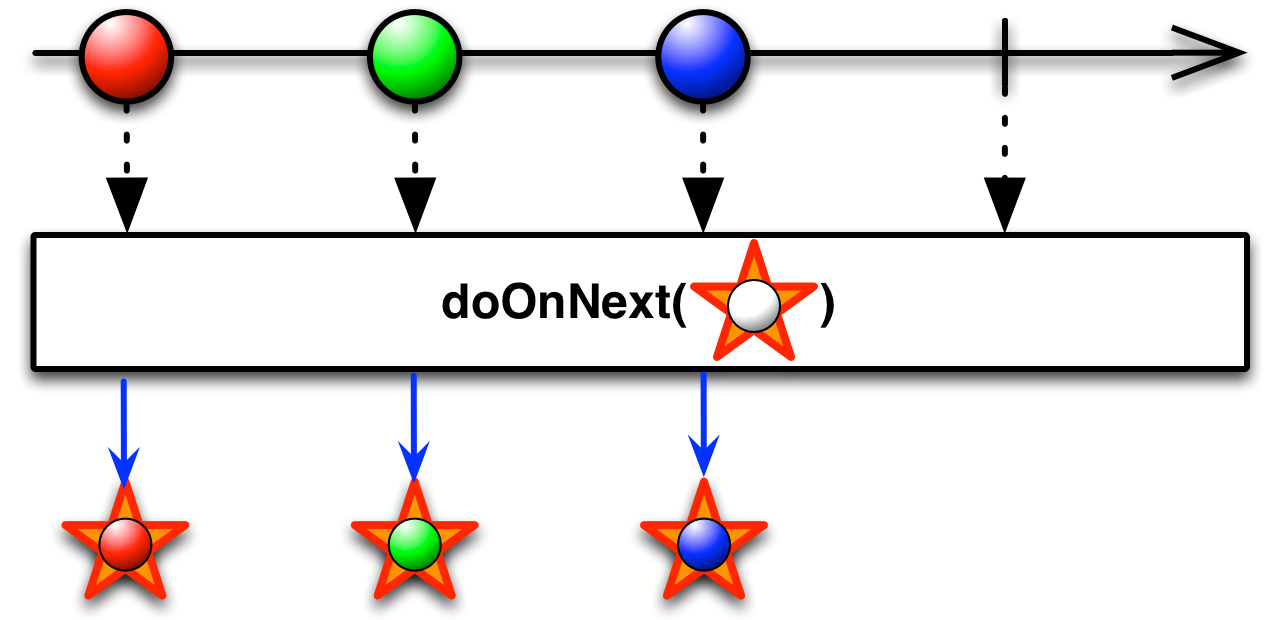
- Scheduler:
doOnNextdoes not operate by default on a particularScheduler.
Parameters
| onNext | the action to invoke when the source ObservableSource calls onNext |
|---|
Returns
- the source ObservableSource with the side-effecting behavior applied
public final Observable<T> doOnSubscribe (Consumer<? super Disposable> onSubscribe)
Modifies the source ObservableSource so that it invokes the given action when it is subscribed from
its subscribers. Each subscription will result in an invocation of the given action except when the
source ObservableSource is reference counted, in which case the source ObservableSource will invoke
the given action for the first subscription.
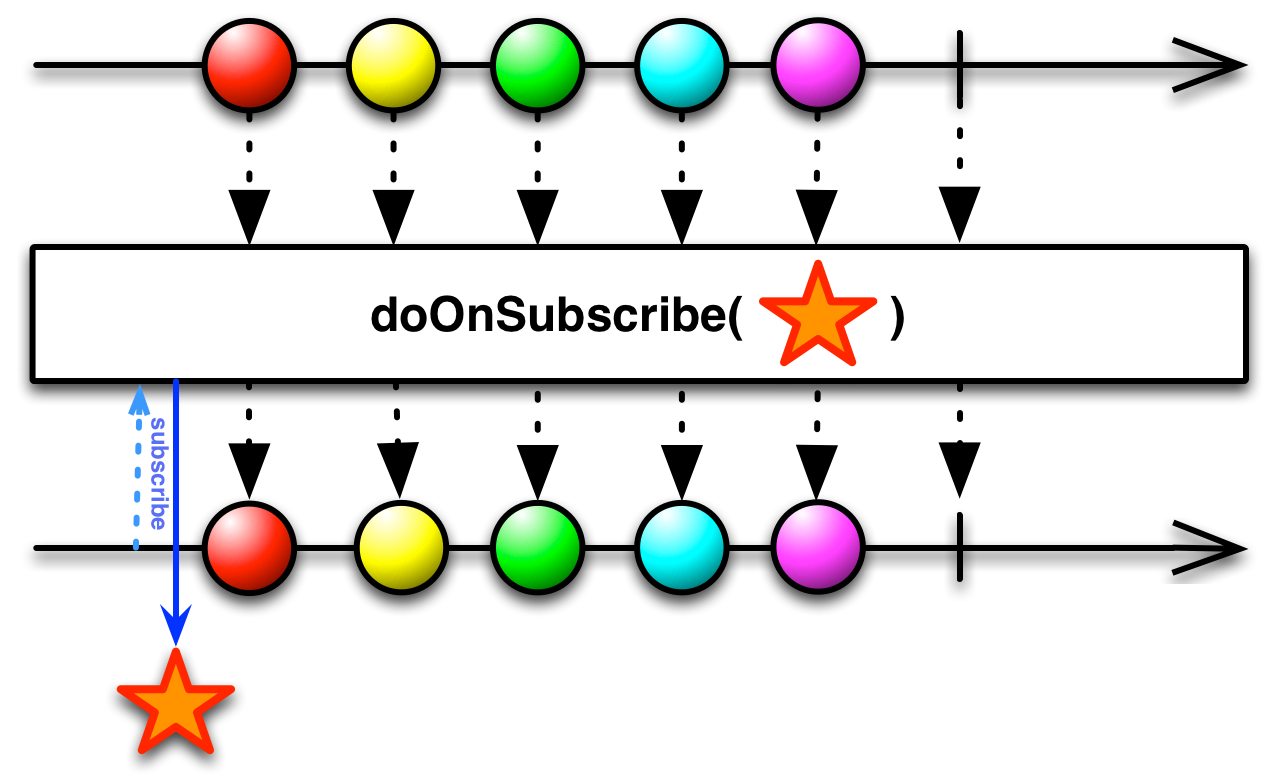
- Scheduler:
doOnSubscribedoes not operate by default on a particularScheduler.
Parameters
| onSubscribe | the Consumer that gets called when an Observer subscribes to the current Observable |
|---|
Returns
- the source
ObservableSourcemodified so as to call this Consumer when appropriate
public final Observable<T> doOnTerminate (Action onTerminate)
Modifies the source ObservableSource so that it invokes an action when it calls onComplete or
onError.
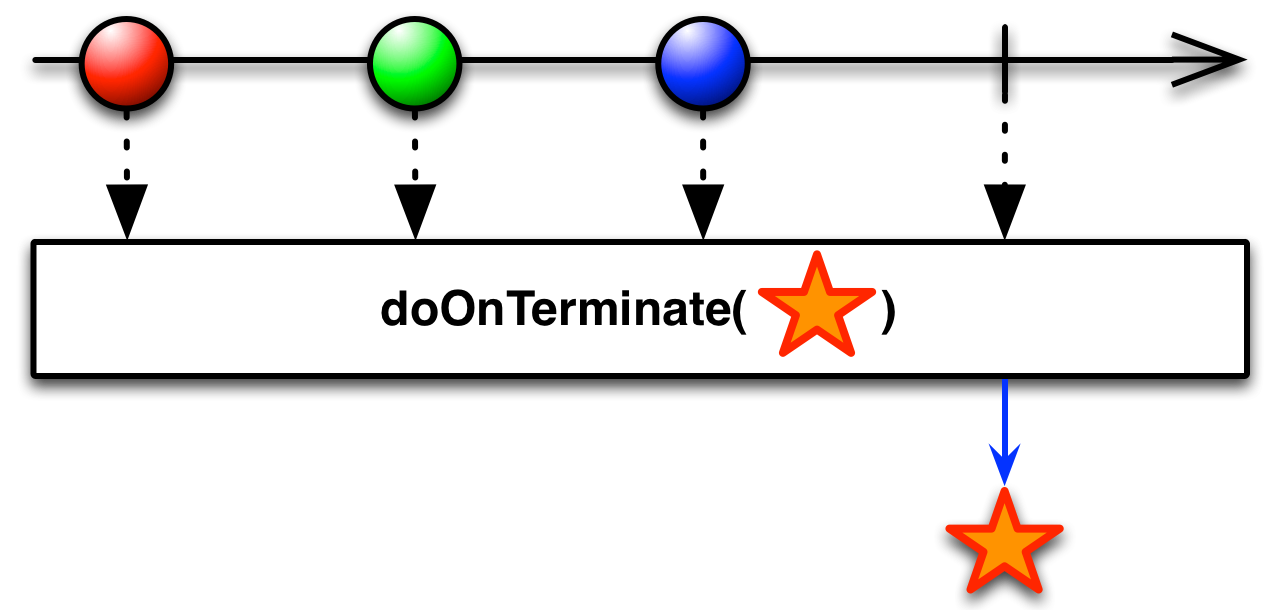
This differs from doAfterTerminate in that this happens before the onComplete or
onError notification.
- Scheduler:
doOnTerminatedoes not operate by default on a particularScheduler.
Parameters
| onTerminate | the action to invoke when the source ObservableSource calls onComplete or onError |
|---|
Returns
- the source ObservableSource with the side-effecting behavior applied
public final Single<T> elementAt (long index, T defaultItem)
Returns a Single that emits the item found at a specified index in a sequence of emissions from this Observable, or a default item if that index is out of range.
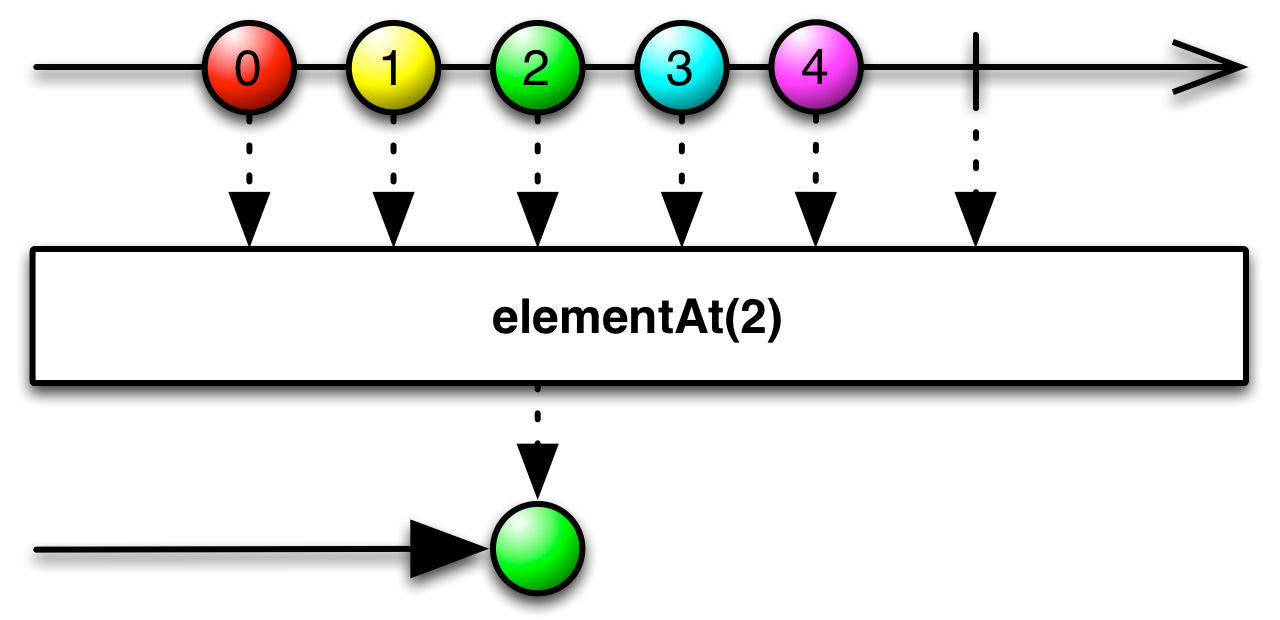
- Scheduler:
elementAtdoes not operate by default on a particularScheduler.
Parameters
| index | the zero-based index of the item to retrieve |
|---|---|
| defaultItem | the default item |
Returns
- a Single that emits the item at the specified position in the sequence emitted by the source ObservableSource, or the default item if that index is outside the bounds of the source sequence
Throws
| IndexOutOfBoundsException | if index is less than 0 |
|---|
public final Maybe<T> elementAt (long index)
Returns a Maybe that emits the single item at a specified index in a sequence of emissions from this Observable or completes if this Observable signals fewer elements than index.
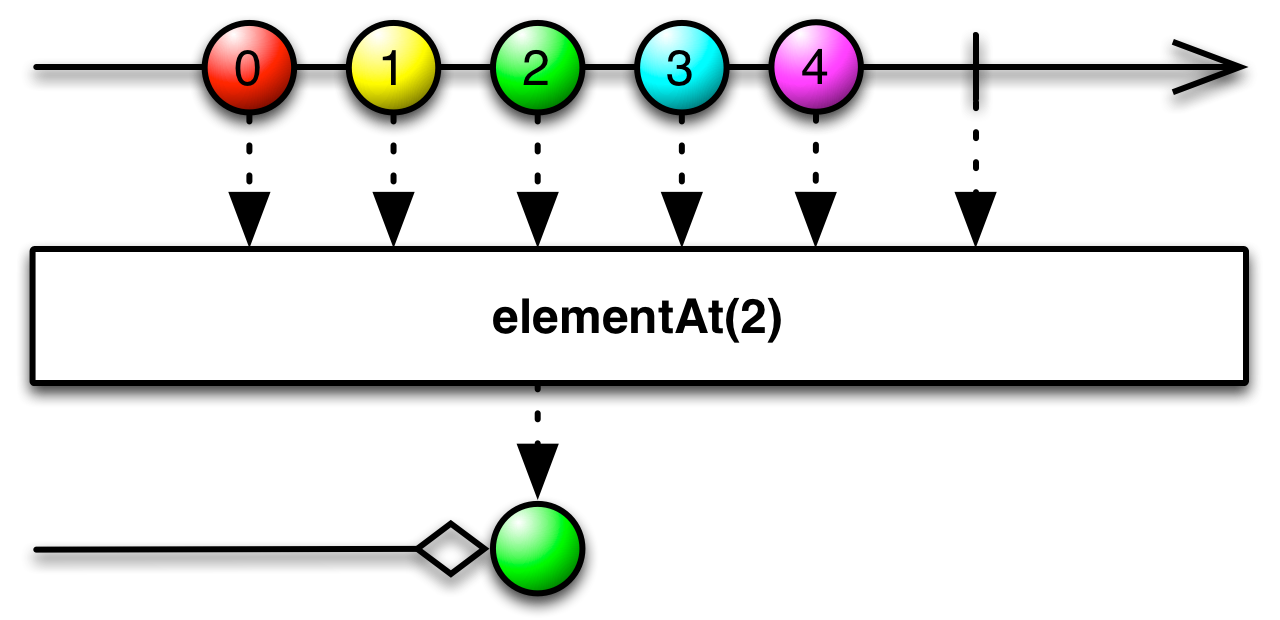
- Scheduler:
elementAtdoes not operate by default on a particularScheduler.
Parameters
| index | the zero-based index of the item to retrieve |
|---|
Returns
- a Maybe that emits a single item: the item at the specified position in the sequence of those emitted by the source ObservableSource
Throws
| IndexOutOfBoundsException | if index is less than 0 |
|---|
public final Single<T> elementAtOrError (long index)
Returns a Single that emits the item found at a specified index in a sequence of emissions from this Observable
or signals a NoSuchElementException if this Observable signals fewer elements than index.

- Scheduler:
elementAtOrErrordoes not operate by default on a particularScheduler.
Parameters
| index | the zero-based index of the item to retrieve |
|---|
Returns
- a Single that emits the item at the specified position in the sequence emitted by the source ObservableSource, or the default item if that index is outside the bounds of the source sequence
Throws
| IndexOutOfBoundsException | if index is less than 0 |
|---|
public static Observable<T> empty ()
Returns an Observable that emits no items to the Observer and immediately invokes its
onComplete method.

- Scheduler:
emptydoes not operate by default on a particularScheduler.
Returns
- an Observable that emits no items to the
Observerbut immediately invokes theObserver'sonCompletemethod
public static Observable<T> error (Callable<? extends Throwable> errorSupplier)
public static Observable<T> error (Throwable exception)
public final Observable<T> filter (Predicate<? super T> predicate)
Filters items emitted by an ObservableSource by only emitting those that satisfy a specified predicate.

- Scheduler:
filterdoes not operate by default on a particularScheduler.
Parameters
| predicate | a function that evaluates each item emitted by the source ObservableSource, returning true
if it passes the filter |
|---|
Returns
- an Observable that emits only those items emitted by the source ObservableSource that the filter
evaluates as
true
public final Single<T> first (T defaultItem)
Returns a Single that emits only the very first item emitted by the source ObservableSource, or a default item if the source ObservableSource completes without emitting any items.
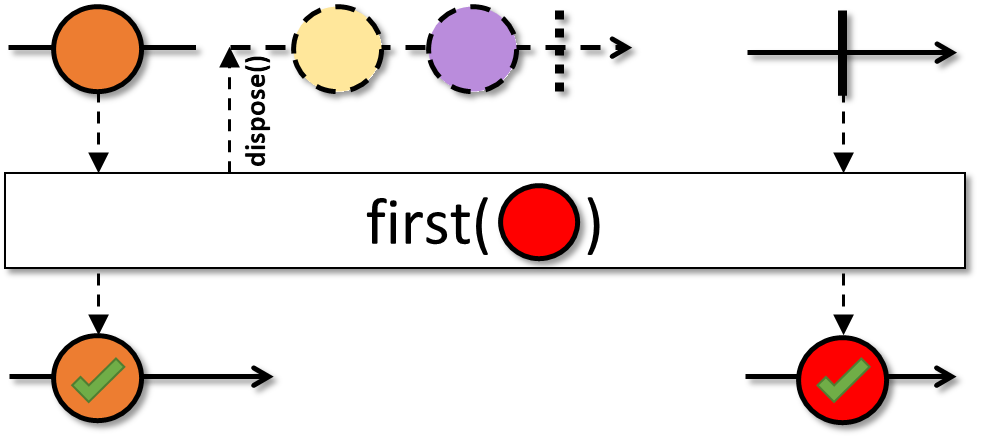
- Scheduler:
firstdoes not operate by default on a particularScheduler.
Parameters
| defaultItem | the default item to emit if the source ObservableSource doesn't emit anything |
|---|
Returns
- the new Single instance
public final Maybe<T> firstElement ()
Returns a Maybe that emits only the very first item emitted by the source ObservableSource, or completes if the source ObservableSource is empty.
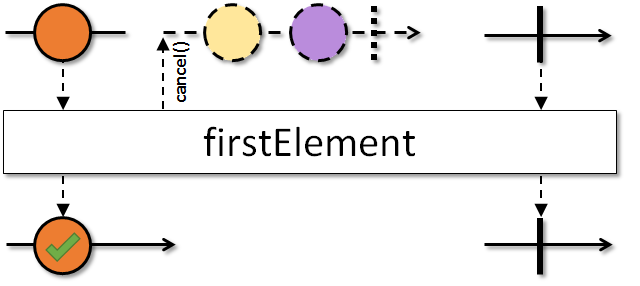
- Scheduler:
firstElementdoes not operate by default on a particularScheduler.
Returns
- the new Maybe instance
public final Single<T> firstOrError ()
Returns a Single that emits only the very first item emitted by this Observable or
signals a NoSuchElementException if this Observable is empty.
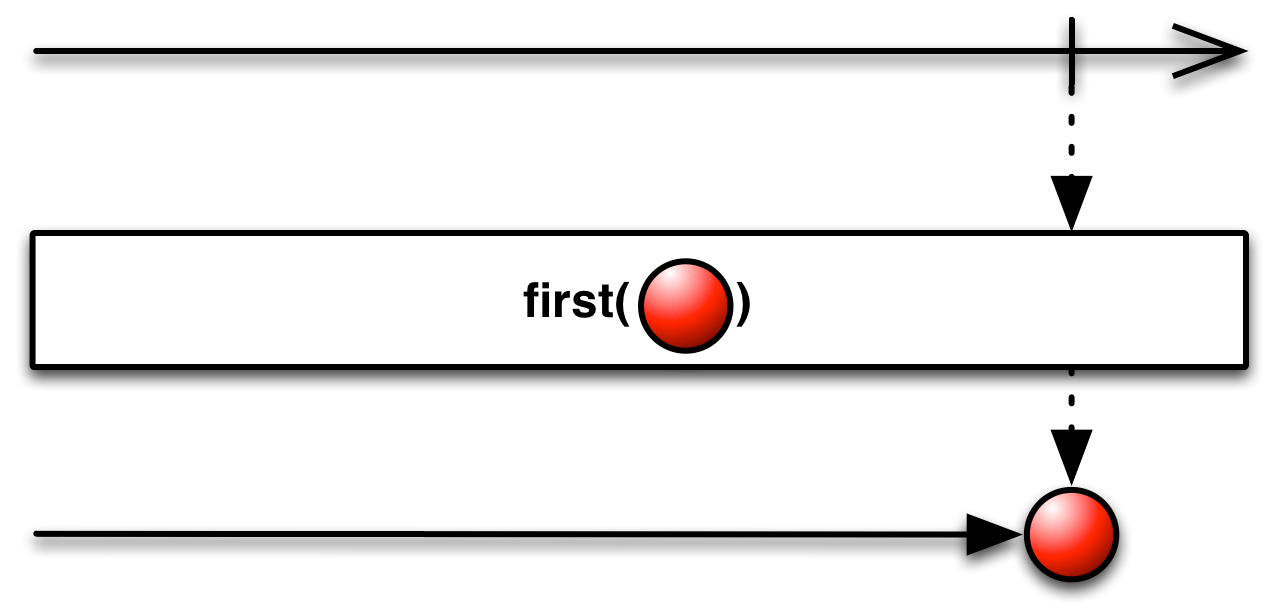
- Scheduler:
firstOrErrordoes not operate by default on a particularScheduler.
Returns
- the new Single instance
public final Observable<R> flatMap (Function<? super T, ? extends ObservableSource<? extends U>> mapper, BiFunction<? super T, ? super U, ? extends R> combiner, boolean delayErrors, int maxConcurrency, int bufferSize)
Returns an Observable that emits the results of a specified function to the pair of values emitted by the source ObservableSource and a specified collection ObservableSource, while limiting the maximum number of concurrent subscriptions to these ObservableSources.
- Scheduler:
flatMapdoes not operate by default on a particularScheduler.
Parameters
| mapper | a function that returns an ObservableSource for each item emitted by the source ObservableSource |
|---|---|
| combiner | a function that combines one item emitted by each of the source and collection ObservableSources and returns an item to be emitted by the resulting ObservableSource |
| delayErrors | if true, exceptions from the current Observable and all inner ObservableSources are delayed until all of them terminate if false, the first one signalling an exception will terminate the whole sequence immediately |
| maxConcurrency | the maximum number of ObservableSources that may be subscribed to concurrently |
| bufferSize | the number of elements to prefetch from the inner ObservableSources. |
Returns
- an Observable that emits the results of applying a function to a pair of values emitted by the source ObservableSource and the collection ObservableSource
public final Observable<R> flatMap (Function<? super T, ? extends ObservableSource<? extends R>> mapper)
Returns an Observable that emits items based on applying a function that you supply to each item emitted by the source ObservableSource, where that function returns an ObservableSource, and then merging those resulting ObservableSources and emitting the results of this merger.

- Scheduler:
flatMapdoes not operate by default on a particularScheduler.
Parameters
| mapper | a function that, when applied to an item emitted by the source ObservableSource, returns an ObservableSource |
|---|
Returns
- an Observable that emits the result of applying the transformation function to each item emitted by the source ObservableSource and merging the results of the ObservableSources obtained from this transformation
public final Observable<R> flatMap (Function<? super T, ? extends ObservableSource<? extends R>> onNextMapper, Function<Throwable, ? extends ObservableSource<? extends R>> onErrorMapper, Callable<? extends ObservableSource<? extends R>> onCompleteSupplier, int maxConcurrency)
Returns an Observable that applies a function to each item emitted or notification raised by the source ObservableSource and then flattens the ObservableSources returned from these functions and emits the resulting items, while limiting the maximum number of concurrent subscriptions to these ObservableSources.
- Scheduler:
flatMapdoes not operate by default on a particularScheduler.
Parameters
| onNextMapper | a function that returns an ObservableSource to merge for each item emitted by the source ObservableSource |
|---|---|
| onErrorMapper | a function that returns an ObservableSource to merge for an onError notification from the source ObservableSource |
| onCompleteSupplier | a function that returns an ObservableSource to merge for an onComplete notification from the source ObservableSource |
| maxConcurrency | the maximum number of ObservableSources that may be subscribed to concurrently |
Returns
- an Observable that emits the results of merging the ObservableSources returned from applying the specified functions to the emissions and notifications of the source ObservableSource
public final Observable<R> flatMap (Function<? super T, ? extends ObservableSource<? extends U>> mapper, BiFunction<? super T, ? super U, ? extends R> combiner, int maxConcurrency)
Returns an Observable that emits the results of a specified function to the pair of values emitted by the source ObservableSource and a specified collection ObservableSource, while limiting the maximum number of concurrent subscriptions to these ObservableSources.
- Scheduler:
flatMapdoes not operate by default on a particularScheduler.
Parameters
| mapper | a function that returns an ObservableSource for each item emitted by the source ObservableSource |
|---|---|
| combiner | a function that combines one item emitted by each of the source and collection ObservableSources and returns an item to be emitted by the resulting ObservableSource |
| maxConcurrency | the maximum number of ObservableSources that may be subscribed to concurrently |
Returns
- an Observable that emits the results of applying a function to a pair of values emitted by the source ObservableSource and the collection ObservableSource
public final Observable<R> flatMap (Function<? super T, ? extends ObservableSource<? extends R>> mapper, boolean delayErrors)
Returns an Observable that emits items based on applying a function that you supply to each item emitted by the source ObservableSource, where that function returns an ObservableSource, and then merging those resulting ObservableSources and emitting the results of this merger.

- Scheduler:
flatMapdoes not operate by default on a particularScheduler.
Parameters
| mapper | a function that, when applied to an item emitted by the source ObservableSource, returns an ObservableSource |
|---|---|
| delayErrors | if true, exceptions from the current Observable and all inner ObservableSources are delayed until all of them terminate if false, the first one signalling an exception will terminate the whole sequence immediately |
Returns
- an Observable that emits the result of applying the transformation function to each item emitted by the source ObservableSource and merging the results of the ObservableSources obtained from this transformation
public final Observable<R> flatMap (Function<? super T, ? extends ObservableSource<? extends U>> mapper, BiFunction<? super T, ? super U, ? extends R> combiner, boolean delayErrors)
Returns an Observable that emits the results of a specified function to the pair of values emitted by the source ObservableSource and a specified collection ObservableSource.
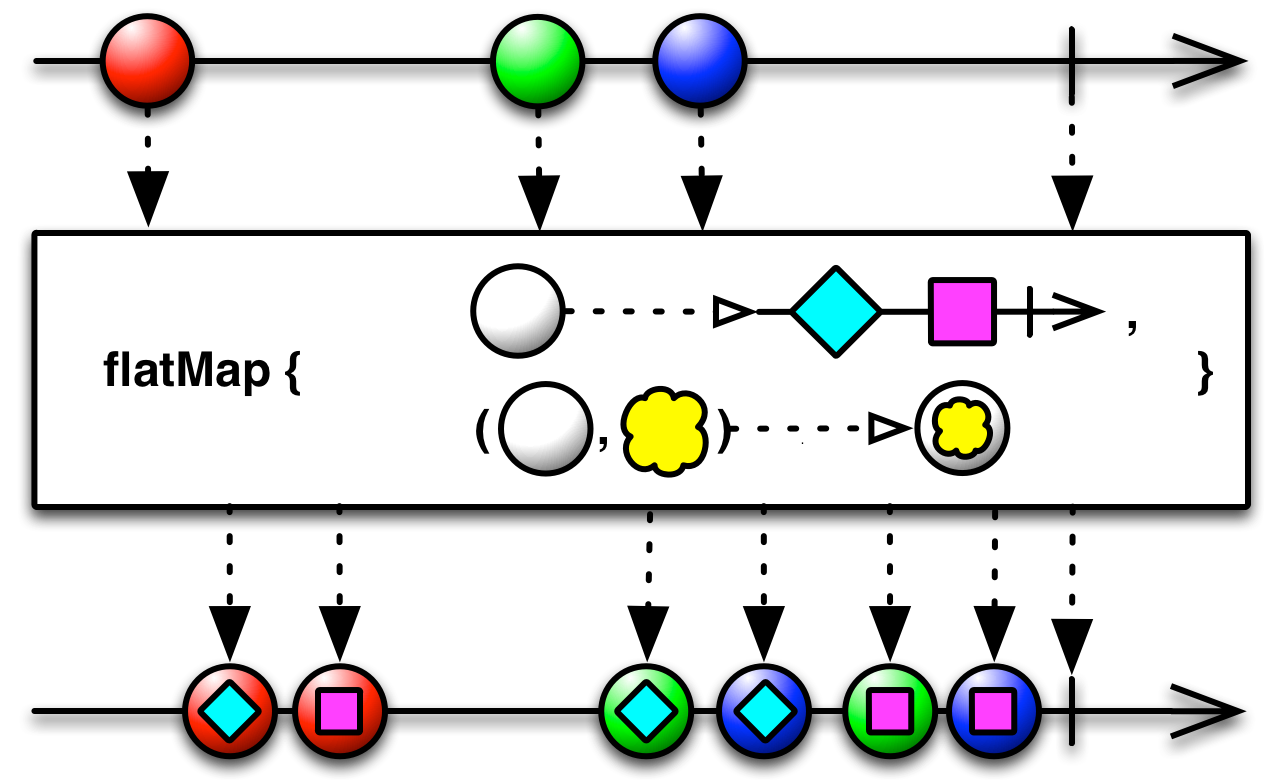
- Scheduler:
flatMapdoes not operate by default on a particularScheduler.
Parameters
| mapper | a function that returns an ObservableSource for each item emitted by the source ObservableSource |
|---|---|
| combiner | a function that combines one item emitted by each of the source and collection ObservableSources and returns an item to be emitted by the resulting ObservableSource |
| delayErrors | if true, exceptions from the current Observable and all inner ObservableSources are delayed until all of them terminate if false, the first one signalling an exception will terminate the whole sequence immediately |
Returns
- an Observable that emits the results of applying a function to a pair of values emitted by the source ObservableSource and the collection ObservableSource
public final Observable<R> flatMap (Function<? super T, ? extends ObservableSource<? extends R>> onNextMapper, Function<? super Throwable, ? extends ObservableSource<? extends R>> onErrorMapper, Callable<? extends ObservableSource<? extends R>> onCompleteSupplier)
Returns an Observable that applies a function to each item emitted or notification raised by the source ObservableSource and then flattens the ObservableSources returned from these functions and emits the resulting items.
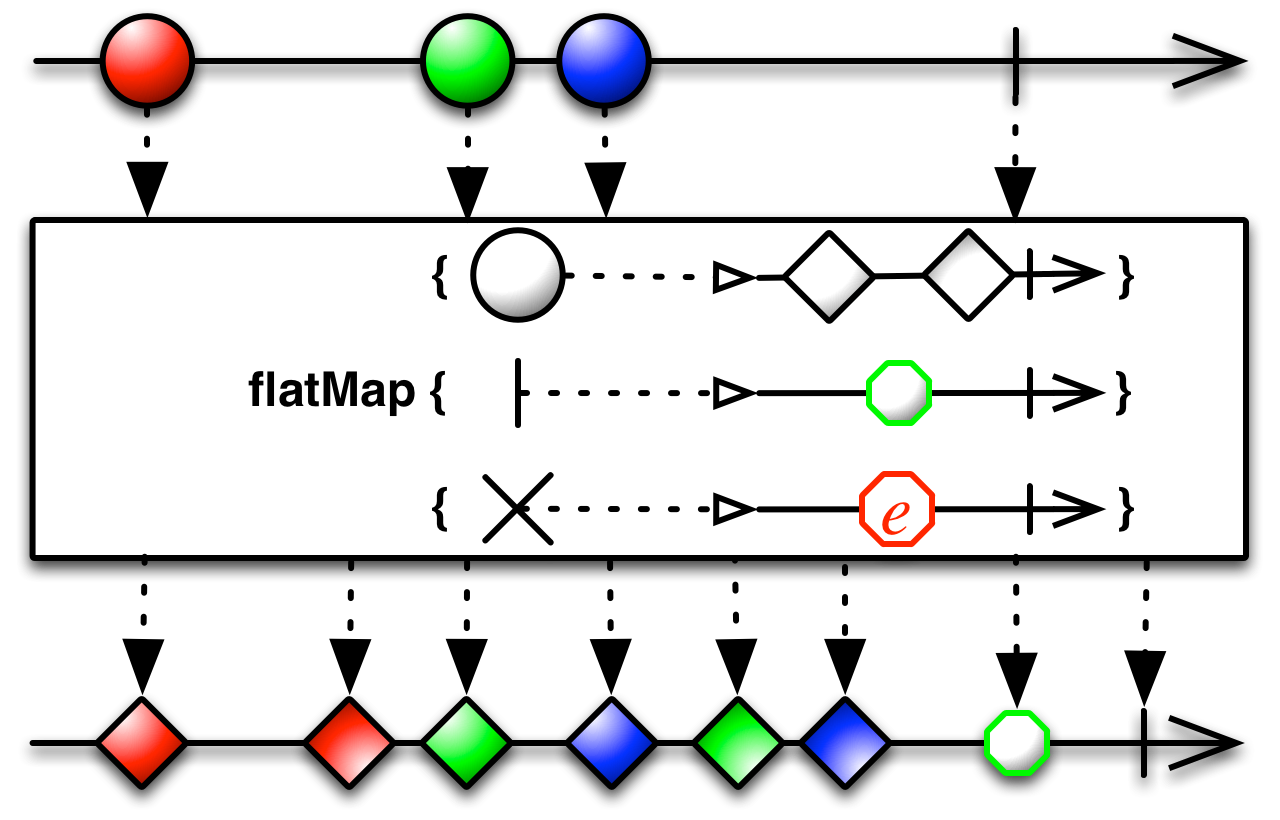
- Scheduler:
flatMapdoes not operate by default on a particularScheduler.
Parameters
| onNextMapper | a function that returns an ObservableSource to merge for each item emitted by the source ObservableSource |
|---|---|
| onErrorMapper | a function that returns an ObservableSource to merge for an onError notification from the source ObservableSource |
| onCompleteSupplier | a function that returns an ObservableSource to merge for an onComplete notification from the source ObservableSource |
Returns
- an Observable that emits the results of merging the ObservableSources returned from applying the specified functions to the emissions and notifications of the source ObservableSource
public final Observable<R> flatMap (Function<? super T, ? extends ObservableSource<? extends U>> mapper, BiFunction<? super T, ? super U, ? extends R> combiner, boolean delayErrors, int maxConcurrency)
Returns an Observable that emits the results of a specified function to the pair of values emitted by the source ObservableSource and a specified collection ObservableSource, while limiting the maximum number of concurrent subscriptions to these ObservableSources.
- Scheduler:
flatMapdoes not operate by default on a particularScheduler.
Parameters
| mapper | a function that returns an ObservableSource for each item emitted by the source ObservableSource |
|---|---|
| combiner | a function that combines one item emitted by each of the source and collection ObservableSources and returns an item to be emitted by the resulting ObservableSource |
| delayErrors | if true, exceptions from the current Observable and all inner ObservableSources are delayed until all of them terminate if false, the first one signalling an exception will terminate the whole sequence immediately |
| maxConcurrency | the maximum number of ObservableSources that may be subscribed to concurrently |
Returns
- an Observable that emits the results of applying a function to a pair of values emitted by the source ObservableSource and the collection ObservableSource
public final Observable<R> flatMap (Function<? super T, ? extends ObservableSource<? extends R>> mapper, boolean delayErrors, int maxConcurrency, int bufferSize)
Returns an Observable that emits items based on applying a function that you supply to each item emitted by the source ObservableSource, where that function returns an ObservableSource, and then merging those resulting ObservableSources and emitting the results of this merger, while limiting the maximum number of concurrent subscriptions to these ObservableSources.
- Scheduler:
flatMapdoes not operate by default on a particularScheduler.
Parameters
| mapper | a function that, when applied to an item emitted by the source ObservableSource, returns an ObservableSource |
|---|---|
| delayErrors | if true, exceptions from the current Observable and all inner ObservableSources are delayed until all of them terminate if false, the first one signalling an exception will terminate the whole sequence immediately |
| maxConcurrency | the maximum number of ObservableSources that may be subscribed to concurrently |
| bufferSize | the number of elements to prefetch from each inner ObservableSource |
Returns
- an Observable that emits the result of applying the transformation function to each item emitted by the source ObservableSource and merging the results of the ObservableSources obtained from this transformation
public final Observable<R> flatMap (Function<? super T, ? extends ObservableSource<? extends R>> mapper, boolean delayErrors, int maxConcurrency)
Returns an Observable that emits items based on applying a function that you supply to each item emitted by the source ObservableSource, where that function returns an ObservableSource, and then merging those resulting ObservableSources and emitting the results of this merger, while limiting the maximum number of concurrent subscriptions to these ObservableSources.
- Scheduler:
flatMapdoes not operate by default on a particularScheduler.
Parameters
| mapper | a function that, when applied to an item emitted by the source ObservableSource, returns an ObservableSource |
|---|---|
| delayErrors | if true, exceptions from the current Observable and all inner ObservableSources are delayed until all of them terminate if false, the first one signalling an exception will terminate the whole sequence immediately |
| maxConcurrency | the maximum number of ObservableSources that may be subscribed to concurrently |
Returns
- an Observable that emits the result of applying the transformation function to each item emitted by the source ObservableSource and merging the results of the ObservableSources obtained from this transformation
public final Observable<R> flatMap (Function<? super T, ? extends ObservableSource<? extends R>> mapper, int maxConcurrency)
Returns an Observable that emits items based on applying a function that you supply to each item emitted by the source ObservableSource, where that function returns an ObservableSource, and then merging those resulting ObservableSources and emitting the results of this merger, while limiting the maximum number of concurrent subscriptions to these ObservableSources.
- Scheduler:
flatMapdoes not operate by default on a particularScheduler.
Parameters
| mapper | a function that, when applied to an item emitted by the source ObservableSource, returns an ObservableSource |
|---|---|
| maxConcurrency | the maximum number of ObservableSources that may be subscribed to concurrently |
Returns
- an Observable that emits the result of applying the transformation function to each item emitted by the source ObservableSource and merging the results of the ObservableSources obtained from this transformation
public final Observable<R> flatMap (Function<? super T, ? extends ObservableSource<? extends U>> mapper, BiFunction<? super T, ? super U, ? extends R> resultSelector)
Returns an Observable that emits the results of a specified function to the pair of values emitted by the source ObservableSource and a specified collection ObservableSource.

- Scheduler:
flatMapdoes not operate by default on a particularScheduler.
Parameters
| mapper | a function that returns an ObservableSource for each item emitted by the source ObservableSource |
|---|---|
| resultSelector | a function that combines one item emitted by each of the source and collection ObservableSources and returns an item to be emitted by the resulting ObservableSource |
Returns
- an Observable that emits the results of applying a function to a pair of values emitted by the source ObservableSource and the collection ObservableSource
public final Completable flatMapCompletable (Function<? super T, ? extends CompletableSource> mapper, boolean delayErrors)
Maps each element of the upstream Observable into CompletableSources, subscribes to them and waits until the upstream and all CompletableSources complete, optionally delaying all errors.
- Scheduler:
flatMapCompletabledoes not operate by default on a particularScheduler.
Parameters
| mapper | the function that received each source value and transforms them into CompletableSources. |
|---|---|
| delayErrors | if true errors from the upstream and inner CompletableSources are delayed until each of them terminates. |
Returns
- the new Completable instance
public final Completable flatMapCompletable (Function<? super T, ? extends CompletableSource> mapper)
Maps each element of the upstream Observable into CompletableSources, subscribes to them and waits until the upstream and all CompletableSources complete.
- Scheduler:
flatMapCompletabledoes not operate by default on a particularScheduler.
Parameters
| mapper | the function that received each source value and transforms them into CompletableSources. |
|---|
Returns
- the new Completable instance
public final Observable<V> flatMapIterable (Function<? super T, ? extends Iterable<? extends U>> mapper, BiFunction<? super T, ? super U, ? extends V> resultSelector)
Returns an Observable that emits the results of applying a function to the pair of values from the source ObservableSource and an Iterable corresponding to that item that is generated by a selector.
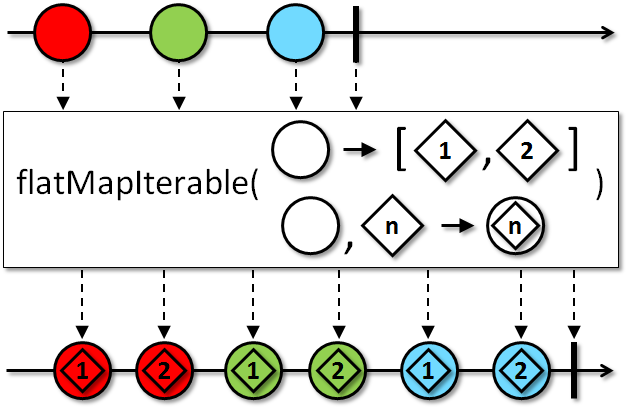
- Scheduler:
flatMapIterabledoes not operate by default on a particularScheduler.
Parameters
| mapper | a function that returns an Iterable sequence of values for each item emitted by the source ObservableSource |
|---|---|
| resultSelector | a function that returns an item based on the item emitted by the source ObservableSource and the
Iterable returned for that item by the collectionSelector |
Returns
- an Observable that emits the items returned by
resultSelectorfor each item in the source ObservableSource
public final Observable<U> flatMapIterable (Function<? super T, ? extends Iterable<? extends U>> mapper)
Returns an Observable that merges each item emitted by the source ObservableSource with the values in an Iterable corresponding to that item that is generated by a selector.
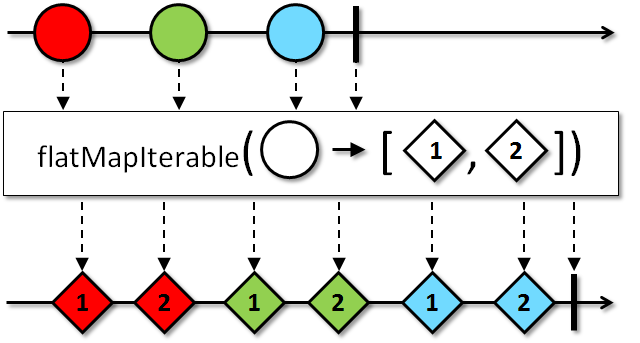
- Scheduler:
flatMapIterabledoes not operate by default on a particularScheduler.
Parameters
| mapper | a function that returns an Iterable sequence of values for when given an item emitted by the source ObservableSource |
|---|
Returns
- an Observable that emits the results of merging the items emitted by the source ObservableSource with
the values in the Iterables corresponding to those items, as generated by
collectionSelector
public final Observable<R> flatMapMaybe (Function<? super T, ? extends MaybeSource<? extends R>> mapper, boolean delayErrors)
Maps each element of the upstream Observable into MaybeSources, subscribes to them and waits until the upstream and all MaybeSources complete, optionally delaying all errors.
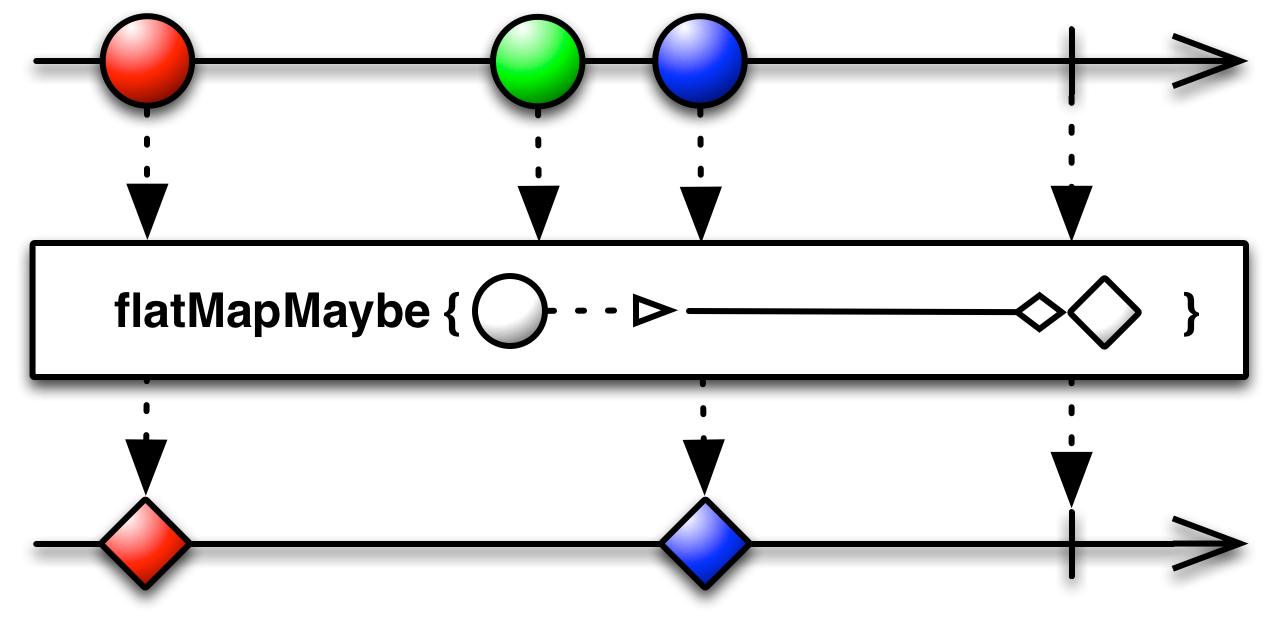
- Scheduler:
flatMapMaybedoes not operate by default on a particularScheduler.
Parameters
| mapper | the function that received each source value and transforms them into MaybeSources. |
|---|---|
| delayErrors | if true errors from the upstream and inner MaybeSources are delayed until each of them terminates. |
Returns
- the new Observable instance
public final Observable<R> flatMapMaybe (Function<? super T, ? extends MaybeSource<? extends R>> mapper)
Maps each element of the upstream Observable into MaybeSources, subscribes to them and waits until the upstream and all MaybeSources complete.

- Scheduler:
flatMapMaybedoes not operate by default on a particularScheduler.
Parameters
| mapper | the function that received each source value and transforms them into MaybeSources. |
|---|
Returns
- the new Observable instance
public final Observable<R> flatMapSingle (Function<? super T, ? extends SingleSource<? extends R>> mapper)
Maps each element of the upstream Observable into SingleSources, subscribes to them and waits until the upstream and all SingleSources complete.
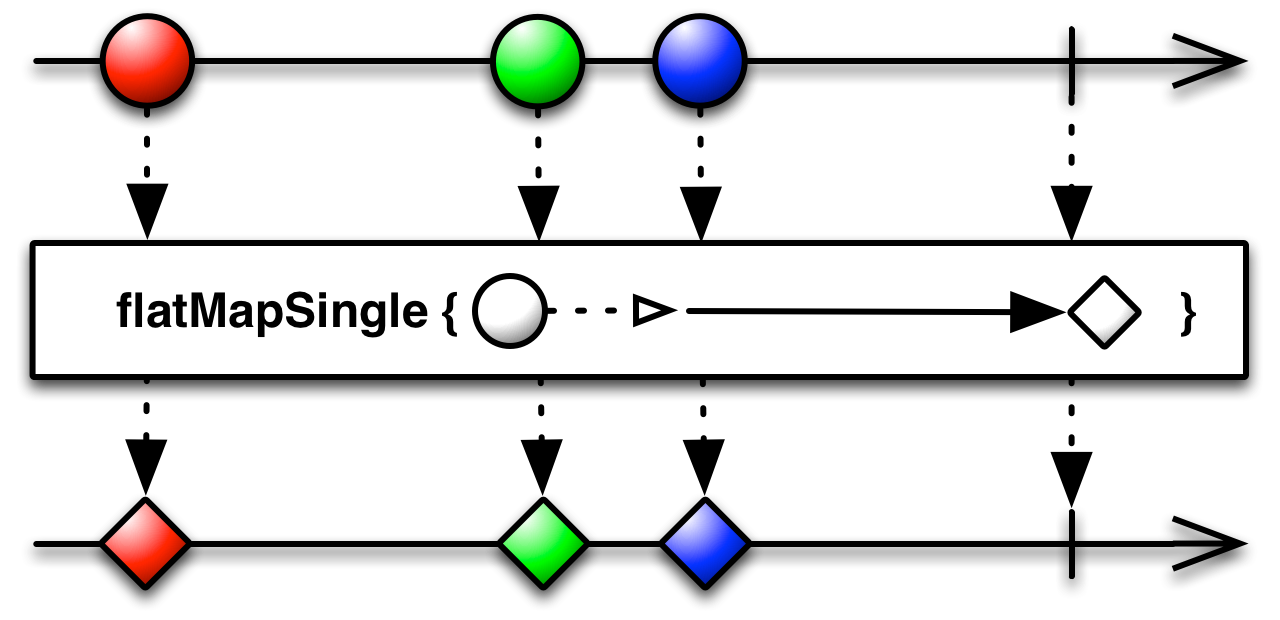
- Scheduler:
flatMapSingledoes not operate by default on a particularScheduler.
Parameters
| mapper | the function that received each source value and transforms them into SingleSources. |
|---|
Returns
- the new Observable instance
public final Observable<R> flatMapSingle (Function<? super T, ? extends SingleSource<? extends R>> mapper, boolean delayErrors)
Maps each element of the upstream Observable into SingleSources, subscribes to them and waits until the upstream and all SingleSources complete, optionally delaying all errors.

- Scheduler:
flatMapSingledoes not operate by default on a particularScheduler.
Parameters
| mapper | the function that received each source value and transforms them into SingleSources. |
|---|---|
| delayErrors | if true errors from the upstream and inner SingleSources are delayed until each of them terminates. |
Returns
- the new Observable instance
public final Disposable forEach (Consumer<? super T> onNext)
Subscribes to the ObservableSource and receives notifications for each element.
Alias to subscribe(Consumer)
- Scheduler:
forEachdoes not operate by default on a particularScheduler.
Parameters
| onNext | Consumer to execute for each item. |
|---|
Returns
- a Disposable that allows cancelling an asynchronous sequence
Throws
| NullPointerException | if onNext is null |
|---|
public final Disposable forEachWhile (Predicate<? super T> onNext, Consumer<? super Throwable> onError, Action onComplete)
Subscribes to the ObservableSource and receives notifications for each element and the terminal events until the
onNext Predicate returns false.
- Scheduler:
forEachWhiledoes not operate by default on a particularScheduler.
Parameters
| onNext | Predicate to execute for each item. |
|---|---|
| onError | Consumer to execute when an error is emitted. |
| onComplete | Action to execute when completion is signalled. |
Returns
- a Disposable that allows cancelling an asynchronous sequence
Throws
| NullPointerException | if onNext is null, or
if onError is null, or
if onComplete is null |
|---|
public final Disposable forEachWhile (Predicate<? super T> onNext, Consumer<? super Throwable> onError)
Subscribes to the ObservableSource and receives notifications for each element and error events until the
onNext Predicate returns false.
- Scheduler:
forEachWhiledoes not operate by default on a particularScheduler.
Parameters
| onNext | Predicate to execute for each item. |
|---|---|
| onError | Consumer to execute when an error is emitted. |
Returns
- a Disposable that allows cancelling an asynchronous sequence
Throws
| NullPointerException | if onNext is null, or
if onError is null |
|---|
public final Disposable forEachWhile (Predicate<? super T> onNext)
Subscribes to the ObservableSource and receives notifications for each element until the
onNext Predicate returns false.
If the Observable emits an error, it is wrapped into an
OnErrorNotImplementedException
and routed to the RxJavaPlugins.onError handler.
- Scheduler:
forEachWhiledoes not operate by default on a particularScheduler.
Parameters
| onNext | Predicate to execute for each item. |
|---|
Returns
- a Disposable that allows cancelling an asynchronous sequence
Throws
| NullPointerException | if onNext is null |
|---|
public static Observable<T> fromArray (T... items)
Converts an Array into an ObservableSource that emits the items in the Array.
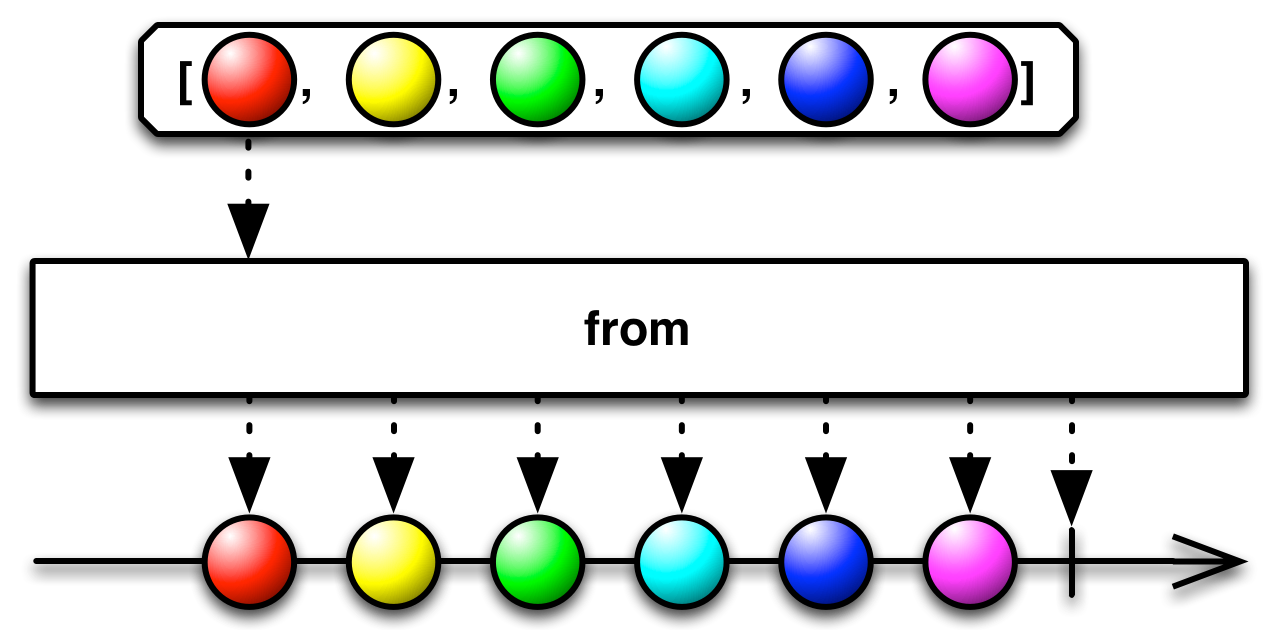
- Scheduler:
fromArraydoes not operate by default on a particularScheduler.
Parameters
| items | the array of elements |
|---|
Returns
- an Observable that emits each item in the source Array
public static Observable<T> fromCallable (Callable<? extends T> supplier)
Returns an Observable that, when an observer subscribes to it, invokes a function you specify and then emits the value returned from that function.
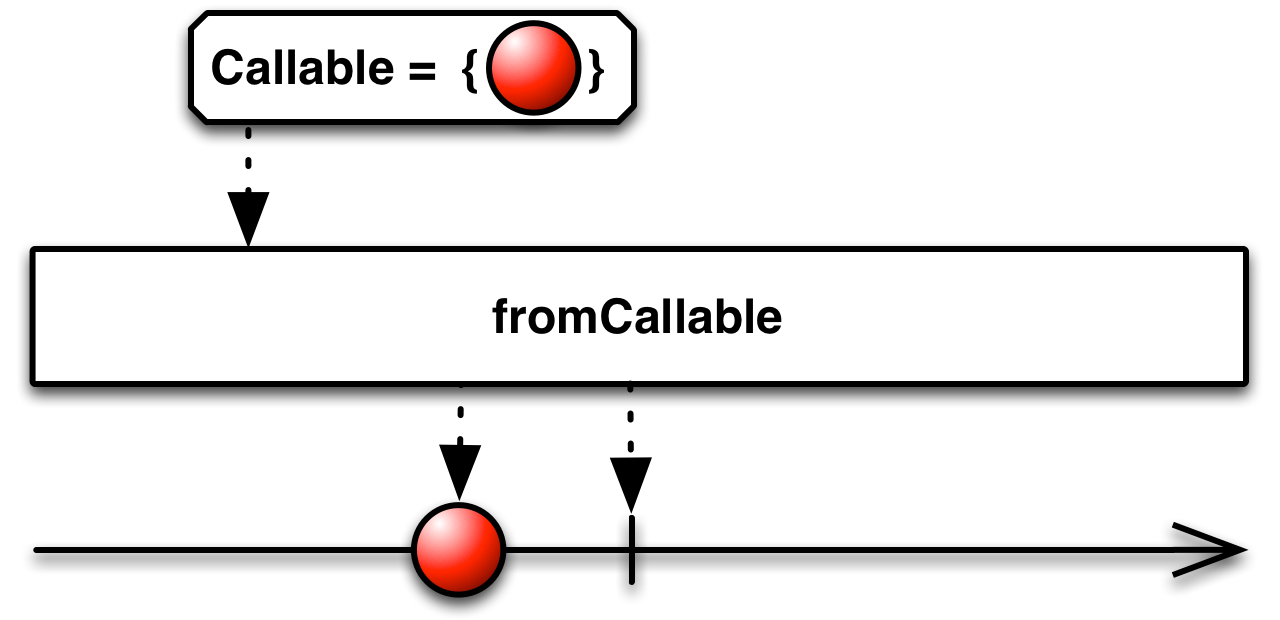
This allows you to defer the execution of the function you specify until an observer subscribes to the ObservableSource. That is to say, it makes the function "lazy."
- Scheduler:
fromCallabledoes not operate by default on a particularScheduler.
Parameters
| supplier | a function, the execution of which should be deferred; fromCallable will invoke this
function only when an observer subscribes to the ObservableSource that fromCallable returns |
|---|
Returns
- an Observable whose
Observers' subscriptions trigger an invocation of the given function
See Also
public static Observable<T> fromFuture (Future<? extends T> future, Scheduler scheduler)
Converts a Future, operating on a specified Scheduler, into an ObservableSource.
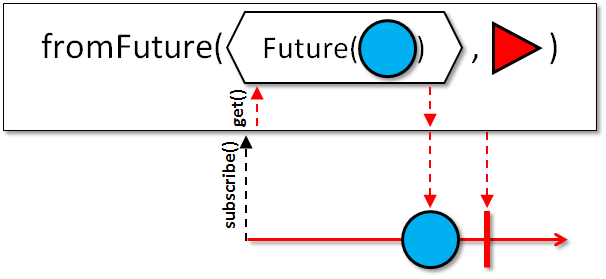
You can convert any object that supports the Future interface into an ObservableSource that emits the
return value of the get() method of that object, by passing the object into the from
method.
Unlike 1.x, cancelling the Observable won't cancel the future. If necessary, one can use composition to achieve the
cancellation effect: futureObservableSource.doOnCancel(() -> future.cancel(true));.
- Scheduler:
- You specify which
Schedulerthis operator will use
Parameters
| future | the source Future |
|---|---|
| scheduler | the Scheduler to wait for the Future on. Use a Scheduler such as
io() that can block and wait on the Future |
Returns
- an Observable that emits the item from the source
Future
public static Observable<T> fromFuture (Future<? extends T> future, long timeout, TimeUnit unit, Scheduler scheduler)
Converts a Future into an ObservableSource, with a timeout on the Future.
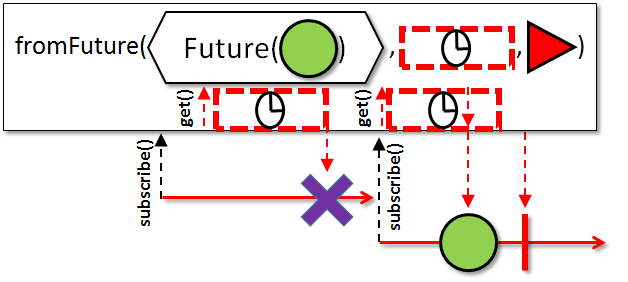
You can convert any object that supports the Future interface into an ObservableSource that emits the
return value of the get() method of that object, by passing the object into the from
method.
Unlike 1.x, cancelling the Observable won't cancel the future. If necessary, one can use composition to achieve the
cancellation effect: futureObservableSource.doOnCancel(() -> future.cancel(true));.
Important note: This ObservableSource is blocking; you cannot dispose it.
- Scheduler:
fromFuturedoes not operate by default on a particularScheduler.
Parameters
| future | the source Future |
|---|---|
| timeout | the maximum time to wait before calling get |
| unit | the TimeUnit of the timeout argument |
| scheduler | the Scheduler to wait for the Future on. Use a Scheduler such as
io() that can block and wait on the Future |
Returns
- an Observable that emits the item from the source
Future
public static Observable<T> fromFuture (Future<? extends T> future, long timeout, TimeUnit unit)
Converts a Future into an ObservableSource, with a timeout on the Future.
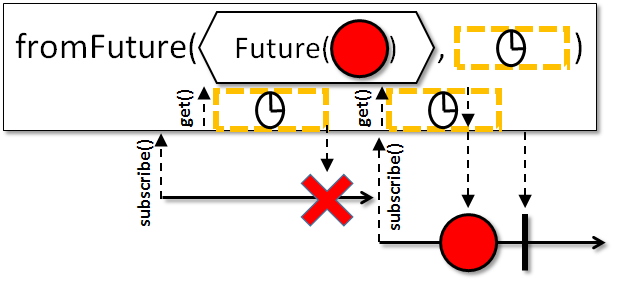
You can convert any object that supports the Future interface into an ObservableSource that emits the
return value of the get() method of that object, by passing the object into the from
method.
Unlike 1.x, cancelling the Observable won't cancel the future. If necessary, one can use composition to achieve the
cancellation effect: futureObservableSource.doOnCancel(() -> future.cancel(true));.
Important note: This ObservableSource is blocking; you cannot dispose it.
- Scheduler:
fromFuturedoes not operate by default on a particularScheduler.
Parameters
| future | the source Future |
|---|---|
| timeout | the maximum time to wait before calling get |
| unit | the TimeUnit of the timeout argument |
Returns
- an Observable that emits the item from the source
Future
public static Observable<T> fromFuture (Future<? extends T> future)
Converts a Future into an ObservableSource.
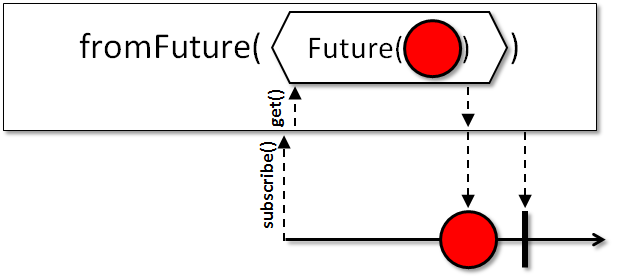
You can convert any object that supports the Future interface into an ObservableSource that emits the
return value of the get() method of that object, by passing the object into the from
method.
Important note: This ObservableSource is blocking; you cannot dispose it.
Unlike 1.x, cancelling the Observable won't cancel the future. If necessary, one can use composition to achieve the
cancellation effect: futureObservableSource.doOnCancel(() -> future.cancel(true));.
- Scheduler:
fromFuturedoes not operate by default on a particularScheduler.
Parameters
| future | the source Future |
|---|
Returns
- an Observable that emits the item from the source
Future
public static Observable<T> fromIterable (Iterable<? extends T> source)
public static Observable<T> fromPublisher (Publisher<? extends T> publisher)
Converts an arbitrary Reactive-Streams Publisher into an Observable.
- Backpressure:
- The source
publisheris consumed in an unbounded fashion without applying any backpressure to it. - Scheduler:
fromPublisherdoes not operate by default on a particularScheduler.
Parameters
| publisher | the Publisher to convert |
|---|
Returns
- the new Observable instance
Throws
| NullPointerException | if publisher is null |
|---|
public static Observable<T> generate (Callable<S> initialState, BiFunction<S, Emitter<T>, S> generator, Consumer<? super S> disposeState)
Returns a cold, synchronous and stateful generator of values.
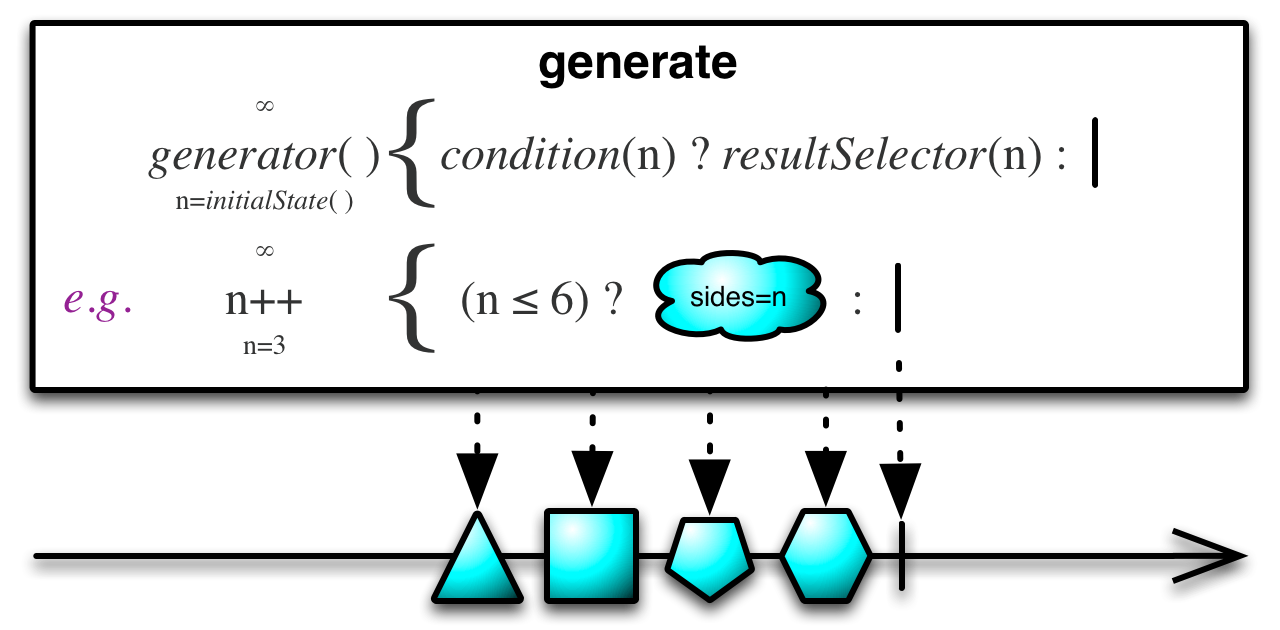
- Scheduler:
generatedoes not operate by default on a particularScheduler.
Parameters
| initialState | the Callable to generate the initial state for each Observer |
|---|---|
| generator | the Function called with the current state whenever a particular downstream Observer has
requested a value. The callback then should call onNext, onError or
onComplete to signal a value or a terminal event and should return a (new) state for
the next invocation. Signalling multiple onNext
in a call will make the operator signal IllegalStateException. |
| disposeState | the Consumer that is called with the current state when the generator terminates the sequence or it gets cancelled |
Returns
- the new Observable instance
public static Observable<T> generate (Callable<S> initialState, BiFunction<S, Emitter<T>, S> generator)
Returns a cold, synchronous and stateful generator of values.

- Scheduler:
generatedoes not operate by default on a particularScheduler.
Parameters
| initialState | the Callable to generate the initial state for each Observer |
|---|---|
| generator | the Function called with the current state whenever a particular downstream Observer has
requested a value. The callback then should call onNext, onError or
onComplete to signal a value or a terminal event and should return a (new) state for
the next invocation. Signalling multiple onNext
in a call will make the operator signal IllegalStateException. |
Returns
- the new Observable instance
public static Observable<T> generate (Callable<S> initialState, BiConsumer<S, Emitter<T>> generator)
Returns a cold, synchronous and stateful generator of values.

- Scheduler:
generatedoes not operate by default on a particularScheduler.
Parameters
| initialState | the Callable to generate the initial state for each Observer |
|---|---|
| generator | the Consumer called with the current state whenever a particular downstream Observer has
requested a value. The callback then should call onNext, onError or
onComplete to signal a value or a terminal event. Signalling multiple onNext
in a call will make the operator signal IllegalStateException. |
Returns
- the new Observable instance
public static Observable<T> generate (Callable<S> initialState, BiConsumer<S, Emitter<T>> generator, Consumer<? super S> disposeState)
Returns a cold, synchronous and stateful generator of values.

- Scheduler:
generatedoes not operate by default on a particularScheduler.
Parameters
| initialState | the Callable to generate the initial state for each Observer |
|---|---|
| generator | the Consumer called with the current state whenever a particular downstream Observer has
requested a value. The callback then should call onNext, onError or
onComplete to signal a value or a terminal event. Signalling multiple onNext
in a call will make the operator signal IllegalStateException. |
| disposeState | the Consumer that is called with the current state when the generator terminates the sequence or it gets cancelled |
Returns
- the new Observable instance
public static Observable<T> generate (Consumer<Emitter<T>> generator)
Returns a cold, synchronous and stateless generator of values.

- Scheduler:
generatedoes not operate by default on a particularScheduler.
Parameters
| generator | the Consumer called whenever a particular downstream Observer has
requested a value. The callback then should call onNext, onError or
onComplete to signal a value or a terminal event. Signalling multiple onNext
in a call will make the operator signal IllegalStateException. |
|---|
Returns
- the new Observable instance
public final Observable<GroupedObservable<K, T>> groupBy (Function<? super T, ? extends K> keySelector, boolean delayError)
Groups the items emitted by an ObservableSource according to a specified criterion, and emits these
grouped items as GroupedObservables. The emitted GroupedObservableSource allows only a single
Observer during its lifetime and if this Observer calls dispose() before the
source terminates, the next emission by the source having the same key will trigger a new
GroupedObservableSource emission.
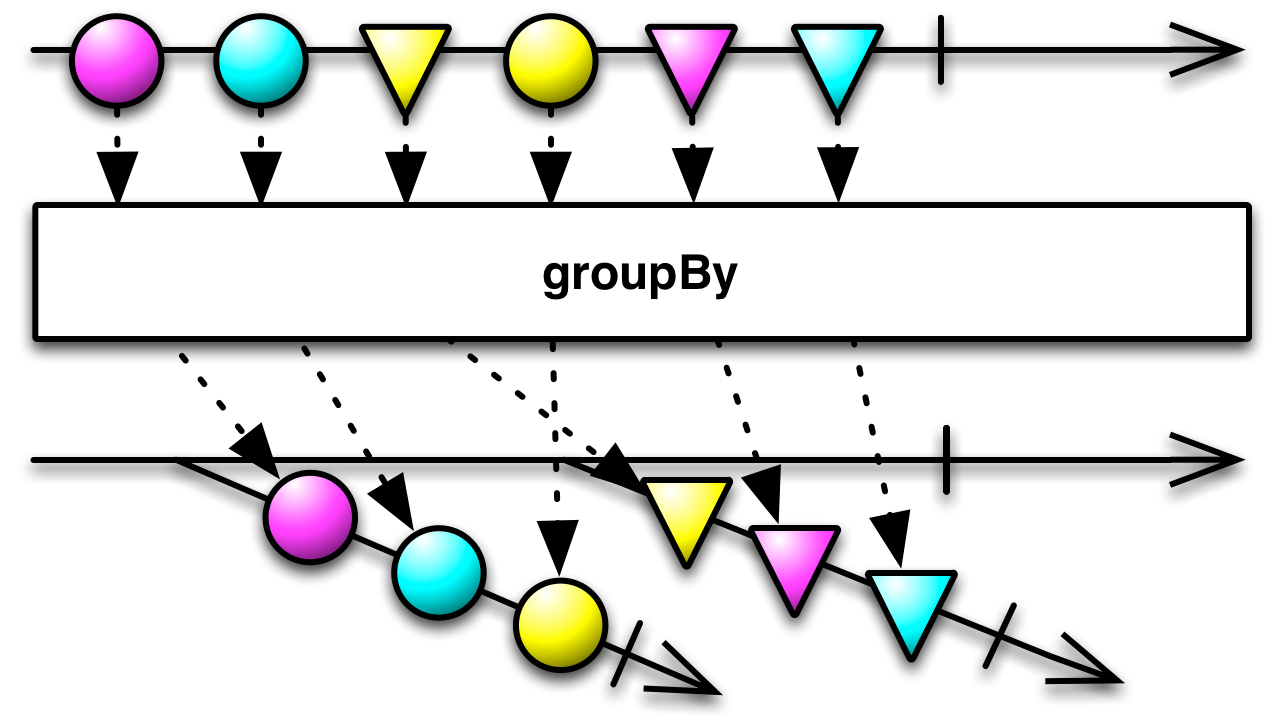
Note: A GroupedObservable will cache the items it is to emit until such time as it
is subscribed to. For this reason, in order to avoid memory leaks, you should not simply ignore those
GroupedObservableSources that do not concern you. Instead, you can signal to them that they may
discard their buffers by applying an operator like ignoreElements() to them.
- Scheduler:
groupBydoes not operate by default on a particularScheduler.
Parameters
| keySelector | a function that extracts the key for each item |
|---|---|
| delayError | if true, the exception from the current Observable is delayed in each group until that specific group emitted the normal values; if false, the exception bypasses values in the groups and is reported immediately. |
Returns
- an
ObservableSourcethat emitsGroupedObservables, each of which corresponds to a unique key value and each of which emits those items from the source ObservableSource that share that key value
public final Observable<GroupedObservable<K, T>> groupBy (Function<? super T, ? extends K> keySelector)
Groups the items emitted by an ObservableSource according to a specified criterion, and emits these
grouped items as GroupedObservables. The emitted GroupedObservableSource allows only a single
Observer during its lifetime and if this Observer calls dispose() before the
source terminates, the next emission by the source having the same key will trigger a new
GroupedObservableSource emission.

Note: A GroupedObservable will cache the items it is to emit until such time as it
is subscribed to. For this reason, in order to avoid memory leaks, you should not simply ignore those
GroupedObservableSources that do not concern you. Instead, you can signal to them that they may
discard their buffers by applying an operator like ignoreElements() to them.
- Scheduler:
groupBydoes not operate by default on a particularScheduler.
Parameters
| keySelector | a function that extracts the key for each item |
|---|
Returns
- an
ObservableSourcethat emitsGroupedObservables, each of which corresponds to a unique key value and each of which emits those items from the source ObservableSource that share that key value
public final Observable<GroupedObservable<K, V>> groupBy (Function<? super T, ? extends K> keySelector, Function<? super T, ? extends V> valueSelector)
Groups the items emitted by an ObservableSource according to a specified criterion, and emits these
grouped items as GroupedObservables. The emitted GroupedObservableSource allows only a single
Observer during its lifetime and if this Observer calls dispose() before the
source terminates, the next emission by the source having the same key will trigger a new
GroupedObservableSource emission.

Note: A GroupedObservable will cache the items it is to emit until such time as it
is subscribed to. For this reason, in order to avoid memory leaks, you should not simply ignore those
GroupedObservableSources that do not concern you. Instead, you can signal to them that they may
discard their buffers by applying an operator like ignoreElements() to them.
- Scheduler:
groupBydoes not operate by default on a particularScheduler.
Parameters
| keySelector | a function that extracts the key for each item |
|---|---|
| valueSelector | a function that extracts the return element for each item |
Returns
- an
ObservableSourcethat emitsGroupedObservables, each of which corresponds to a unique key value and each of which emits those items from the source ObservableSource that share that key value
public final Observable<GroupedObservable<K, V>> groupBy (Function<? super T, ? extends K> keySelector, Function<? super T, ? extends V> valueSelector, boolean delayError)
Groups the items emitted by an ObservableSource according to a specified criterion, and emits these
grouped items as GroupedObservables. The emitted GroupedObservableSource allows only a single
Observer during its lifetime and if this Observer calls dispose() before the
source terminates, the next emission by the source having the same key will trigger a new
GroupedObservableSource emission.

Note: A GroupedObservable will cache the items it is to emit until such time as it
is subscribed to. For this reason, in order to avoid memory leaks, you should not simply ignore those
GroupedObservableSources that do not concern you. Instead, you can signal to them that they may
discard their buffers by applying an operator like ignoreElements() to them.
- Scheduler:
groupBydoes not operate by default on a particularScheduler.
Parameters
| keySelector | a function that extracts the key for each item |
|---|---|
| valueSelector | a function that extracts the return element for each item |
| delayError | if true, the exception from the current Observable is delayed in each group until that specific group emitted the normal values; if false, the exception bypasses values in the groups and is reported immediately. |
Returns
- an
ObservableSourcethat emitsGroupedObservables, each of which corresponds to a unique key value and each of which emits those items from the source ObservableSource that share that key value
public final Observable<GroupedObservable<K, V>> groupBy (Function<? super T, ? extends K> keySelector, Function<? super T, ? extends V> valueSelector, boolean delayError, int bufferSize)
Groups the items emitted by an ObservableSource according to a specified criterion, and emits these
grouped items as GroupedObservables. The emitted GroupedObservableSource allows only a single
Observer during its lifetime and if this Observer calls dispose() before the
source terminates, the next emission by the source having the same key will trigger a new
GroupedObservableSource emission.

Note: A GroupedObservable will cache the items it is to emit until such time as it
is subscribed to. For this reason, in order to avoid memory leaks, you should not simply ignore those
GroupedObservableSources that do not concern you. Instead, you can signal to them that they may
discard their buffers by applying an operator like ignoreElements() to them.
- Scheduler:
groupBydoes not operate by default on a particularScheduler.
Parameters
| keySelector | a function that extracts the key for each item |
|---|---|
| valueSelector | a function that extracts the return element for each item |
| delayError | if true, the exception from the current Observable is delayed in each group until that specific group emitted the normal values; if false, the exception bypasses values in the groups and is reported immediately. |
| bufferSize | the hint for how many GroupedObservables and element in each GroupedObservable should be buffered |
Returns
- an
ObservableSourcethat emitsGroupedObservables, each of which corresponds to a unique key value and each of which emits those items from the source ObservableSource that share that key value
public final Observable<R> groupJoin (ObservableSource<? extends TRight> other, Function<? super T, ? extends ObservableSource<TLeftEnd>> leftEnd, Function<? super TRight, ? extends ObservableSource<TRightEnd>> rightEnd, BiFunction<? super T, ? super Observable<TRight>, ? extends R> resultSelector)
Returns an Observable that correlates two ObservableSources when they overlap in time and groups the results.
There are no guarantees in what order the items get combined when multiple items from one or both source ObservableSources overlap.
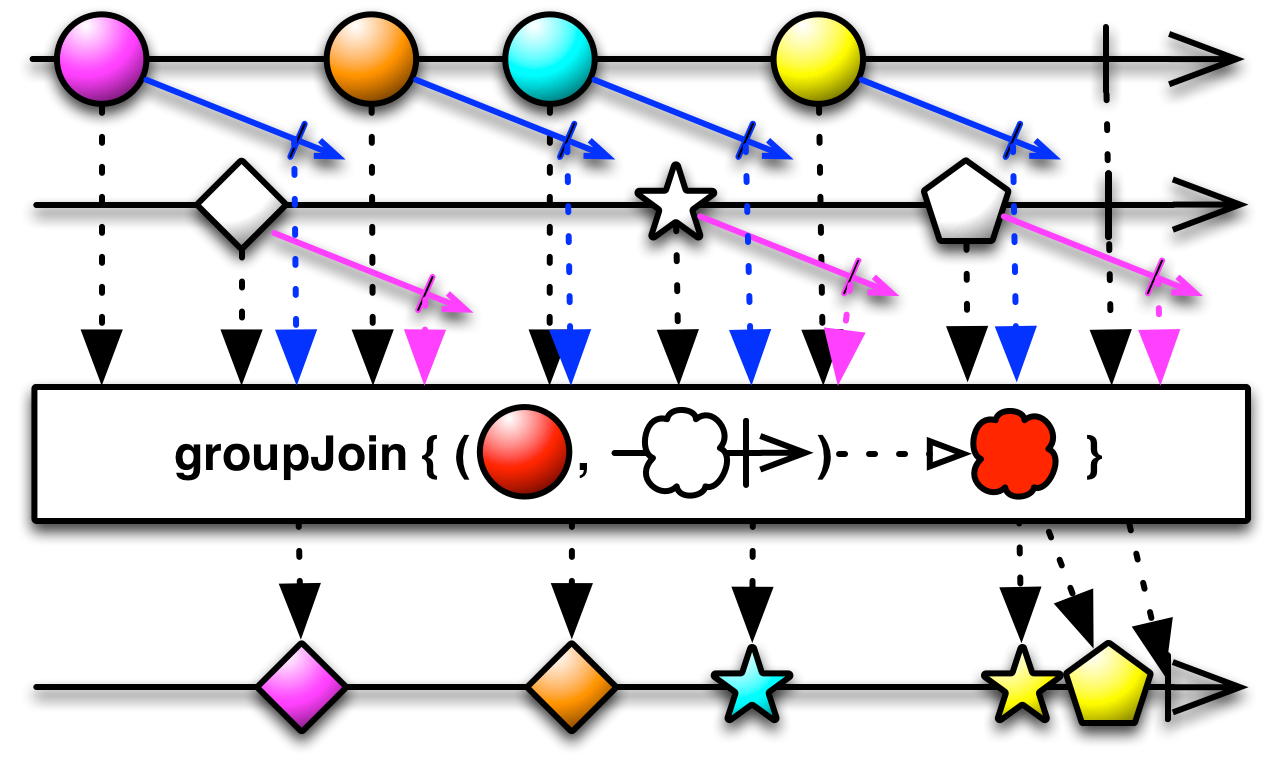
- Scheduler:
groupJoindoes not operate by default on a particularScheduler.
Parameters
| other | the other ObservableSource to correlate items from the source ObservableSource with |
|---|---|
| leftEnd | a function that returns an ObservableSource whose emissions indicate the duration of the values of the source ObservableSource |
| rightEnd | a function that returns an ObservableSource whose emissions indicate the duration of the values of
the right ObservableSource |
| resultSelector | a function that takes an item emitted by each ObservableSource and returns the value to be emitted by the resulting ObservableSource |
Returns
- an Observable that emits items based on combining those items emitted by the source ObservableSources whose durations overlap
public final Observable<T> hide ()
public final Completable ignoreElements ()
Ignores all items emitted by the source ObservableSource and only calls onComplete or onError.
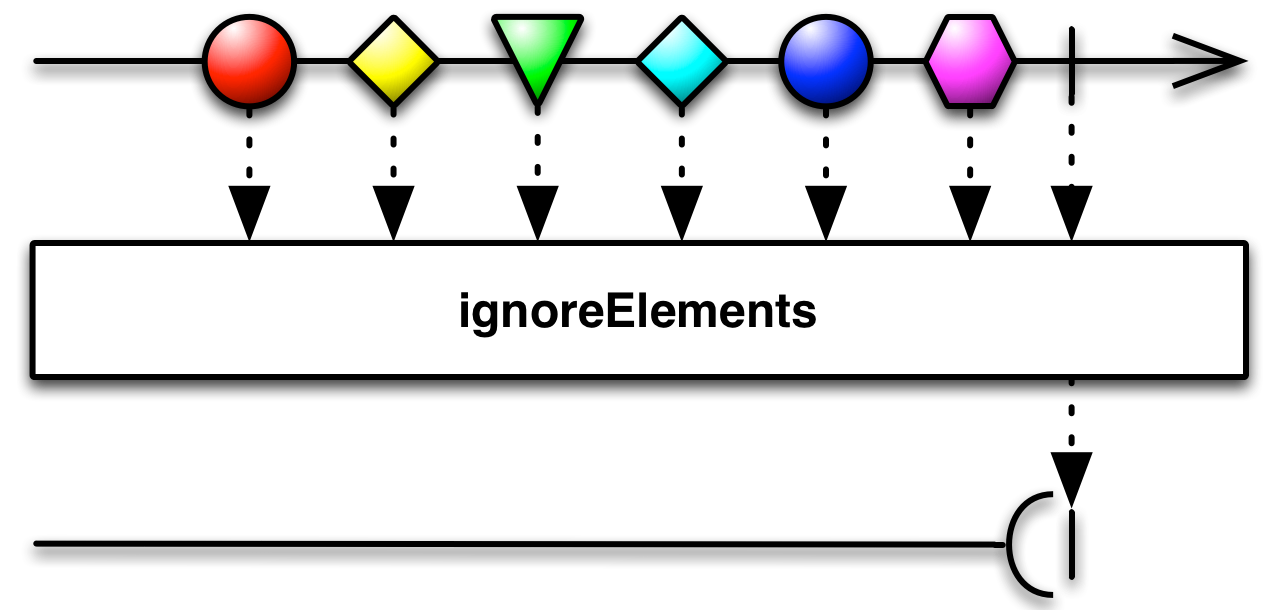
- Scheduler:
ignoreElementsdoes not operate by default on a particularScheduler.
Returns
- the new Completable instance
public static Observable<Long> interval (long period, TimeUnit unit, Scheduler scheduler)
Returns an Observable that emits a sequential number every specified interval of time, on a specified Scheduler.

- Scheduler:
- You specify which
Schedulerthis operator will use
Parameters
| period | the period size in time units (see below) |
|---|---|
| unit | time units to use for the interval size |
| scheduler | the Scheduler to use for scheduling the items |
Returns
- an Observable that emits a sequential number each time interval
public static Observable<Long> interval (long period, TimeUnit unit)
Returns an Observable that emits a sequential number every specified interval of time.

- Scheduler:
intervaloperates by default on thecomputationScheduler.
Parameters
| period | the period size in time units (see below) |
|---|---|
| unit | time units to use for the interval size |
Returns
- an Observable that emits a sequential number each time interval
public static Observable<Long> interval (long initialDelay, long period, TimeUnit unit, Scheduler scheduler)
Returns an Observable that emits a 0L after the initialDelay and ever increasing numbers
after each period of time thereafter, on a specified Scheduler.

- Scheduler:
- You specify which
Schedulerthis operator will use
Parameters
| initialDelay | the initial delay time to wait before emitting the first value of 0L |
|---|---|
| period | the period of time between emissions of the subsequent numbers |
| unit | the time unit for both initialDelay and period |
| scheduler | the Scheduler on which the waiting happens and items are emitted |
Returns
- an Observable that emits a 0L after the
initialDelayand ever increasing numbers after eachperiodof time thereafter, while running on the given Scheduler
public static Observable<Long> interval (long initialDelay, long period, TimeUnit unit)
Returns an Observable that emits a 0L after the initialDelay and ever increasing numbers
after each period of time thereafter.

- Scheduler:
intervaloperates by default on thecomputationScheduler.
Parameters
| initialDelay | the initial delay time to wait before emitting the first value of 0L |
|---|---|
| period | the period of time between emissions of the subsequent numbers |
| unit | the time unit for both initialDelay and period |
Returns
- an Observable that emits a 0L after the
initialDelayand ever increasing numbers after eachperiodof time thereafter
public static Observable<Long> intervalRange (long start, long count, long initialDelay, long period, TimeUnit unit, Scheduler scheduler)
Signals a range of long values, the first after some initial delay and the rest periodically after.
The sequence completes immediately after the last value (start + count - 1) has been reached.
 *
*
- Scheduler:
- you provide the
Scheduler.
Parameters
| start | that start value of the range |
|---|---|
| count | the number of values to emit in total, if zero, the operator emits an onComplete after the initial delay. |
| initialDelay | the initial delay before signalling the first value (the start) |
| period | the period between subsequent values |
| unit | the unit of measure of the initialDelay and period amounts |
| scheduler | the target scheduler where the values and terminal signals will be emitted |
Returns
- the new Observable instance
public static Observable<Long> intervalRange (long start, long count, long initialDelay, long period, TimeUnit unit)
Signals a range of long values, the first after some initial delay and the rest periodically after.
The sequence completes immediately after the last value (start + count - 1) has been reached.

- Scheduler:
intervalRangeby default operates on thecomputationScheduler.
Parameters
| start | that start value of the range |
|---|---|
| count | the number of values to emit in total, if zero, the operator emits an onComplete after the initial delay. |
| initialDelay | the initial delay before signalling the first value (the start) |
| period | the period between subsequent values |
| unit | the unit of measure of the initialDelay and period amounts |
Returns
- the new Observable instance
public final Single<Boolean> isEmpty ()
Returns an Observable that emits true if the source ObservableSource is empty, otherwise false.
In Rx.Net this is negated as the any Observer but we renamed this in RxJava to better match Java
naming idioms.
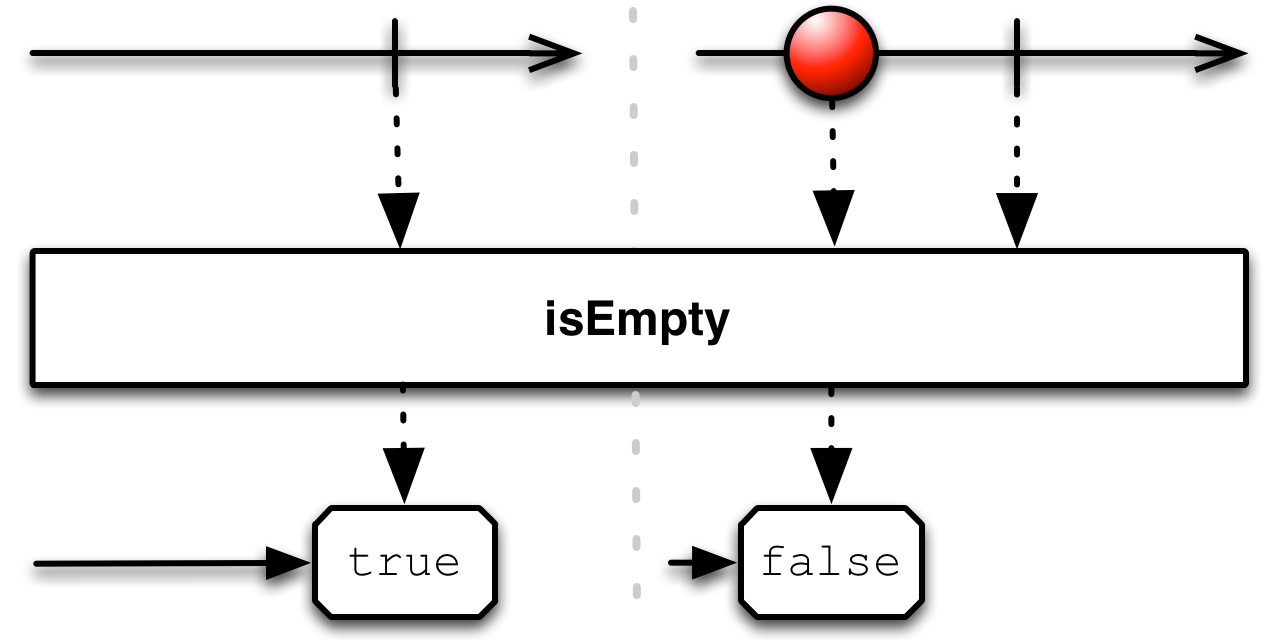
- Scheduler:
isEmptydoes not operate by default on a particularScheduler.
Returns
- a Single that emits a Boolean
public final Observable<R> join (ObservableSource<? extends TRight> other, Function<? super T, ? extends ObservableSource<TLeftEnd>> leftEnd, Function<? super TRight, ? extends ObservableSource<TRightEnd>> rightEnd, BiFunction<? super T, ? super TRight, ? extends R> resultSelector)
Correlates the items emitted by two ObservableSources based on overlapping durations.
There are no guarantees in what order the items get combined when multiple items from one or both source ObservableSources overlap.
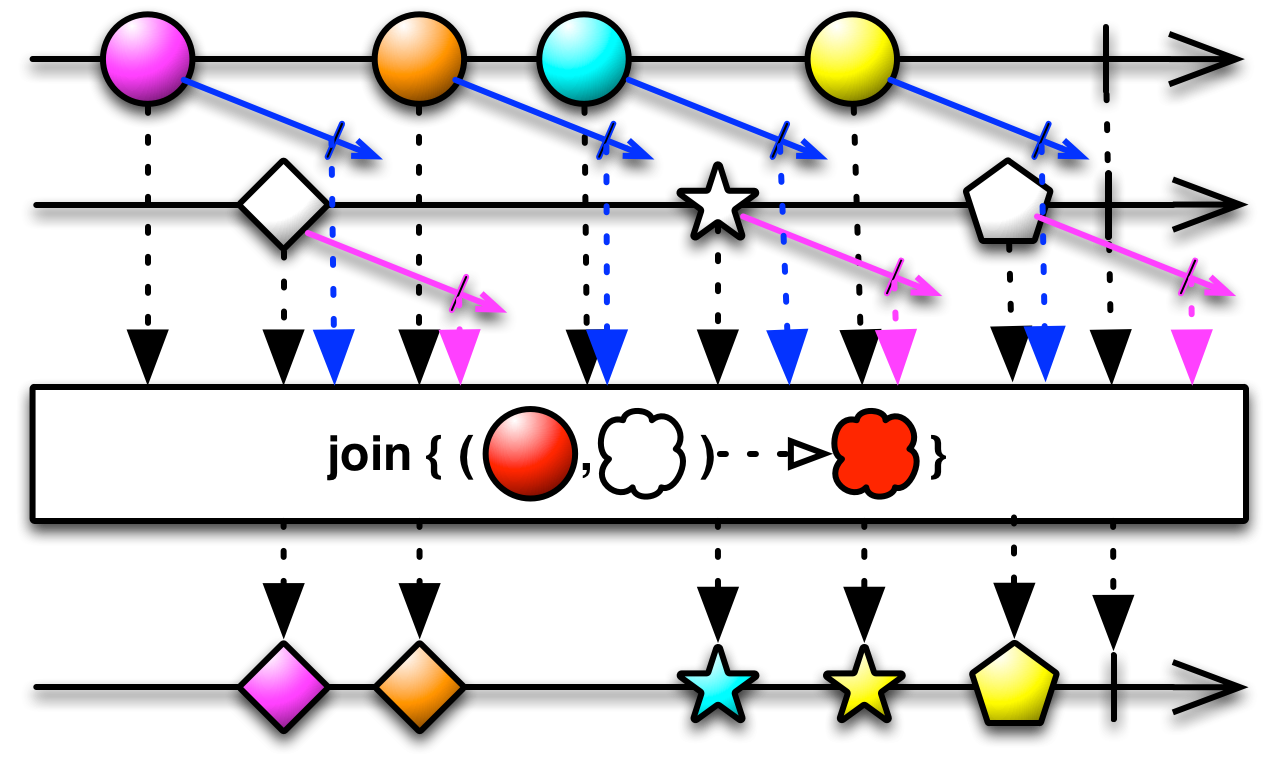
- Scheduler:
joindoes not operate by default on a particularScheduler.
Parameters
| other | the second ObservableSource to join items from |
|---|---|
| leftEnd | a function to select a duration for each item emitted by the source ObservableSource, used to determine overlap |
| rightEnd | a function to select a duration for each item emitted by the right ObservableSource, used to
determine overlap |
| resultSelector | a function that computes an item to be emitted by the resulting ObservableSource for any two overlapping items emitted by the two ObservableSources |
Returns
- an Observable that emits items correlating to items emitted by the source ObservableSources that have overlapping durations
public static Observable<T> just (T item1, T item2, T item3, T item4, T item5, T item6)
Converts six items into an ObservableSource that emits those items.
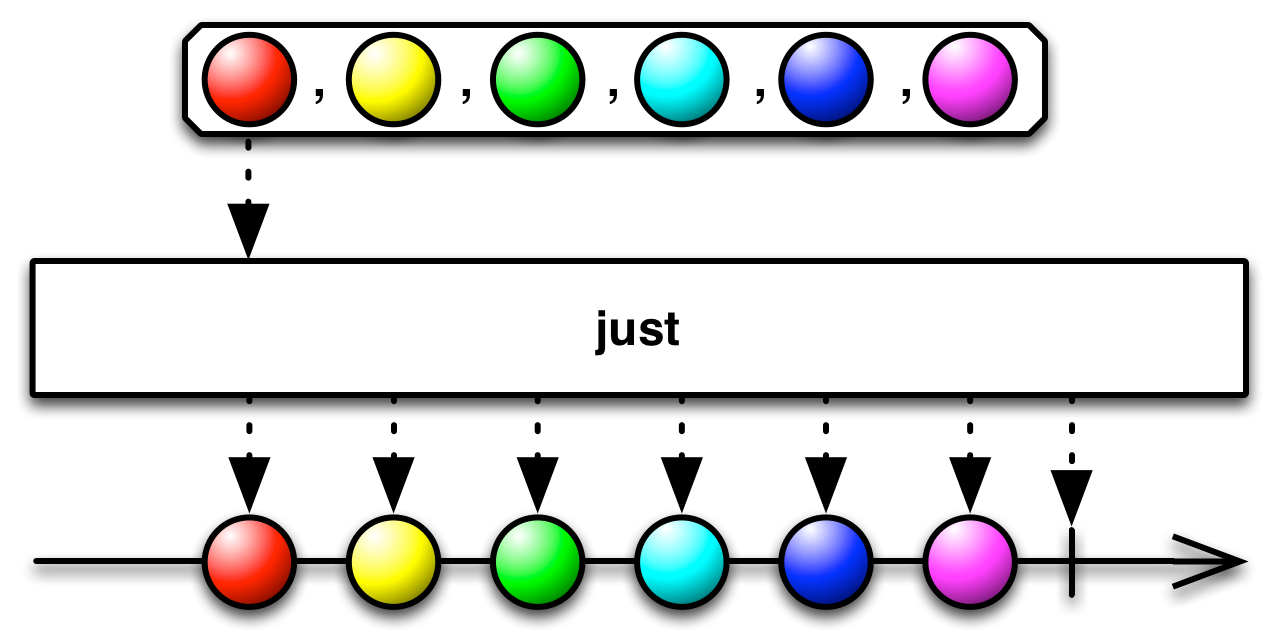
- Scheduler:
justdoes not operate by default on a particularScheduler.
Parameters
| item1 | first item |
|---|---|
| item2 | second item |
| item3 | third item |
| item4 | fourth item |
| item5 | fifth item |
| item6 | sixth item |
Returns
- an Observable that emits each item
public static Observable<T> just (T item1, T item2)
Converts two items into an ObservableSource that emits those items.

- Scheduler:
justdoes not operate by default on a particularScheduler.
Parameters
| item1 | first item |
|---|---|
| item2 | second item |
Returns
- an Observable that emits each item
public static Observable<T> just (T item1, T item2, T item3, T item4)
Converts four items into an ObservableSource that emits those items.

- Scheduler:
justdoes not operate by default on a particularScheduler.
Parameters
| item1 | first item |
|---|---|
| item2 | second item |
| item3 | third item |
| item4 | fourth item |
Returns
- an Observable that emits each item
public static Observable<T> just (T item)
Returns an Observable that emits a single item and then completes.
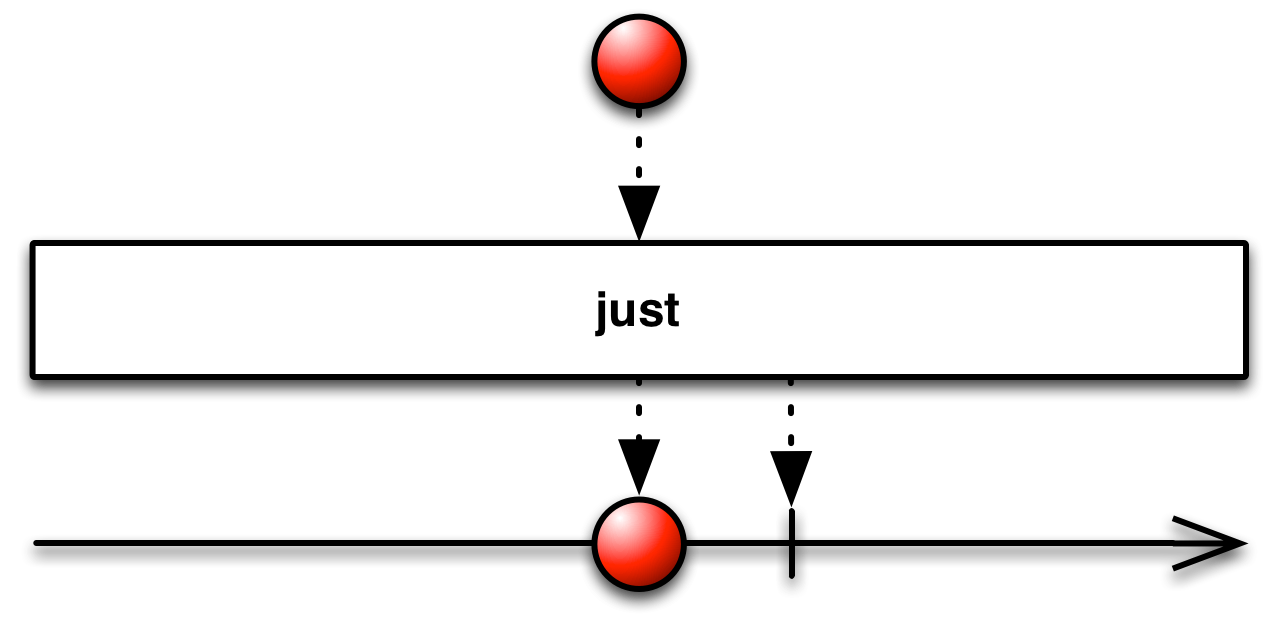
To convert any object into an ObservableSource that emits that object, pass that object into the just
method.
This is similar to the fromArray(java.lang.Object[]) method, except that from will convert
an Iterable object into an ObservableSource that emits each of the items in the Iterable, one at a
time, while the just method converts an Iterable into an ObservableSource that emits the entire
Iterable as a single item.
- Scheduler:
justdoes not operate by default on a particularScheduler.
Parameters
| item | the item to emit |
|---|
Returns
- an Observable that emits
valueas a single item and then completes
public static Observable<T> just (T item1, T item2, T item3, T item4, T item5)
Converts five items into an ObservableSource that emits those items.

- Scheduler:
justdoes not operate by default on a particularScheduler.
Parameters
| item1 | first item |
|---|---|
| item2 | second item |
| item3 | third item |
| item4 | fourth item |
| item5 | fifth item |
Returns
- an Observable that emits each item
public static Observable<T> just (T item1, T item2, T item3, T item4, T item5, T item6, T item7)
Converts seven items into an ObservableSource that emits those items.

- Scheduler:
justdoes not operate by default on a particularScheduler.
Parameters
| item1 | first item |
|---|---|
| item2 | second item |
| item3 | third item |
| item4 | fourth item |
| item5 | fifth item |
| item6 | sixth item |
| item7 | seventh item |
Returns
- an Observable that emits each item
public static Observable<T> just (T item1, T item2, T item3, T item4, T item5, T item6, T item7, T item8)
Converts eight items into an ObservableSource that emits those items.

- Scheduler:
justdoes not operate by default on a particularScheduler.
Parameters
| item1 | first item |
|---|---|
| item2 | second item |
| item3 | third item |
| item4 | fourth item |
| item5 | fifth item |
| item6 | sixth item |
| item7 | seventh item |
| item8 | eighth item |
Returns
- an Observable that emits each item
public static Observable<T> just (T item1, T item2, T item3, T item4, T item5, T item6, T item7, T item8, T item9)
Converts nine items into an ObservableSource that emits those items.

- Scheduler:
justdoes not operate by default on a particularScheduler.
Parameters
| item1 | first item |
|---|---|
| item2 | second item |
| item3 | third item |
| item4 | fourth item |
| item5 | fifth item |
| item6 | sixth item |
| item7 | seventh item |
| item8 | eighth item |
| item9 | ninth item |
Returns
- an Observable that emits each item
public static Observable<T> just (T item1, T item2, T item3, T item4, T item5, T item6, T item7, T item8, T item9, T item10)
Converts ten items into an ObservableSource that emits those items.

- Scheduler:
justdoes not operate by default on a particularScheduler.
Parameters
| item1 | first item |
|---|---|
| item2 | second item |
| item3 | third item |
| item4 | fourth item |
| item5 | fifth item |
| item6 | sixth item |
| item7 | seventh item |
| item8 | eighth item |
| item9 | ninth item |
| item10 | tenth item |
Returns
- an Observable that emits each item
public static Observable<T> just (T item1, T item2, T item3)
Converts three items into an ObservableSource that emits those items.

- Scheduler:
justdoes not operate by default on a particularScheduler.
Parameters
| item1 | first item |
|---|---|
| item2 | second item |
| item3 | third item |
Returns
- an Observable that emits each item
public final Single<T> last (T defaultItem)
Returns a Single that emits only the last item emitted by this Observable, or a default item if this Observable completes without emitting any items.
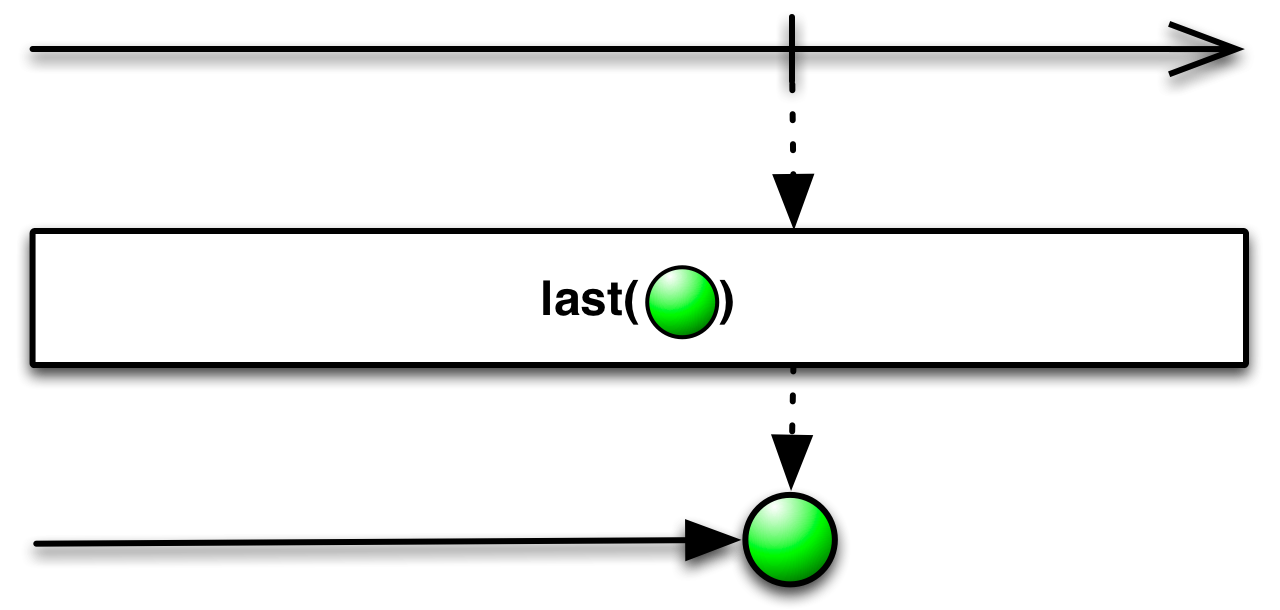
- Scheduler:
lastdoes not operate by default on a particularScheduler.
Parameters
| defaultItem | the default item to emit if the source ObservableSource is empty |
|---|
Returns
- an Observable that emits only the last item emitted by the source ObservableSource, or a default item if the source ObservableSource is empty
public final Maybe<T> lastElement ()
Returns a Maybe that emits the last item emitted by this Observable or completes if this Observable is empty.
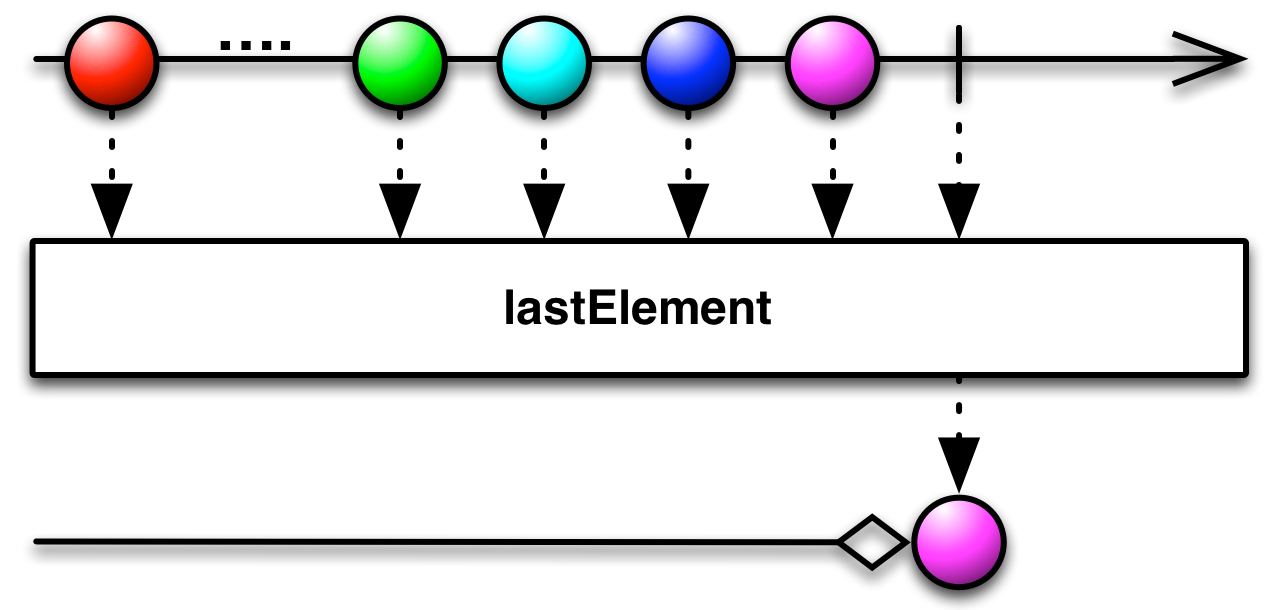
- Scheduler:
lastElementdoes not operate by default on a particularScheduler.
Returns
- a Maybe that emits the last item from the source ObservableSource or notifies observers of an error
public final Single<T> lastOrError ()
Returns a Single that emits only the last item emitted by this Observable or
signals a NoSuchElementException if this Observable is empty.

- Scheduler:
lastOrErrordoes not operate by default on a particularScheduler.
Returns
- a Single that emits only the last item emitted by the source ObservableSource.
If the source ObservableSource completes without emitting any items a
NoSuchElementExceptionwill be thrown.
public final Observable<R> lift (ObservableOperator<? extends R, ? super T> lifter)
This method requires advanced knowledge about building operators; please consider other standard composition methods first; Lifts a function to the current ObservableSource and returns a new ObservableSource that when subscribed to will pass the values of the current ObservableSource through the Operator function.
In other words, this allows chaining Observers together on an ObservableSource for acting on the values within the ObservableSource.
ObservableSource.map(...).filter(...).take(5).lift(new OperatorA()).lift(new OperatorB(...)).subscribe()
If the operator you are creating is designed to act on the individual items emitted by a source
ObservableSource, use lift. If your operator is designed to transform the source ObservableSource as a whole
(for instance, by applying a particular set of existing RxJava operators to it) use compose(ObservableTransformer).
- Scheduler:
liftdoes not operate by default on a particularScheduler.
Parameters
| lifter | the Operator that implements the ObservableSource-operating function to be applied to the source ObservableSource |
|---|
Returns
- an Observable that is the result of applying the lifted Operator to the source ObservableSource
public final Observable<R> map (Function<? super T, ? extends R> mapper)
Returns an Observable that applies a specified function to each item emitted by the source ObservableSource and emits the results of these function applications.

- Scheduler:
mapdoes not operate by default on a particularScheduler.
Parameters
| mapper | a function to apply to each item emitted by the ObservableSource |
|---|
Returns
- an Observable that emits the items from the source ObservableSource, transformed by the specified function
public final Observable<Notification<T>> materialize ()
Returns an Observable that represents all of the emissions and notifications from the source
ObservableSource into emissions marked with their original types within Notification objects.
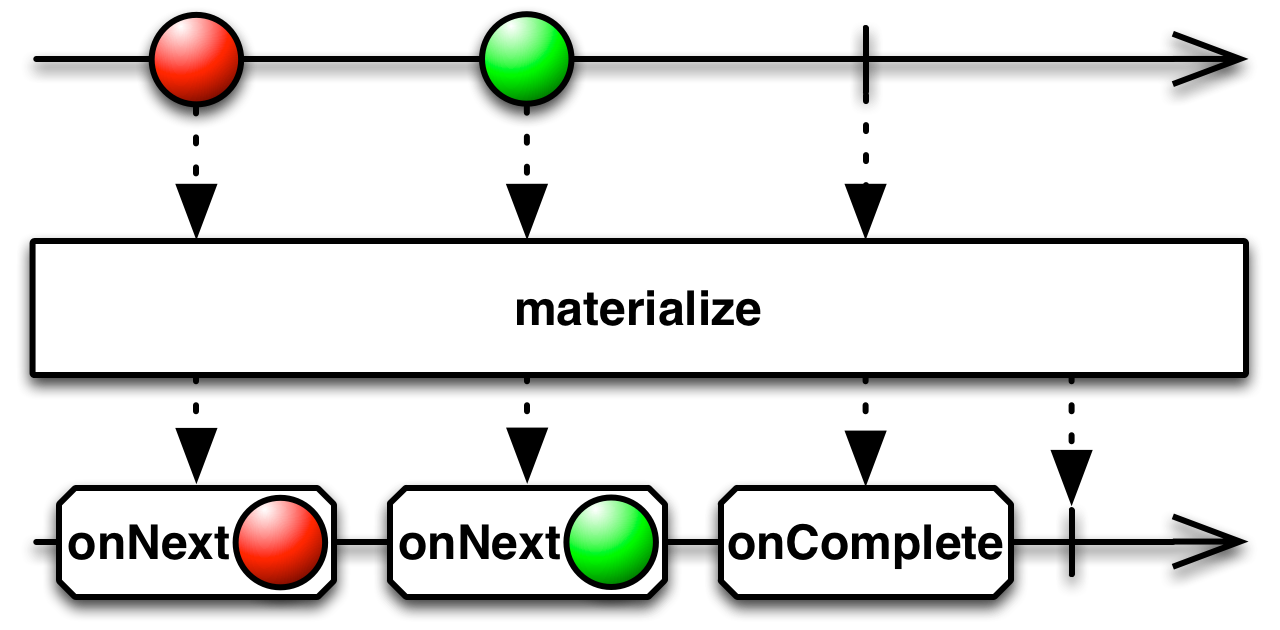
- Scheduler:
materializedoes not operate by default on a particularScheduler.
Returns
- an Observable that emits items that are the result of materializing the items and notifications of the source ObservableSource
public static Observable<T> merge (Iterable<? extends ObservableSource<? extends T>> sources)
Flattens an Iterable of ObservableSources into one ObservableSource, without any transformation.
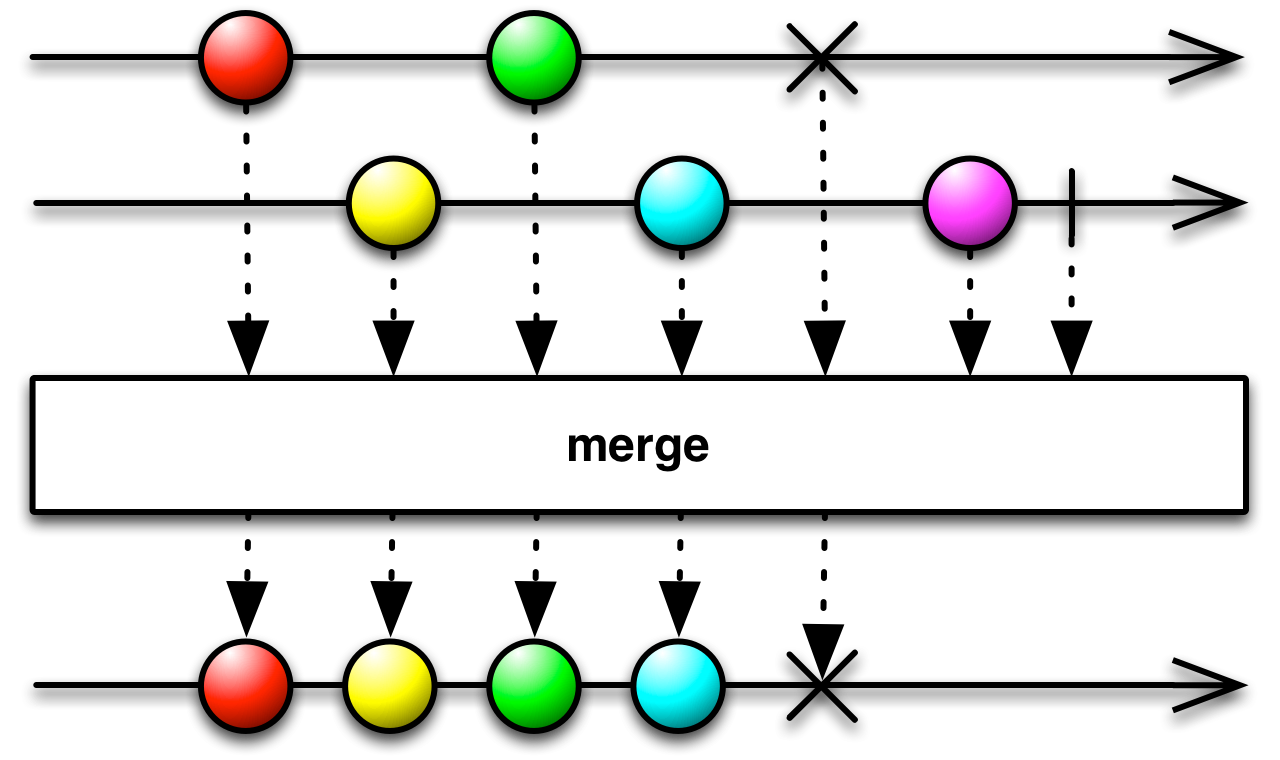
You can combine the items emitted by multiple ObservableSources so that they appear as a single ObservableSource, by
using the merge method.
- Scheduler:
mergedoes not operate by default on a particularScheduler.
Parameters
| sources | the Iterable of ObservableSources |
|---|
Returns
- an Observable that emits items that are the result of flattening the items emitted by the ObservableSources in the Iterable
public static Observable<T> merge (ObservableSource<? extends ObservableSource<? extends T>> sources)
Flattens an ObservableSource that emits ObservableSources into a single ObservableSource that emits the items emitted by those ObservableSources, without any transformation.
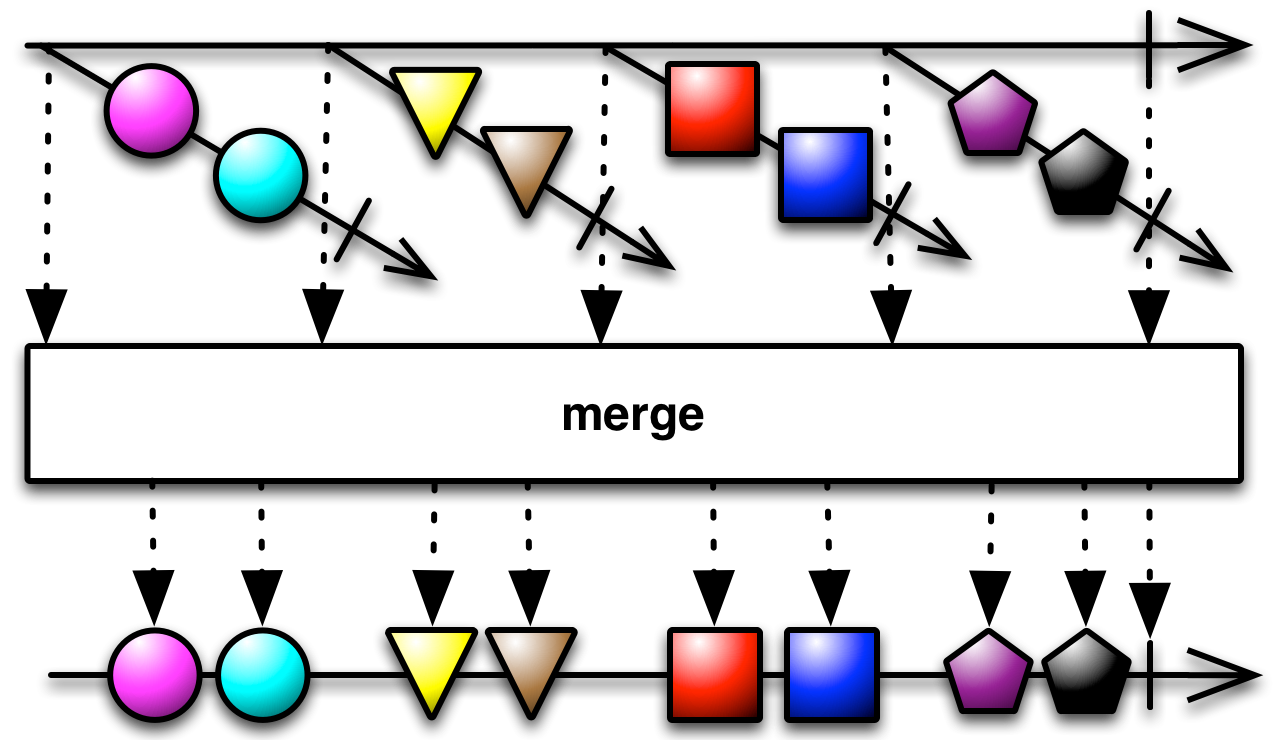
You can combine the items emitted by multiple ObservableSources so that they appear as a single ObservableSource, by
using the merge method.
- Scheduler:
mergedoes not operate by default on a particularScheduler.
Parameters
| sources | an ObservableSource that emits ObservableSources |
|---|
Returns
- an Observable that emits items that are the result of flattening the ObservableSources emitted by the
sourceObservableSource
public static Observable<T> merge (ObservableSource<? extends T> source1, ObservableSource<? extends T> source2)
Flattens two ObservableSources into a single ObservableSource, without any transformation.

You can combine items emitted by multiple ObservableSources so that they appear as a single ObservableSource, by
using the merge method.
- Scheduler:
mergedoes not operate by default on a particularScheduler.
Parameters
| source1 | an ObservableSource to be merged |
|---|---|
| source2 | an ObservableSource to be merged |
Returns
- an Observable that emits all of the items emitted by the source ObservableSources
public static Observable<T> merge (Iterable<? extends ObservableSource<? extends T>> sources, int maxConcurrency, int bufferSize)
Flattens an Iterable of ObservableSources into one ObservableSource, without any transformation, while limiting the number of concurrent subscriptions to these ObservableSources.

You can combine the items emitted by multiple ObservableSources so that they appear as a single ObservableSource, by
using the merge method.
- Scheduler:
mergedoes not operate by default on a particularScheduler.
Parameters
| sources | the Iterable of ObservableSources |
|---|---|
| maxConcurrency | the maximum number of ObservableSources that may be subscribed to concurrently |
| bufferSize | the number of items to prefetch from each inner ObservableSource |
Returns
- an Observable that emits items that are the result of flattening the items emitted by the ObservableSources in the Iterable
Throws
| IllegalArgumentException | if maxConcurrent is less than or equal to 0 |
|---|
public static Observable<T> merge (Iterable<? extends ObservableSource<? extends T>> sources, int maxConcurrency)
Flattens an Iterable of ObservableSources into one ObservableSource, without any transformation, while limiting the number of concurrent subscriptions to these ObservableSources.

You can combine the items emitted by multiple ObservableSources so that they appear as a single ObservableSource, by
using the merge method.
- Scheduler:
mergedoes not operate by default on a particularScheduler.
Parameters
| sources | the Iterable of ObservableSources |
|---|---|
| maxConcurrency | the maximum number of ObservableSources that may be subscribed to concurrently |
Returns
- an Observable that emits items that are the result of flattening the items emitted by the ObservableSources in the Iterable
Throws
| IllegalArgumentException | if maxConcurrent is less than or equal to 0 |
|---|
public static Observable<T> merge (ObservableSource<? extends T> source1, ObservableSource<? extends T> source2, ObservableSource<? extends T> source3)
Flattens three ObservableSources into a single ObservableSource, without any transformation.

You can combine items emitted by multiple ObservableSources so that they appear as a single ObservableSource, by
using the merge method.
- Scheduler:
mergedoes not operate by default on a particularScheduler.
Parameters
| source1 | an ObservableSource to be merged |
|---|---|
| source2 | an ObservableSource to be merged |
| source3 | an ObservableSource to be merged |
Returns
- an Observable that emits all of the items emitted by the source ObservableSources
public static Observable<T> merge (ObservableSource<? extends ObservableSource<? extends T>> sources, int maxConcurrency)
Flattens an ObservableSource that emits ObservableSources into a single ObservableSource that emits the items emitted by those ObservableSources, without any transformation, while limiting the maximum number of concurrent subscriptions to these ObservableSources.

You can combine the items emitted by multiple ObservableSources so that they appear as a single ObservableSource, by
using the merge method.
- Scheduler:
mergedoes not operate by default on a particularScheduler.
Parameters
| sources | an ObservableSource that emits ObservableSources |
|---|---|
| maxConcurrency | the maximum number of ObservableSources that may be subscribed to concurrently |
Returns
- an Observable that emits items that are the result of flattening the ObservableSources emitted by the
sourceObservableSource
Throws
| IllegalArgumentException | if maxConcurrent is less than or equal to 0 |
|---|
public static Observable<T> merge (ObservableSource<? extends T> source1, ObservableSource<? extends T> source2, ObservableSource<? extends T> source3, ObservableSource<? extends T> source4)
Flattens four ObservableSources into a single ObservableSource, without any transformation.

You can combine items emitted by multiple ObservableSources so that they appear as a single ObservableSource, by
using the merge method.
- Scheduler:
mergedoes not operate by default on a particularScheduler.
Parameters
| source1 | an ObservableSource to be merged |
|---|---|
| source2 | an ObservableSource to be merged |
| source3 | an ObservableSource to be merged |
| source4 | an ObservableSource to be merged |
Returns
- an Observable that emits all of the items emitted by the source ObservableSources
public static Observable<T> mergeArray (int maxConcurrency, int bufferSize, ObservableSource...<? extends T> sources)
Flattens an Iterable of ObservableSources into one ObservableSource, without any transformation, while limiting the number of concurrent subscriptions to these ObservableSources.

You can combine the items emitted by multiple ObservableSources so that they appear as a single ObservableSource, by
using the merge method.
- Scheduler:
mergeArraydoes not operate by default on a particularScheduler.
Parameters
| maxConcurrency | the maximum number of ObservableSources that may be subscribed to concurrently |
|---|---|
| bufferSize | the number of items to prefetch from each inner ObservableSource |
| sources | the array of ObservableSources |
Returns
- an Observable that emits items that are the result of flattening the items emitted by the ObservableSources in the Iterable
Throws
| IllegalArgumentException | if maxConcurrent is less than or equal to 0 |
|---|
public static Observable<T> mergeArray (ObservableSource...<? extends T> sources)
Flattens an Array of ObservableSources into one ObservableSource, without any transformation.
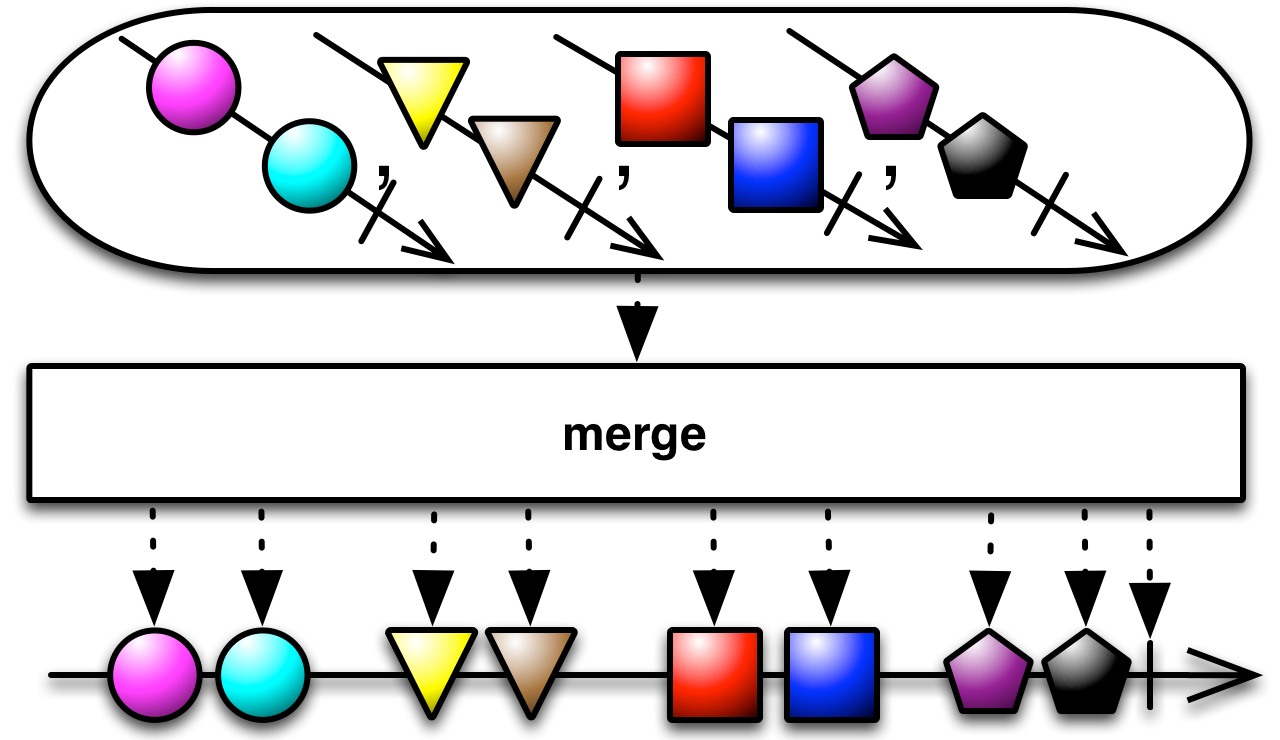
You can combine items emitted by multiple ObservableSources so that they appear as a single ObservableSource, by
using the merge method.
- Scheduler:
mergeArraydoes not operate by default on a particularScheduler.
Parameters
| sources | the array of ObservableSources |
|---|
Returns
- an Observable that emits all of the items emitted by the ObservableSources in the Array
public static Observable<T> mergeArrayDelayError (ObservableSource...<? extends T> sources)
Flattens an Iterable of ObservableSources into one ObservableSource, in a way that allows an Observer to receive all successfully emitted items from each of the source ObservableSources without being interrupted by an error notification from one of them.
This behaves like merge(ObservableSource) except that if any of the merged ObservableSources notify of an
error via onError, mergeDelayError will refrain from propagating that
error notification until all of the merged ObservableSources have finished emitting items.
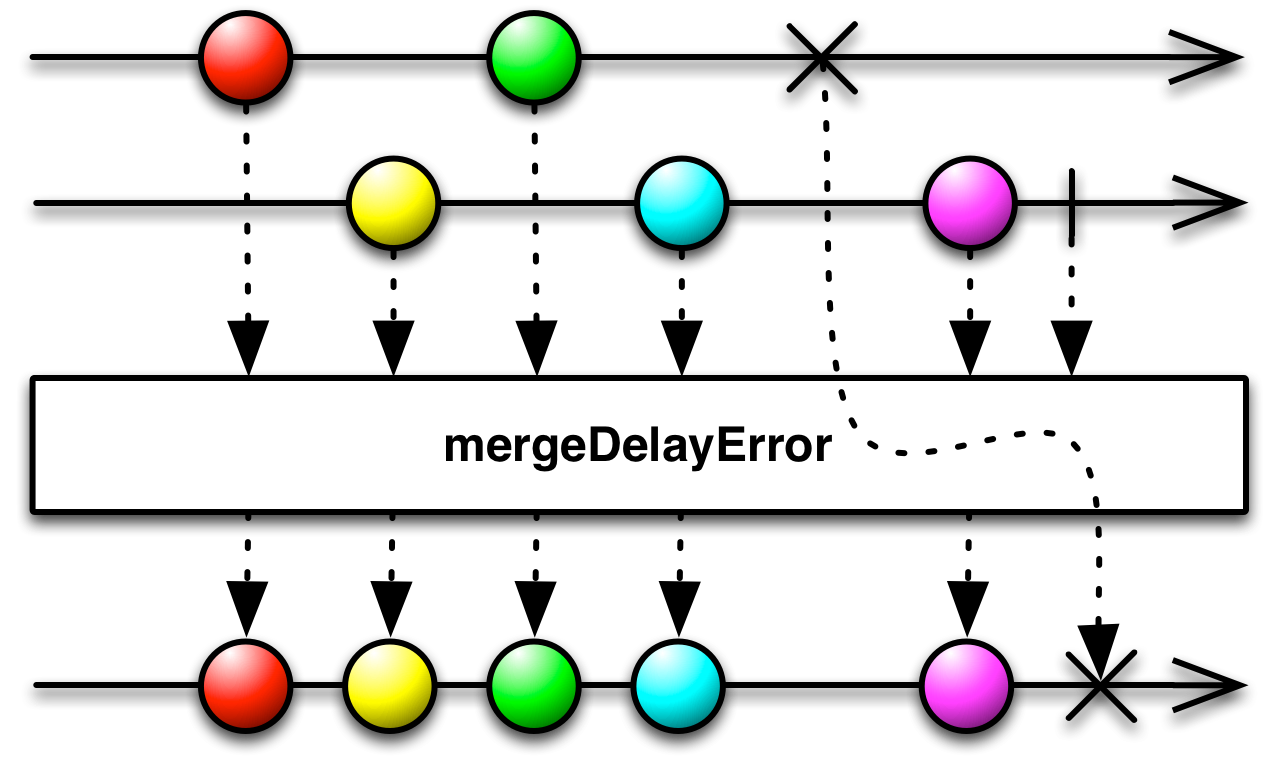
Even if multiple merged ObservableSources send onError notifications, mergeDelayError will only
invoke the onError method of its Observers once.
- Scheduler:
mergeArrayDelayErrordoes not operate by default on a particularScheduler.
Parameters
| sources | the Iterable of ObservableSources |
|---|
Returns
- an Observable that emits items that are the result of flattening the items emitted by the ObservableSources in the Iterable
public static Observable<T> mergeArrayDelayError (int maxConcurrency, int bufferSize, ObservableSource...<? extends T> sources)
Flattens an array of ObservableSources into one ObservableSource, in a way that allows an Observer to receive all successfully emitted items from each of the source ObservableSources without being interrupted by an error notification from one of them, while limiting the number of concurrent subscriptions to these ObservableSources.
This behaves like merge(ObservableSource) except that if any of the merged ObservableSources notify of an
error via onError, mergeDelayError will refrain from propagating that
error notification until all of the merged ObservableSources have finished emitting items.

Even if multiple merged ObservableSources send onError notifications, mergeDelayError will only
invoke the onError method of its Observers once.
- Scheduler:
mergeArrayDelayErrordoes not operate by default on a particularScheduler.
Parameters
| maxConcurrency | the maximum number of ObservableSources that may be subscribed to concurrently |
|---|---|
| bufferSize | the number of items to prefetch from each inner ObservableSource |
| sources | the array of ObservableSources |
Returns
- an Observable that emits items that are the result of flattening the items emitted by the ObservableSources in the Iterable
public static Observable<T> mergeDelayError (ObservableSource<? extends T> source1, ObservableSource<? extends T> source2, ObservableSource<? extends T> source3, ObservableSource<? extends T> source4)
Flattens four ObservableSources into one ObservableSource, in a way that allows an Observer to receive all successfully emitted items from all of the source ObservableSources without being interrupted by an error notification from one of them.
This behaves like merge(ObservableSource, ObservableSource, ObservableSource, ObservableSource) except that if any of
the merged ObservableSources notify of an error via onError, mergeDelayError
will refrain from propagating that error notification until all of the merged ObservableSources have finished
emitting items.

Even if multiple merged ObservableSources send onError notifications, mergeDelayError will only
invoke the onError method of its Observers once.
- Scheduler:
mergeDelayErrordoes not operate by default on a particularScheduler.
Parameters
| source1 | an ObservableSource to be merged |
|---|---|
| source2 | an ObservableSource to be merged |
| source3 | an ObservableSource to be merged |
| source4 | an ObservableSource to be merged |
Returns
- an Observable that emits all of the items that are emitted by the source ObservableSources
public static Observable<T> mergeDelayError (Iterable<? extends ObservableSource<? extends T>> sources)
Flattens an Iterable of ObservableSources into one ObservableSource, in a way that allows an Observer to receive all successfully emitted items from each of the source ObservableSources without being interrupted by an error notification from one of them.
This behaves like merge(ObservableSource) except that if any of the merged ObservableSources notify of an
error via onError, mergeDelayError will refrain from propagating that
error notification until all of the merged ObservableSources have finished emitting items.

Even if multiple merged ObservableSources send onError notifications, mergeDelayError will only
invoke the onError method of its Observers once.
- Scheduler:
mergeDelayErrordoes not operate by default on a particularScheduler.
Parameters
| sources | the Iterable of ObservableSources |
|---|
Returns
- an Observable that emits items that are the result of flattening the items emitted by the ObservableSources in the Iterable
public static Observable<T> mergeDelayError (ObservableSource<? extends T> source1, ObservableSource<? extends T> source2)
Flattens two ObservableSources into one ObservableSource, in a way that allows an Observer to receive all successfully emitted items from each of the source ObservableSources without being interrupted by an error notification from one of them.
This behaves like merge(ObservableSource, ObservableSource) except that if any of the merged ObservableSources
notify of an error via onError, mergeDelayError will refrain from
propagating that error notification until all of the merged ObservableSources have finished emitting items.

Even if both merged ObservableSources send onError notifications, mergeDelayError will only
invoke the onError method of its Observers once.
- Scheduler:
mergeDelayErrordoes not operate by default on a particularScheduler.
Parameters
| source1 | an ObservableSource to be merged |
|---|---|
| source2 | an ObservableSource to be merged |
Returns
- an Observable that emits all of the items that are emitted by the two source ObservableSources
public static Observable<T> mergeDelayError (ObservableSource<? extends T> source1, ObservableSource<? extends T> source2, ObservableSource<? extends T> source3)
Flattens three ObservableSources into one ObservableSource, in a way that allows an Observer to receive all successfully emitted items from all of the source ObservableSources without being interrupted by an error notification from one of them.
This behaves like merge(ObservableSource, ObservableSource, ObservableSource) except that if any of the merged
ObservableSources notify of an error via onError, mergeDelayError will refrain
from propagating that error notification until all of the merged ObservableSources have finished emitting
items.

Even if multiple merged ObservableSources send onError notifications, mergeDelayError will only
invoke the onError method of its Observers once.
- Scheduler:
mergeDelayErrordoes not operate by default on a particularScheduler.
Parameters
| source1 | an ObservableSource to be merged |
|---|---|
| source2 | an ObservableSource to be merged |
| source3 | an ObservableSource to be merged |
Returns
- an Observable that emits all of the items that are emitted by the source ObservableSources
public static Observable<T> mergeDelayError (ObservableSource<? extends ObservableSource<? extends T>> sources)
Flattens an ObservableSource that emits ObservableSources into one ObservableSource, in a way that allows an Observer to receive all successfully emitted items from all of the source ObservableSources without being interrupted by an error notification from one of them.
This behaves like merge(ObservableSource) except that if any of the merged ObservableSources notify of an
error via onError, mergeDelayError will refrain from propagating that
error notification until all of the merged ObservableSources have finished emitting items.

Even if multiple merged ObservableSources send onError notifications, mergeDelayError will only
invoke the onError method of its Observers once.
- Scheduler:
mergeDelayErrordoes not operate by default on a particularScheduler.
Parameters
| sources | an ObservableSource that emits ObservableSources |
|---|
Returns
- an Observable that emits all of the items emitted by the ObservableSources emitted by the
sourceObservableSource
public static Observable<T> mergeDelayError (Iterable<? extends ObservableSource<? extends T>> sources, int maxConcurrency, int bufferSize)
Flattens an Iterable of ObservableSources into one ObservableSource, in a way that allows an Observer to receive all successfully emitted items from each of the source ObservableSources without being interrupted by an error notification from one of them, while limiting the number of concurrent subscriptions to these ObservableSources.
This behaves like merge(ObservableSource) except that if any of the merged ObservableSources notify of an
error via onError, mergeDelayError will refrain from propagating that
error notification until all of the merged ObservableSources have finished emitting items.

Even if multiple merged ObservableSources send onError notifications, mergeDelayError will only
invoke the onError method of its Observers once.
- Scheduler:
mergeDelayErrordoes not operate by default on a particularScheduler.
Parameters
| sources | the Iterable of ObservableSources |
|---|---|
| maxConcurrency | the maximum number of ObservableSources that may be subscribed to concurrently |
| bufferSize | the number of items to prefetch from each inner ObservableSource |
Returns
- an Observable that emits items that are the result of flattening the items emitted by the ObservableSources in the Iterable
public static Observable<T> mergeDelayError (Iterable<? extends ObservableSource<? extends T>> sources, int maxConcurrency)
Flattens an Iterable of ObservableSources into one ObservableSource, in a way that allows an Observer to receive all successfully emitted items from each of the source ObservableSources without being interrupted by an error notification from one of them, while limiting the number of concurrent subscriptions to these ObservableSources.
This behaves like merge(ObservableSource) except that if any of the merged ObservableSources notify of an
error via onError, mergeDelayError will refrain from propagating that
error notification until all of the merged ObservableSources have finished emitting items.

Even if multiple merged ObservableSources send onError notifications, mergeDelayError will only
invoke the onError method of its Observers once.
- Scheduler:
mergeDelayErrordoes not operate by default on a particularScheduler.
Parameters
| sources | the Iterable of ObservableSources |
|---|---|
| maxConcurrency | the maximum number of ObservableSources that may be subscribed to concurrently |
Returns
- an Observable that emits items that are the result of flattening the items emitted by the ObservableSources in the Iterable
public static Observable<T> mergeDelayError (ObservableSource<? extends ObservableSource<? extends T>> sources, int maxConcurrency)
Flattens an ObservableSource that emits ObservableSources into one ObservableSource, in a way that allows an Observer to receive all successfully emitted items from all of the source ObservableSources without being interrupted by an error notification from one of them, while limiting the number of concurrent subscriptions to these ObservableSources.
This behaves like merge(ObservableSource) except that if any of the merged ObservableSources notify of an
error via onError, mergeDelayError will refrain from propagating that
error notification until all of the merged ObservableSources have finished emitting items.

Even if multiple merged ObservableSources send onError notifications, mergeDelayError will only
invoke the onError method of its Observers once.
- Scheduler:
mergeDelayErrordoes not operate by default on a particularScheduler.
Parameters
| sources | an ObservableSource that emits ObservableSources |
|---|---|
| maxConcurrency | the maximum number of ObservableSources that may be subscribed to concurrently |
Returns
- an Observable that emits all of the items emitted by the ObservableSources emitted by the
sourceObservableSource
public final Observable<T> mergeWith (ObservableSource<? extends T> other)
Flattens this and another ObservableSource into a single ObservableSource, without any transformation.

You can combine items emitted by multiple ObservableSources so that they appear as a single ObservableSource, by
using the mergeWith method.
- Scheduler:
mergeWithdoes not operate by default on a particularScheduler.
Parameters
| other | an ObservableSource to be merged |
|---|
Returns
- an Observable that emits all of the items emitted by the source ObservableSources
public static Observable<T> never ()
Returns an Observable that never sends any items or notifications to an Observer.

This ObservableSource is useful primarily for testing purposes.
- Scheduler:
neverdoes not operate by default on a particularScheduler.
Returns
- an Observable that never emits any items or sends any notifications to an
Observer
public final Observable<T> observeOn (Scheduler scheduler, boolean delayError)
Modifies an ObservableSource to perform its emissions and notifications on a specified Scheduler,
asynchronously with an unbounded buffer with bufferSize() "island size" and optionally delays onError notifications.
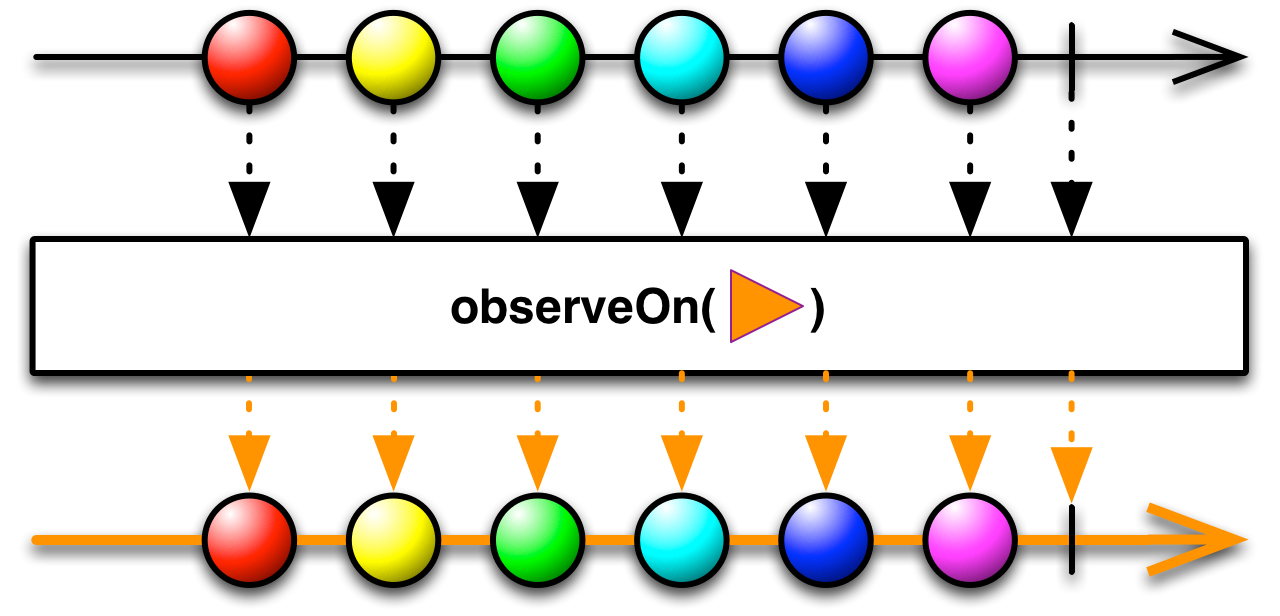
- Scheduler:
- You specify which
Schedulerthis operator will use
"Island size" indicates how large chunks the unbounded buffer allocates to store the excess elements waiting to be consumed on the other side of the asynchronous boundary.
Parameters
| scheduler | the Scheduler to notify Observers on |
|---|---|
| delayError | indicates if the onError notification may not cut ahead of onNext notification on the other side of the scheduling boundary. If true a sequence ending in onError will be replayed in the same order as was received from upstream |
Returns
public final Observable<T> observeOn (Scheduler scheduler)
Modifies an ObservableSource to perform its emissions and notifications on a specified Scheduler,
asynchronously with an unbounded buffer with bufferSize() "island size".
Note that onError notifications will cut ahead of onNext notifications on the emission thread if Scheduler is truly
asynchronous. If strict event ordering is required, consider using the observeOn(Scheduler, boolean) overload.

- Scheduler:
- You specify which
Schedulerthis operator will use
"Island size" indicates how large chunks the unbounded buffer allocates to store the excess elements waiting to be consumed on the other side of the asynchronous boundary.
Returns
public final Observable<T> observeOn (Scheduler scheduler, boolean delayError, int bufferSize)
Modifies an ObservableSource to perform its emissions and notifications on a specified Scheduler,
asynchronously with an unbounded buffer of configurable "island size" and optionally delays onError notifications.

- Scheduler:
- You specify which
Schedulerthis operator will use
"Island size" indicates how large chunks the unbounded buffer allocates to store the excess elements waiting to be consumed on the other side of the asynchronous boundary. Values below 16 are not recommended in performance sensitive scenarios.
Parameters
| scheduler | the Scheduler to notify Observers on |
|---|---|
| delayError | indicates if the onError notification may not cut ahead of onNext notification on the other side of the scheduling boundary. If true a sequence ending in onError will be replayed in the same order as was received from upstream |
| bufferSize | the size of the buffer. |
Returns
public final Observable<U> ofType (Class<U> clazz)
Filters the items emitted by an ObservableSource, only emitting those of the specified type.
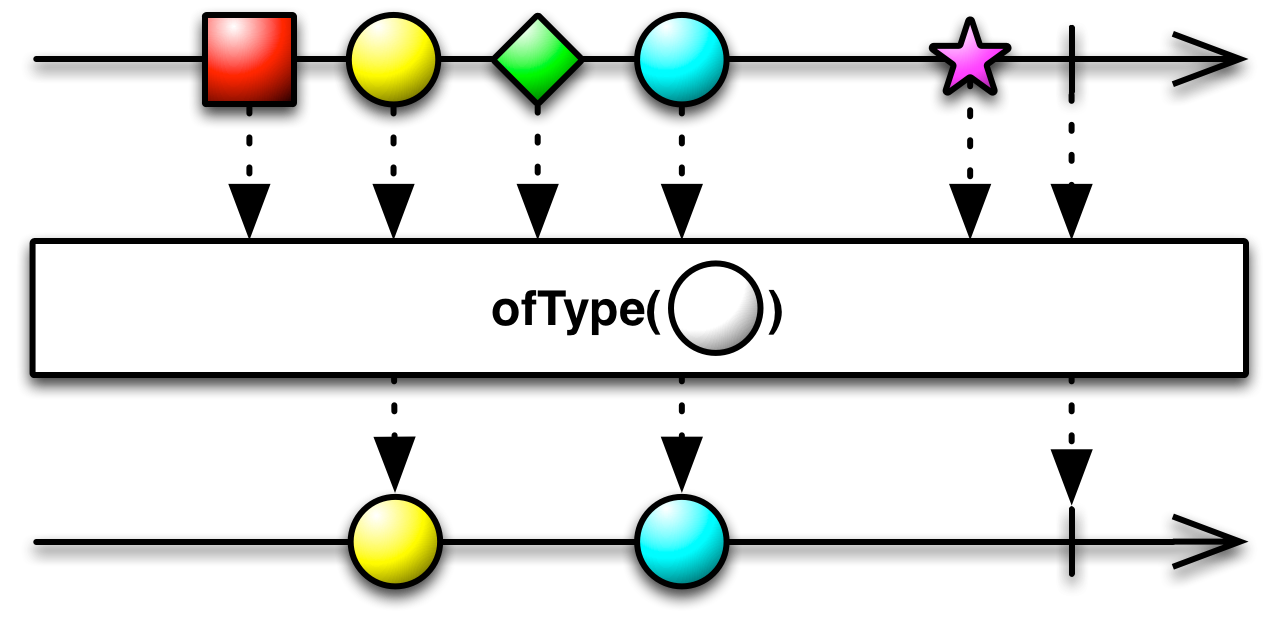
- Scheduler:
ofTypedoes not operate by default on a particularScheduler.
Parameters
| clazz | the class type to filter the items emitted by the source ObservableSource |
|---|
Returns
- an Observable that emits items from the source ObservableSource of type
clazz
public final Observable<T> onErrorResumeNext (Function<? super Throwable, ? extends ObservableSource<? extends T>> resumeFunction)
Instructs an ObservableSource to pass control to another ObservableSource rather than invoking
onError if it encounters an error.
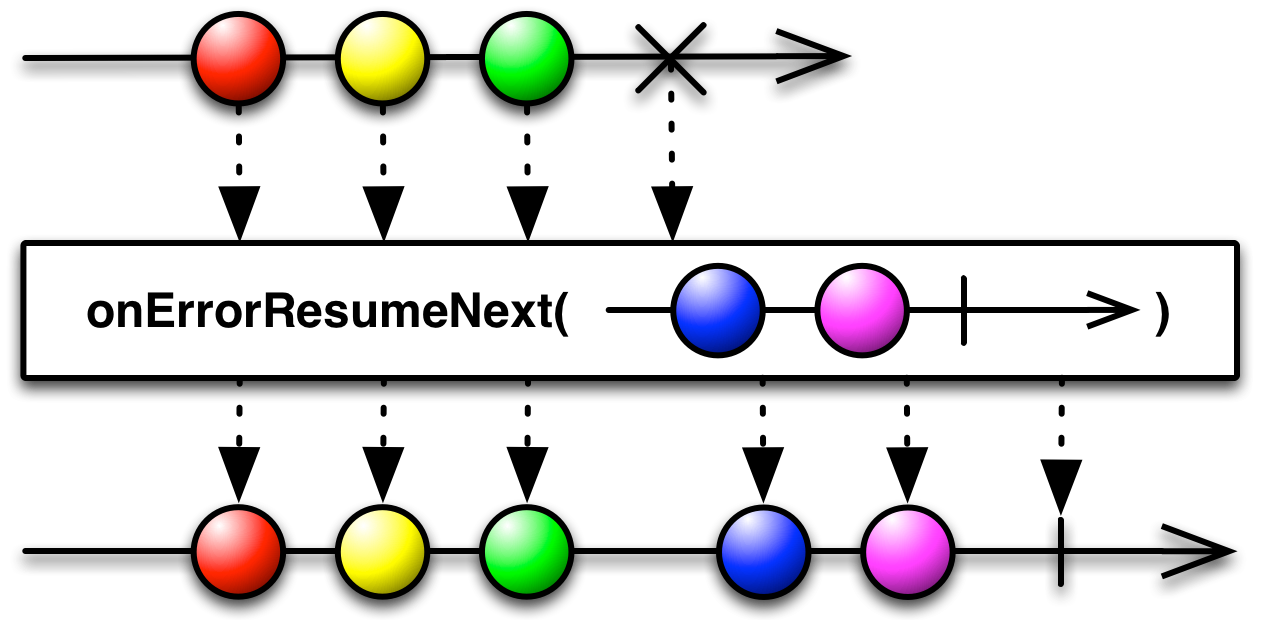
By default, when an ObservableSource encounters an error that prevents it from emitting the expected item to
its Observer, the ObservableSource invokes its Observer's onError method, and then quits
without invoking any more of its Observer's methods. The onErrorResumeNext method changes this
behavior. If you pass a function that returns an ObservableSource (resumeFunction) to
onErrorResumeNext, if the original ObservableSource encounters an error, instead of invoking its
Observer's onError method, it will instead relinquish control to the ObservableSource returned from
resumeFunction, which will invoke the Observer's onNext method if it is
able to do so. In such a case, because no ObservableSource necessarily invokes onError, the Observer
may never know that an error happened.
You can use this to prevent errors from propagating or to supply fallback data should errors be encountered.
- Scheduler:
onErrorResumeNextdoes not operate by default on a particularScheduler.
Parameters
| resumeFunction | a function that returns an ObservableSource that will take over if the source ObservableSource encounters an error |
|---|
Returns
- the original ObservableSource, with appropriately modified behavior
public final Observable<T> onErrorResumeNext (ObservableSource<? extends T> next)
Instructs an ObservableSource to pass control to another ObservableSource rather than invoking
onError if it encounters an error.

By default, when an ObservableSource encounters an error that prevents it from emitting the expected item to
its Observer, the ObservableSource invokes its Observer's onError method, and then quits
without invoking any more of its Observer's methods. The onErrorResumeNext method changes this
behavior. If you pass another ObservableSource (resumeSequence) to an ObservableSource's
onErrorResumeNext method, if the original ObservableSource encounters an error, instead of invoking its
Observer's onError method, it will instead relinquish control to resumeSequence which
will invoke the Observer's onNext method if it is able to do so. In such a case,
because no ObservableSource necessarily invokes onError, the Observer may never know that an error
happened.
You can use this to prevent errors from propagating or to supply fallback data should errors be encountered.
- Scheduler:
onErrorResumeNextdoes not operate by default on a particularScheduler.
Parameters
| next | the next ObservableSource source that will take over if the source ObservableSource encounters an error |
|---|
Returns
- the original ObservableSource, with appropriately modified behavior
public final Observable<T> onErrorReturn (Function<? super Throwable, ? extends T> valueSupplier)
Instructs an ObservableSource to emit an item (returned by a specified function) rather than invoking
onError if it encounters an error.
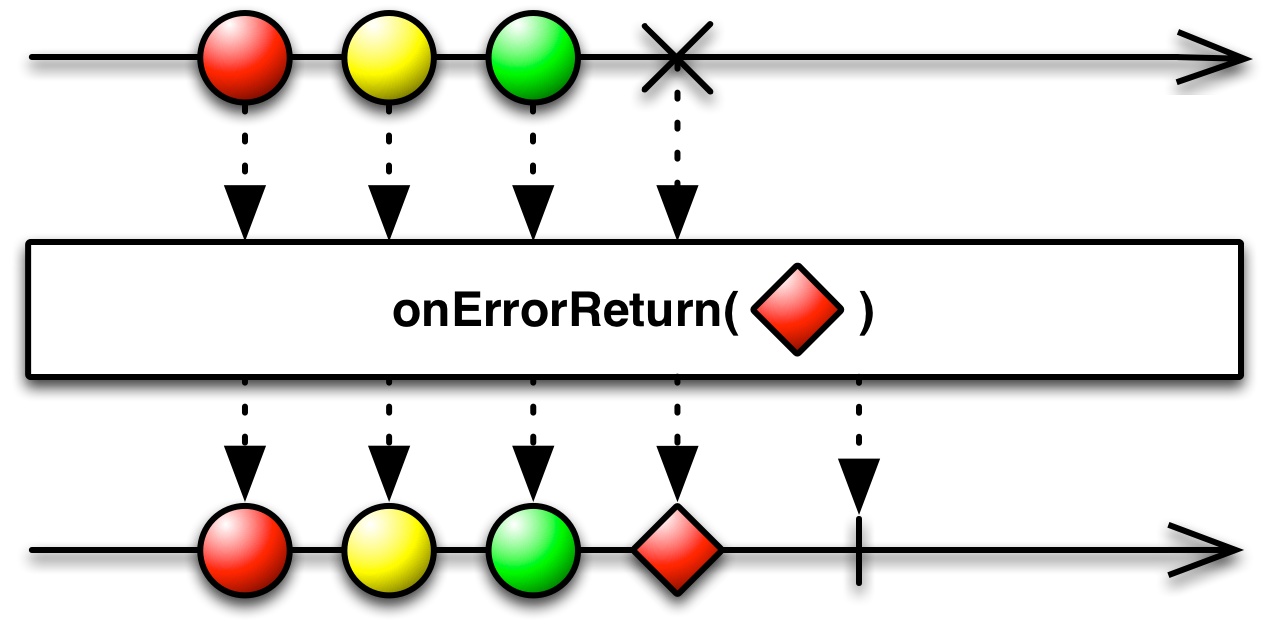
By default, when an ObservableSource encounters an error that prevents it from emitting the expected item to
its Observer, the ObservableSource invokes its Observer's onError method, and then quits
without invoking any more of its Observer's methods. The onErrorReturn method changes this
behavior. If you pass a function (resumeFunction) to an ObservableSource's onErrorReturn
method, if the original ObservableSource encounters an error, instead of invoking its Observer's
onError method, it will instead emit the return value of resumeFunction.
You can use this to prevent errors from propagating or to supply fallback data should errors be encountered.
- Scheduler:
onErrorReturndoes not operate by default on a particularScheduler.
Parameters
| valueSupplier | a function that returns a single value that will be emitted along with a regular onComplete in case the current Observable signals an onError event |
|---|
Returns
- the original ObservableSource with appropriately modified behavior
public final Observable<T> onErrorReturnItem (T item)
Instructs an ObservableSource to emit an item (returned by a specified function) rather than invoking
onError if it encounters an error.

By default, when an ObservableSource encounters an error that prevents it from emitting the expected item to
its Observer, the ObservableSource invokes its Observer's onError method, and then quits
without invoking any more of its Observer's methods. The onErrorReturn method changes this
behavior. If you pass a function (resumeFunction) to an ObservableSource's onErrorReturn
method, if the original ObservableSource encounters an error, instead of invoking its Observer's
onError method, it will instead emit the return value of resumeFunction.
You can use this to prevent errors from propagating or to supply fallback data should errors be encountered.
- Scheduler:
onErrorReturnItemdoes not operate by default on a particularScheduler.
Parameters
| item | the value that is emitted along with a regular onComplete in case the current Observable signals an exception |
|---|
Returns
- the original ObservableSource with appropriately modified behavior
public final Observable<T> onExceptionResumeNext (ObservableSource<? extends T> next)
Instructs an ObservableSource to pass control to another ObservableSource rather than invoking
onError if it encounters an Exception.
This differs from onErrorResumeNext(ObservableSource) in that this one does not handle Throwable
or java.lang.Error but lets those continue through.
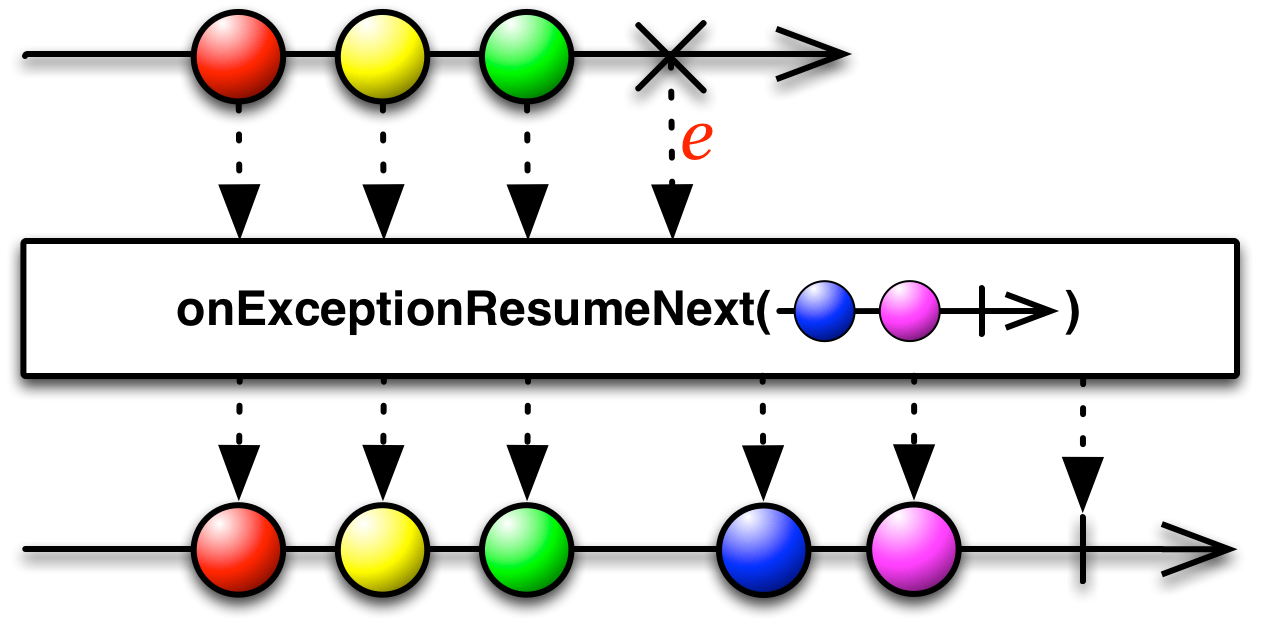
By default, when an ObservableSource encounters an exception that prevents it from emitting the expected item
to its Observer, the ObservableSource invokes its Observer's onError method, and then quits
without invoking any more of its Observer's methods. The onExceptionResumeNext method changes
this behavior. If you pass another ObservableSource (resumeSequence) to an ObservableSource's
onExceptionResumeNext method, if the original ObservableSource encounters an exception, instead of
invoking its Observer's onError method, it will instead relinquish control to
resumeSequence which will invoke the Observer's onNext method if it is
able to do so. In such a case, because no ObservableSource necessarily invokes onError, the Observer
may never know that an exception happened.
You can use this to prevent exceptions from propagating or to supply fallback data should exceptions be encountered.
- Scheduler:
onExceptionResumeNextdoes not operate by default on a particularScheduler.
Parameters
| next | the next ObservableSource that will take over if the source ObservableSource encounters an exception |
|---|
Returns
- the original ObservableSource, with appropriately modified behavior
public final Observable<T> onTerminateDetach ()
Nulls out references to the upstream producer and downstream Observer if the sequence is terminated or downstream calls dispose().
- Scheduler:
onTerminateDetachdoes not operate by default on a particularScheduler.
Returns
- an Observable which out references to the upstream producer and downstream Observer if the sequence is terminated or downstream calls dispose()
public final ConnectableObservable<T> publish ()
Returns a ConnectableObservable, which is a variety of ObservableSource that waits until its
connect method is called before it begins emitting items to those
Observers that have subscribed to it.
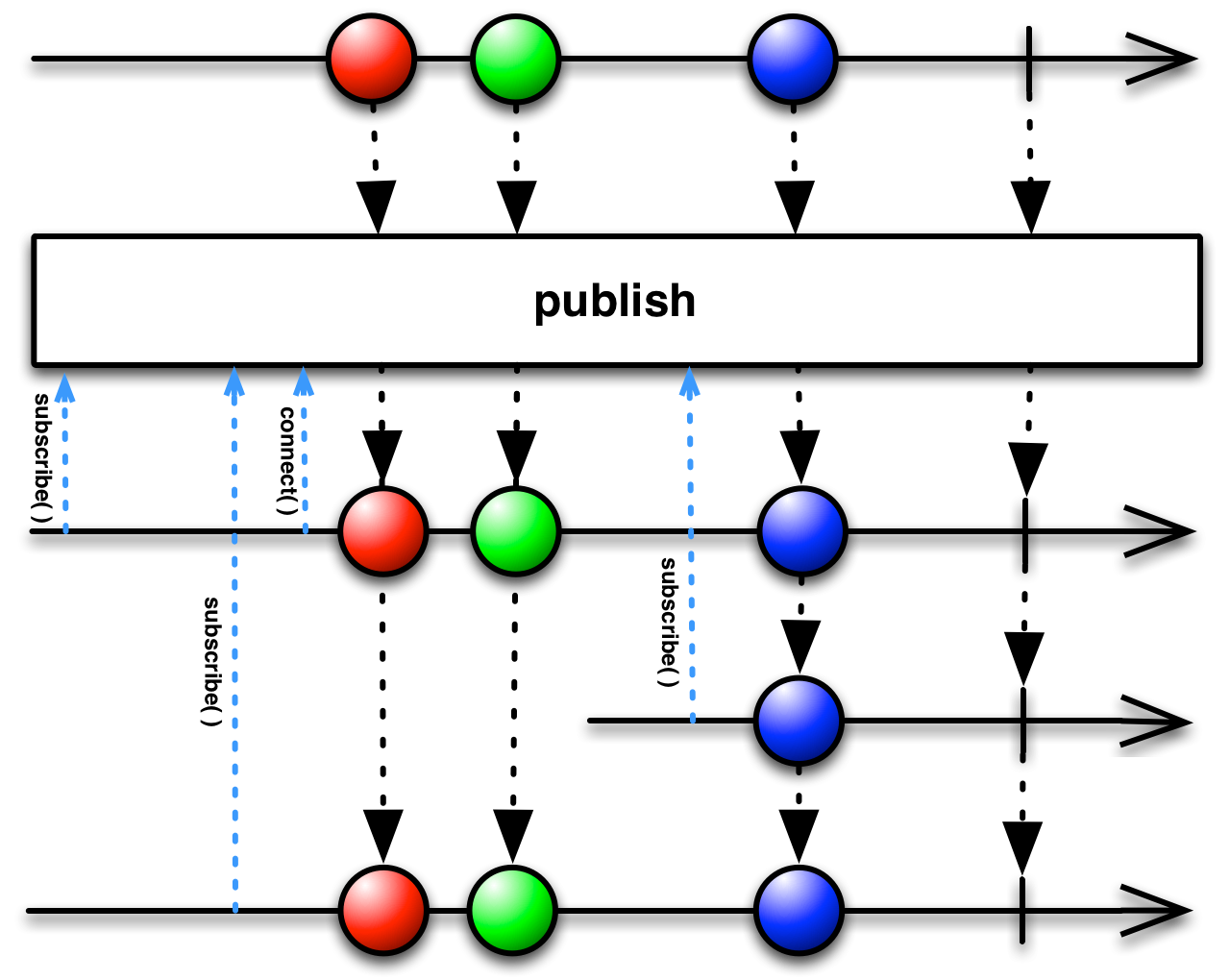
- Scheduler:
publishdoes not operate by default on a particularScheduler.
Returns
- a
ConnectableObservablethat upon connection causes the source ObservableSource to emit items to itsObservers
public final Observable<R> publish (Function<? super Observable<T>, ? extends ObservableSource<R>> selector)
Returns an Observable that emits the results of invoking a specified selector on items emitted by a
ConnectableObservable that shares a single subscription to the underlying sequence.
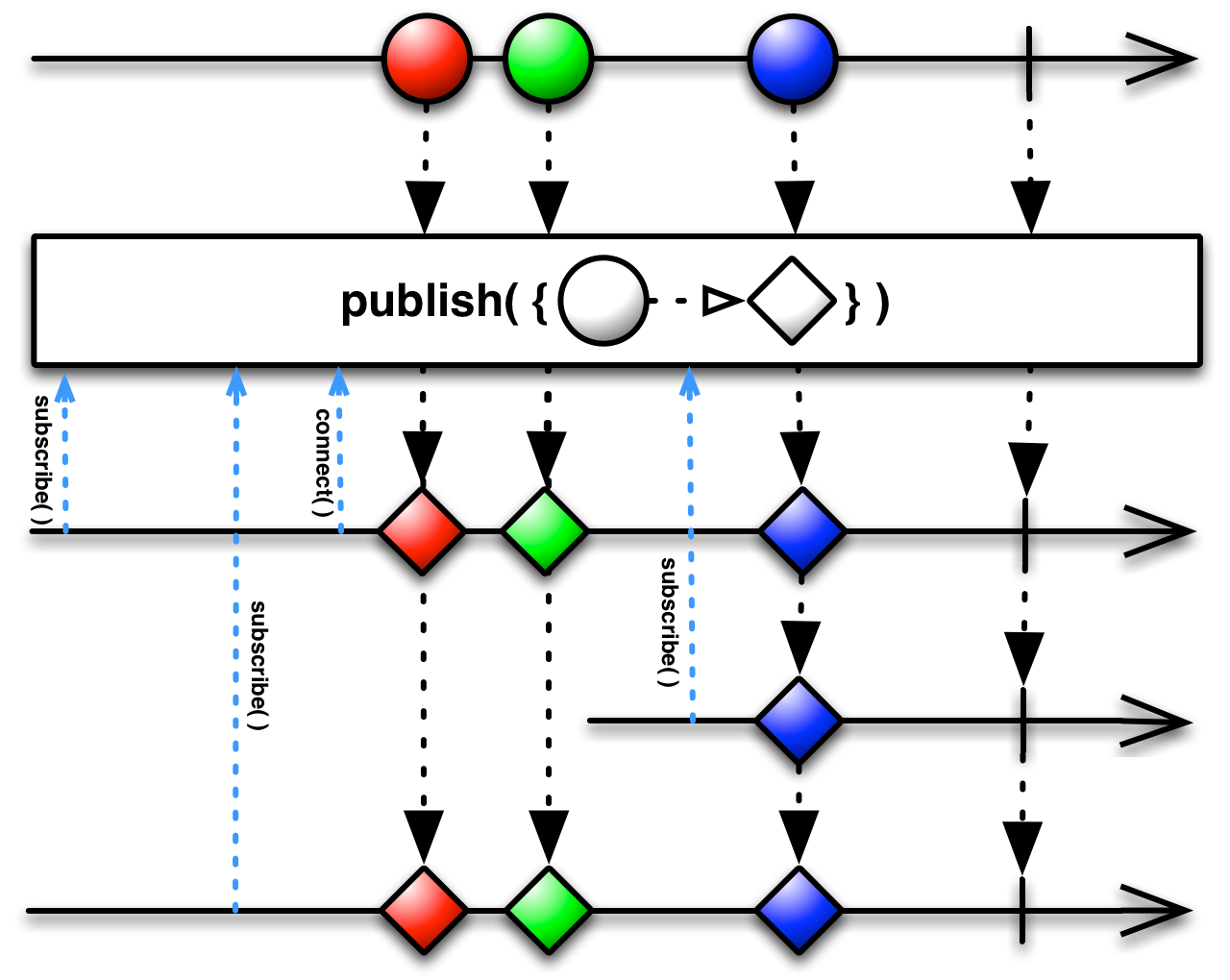
- Scheduler:
publishdoes not operate by default on a particularScheduler.
Parameters
| selector | a function that can use the multicasted source sequence as many times as needed, without causing multiple subscriptions to the source sequence. Observers to the given source will receive all notifications of the source from the time of the subscription forward. |
|---|
Returns
- an Observable that emits the results of invoking the selector on the items emitted by a
ConnectableObservablethat shares a single subscription to the underlying sequence
public static Observable<Integer> range (int start, int count)
Returns an Observable that emits a sequence of Integers within a specified range.

- Scheduler:
rangedoes not operate by default on a particularScheduler.
Parameters
| start | the value of the first Integer in the sequence |
|---|---|
| count | the number of sequential Integers to generate |
Returns
- an Observable that emits a range of sequential Integers
Throws
| IllegalArgumentException | if count is less than zero, or if start + count − 1 exceeds
Integer.MAX_VALUE |
|---|
public static Observable<Long> rangeLong (long start, long count)
Returns an Observable that emits a sequence of Longs within a specified range.

- Scheduler:
rangeLongdoes not operate by default on a particularScheduler.
Parameters
| start | the value of the first Long in the sequence |
|---|---|
| count | the number of sequential Longs to generate |
Returns
- an Observable that emits a range of sequential Longs
Throws
| IllegalArgumentException | if count is less than zero, or if start + count − 1 exceeds
Long.MAX_VALUE |
|---|
public final Maybe<T> reduce (BiFunction<T, T, T> reducer)
Returns a Maybe that applies a specified accumulator function to the first item emitted by a source ObservableSource, then feeds the result of that function along with the second item emitted by the source ObservableSource into the same function, and so on until all items have been emitted by the source ObservableSource, and emits the final result from the final call to your function as its sole item.
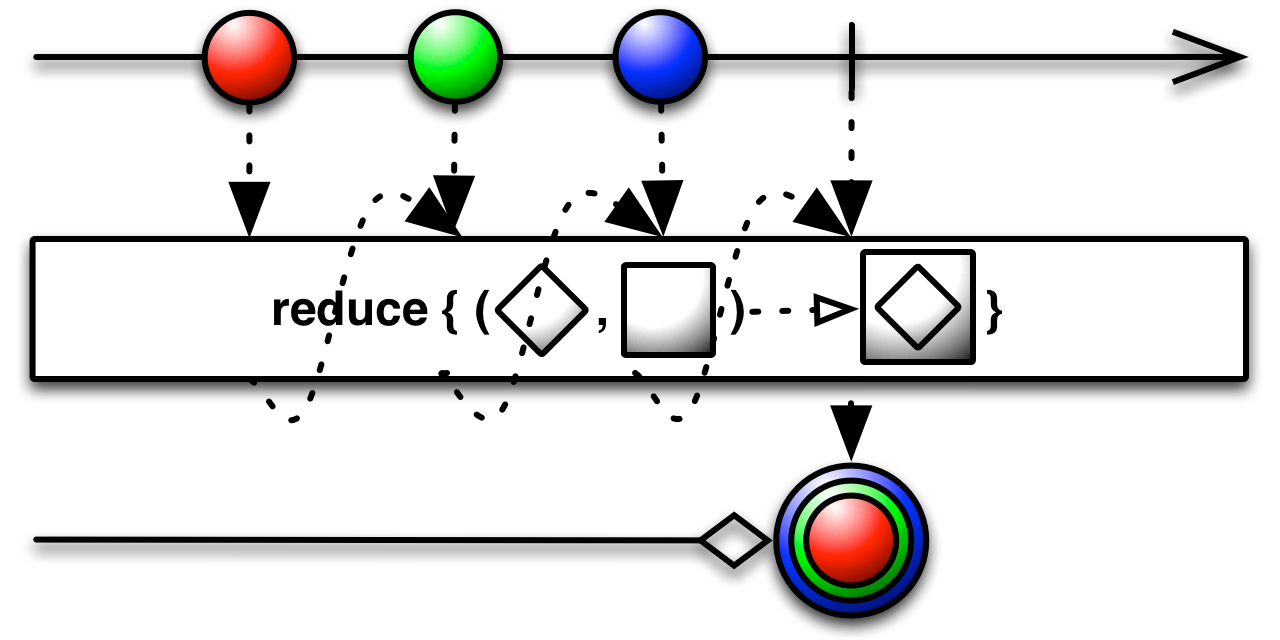
This technique, which is called "reduce" here, is sometimes called "aggregate," "fold," "accumulate,"
"compress," or "inject" in other programming contexts. Groovy, for instance, has an inject method
that does a similar operation on lists.
- Scheduler:
reducedoes not operate by default on a particularScheduler.
Parameters
| reducer | an accumulator function to be invoked on each item emitted by the source ObservableSource, whose result will be used in the next accumulator call |
|---|
Returns
- a Maybe that emits a single item that is the result of accumulating the items emitted by the source ObservableSource
public final Single<R> reduce (R seed, BiFunction<R, ? super T, R> reducer)
Returns a Single that applies a specified accumulator function to the first item emitted by a source ObservableSource and a specified seed value, then feeds the result of that function along with the second item emitted by an ObservableSource into the same function, and so on until all items have been emitted by the source ObservableSource, emitting the final result from the final call to your function as its sole item.
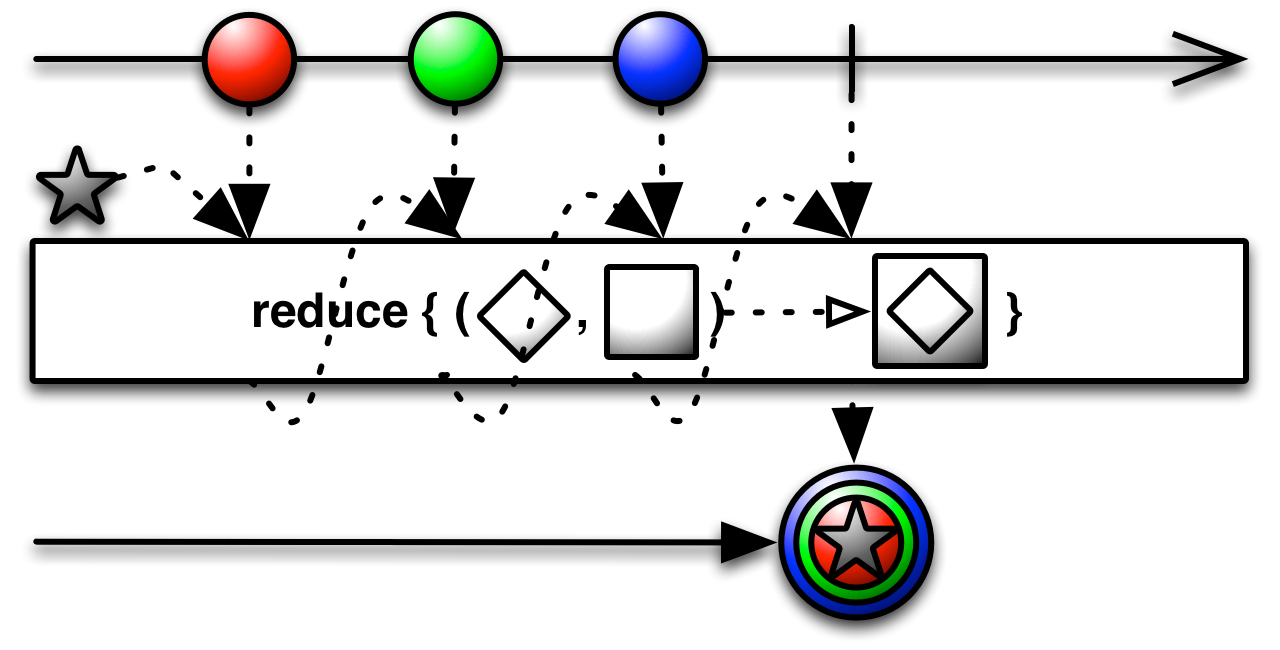
This technique, which is called "reduce" here, is sometimes called "aggregate," "fold," "accumulate,"
"compress," or "inject" in other programming contexts. Groovy, for instance, has an inject method
that does a similar operation on lists.
Note that the seed is shared among all subscribers to the resulting ObservableSource
and may cause problems if it is mutable. To make sure each subscriber gets its own value, defer
the application of this operator via defer(Callable):
ObservableSource<T> source = ...
Single.defer(() -> source.reduce(new ArrayList<>(), (list, item) -> list.add(item)));
// alternatively, by using compose to stay fluent
source.compose(o ->
Observable.defer(() -> o.reduce(new ArrayList<>(), (list, item) -> list.add(item)).toObservable())
).firstOrError();
// or, by using reduceWith instead of reduce
source.reduceWith(() -> new ArrayList<>(), (list, item) -> list.add(item)));
- Scheduler:
reducedoes not operate by default on a particularScheduler.
Parameters
| seed | the initial (seed) accumulator value |
|---|---|
| reducer | an accumulator function to be invoked on each item emitted by the source ObservableSource, the result of which will be used in the next accumulator call |
Returns
- a Single that emits a single item that is the result of accumulating the output from the items emitted by the source ObservableSource
public final Single<R> reduceWith (Callable<R> seedSupplier, BiFunction<R, ? super T, R> reducer)
Returns a Single that applies a specified accumulator function to the first item emitted by a source ObservableSource and a seed value derived from calling a specified seedSupplier, then feeds the result of that function along with the second item emitted by an ObservableSource into the same function, and so on until all items have been emitted by the source ObservableSource, emitting the final result from the final call to your function as its sole item.

This technique, which is called "reduce" here, is sometimes called "aggregate," "fold," "accumulate,"
"compress," or "inject" in other programming contexts. Groovy, for instance, has an inject method
that does a similar operation on lists.
- Scheduler:
reduceWithdoes not operate by default on a particularScheduler.
Parameters
| seedSupplier | the Callable that provides the initial (seed) accumulator value for each individual Observer |
|---|---|
| reducer | an accumulator function to be invoked on each item emitted by the source ObservableSource, the result of which will be used in the next accumulator call |
Returns
- a Single that emits a single item that is the result of accumulating the output from the items emitted by the source ObservableSource
public final Observable<T> repeat ()
Returns an Observable that repeats the sequence of items emitted by the source ObservableSource indefinitely.
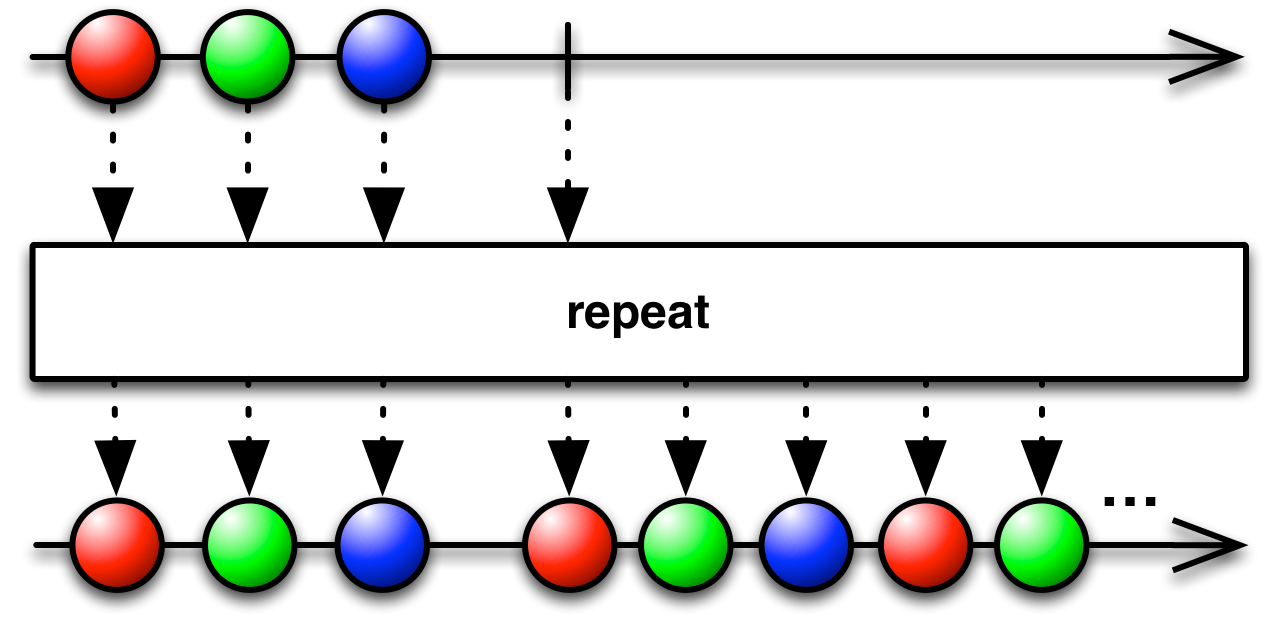
- Scheduler:
repeatdoes not operate by default on a particularScheduler.
Returns
- an Observable that emits the items emitted by the source ObservableSource repeatedly and in sequence
public final Observable<T> repeat (long times)
Returns an Observable that repeats the sequence of items emitted by the source ObservableSource at most
count times.

- Scheduler:
repeatdoes not operate by default on a particularScheduler.
Parameters
| times | the number of times the source ObservableSource items are repeated, a count of 0 will yield an empty sequence |
|---|
Returns
- an Observable that repeats the sequence of items emitted by the source ObservableSource at most
counttimes
Throws
| IllegalArgumentException | if count is less than zero |
|---|
public final Observable<T> repeatUntil (BooleanSupplier stop)
Returns an Observable that repeats the sequence of items emitted by the source ObservableSource until the provided stop function returns true.

- Scheduler:
repeatUntildoes not operate by default on a particularScheduler.
Parameters
| stop | a boolean supplier that is called when the current Observable completes and unless it returns false, the current Observable is resubscribed |
|---|
Returns
- the new Observable instance
Throws
| NullPointerException | if stop is null |
|---|
public final Observable<T> repeatWhen (Function<? super Observable<Object>, ? extends ObservableSource<?>> handler)
Returns an Observable that emits the same values as the source ObservableSource with the exception of an
onComplete. An onComplete notification from the source will result in the emission of
a void item to the ObservableSource provided as an argument to the notificationHandler
function. If that ObservableSource calls onComplete or onError then repeatWhen will
call onComplete or onError on the child subscription. Otherwise, this ObservableSource will
resubscribe to the source ObservableSource.
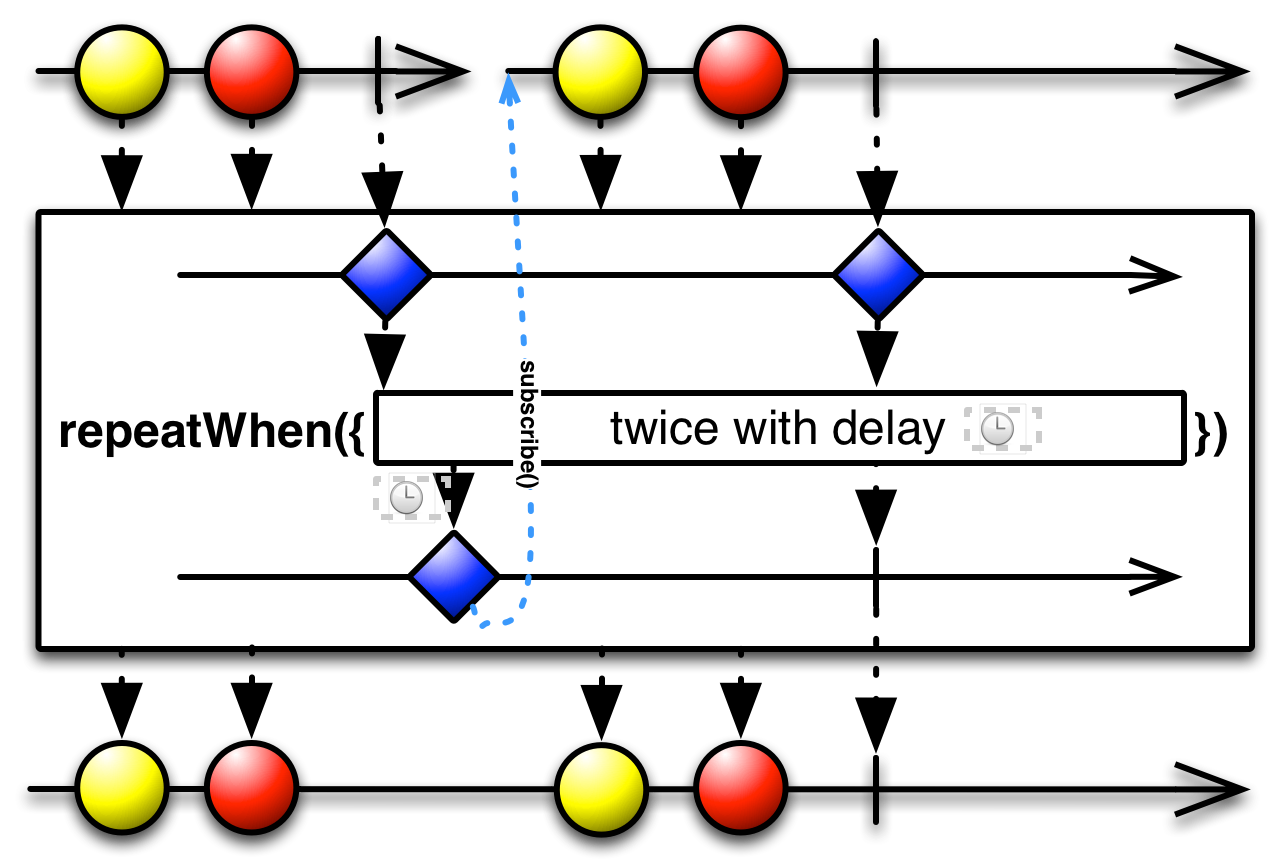
- Scheduler:
repeatWhendoes not operate by default on a particularScheduler.
Parameters
| handler | receives an ObservableSource of notifications with which a user can complete or error, aborting the repeat. |
|---|
Returns
- the source ObservableSource modified with repeat logic
public final Observable<R> replay (Function<? super Observable<T>, ? extends ObservableSource<R>> selector, int bufferSize, Scheduler scheduler)
Returns an Observable that emits items that are the results of invoking a specified selector on items
emitted by a ConnectableObservable that shares a single subscription to the source ObservableSource,
replaying a maximum of bufferSize items.
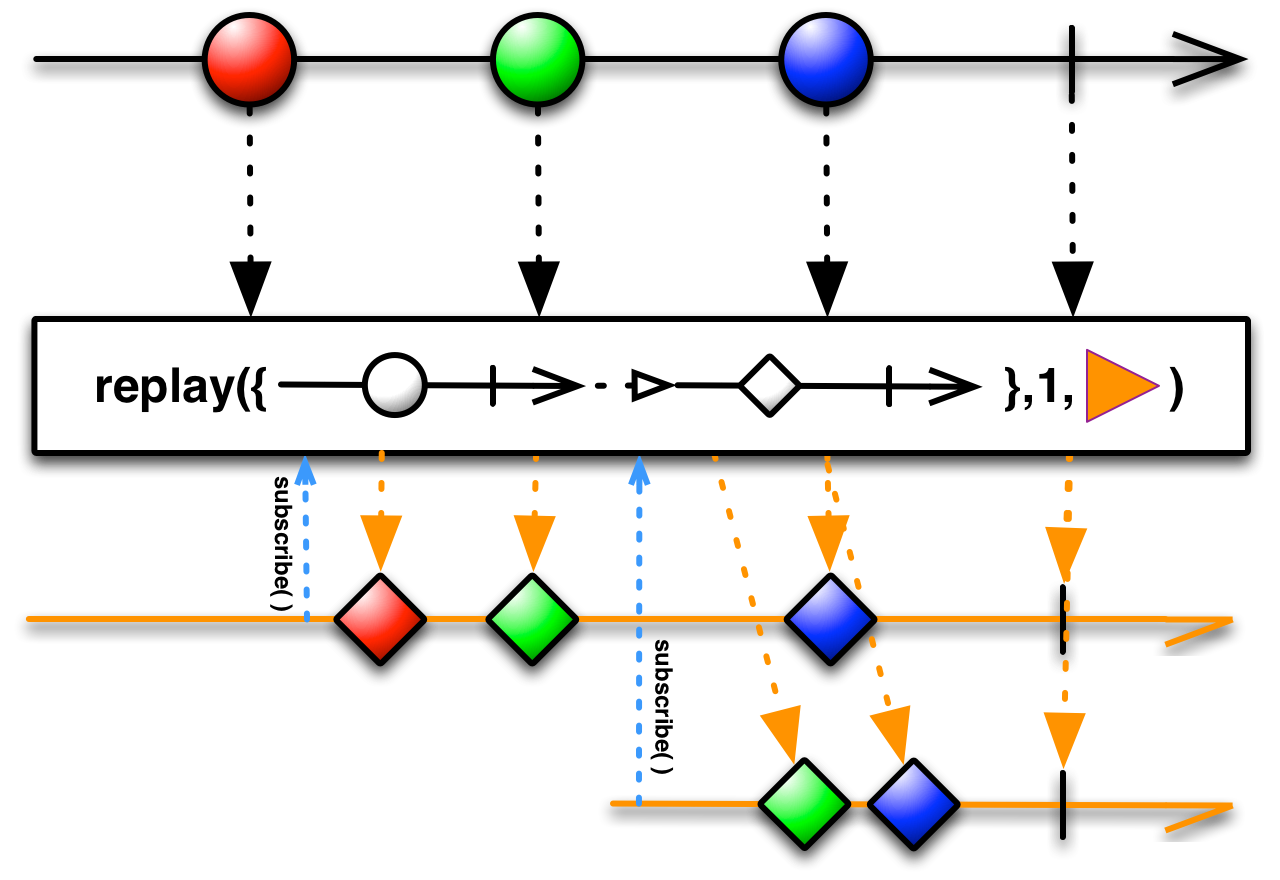
- Scheduler:
- You specify which
Schedulerthis operator will use
Parameters
| selector | a selector function, which can use the multicasted sequence as many times as needed, without causing multiple subscriptions to the ObservableSource |
|---|---|
| bufferSize | the buffer size that limits the number of items the connectable ObservableSource can replay |
| scheduler | the Scheduler on which the replay is observed |
Returns
- an Observable that emits items that are the results of invoking the selector on items emitted by
a
ConnectableObservablethat shares a single subscription to the source ObservableSource, replaying no more thanbufferSizenotifications
public final Observable<R> replay (Function<? super Observable<T>, ? extends ObservableSource<R>> selector, int bufferSize)
Returns an Observable that emits items that are the results of invoking a specified selector on items
emitted by a ConnectableObservable that shares a single subscription to the source ObservableSource,
replaying bufferSize notifications.
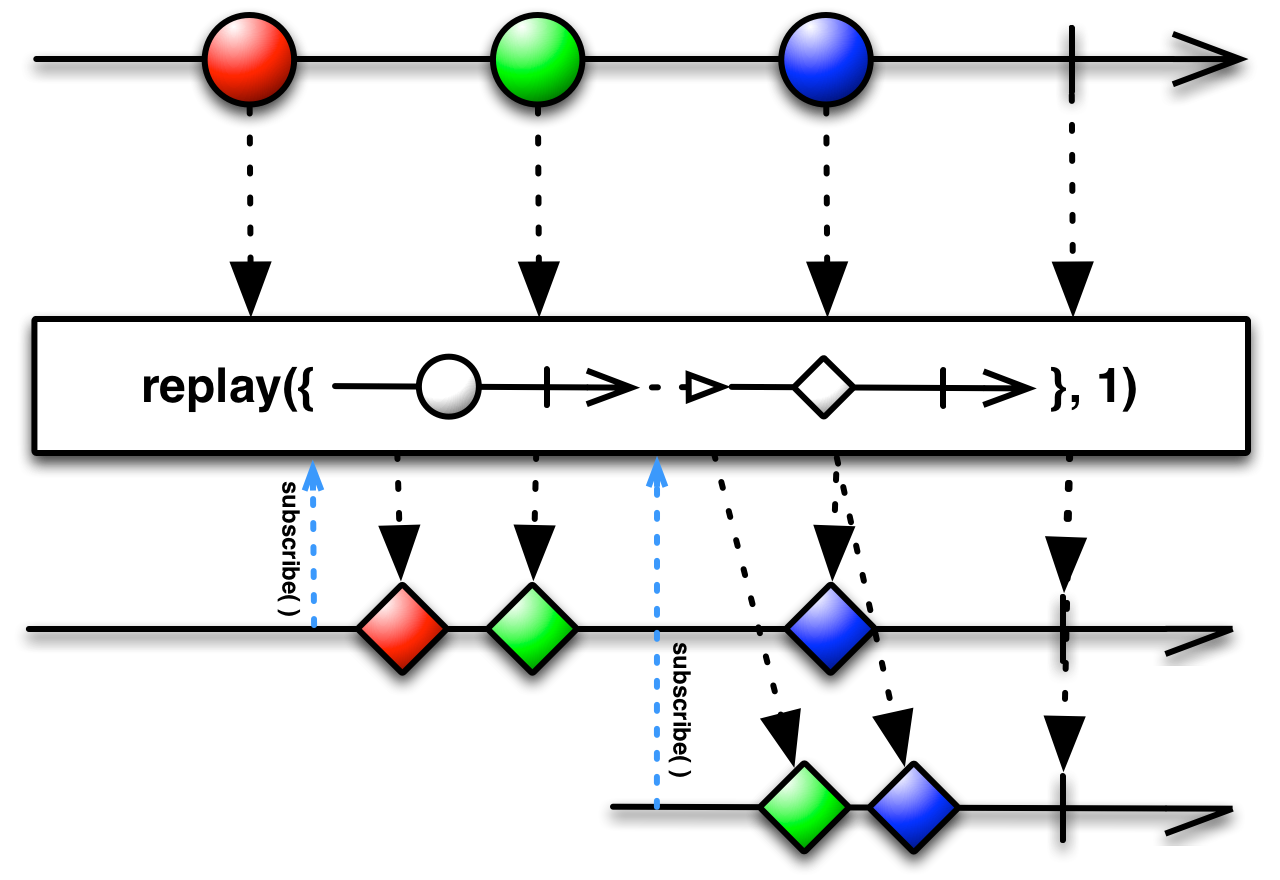
- Scheduler:
- This version of
replaydoes not operate by default on a particularScheduler.
Parameters
| selector | the selector function, which can use the multicasted sequence as many times as needed, without causing multiple subscriptions to the ObservableSource |
|---|---|
| bufferSize | the buffer size that limits the number of items the connectable ObservableSource can replay |
Returns
- an Observable that emits items that are the results of invoking the selector on items emitted by
a
ConnectableObservablethat shares a single subscription to the source ObservableSource replaying no more thanbufferSizeitems
public final Observable<R> replay (Function<? super Observable<T>, ? extends ObservableSource<R>> selector, int bufferSize, long time, TimeUnit unit, Scheduler scheduler)
Returns an Observable that emits items that are the results of invoking a specified selector on items
emitted by a ConnectableObservable that shares a single subscription to the source ObservableSource,
replaying no more than bufferSize items that were emitted within a specified time window.
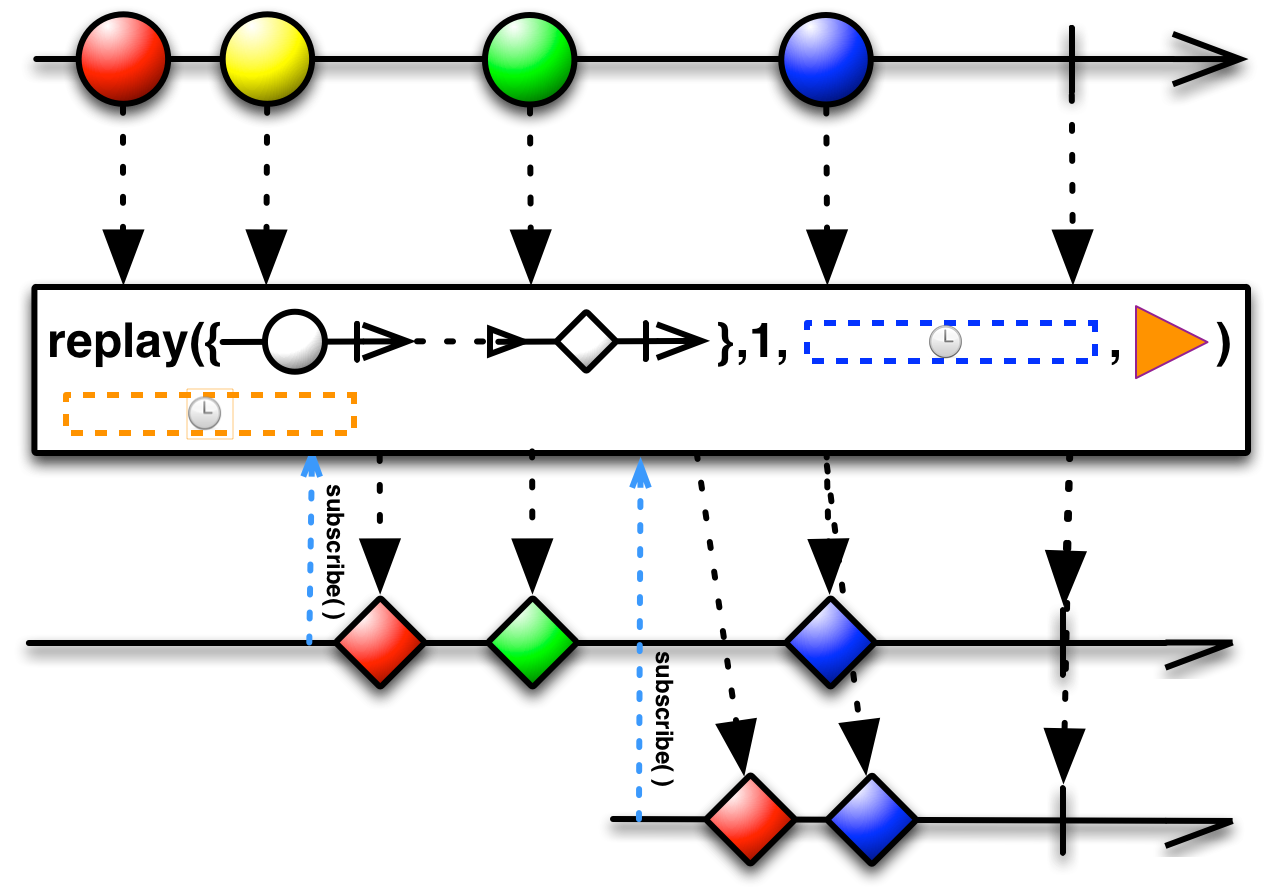
- Scheduler:
- You specify which
Schedulerthis operator will use
Parameters
| selector | a selector function, which can use the multicasted sequence as many times as needed, without causing multiple subscriptions to the ObservableSource |
|---|---|
| bufferSize | the buffer size that limits the number of items the connectable ObservableSource can replay |
| time | the duration of the window in which the replayed items must have been emitted |
| unit | the time unit of time |
| scheduler | the Scheduler that is the time source for the window |
Returns
- an Observable that emits items that are the results of invoking the selector on items emitted by
a
ConnectableObservablethat shares a single subscription to the source ObservableSource, and replays no more thanbufferSizeitems that were emitted within the window defined bytime
Throws
| IllegalArgumentException | if bufferSize is less than zero |
|---|
public final ConnectableObservable<T> replay (int bufferSize, long time, TimeUnit unit)
Returns a ConnectableObservable that shares a single subscription to the source ObservableSource and
replays at most bufferSize items that were emitted during a specified time window. A Connectable
ObservableSource resembles an ordinary ObservableSource, except that it does not begin emitting items when it is
subscribed to, but only when its connect method is called.
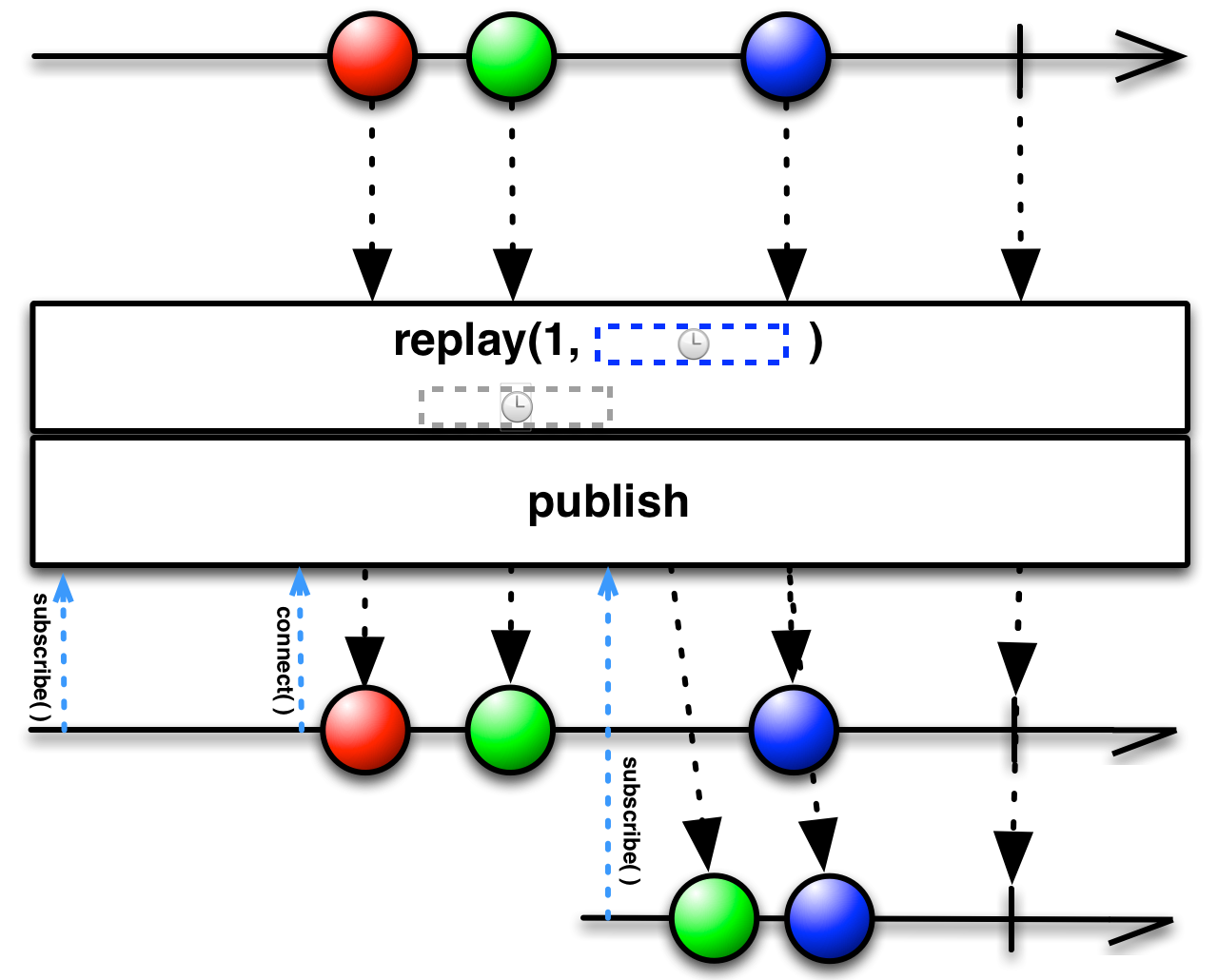
- Scheduler:
- This version of
replayoperates by default on thecomputationScheduler.
Parameters
| bufferSize | the buffer size that limits the number of items that can be replayed |
|---|---|
| time | the duration of the window in which the replayed items must have been emitted |
| unit | the time unit of time |
Returns
- a
ConnectableObservablethat shares a single subscription to the source ObservableSource and replays at mostbufferSizeitems that were emitted during the window defined bytime
public final ConnectableObservable<T> replay (int bufferSize, long time, TimeUnit unit, Scheduler scheduler)
Returns a ConnectableObservable that shares a single subscription to the source ObservableSource and
that replays a maximum of bufferSize items that are emitted within a specified time window. A
Connectable ObservableSource resembles an ordinary ObservableSource, except that it does not begin emitting items
when it is subscribed to, but only when its connect method is called.
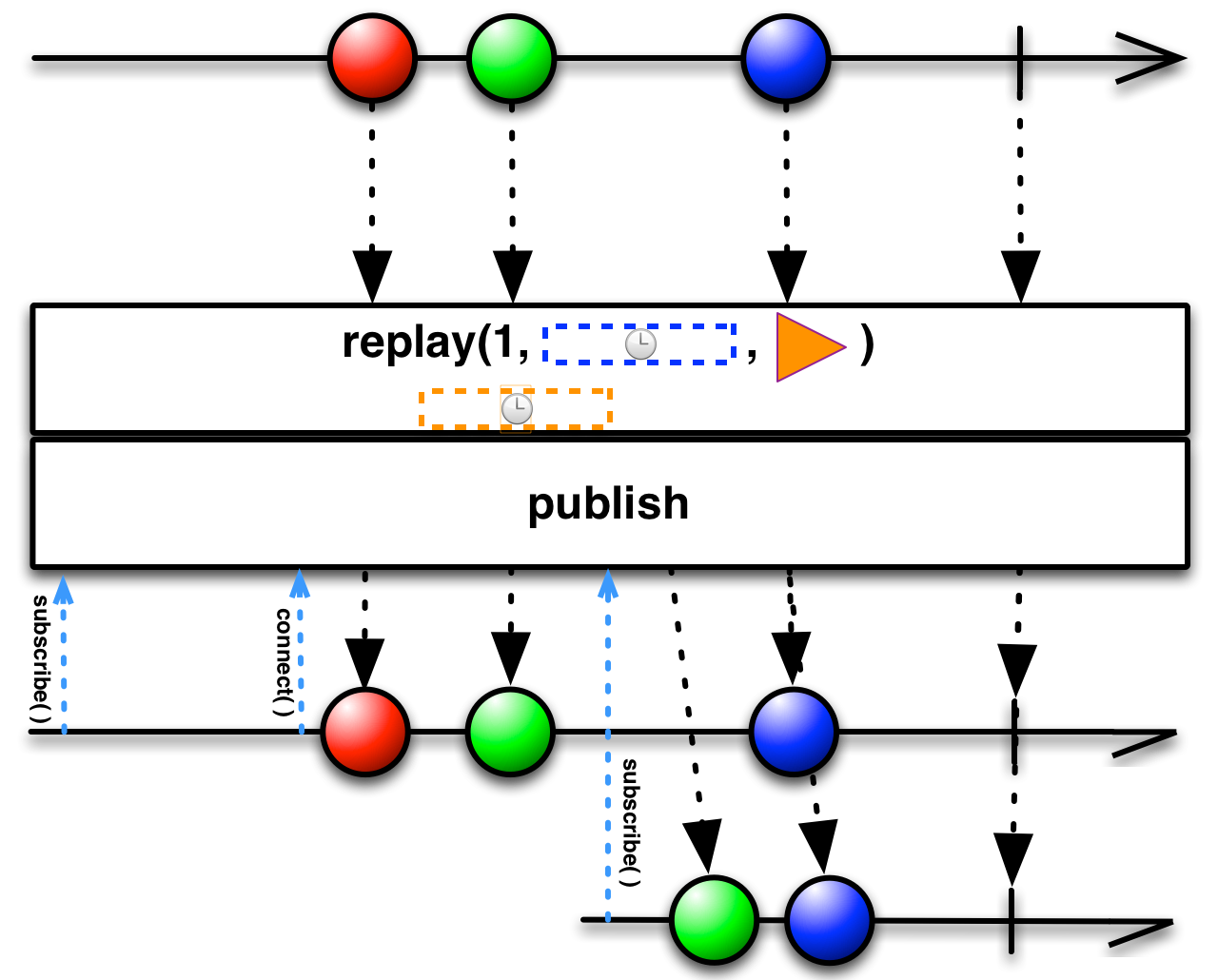
- Scheduler:
- You specify which
Schedulerthis operator will use
Parameters
| bufferSize | the buffer size that limits the number of items that can be replayed |
|---|---|
| time | the duration of the window in which the replayed items must have been emitted |
| unit | the time unit of time |
| scheduler | the scheduler that is used as a time source for the window |
Returns
- a
ConnectableObservablethat shares a single subscription to the source ObservableSource and replays at mostbufferSizeitems that were emitted during the window defined bytime
Throws
| IllegalArgumentException | if bufferSize is less than zero |
|---|
public final ConnectableObservable<T> replay (int bufferSize)
Returns a ConnectableObservable that shares a single subscription to the source ObservableSource that
replays at most bufferSize items emitted by that ObservableSource. A Connectable ObservableSource resembles
an ordinary ObservableSource, except that it does not begin emitting items when it is subscribed to, but only
when its connect method is called.
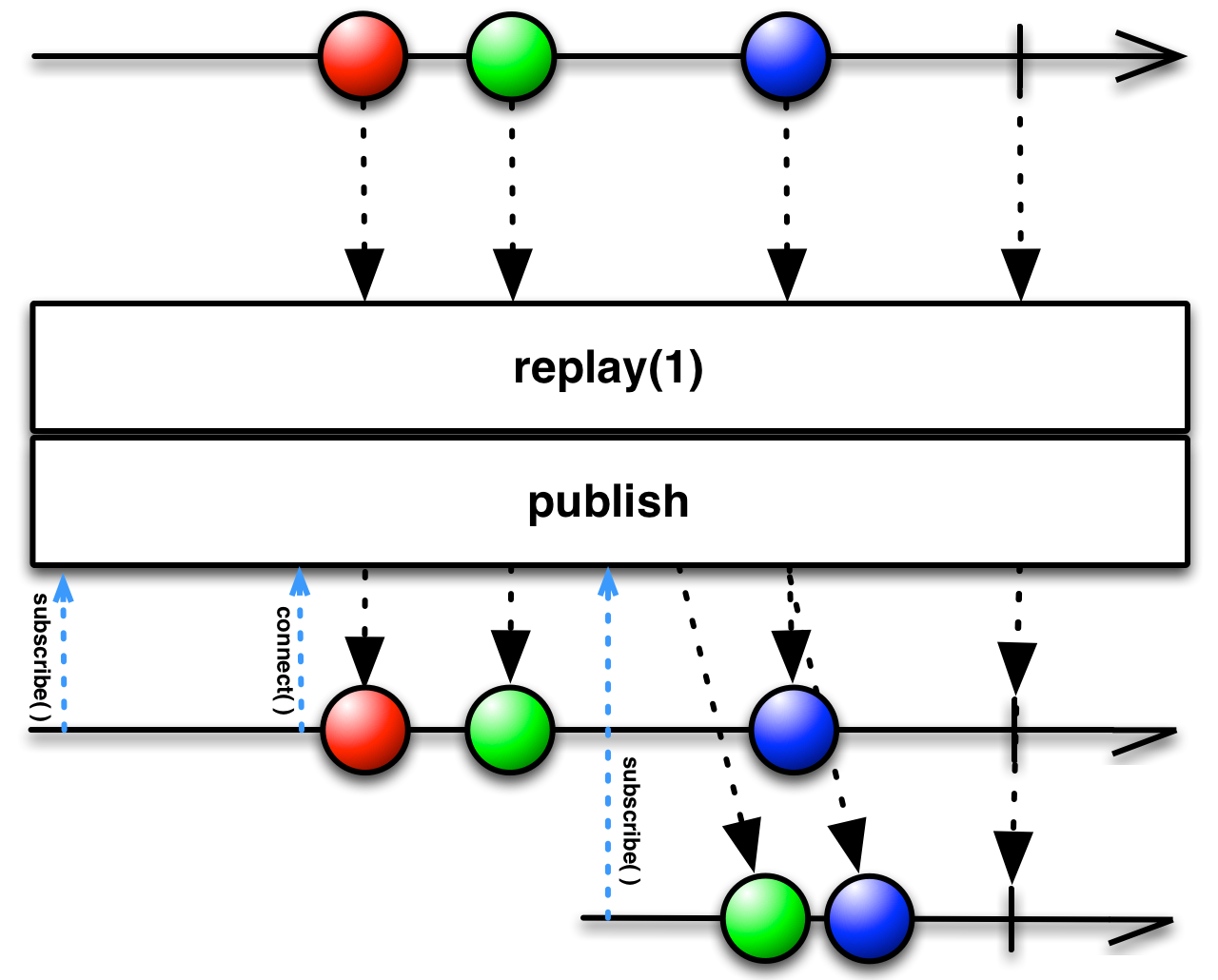
- Scheduler:
- This version of
replaydoes not operate by default on a particularScheduler.
Parameters
| bufferSize | the buffer size that limits the number of items that can be replayed |
|---|
Returns
- a
ConnectableObservablethat shares a single subscription to the source ObservableSource and replays at mostbufferSizeitems emitted by that ObservableSource
public final ConnectableObservable<T> replay ()
Returns a ConnectableObservable that shares a single subscription to the underlying ObservableSource
that will replay all of its items and notifications to any future Observer. A Connectable
ObservableSource resembles an ordinary ObservableSource, except that it does not begin emitting items when it is
subscribed to, but only when its connect method is called.
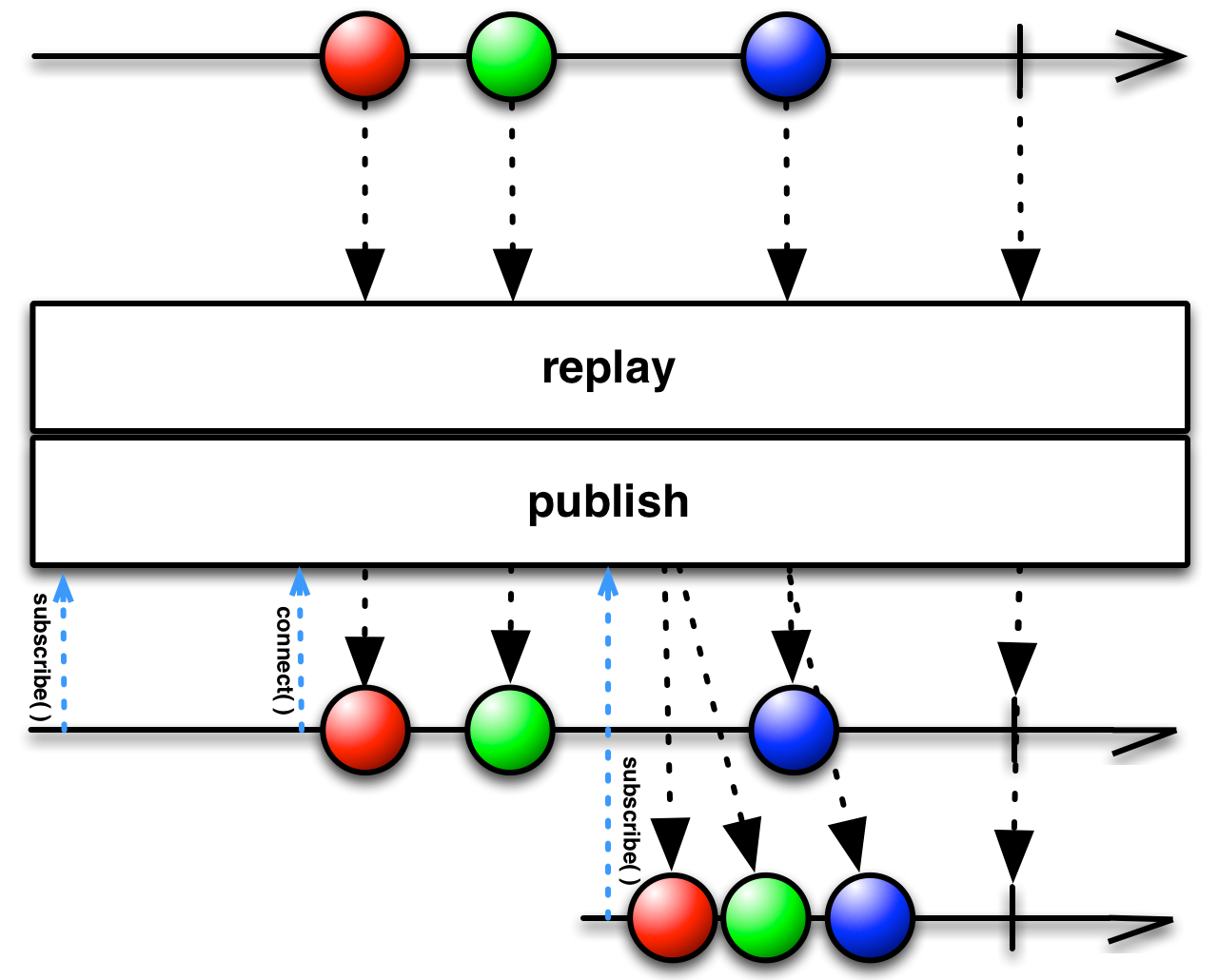
- Scheduler:
- This version of
replaydoes not operate by default on a particularScheduler.
Returns
- a
ConnectableObservablethat upon connection causes the source ObservableSource to emit its items to itsObservers
public final Observable<R> replay (Function<? super Observable<T>, ? extends ObservableSource<R>> selector, int bufferSize, long time, TimeUnit unit)
Returns an Observable that emits items that are the results of invoking a specified selector on items
emitted by a ConnectableObservable that shares a single subscription to the source ObservableSource,
replaying no more than bufferSize items that were emitted within a specified time window.
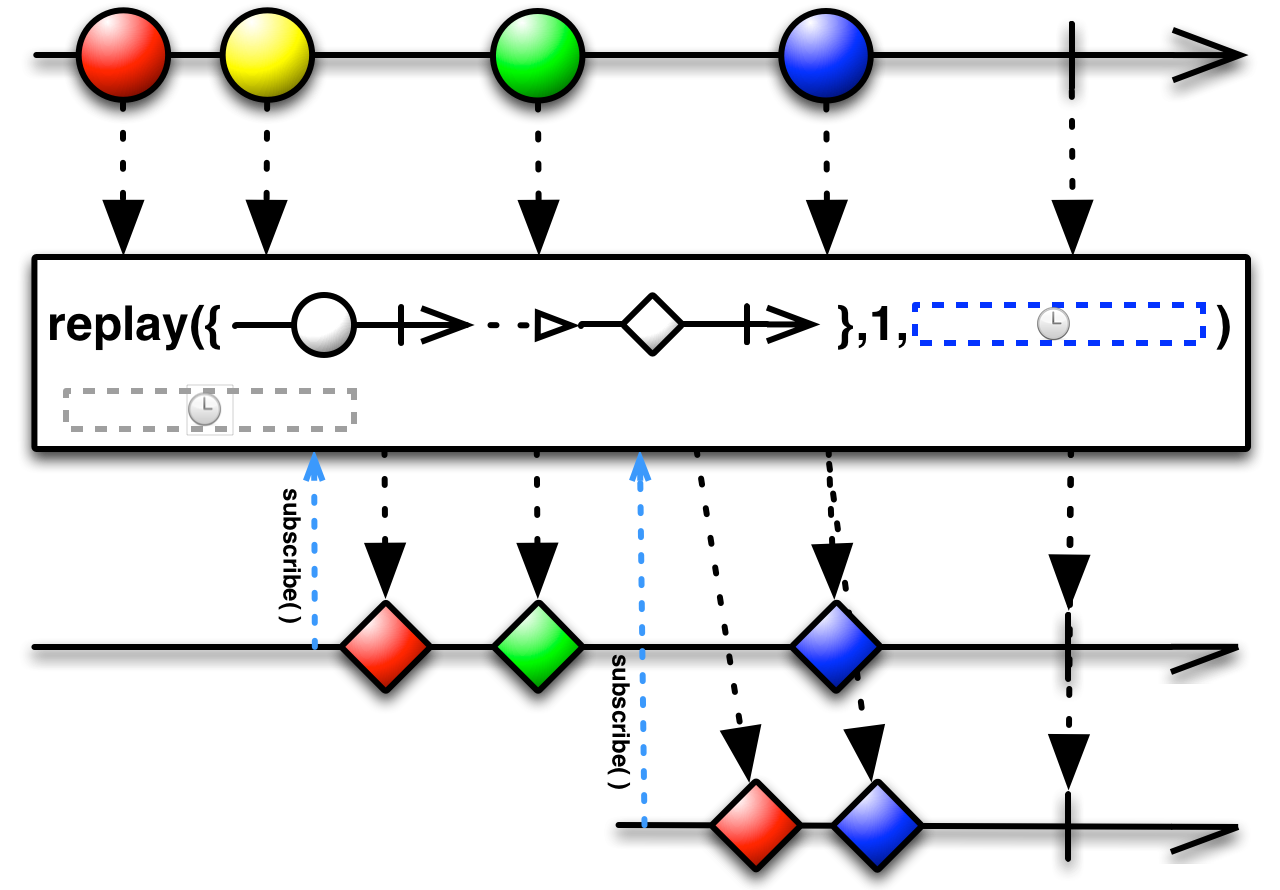
- Scheduler:
- This version of
replayoperates by default on thecomputationScheduler.
Parameters
| selector | a selector function, which can use the multicasted sequence as many times as needed, without causing multiple subscriptions to the ObservableSource |
|---|---|
| bufferSize | the buffer size that limits the number of items the connectable ObservableSource can replay |
| time | the duration of the window in which the replayed items must have been emitted |
| unit | the time unit of time |
Returns
- an Observable that emits items that are the results of invoking the selector on items emitted by
a
ConnectableObservablethat shares a single subscription to the source ObservableSource, and replays no more thanbufferSizeitems that were emitted within the window defined bytime
public final ConnectableObservable<T> replay (long time, TimeUnit unit)
Returns a ConnectableObservable that shares a single subscription to the source ObservableSource and
replays all items emitted by that ObservableSource within a specified time window. A Connectable ObservableSource
resembles an ordinary ObservableSource, except that it does not begin emitting items when it is subscribed to,
but only when its connect method is called.
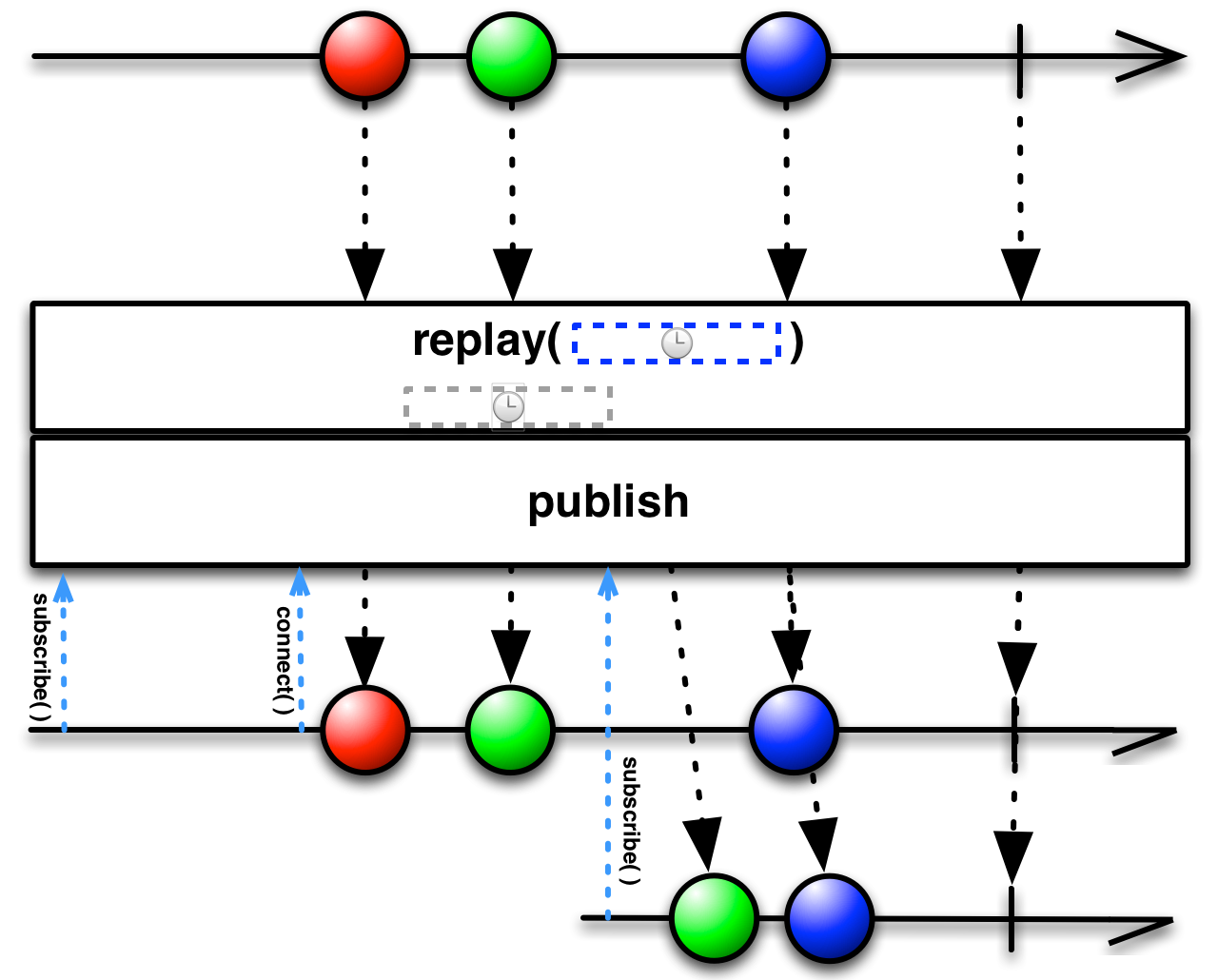
- Scheduler:
- This version of
replayoperates by default on thecomputationScheduler.
Parameters
| time | the duration of the window in which the replayed items must have been emitted |
|---|---|
| unit | the time unit of time |
Returns
- a
ConnectableObservablethat shares a single subscription to the source ObservableSource and replays the items that were emitted during the window defined bytime
public final Observable<R> replay (Function<? super Observable<T>, ? extends ObservableSource<R>> selector)
Returns an Observable that emits items that are the results of invoking a specified selector on the items
emitted by a ConnectableObservable that shares a single subscription to the source ObservableSource.
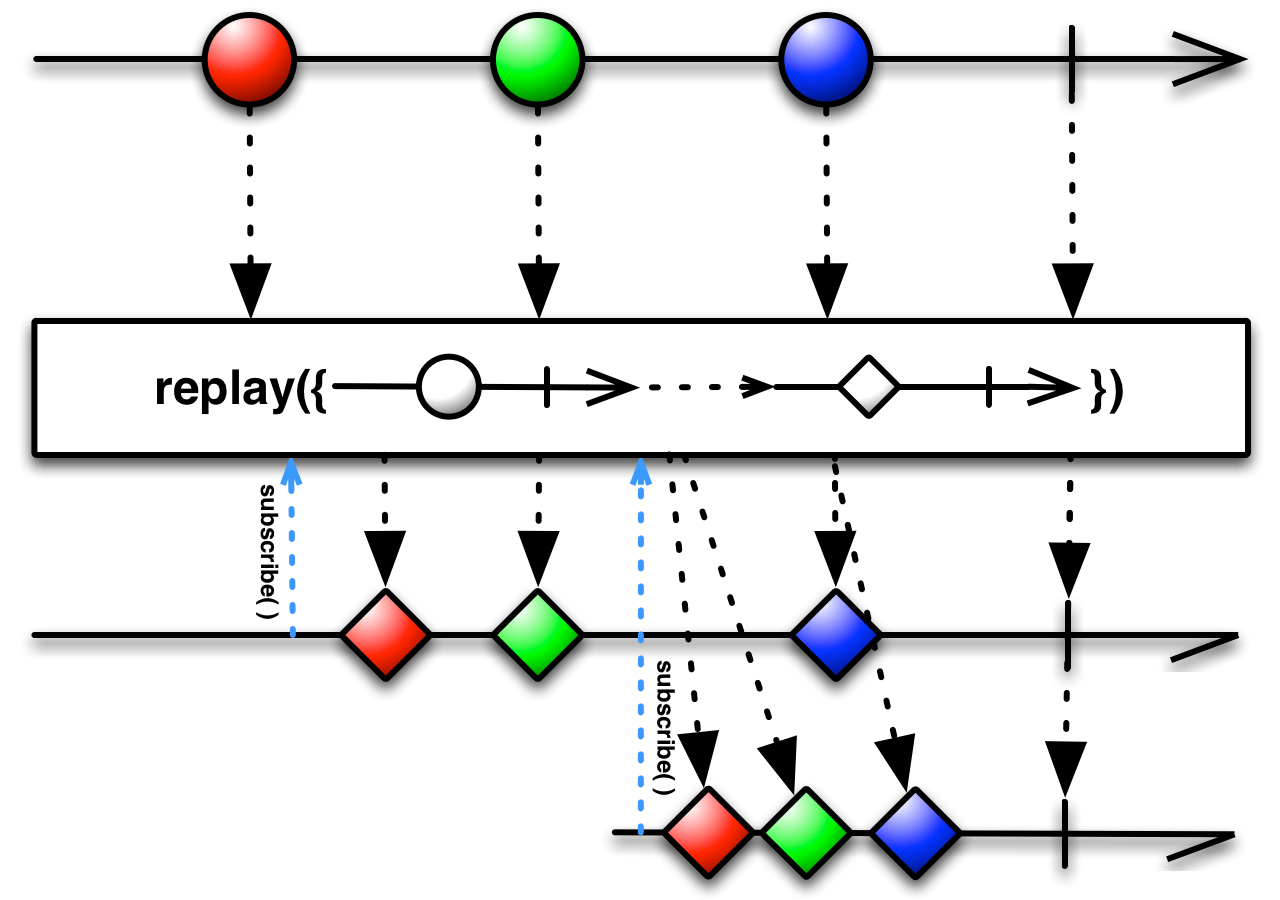
- Scheduler:
- This version of
replaydoes not operate by default on a particularScheduler.
Parameters
| selector | the selector function, which can use the multicasted sequence as many times as needed, without causing multiple subscriptions to the ObservableSource |
|---|
Returns
- an Observable that emits items that are the results of invoking the selector on a
ConnectableObservablethat shares a single subscription to the source ObservableSource
public final Observable<R> replay (Function<? super Observable<T>, ? extends ObservableSource<R>> selector, Scheduler scheduler)
Returns an Observable that emits items that are the results of invoking a specified selector on items
emitted by a ConnectableObservable that shares a single subscription to the source ObservableSource.
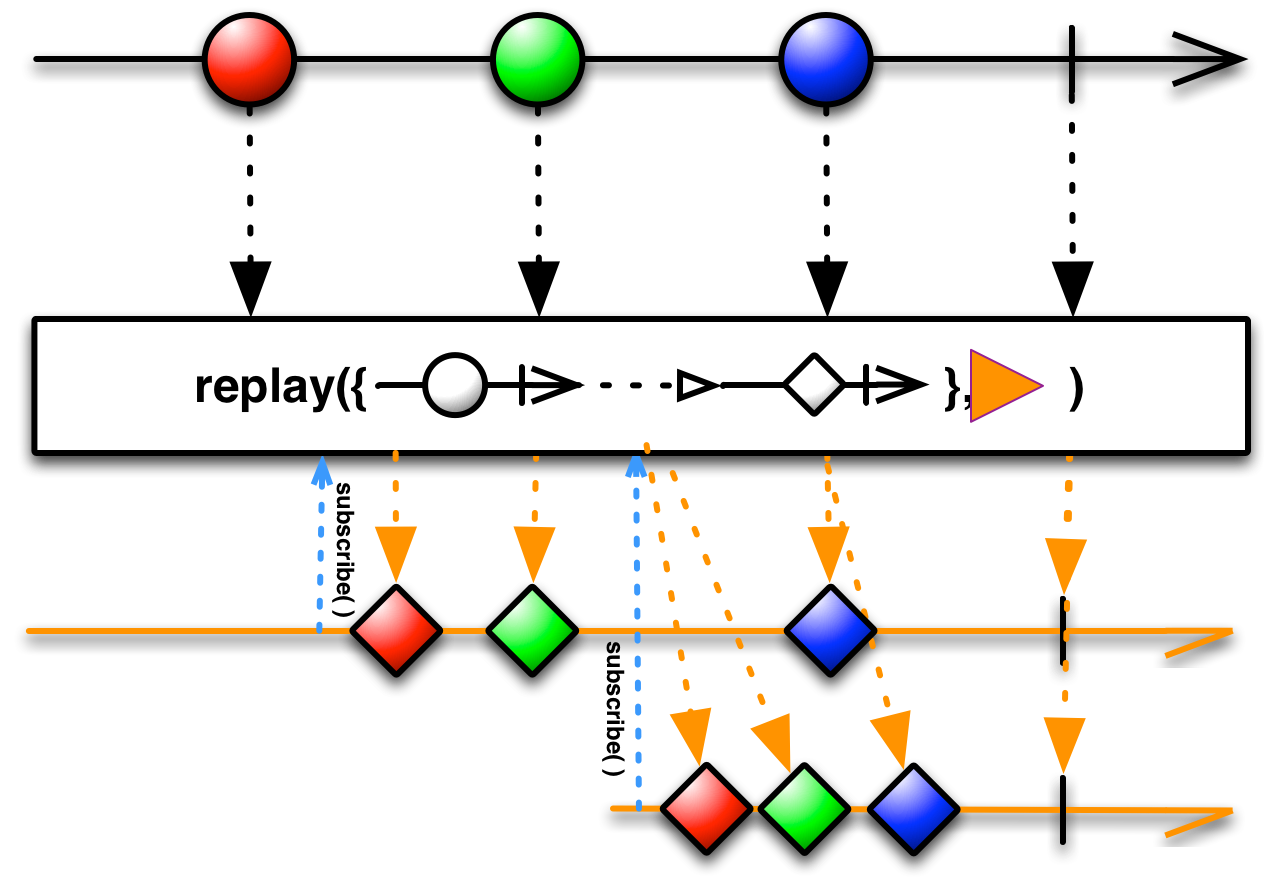
- Scheduler:
- You specify which
Schedulerthis operator will use
Parameters
| selector | a selector function, which can use the multicasted sequence as many times as needed, without causing multiple subscriptions to the ObservableSource |
|---|---|
| scheduler | the Scheduler where the replay is observed |
Returns
- an Observable that emits items that are the results of invoking the selector on items emitted by
a
ConnectableObservablethat shares a single subscription to the source ObservableSource, replaying all items
public final ConnectableObservable<T> replay (Scheduler scheduler)
Returns a ConnectableObservable that shares a single subscription to the source ObservableSource that
will replay all of its items and notifications to any future Observer on the given
Scheduler. A Connectable ObservableSource resembles an ordinary ObservableSource, except that it does not
begin emitting items when it is subscribed to, but only when its connect method is called.
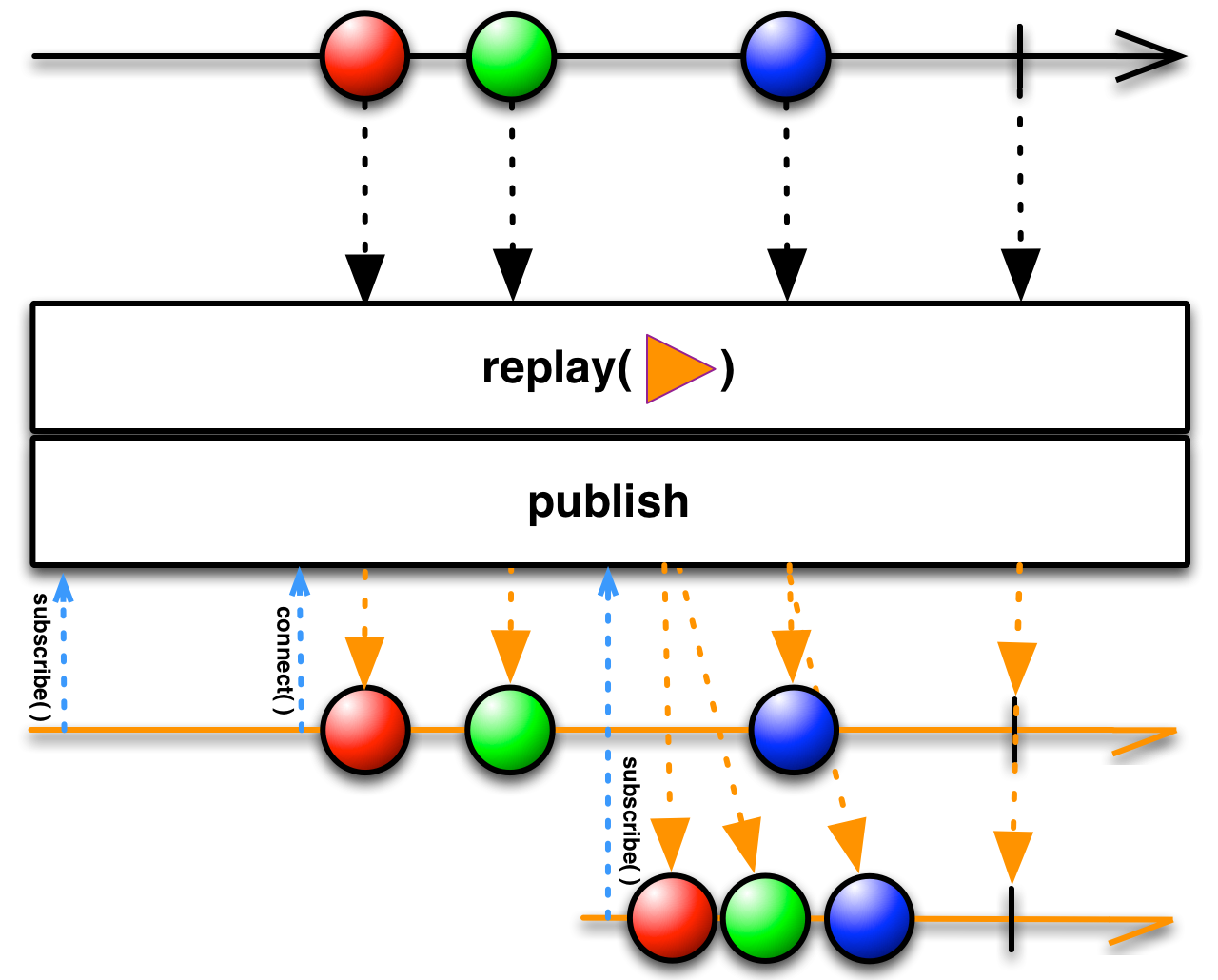
- Scheduler:
- You specify which
Schedulerthis operator will use
Parameters
| scheduler | the Scheduler on which the Observers will observe the emitted items |
|---|
Returns
- a
ConnectableObservablethat shares a single subscription to the source ObservableSource that will replay all of its items and notifications to any futureObserveron the givenScheduler
public final ConnectableObservable<T> replay (int bufferSize, Scheduler scheduler)
Returns a ConnectableObservable that shares a single subscription to the source ObservableSource and
replays at most bufferSize items emitted by that ObservableSource. A Connectable ObservableSource resembles
an ordinary ObservableSource, except that it does not begin emitting items when it is subscribed to, but only
when its connect method is called.
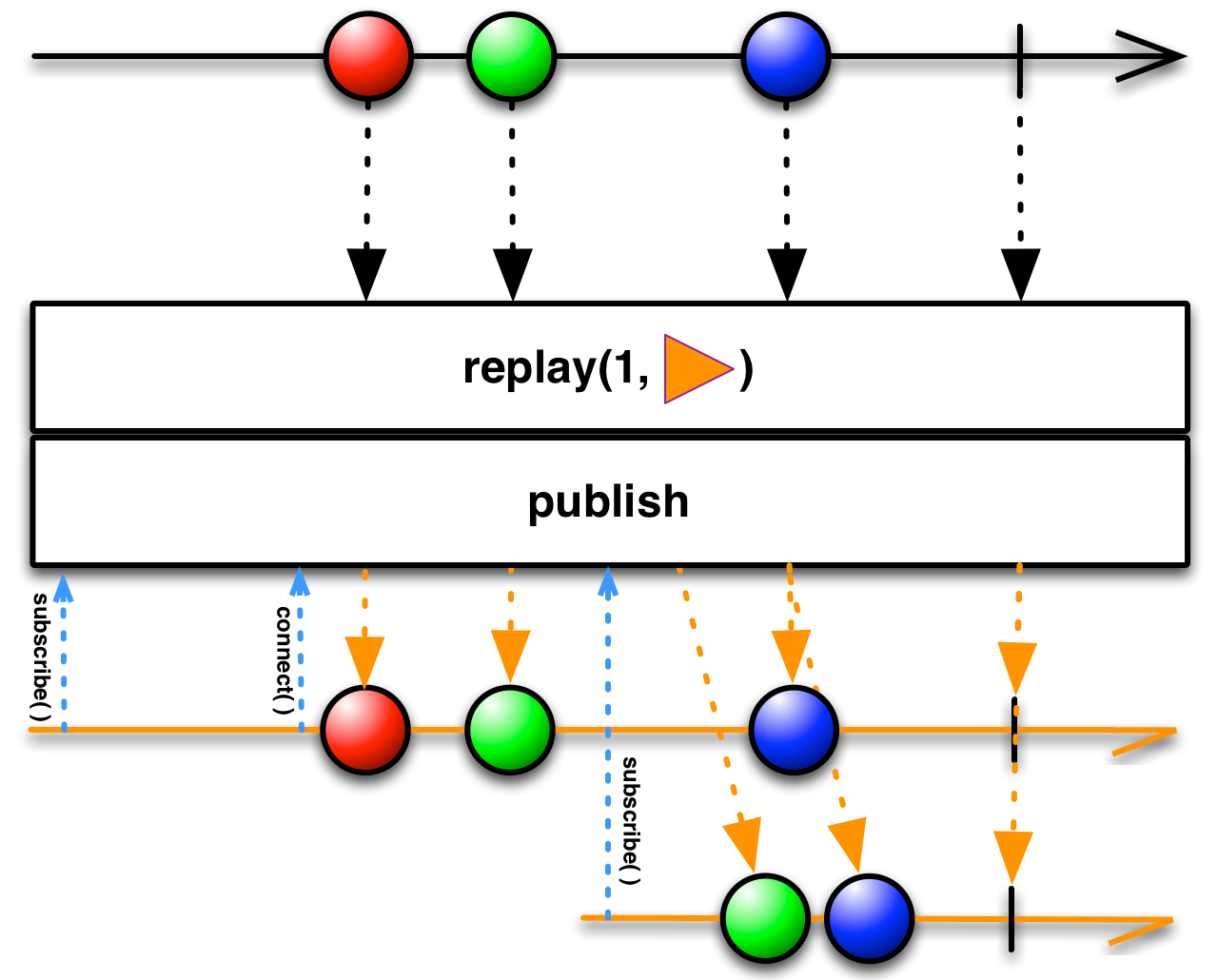
- Scheduler:
- You specify which
Schedulerthis operator will use
Parameters
| bufferSize | the buffer size that limits the number of items that can be replayed |
|---|---|
| scheduler | the scheduler on which the Observers will observe the emitted items |
Returns
- a
ConnectableObservablethat shares a single subscription to the source ObservableSource and replays at mostbufferSizeitems that were emitted by the ObservableSource
public final Observable<R> replay (Function<? super Observable<T>, ? extends ObservableSource<R>> selector, long time, TimeUnit unit)
Returns an Observable that emits items that are the results of invoking a specified selector on items
emitted by a ConnectableObservable that shares a single subscription to the source ObservableSource,
replaying all items that were emitted within a specified time window.
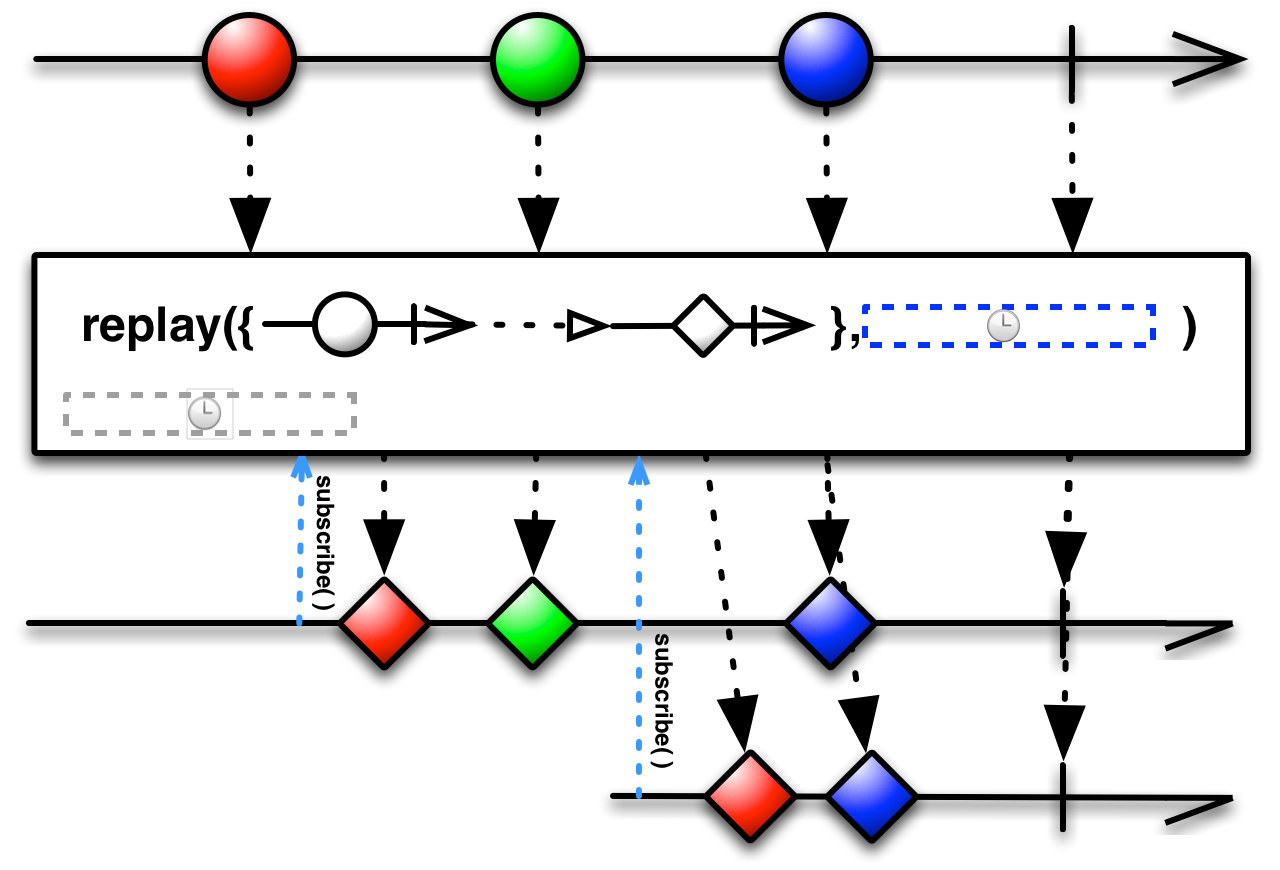
- Scheduler:
- This version of
replayoperates by default on thecomputationScheduler.
Parameters
| selector | a selector function, which can use the multicasted sequence as many times as needed, without causing multiple subscriptions to the ObservableSource |
|---|---|
| time | the duration of the window in which the replayed items must have been emitted |
| unit | the time unit of time |
Returns
- an Observable that emits items that are the results of invoking the selector on items emitted by
a
ConnectableObservablethat shares a single subscription to the source ObservableSource, replaying all items that were emitted within the window defined bytime
public final Observable<R> replay (Function<? super Observable<T>, ? extends ObservableSource<R>> selector, long time, TimeUnit unit, Scheduler scheduler)
Returns an Observable that emits items that are the results of invoking a specified selector on items
emitted by a ConnectableObservable that shares a single subscription to the source ObservableSource,
replaying all items that were emitted within a specified time window.
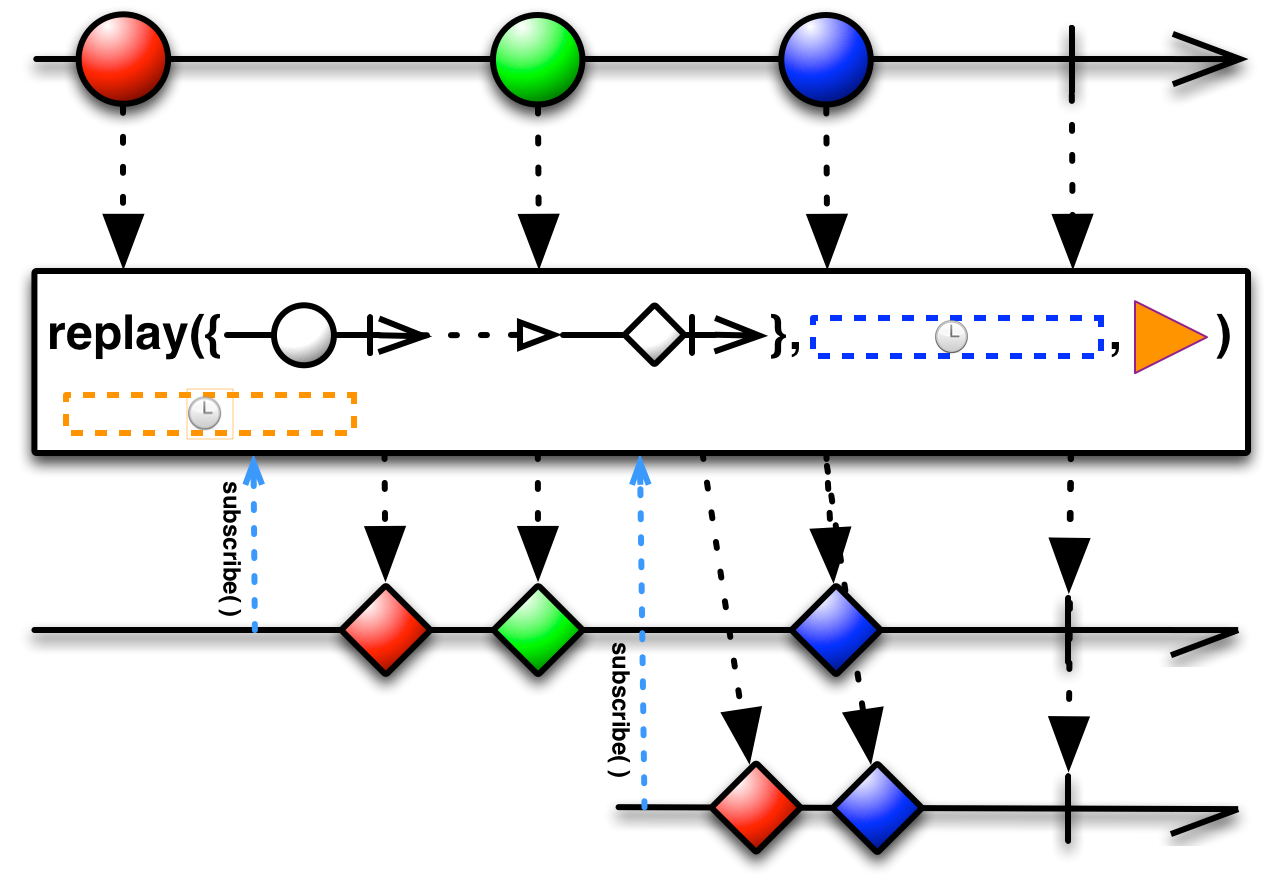
- Scheduler:
- You specify which
Schedulerthis operator will use
Parameters
| selector | a selector function, which can use the multicasted sequence as many times as needed, without causing multiple subscriptions to the ObservableSource |
|---|---|
| time | the duration of the window in which the replayed items must have been emitted |
| unit | the time unit of time |
| scheduler | the scheduler that is the time source for the window |
Returns
- an Observable that emits items that are the results of invoking the selector on items emitted by
a
ConnectableObservablethat shares a single subscription to the source ObservableSource, replaying all items that were emitted within the window defined bytime
public final ConnectableObservable<T> replay (long time, TimeUnit unit, Scheduler scheduler)
Returns a ConnectableObservable that shares a single subscription to the source ObservableSource and
replays all items emitted by that ObservableSource within a specified time window. A Connectable ObservableSource
resembles an ordinary ObservableSource, except that it does not begin emitting items when it is subscribed to,
but only when its connect method is called.
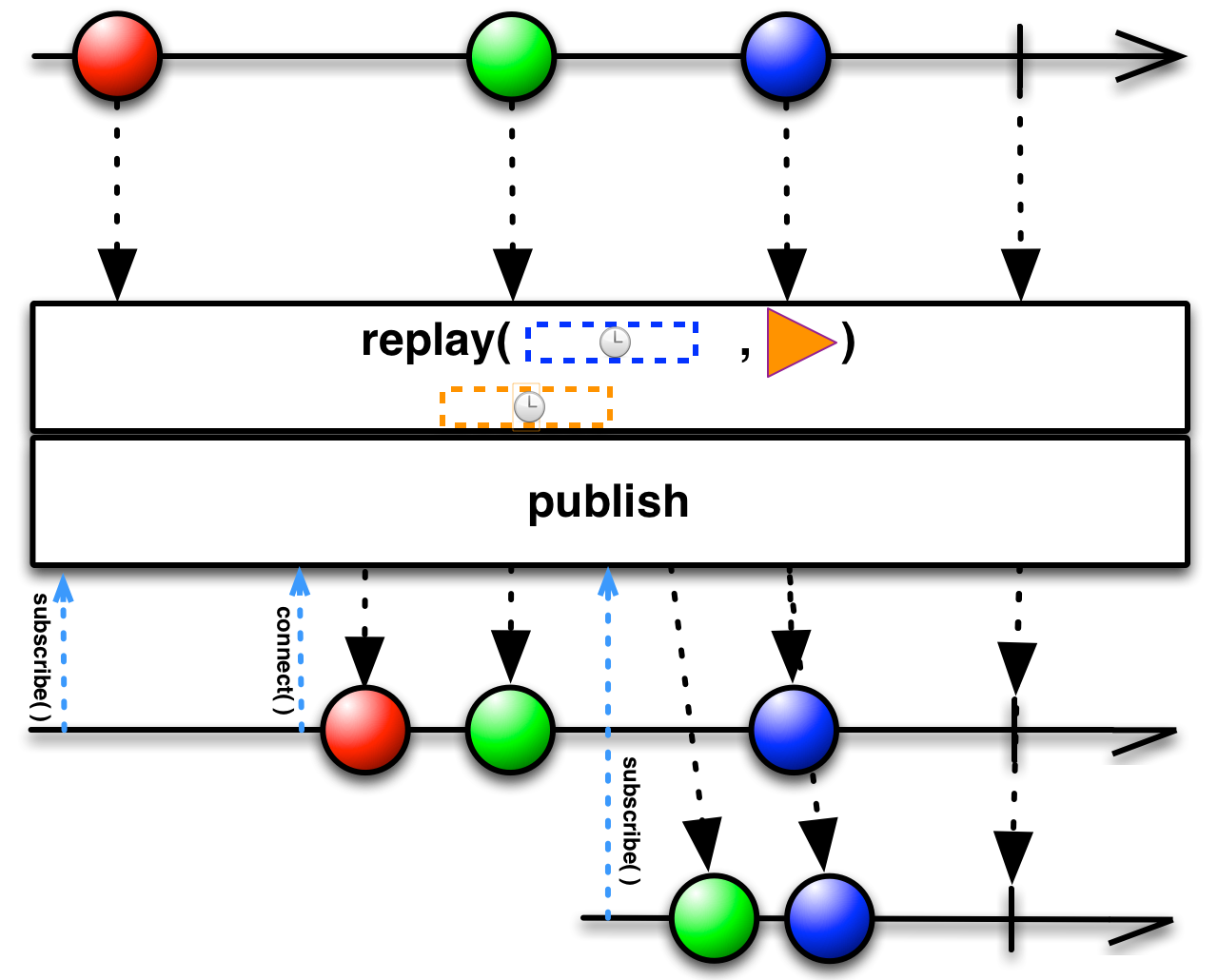
- Scheduler:
- You specify which
Schedulerthis operator will use
Parameters
| time | the duration of the window in which the replayed items must have been emitted |
|---|---|
| unit | the time unit of time |
| scheduler | the Scheduler that is the time source for the window |
Returns
- a
ConnectableObservablethat shares a single subscription to the source ObservableSource and replays the items that were emitted during the window defined bytime
public final Observable<T> retry ()
Returns an Observable that mirrors the source ObservableSource, resubscribing to it if it calls onError
(infinite retry count).
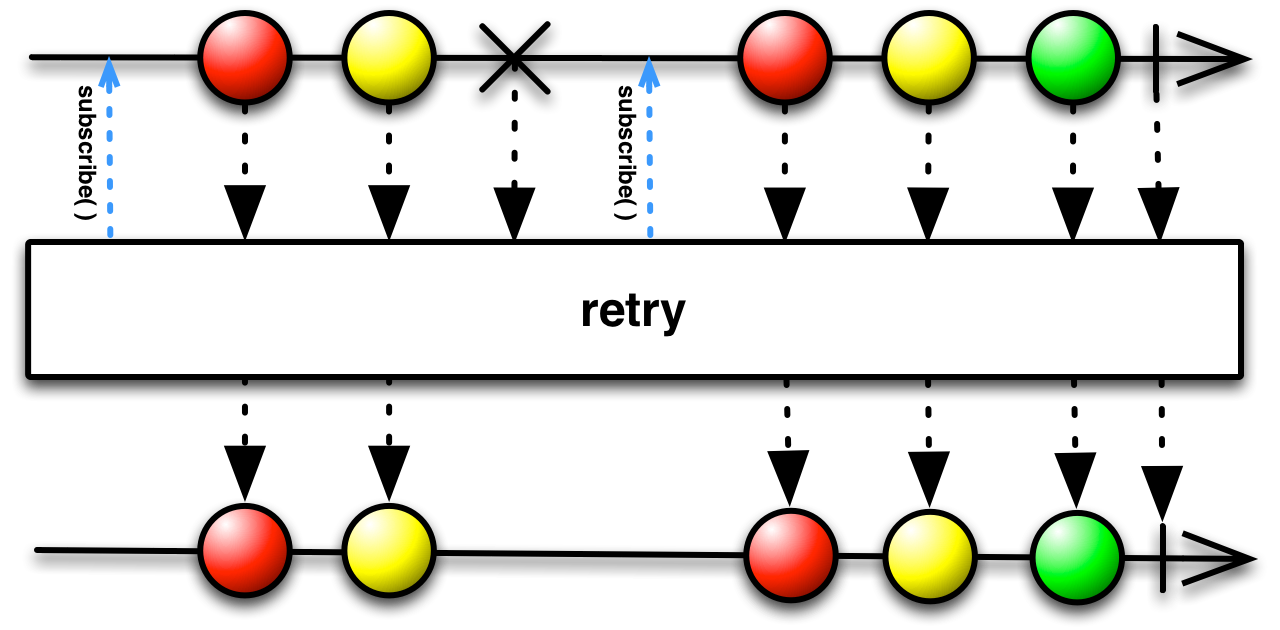
If the source ObservableSource calls onError(Throwable), this method will resubscribe to the source
ObservableSource rather than propagating the onError call.
Any and all items emitted by the source ObservableSource will be emitted by the resulting ObservableSource, even
those emitted during failed subscriptions. For example, if an ObservableSource fails at first but emits
[1, 2] then succeeds the second time and emits [1, 2, 3, 4, 5] then the complete sequence
of emissions and notifications would be [1, 2, 1, 2, 3, 4, 5, onComplete].
- Scheduler:
retrydoes not operate by default on a particularScheduler.
Returns
- the source ObservableSource modified with retry logic
public final Observable<T> retry (long times)
Returns an Observable that mirrors the source ObservableSource, resubscribing to it if it calls onError
up to a specified number of retries.

If the source ObservableSource calls onError(Throwable), this method will resubscribe to the source
ObservableSource for a maximum of count resubscriptions rather than propagating the
onError call.
Any and all items emitted by the source ObservableSource will be emitted by the resulting ObservableSource, even
those emitted during failed subscriptions. For example, if an ObservableSource fails at first but emits
[1, 2] then succeeds the second time and emits [1, 2, 3, 4, 5] then the complete sequence
of emissions and notifications would be [1, 2, 1, 2, 3, 4, 5, onComplete].
- Scheduler:
retrydoes not operate by default on a particularScheduler.
Parameters
| times | number of retry attempts before failing |
|---|
Returns
- the source ObservableSource modified with retry logic
public final Observable<T> retry (long times, Predicate<? super Throwable> predicate)
Retries at most times or until the predicate returns false, whichever happens first.

- Scheduler:
retrydoes not operate by default on a particularScheduler.
Parameters
| times | the number of times to repeat |
|---|---|
| predicate | the predicate called with the failure Throwable and should return true to trigger a retry. |
Returns
- the new Observable instance
public final Observable<T> retry (BiPredicate<? super Integer, ? super Throwable> predicate)
Returns an Observable that mirrors the source ObservableSource, resubscribing to it if it calls onError
and the predicate returns true for that specific exception and retry count.

- Scheduler:
retrydoes not operate by default on a particularScheduler.
Parameters
| predicate | the predicate that determines if a resubscription may happen in case of a specific exception and retry count |
|---|
Returns
- the source ObservableSource modified with retry logic
public final Observable<T> retry (Predicate<? super Throwable> predicate)
Retries the current Observable if the predicate returns true.

- Scheduler:
retrydoes not operate by default on a particularScheduler.
Parameters
| predicate | the predicate that receives the failure Throwable and should return true to trigger a retry. |
|---|
Returns
- the new Observable instance
public final Observable<T> retryUntil (BooleanSupplier stop)
Retries until the given stop function returns true.
 *
*
- Scheduler:
retryUntildoes not operate by default on a particularScheduler.
Parameters
| stop | the function that should return true to stop retrying |
|---|
Returns
- the new Observable instance
public final Observable<T> retryWhen (Function<? super Observable<Throwable>, ? extends ObservableSource<?>> handler)
Returns an Observable that emits the same values as the source ObservableSource with the exception of an
onError. An onError notification from the source will result in the emission of a
Throwable item to the ObservableSource provided as an argument to the notificationHandler
function. If that ObservableSource calls onComplete or onError then retry will call
onComplete or onError on the child subscription. Otherwise, this ObservableSource will
resubscribe to the source ObservableSource.
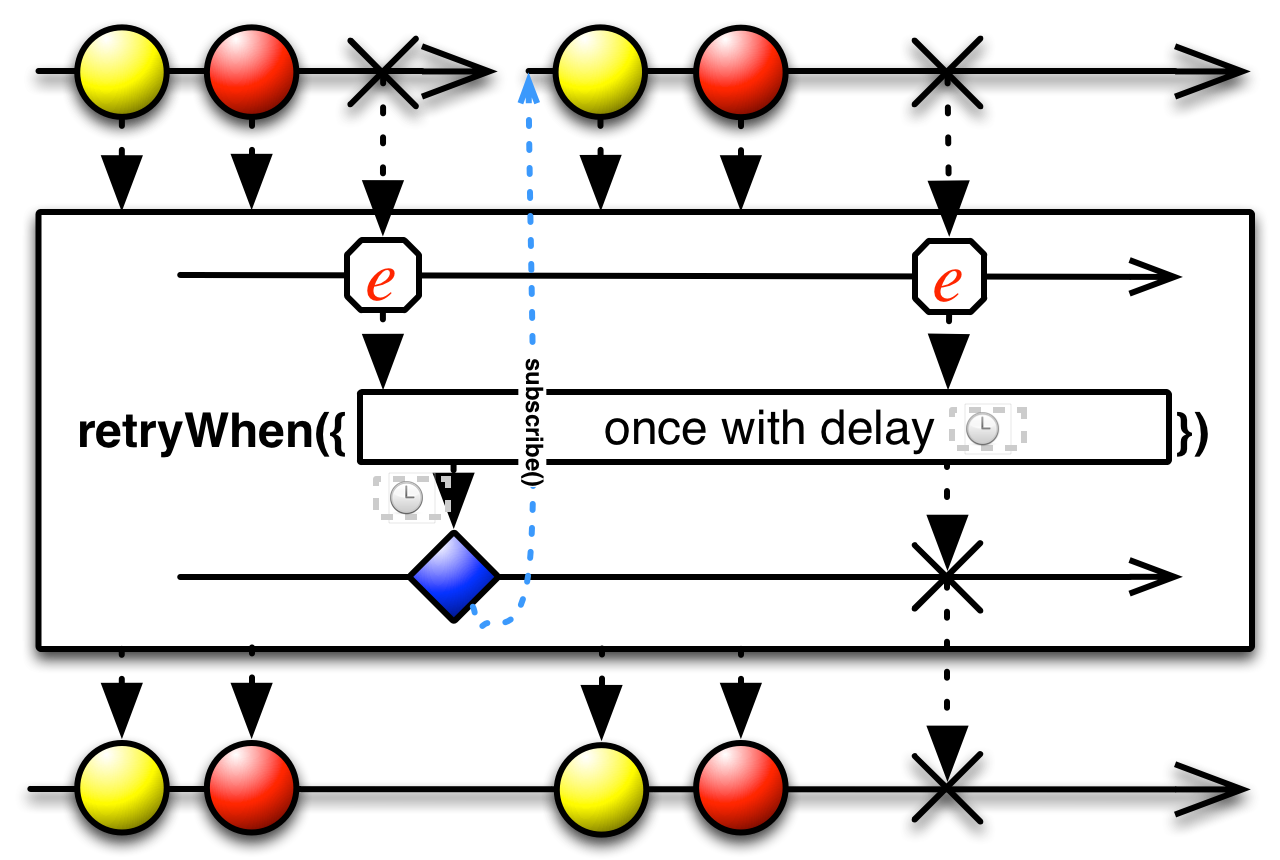 Example:
This retries 3 times, each time incrementing the number of seconds it waits.
Example:
This retries 3 times, each time incrementing the number of seconds it waits.
ObservableSource.create((Observer<? super String> s) -> {
System.out.println("subscribing");
s.onError(new RuntimeException("always fails"));
}).retryWhen(attempts -> {
return attempts.zipWith(Observable.range(1, 3), (n, i) -> i).flatMap(i -> {
System.out.println("delay retry by " + i + " second(s)");
return ObservableSource.timer(i, TimeUnit.SECONDS);
});
}).blockingForEach(System.out::println);
subscribing
delay retry by 1 second(s)
subscribing
delay retry by 2 second(s)
subscribing
delay retry by 3 second(s)
subscribing
- Scheduler:
retryWhendoes not operate by default on a particularScheduler.
Parameters
| handler | receives an ObservableSource of notifications with which a user can complete or error, aborting the retry |
|---|
Returns
- the source ObservableSource modified with retry logic
public final void safeSubscribe (Observer<? super T> s)
Subscribes to the current Observable and wraps the given Observer into a SafeObserver (if not already a SafeObserver) that deals with exceptions thrown by a misbehaving Observer (that doesn't follow the Reactive-Streams specification).
- Scheduler:
safeSubscribedoes not operate by default on a particularScheduler.
Parameters
| s | the incoming Observer instance |
|---|
Throws
| NullPointerException | if s is null |
|---|
public final Observable<T> sample (long period, TimeUnit unit, Scheduler scheduler)
Returns an Observable that emits the most recently emitted item (if any) emitted by the source ObservableSource within periodic time intervals, where the intervals are defined on a particular Scheduler.
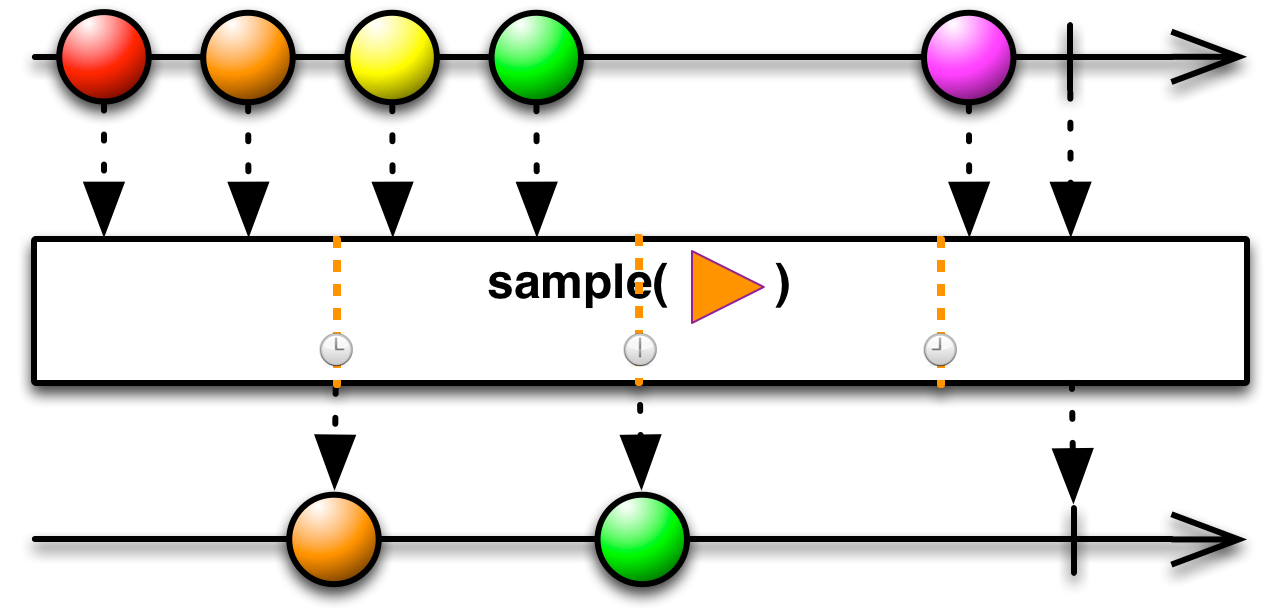
- Scheduler:
- You specify which
Schedulerthis operator will use
Parameters
| period | the sampling rate |
|---|---|
| unit | the TimeUnit in which period is defined |
| scheduler | the Scheduler to use when sampling |
Returns
- an Observable that emits the results of sampling the items emitted by the source ObservableSource at the specified time interval
public final Observable<T> sample (long period, TimeUnit unit)
Returns an Observable that emits the most recently emitted item (if any) emitted by the source ObservableSource within periodic time intervals.

- Scheduler:
sampleoperates by default on thecomputationScheduler.
Parameters
| period | the sampling rate |
|---|---|
| unit | the TimeUnit in which period is defined |
Returns
- an Observable that emits the results of sampling the items emitted by the source ObservableSource at the specified time interval
public final Observable<T> sample (ObservableSource<U> sampler)
Returns an Observable that, when the specified sampler ObservableSource emits an item or completes,
emits the most recently emitted item (if any) emitted by the source ObservableSource since the previous
emission from the sampler ObservableSource.
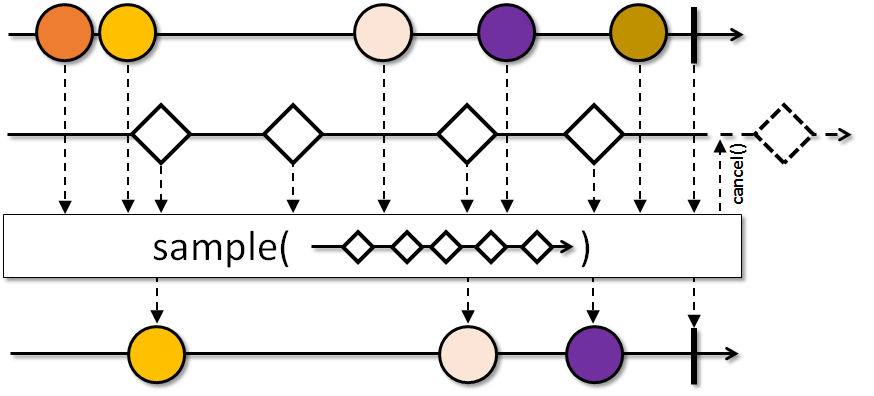
- Scheduler:
- This version of
sampledoes not operate by default on a particularScheduler.
Parameters
| sampler | the ObservableSource to use for sampling the source ObservableSource |
|---|
Returns
- an Observable that emits the results of sampling the items emitted by this ObservableSource whenever
the
samplerObservableSource emits an item or completes
public final Observable<T> sample (long period, TimeUnit unit, boolean emitLast)
Returns an Observable that emits the most recently emitted item (if any) emitted by the source ObservableSource within periodic time intervals and optionally emit the very last upstream item when the upstream completes.
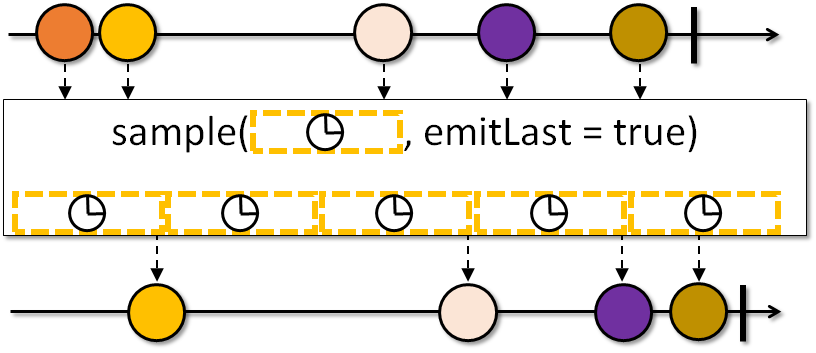
- Scheduler:
sampleoperates by default on thecomputationScheduler.
History: 2.0.5 - experimental
Parameters
| period | the sampling rate |
|---|---|
| unit | the TimeUnit in which period is defined |
| emitLast | if true and the upstream completes while there is still an unsampled item available, that item is emitted to downstream before completion if false, an unsampled last item is ignored. |
Returns
- an Observable that emits the results of sampling the items emitted by the source ObservableSource at the specified time interval
public final Observable<T> sample (long period, TimeUnit unit, Scheduler scheduler, boolean emitLast)
Returns an Observable that emits the most recently emitted item (if any) emitted by the source ObservableSource within periodic time intervals, where the intervals are defined on a particular Scheduler and optionally emit the very last upstream item when the upstream completes.
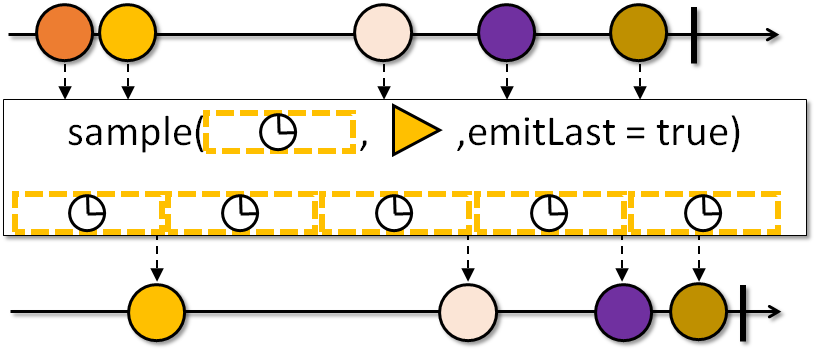
- Scheduler:
- You specify which
Schedulerthis operator will use
History: 2.0.5 - experimental
Parameters
| period | the sampling rate |
|---|---|
| unit | the TimeUnit in which period is defined |
| scheduler | the Scheduler to use when sampling |
| emitLast | if true and the upstream completes while there is still an unsampled item available, that item is emitted to downstream before completion if false, an unsampled last item is ignored. |
Returns
- an Observable that emits the results of sampling the items emitted by the source ObservableSource at the specified time interval
public final Observable<T> sample (ObservableSource<U> sampler, boolean emitLast)
Returns an Observable that, when the specified sampler ObservableSource emits an item or completes,
emits the most recently emitted item (if any) emitted by the source ObservableSource since the previous
emission from the sampler ObservableSource
and optionally emit the very last upstream item when the upstream or other ObservableSource complete.
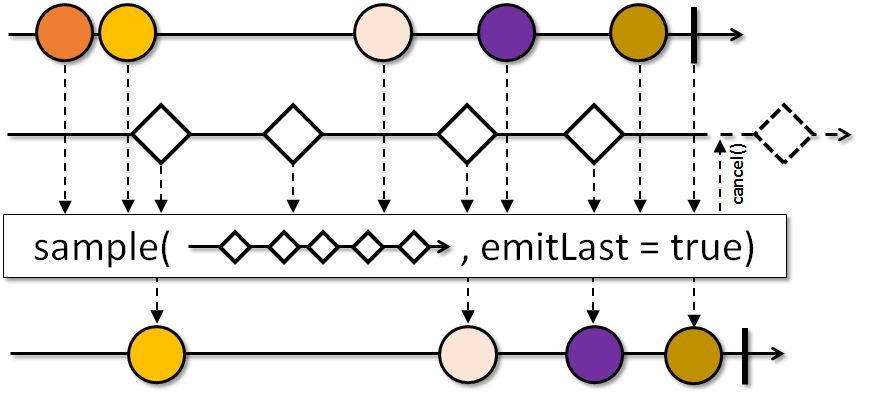
- Scheduler:
- This version of
sampledoes not operate by default on a particularScheduler.
History: 2.0.5 - experimental
Parameters
| sampler | the ObservableSource to use for sampling the source ObservableSource |
|---|---|
| emitLast | if true and the upstream completes while there is still an unsampled item available, that item is emitted to downstream before completion if false, an unsampled last item is ignored. |
Returns
- an Observable that emits the results of sampling the items emitted by this ObservableSource whenever
the
samplerObservableSource emits an item or completes
public final Observable<R> scan (R initialValue, BiFunction<R, ? super T, R> accumulator)
Returns an Observable that applies a specified accumulator function to the first item emitted by a source ObservableSource and a seed value, then feeds the result of that function along with the second item emitted by the source ObservableSource into the same function, and so on until all items have been emitted by the source ObservableSource, emitting the result of each of these iterations.
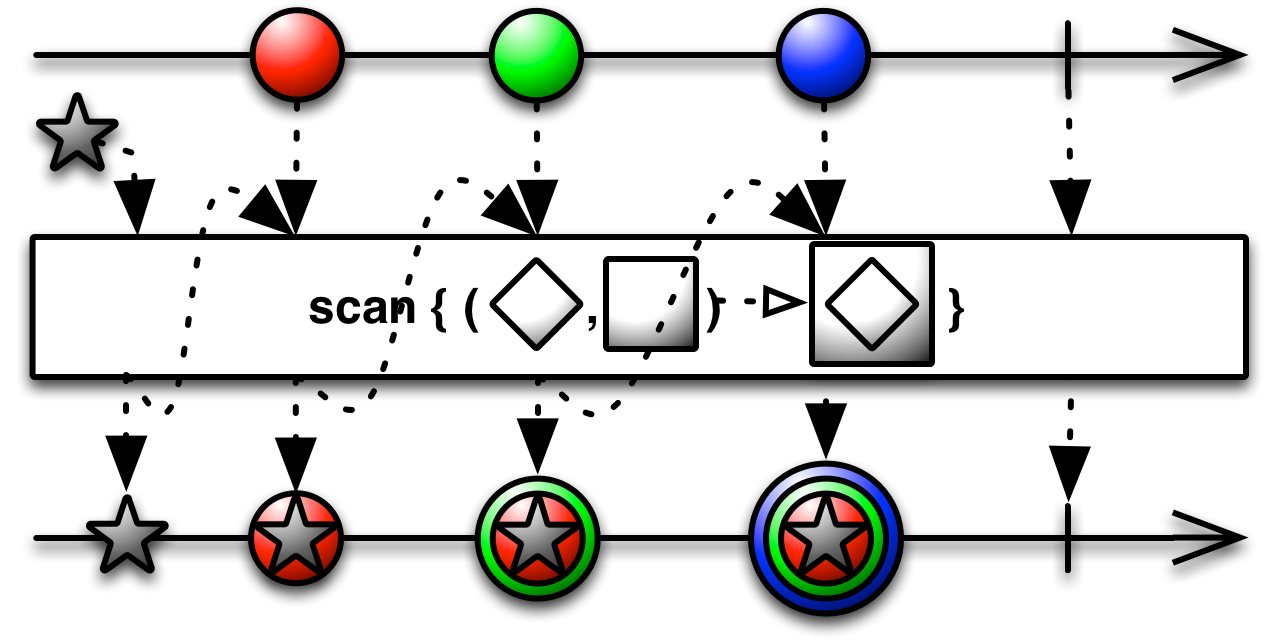
This sort of function is sometimes called an accumulator.
Note that the ObservableSource that results from this method will emit initialValue as its first
emitted item.
Note that the initialValue is shared among all subscribers to the resulting ObservableSource
and may cause problems if it is mutable. To make sure each subscriber gets its own value, defer
the application of this operator via defer(Callable):
ObservableSource<T> source = ...
Observable.defer(() -> source.scan(new ArrayList<>(), (list, item) -> list.add(item)));
// alternatively, by using compose to stay fluent
source.compose(o ->
Observable.defer(() -> o.scan(new ArrayList<>(), (list, item) -> list.add(item)))
);
- Scheduler:
scandoes not operate by default on a particularScheduler.
Parameters
| initialValue | the initial (seed) accumulator item |
|---|---|
| accumulator | an accumulator function to be invoked on each item emitted by the source ObservableSource, whose
result will be emitted to Observers via onNext and used in the
next accumulator call |
Returns
- an Observable that emits
initialValuefollowed by the results of each call to the accumulator function
public final Observable<T> scan (BiFunction<T, T, T> accumulator)
Returns an Observable that applies a specified accumulator function to the first item emitted by a source ObservableSource, then feeds the result of that function along with the second item emitted by the source ObservableSource into the same function, and so on until all items have been emitted by the source ObservableSource, emitting the result of each of these iterations.

This sort of function is sometimes called an accumulator.
- Scheduler:
scandoes not operate by default on a particularScheduler.
Parameters
| accumulator | an accumulator function to be invoked on each item emitted by the source ObservableSource, whose
result will be emitted to Observers via onNext and used in the
next accumulator call |
|---|
Returns
- an Observable that emits the results of each call to the accumulator function
public final Observable<R> scanWith (Callable<R> seedSupplier, BiFunction<R, ? super T, R> accumulator)
Returns an Observable that applies a specified accumulator function to the first item emitted by a source ObservableSource and a seed value, then feeds the result of that function along with the second item emitted by the source ObservableSource into the same function, and so on until all items have been emitted by the source ObservableSource, emitting the result of each of these iterations.

This sort of function is sometimes called an accumulator.
Note that the ObservableSource that results from this method will emit the value returned
by the seedSupplier as its first item.
- Scheduler:
scanWithdoes not operate by default on a particularScheduler.
Parameters
| seedSupplier | a Callable that returns the initial (seed) accumulator item for each individual Observer |
|---|---|
| accumulator | an accumulator function to be invoked on each item emitted by the source ObservableSource, whose
result will be emitted to Observers via onNext and used in the
next accumulator call |
Returns
- an Observable that emits
initialValuefollowed by the results of each call to the accumulator function
public static Single<Boolean> sequenceEqual (ObservableSource<? extends T> source1, ObservableSource<? extends T> source2, int bufferSize)
Returns a Single that emits a Boolean value that indicates whether two ObservableSource sequences are the same by comparing the items emitted by each ObservableSource pairwise.
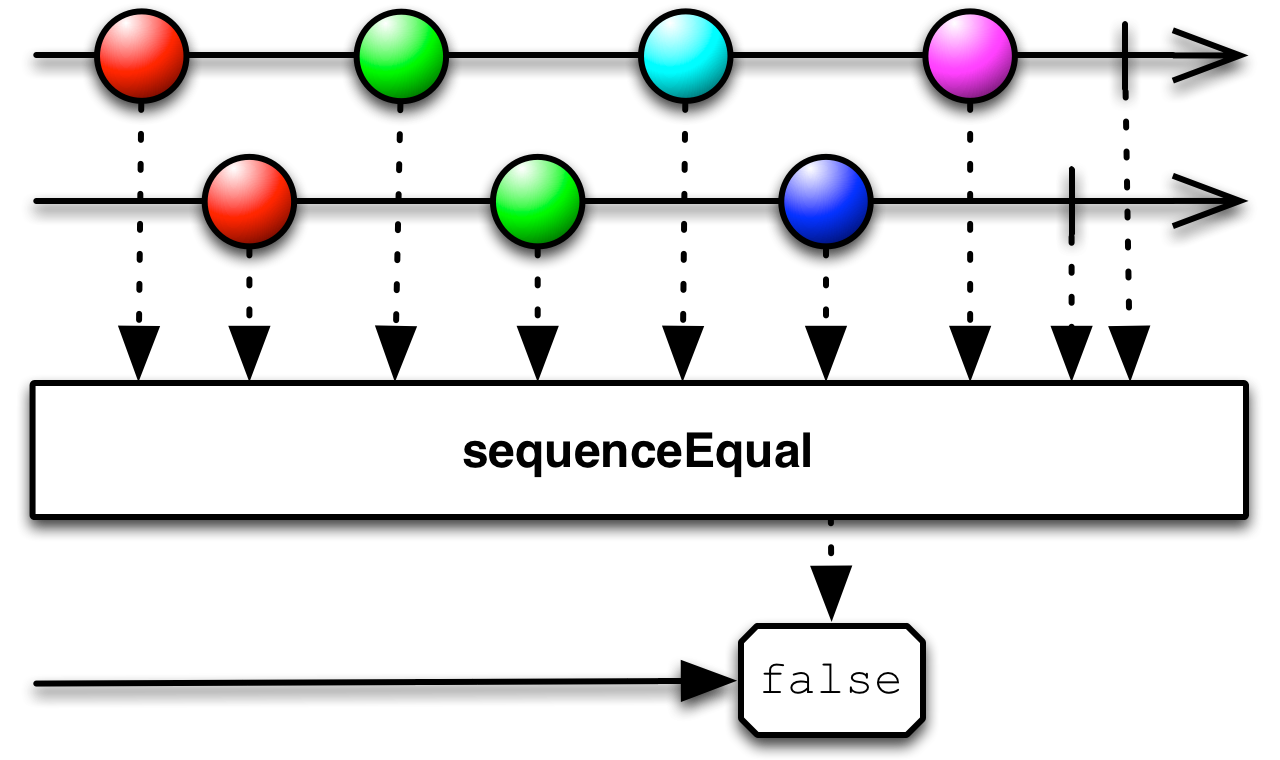
- Scheduler:
sequenceEqualdoes not operate by default on a particularScheduler.
Parameters
| source1 | the first ObservableSource to compare |
|---|---|
| source2 | the second ObservableSource to compare |
| bufferSize | the number of items to prefetch from the first and second source ObservableSource |
Returns
- a Single that emits a Boolean value that indicates whether the two sequences are the same
public static Single<Boolean> sequenceEqual (ObservableSource<? extends T> source1, ObservableSource<? extends T> source2, BiPredicate<? super T, ? super T> isEqual, int bufferSize)
Returns a Single that emits a Boolean value that indicates whether two ObservableSource sequences are the same by comparing the items emitted by each ObservableSource pairwise based on the results of a specified equality function.

- Scheduler:
sequenceEqualdoes not operate by default on a particularScheduler.
Parameters
| source1 | the first ObservableSource to compare |
|---|---|
| source2 | the second ObservableSource to compare |
| isEqual | a function used to compare items emitted by each ObservableSource |
| bufferSize | the number of items to prefetch from the first and second source ObservableSource |
Returns
- an Observable that emits a Boolean value that indicates whether the two ObservableSource two sequences are the same according to the specified function
public static Single<Boolean> sequenceEqual (ObservableSource<? extends T> source1, ObservableSource<? extends T> source2, BiPredicate<? super T, ? super T> isEqual)
Returns a Single that emits a Boolean value that indicates whether two ObservableSource sequences are the same by comparing the items emitted by each ObservableSource pairwise based on the results of a specified equality function.

- Scheduler:
sequenceEqualdoes not operate by default on a particularScheduler.
Parameters
| source1 | the first ObservableSource to compare |
|---|---|
| source2 | the second ObservableSource to compare |
| isEqual | a function used to compare items emitted by each ObservableSource |
Returns
- a Single that emits a Boolean value that indicates whether the two ObservableSource two sequences are the same according to the specified function
public static Single<Boolean> sequenceEqual (ObservableSource<? extends T> source1, ObservableSource<? extends T> source2)
Returns a Single that emits a Boolean value that indicates whether two ObservableSource sequences are the same by comparing the items emitted by each ObservableSource pairwise.

- Scheduler:
sequenceEqualdoes not operate by default on a particularScheduler.
Parameters
| source1 | the first ObservableSource to compare |
|---|---|
| source2 | the second ObservableSource to compare |
Returns
- a Single that emits a Boolean value that indicates whether the two sequences are the same
public final Observable<T> serialize ()
Forces an ObservableSource's emissions and notifications to be serialized and for it to obey the ObservableSource contract in other ways.
It is possible for an ObservableSource to invoke its Observers' methods asynchronously, perhaps from
different threads. This could make such an ObservableSource poorly-behaved, in that it might try to invoke
onComplete or onError before one of its onNext invocations, or it might call
onNext from two different threads concurrently. You can force such an ObservableSource to be
well-behaved and sequential by applying the serialize method to it.
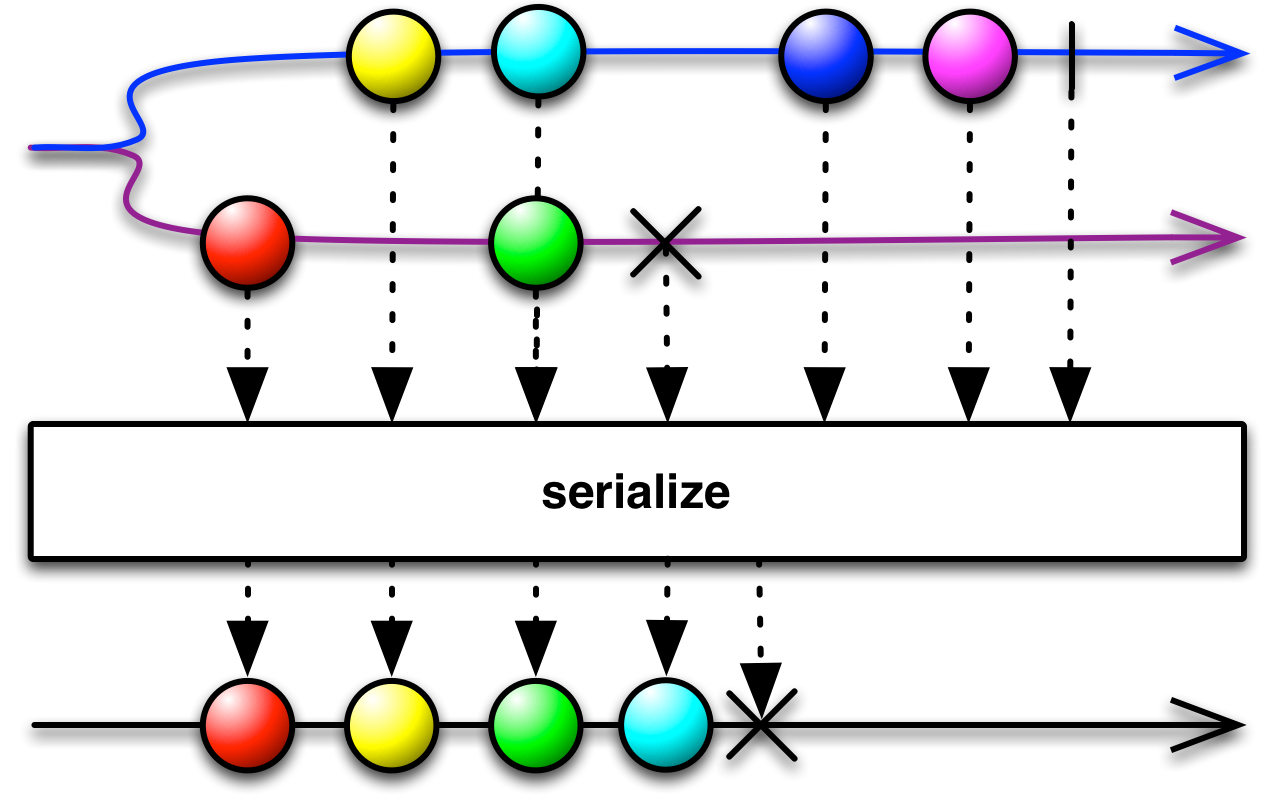
- Scheduler:
serializedoes not operate by default on a particularScheduler.
Returns
- an
ObservableSourcethat is guaranteed to be well-behaved and to make only serialized calls to its observers
public final Observable<T> share ()
Returns a new ObservableSource that multicasts (shares) the original ObservableSource. As long as
there is at least one Observer this ObservableSource will be subscribed and emitting data.
When all subscribers have disposed it will dispose the source ObservableSource.
This is an alias for publish().refCount().
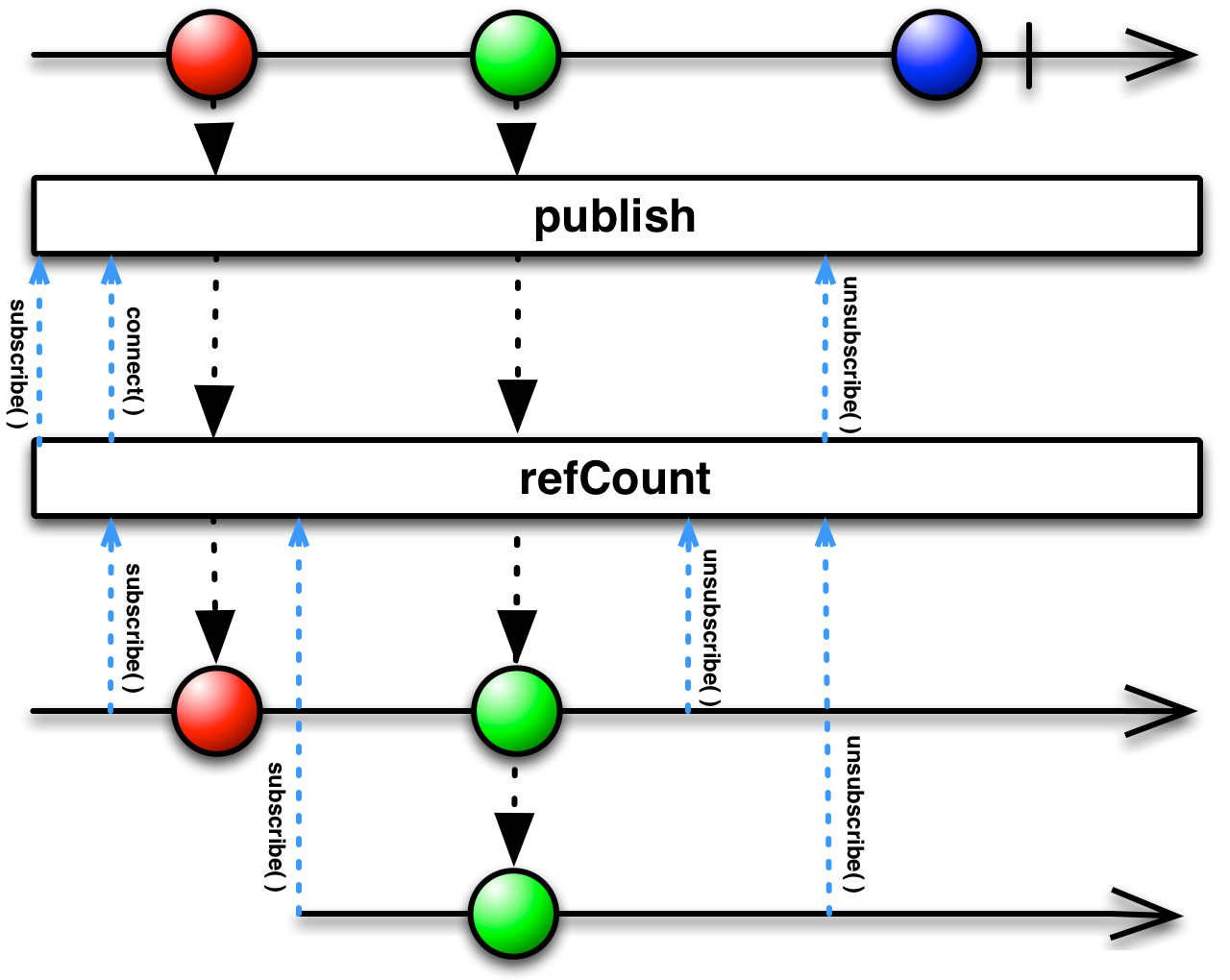
- Scheduler:
sharedoes not operate by default on a particularScheduler.
Returns
- an
ObservableSourcethat upon connection causes the sourceObservableSourceto emit items to itsObservers
public final Single<T> single (T defaultItem)
Returns a Single that emits the single item emitted by this Observable, if this Observable
emits only a single item, or a default item if the source ObservableSource emits no items. If the source
ObservableSource emits more than one item, an IllegalArgumentException is signalled instead.
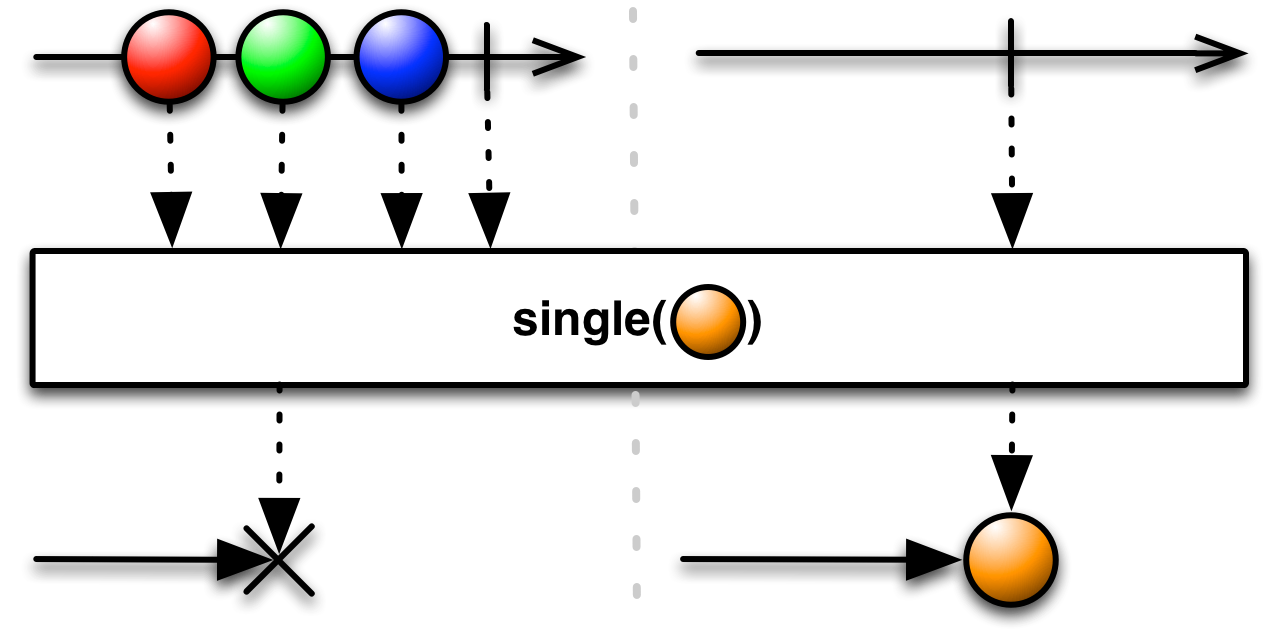
- Scheduler:
singledoes not operate by default on a particularScheduler.
Parameters
| defaultItem | a default value to emit if the source ObservableSource emits no item |
|---|
Returns
- the new Single instance
public final Maybe<T> singleElement ()
Returns a Maybe that emits the single item emitted by this Observable if this Observable
emits only a single item, otherwise if this Observable emits more than one item or no items, an
IllegalArgumentException or NoSuchElementException is signalled respectively.
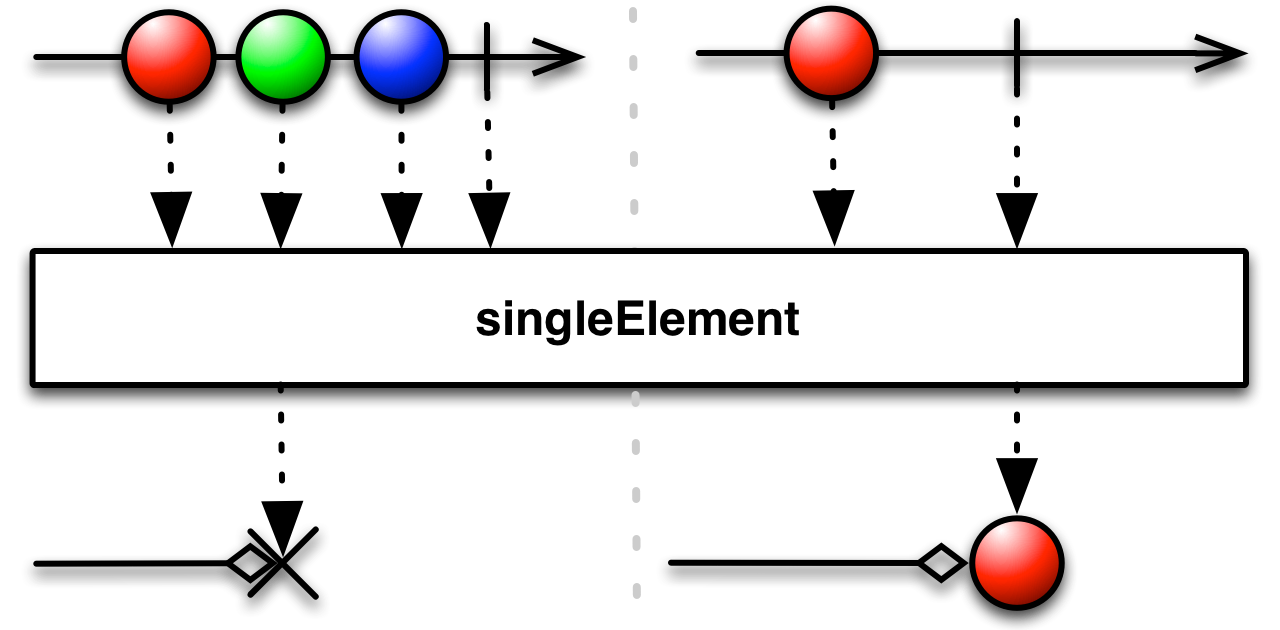
- Scheduler:
singleElementdoes not operate by default on a particularScheduler.
Returns
- a
Maybethat emits the single item emitted by the source ObservableSource
public final Single<T> singleOrError ()
Returns a Single that emits the single item emitted by this Observable if this Observable
emits only a single item, otherwise
if this Observable completes without emitting any items or emits more than one item a
NoSuchElementException or IllegalArgumentException will be signalled respectively.

- Scheduler:
singleOrErrordoes not operate by default on a particularScheduler.
Returns
- the new Single instance
public final Observable<T> skip (long count)
Returns an Observable that skips the first count items emitted by the source ObservableSource and emits
the remainder.

- Scheduler:
- This version of
skipdoes not operate by default on a particularScheduler.
Parameters
| count | the number of items to skip |
|---|
Returns
- an Observable that is identical to the source ObservableSource except that it does not emit the first
countitems that the source ObservableSource emits
public final Observable<T> skip (long time, TimeUnit unit, Scheduler scheduler)
Returns an Observable that skips values emitted by the source ObservableSource before a specified time window
on a specified Scheduler elapses.
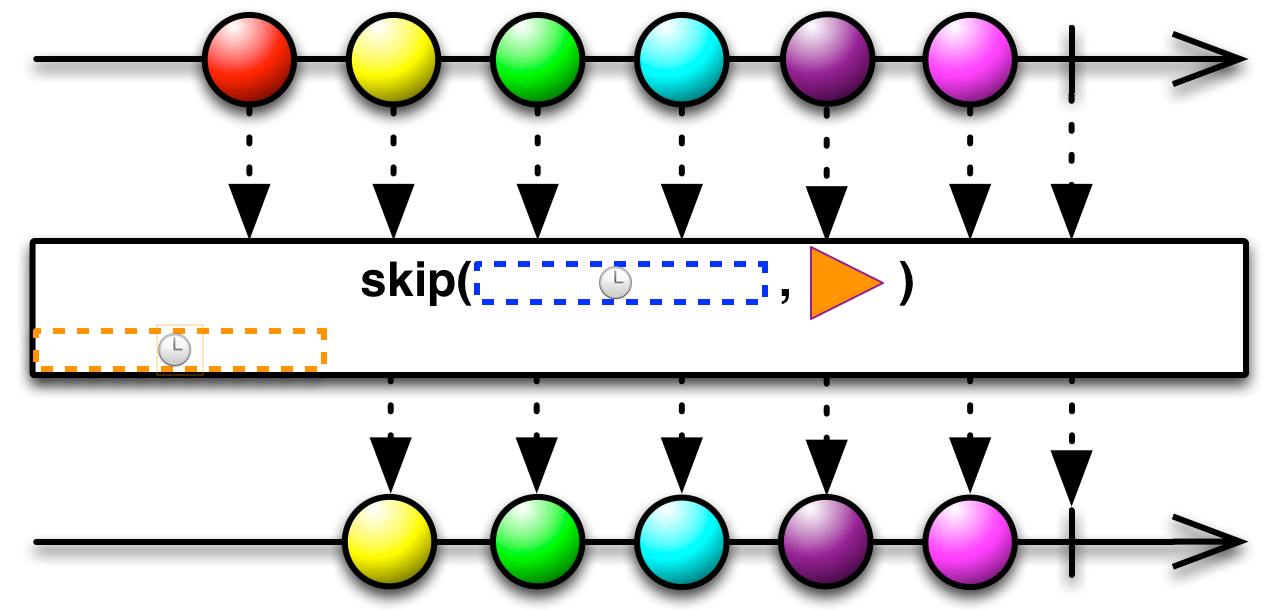
- Scheduler:
- You specify which
Schedulerthis operator will use for the timed skipping
Parameters
| time | the length of the time window to skip |
|---|---|
| unit | the time unit of time |
| scheduler | the Scheduler on which the timed wait happens |
Returns
- an Observable that skips values emitted by the source ObservableSource before the time window defined
by
timeandschedulerelapses, and then emits the remainder
public final Observable<T> skip (long time, TimeUnit unit)
Returns an Observable that skips values emitted by the source ObservableSource before a specified time window elapses.
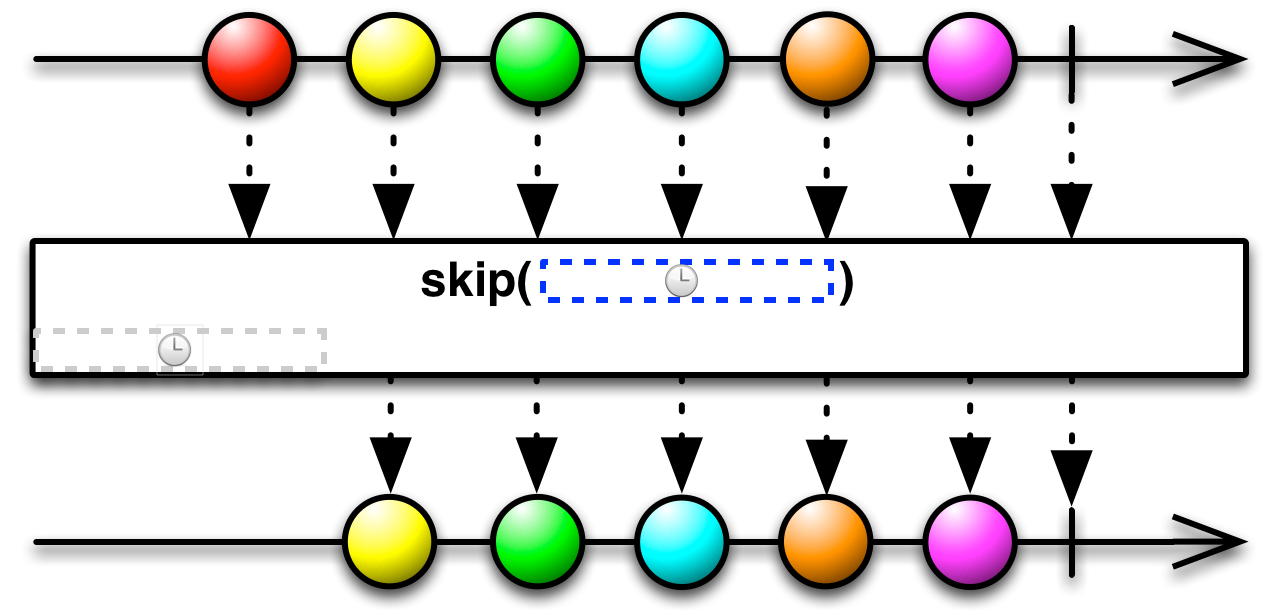
- Scheduler:
skipdoes not operate on any particular scheduler but uses the current time from thecomputationScheduler.
Parameters
| time | the length of the time window to skip |
|---|---|
| unit | the time unit of time |
Returns
- an Observable that skips values emitted by the source ObservableSource before the time window defined
by
timeelapses and the emits the remainder
public final Observable<T> skipLast (int count)
Returns an Observable that drops a specified number of items from the end of the sequence emitted by the source ObservableSource.
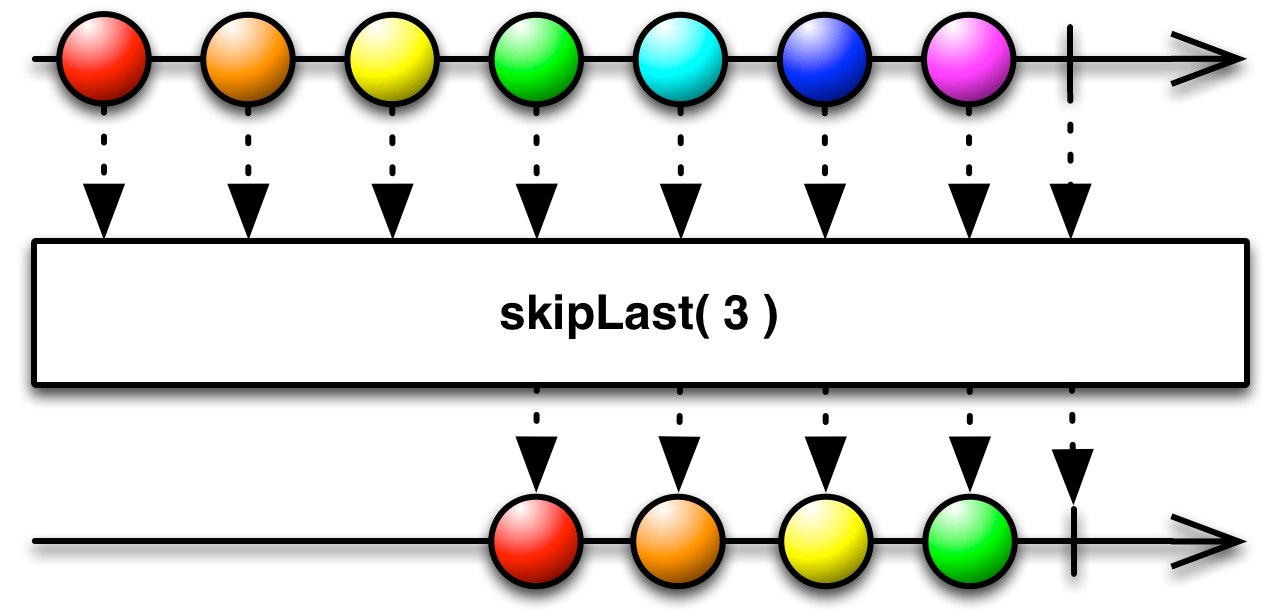
This Observer accumulates a queue long enough to store the first count items. As more items are
received, items are taken from the front of the queue and emitted by the returned ObservableSource. This causes
such items to be delayed.
- Scheduler:
- This version of
skipLastdoes not operate by default on a particularScheduler.
Parameters
| count | number of items to drop from the end of the source sequence |
|---|
Returns
- an Observable that emits the items emitted by the source ObservableSource except for the dropped ones at the end
Throws
| IndexOutOfBoundsException | if count is less than zero |
|---|
public final Observable<T> skipLast (long time, TimeUnit unit)
Returns an Observable that drops items emitted by the source ObservableSource during a specified time window before the source completes.
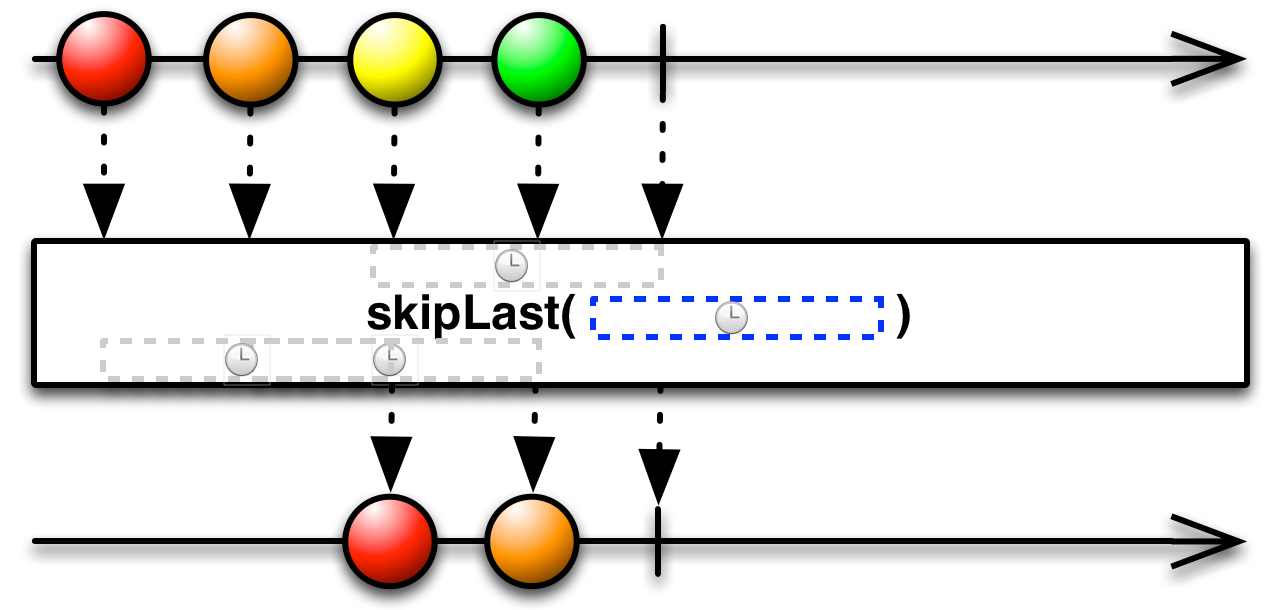
Note: this action will cache the latest items arriving in the specified time window.
- Scheduler:
skipLastdoes not operate on any particular scheduler but uses the current time from thecomputationScheduler.
Parameters
| time | the length of the time window |
|---|---|
| unit | the time unit of time |
Returns
- an Observable that drops those items emitted by the source ObservableSource in a time window before the
source completes defined by
time
public final Observable<T> skipLast (long time, TimeUnit unit, boolean delayError)
Returns an Observable that drops items emitted by the source ObservableSource during a specified time window before the source completes.

Note: this action will cache the latest items arriving in the specified time window.
- Scheduler:
skipLastdoes not operate on any particular scheduler but uses the current time from thecomputationScheduler.
Parameters
| time | the length of the time window |
|---|---|
| unit | the time unit of time |
| delayError | if true, an exception signalled by the current Observable is delayed until the regular elements are consumed by the downstream; if false, an exception is immediately signalled and all regular elements dropped |
Returns
- an Observable that drops those items emitted by the source ObservableSource in a time window before the
source completes defined by
time
public final Observable<T> skipLast (long time, TimeUnit unit, Scheduler scheduler)
Returns an Observable that drops items emitted by the source ObservableSource during a specified time window (defined on a specified scheduler) before the source completes.
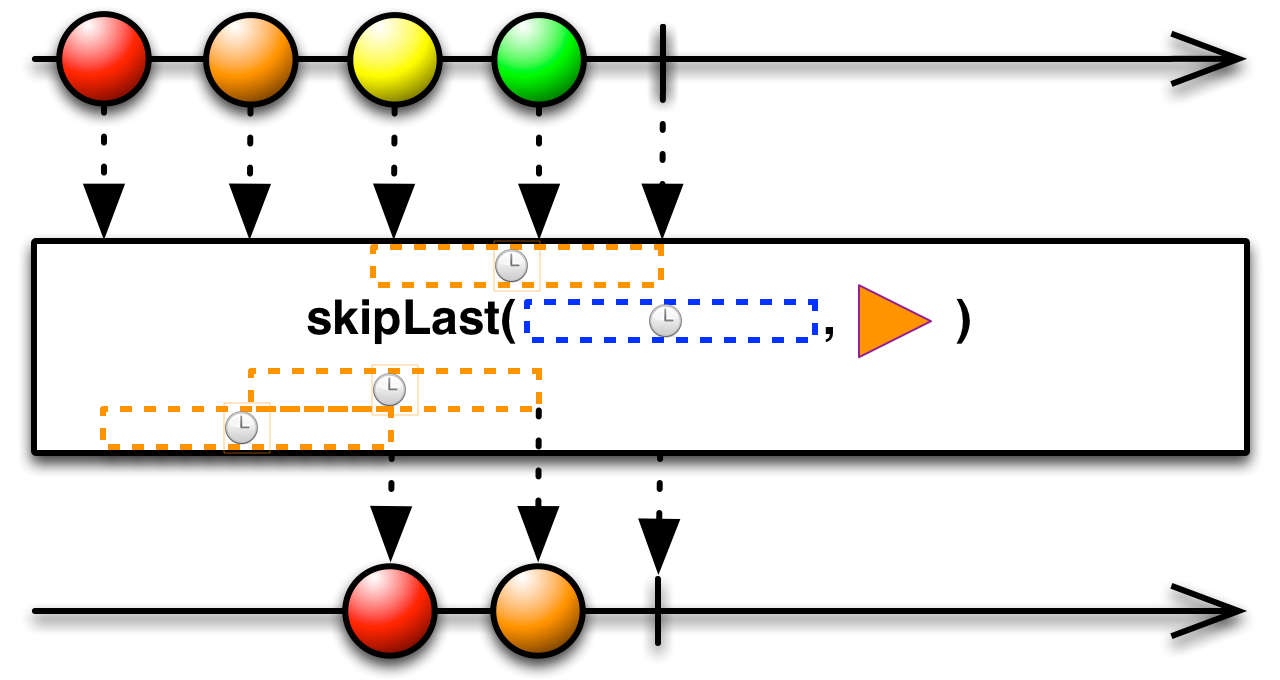
Note: this action will cache the latest items arriving in the specified time window.
- Scheduler:
- You specify which
Schedulerthis operator will use for tracking the current time
Parameters
| time | the length of the time window |
|---|---|
| unit | the time unit of time |
| scheduler | the scheduler used as the time source |
Returns
- an Observable that drops those items emitted by the source ObservableSource in a time window before the
source completes defined by
timeandscheduler
public final Observable<T> skipLast (long time, TimeUnit unit, Scheduler scheduler, boolean delayError, int bufferSize)
Returns an Observable that drops items emitted by the source ObservableSource during a specified time window (defined on a specified scheduler) before the source completes.

Note: this action will cache the latest items arriving in the specified time window.
- Scheduler:
- You specify which
Schedulerthis operator will use
Parameters
| time | the length of the time window |
|---|---|
| unit | the time unit of time |
| scheduler | the scheduler used as the time source |
| delayError | if true, an exception signalled by the current Observable is delayed until the regular elements are consumed by the downstream; if false, an exception is immediately signalled and all regular elements dropped |
| bufferSize | the hint about how many elements to expect to be skipped |
Returns
- an Observable that drops those items emitted by the source ObservableSource in a time window before the
source completes defined by
timeandscheduler
public final Observable<T> skipLast (long time, TimeUnit unit, Scheduler scheduler, boolean delayError)
Returns an Observable that drops items emitted by the source ObservableSource during a specified time window (defined on a specified scheduler) before the source completes.

Note: this action will cache the latest items arriving in the specified time window.
- Scheduler:
- You specify which
Schedulerthis operator will use to track the current time
Parameters
| time | the length of the time window |
|---|---|
| unit | the time unit of time |
| scheduler | the scheduler used as the time source |
| delayError | if true, an exception signalled by the current Observable is delayed until the regular elements are consumed by the downstream; if false, an exception is immediately signalled and all regular elements dropped |
Returns
- an Observable that drops those items emitted by the source ObservableSource in a time window before the
source completes defined by
timeandscheduler
public final Observable<T> skipUntil (ObservableSource<U> other)
Returns an Observable that skips items emitted by the source ObservableSource until a second ObservableSource emits an item.
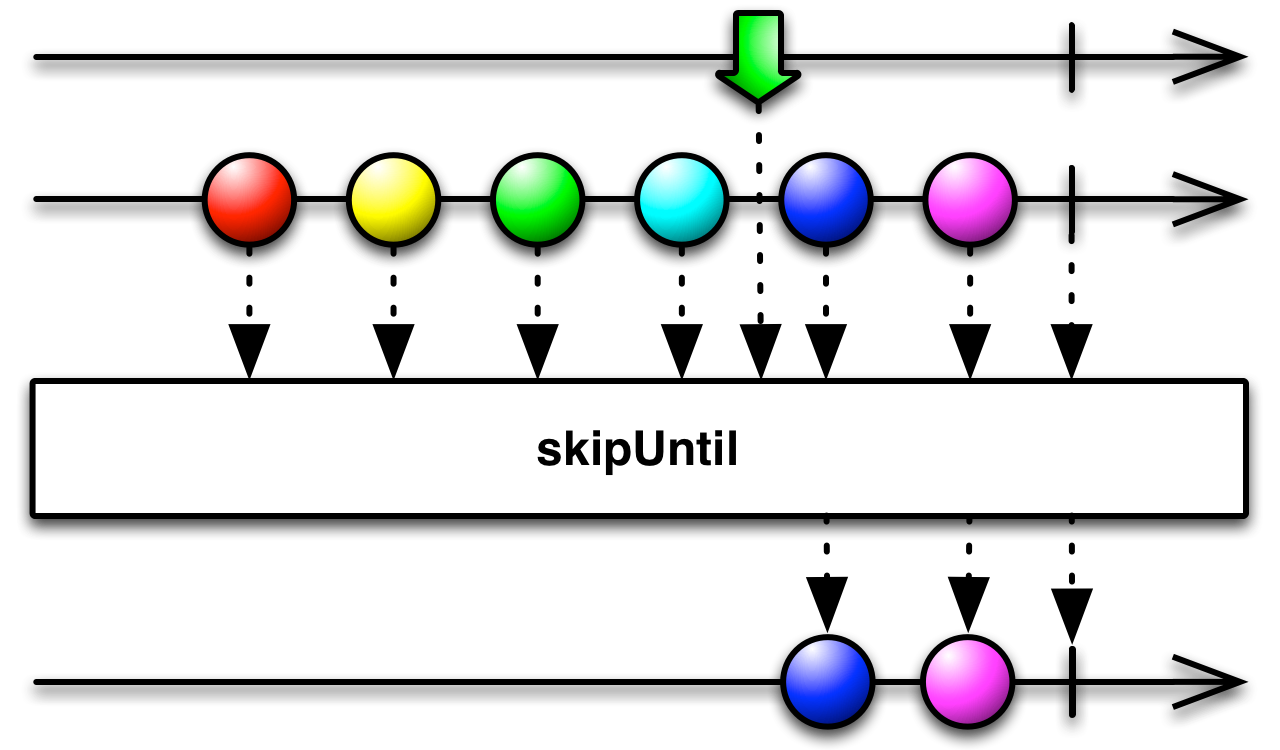
- Scheduler:
skipUntildoes not operate by default on a particularScheduler.
Parameters
| other | the second ObservableSource that has to emit an item before the source ObservableSource's elements begin to be mirrored by the resulting ObservableSource |
|---|
Returns
- an Observable that skips items from the source ObservableSource until the second ObservableSource emits an item, then emits the remaining items
public final Observable<T> skipWhile (Predicate<? super T> predicate)
Returns an Observable that skips all items emitted by the source ObservableSource as long as a specified condition holds true, but emits all further source items as soon as the condition becomes false.
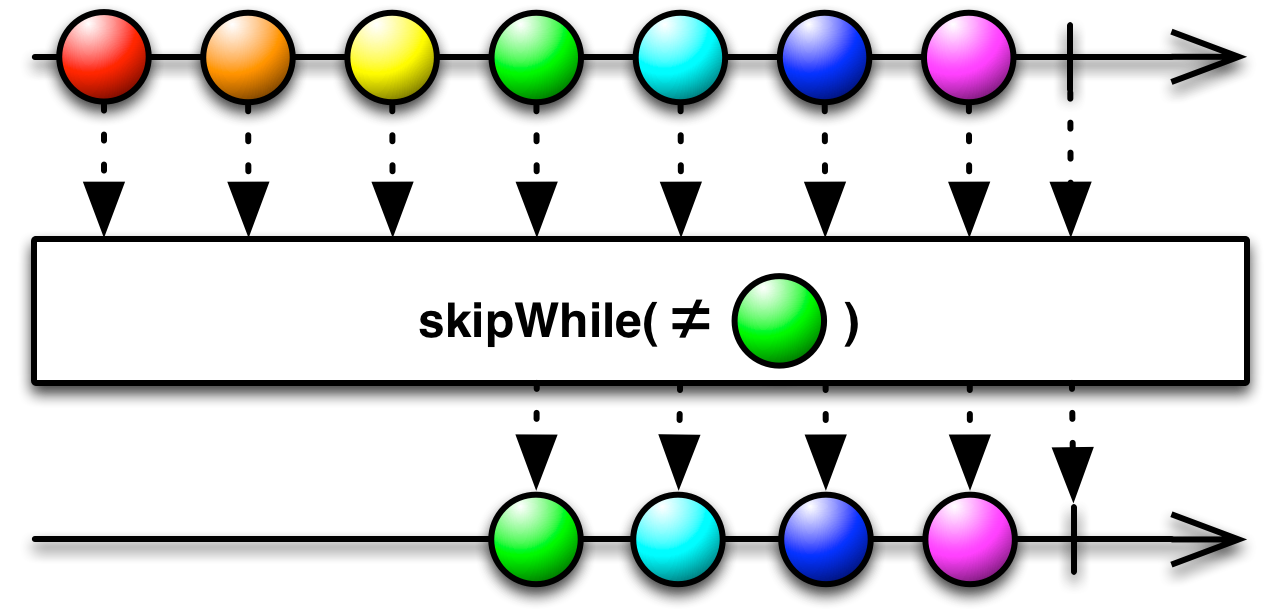
- Scheduler:
skipWhiledoes not operate by default on a particularScheduler.
Parameters
| predicate | a function to test each item emitted from the source ObservableSource |
|---|
Returns
- an Observable that begins emitting items emitted by the source ObservableSource when the specified predicate becomes false
public final Observable<T> sorted ()
Returns an Observable that emits the events emitted by source ObservableSource, in a
sorted order. Each item emitted by the ObservableSource must implement Comparable with respect to all
other items in the sequence.
If any item emitted by this Observable does not implement Comparable with respect to
all other items emitted by this Observable, no items will be emitted and the
sequence is terminated with a ClassCastException.
Note that calling sorted with long, non-terminating or infinite sources
might cause OutOfMemoryError
- Scheduler:
sorteddoes not operate by default on a particularScheduler.
Returns
- an Observable that emits the items emitted by the source ObservableSource in sorted order
public final Observable<T> sorted (Comparator<? super T> sortFunction)
Returns an Observable that emits the events emitted by source ObservableSource, in a sorted order based on a specified comparison function.
Note that calling sorted with long, non-terminating or infinite sources
might cause OutOfMemoryError
- Scheduler:
sorteddoes not operate by default on a particularScheduler.
Parameters
| sortFunction | a function that compares two items emitted by the source ObservableSource and returns an Integer that indicates their sort order |
|---|
Returns
- an Observable that emits the items emitted by the source ObservableSource in sorted order
public final Observable<T> startWith (ObservableSource<? extends T> other)
Returns an Observable that emits the items in a specified ObservableSource before it begins to emit
items emitted by the source ObservableSource.
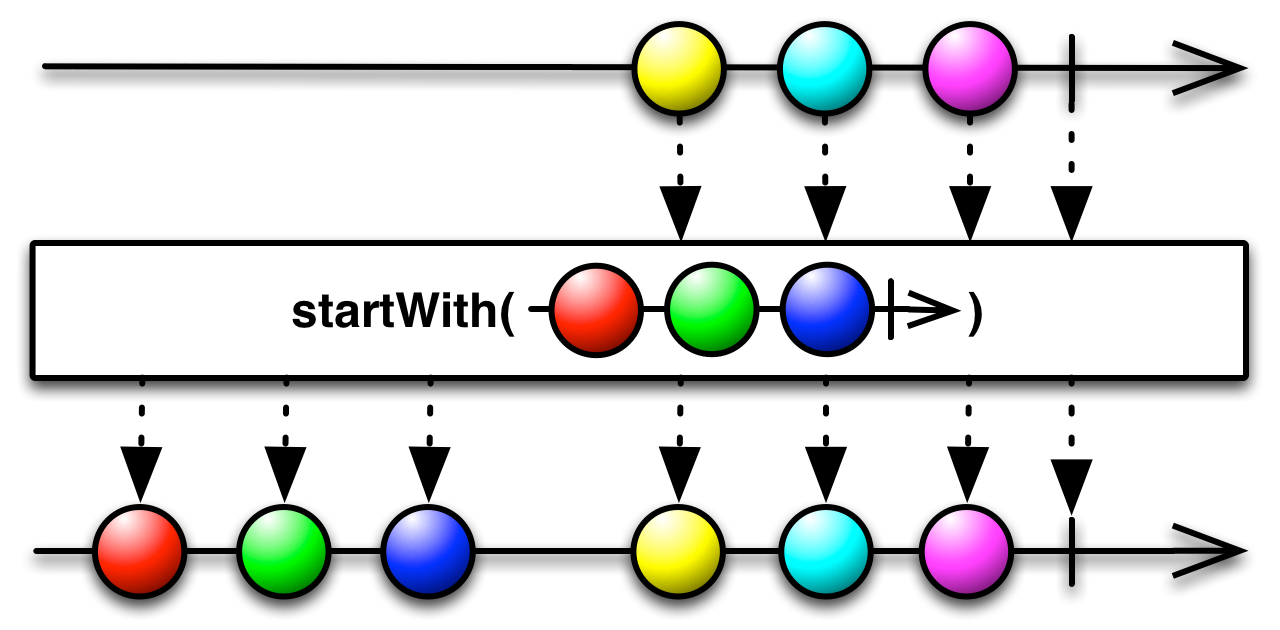
- Scheduler:
startWithdoes not operate by default on a particularScheduler.
Parameters
| other | an ObservableSource that contains the items you want the modified ObservableSource to emit first |
|---|
Returns
- an Observable that emits the items in the specified
ObservableSourceand then emits the items emitted by the source ObservableSource
public final Observable<T> startWith (Iterable<? extends T> items)
Returns an Observable that emits the items in a specified Iterable before it begins to emit items
emitted by the source ObservableSource.
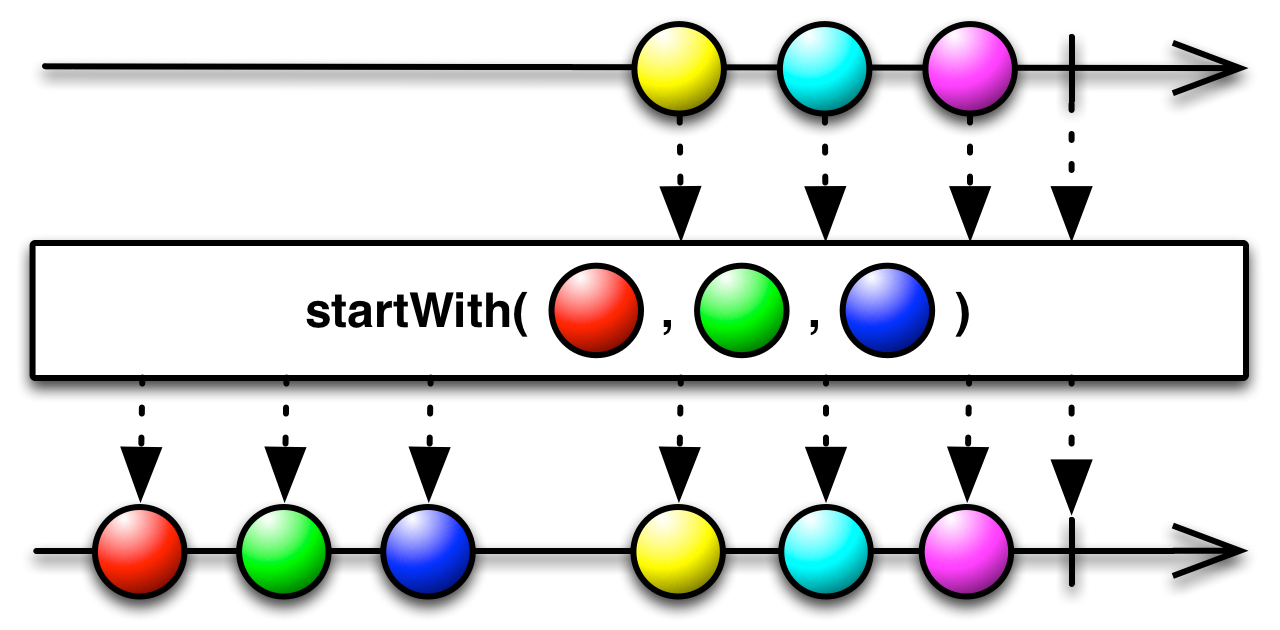
- Scheduler:
startWithdoes not operate by default on a particularScheduler.
Parameters
| items | an Iterable that contains the items you want the modified ObservableSource to emit first |
|---|
Returns
- an Observable that emits the items in the specified
Iterableand then emits the items emitted by the source ObservableSource
public final Observable<T> startWith (T item)
Returns an Observable that emits a specified item before it begins to emit items emitted by the source ObservableSource.

- Scheduler:
startWithdoes not operate by default on a particularScheduler.
Parameters
| item | the item to emit first |
|---|
Returns
- an Observable that emits the specified item before it begins to emit items emitted by the source ObservableSource
public final Observable<T> startWithArray (T... items)
Returns an Observable that emits the specified items before it begins to emit items emitted by the source ObservableSource.

- Scheduler:
startWithArraydoes not operate by default on a particularScheduler.
Parameters
| items | the array of values to emit first |
|---|
Returns
- an Observable that emits the specified items before it begins to emit items emitted by the source ObservableSource
public final Disposable subscribe (Consumer<? super T> onNext, Consumer<? super Throwable> onError, Action onComplete, Consumer<? super Disposable> onSubscribe)
Subscribes to an ObservableSource and provides callbacks to handle the items it emits and any error or completion notification it issues.
- Scheduler:
subscribedoes not operate by default on a particularScheduler.
Parameters
| onNext | the Consumer<T> you have designed to accept emissions from the ObservableSource |
|---|---|
| onError | the Consumer<Throwable> you have designed to accept any error notification from the
ObservableSource |
| onComplete | the Action you have designed to accept a completion notification from the
ObservableSource |
| onSubscribe | the Consumer that receives the upstream's Disposable |
Returns
- a
Disposablereference with which the caller can stop receiving items before the ObservableSource has finished sending them
Throws
| NullPointerException | if onNext is null, or
if onError is null, or
if onComplete is null |
|---|
public final void subscribe (Observer<? super T> observer)
Subscribes the given Observer to this ObservableSource instance.
Parameters
| observer | the Observer, not null |
|---|
public final Disposable subscribe (Consumer<? super T> onNext, Consumer<? super Throwable> onError, Action onComplete)
Subscribes to an ObservableSource and provides callbacks to handle the items it emits and any error or completion notification it issues.
- Scheduler:
subscribedoes not operate by default on a particularScheduler.
Parameters
| onNext | the Consumer<T> you have designed to accept emissions from the ObservableSource |
|---|---|
| onError | the Consumer<Throwable> you have designed to accept any error notification from the
ObservableSource |
| onComplete | the Action you have designed to accept a completion notification from the
ObservableSource |
Returns
- a
Disposablereference with which the caller can stop receiving items before the ObservableSource has finished sending them
Throws
| NullPointerException | if onNext is null, or
if onError is null, or
if onComplete is null |
|---|
public final Disposable subscribe ()
Subscribes to an ObservableSource and ignores onNext and onComplete emissions.
If the Observable emits an error, it is wrapped into an
OnErrorNotImplementedException
and routed to the RxJavaPlugins.onError handler.
- Scheduler:
subscribedoes not operate by default on a particularScheduler.
Returns
- a
Disposablereference with which the caller can stop receiving items before the ObservableSource has finished sending them
public final Disposable subscribe (Consumer<? super T> onNext)
Subscribes to an ObservableSource and provides a callback to handle the items it emits.
If the Observable emits an error, it is wrapped into an
OnErrorNotImplementedException
and routed to the RxJavaPlugins.onError handler.
- Scheduler:
subscribedoes not operate by default on a particularScheduler.
Parameters
| onNext | the Consumer<T> you have designed to accept emissions from the ObservableSource |
|---|
Returns
- a
Disposablereference with which the caller can stop receiving items before the ObservableSource has finished sending them
Throws
| NullPointerException | if onNext is null |
|---|
public final Disposable subscribe (Consumer<? super T> onNext, Consumer<? super Throwable> onError)
Subscribes to an ObservableSource and provides callbacks to handle the items it emits and any error notification it issues.
- Scheduler:
subscribedoes not operate by default on a particularScheduler.
Parameters
| onNext | the Consumer<T> you have designed to accept emissions from the ObservableSource |
|---|---|
| onError | the Consumer<Throwable> you have designed to accept any error notification from the
ObservableSource |
Returns
- a
Disposablereference with which the caller can stop receiving items before the ObservableSource has finished sending them
Throws
| NullPointerException | if onNext is null, or
if onError is null
|
|---|
public final Observable<T> subscribeOn (Scheduler scheduler)
Asynchronously subscribes Observers to this ObservableSource on the specified Scheduler.
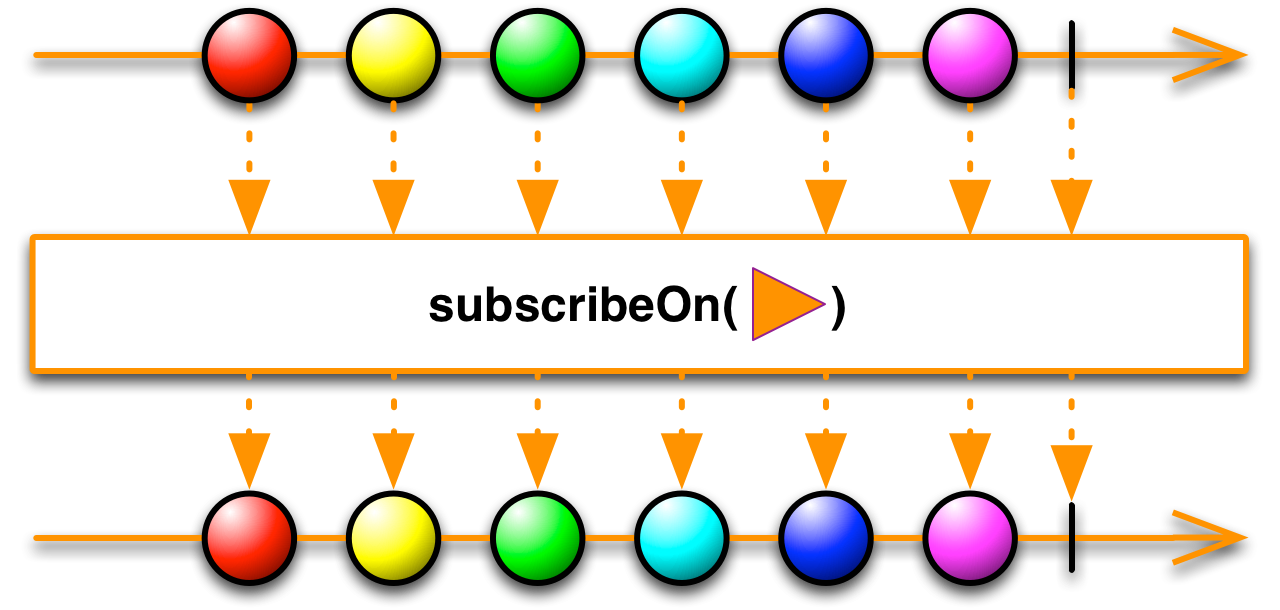
- Scheduler:
- You specify which
Schedulerthis operator will use
Parameters
| scheduler | the Scheduler to perform subscription actions on |
|---|
Returns
- the source ObservableSource modified so that its subscriptions happen on the
specified
Scheduler
public final E subscribeWith (E observer)
Subscribes a given Observer (subclass) to this Observable and returns the given Observer as is.
Usage example:
Observable<Integer> source = Observable.range(1, 10);
CompositeDisposable composite = new CompositeDisposable();
ResourceObserver<Integer> rs = new ResourceObserver<>() {
// ...
};
composite.add(source.subscribeWith(rs));
- Scheduler:
subscribeWithdoes not operate by default on a particularScheduler.
Parameters
| observer | the Observer (subclass) to use and return, not null |
|---|
Returns
- the input
observer
Throws
| NullPointerException | if observer is null |
|---|
public final Observable<T> switchIfEmpty (ObservableSource<? extends T> other)
Returns an Observable that emits the items emitted by the source ObservableSource or the items of an alternate
ObservableSource if the source ObservableSource is empty.
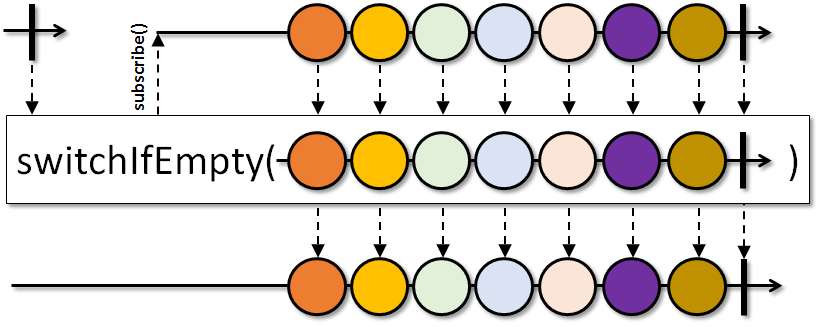
- Scheduler:
switchIfEmptydoes not operate by default on a particularScheduler.
Parameters
| other | the alternate ObservableSource to subscribe to if the source does not emit any items |
|---|
Returns
- an ObservableSource that emits the items emitted by the source ObservableSource or the items of an alternate ObservableSource if the source ObservableSource is empty.
public final Observable<R> switchMap (Function<? super T, ? extends ObservableSource<? extends R>> mapper)
Returns a new ObservableSource by applying a function that you supply to each item emitted by the source ObservableSource that returns an ObservableSource, and then emitting the items emitted by the most recently emitted of these ObservableSources.
The resulting ObservableSource completes if both the upstream ObservableSource and the last inner ObservableSource, if any, complete. If the upstream ObservableSource signals an onError, the inner ObservableSource is disposed and the error delivered in-sequence.
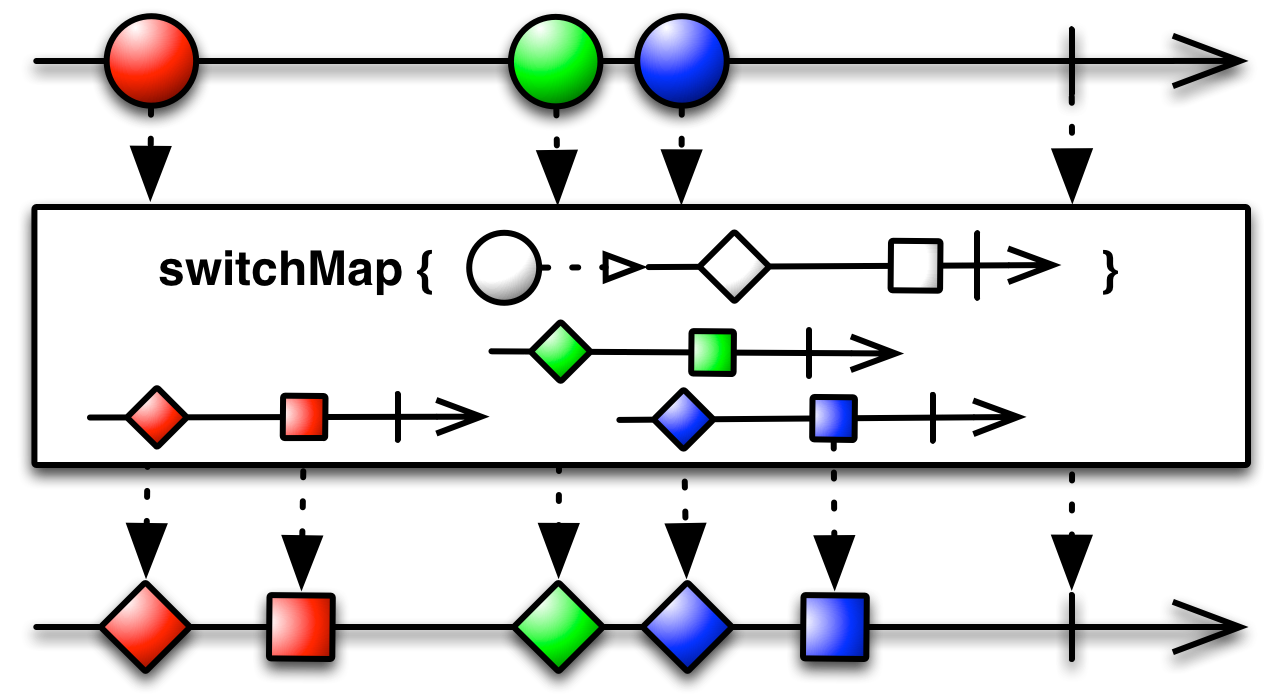
- Scheduler:
switchMapdoes not operate by default on a particularScheduler.
Parameters
| mapper | a function that, when applied to an item emitted by the source ObservableSource, returns an ObservableSource |
|---|
Returns
- an Observable that emits the items emitted by the ObservableSource returned from applying
functo the most recently emitted item emitted by the source ObservableSource
public final Observable<R> switchMap (Function<? super T, ? extends ObservableSource<? extends R>> mapper, int bufferSize)
Returns a new ObservableSource by applying a function that you supply to each item emitted by the source ObservableSource that returns an ObservableSource, and then emitting the items emitted by the most recently emitted of these ObservableSources.
The resulting ObservableSource completes if both the upstream ObservableSource and the last inner ObservableSource, if any, complete. If the upstream ObservableSource signals an onError, the inner ObservableSource is disposed and the error delivered in-sequence.

- Scheduler:
switchMapdoes not operate by default on a particularScheduler.
Parameters
| mapper | a function that, when applied to an item emitted by the source ObservableSource, returns an ObservableSource |
|---|---|
| bufferSize | the number of elements to prefetch from the current active inner ObservableSource |
Returns
- an Observable that emits the items emitted by the ObservableSource returned from applying
functo the most recently emitted item emitted by the source ObservableSource
public final Observable<R> switchMapDelayError (Function<? super T, ? extends ObservableSource<? extends R>> mapper)
Returns a new ObservableSource by applying a function that you supply to each item emitted by the source ObservableSource that returns an ObservableSource, and then emitting the items emitted by the most recently emitted of these ObservableSources and delays any error until all ObservableSources terminate.
The resulting ObservableSource completes if both the upstream ObservableSource and the last inner ObservableSource, if any, complete. If the upstream ObservableSource signals an onError, the termination of the last inner ObservableSource will emit that error as is or wrapped into a CompositeException along with the other possible errors the former inner ObservableSources signalled.

- Scheduler:
switchMapDelayErrordoes not operate by default on a particularScheduler.
Parameters
| mapper | a function that, when applied to an item emitted by the source ObservableSource, returns an ObservableSource |
|---|
Returns
- an Observable that emits the items emitted by the ObservableSource returned from applying
functo the most recently emitted item emitted by the source ObservableSource
public final Observable<R> switchMapDelayError (Function<? super T, ? extends ObservableSource<? extends R>> mapper, int bufferSize)
Returns a new ObservableSource by applying a function that you supply to each item emitted by the source ObservableSource that returns an ObservableSource, and then emitting the items emitted by the most recently emitted of these ObservableSources and delays any error until all ObservableSources terminate.
The resulting ObservableSource completes if both the upstream ObservableSource and the last inner ObservableSource, if any, complete. If the upstream ObservableSource signals an onError, the termination of the last inner ObservableSource will emit that error as is or wrapped into a CompositeException along with the other possible errors the former inner ObservableSources signalled.

- Scheduler:
switchMapDelayErrordoes not operate by default on a particularScheduler.
Parameters
| mapper | a function that, when applied to an item emitted by the source ObservableSource, returns an ObservableSource |
|---|---|
| bufferSize | the number of elements to prefetch from the current active inner ObservableSource |
Returns
- an Observable that emits the items emitted by the ObservableSource returned from applying
functo the most recently emitted item emitted by the source ObservableSource
public final Observable<R> switchMapSingle (Function<? super T, ? extends SingleSource<? extends R>> mapper)
Returns a new ObservableSource by applying a function that you supply to each item emitted by the source ObservableSource that returns a SingleSource, and then emitting the item emitted by the most recently emitted of these SingleSources.
The resulting ObservableSource completes if both the upstream ObservableSource and the last inner SingleSource, if any, complete. If the upstream ObservableSource signals an onError, the inner SingleSource is disposed and the error delivered in-sequence.

- Scheduler:
switchMapSingledoes not operate by default on a particularScheduler.
Parameters
| mapper | a function that, when applied to an item emitted by the source ObservableSource, returns a SingleSource |
|---|
Returns
- an Observable that emits the item emitted by the SingleSource returned from applying
functo the most recently emitted item emitted by the source ObservableSource
public final Observable<R> switchMapSingleDelayError (Function<? super T, ? extends SingleSource<? extends R>> mapper)
Returns a new ObservableSource by applying a function that you supply to each item emitted by the source ObservableSource that returns a SingleSource, and then emitting the item emitted by the most recently emitted of these SingleSources and delays any error until all SingleSources terminate.
The resulting ObservableSource completes if both the upstream ObservableSource and the last inner SingleSource, if any, complete. If the upstream ObservableSource signals an onError, the termination of the last inner SingleSource will emit that error as is or wrapped into a CompositeException along with the other possible errors the former inner SingleSources signalled.

- Scheduler:
switchMapSingleDelayErrordoes not operate by default on a particularScheduler.
Parameters
| mapper | a function that, when applied to an item emitted by the source ObservableSource, returns a SingleSource |
|---|
Returns
- an Observable that emits the item emitted by the SingleSource returned from applying
functo the most recently emitted item emitted by the source ObservableSource
public static Observable<T> switchOnNext (ObservableSource<? extends ObservableSource<? extends T>> sources, int bufferSize)
Converts an ObservableSource that emits ObservableSources into an ObservableSource that emits the items emitted by the most recently emitted of those ObservableSources.
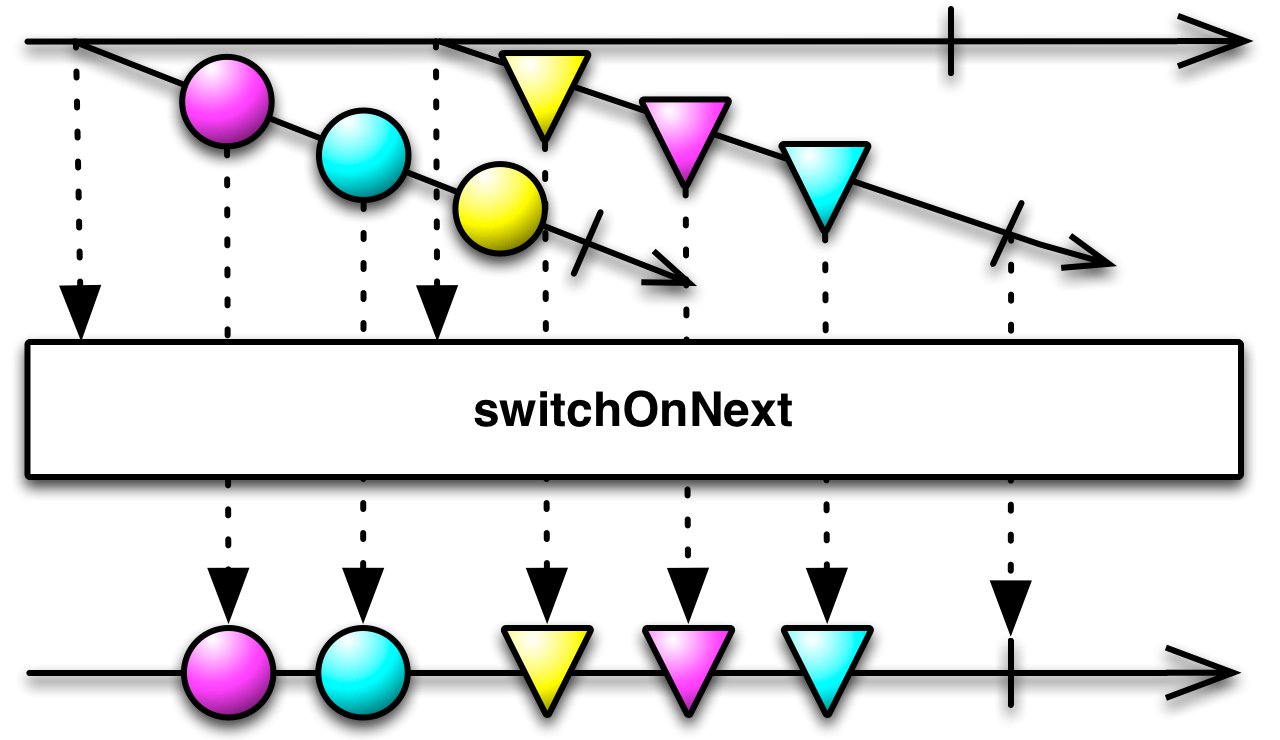
switchOnNext subscribes to an ObservableSource that emits ObservableSources. Each time it observes one of
these emitted ObservableSources, the ObservableSource returned by switchOnNext begins emitting the items
emitted by that ObservableSource. When a new ObservableSource is emitted, switchOnNext stops emitting items
from the earlier-emitted ObservableSource and begins emitting items from the new one.
The resulting ObservableSource completes if both the outer ObservableSource and the last inner ObservableSource, if any, complete. If the outer ObservableSource signals an onError, the inner ObservableSource is disposed and the error delivered in-sequence.
- Scheduler:
switchOnNextdoes not operate by default on a particularScheduler.
Parameters
| sources | the source ObservableSource that emits ObservableSources |
|---|---|
| bufferSize | the number of items to prefetch from the inner ObservableSources |
Returns
- an Observable that emits the items emitted by the ObservableSource most recently emitted by the source ObservableSource
public static Observable<T> switchOnNext (ObservableSource<? extends ObservableSource<? extends T>> sources)
Converts an ObservableSource that emits ObservableSources into an ObservableSource that emits the items emitted by the most recently emitted of those ObservableSources.

switchOnNext subscribes to an ObservableSource that emits ObservableSources. Each time it observes one of
these emitted ObservableSources, the ObservableSource returned by switchOnNext begins emitting the items
emitted by that ObservableSource. When a new ObservableSource is emitted, switchOnNext stops emitting items
from the earlier-emitted ObservableSource and begins emitting items from the new one.
The resulting ObservableSource completes if both the outer ObservableSource and the last inner ObservableSource, if any, complete. If the outer ObservableSource signals an onError, the inner ObservableSource is disposed and the error delivered in-sequence.
- Scheduler:
switchOnNextdoes not operate by default on a particularScheduler.
Parameters
| sources | the source ObservableSource that emits ObservableSources |
|---|
Returns
- an Observable that emits the items emitted by the ObservableSource most recently emitted by the source ObservableSource
public static Observable<T> switchOnNextDelayError (ObservableSource<? extends ObservableSource<? extends T>> sources, int prefetch)
Converts an ObservableSource that emits ObservableSources into an ObservableSource that emits the items emitted by the most recently emitted of those ObservableSources and delays any exception until all ObservableSources terminate.

switchOnNext subscribes to an ObservableSource that emits ObservableSources. Each time it observes one of
these emitted ObservableSources, the ObservableSource returned by switchOnNext begins emitting the items
emitted by that ObservableSource. When a new ObservableSource is emitted, switchOnNext stops emitting items
from the earlier-emitted ObservableSource and begins emitting items from the new one.
The resulting ObservableSource completes if both the main ObservableSource and the last inner ObservableSource, if any, complete. If the main ObservableSource signals an onError, the termination of the last inner ObservableSource will emit that error as is or wrapped into a CompositeException along with the other possible errors the former inner ObservableSources signalled.
- Scheduler:
switchOnNextDelayErrordoes not operate by default on a particularScheduler.
Parameters
| sources | the source ObservableSource that emits ObservableSources |
|---|---|
| prefetch | the number of items to prefetch from the inner ObservableSources |
Returns
- an Observable that emits the items emitted by the ObservableSource most recently emitted by the source ObservableSource
public static Observable<T> switchOnNextDelayError (ObservableSource<? extends ObservableSource<? extends T>> sources)
Converts an ObservableSource that emits ObservableSources into an ObservableSource that emits the items emitted by the most recently emitted of those ObservableSources and delays any exception until all ObservableSources terminate.

switchOnNext subscribes to an ObservableSource that emits ObservableSources. Each time it observes one of
these emitted ObservableSources, the ObservableSource returned by switchOnNext begins emitting the items
emitted by that ObservableSource. When a new ObservableSource is emitted, switchOnNext stops emitting items
from the earlier-emitted ObservableSource and begins emitting items from the new one.
The resulting ObservableSource completes if both the main ObservableSource and the last inner ObservableSource, if any, complete. If the main ObservableSource signals an onError, the termination of the last inner ObservableSource will emit that error as is or wrapped into a CompositeException along with the other possible errors the former inner ObservableSources signalled.
- Scheduler:
switchOnNextDelayErrordoes not operate by default on a particularScheduler.
Parameters
| sources | the source ObservableSource that emits ObservableSources |
|---|
Returns
- an Observable that emits the items emitted by the ObservableSource most recently emitted by the source ObservableSource
public final Observable<T> take (long time, TimeUnit unit)
Returns an Observable that emits those items emitted by source ObservableSource before a specified time runs out.
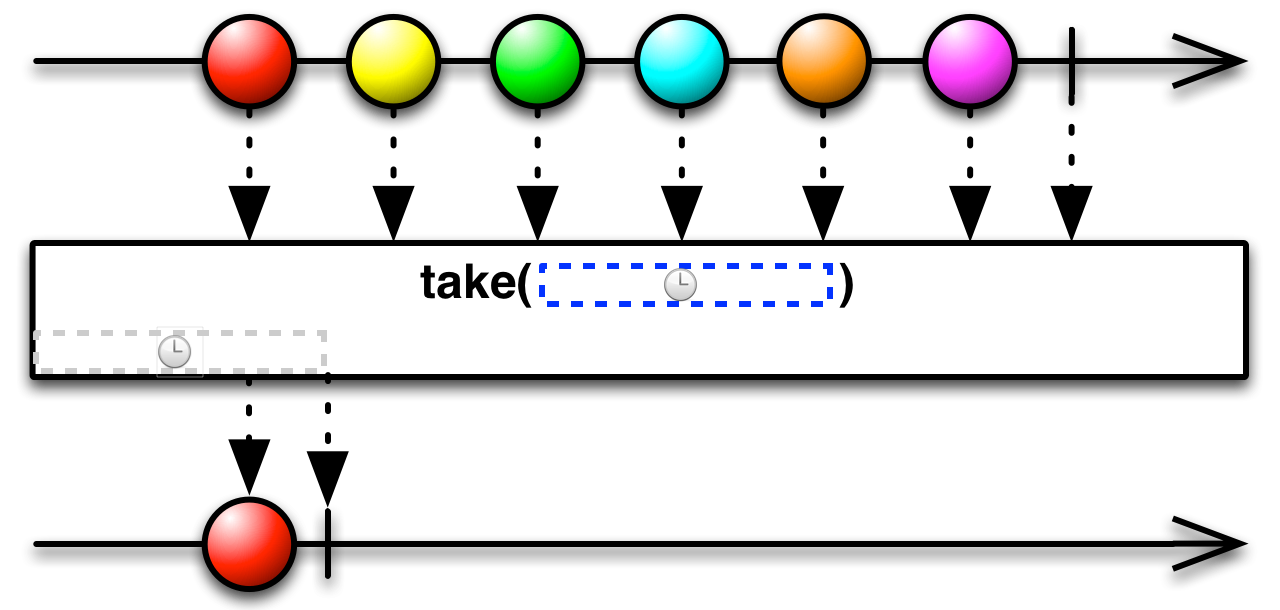
- Scheduler:
- This version of
takeoperates by default on thecomputationScheduler.
Parameters
| time | the length of the time window |
|---|---|
| unit | the time unit of time |
Returns
- an Observable that emits those items emitted by the source ObservableSource before the time runs out
public final Observable<T> take (long time, TimeUnit unit, Scheduler scheduler)
Returns an Observable that emits those items emitted by source ObservableSource before a specified time (on a specified Scheduler) runs out.
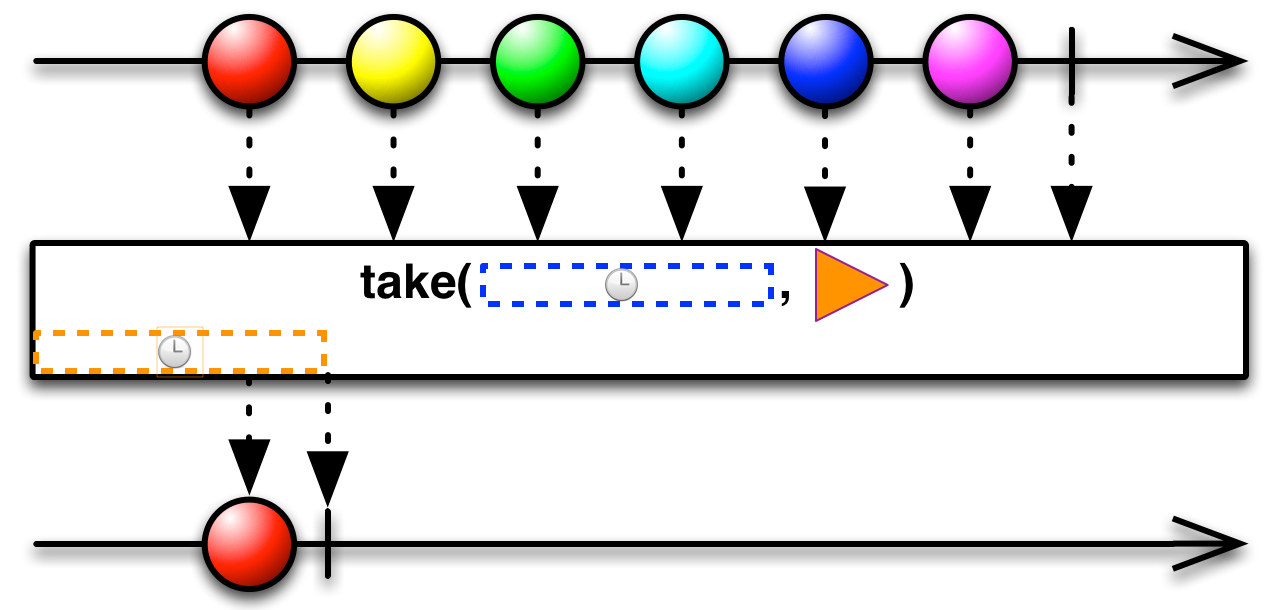
- Scheduler:
- You specify which
Schedulerthis operator will use
Parameters
| time | the length of the time window |
|---|---|
| unit | the time unit of time |
| scheduler | the Scheduler used for time source |
Returns
- an Observable that emits those items emitted by the source ObservableSource before the time runs out, according to the specified Scheduler
public final Observable<T> take (long count)
Returns an Observable that emits only the first count items emitted by the source ObservableSource. If the source emits fewer than
count items then all of its items are emitted.

This method returns an ObservableSource that will invoke a subscribing Observer's
onNext function a maximum of count times before invoking
onComplete.
- Scheduler:
- This version of
takedoes not operate by default on a particularScheduler.
Parameters
| count | the maximum number of items to emit |
|---|
Returns
- an Observable that emits only the first
countitems emitted by the source ObservableSource, or all of the items from the source ObservableSource if that ObservableSource emits fewer thancountitems
public final Observable<T> takeLast (long time, TimeUnit unit, boolean delayError)
Returns an Observable that emits the items from the source ObservableSource that were emitted in a specified window of time before the ObservableSource completed.
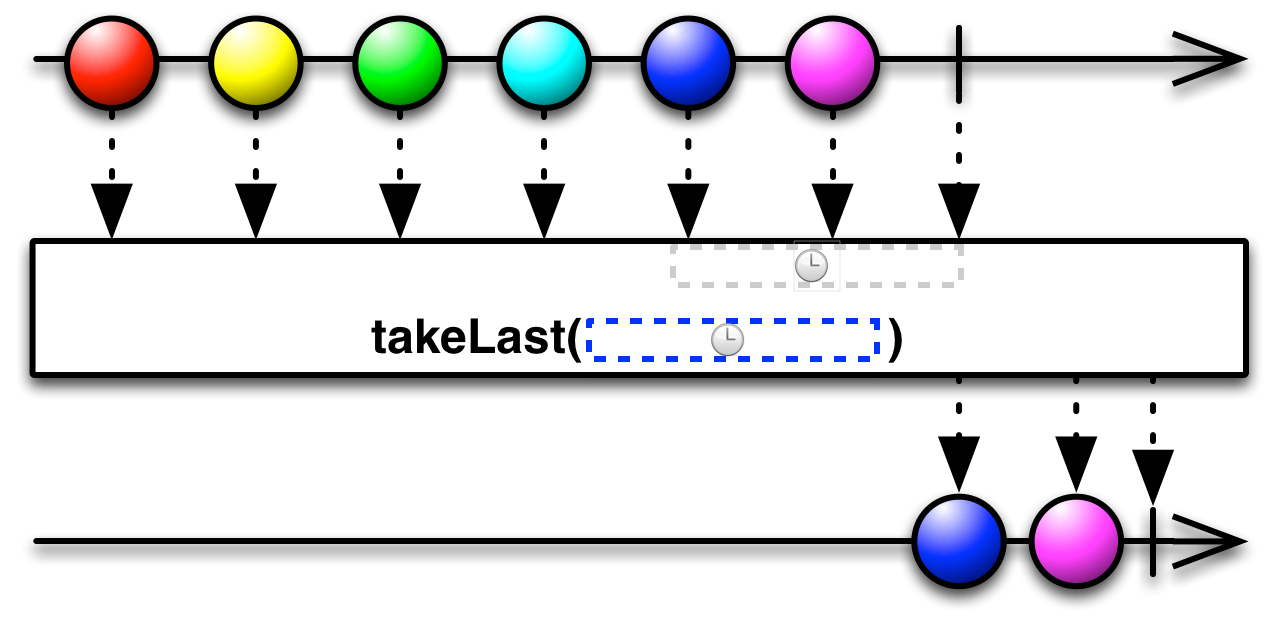
- Scheduler:
- This version of
takeLastoperates by default on thecomputationScheduler.
Parameters
| time | the length of the time window |
|---|---|
| unit | the time unit of time |
| delayError | if true, an exception signalled by the current Observable is delayed until the regular elements are consumed by the downstream; if false, an exception is immediately signalled and all regular elements dropped |
Returns
- an Observable that emits the items from the source ObservableSource that were emitted in the window of
time before the ObservableSource completed specified by
time
public final Observable<T> takeLast (long count, long time, TimeUnit unit, Scheduler scheduler, boolean delayError, int bufferSize)
Returns an Observable that emits at most a specified number of items from the source ObservableSource that were emitted in a specified window of time before the ObservableSource completed, where the timing information is provided by a given Scheduler.
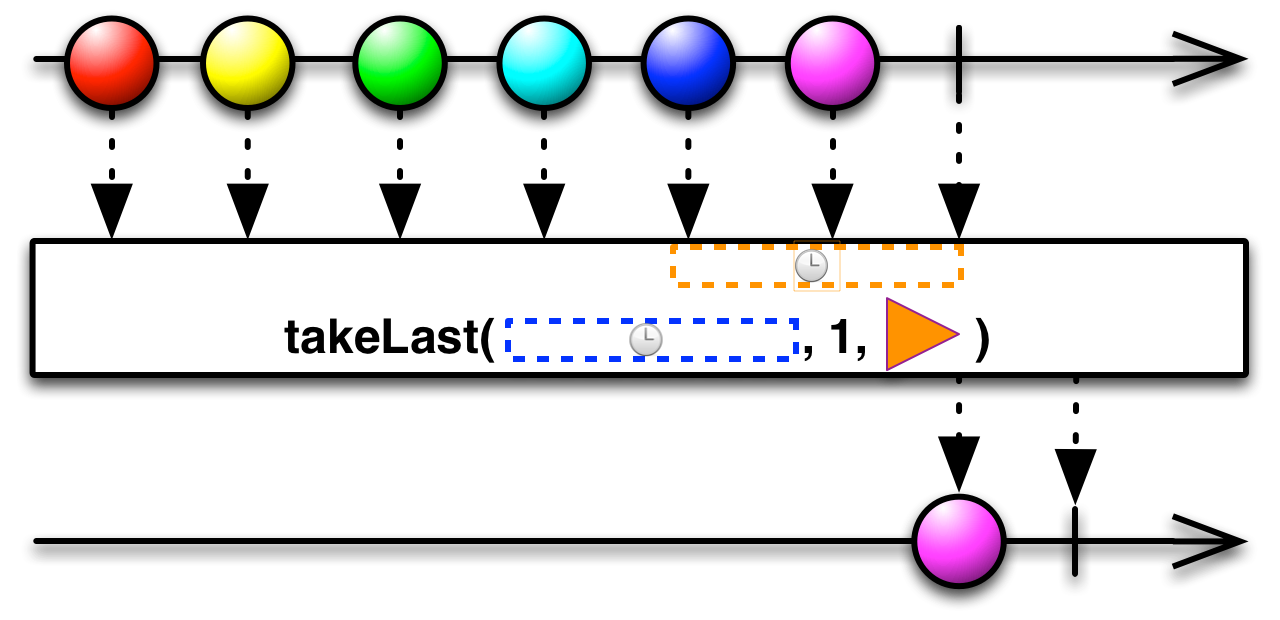
- Scheduler:
- You specify which
Schedulerthis operator will use for tracking the current time
Parameters
| count | the maximum number of items to emit |
|---|---|
| time | the length of the time window |
| unit | the time unit of time |
| scheduler | the Scheduler that provides the timestamps for the observed items |
| delayError | if true, an exception signalled by the current Observable is delayed until the regular elements are consumed by the downstream; if false, an exception is immediately signalled and all regular elements dropped |
| bufferSize | the hint about how many elements to expect to be last |
Returns
- an Observable that emits at most
countitems from the source ObservableSource that were emitted in a specified window of time before the ObservableSource completed, where the timing information is provided by the givenscheduler
Throws
| IndexOutOfBoundsException | if count is less than zero |
|---|
public final Observable<T> takeLast (long time, TimeUnit unit, Scheduler scheduler)
Returns an Observable that emits the items from the source ObservableSource that were emitted in a specified window of time before the ObservableSource completed, where the timing information is provided by a specified Scheduler.
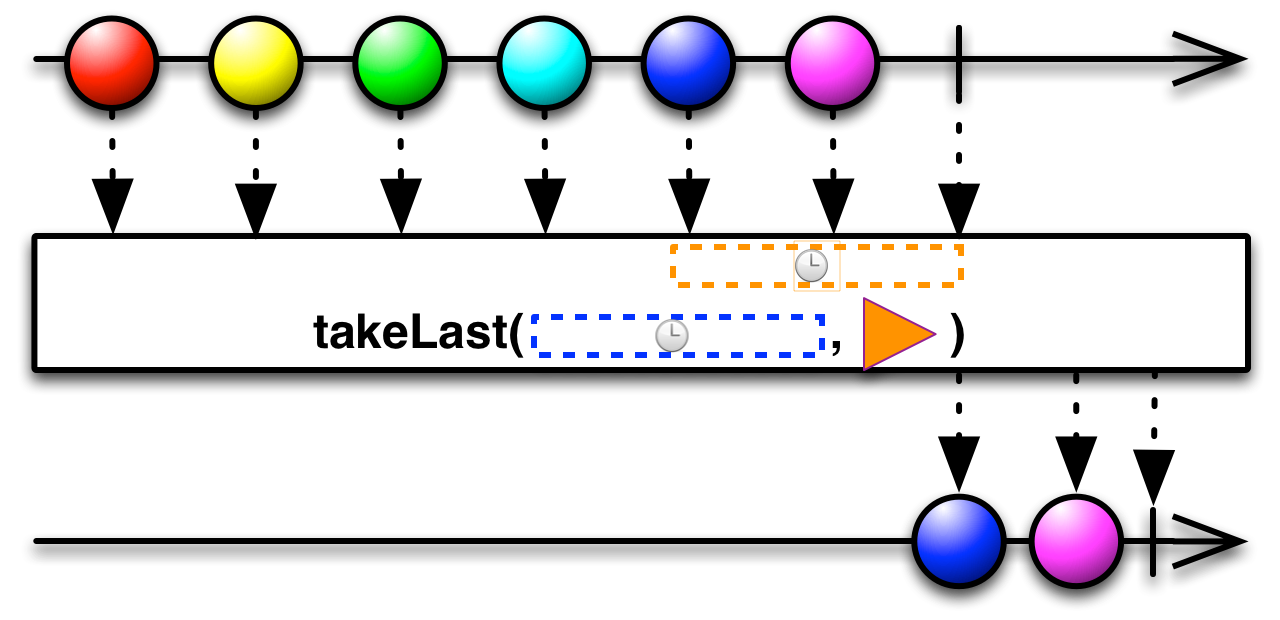
- Scheduler:
- You specify which
Schedulerthis operator will use
Parameters
| time | the length of the time window |
|---|---|
| unit | the time unit of time |
| scheduler | the Scheduler that provides the timestamps for the Observed items |
Returns
- an Observable that emits the items from the source ObservableSource that were emitted in the window of
time before the ObservableSource completed specified by
time, where the timing information is provided byscheduler
public final Observable<T> takeLast (long time, TimeUnit unit, Scheduler scheduler, boolean delayError)
Returns an Observable that emits the items from the source ObservableSource that were emitted in a specified window of time before the ObservableSource completed, where the timing information is provided by a specified Scheduler.

- Scheduler:
- You specify which
Schedulerthis operator will use
Parameters
| time | the length of the time window |
|---|---|
| unit | the time unit of time |
| scheduler | the Scheduler that provides the timestamps for the Observed items |
| delayError | if true, an exception signalled by the current Observable is delayed until the regular elements are consumed by the downstream; if false, an exception is immediately signalled and all regular elements dropped |
Returns
- an Observable that emits the items from the source ObservableSource that were emitted in the window of
time before the ObservableSource completed specified by
time, where the timing information is provided byscheduler
public final Observable<T> takeLast (int count)
Returns an Observable that emits at most the last count items emitted by the source ObservableSource. If the source emits fewer than
count items then all of its items are emitted.
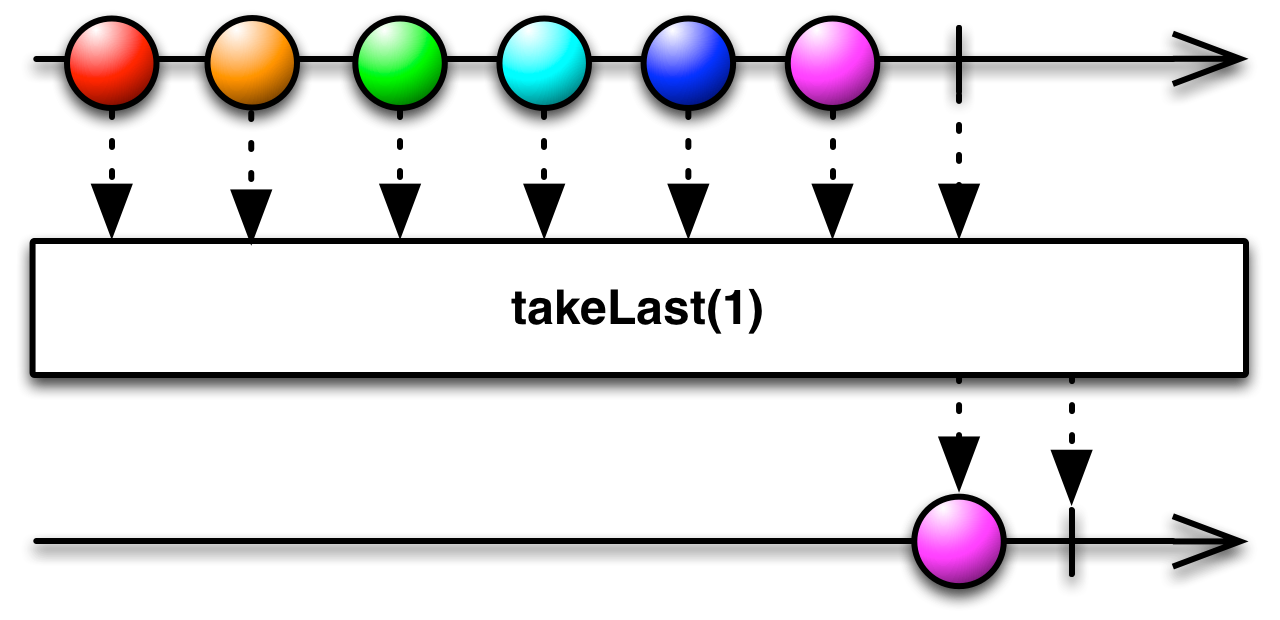
- Scheduler:
- This version of
takeLastdoes not operate by default on a particularScheduler.
Parameters
| count | the maximum number of items to emit from the end of the sequence of items emitted by the source ObservableSource |
|---|
Returns
- an Observable that emits at most the last
countitems emitted by the source ObservableSource
Throws
| IndexOutOfBoundsException | if count is less than zero |
|---|
public final Observable<T> takeLast (long time, TimeUnit unit)
Returns an Observable that emits the items from the source ObservableSource that were emitted in a specified window of time before the ObservableSource completed.

- Scheduler:
- This version of
takeLastoperates by default on thecomputationScheduler.
Parameters
| time | the length of the time window |
|---|---|
| unit | the time unit of time |
Returns
- an Observable that emits the items from the source ObservableSource that were emitted in the window of
time before the ObservableSource completed specified by
time
public final Observable<T> takeLast (long count, long time, TimeUnit unit)
Returns an Observable that emits at most a specified number of items from the source ObservableSource that were emitted in a specified window of time before the ObservableSource completed.
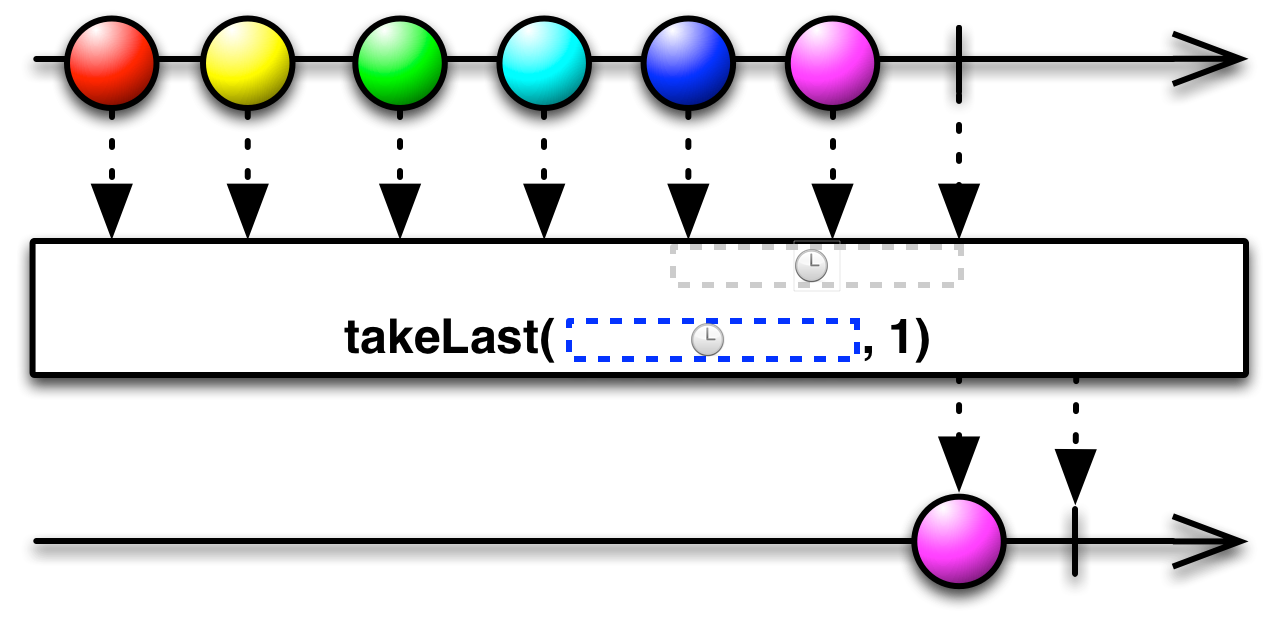
- Scheduler:
takeLastdoes not operate on any particular scheduler but uses the current time from thecomputationScheduler.
Parameters
| count | the maximum number of items to emit |
|---|---|
| time | the length of the time window |
| unit | the time unit of time |
Returns
- an Observable that emits at most
countitems from the source ObservableSource that were emitted in a specified window of time before the ObservableSource completed
public final Observable<T> takeLast (long count, long time, TimeUnit unit, Scheduler scheduler)
Returns an Observable that emits at most a specified number of items from the source ObservableSource that were emitted in a specified window of time before the ObservableSource completed, where the timing information is provided by a given Scheduler.

- Scheduler:
- You specify which
Schedulerthis operator will use for tracking the current time
Parameters
| count | the maximum number of items to emit |
|---|---|
| time | the length of the time window |
| unit | the time unit of time |
| scheduler | the Scheduler that provides the timestamps for the observed items |
Returns
- an Observable that emits at most
countitems from the source ObservableSource that were emitted in a specified window of time before the ObservableSource completed, where the timing information is provided by the givenscheduler
Throws
| IndexOutOfBoundsException | if count is less than zero |
|---|
public final Observable<T> takeLast (long time, TimeUnit unit, Scheduler scheduler, boolean delayError, int bufferSize)
Returns an Observable that emits the items from the source ObservableSource that were emitted in a specified window of time before the ObservableSource completed, where the timing information is provided by a specified Scheduler.

- Scheduler:
- You specify which
Schedulerthis operator will use
Parameters
| time | the length of the time window |
|---|---|
| unit | the time unit of time |
| scheduler | the Scheduler that provides the timestamps for the Observed items |
| delayError | if true, an exception signalled by the current Observable is delayed until the regular elements are consumed by the downstream; if false, an exception is immediately signalled and all regular elements dropped |
| bufferSize | the hint about how many elements to expect to be last |
Returns
- an Observable that emits the items from the source ObservableSource that were emitted in the window of
time before the ObservableSource completed specified by
time, where the timing information is provided byscheduler
public final Observable<T> takeUntil (Predicate<? super T> stopPredicate)
Returns an Observable that emits items emitted by the source Observable, checks the specified predicate for each item, and then completes when the condition is satisfied.
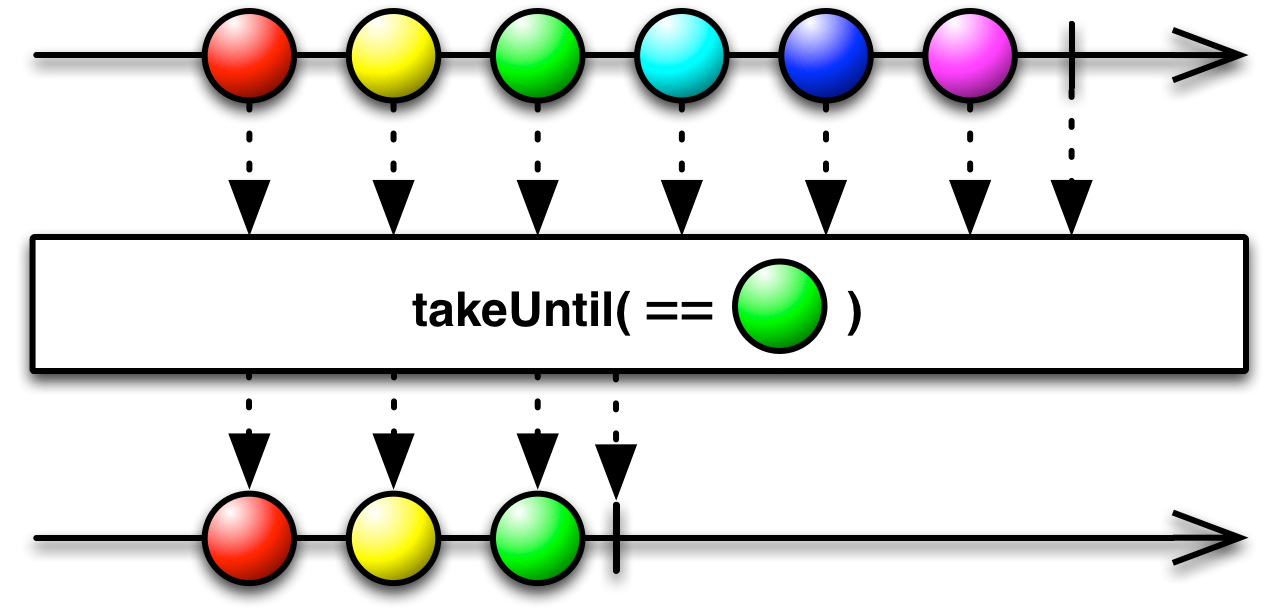
The difference between this operator and takeWhile(Predicate) is that here, the condition is
evaluated after the item is emitted.
- Scheduler:
takeUntildoes not operate by default on a particularScheduler.
Parameters
| stopPredicate | a function that evaluates an item emitted by the source Observable and returns a Boolean |
|---|
Returns
- an Observable that first emits items emitted by the source Observable, checks the specified condition after each item, and then completes when the condition is satisfied.
public final Observable<T> takeUntil (ObservableSource<U> other)
Returns an Observable that emits the items emitted by the source Observable until a second ObservableSource emits an item.
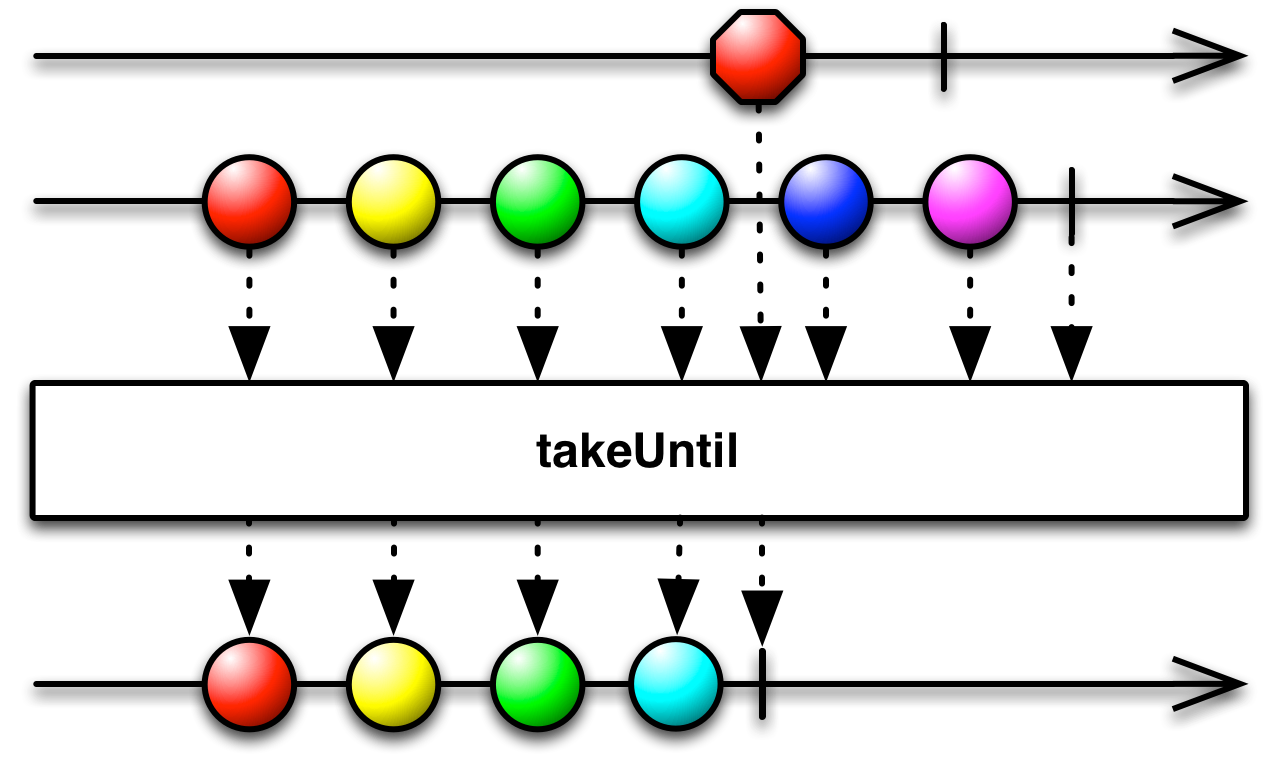
- Scheduler:
takeUntildoes not operate by default on a particularScheduler.
Parameters
| other | the ObservableSource whose first emitted item will cause takeUntil to stop emitting items
from the source Observable |
|---|
Returns
- an Observable that emits the items emitted by the source Observable until such time as
otheremits its first item
public final Observable<T> takeWhile (Predicate<? super T> predicate)
Returns an Observable that emits items emitted by the source ObservableSource so long as each item satisfied a specified condition, and then completes as soon as this condition is not satisfied.
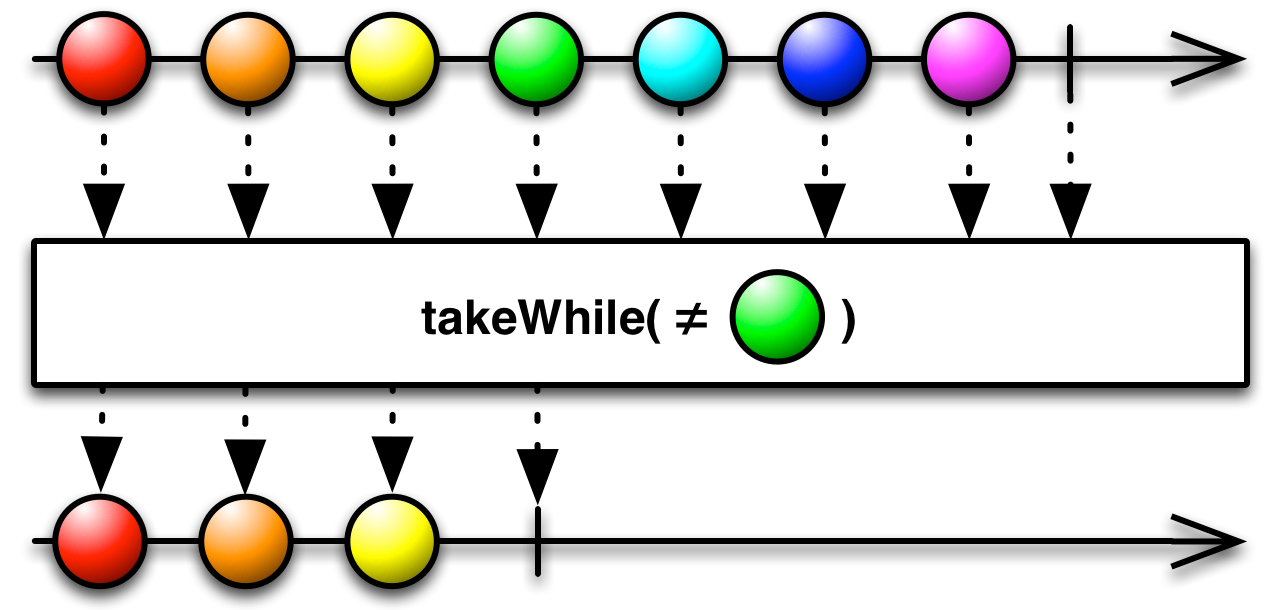
- Scheduler:
takeWhiledoes not operate by default on a particularScheduler.
Parameters
| predicate | a function that evaluates an item emitted by the source ObservableSource and returns a Boolean |
|---|
Returns
- an Observable that emits the items from the source ObservableSource so long as each item satisfies the
condition defined by
predicate, then completes
public final TestObserver<T> test (boolean dispose)
Creates a TestObserver, optionally disposes it and then subscribes it to this Observable.
- Scheduler:
testdoes not operate by default on a particularScheduler.
Parameters
| dispose | dispose the TestObserver before it is subscribed to this Observable? |
|---|
Returns
- the new TestObserver instance
public final TestObserver<T> test ()
Creates a TestObserver and subscribes it to this Observable.
- Scheduler:
testdoes not operate by default on a particularScheduler.
Returns
- the new TestObserver instance
public final Observable<T> throttleFirst (long windowDuration, TimeUnit unit)
Returns an Observable that emits only the first item emitted by the source ObservableSource during sequential time windows of a specified duration.
This differs from throttleLast(long, TimeUnit) in that this only tracks passage of time whereas
throttleLast(long, TimeUnit) ticks at scheduled intervals.

- Scheduler:
throttleFirstoperates by default on thecomputationScheduler.
Parameters
| windowDuration | time to wait before emitting another item after emitting the last item |
|---|---|
| unit | the unit of time of windowDuration |
Returns
- an Observable that performs the throttle operation
public final Observable<T> throttleFirst (long skipDuration, TimeUnit unit, Scheduler scheduler)
Returns an Observable that emits only the first item emitted by the source ObservableSource during sequential time windows of a specified duration, where the windows are managed by a specified Scheduler.
This differs from throttleLast(long, TimeUnit) in that this only tracks passage of time whereas
throttleLast(long, TimeUnit) ticks at scheduled intervals.
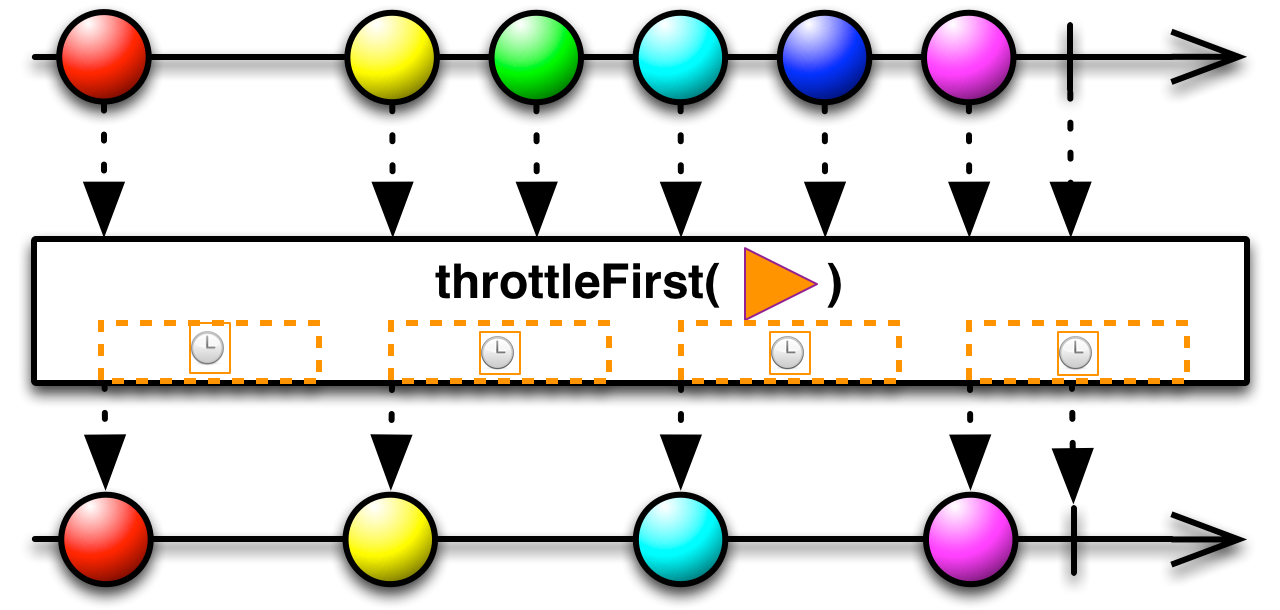
- Scheduler:
- You specify which
Schedulerthis operator will use
Parameters
| skipDuration | time to wait before emitting another item after emitting the last item |
|---|---|
| unit | the unit of time of skipDuration |
| scheduler | the Scheduler to use internally to manage the timers that handle timeout for each
event |
Returns
- an Observable that performs the throttle operation
public final Observable<T> throttleLast (long intervalDuration, TimeUnit unit, Scheduler scheduler)
Returns an Observable that emits only the last item emitted by the source ObservableSource during sequential time windows of a specified duration, where the duration is governed by a specified Scheduler.
This differs from throttleFirst(long, TimeUnit) in that this ticks along at a scheduled interval whereas
throttleFirst(long, TimeUnit) does not tick, it just tracks passage of time.
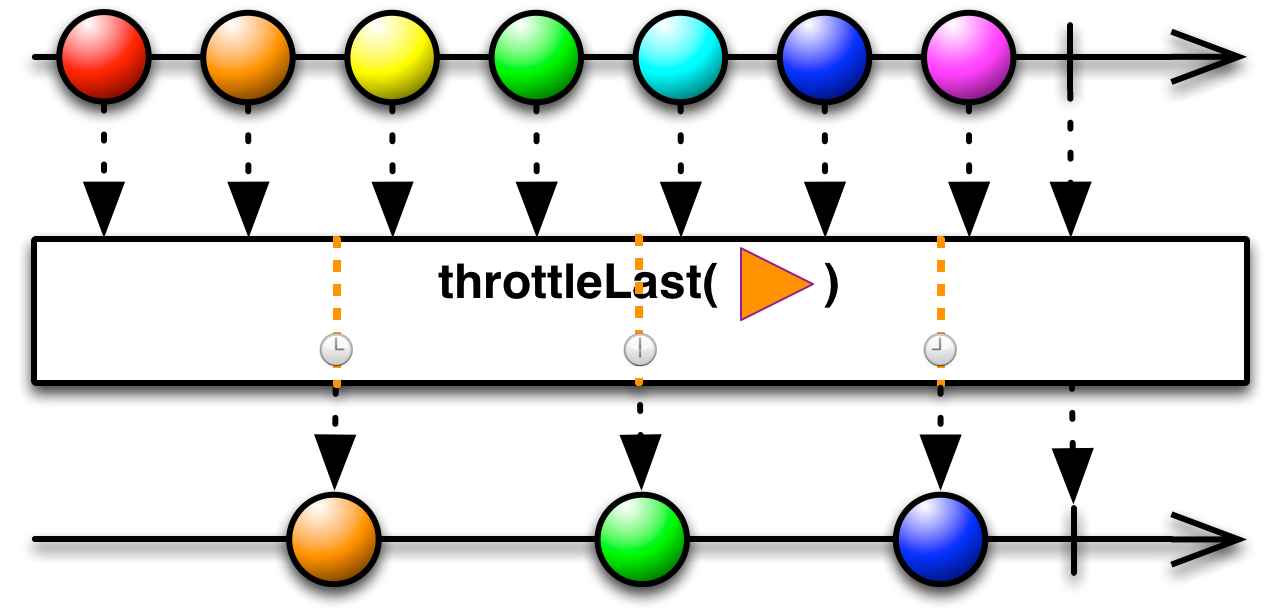
- Scheduler:
- You specify which
Schedulerthis operator will use
Parameters
| intervalDuration | duration of windows within which the last item emitted by the source ObservableSource will be emitted |
|---|---|
| unit | the unit of time of intervalDuration |
| scheduler | the Scheduler to use internally to manage the timers that handle timeout for each
event |
Returns
- an Observable that performs the throttle operation
public final Observable<T> throttleLast (long intervalDuration, TimeUnit unit)
Returns an Observable that emits only the last item emitted by the source ObservableSource during sequential time windows of a specified duration.
This differs from throttleFirst(long, TimeUnit) in that this ticks along at a scheduled interval whereas
throttleFirst(long, TimeUnit) does not tick, it just tracks passage of time.

- Scheduler:
throttleLastoperates by default on thecomputationScheduler.
Parameters
| intervalDuration | duration of windows within which the last item emitted by the source ObservableSource will be emitted |
|---|---|
| unit | the unit of time of intervalDuration |
Returns
- an Observable that performs the throttle operation
public final Observable<T> throttleWithTimeout (long timeout, TimeUnit unit, Scheduler scheduler)
Returns an Observable that only emits those items emitted by the source ObservableSource that are not followed by another emitted item within a specified time window, where the time window is governed by a specified Scheduler.
Note: If the source ObservableSource keeps emitting items more frequently than the length of the time window then no items will be emitted by the resulting ObservableSource.
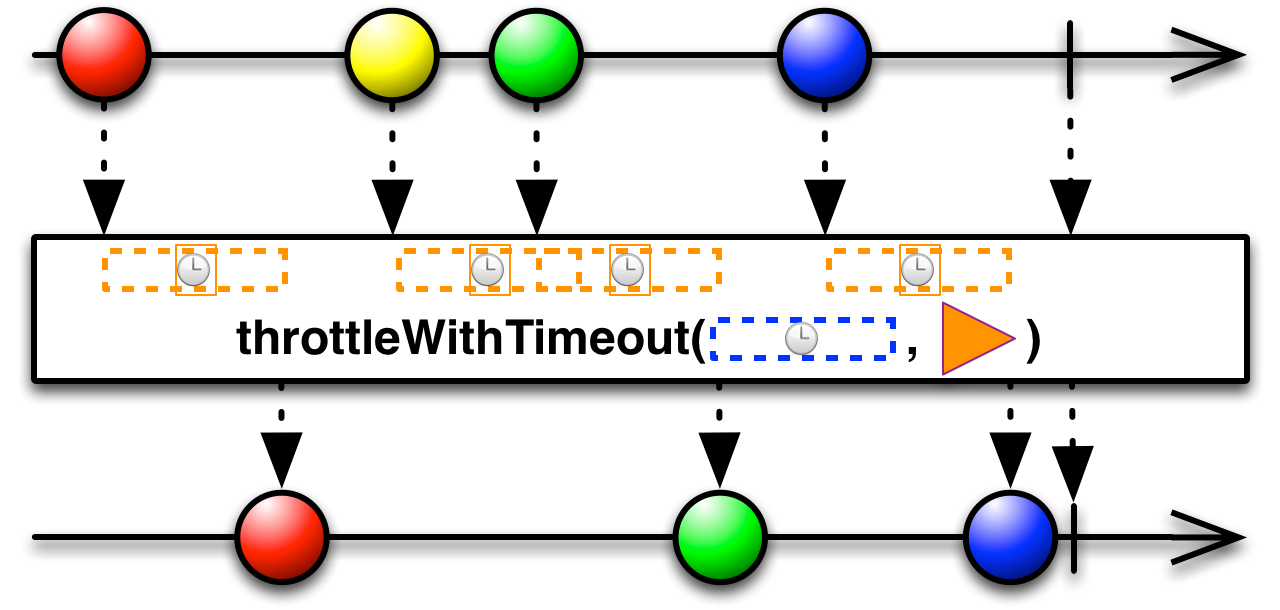
Information on debounce vs throttle:
- Debounce and Throttle: visual explanation
- Debouncing: javascript methods
- Javascript - don't spam your server: debounce and throttle
- Scheduler:
- You specify which
Schedulerthis operator will use
Parameters
| timeout | the length of the window of time that must pass after the emission of an item from the source ObservableSource in which that ObservableSource emits no items in order for the item to be emitted by the resulting ObservableSource |
|---|---|
| unit | the TimeUnit of timeout |
| scheduler | the Scheduler to use internally to manage the timers that handle the timeout for each
item |
Returns
- an Observable that filters out items that are too quickly followed by newer items
public final Observable<T> throttleWithTimeout (long timeout, TimeUnit unit)
Returns an Observable that only emits those items emitted by the source ObservableSource that are not followed by another emitted item within a specified time window.
Note: If the source ObservableSource keeps emitting items more frequently than the length of the time window then no items will be emitted by the resulting ObservableSource.
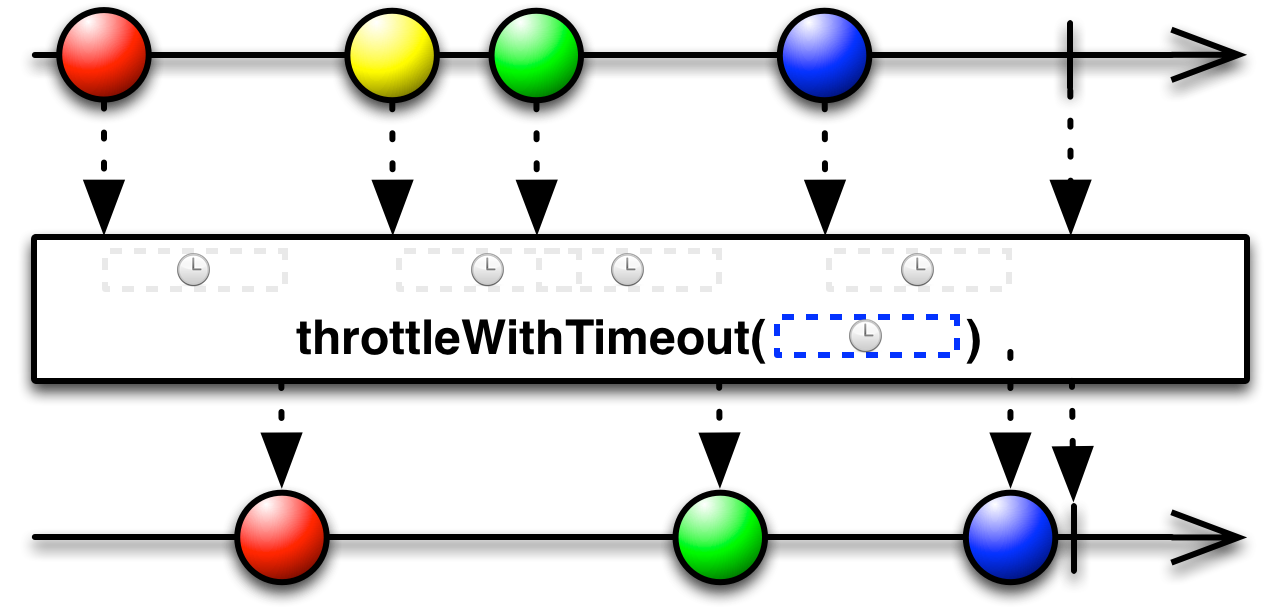
Information on debounce vs throttle:
- Debounce and Throttle: visual explanation
- Debouncing: javascript methods
- Javascript - don't spam your server: debounce and throttle
- Scheduler:
throttleWithTimeoutoperates by default on thecomputationScheduler.
Parameters
| timeout | the length of the window of time that must pass after the emission of an item from the source ObservableSource in which that ObservableSource emits no items in order for the item to be emitted by the resulting ObservableSource |
|---|---|
| unit | the TimeUnit of timeout |
Returns
- an Observable that filters out items that are too quickly followed by newer items
public final Observable<Timed<T>> timeInterval (Scheduler scheduler)
Returns an Observable that emits records of the time interval between consecutive items emitted by the source ObservableSource, where this interval is computed on a specified Scheduler.
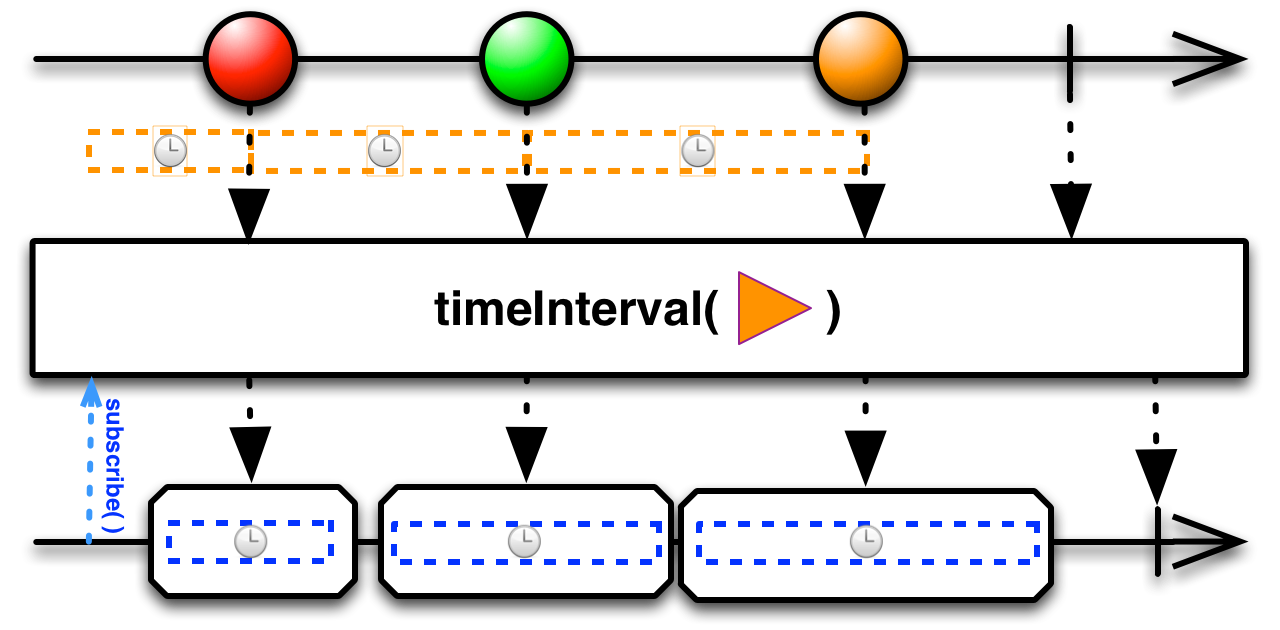
- Scheduler:
- The operator does not operate on any particular scheduler but uses the current time
from the specified
Scheduler.
Parameters
| scheduler | the Scheduler used to compute time intervals |
|---|
Returns
- an Observable that emits time interval information items
public final Observable<Timed<T>> timeInterval (TimeUnit unit, Scheduler scheduler)
Returns an Observable that emits records of the time interval between consecutive items emitted by the source ObservableSource, where this interval is computed on a specified Scheduler.

- Scheduler:
- The operator does not operate on any particular scheduler but uses the current time
from the specified
Scheduler.
Parameters
| unit | the time unit for the current time |
|---|---|
| scheduler | the Scheduler used to compute time intervals |
Returns
- an Observable that emits time interval information items
public final Observable<Timed<T>> timeInterval ()
Returns an Observable that emits records of the time interval between consecutive items emitted by the source ObservableSource.
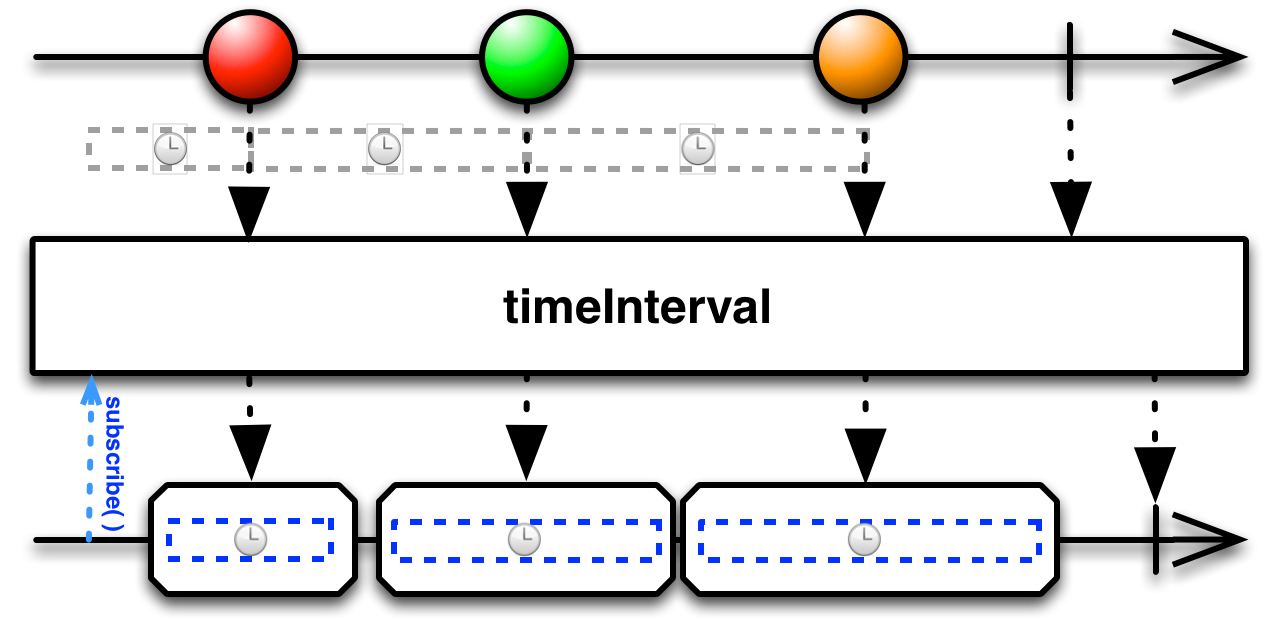
- Scheduler:
timeIntervaldoes not operate on any particular scheduler but uses the current time from thecomputationScheduler.
Returns
- an Observable that emits time interval information items
public final Observable<Timed<T>> timeInterval (TimeUnit unit)
Returns an Observable that emits records of the time interval between consecutive items emitted by the source ObservableSource.

- Scheduler:
timeIntervaldoes not operate on any particular scheduler but uses the current time from thecomputationScheduler.
Parameters
| unit | the time unit for the current time |
|---|
Returns
- an Observable that emits time interval information items
public final Observable<T> timeout (Function<? super T, ? extends ObservableSource<V>> itemTimeoutIndicator, ObservableSource<? extends T> other)
Returns an Observable that mirrors the source ObservableSource, but that switches to a fallback ObservableSource if an item emitted by the source ObservableSource doesn't arrive within a window of time after the emission of the previous item, where that period of time is measured by an ObservableSource that is a function of the previous item.

Note: The arrival of the first source item is never timed out.
- Scheduler:
- This version of
timeoutoperates by default on theimmediateScheduler.
Parameters
| itemTimeoutIndicator | a function that returns an ObservableSource, for each item emitted by the source ObservableSource, that determines the timeout window for the subsequent item |
|---|---|
| other | the fallback ObservableSource to switch to if the source ObservableSource times out |
Returns
- an Observable that mirrors the source ObservableSource, but switches to mirroring a fallback ObservableSource if an item emitted by the source ObservableSource takes longer to arrive than the time window defined by the selector for the previously emitted item
public final Observable<T> timeout (long timeout, TimeUnit timeUnit, Scheduler scheduler, ObservableSource<? extends T> other)
Returns an Observable that mirrors the source ObservableSource but applies a timeout policy for each emitted item using a specified Scheduler. If the next item isn't emitted within the specified timeout duration starting from its predecessor, the resulting ObservableSource begins instead to mirror a fallback ObservableSource.
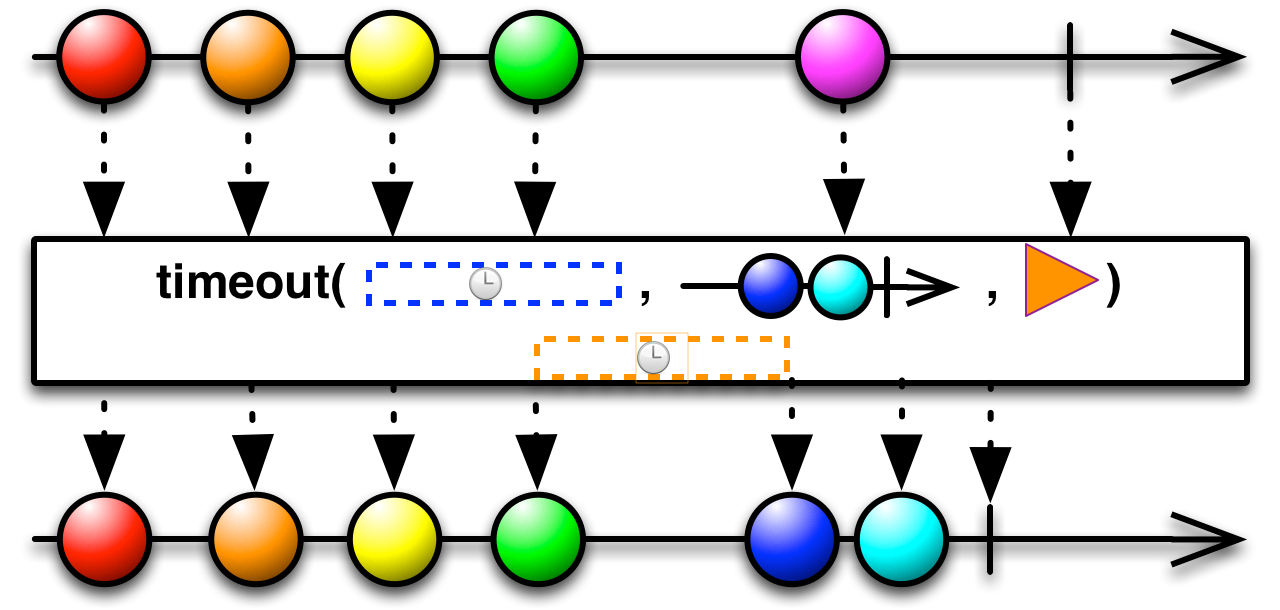
- Scheduler:
- You specify which
Schedulerthis operator will use
Parameters
| timeout | maximum duration between items before a timeout occurs |
|---|---|
| timeUnit | the unit of time that applies to the timeout argument |
| scheduler | the Scheduler to run the timeout timers on |
| other | the ObservableSource to use as the fallback in case of a timeout |
Returns
- the source ObservableSource modified so that it will switch to the fallback ObservableSource in case of a timeout
public final Observable<T> timeout (ObservableSource<U> firstTimeoutIndicator, Function<? super T, ? extends ObservableSource<V>> itemTimeoutIndicator, ObservableSource<? extends T> other)
Returns an Observable that mirrors the source ObservableSource, but switches to a fallback ObservableSource if either the first item emitted by the source ObservableSource or any subsequent item doesn't arrive within time windows defined by other ObservableSources.
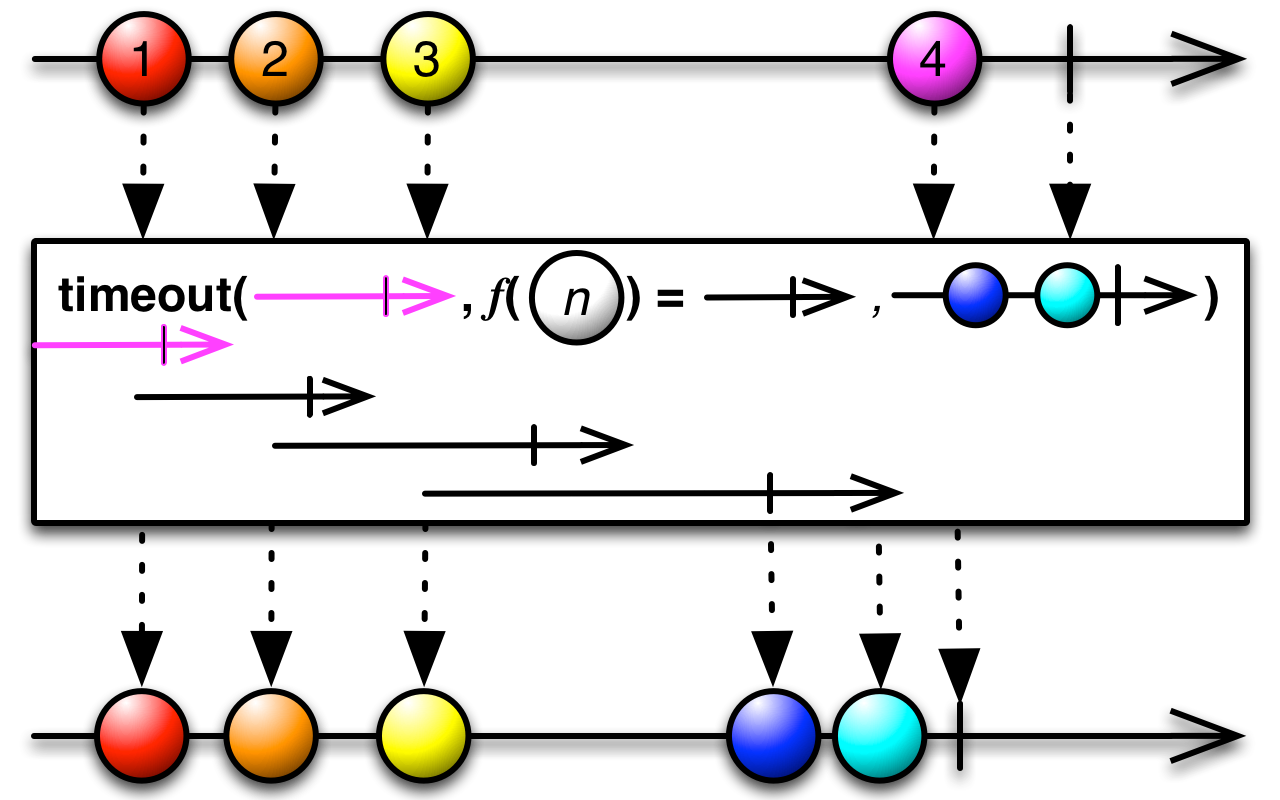
- Scheduler:
- This version of
timeoutoperates by default on theimmediateScheduler.
Parameters
| firstTimeoutIndicator | a function that returns an ObservableSource which determines the timeout window for the first source item |
|---|---|
| itemTimeoutIndicator | a function that returns an ObservableSource for each item emitted by the source ObservableSource and that determines the timeout window in which the subsequent source item must arrive in order to continue the sequence |
| other | the fallback ObservableSource to switch to if the source ObservableSource times out |
Returns
- an Observable that mirrors the source ObservableSource, but switches to the
otherObservableSource if either the first item emitted by the source ObservableSource or any subsequent item doesn't arrive within time windows defined by the timeout selectors
Throws
| NullPointerException | if itemTimeoutIndicator is null, or
if other is null |
|---|
public final Observable<T> timeout (long timeout, TimeUnit timeUnit)
Returns an Observable that mirrors the source ObservableSource but applies a timeout policy for each emitted
item. If the next item isn't emitted within the specified timeout duration starting from its predecessor,
the resulting ObservableSource terminates and notifies observers of a TimeoutException.
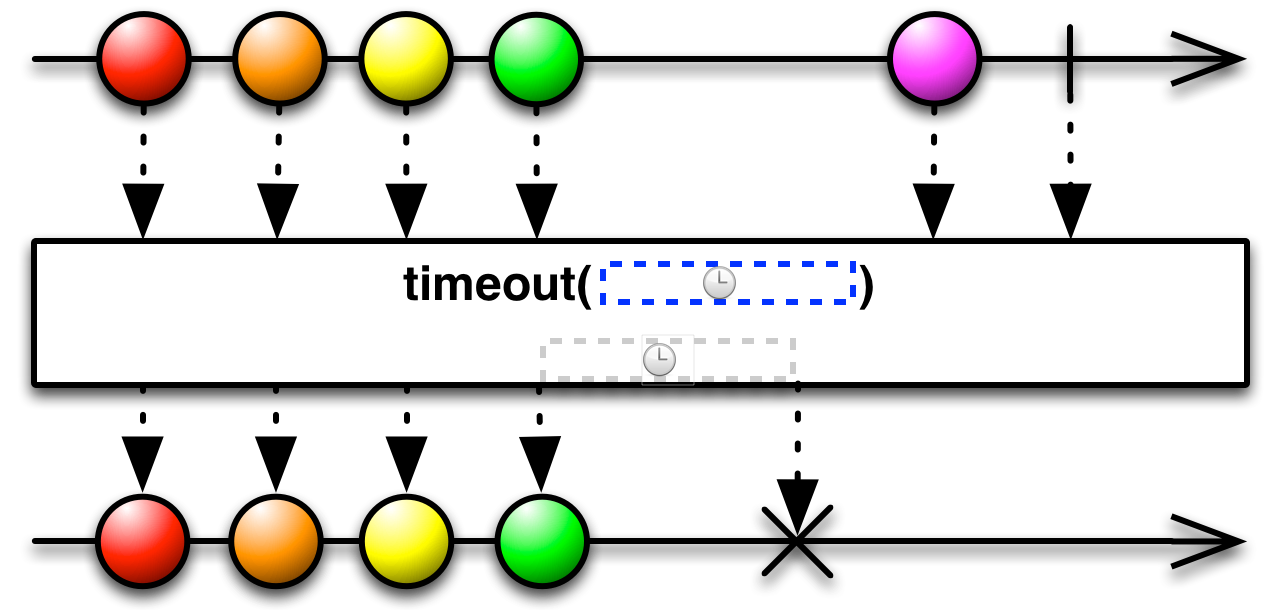
- Scheduler:
- This version of
timeoutoperates by default on thecomputationScheduler.
Parameters
| timeout | maximum duration between emitted items before a timeout occurs |
|---|---|
| timeUnit | the unit of time that applies to the timeout argument. |
Returns
- the source ObservableSource modified to notify observers of a
TimeoutExceptionin case of a timeout
public final Observable<T> timeout (long timeout, TimeUnit timeUnit, ObservableSource<? extends T> other)
Returns an Observable that mirrors the source ObservableSource but applies a timeout policy for each emitted item. If the next item isn't emitted within the specified timeout duration starting from its predecessor, the resulting ObservableSource begins instead to mirror a fallback ObservableSource.
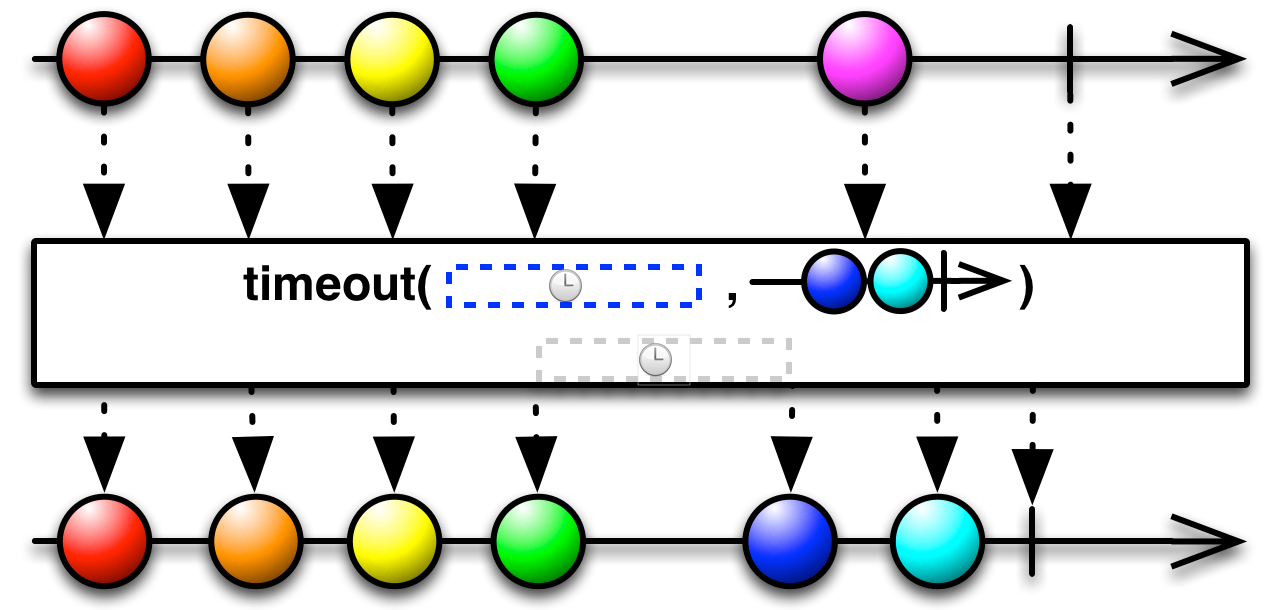
- Scheduler:
- This version of
timeoutoperates by default on thecomputationScheduler.
Parameters
| timeout | maximum duration between items before a timeout occurs |
|---|---|
| timeUnit | the unit of time that applies to the timeout argument |
| other | the fallback ObservableSource to use in case of a timeout |
Returns
- the source ObservableSource modified to switch to the fallback ObservableSource in case of a timeout
public final Observable<T> timeout (ObservableSource<U> firstTimeoutIndicator, Function<? super T, ? extends ObservableSource<V>> itemTimeoutIndicator)
Returns an Observable that mirrors the source ObservableSource, but notifies observers of a
TimeoutException if either the first item emitted by the source ObservableSource or any subsequent item
doesn't arrive within time windows defined by other ObservableSources.
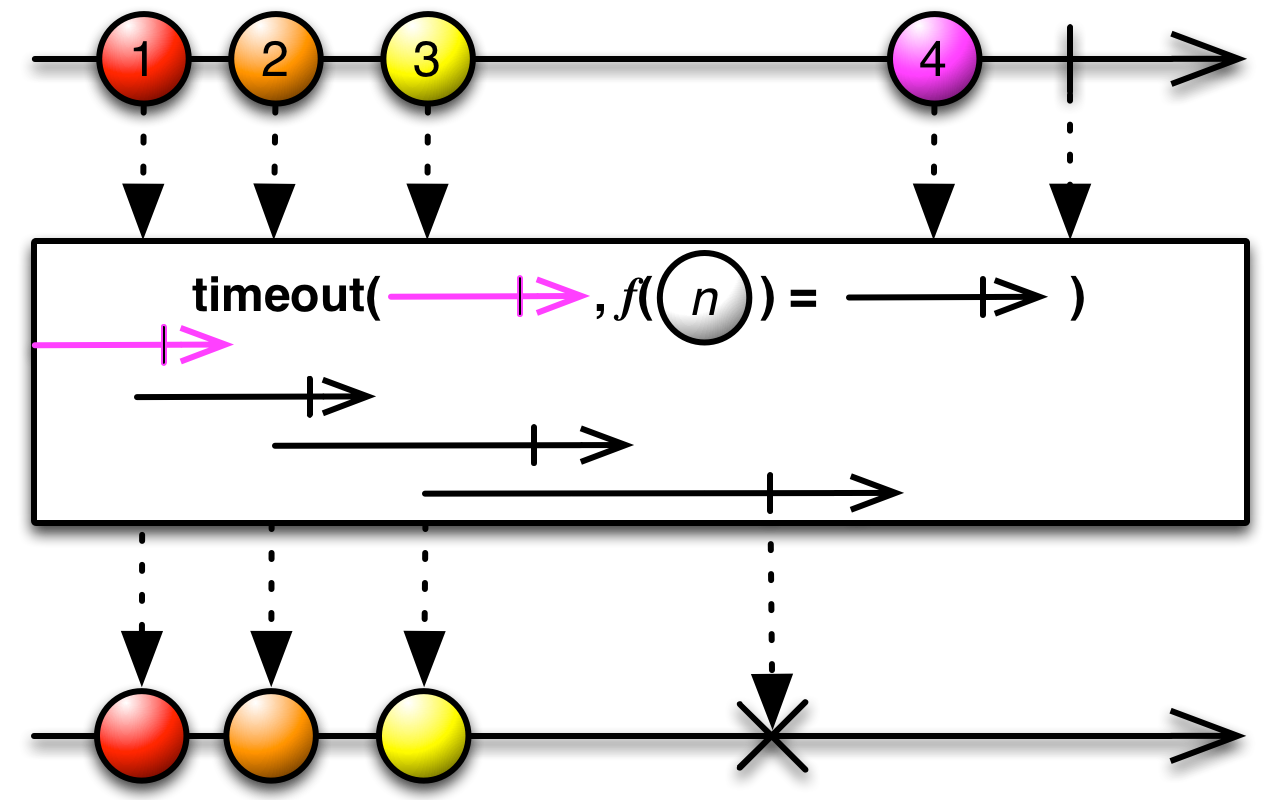
- Scheduler:
- This version of
timeoutoperates by default on theimmediateScheduler.
Parameters
| firstTimeoutIndicator | a function that returns an ObservableSource that determines the timeout window for the first source item |
|---|---|
| itemTimeoutIndicator | a function that returns an ObservableSource for each item emitted by the source ObservableSource and that determines the timeout window in which the subsequent source item must arrive in order to continue the sequence |
Returns
- an Observable that mirrors the source ObservableSource, but notifies observers of a
TimeoutExceptionif either the first item or any subsequent item doesn't arrive within the time windows specified by the timeout selectors
public final Observable<T> timeout (long timeout, TimeUnit timeUnit, Scheduler scheduler)
Returns an Observable that mirrors the source ObservableSource but applies a timeout policy for each emitted
item, where this policy is governed on a specified Scheduler. If the next item isn't emitted within the
specified timeout duration starting from its predecessor, the resulting ObservableSource terminates and
notifies observers of a TimeoutException.
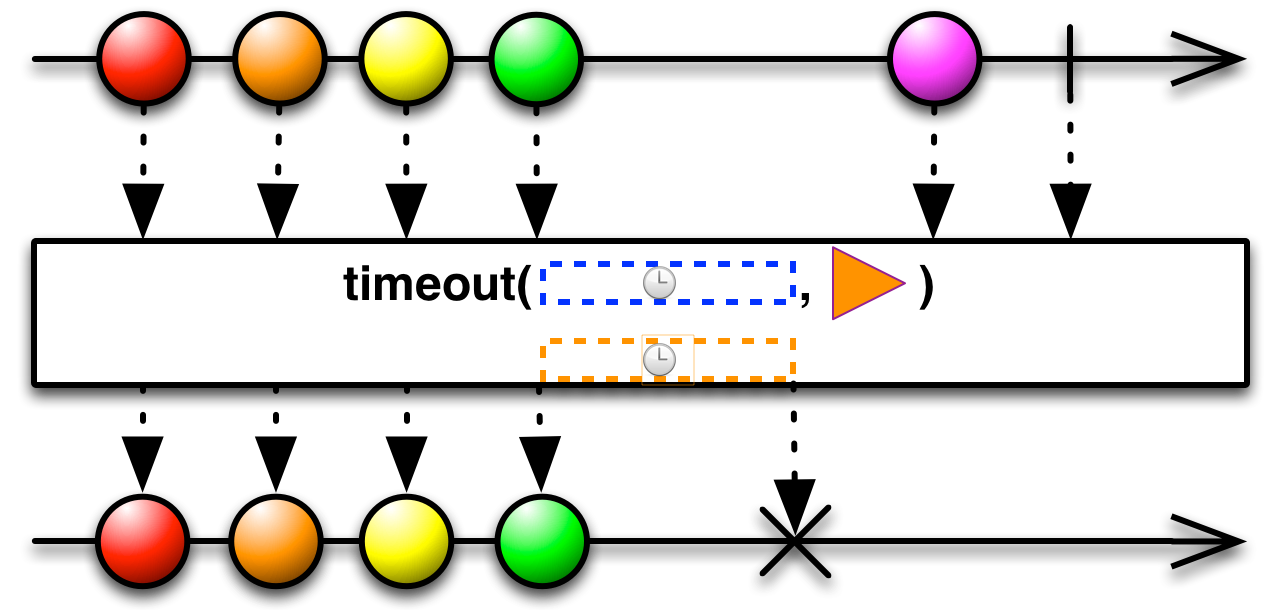
- Scheduler:
- You specify which
Schedulerthis operator will use
Parameters
| timeout | maximum duration between items before a timeout occurs |
|---|---|
| timeUnit | the unit of time that applies to the timeout argument |
| scheduler | the Scheduler to run the timeout timers on |
Returns
- the source ObservableSource modified to notify observers of a
TimeoutExceptionin case of a timeout
public final Observable<T> timeout (Function<? super T, ? extends ObservableSource<V>> itemTimeoutIndicator)
Returns an Observable that mirrors the source ObservableSource, but notifies observers of a
TimeoutException if an item emitted by the source ObservableSource doesn't arrive within a window of
time after the emission of the previous item, where that period of time is measured by an ObservableSource that
is a function of the previous item.
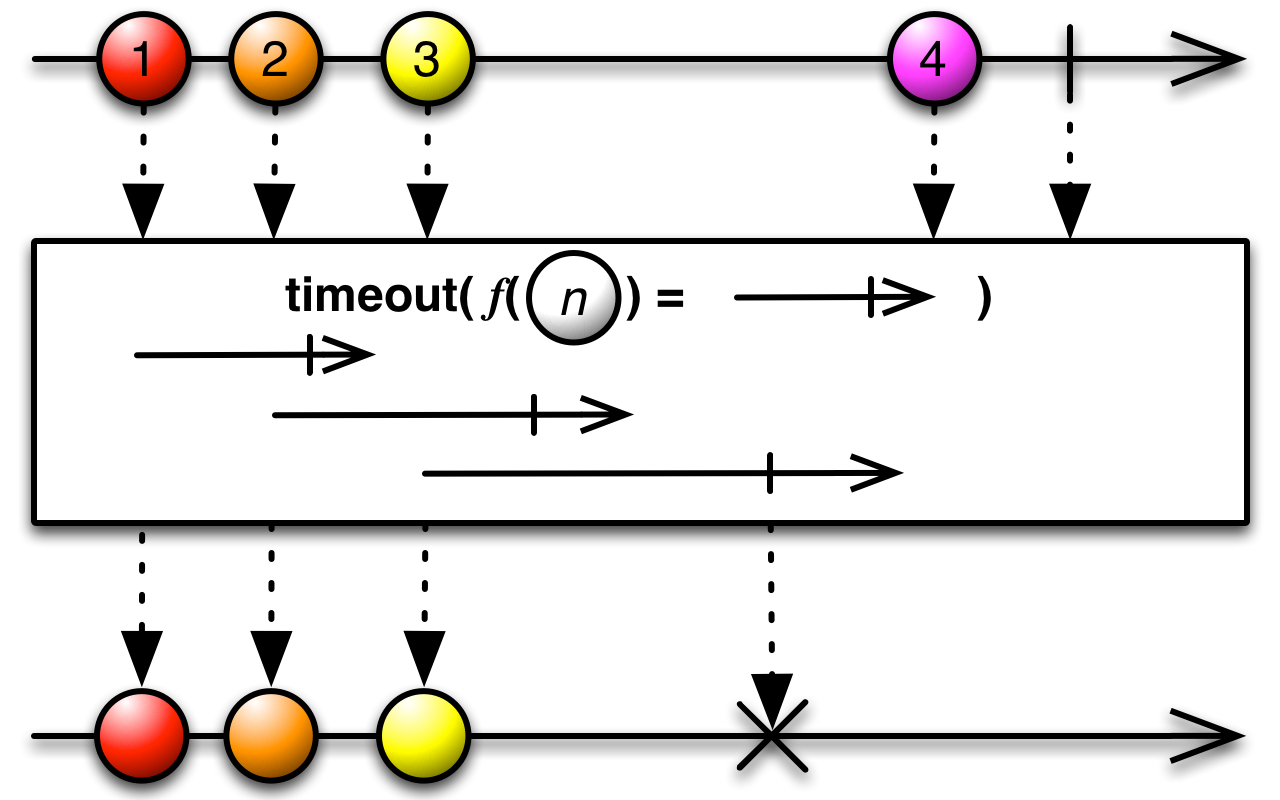
Note: The arrival of the first source item is never timed out.
- Scheduler:
- This version of
timeoutoperates by default on theimmediateScheduler.
Parameters
| itemTimeoutIndicator | a function that returns an ObservableSource for each item emitted by the source ObservableSource and that determines the timeout window for the subsequent item |
|---|
Returns
- an Observable that mirrors the source ObservableSource, but notifies observers of a
TimeoutExceptionif an item emitted by the source ObservableSource takes longer to arrive than the time window defined by the selector for the previously emitted item
public static Observable<Long> timer (long delay, TimeUnit unit)
Returns an Observable that emits 0L after a specified delay, and then completes.

- Scheduler:
timeroperates by default on thecomputationScheduler.
Parameters
| delay | the initial delay before emitting a single 0L |
|---|---|
| unit | time units to use for delay |
Returns
- an Observable that
0Lafter a specified delay, and then completes
public static Observable<Long> timer (long delay, TimeUnit unit, Scheduler scheduler)
Returns an Observable that emits 0L after a specified delay, on a specified Scheduler, and then
completes.

- Scheduler:
- You specify which
Schedulerthis operator will use
Parameters
| delay | the initial delay before emitting a single 0L |
|---|---|
| unit | time units to use for delay |
| scheduler | the Scheduler to use for scheduling the item |
Returns
- an Observable that emits
0Lafter a specified delay, on a specified Scheduler, and then completes
Throws
| NullPointerException | if unit is null, or
if scheduler is null |
|---|
public final Observable<Timed<T>> timestamp (TimeUnit unit, Scheduler scheduler)
Returns an Observable that emits each item emitted by the source ObservableSource, wrapped in a
Timed object whose timestamps are provided by a specified Scheduler.
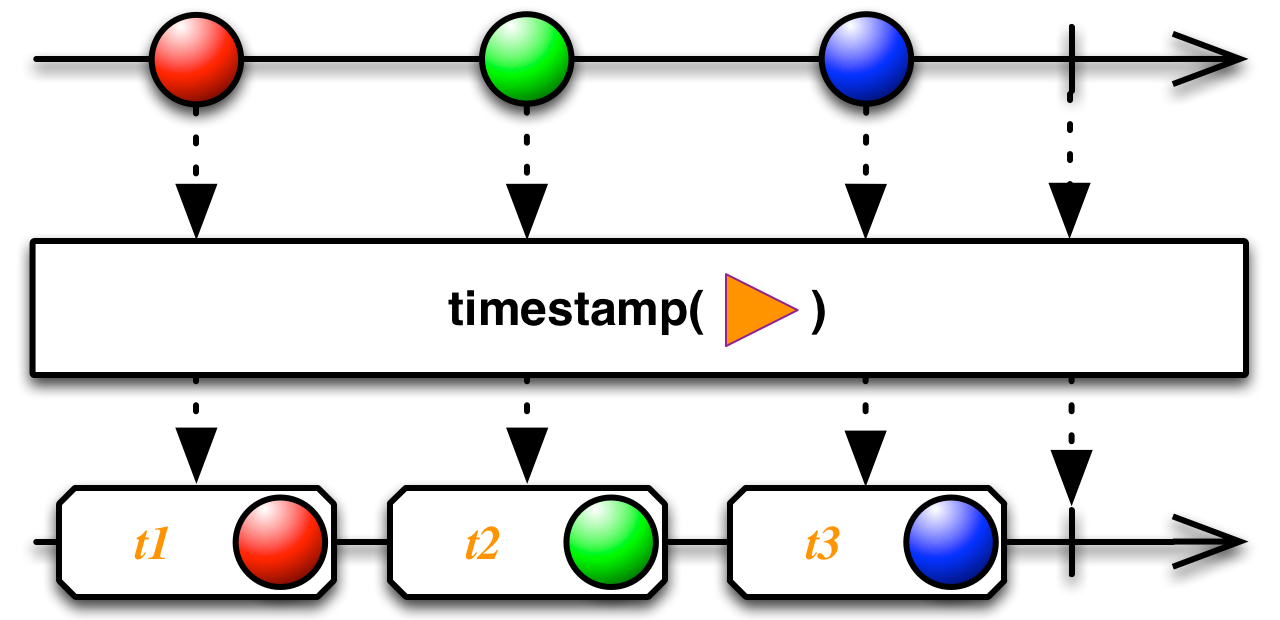
- Scheduler:
- This operator does not operate on any particular scheduler but uses the current time
from the specified
Scheduler.
Parameters
| unit | the time unit for the current time |
|---|---|
| scheduler | the Scheduler to use as a time source |
Returns
- an Observable that emits timestamped items from the source ObservableSource with timestamps provided by
the
scheduler
public final Observable<Timed<T>> timestamp ()
Returns an Observable that emits each item emitted by the source ObservableSource, wrapped in a
Timed object.
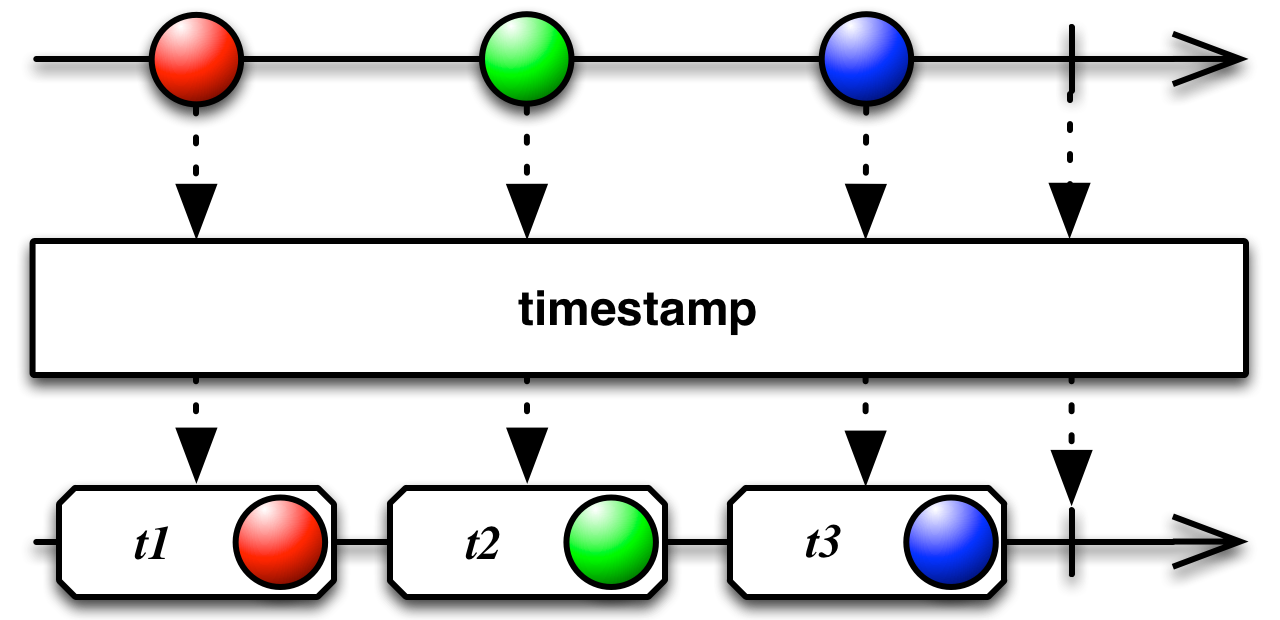
- Scheduler:
timestampdoes not operate on any particular scheduler but uses the current time from thecomputationScheduler.
Returns
- an Observable that emits timestamped items from the source ObservableSource
public final Observable<Timed<T>> timestamp (Scheduler scheduler)
Returns an Observable that emits each item emitted by the source ObservableSource, wrapped in a
Timed object whose timestamps are provided by a specified Scheduler.

- Scheduler:
- This operator does not operate on any particular scheduler but uses the current time
from the specified
Scheduler.
Parameters
| scheduler | the Scheduler to use as a time source |
|---|
Returns
- an Observable that emits timestamped items from the source ObservableSource with timestamps provided by
the
scheduler
public final Observable<Timed<T>> timestamp (TimeUnit unit)
Returns an Observable that emits each item emitted by the source ObservableSource, wrapped in a
Timed object.

- Scheduler:
timestampdoes not operate on any particular scheduler but uses the current time from thecomputationScheduler.
Parameters
| unit | the time unit for the current time |
|---|
Returns
- an Observable that emits timestamped items from the source ObservableSource
public final R to (Function<? super Observable<T>, R> converter)
Calls the specified converter function during assembly time and returns its resulting value.
This allows fluent conversion to any other type.
- Scheduler:
todoes not operate by default on a particularScheduler.
Parameters
| converter | the function that receives the current Observable instance and returns a value |
|---|
Returns
- the value returned by the function
public final Flowable<T> toFlowable (BackpressureStrategy strategy)
Converts the current Observable into a Flowable by applying the specified backpressure strategy.
- Backpressure:
- The operator applies the chosen backpressure strategy of
BackpressureStrategyenum. - Scheduler:
toFlowabledoes not operate by default on a particularScheduler.
Parameters
| strategy | the backpressure strategy to apply |
|---|
Returns
- the new Flowable instance
public final Future<T> toFuture ()
Returns a Future representing the single value emitted by this Observable.
If the Observable emits more than one item, Future will receive an
IllegalArgumentException. If the Observable is empty, Future
will receive an NoSuchElementException.
If the Observable may emit more than one item, use Observable.toList().toFuture().

- Scheduler:
toFuturedoes not operate by default on a particularScheduler.
Returns
- a
Futurethat expects a single item to be emitted by thisObservable
See Also
public final Single<U> toList (Callable<U> collectionSupplier)
Returns a Single that emits a single item, a list composed of all the items emitted by the finite source ObservableSource.
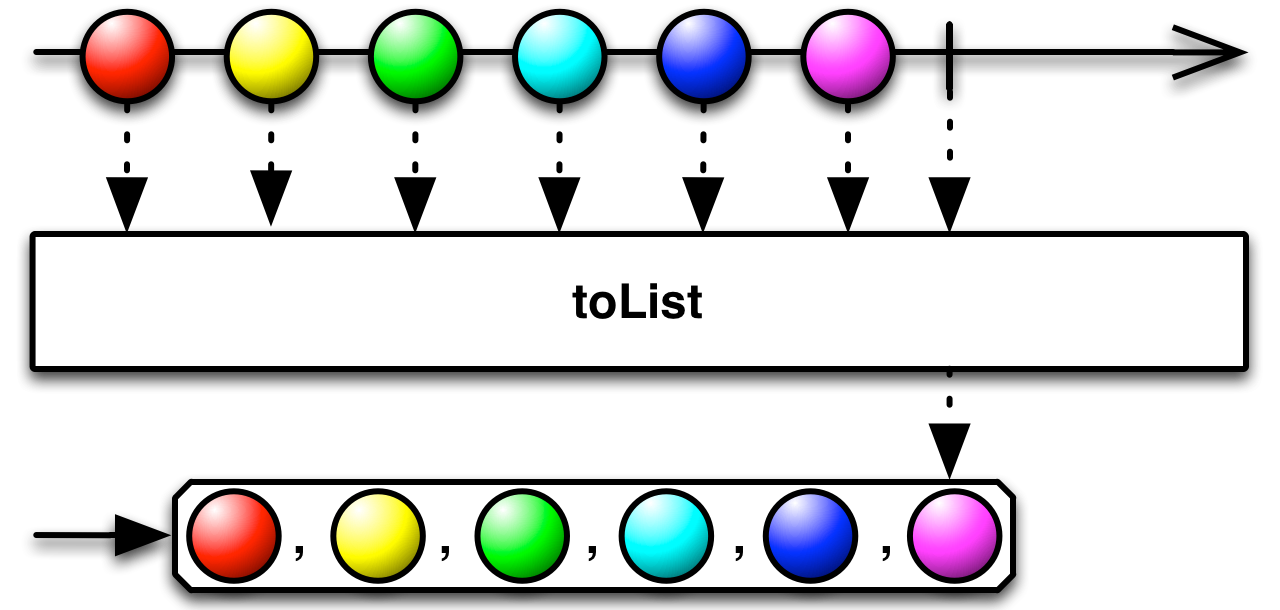
Normally, an ObservableSource that returns multiple items will do so by invoking its Observer's
onNext method for each such item. You can change this behavior, instructing the
ObservableSource to compose a list of all of these items and then to invoke the Observer's onNext
function once, passing it the entire list, by calling the ObservableSource's toList method prior to
calling its subscribe() method.
Note that this operator requires the upstream to signal onComplete for the accumulated collection to
be emitted. Sources that are infinite and never complete will never emit anything through this
operator and an infinite source may lead to a fatal OutOfMemoryError.
- Scheduler:
toListdoes not operate by default on a particularScheduler.
Parameters
| collectionSupplier | the Callable returning the collection (for each individual Observer) to be filled in |
|---|
Returns
- a Single that emits a single item: a List containing all of the items emitted by the source ObservableSource
public final Single<List<T>> toList ()
Returns a Single that emits a single item, a list composed of all the items emitted by the finite source ObservableSource.

Normally, an ObservableSource that returns multiple items will do so by invoking its Observer's
onNext method for each such item. You can change this behavior, instructing the
ObservableSource to compose a list of all of these items and then to invoke the Observer's onNext
function once, passing it the entire list, by calling the ObservableSource's toList method prior to
calling its subscribe() method.
Note that this operator requires the upstream to signal onComplete for the accumulated list to
be emitted. Sources that are infinite and never complete will never emit anything through this
operator and an infinite source may lead to a fatal OutOfMemoryError.
- Scheduler:
toListdoes not operate by default on a particularScheduler.
Returns
- a Single that emits a single item: a List containing all of the items emitted by the source ObservableSource
public final Single<List<T>> toList (int capacityHint)
Returns a Single that emits a single item, a list composed of all the items emitted by the finite source ObservableSource.

Normally, an ObservableSource that returns multiple items will do so by invoking its Observer's
onNext method for each such item. You can change this behavior, instructing the
ObservableSource to compose a list of all of these items and then to invoke the Observer's onNext
function once, passing it the entire list, by calling the ObservableSource's toList method prior to
calling its subscribe() method.
Note that this operator requires the upstream to signal onComplete for the accumulated list to
be emitted. Sources that are infinite and never complete will never emit anything through this
operator and an infinite source may lead to a fatal OutOfMemoryError.
- Scheduler:
toListdoes not operate by default on a particularScheduler.
Parameters
| capacityHint | the number of elements expected from the current Observable |
|---|
Returns
- a Single that emits a single item: a List containing all of the items emitted by the source ObservableSource
public final Single<Map<K, T>> toMap (Function<? super T, ? extends K> keySelector)
Returns a Single that emits a single HashMap containing all items emitted by the source ObservableSource,
mapped by the keys returned by a specified keySelector function.
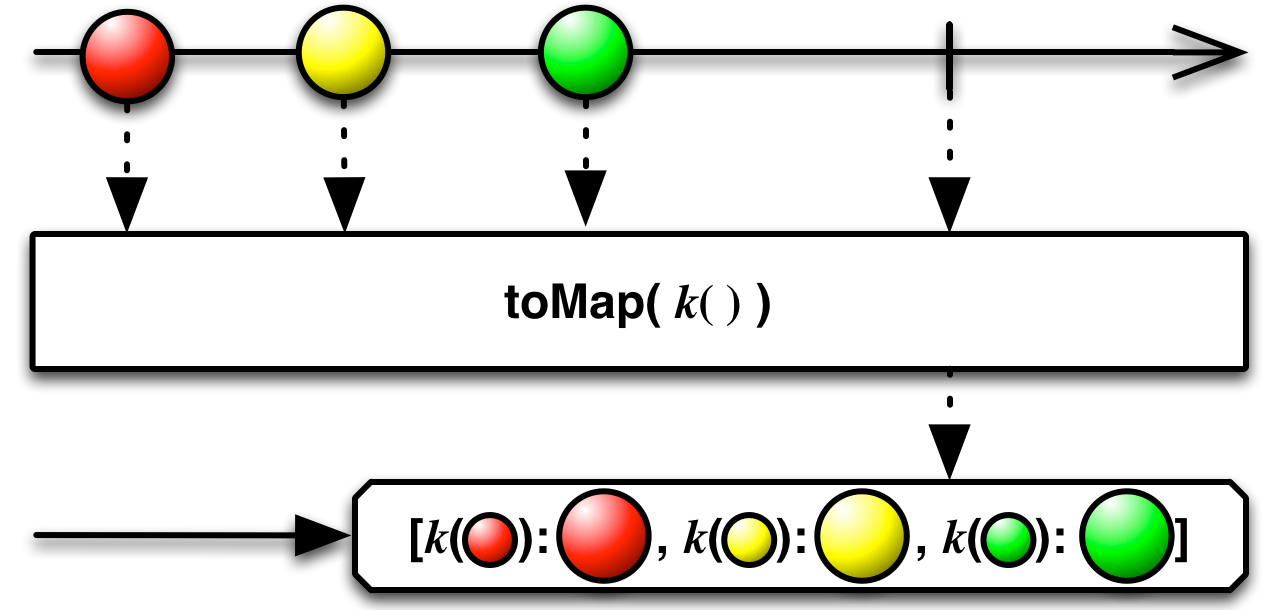
If more than one source item maps to the same key, the HashMap will contain the latest of those items.
- Scheduler:
toMapdoes not operate by default on a particularScheduler.
Parameters
| keySelector | the function that extracts the key from a source item to be used in the HashMap |
|---|
Returns
- a Single that emits a single item: a HashMap containing the mapped items from the source ObservableSource
public final Single<Map<K, V>> toMap (Function<? super T, ? extends K> keySelector, Function<? super T, ? extends V> valueSelector, Callable<? extends Map<K, V>> mapSupplier)
Returns a Single that emits a single Map, returned by a specified mapFactory function, that
contains keys and values extracted from the items emitted by the source ObservableSource.

- Scheduler:
toMapdoes not operate by default on a particularScheduler.
Parameters
| keySelector | the function that extracts the key from a source item to be used in the Map |
|---|---|
| valueSelector | the function that extracts the value from the source items to be used as value in the Map |
| mapSupplier | the function that returns a Map instance to be used |
Returns
- a Single that emits a single item: a Map that contains the mapped items emitted by the source ObservableSource
public final Single<Map<K, V>> toMap (Function<? super T, ? extends K> keySelector, Function<? super T, ? extends V> valueSelector)
Returns a Single that emits a single HashMap containing values corresponding to items emitted by the
source ObservableSource, mapped by the keys returned by a specified keySelector function.

If more than one source item maps to the same key, the HashMap will contain a single entry that corresponds to the latest of those items.
- Scheduler:
toMapdoes not operate by default on a particularScheduler.
Parameters
| keySelector | the function that extracts the key from a source item to be used in the HashMap |
|---|---|
| valueSelector | the function that extracts the value from a source item to be used in the HashMap |
Returns
- a Single that emits a single item: a HashMap containing the mapped items from the source ObservableSource
public final Single<Map<K, Collection<T>>> toMultimap (Function<? super T, ? extends K> keySelector)
Returns a Single that emits a single HashMap that contains an ArrayList of items emitted by the
source ObservableSource keyed by a specified keySelector function.
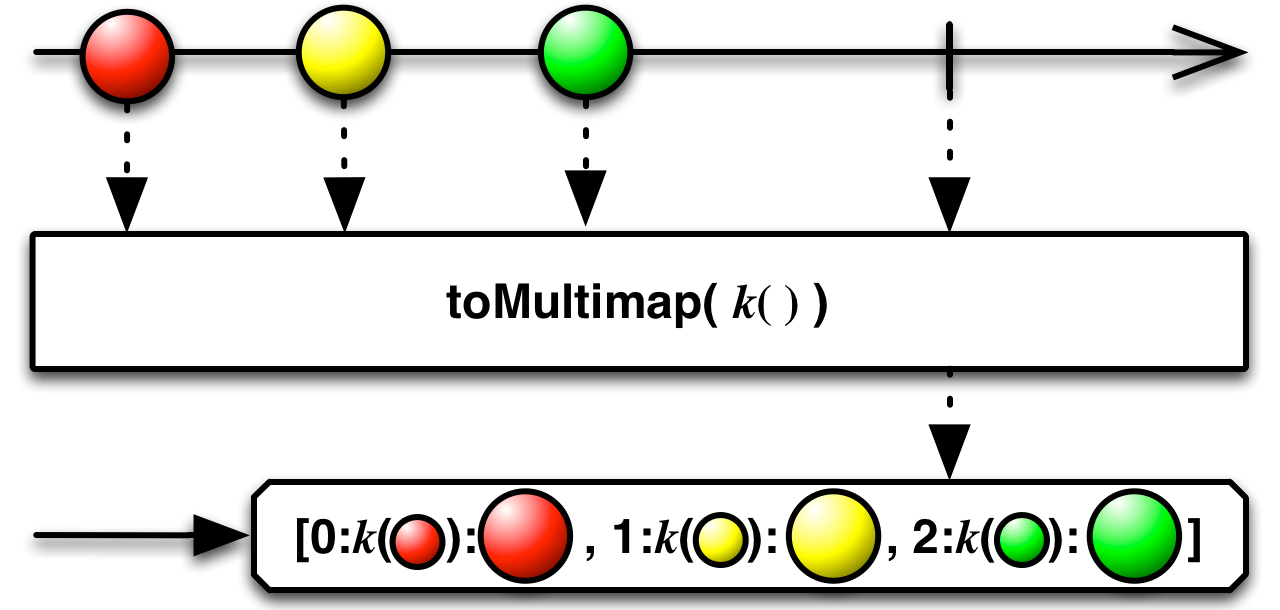
- Scheduler:
toMultimapdoes not operate by default on a particularScheduler.
Parameters
| keySelector | the function that extracts the key from the source items to be used as key in the HashMap |
|---|
Returns
- a Single that emits a single item: a HashMap that contains an ArrayList of items mapped from the source ObservableSource
public final Single<Map<K, Collection<V>>> toMultimap (Function<? super T, ? extends K> keySelector, Function<? super T, ? extends V> valueSelector, Callable<Map<K, Collection<V>>> mapSupplier)
Returns a Single that emits a single Map, returned by a specified mapFactory function, that
contains an ArrayList of values, extracted by a specified valueSelector function from items
emitted by the source ObservableSource and keyed by the keySelector function.

- Scheduler:
toMultimapdoes not operate by default on a particularScheduler.
Parameters
| keySelector | the function that extracts a key from the source items to be used as the key in the Map |
|---|---|
| valueSelector | the function that extracts a value from the source items to be used as the value in the Map |
| mapSupplier | the function that returns a Map instance to be used |
Returns
- a Single that emits a single item: a Map that contains a list items mapped from the source ObservableSource
public final Single<Map<K, Collection<V>>> toMultimap (Function<? super T, ? extends K> keySelector, Function<? super T, ? extends V> valueSelector)
Returns a Single that emits a single HashMap that contains an ArrayList of values extracted by a
specified valueSelector function from items emitted by the source ObservableSource, keyed by a
specified keySelector function.

- Scheduler:
toMultimapdoes not operate by default on a particularScheduler.
Parameters
| keySelector | the function that extracts a key from the source items to be used as key in the HashMap |
|---|---|
| valueSelector | the function that extracts a value from the source items to be used as value in the HashMap |
Returns
- a Single that emits a single item: a HashMap that contains an ArrayList of items mapped from the source ObservableSource
public final Single<Map<K, Collection<V>>> toMultimap (Function<? super T, ? extends K> keySelector, Function<? super T, ? extends V> valueSelector, Callable<? extends Map<K, Collection<V>>> mapSupplier, Function<? super K, ? extends Collection<? super V>> collectionFactory)
Returns a Single that emits a single Map, returned by a specified mapFactory function, that
contains a custom collection of values, extracted by a specified valueSelector function from
items emitted by the source ObservableSource, and keyed by the keySelector function.

- Scheduler:
toMultimapdoes not operate by default on a particularScheduler.
Parameters
| keySelector | the function that extracts a key from the source items to be used as the key in the Map |
|---|---|
| valueSelector | the function that extracts a value from the source items to be used as the value in the Map |
| mapSupplier | the function that returns a Map instance to be used |
| collectionFactory | the function that returns a Collection instance for a particular key to be used in the Map |
Returns
- a Single that emits a single item: a Map that contains the collection of mapped items from the source ObservableSource
public final Single<List<T>> toSortedList (Comparator<? super T> comparator, int capacityHint)
Returns a Single that emits a list that contains the items emitted by the source ObservableSource, in a sorted order based on a specified comparison function.
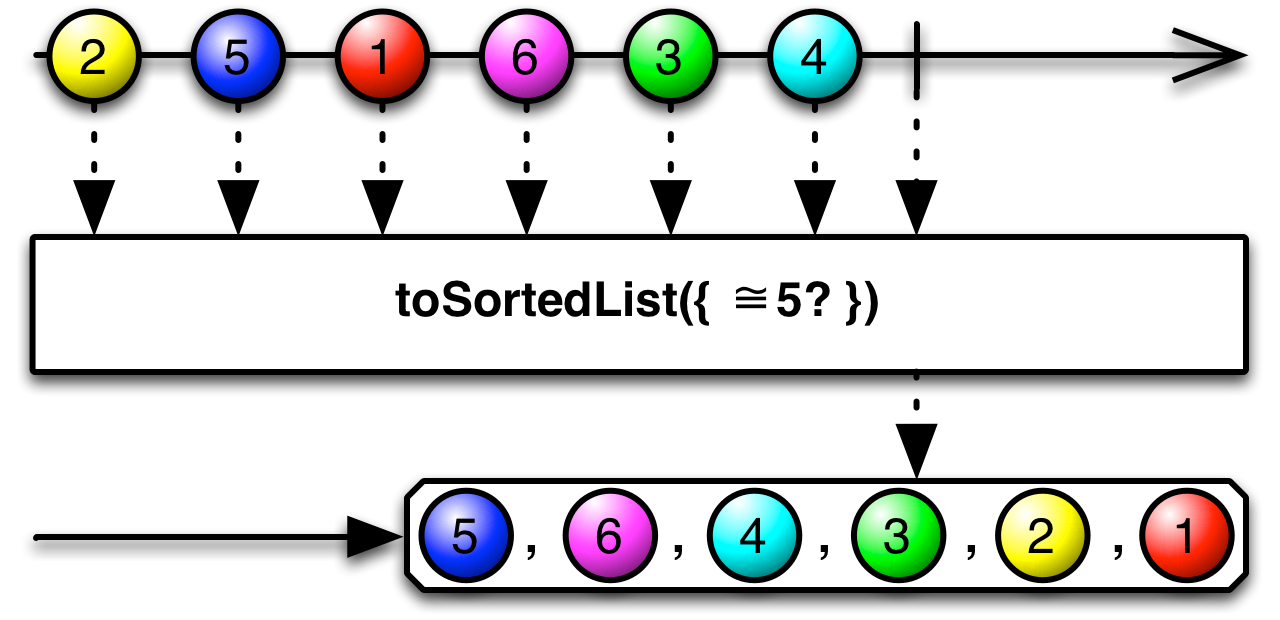
- Scheduler:
toSortedListdoes not operate by default on a particularScheduler.
Parameters
| comparator | a function that compares two items emitted by the source ObservableSource and returns an Integer that indicates their sort order |
|---|---|
| capacityHint | the initial capacity of the ArrayList used to accumulate items before sorting |
Returns
- a Single that emits a list that contains the items emitted by the source ObservableSource in sorted order
public final Single<List<T>> toSortedList (Comparator<? super T> comparator)
Returns a Single that emits a list that contains the items emitted by the source ObservableSource, in a sorted order based on a specified comparison function.

- Scheduler:
toSortedListdoes not operate by default on a particularScheduler.
Parameters
| comparator | a function that compares two items emitted by the source ObservableSource and returns an Integer that indicates their sort order |
|---|
Returns
- a Single that emits a list that contains the items emitted by the source ObservableSource in sorted order
public final Single<List<T>> toSortedList ()
Returns a Single that emits a list that contains the items emitted by the source ObservableSource, in a
sorted order. Each item emitted by the ObservableSource must implement Comparable with respect to all
other items in the sequence.
If any item emitted by this Observable does not implement Comparable with respect to
all other items emitted by this Observable, no items will be emitted and the
sequence is terminated with a ClassCastException.
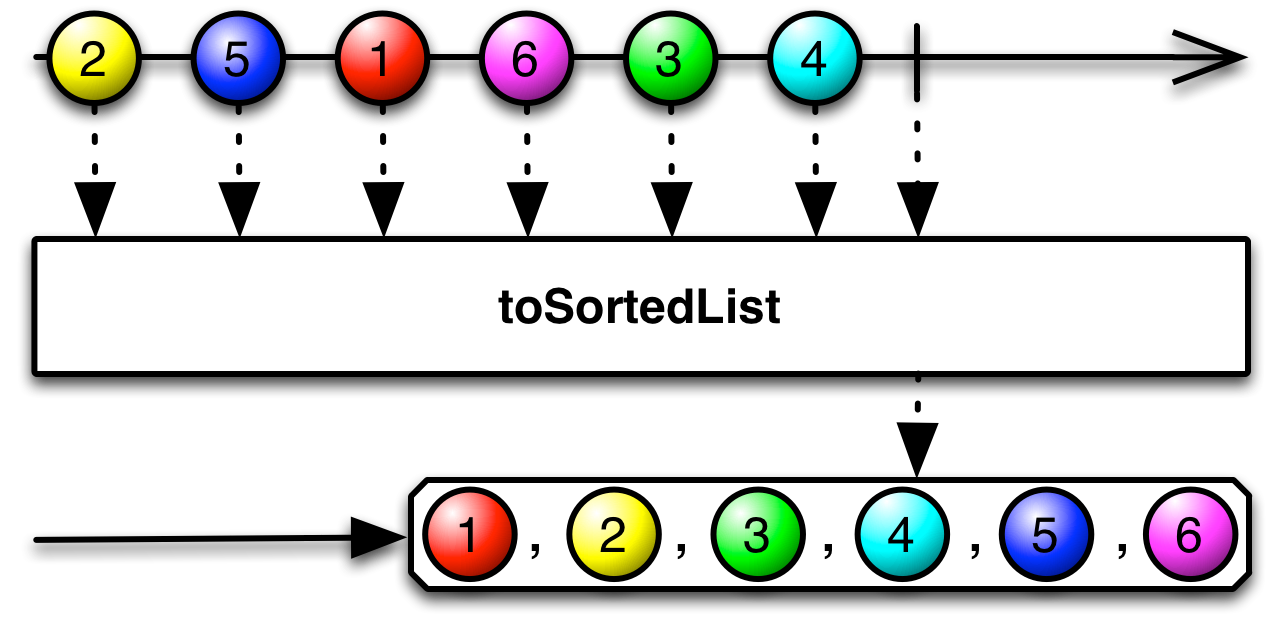
- Scheduler:
toSortedListdoes not operate by default on a particularScheduler.
Returns
- a Single that emits a list that contains the items emitted by the source ObservableSource in sorted order
public final Single<List<T>> toSortedList (int capacityHint)
Returns a Single that emits a list that contains the items emitted by the source ObservableSource, in a
sorted order. Each item emitted by the ObservableSource must implement Comparable with respect to all
other items in the sequence.
If any item emitted by this Observable does not implement Comparable with respect to
all other items emitted by this Observable, no items will be emitted and the
sequence is terminated with a ClassCastException.

- Scheduler:
toSortedListdoes not operate by default on a particularScheduler.
Parameters
| capacityHint | the initial capacity of the ArrayList used to accumulate items before sorting |
|---|
Returns
- a Single that emits a list that contains the items emitted by the source ObservableSource in sorted order
public static Observable<T> unsafeCreate (ObservableSource<T> onSubscribe)
Create an Observable by wrapping an ObservableSource which has to be implemented according to the Reactive-Streams-based Observable specification by handling cancellation correctly; no safeguards are provided by the Observable itself.
- Scheduler:
unsafeCreateby default doesn't operate on any particularScheduler.
Parameters
| onSubscribe | the ObservableSource instance to wrap |
|---|
Returns
- the new Observable instance
public final Observable<T> unsubscribeOn (Scheduler scheduler)
Modifies the source ObservableSource so that subscribers will dispose it on a specified
Scheduler.
- Scheduler:
- You specify which
Schedulerthis operator will use
Parameters
| scheduler | the Scheduler to perform the call to dispose() of the upstream Disposable |
|---|
Returns
- the source ObservableSource modified so that its dispose() calls happen on the specified
Scheduler
public static Observable<T> using (Callable<? extends D> resourceSupplier, Function<? super D, ? extends ObservableSource<? extends T>> sourceSupplier, Consumer<? super D> disposer, boolean eager)
Constructs an ObservableSource that creates a dependent resource object which is disposed of just before
termination if you have set disposeEagerly to true and a dispose() call does not occur
before termination. Otherwise resource disposal will occur on a dispose() call. Eager disposal is
particularly appropriate for a synchronous ObservableSource that reuses resources. disposeAction will
only be called once per subscription.
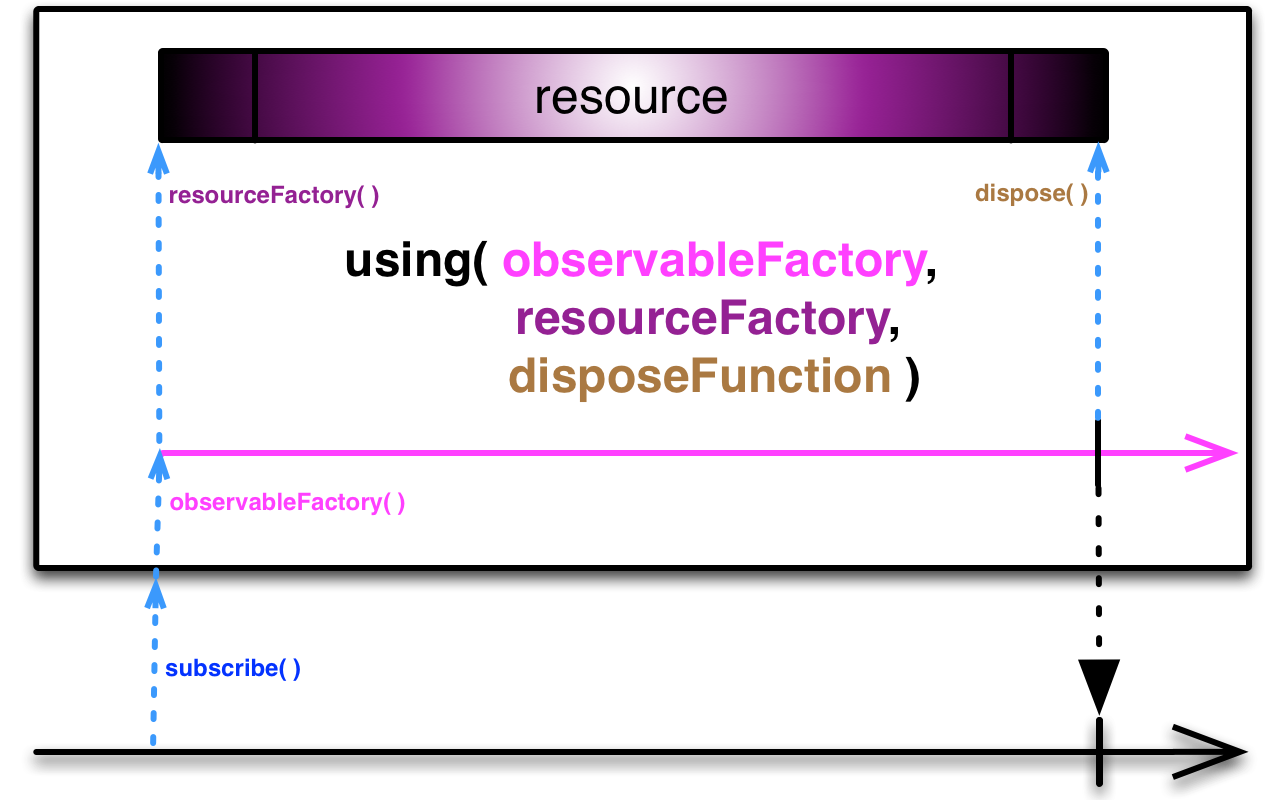
- Scheduler:
usingdoes not operate by default on a particularScheduler.
Parameters
| resourceSupplier | the factory function to create a resource object that depends on the ObservableSource |
|---|---|
| sourceSupplier | the factory function to create an ObservableSource |
| disposer | the function that will dispose of the resource |
| eager | if true then disposal will happen either on a dispose() call or just before emission of
a terminal event (onComplete or onError). |
Returns
- the ObservableSource whose lifetime controls the lifetime of the dependent resource object
public static Observable<T> using (Callable<? extends D> resourceSupplier, Function<? super D, ? extends ObservableSource<? extends T>> sourceSupplier, Consumer<? super D> disposer)
Constructs an ObservableSource that creates a dependent resource object which is disposed of when the downstream calls dispose().

- Scheduler:
usingdoes not operate by default on a particularScheduler.
Parameters
| resourceSupplier | the factory function to create a resource object that depends on the ObservableSource |
|---|---|
| sourceSupplier | the factory function to create an ObservableSource |
| disposer | the function that will dispose of the resource |
Returns
- the ObservableSource whose lifetime controls the lifetime of the dependent resource object
public final Observable<Observable<T>> window (Callable<? extends ObservableSource<B>> boundary)
Returns an Observable that emits windows of items it collects from the source ObservableSource. The resulting
ObservableSource emits connected, non-overlapping windows. It emits the current window and opens a new one
whenever the ObservableSource produced by the specified closingIndicator emits an item.
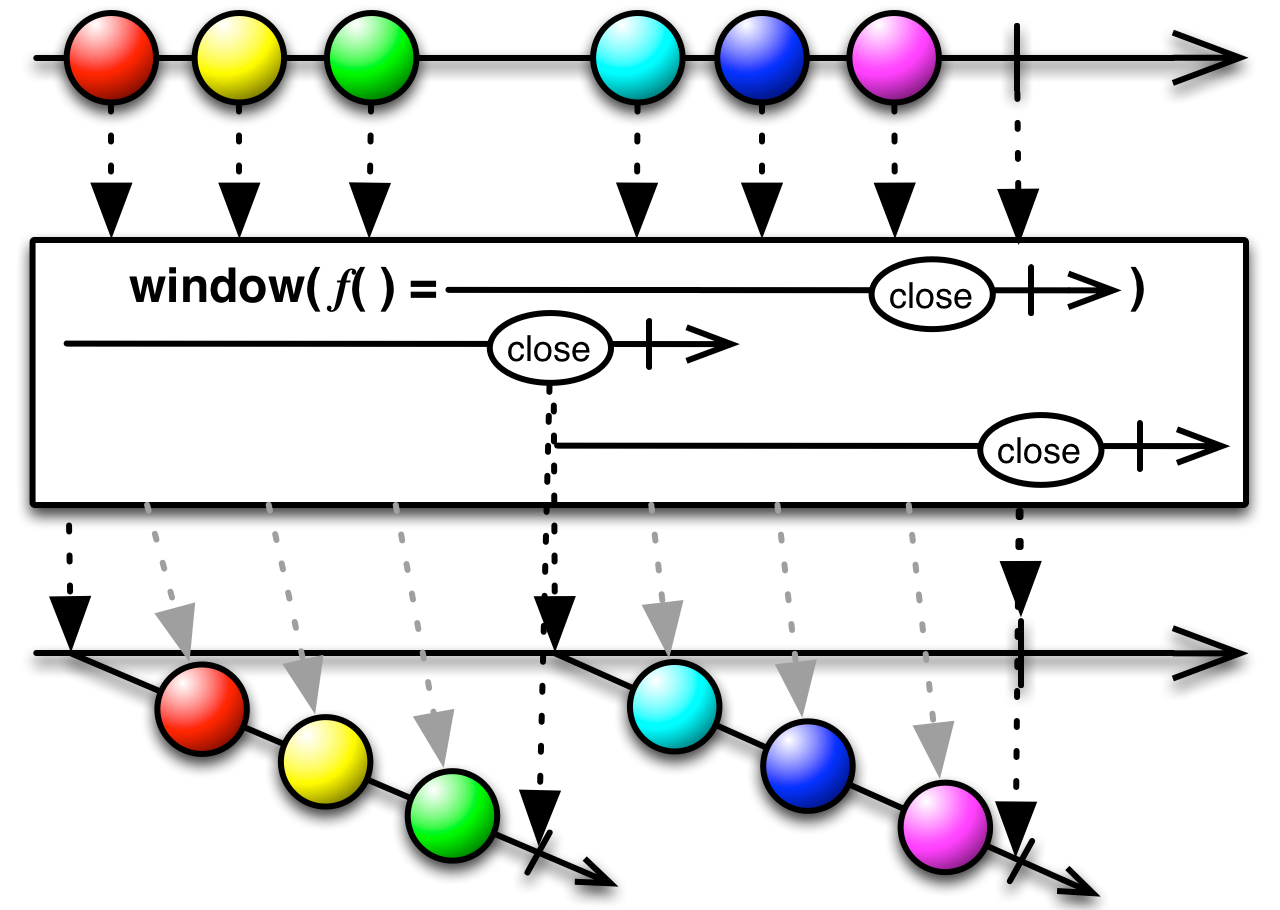
- Scheduler:
- This version of
windowdoes not operate by default on a particularScheduler.
Parameters
| boundary | a Callable that returns an ObservableSource that governs the boundary between windows.
When the source ObservableSource emits an item, window emits the current window and begins
a new one. |
|---|
Returns
- an Observable that emits connected, non-overlapping windows of items from the source ObservableSource
whenever
closingIndicatoremits an item
public final Observable<Observable<T>> window (long timespan, long timeskip, TimeUnit unit, Scheduler scheduler)
Returns an Observable that emits windows of items it collects from the source ObservableSource. The resulting
ObservableSource starts a new window periodically, as determined by the timeskip argument. It emits
each window after a fixed timespan, specified by the timespan argument. When the source
ObservableSource completes or ObservableSource completes or encounters an error, the resulting ObservableSource emits the
current window and propagates the notification from the source ObservableSource.
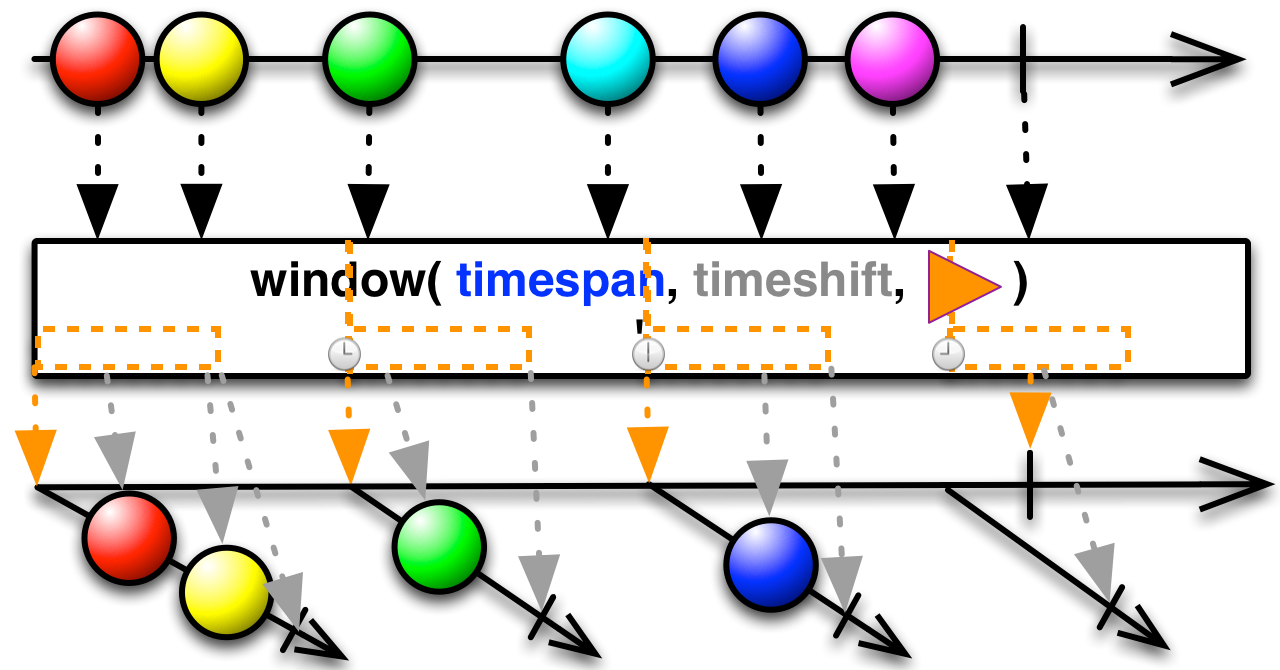
- Scheduler:
- You specify which
Schedulerthis operator will use
Parameters
| timespan | the period of time each window collects items before it should be emitted |
|---|---|
| timeskip | the period of time after which a new window will be created |
| unit | the unit of time that applies to the timespan and timeskip arguments |
| scheduler | the Scheduler to use when determining the end and start of a window |
Returns
- an Observable that emits new windows periodically as a fixed timespan elapses
public final Observable<Observable<T>> window (long timespan, TimeUnit unit, Scheduler scheduler, long count, boolean restart)
Returns an Observable that emits windows of items it collects from the source ObservableSource. The resulting
ObservableSource emits connected, non-overlapping windows, each of a fixed duration specified by the
timespan argument or a maximum size specified by the count argument (whichever is reached
first). When the source ObservableSource completes or encounters an error, the resulting ObservableSource emits the
current window and propagates the notification from the source ObservableSource.
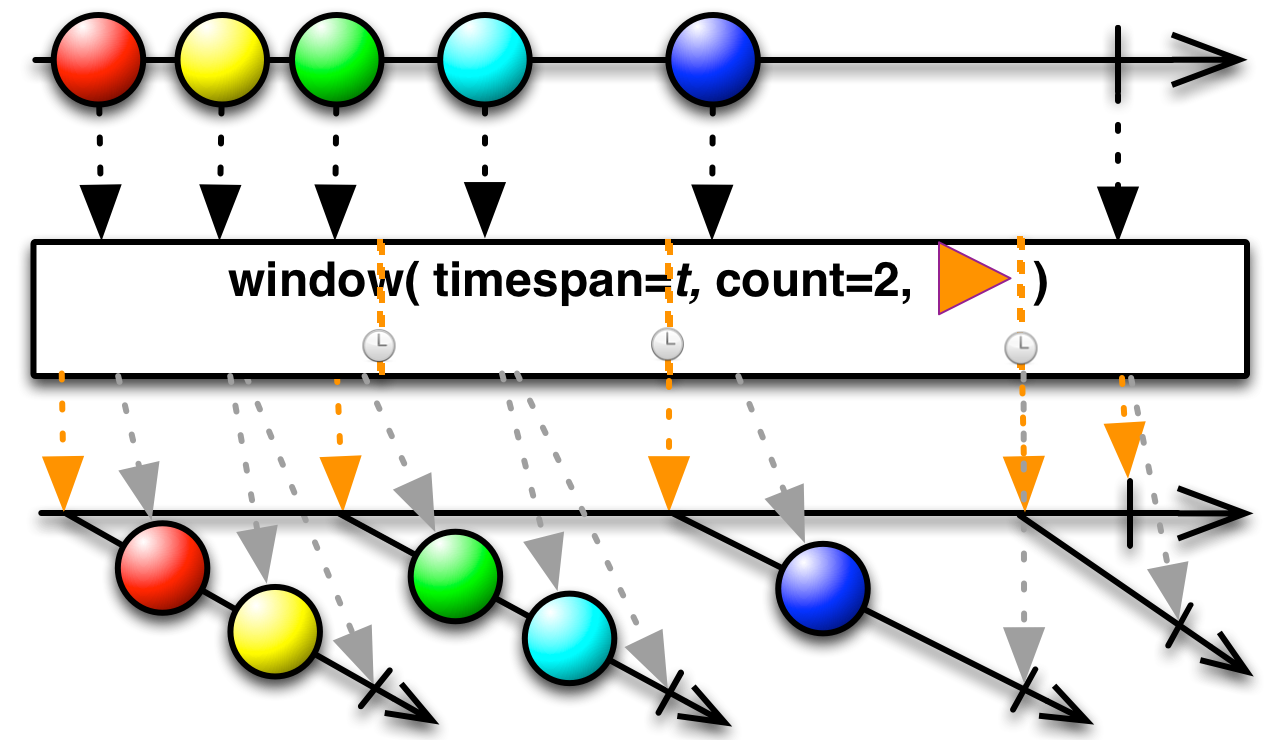
- Scheduler:
- You specify which
Schedulerthis operator will use
Parameters
| timespan | the period of time each window collects items before it should be emitted and replaced with a new window |
|---|---|
| unit | the unit of time which applies to the timespan argument |
| scheduler | the Scheduler to use when determining the end and start of a window |
| count | the maximum size of each window before it should be emitted |
| restart | if true, when a window reaches the capacity limit, the timer is restarted as well |
Returns
- an Observable that emits connected, non-overlapping windows of items from the source ObservableSource that were emitted during a fixed duration of time or when the window has reached maximum capacity (whichever occurs first)
public final Observable<Observable<T>> window (ObservableSource<B> boundary)
Returns an Observable that emits non-overlapping windows of items it collects from the source ObservableSource where the boundary of each window is determined by the items emitted from a specified boundary-governing ObservableSource.
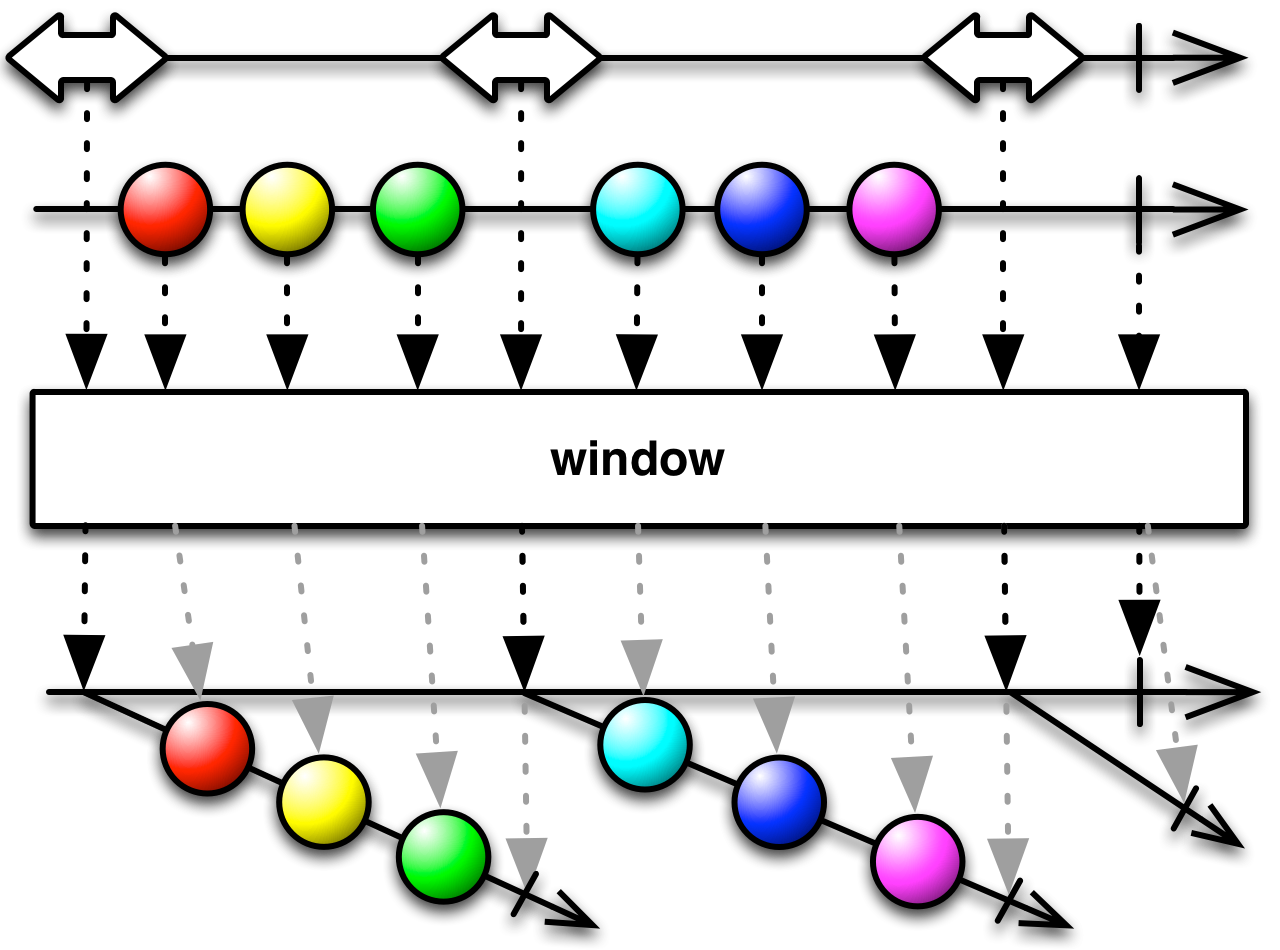
- Scheduler:
- This version of
windowdoes not operate by default on a particularScheduler.
Parameters
| boundary | an ObservableSource whose emitted items close and open windows |
|---|
Returns
- an Observable that emits non-overlapping windows of items it collects from the source ObservableSource
where the boundary of each window is determined by the items emitted from the
boundaryObservableSource
public final Observable<Observable<T>> window (long timespan, TimeUnit unit, Scheduler scheduler, long count, boolean restart, int bufferSize)
Returns an Observable that emits windows of items it collects from the source ObservableSource. The resulting
ObservableSource emits connected, non-overlapping windows, each of a fixed duration specified by the
timespan argument or a maximum size specified by the count argument (whichever is reached
first). When the source ObservableSource completes or encounters an error, the resulting ObservableSource emits the
current window and propagates the notification from the source ObservableSource.

- Scheduler:
- You specify which
Schedulerthis operator will use
Parameters
| timespan | the period of time each window collects items before it should be emitted and replaced with a new window |
|---|---|
| unit | the unit of time which applies to the timespan argument |
| scheduler | the Scheduler to use when determining the end and start of a window |
| count | the maximum size of each window before it should be emitted |
| restart | if true, when a window reaches the capacity limit, the timer is restarted as well |
| bufferSize | the capacity hint for the buffer in the inner windows |
Returns
- an Observable that emits connected, non-overlapping windows of items from the source ObservableSource that were emitted during a fixed duration of time or when the window has reached maximum capacity (whichever occurs first)
public final Observable<Observable<T>> window (long timespan, TimeUnit unit, Scheduler scheduler)
Returns an Observable that emits windows of items it collects from the source ObservableSource. The resulting
ObservableSource emits connected, non-overlapping windows, each of a fixed duration as specified by the
timespan argument. When the source ObservableSource completes or encounters an error, the resulting
ObservableSource emits the current window and propagates the notification from the source ObservableSource.
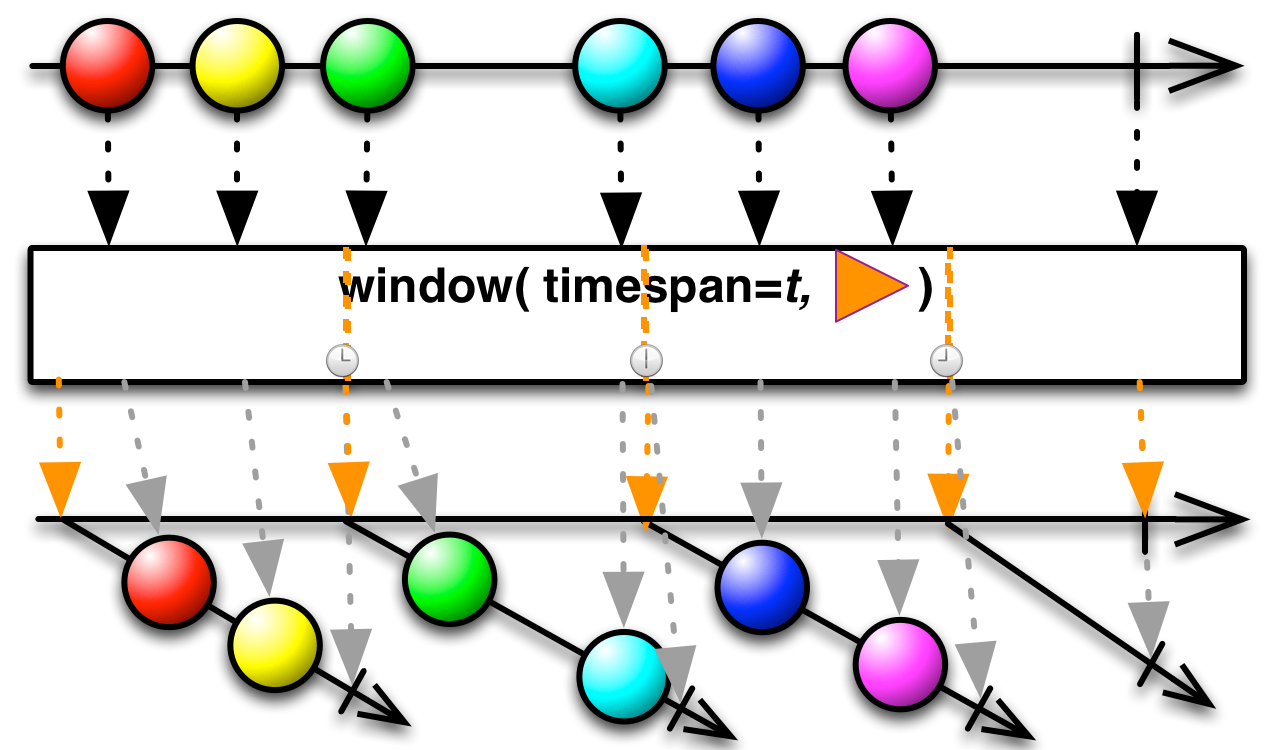
- Scheduler:
- You specify which
Schedulerthis operator will use
Parameters
| timespan | the period of time each window collects items before it should be emitted and replaced with a new window |
|---|---|
| unit | the unit of time which applies to the timespan argument |
| scheduler | the Scheduler to use when determining the end and start of a window |
Returns
- an Observable that emits connected, non-overlapping windows containing items emitted by the source ObservableSource within a fixed duration
public final Observable<Observable<T>> window (ObservableSource<B> boundary, int bufferSize)
Returns an Observable that emits non-overlapping windows of items it collects from the source ObservableSource where the boundary of each window is determined by the items emitted from a specified boundary-governing ObservableSource.

- Scheduler:
- This version of
windowdoes not operate by default on a particularScheduler.
Parameters
| boundary | an ObservableSource whose emitted items close and open windows |
|---|---|
| bufferSize | the capacity hint for the buffer in the inner windows |
Returns
- an Observable that emits non-overlapping windows of items it collects from the source ObservableSource
where the boundary of each window is determined by the items emitted from the
boundaryObservableSource
public final Observable<Observable<T>> window (long timespan, long timeskip, TimeUnit unit, Scheduler scheduler, int bufferSize)
Returns an Observable that emits windows of items it collects from the source ObservableSource. The resulting
ObservableSource starts a new window periodically, as determined by the timeskip argument. It emits
each window after a fixed timespan, specified by the timespan argument. When the source
ObservableSource completes or ObservableSource completes or encounters an error, the resulting ObservableSource emits the
current window and propagates the notification from the source ObservableSource.

- Scheduler:
- You specify which
Schedulerthis operator will use
Parameters
| timespan | the period of time each window collects items before it should be emitted |
|---|---|
| timeskip | the period of time after which a new window will be created |
| unit | the unit of time that applies to the timespan and timeskip arguments |
| scheduler | the Scheduler to use when determining the end and start of a window |
| bufferSize | the capacity hint for the buffer in the inner windows |
Returns
- an Observable that emits new windows periodically as a fixed timespan elapses
public final Observable<Observable<T>> window (Callable<? extends ObservableSource<B>> boundary, int bufferSize)
Returns an Observable that emits windows of items it collects from the source ObservableSource. The resulting
ObservableSource emits connected, non-overlapping windows. It emits the current window and opens a new one
whenever the ObservableSource produced by the specified closingIndicator emits an item.

- Scheduler:
- This version of
windowdoes not operate by default on a particularScheduler.
Parameters
| boundary | a Callable that returns an ObservableSource that governs the boundary between windows.
When the source ObservableSource emits an item, window emits the current window and begins
a new one. |
|---|---|
| bufferSize | the capacity hint for the buffer in the inner windows |
Returns
- an Observable that emits connected, non-overlapping windows of items from the source ObservableSource
whenever
closingIndicatoremits an item
public final Observable<Observable<T>> window (long count)
Returns an Observable that emits windows of items it collects from the source ObservableSource. The resulting
ObservableSource emits connected, non-overlapping windows, each containing count items. When the source
ObservableSource completes or encounters an error, the resulting ObservableSource emits the current window and
propagates the notification from the source ObservableSource.
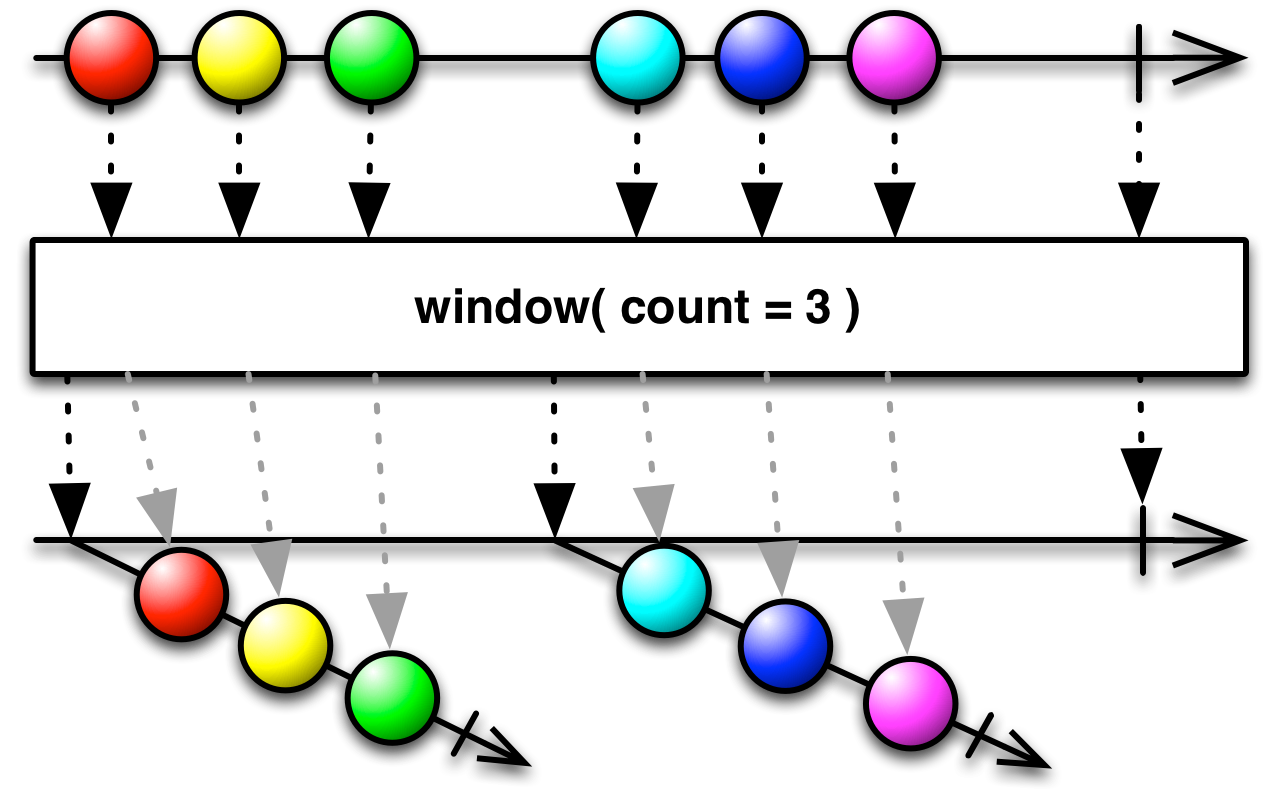
- Scheduler:
- This version of
windowdoes not operate by default on a particularScheduler.
Parameters
| count | the maximum size of each window before it should be emitted |
|---|
Returns
- an Observable that emits connected, non-overlapping windows, each containing at most
countitems from the source ObservableSource
Throws
| IllegalArgumentException | if either count is non-positive |
|---|
public final Observable<Observable<T>> window (long count, long skip)
Returns an Observable that emits windows of items it collects from the source ObservableSource. The resulting
ObservableSource emits windows every skip items, each containing no more than count items. When
the source ObservableSource completes or encounters an error, the resulting ObservableSource emits the current window
and propagates the notification from the source ObservableSource.
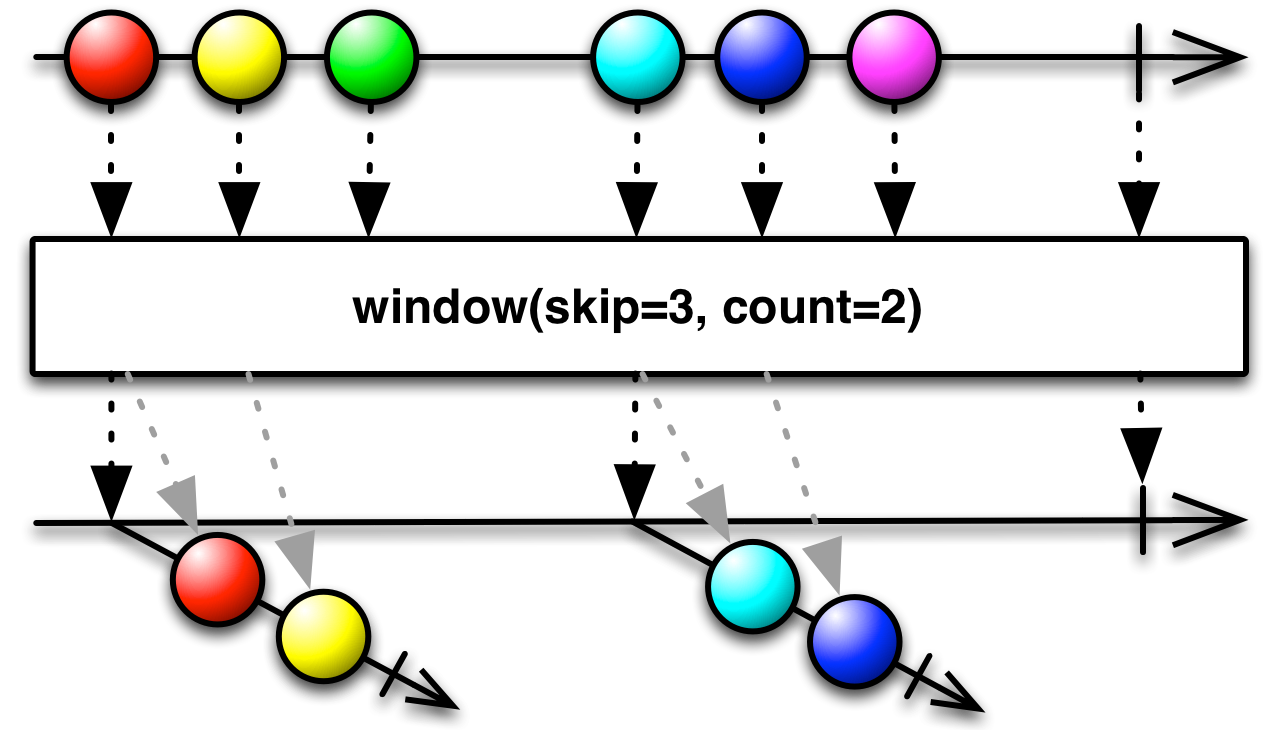
- Scheduler:
- This version of
windowdoes not operate by default on a particularScheduler.
Parameters
| count | the maximum size of each window before it should be emitted |
|---|---|
| skip | how many items need to be skipped before starting a new window. Note that if skip and
count are equal this is the same operation as window(long). |
Returns
- an Observable that emits windows every
skipitems containing at mostcountitems from the source ObservableSource
Throws
| IllegalArgumentException | if either count or skip is non-positive |
|---|
public final Observable<Observable<T>> window (ObservableSource<U> openingIndicator, Function<? super U, ? extends ObservableSource<V>> closingIndicator)
Returns an Observable that emits windows of items it collects from the source ObservableSource. The resulting
ObservableSource emits windows that contain those items emitted by the source ObservableSource between the time when
the openingIndicator ObservableSource emits an item and when the ObservableSource returned by
closingIndicator emits an item.
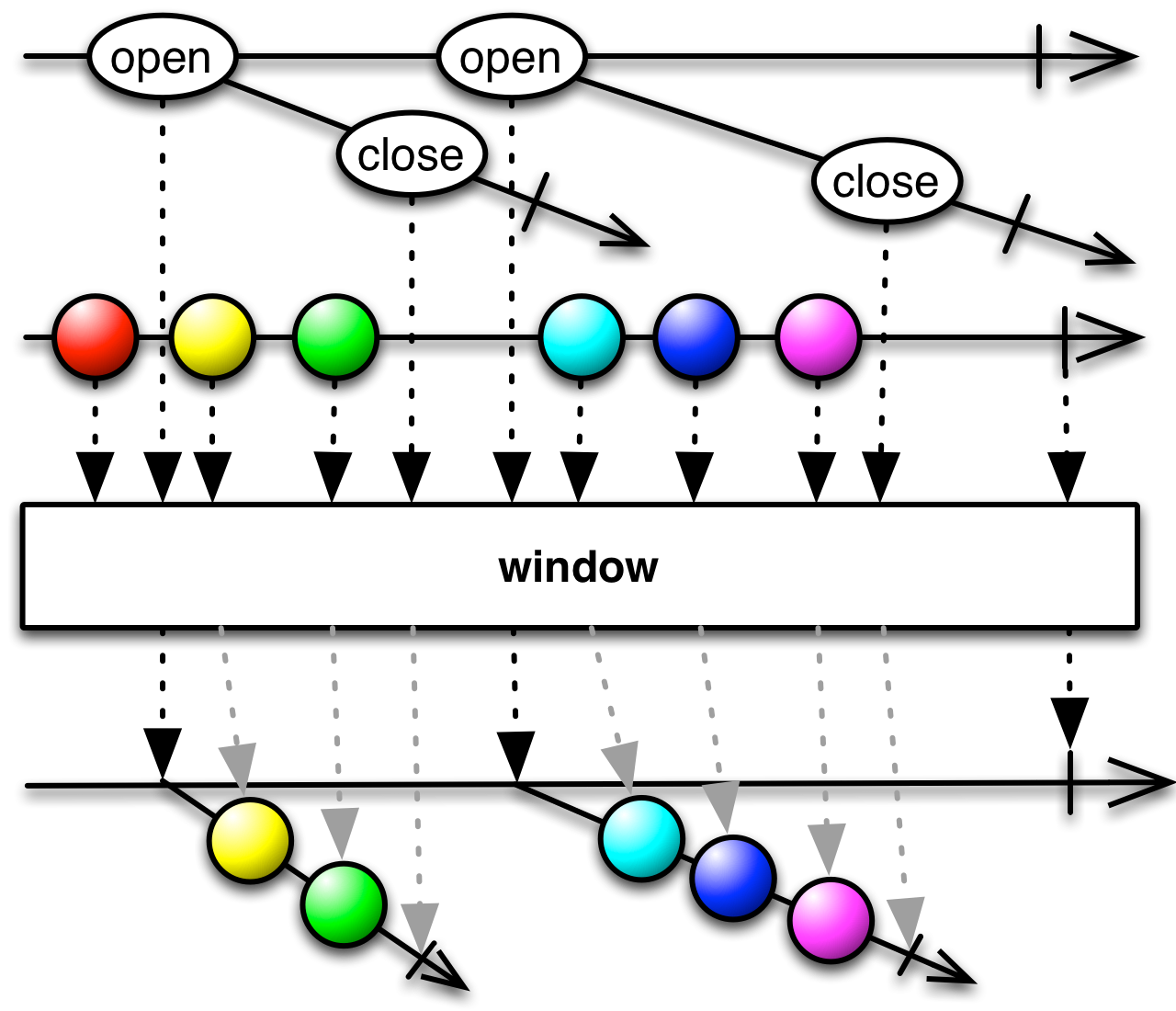
- Scheduler:
- This version of
windowdoes not operate by default on a particularScheduler.
Parameters
| openingIndicator | an ObservableSource that, when it emits an item, causes another window to be created |
|---|---|
| closingIndicator | a Function that produces an ObservableSource for every window created. When this ObservableSource
emits an item, the associated window is closed and emitted |
Returns
- an Observable that emits windows of items emitted by the source ObservableSource that are governed by the specified window-governing ObservableSources
public final Observable<Observable<T>> window (long timespan, long timeskip, TimeUnit unit)
Returns an Observable that emits windows of items it collects from the source ObservableSource. The resulting
ObservableSource starts a new window periodically, as determined by the timeskip argument. It emits
each window after a fixed timespan, specified by the timespan argument. When the source
ObservableSource completes or ObservableSource completes or encounters an error, the resulting ObservableSource emits the
current window and propagates the notification from the source ObservableSource.
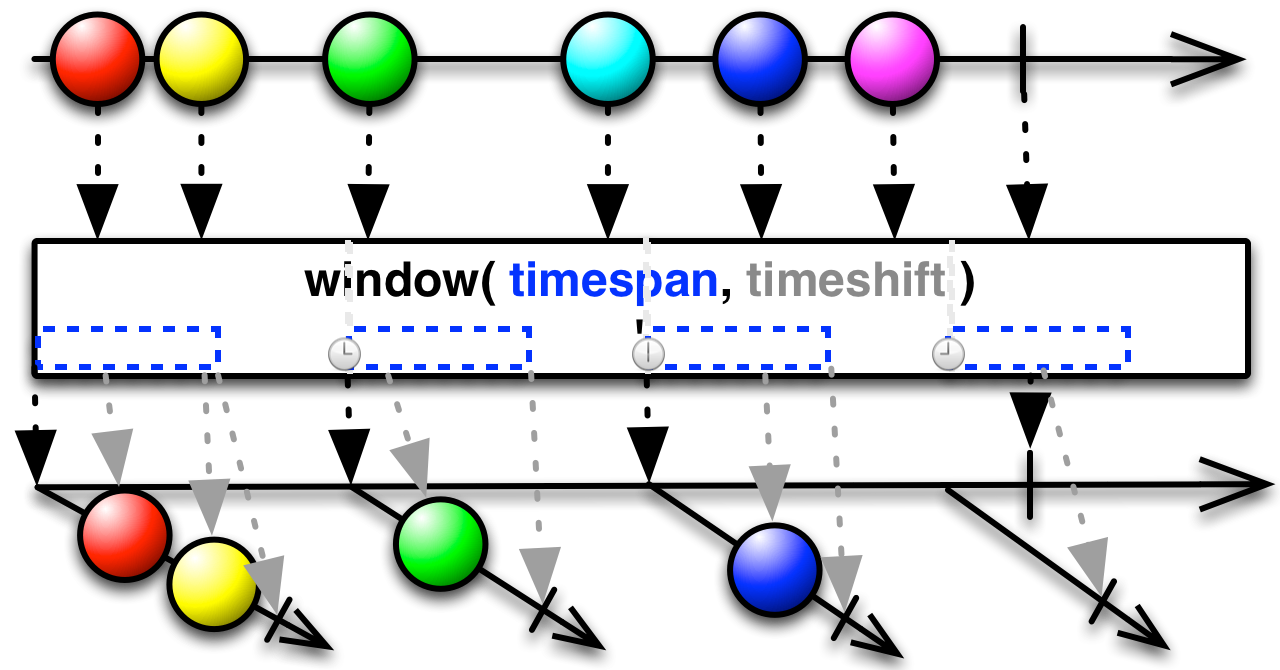
- Scheduler:
- This version of
windowoperates by default on thecomputationScheduler.
Parameters
| timespan | the period of time each window collects items before it should be emitted |
|---|---|
| timeskip | the period of time after which a new window will be created |
| unit | the unit of time that applies to the timespan and timeskip arguments |
Returns
- an Observable that emits new windows periodically as a fixed timespan elapses
public final Observable<Observable<T>> window (ObservableSource<U> openingIndicator, Function<? super U, ? extends ObservableSource<V>> closingIndicator, int bufferSize)
Returns an Observable that emits windows of items it collects from the source ObservableSource. The resulting
ObservableSource emits windows that contain those items emitted by the source ObservableSource between the time when
the openingIndicator ObservableSource emits an item and when the ObservableSource returned by
closingIndicator emits an item.

- Scheduler:
- This version of
windowdoes not operate by default on a particularScheduler.
Parameters
| openingIndicator | an ObservableSource that, when it emits an item, causes another window to be created |
|---|---|
| closingIndicator | a Function that produces an ObservableSource for every window created. When this ObservableSource
emits an item, the associated window is closed and emitted |
| bufferSize | the capacity hint for the buffer in the inner windows |
Returns
- an Observable that emits windows of items emitted by the source ObservableSource that are governed by the specified window-governing ObservableSources
public final Observable<Observable<T>> window (long timespan, TimeUnit unit, long count)
Returns an Observable that emits windows of items it collects from the source ObservableSource. The resulting
ObservableSource emits connected, non-overlapping windows, each of a fixed duration as specified by the
timespan argument or a maximum size as specified by the count argument (whichever is
reached first). When the source ObservableSource completes or encounters an error, the resulting ObservableSource
emits the current window and propagates the notification from the source ObservableSource.
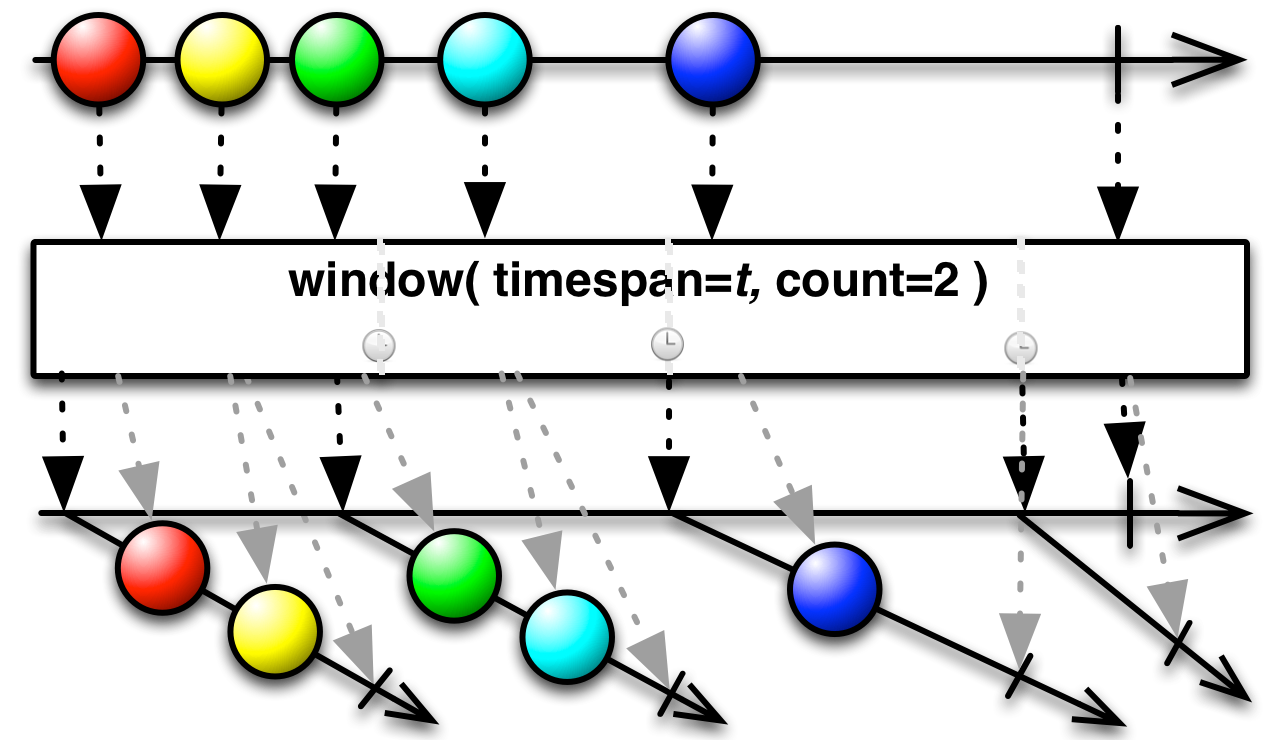
- Scheduler:
- This version of
windowoperates by default on thecomputationScheduler.
Parameters
| timespan | the period of time each window collects items before it should be emitted and replaced with a new window |
|---|---|
| unit | the unit of time that applies to the timespan argument |
| count | the maximum size of each window before it should be emitted |
Returns
- an Observable that emits connected, non-overlapping windows of items from the source ObservableSource that were emitted during a fixed duration of time or when the window has reached maximum capacity (whichever occurs first)
public final Observable<Observable<T>> window (long timespan, TimeUnit unit, long count, boolean restart)
Returns an Observable that emits windows of items it collects from the source ObservableSource. The resulting
ObservableSource emits connected, non-overlapping windows, each of a fixed duration as specified by the
timespan argument or a maximum size as specified by the count argument (whichever is
reached first). When the source ObservableSource completes or encounters an error, the resulting ObservableSource
emits the current window and propagates the notification from the source ObservableSource.

- Scheduler:
- This version of
windowoperates by default on thecomputationScheduler.
Parameters
| timespan | the period of time each window collects items before it should be emitted and replaced with a new window |
|---|---|
| unit | the unit of time that applies to the timespan argument |
| count | the maximum size of each window before it should be emitted |
| restart | if true, when a window reaches the capacity limit, the timer is restarted as well |
Returns
- an Observable that emits connected, non-overlapping windows of items from the source ObservableSource that were emitted during a fixed duration of time or when the window has reached maximum capacity (whichever occurs first)
public final Observable<Observable<T>> window (long timespan, TimeUnit unit, Scheduler scheduler, long count)
Returns an Observable that emits windows of items it collects from the source ObservableSource. The resulting
ObservableSource emits connected, non-overlapping windows, each of a fixed duration specified by the
timespan argument or a maximum size specified by the count argument (whichever is reached
first). When the source ObservableSource completes or encounters an error, the resulting ObservableSource emits the
current window and propagates the notification from the source ObservableSource.

- Scheduler:
- You specify which
Schedulerthis operator will use
Parameters
| timespan | the period of time each window collects items before it should be emitted and replaced with a new window |
|---|---|
| unit | the unit of time which applies to the timespan argument |
| scheduler | the Scheduler to use when determining the end and start of a window |
| count | the maximum size of each window before it should be emitted |
Returns
- an Observable that emits connected, non-overlapping windows of items from the source ObservableSource that were emitted during a fixed duration of time or when the window has reached maximum capacity (whichever occurs first)
public final Observable<Observable<T>> window (long timespan, TimeUnit unit)
Returns an Observable that emits windows of items it collects from the source ObservableSource. The resulting
ObservableSource emits connected, non-overlapping windows, each of a fixed duration specified by the
timespan argument. When the source ObservableSource completes or encounters an error, the resulting
ObservableSource emits the current window and propagates the notification from the source ObservableSource.
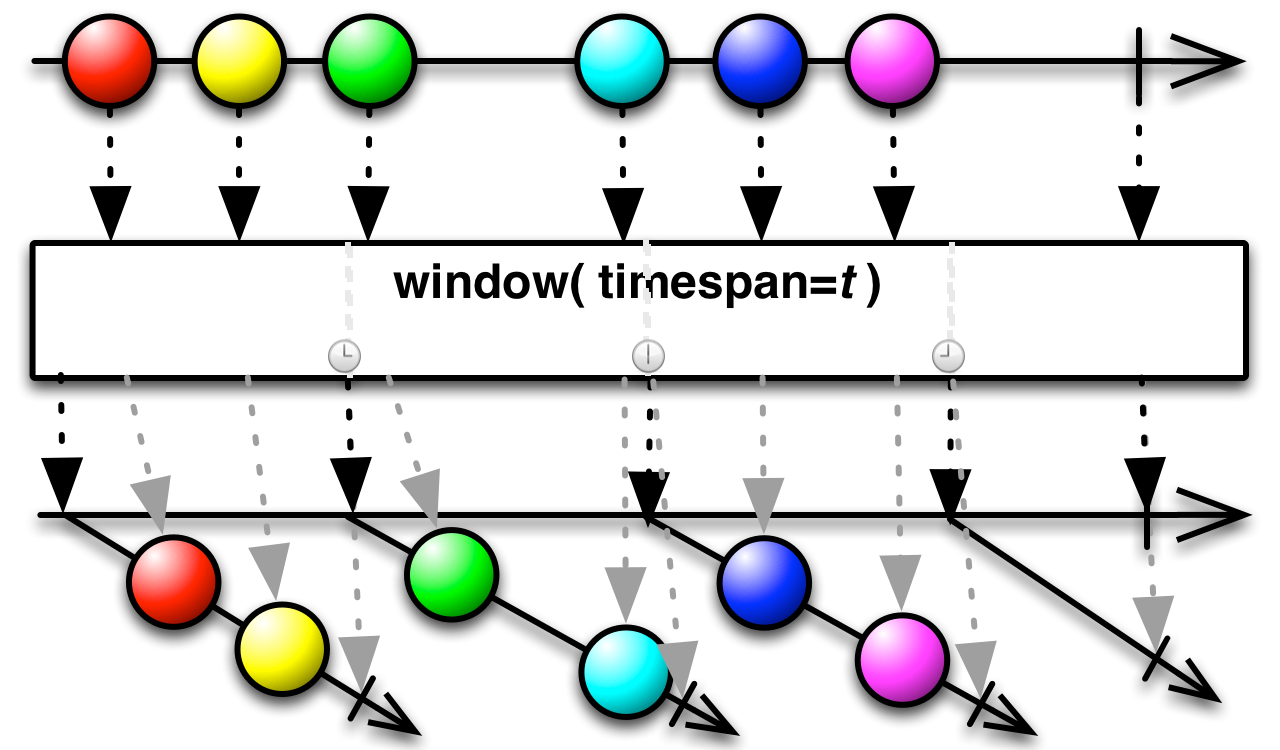
- Scheduler:
- This version of
windowoperates by default on thecomputationScheduler.
Parameters
| timespan | the period of time each window collects items before it should be emitted and replaced with a new window |
|---|---|
| unit | the unit of time that applies to the timespan argument |
Returns
- an Observable that emits connected, non-overlapping windows representing items emitted by the source ObservableSource during fixed, consecutive durations
public final Observable<Observable<T>> window (long count, long skip, int bufferSize)
Returns an Observable that emits windows of items it collects from the source ObservableSource. The resulting
ObservableSource emits windows every skip items, each containing no more than count items. When
the source ObservableSource completes or encounters an error, the resulting ObservableSource emits the current window
and propagates the notification from the source ObservableSource.

- Scheduler:
- This version of
windowdoes not operate by default on a particularScheduler.
Parameters
| count | the maximum size of each window before it should be emitted |
|---|---|
| skip | how many items need to be skipped before starting a new window. Note that if skip and
count are equal this is the same operation as window(long). |
| bufferSize | the capacity hint for the buffer in the inner windows |
Returns
- an Observable that emits windows every
skipitems containing at mostcountitems from the source ObservableSource
Throws
| IllegalArgumentException | if either count or skip is non-positive |
|---|
public final Observable<R> withLatestFrom (Iterable<? extends ObservableSource<?>> others, Function<? super Object[], R> combiner)
Combines the value emission from this ObservableSource with the latest emissions from the other ObservableSources via a function to produce the output item.
Note that this operator doesn't emit anything until all other sources have produced at least one value. The resulting emission only happens when this ObservableSource emits (and not when any of the other sources emit, unlike combineLatest). If a source doesn't produce any value and just completes, the sequence is completed immediately.
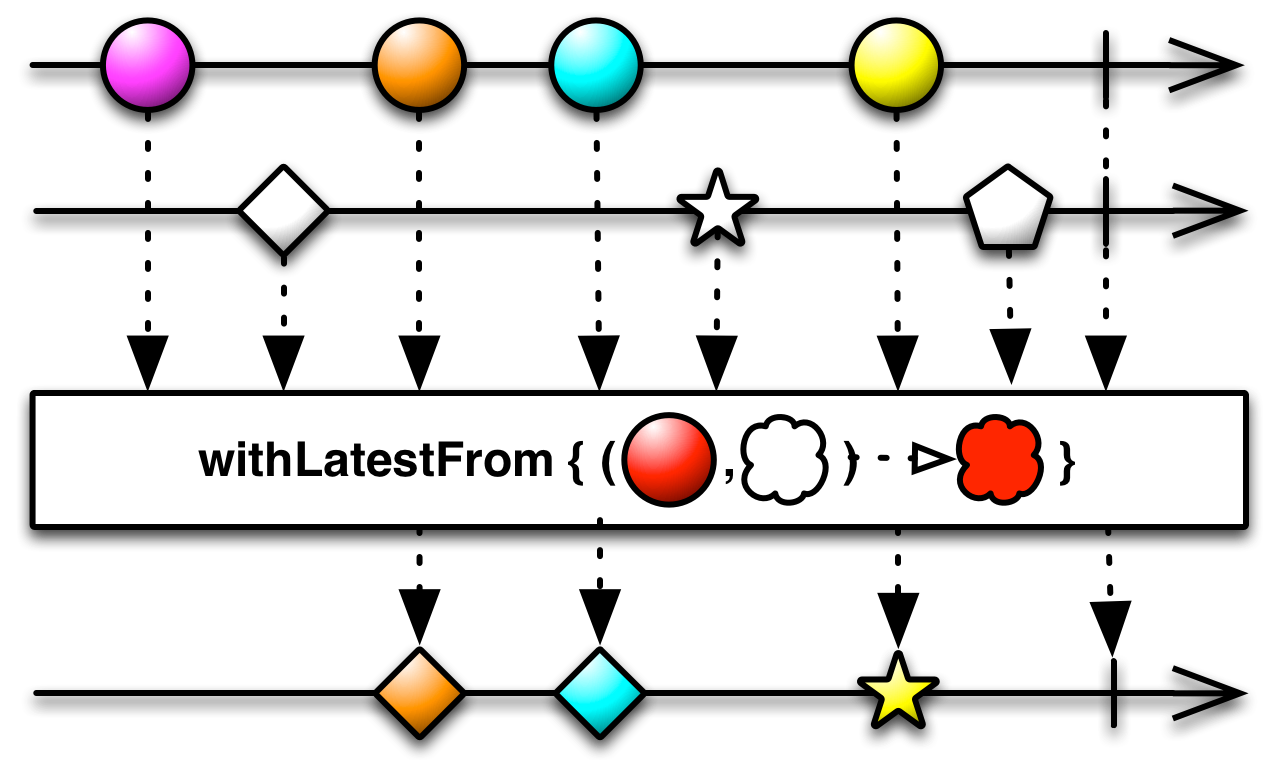
- Scheduler:
- This operator does not operate by default on a particular
Scheduler.
Parameters
| others | the iterable of other sources |
|---|---|
| combiner | the function called with an array of values from each participating ObservableSource |
Returns
- the new ObservableSource instance
public final Observable<R> withLatestFrom (ObservableSource<T1> o1, ObservableSource<T2> o2, Function3<? super T, ? super T1, ? super T2, R> combiner)
Combines the value emission from this ObservableSource with the latest emissions from the other ObservableSources via a function to produce the output item.
Note that this operator doesn't emit anything until all other sources have produced at least one value. The resulting emission only happens when this ObservableSource emits (and not when any of the other sources emit, unlike combineLatest). If a source doesn't produce any value and just completes, the sequence is completed immediately.

- Scheduler:
- This operator does not operate by default on a particular
Scheduler.
Parameters
| o1 | the first other ObservableSource |
|---|---|
| o2 | the second other ObservableSource |
| combiner | the function called with an array of values from each participating ObservableSource |
Returns
- the new ObservableSource instance
public final Observable<R> withLatestFrom (ObservableSource<T1> o1, ObservableSource<T2> o2, ObservableSource<T3> o3, ObservableSource<T4> o4, Function5<? super T, ? super T1, ? super T2, ? super T3, ? super T4, R> combiner)
Combines the value emission from this ObservableSource with the latest emissions from the other ObservableSources via a function to produce the output item.
Note that this operator doesn't emit anything until all other sources have produced at least one value. The resulting emission only happens when this ObservableSource emits (and not when any of the other sources emit, unlike combineLatest). If a source doesn't produce any value and just completes, the sequence is completed immediately.

- Scheduler:
- This operator does not operate by default on a particular
Scheduler.
Parameters
| o1 | the first other ObservableSource |
|---|---|
| o2 | the second other ObservableSource |
| o3 | the third other ObservableSource |
| o4 | the fourth other ObservableSource |
| combiner | the function called with an array of values from each participating ObservableSource |
Returns
- the new ObservableSource instance
public final Observable<R> withLatestFrom (ObservableSource<? extends U> other, BiFunction<? super T, ? super U, ? extends R> combiner)
Merges the specified ObservableSource into this ObservableSource sequence by using the resultSelector
function only when the source ObservableSource (this instance) emits an item.

- Scheduler:
- This operator, by default, doesn't run any particular
Scheduler.
Parameters
| other | the other ObservableSource |
|---|---|
| combiner | the function to call when this ObservableSource emits an item and the other ObservableSource has already emitted an item, to generate the item to be emitted by the resulting ObservableSource |
Returns
- an Observable that merges the specified ObservableSource into this ObservableSource by using the
resultSelectorfunction only when the source ObservableSource sequence (this instance) emits an item
public final Observable<R> withLatestFrom (ObservableSource<T1> o1, ObservableSource<T2> o2, ObservableSource<T3> o3, Function4<? super T, ? super T1, ? super T2, ? super T3, R> combiner)
Combines the value emission from this ObservableSource with the latest emissions from the other ObservableSources via a function to produce the output item.
Note that this operator doesn't emit anything until all other sources have produced at least one value. The resulting emission only happens when this ObservableSource emits (and not when any of the other sources emit, unlike combineLatest). If a source doesn't produce any value and just completes, the sequence is completed immediately.

- Scheduler:
- This operator does not operate by default on a particular
Scheduler.
Parameters
| o1 | the first other ObservableSource |
|---|---|
| o2 | the second other ObservableSource |
| o3 | the third other ObservableSource |
| combiner | the function called with an array of values from each participating ObservableSource |
Returns
- the new ObservableSource instance
public final Observable<R> withLatestFrom (ObservableSource[]<?> others, Function<? super Object[], R> combiner)
Combines the value emission from this ObservableSource with the latest emissions from the other ObservableSources via a function to produce the output item.
Note that this operator doesn't emit anything until all other sources have produced at least one value. The resulting emission only happens when this ObservableSource emits (and not when any of the other sources emit, unlike combineLatest). If a source doesn't produce any value and just completes, the sequence is completed immediately.

- Scheduler:
- This operator does not operate by default on a particular
Scheduler.
Parameters
| others | the array of other sources |
|---|---|
| combiner | the function called with an array of values from each participating ObservableSource |
Returns
- the new ObservableSource instance
public static Observable<T> wrap (ObservableSource<T> source)
Wraps an ObservableSource into an Observable if not already an Observable.
- Scheduler:
wrapdoes not operate by default on a particularScheduler.
Parameters
| source | the source ObservableSource instance |
|---|
Returns
- the new Observable instance or the same as the source
Throws
| NullPointerException | if source is null |
|---|
public static Observable<R> zip (ObservableSource<? extends T1> source1, ObservableSource<? extends T2> source2, ObservableSource<? extends T3> source3, ObservableSource<? extends T4> source4, ObservableSource<? extends T5> source5, ObservableSource<? extends T6> source6, ObservableSource<? extends T7> source7, Function7<? super T1, ? super T2, ? super T3, ? super T4, ? super T5, ? super T6, ? super T7, ? extends R> zipper)
Returns an Observable that emits the results of a specified combiner function applied to combinations of seven items emitted, in sequence, by seven other ObservableSources.

zip applies this function in strict sequence, so the first item emitted by the new ObservableSource
will be the result of the function applied to the first item emitted by each source ObservableSource, the
second item emitted by the new ObservableSource will be the result of the function applied to the second item
emitted by each of those ObservableSources, and so forth.
The resulting ObservableSource<R> returned from zip will invoke onNext
as many times as the number of onNext invocations of the source ObservableSource that emits the fewest
items.
The operator subscribes to its sources in order they are specified and completes eagerly if
one of the sources is shorter than the rest while disposing the other sources. Therefore, it
is possible those other sources will never be able to run to completion (and thus not calling
doOnComplete()). This can also happen if the sources are exactly the same length; if
source A completes and B has been consumed and is about to complete, the operator detects A won't
be sending further values and it will dispose B immediately. For example:
zip(range(1, 5).doOnComplete(action1), range(6, 5).doOnComplete(action2), ..., (a, b, c, d, e, f, g) -> a + b)action1 will be called but action2 won't.
To work around this termination property, use
doOnDispose(Action) as well or use using() to do cleanup in case of completion
or a dispose() call.
- Scheduler:
zipdoes not operate by default on a particularScheduler.
Parameters
| source1 | the first source ObservableSource |
|---|---|
| source2 | a second source ObservableSource |
| source3 | a third source ObservableSource |
| source4 | a fourth source ObservableSource |
| source5 | a fifth source ObservableSource |
| source6 | a sixth source ObservableSource |
| source7 | a seventh source ObservableSource |
| zipper | a function that, when applied to an item emitted by each of the source ObservableSources, results in an item that will be emitted by the resulting ObservableSource |
Returns
- an Observable that emits the zipped results
public static Observable<R> zip (ObservableSource<? extends ObservableSource<? extends T>> sources, Function<? super Object[], ? extends R> zipper)
Returns an Observable that emits the results of a specified combiner function applied to combinations of n items emitted, in sequence, by the n ObservableSources emitted by a specified ObservableSource.
zip applies this function in strict sequence, so the first item emitted by the new ObservableSource
will be the result of the function applied to the first item emitted by each of the ObservableSources emitted
by the source ObservableSource; the second item emitted by the new ObservableSource will be the result of the
function applied to the second item emitted by each of those ObservableSources; and so forth.
The resulting ObservableSource<R> returned from zip will invoke onNext as many times as
the number of onNext invocations of the source ObservableSource that emits the fewest items.
The operator subscribes to its sources in order they are specified and completes eagerly if
one of the sources is shorter than the rest while disposing the other sources. Therefore, it
is possible those other sources will never be able to run to completion (and thus not calling
doOnComplete()). This can also happen if the sources are exactly the same length; if
source A completes and B has been consumed and is about to complete, the operator detects A won't
be sending further values and it will dispose B immediately. For example:
zip(just(range(1, 5).doOnComplete(action1), range(6, 5).doOnComplete(action2)), (a) -> a)action1 will be called but action2 won't.
To work around this termination property, use
doOnDispose(Action) as well or use using() to do cleanup in case of completion
or a dispose() call.
Note on method signature: since Java doesn't allow creating a generic array with new T[], the
implementation of this operator has to create an Object[] instead. Unfortunately, a
Function<Integer[], R> passed to the method would trigger a ClassCastException.
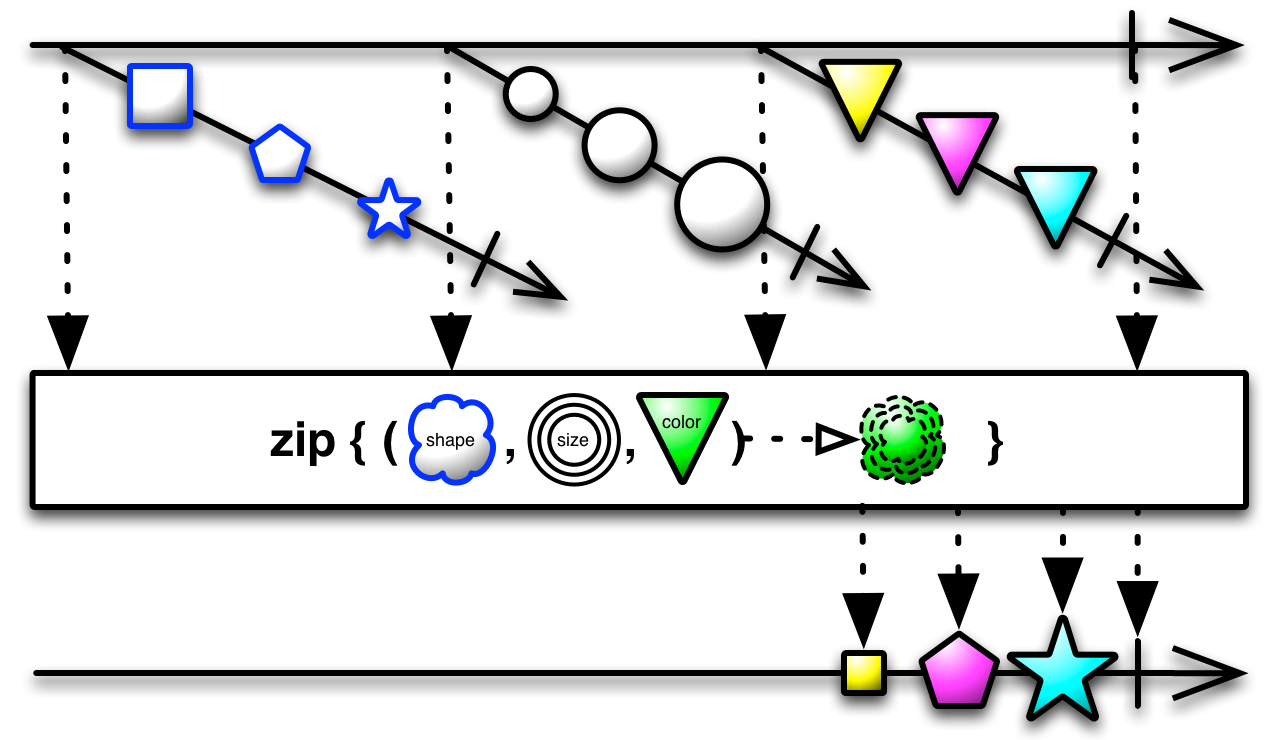
- Scheduler:
zipdoes not operate by default on a particularScheduler.
Parameters
| sources | an ObservableSource of source ObservableSources |
|---|---|
| zipper | a function that, when applied to an item emitted by each of the ObservableSources emitted by
ws, results in an item that will be emitted by the resulting ObservableSource |
Returns
- an Observable that emits the zipped results
public static Observable<R> zip (ObservableSource<? extends T1> source1, ObservableSource<? extends T2> source2, BiFunction<? super T1, ? super T2, ? extends R> zipper, boolean delayError, int bufferSize)
Returns an Observable that emits the results of a specified combiner function applied to combinations of two items emitted, in sequence, by two other ObservableSources.

zip applies this function in strict sequence, so the first item emitted by the new ObservableSource
will be the result of the function applied to the first item emitted by o1 and the first item
emitted by o2; the second item emitted by the new ObservableSource will be the result of the function
applied to the second item emitted by o1 and the second item emitted by o2; and so forth.
The resulting ObservableSource<R> returned from zip will invoke onNext
as many times as the number of onNext invocations of the source ObservableSource that emits the fewest
items.
The operator subscribes to its sources in order they are specified and completes eagerly if
one of the sources is shorter than the rest while disposing the other sources. Therefore, it
is possible those other sources will never be able to run to completion (and thus not calling
doOnComplete()). This can also happen if the sources are exactly the same length; if
source A completes and B has been consumed and is about to complete, the operator detects A won't
be sending further values and it will dispose B immediately. For example:
zip(range(1, 5).doOnComplete(action1), range(6, 5).doOnComplete(action2), (a, b) -> a + b)action1 will be called but action2 won't.
To work around this termination property, use
doOnDispose(Action) as well or use using() to do cleanup in case of completion
or a dispose() call.
- Scheduler:
zipdoes not operate by default on a particularScheduler.
Parameters
| source1 | the first source ObservableSource |
|---|---|
| source2 | a second source ObservableSource |
| zipper | a function that, when applied to an item emitted by each of the source ObservableSources, results in an item that will be emitted by the resulting ObservableSource |
| delayError | delay errors from any of the source ObservableSources till the other terminates |
| bufferSize | the number of elements to prefetch from each source ObservableSource |
Returns
- an Observable that emits the zipped results
public static Observable<R> zip (ObservableSource<? extends T1> source1, ObservableSource<? extends T2> source2, ObservableSource<? extends T3> source3, Function3<? super T1, ? super T2, ? super T3, ? extends R> zipper)
Returns an Observable that emits the results of a specified combiner function applied to combinations of three items emitted, in sequence, by three other ObservableSources.

zip applies this function in strict sequence, so the first item emitted by the new ObservableSource
will be the result of the function applied to the first item emitted by o1, the first item
emitted by o2, and the first item emitted by o3; the second item emitted by the new
ObservableSource will be the result of the function applied to the second item emitted by o1, the
second item emitted by o2, and the second item emitted by o3; and so forth.
The resulting ObservableSource<R> returned from zip will invoke onNext
as many times as the number of onNext invocations of the source ObservableSource that emits the fewest
items.
The operator subscribes to its sources in order they are specified and completes eagerly if
one of the sources is shorter than the rest while disposing the other sources. Therefore, it
is possible those other sources will never be able to run to completion (and thus not calling
doOnComplete()). This can also happen if the sources are exactly the same length; if
source A completes and B has been consumed and is about to complete, the operator detects A won't
be sending further values and it will dispose B immediately. For example:
zip(range(1, 5).doOnComplete(action1), range(6, 5).doOnComplete(action2), ..., (a, b, c) -> a + b)action1 will be called but action2 won't.
To work around this termination property, use
doOnDispose(Action) as well or use using() to do cleanup in case of completion
or a dispose() call.
- Scheduler:
zipdoes not operate by default on a particularScheduler.
Parameters
| source1 | the first source ObservableSource |
|---|---|
| source2 | a second source ObservableSource |
| source3 | a third source ObservableSource |
| zipper | a function that, when applied to an item emitted by each of the source ObservableSources, results in an item that will be emitted by the resulting ObservableSource |
Returns
- an Observable that emits the zipped results
public static Observable<R> zip (ObservableSource<? extends T1> source1, ObservableSource<? extends T2> source2, BiFunction<? super T1, ? super T2, ? extends R> zipper, boolean delayError)
Returns an Observable that emits the results of a specified combiner function applied to combinations of two items emitted, in sequence, by two other ObservableSources.

zip applies this function in strict sequence, so the first item emitted by the new ObservableSource
will be the result of the function applied to the first item emitted by o1 and the first item
emitted by o2; the second item emitted by the new ObservableSource will be the result of the function
applied to the second item emitted by o1 and the second item emitted by o2; and so forth.
The resulting ObservableSource<R> returned from zip will invoke onNext
as many times as the number of onNext invocations of the source ObservableSource that emits the fewest
items.
The operator subscribes to its sources in order they are specified and completes eagerly if
one of the sources is shorter than the rest while disposing the other sources. Therefore, it
is possible those other sources will never be able to run to completion (and thus not calling
doOnComplete()). This can also happen if the sources are exactly the same length; if
source A completes and B has been consumed and is about to complete, the operator detects A won't
be sending further values and it will dispose B immediately. For example:
zip(range(1, 5).doOnComplete(action1), range(6, 5).doOnComplete(action2), (a, b) -> a + b)action1 will be called but action2 won't.
To work around this termination property, use
doOnDispose(Action) as well or use using() to do cleanup in case of completion
or a dispose() call.
- Scheduler:
zipdoes not operate by default on a particularScheduler.
Parameters
| source1 | the first source ObservableSource |
|---|---|
| source2 | a second source ObservableSource |
| zipper | a function that, when applied to an item emitted by each of the source ObservableSources, results in an item that will be emitted by the resulting ObservableSource |
| delayError | delay errors from any of the source ObservableSources till the other terminates |
Returns
- an Observable that emits the zipped results
public static Observable<R> zip (Iterable<? extends ObservableSource<? extends T>> sources, Function<? super Object[], ? extends R> zipper)
Returns an Observable that emits the results of a specified combiner function applied to combinations of items emitted, in sequence, by an Iterable of other ObservableSources.
zip applies this function in strict sequence, so the first item emitted by the new ObservableSource
will be the result of the function applied to the first item emitted by each of the source ObservableSources;
the second item emitted by the new ObservableSource will be the result of the function applied to the second
item emitted by each of those ObservableSources; and so forth.
The resulting ObservableSource<R> returned from zip will invoke onNext as many times as
the number of onNext invocations of the source ObservableSource that emits the fewest items.
The operator subscribes to its sources in order they are specified and completes eagerly if
one of the sources is shorter than the rest while disposing the other sources. Therefore, it
is possible those other sources will never be able to run to completion (and thus not calling
doOnComplete()). This can also happen if the sources are exactly the same length; if
source A completes and B has been consumed and is about to complete, the operator detects A won't
be sending further values and it will dispose B immediately. For example:
zip(Arrays.asList(range(1, 5).doOnComplete(action1), range(6, 5).doOnComplete(action2)), (a) -> a)action1 will be called but action2 won't.
To work around this termination property, use
doOnDispose(Action) as well or use using() to do cleanup in case of completion
or a dispose() call.
Note on method signature: since Java doesn't allow creating a generic array with new T[], the
implementation of this operator has to create an Object[] instead. Unfortunately, a
Function<Integer[], R> passed to the method would trigger a ClassCastException.

- Scheduler:
zipdoes not operate by default on a particularScheduler.
Parameters
| sources | an Iterable of source ObservableSources |
|---|---|
| zipper | a function that, when applied to an item emitted by each of the source ObservableSources, results in an item that will be emitted by the resulting ObservableSource |
Returns
- an Observable that emits the zipped results
public static Observable<R> zip (ObservableSource<? extends T1> source1, ObservableSource<? extends T2> source2, ObservableSource<? extends T3> source3, ObservableSource<? extends T4> source4, ObservableSource<? extends T5> source5, Function5<? super T1, ? super T2, ? super T3, ? super T4, ? super T5, ? extends R> zipper)
Returns an Observable that emits the results of a specified combiner function applied to combinations of five items emitted, in sequence, by five other ObservableSources.

zip applies this function in strict sequence, so the first item emitted by the new ObservableSource
will be the result of the function applied to the first item emitted by o1, the first item
emitted by o2, the first item emitted by o3, the first item emitted by o4, and
the first item emitted by o5; the second item emitted by the new ObservableSource will be the result of
the function applied to the second item emitted by each of those ObservableSources; and so forth.
The resulting ObservableSource<R> returned from zip will invoke onNext
as many times as the number of onNext invocations of the source ObservableSource that emits the fewest
items.
The operator subscribes to its sources in order they are specified and completes eagerly if
one of the sources is shorter than the rest while disposing the other sources. Therefore, it
is possible those other sources will never be able to run to completion (and thus not calling
doOnComplete()). This can also happen if the sources are exactly the same length; if
source A completes and B has been consumed and is about to complete, the operator detects A won't
be sending further values and it will dispose B immediately. For example:
zip(range(1, 5).doOnComplete(action1), range(6, 5).doOnComplete(action2), ..., (a, b, c, d, e) -> a + b)action1 will be called but action2 won't.
To work around this termination property, use
doOnDispose(Action) as well or use using() to do cleanup in case of completion
or a dispose() call.
- Scheduler:
zipdoes not operate by default on a particularScheduler.
Parameters
| source1 | the first source ObservableSource |
|---|---|
| source2 | a second source ObservableSource |
| source3 | a third source ObservableSource |
| source4 | a fourth source ObservableSource |
| source5 | a fifth source ObservableSource |
| zipper | a function that, when applied to an item emitted by each of the source ObservableSources, results in an item that will be emitted by the resulting ObservableSource |
Returns
- an Observable that emits the zipped results
public static Observable<R> zip (ObservableSource<? extends T1> source1, ObservableSource<? extends T2> source2, BiFunction<? super T1, ? super T2, ? extends R> zipper)
Returns an Observable that emits the results of a specified combiner function applied to combinations of two items emitted, in sequence, by two other ObservableSources.

zip applies this function in strict sequence, so the first item emitted by the new ObservableSource
will be the result of the function applied to the first item emitted by o1 and the first item
emitted by o2; the second item emitted by the new ObservableSource will be the result of the function
applied to the second item emitted by o1 and the second item emitted by o2; and so forth.
The resulting ObservableSource<R> returned from zip will invoke onNext
as many times as the number of onNext invocations of the source ObservableSource that emits the fewest
items.
The operator subscribes to its sources in order they are specified and completes eagerly if
one of the sources is shorter than the rest while disposing the other sources. Therefore, it
is possible those other sources will never be able to run to completion (and thus not calling
doOnComplete()). This can also happen if the sources are exactly the same length; if
source A completes and B has been consumed and is about to complete, the operator detects A won't
be sending further values and it will dispose B immediately. For example:
zip(range(1, 5).doOnComplete(action1), range(6, 5).doOnComplete(action2), (a, b) -> a + b)action1 will be called but action2 won't.
To work around this termination property, use
doOnDispose(Action) as well or use using() to do cleanup in case of completion
or a dispose() call.
- Scheduler:
zipdoes not operate by default on a particularScheduler.
Parameters
| source1 | the first source ObservableSource |
|---|---|
| source2 | a second source ObservableSource |
| zipper | a function that, when applied to an item emitted by each of the source ObservableSources, results in an item that will be emitted by the resulting ObservableSource |
Returns
- an Observable that emits the zipped results
public static Observable<R> zip (ObservableSource<? extends T1> source1, ObservableSource<? extends T2> source2, ObservableSource<? extends T3> source3, ObservableSource<? extends T4> source4, Function4<? super T1, ? super T2, ? super T3, ? super T4, ? extends R> zipper)
Returns an Observable that emits the results of a specified combiner function applied to combinations of four items emitted, in sequence, by four other ObservableSources.

zip applies this function in strict sequence, so the first item emitted by the new ObservableSource
will be the result of the function applied to the first item emitted by o1, the first item
emitted by o2, the first item emitted by o3, and the first item emitted by 04;
the second item emitted by the new ObservableSource will be the result of the function applied to the second
item emitted by each of those ObservableSources; and so forth.
The resulting ObservableSource<R> returned from zip will invoke onNext
as many times as the number of onNext invocations of the source ObservableSource that emits the fewest
items.
The operator subscribes to its sources in order they are specified and completes eagerly if
one of the sources is shorter than the rest while disposing the other sources. Therefore, it
is possible those other sources will never be able to run to completion (and thus not calling
doOnComplete()). This can also happen if the sources are exactly the same length; if
source A completes and B has been consumed and is about to complete, the operator detects A won't
be sending further values and it will dispose B immediately. For example:
zip(range(1, 5).doOnComplete(action1), range(6, 5).doOnComplete(action2), ..., (a, b, c, d) -> a + b)action1 will be called but action2 won't.
To work around this termination property, use
doOnDispose(Action) as well or use using() to do cleanup in case of completion
or a dispose() call.
- Scheduler:
zipdoes not operate by default on a particularScheduler.
Parameters
| source1 | the first source ObservableSource |
|---|---|
| source2 | a second source ObservableSource |
| source3 | a third source ObservableSource |
| source4 | a fourth source ObservableSource |
| zipper | a function that, when applied to an item emitted by each of the source ObservableSources, results in an item that will be emitted by the resulting ObservableSource |
Returns
- an Observable that emits the zipped results
public static Observable<R> zip (ObservableSource<? extends T1> source1, ObservableSource<? extends T2> source2, ObservableSource<? extends T3> source3, ObservableSource<? extends T4> source4, ObservableSource<? extends T5> source5, ObservableSource<? extends T6> source6, Function6<? super T1, ? super T2, ? super T3, ? super T4, ? super T5, ? super T6, ? extends R> zipper)
Returns an Observable that emits the results of a specified combiner function applied to combinations of six items emitted, in sequence, by six other ObservableSources.

zip applies this function in strict sequence, so the first item emitted by the new ObservableSource
will be the result of the function applied to the first item emitted by each source ObservableSource, the
second item emitted by the new ObservableSource will be the result of the function applied to the second item
emitted by each of those ObservableSources, and so forth.
The resulting ObservableSource<R> returned from zip will invoke onNext
as many times as the number of onNext invocations of the source ObservableSource that emits the fewest
items.
The operator subscribes to its sources in order they are specified and completes eagerly if
one of the sources is shorter than the rest while disposing the other sources. Therefore, it
is possible those other sources will never be able to run to completion (and thus not calling
doOnComplete()). This can also happen if the sources are exactly the same length; if
source A completes and B has been consumed and is about to complete, the operator detects A won't
be sending further values and it will dispose B immediately. For example:
zip(range(1, 5).doOnComplete(action1), range(6, 5).doOnComplete(action2), ..., (a, b, c, d, e, f) -> a + b)action1 will be called but action2 won't.
To work around this termination property, use
doOnDispose(Action) as well or use using() to do cleanup in case of completion
or a dispose() call.
- Scheduler:
zipdoes not operate by default on a particularScheduler.
Parameters
| source1 | the first source ObservableSource |
|---|---|
| source2 | a second source ObservableSource |
| source3 | a third source ObservableSource |
| source4 | a fourth source ObservableSource |
| source5 | a fifth source ObservableSource |
| source6 | a sixth source ObservableSource |
| zipper | a function that, when applied to an item emitted by each of the source ObservableSources, results in an item that will be emitted by the resulting ObservableSource |
Returns
- an Observable that emits the zipped results
public static Observable<R> zip (ObservableSource<? extends T1> source1, ObservableSource<? extends T2> source2, ObservableSource<? extends T3> source3, ObservableSource<? extends T4> source4, ObservableSource<? extends T5> source5, ObservableSource<? extends T6> source6, ObservableSource<? extends T7> source7, ObservableSource<? extends T8> source8, Function8<? super T1, ? super T2, ? super T3, ? super T4, ? super T5, ? super T6, ? super T7, ? super T8, ? extends R> zipper)
Returns an Observable that emits the results of a specified combiner function applied to combinations of eight items emitted, in sequence, by eight other ObservableSources.

zip applies this function in strict sequence, so the first item emitted by the new ObservableSource
will be the result of the function applied to the first item emitted by each source ObservableSource, the
second item emitted by the new ObservableSource will be the result of the function applied to the second item
emitted by each of those ObservableSources, and so forth.
The resulting ObservableSource<R> returned from zip will invoke onNext
as many times as the number of onNext invocations of the source ObservableSource that emits the fewest
items.
The operator subscribes to its sources in order they are specified and completes eagerly if
one of the sources is shorter than the rest while disposing the other sources. Therefore, it
is possible those other sources will never be able to run to completion (and thus not calling
doOnComplete()). This can also happen if the sources are exactly the same length; if
source A completes and B has been consumed and is about to complete, the operator detects A won't
be sending further values and it will dispose B immediately. For example:
zip(range(1, 5).doOnComplete(action1), range(6, 5).doOnComplete(action2), ..., (a, b, c, d, e, f, g, h) -> a + b)action1 will be called but action2 won't.
To work around this termination property, use
doOnDispose(Action) as well or use using() to do cleanup in case of completion
or a dispose() call.
- Scheduler:
zipdoes not operate by default on a particularScheduler.
Parameters
| source1 | the first source ObservableSource |
|---|---|
| source2 | a second source ObservableSource |
| source3 | a third source ObservableSource |
| source4 | a fourth source ObservableSource |
| source5 | a fifth source ObservableSource |
| source6 | a sixth source ObservableSource |
| source7 | a seventh source ObservableSource |
| source8 | an eighth source ObservableSource |
| zipper | a function that, when applied to an item emitted by each of the source ObservableSources, results in an item that will be emitted by the resulting ObservableSource |
Returns
- an Observable that emits the zipped results
public static Observable<R> zip (ObservableSource<? extends T1> source1, ObservableSource<? extends T2> source2, ObservableSource<? extends T3> source3, ObservableSource<? extends T4> source4, ObservableSource<? extends T5> source5, ObservableSource<? extends T6> source6, ObservableSource<? extends T7> source7, ObservableSource<? extends T8> source8, ObservableSource<? extends T9> source9, Function9<? super T1, ? super T2, ? super T3, ? super T4, ? super T5, ? super T6, ? super T7, ? super T8, ? super T9, ? extends R> zipper)
Returns an Observable that emits the results of a specified combiner function applied to combinations of nine items emitted, in sequence, by nine other ObservableSources.

zip applies this function in strict sequence, so the first item emitted by the new ObservableSource
will be the result of the function applied to the first item emitted by each source ObservableSource, the
second item emitted by the new ObservableSource will be the result of the function applied to the second item
emitted by each of those ObservableSources, and so forth.
The resulting ObservableSource<R> returned from zip will invoke onNext
as many times as the number of onNext invocations of the source ObservableSource that emits the fewest
items.
The operator subscribes to its sources in order they are specified and completes eagerly if
one of the sources is shorter than the rest while disposing the other sources. Therefore, it
is possible those other sources will never be able to run to completion (and thus not calling
doOnComplete()). This can also happen if the sources are exactly the same length; if
source A completes and B has been consumed and is about to complete, the operator detects A won't
be sending further values and it will dispose B immediately. For example:
zip(range(1, 5).doOnComplete(action1), range(6, 5).doOnComplete(action2), ..., (a, b, c, d, e, f, g, h, i) -> a + b)action1 will be called but action2 won't.
To work around this termination property, use
doOnDispose(Action) as well or use using() to do cleanup in case of completion
or a dispose() call.
- Scheduler:
zipdoes not operate by default on a particularScheduler.
Parameters
| source1 | the first source ObservableSource |
|---|---|
| source2 | a second source ObservableSource |
| source3 | a third source ObservableSource |
| source4 | a fourth source ObservableSource |
| source5 | a fifth source ObservableSource |
| source6 | a sixth source ObservableSource |
| source7 | a seventh source ObservableSource |
| source8 | an eighth source ObservableSource |
| source9 | a ninth source ObservableSource |
| zipper | a function that, when applied to an item emitted by each of the source ObservableSources, results in an item that will be emitted by the resulting ObservableSource |
Returns
- an Observable that emits the zipped results
public static Observable<R> zipArray (Function<? super Object[], ? extends R> zipper, boolean delayError, int bufferSize, ObservableSource...<? extends T> sources)
Returns an Observable that emits the results of a specified combiner function applied to combinations of items emitted, in sequence, by an array of other ObservableSources.
zip applies this function in strict sequence, so the first item emitted by the new ObservableSource
will be the result of the function applied to the first item emitted by each of the source ObservableSources;
the second item emitted by the new ObservableSource will be the result of the function applied to the second
item emitted by each of those ObservableSources; and so forth.
The resulting ObservableSource<R> returned from zip will invoke onNext as many times as
the number of onNext invocations of the source ObservableSource that emits the fewest items.
The operator subscribes to its sources in order they are specified and completes eagerly if
one of the sources is shorter than the rest while disposing the other sources. Therefore, it
is possible those other sources will never be able to run to completion (and thus not calling
doOnComplete()). This can also happen if the sources are exactly the same length; if
source A completes and B has been consumed and is about to complete, the operator detects A won't
be sending further values and it will dispose B immediately. For example:
zip(new ObservableSource[]{range(1, 5).doOnComplete(action1), range(6, 5).doOnComplete(action2)}, (a) ->
a)action1 will be called but action2 won't.
To work around this termination property, use
doOnDispose(Action) as well or use using() to do cleanup in case of completion
or a dispose() call.
Note on method signature: since Java doesn't allow creating a generic array with new T[], the
implementation of this operator has to create an Object[] instead. Unfortunately, a
Function<Integer[], R> passed to the method would trigger a ClassCastException.
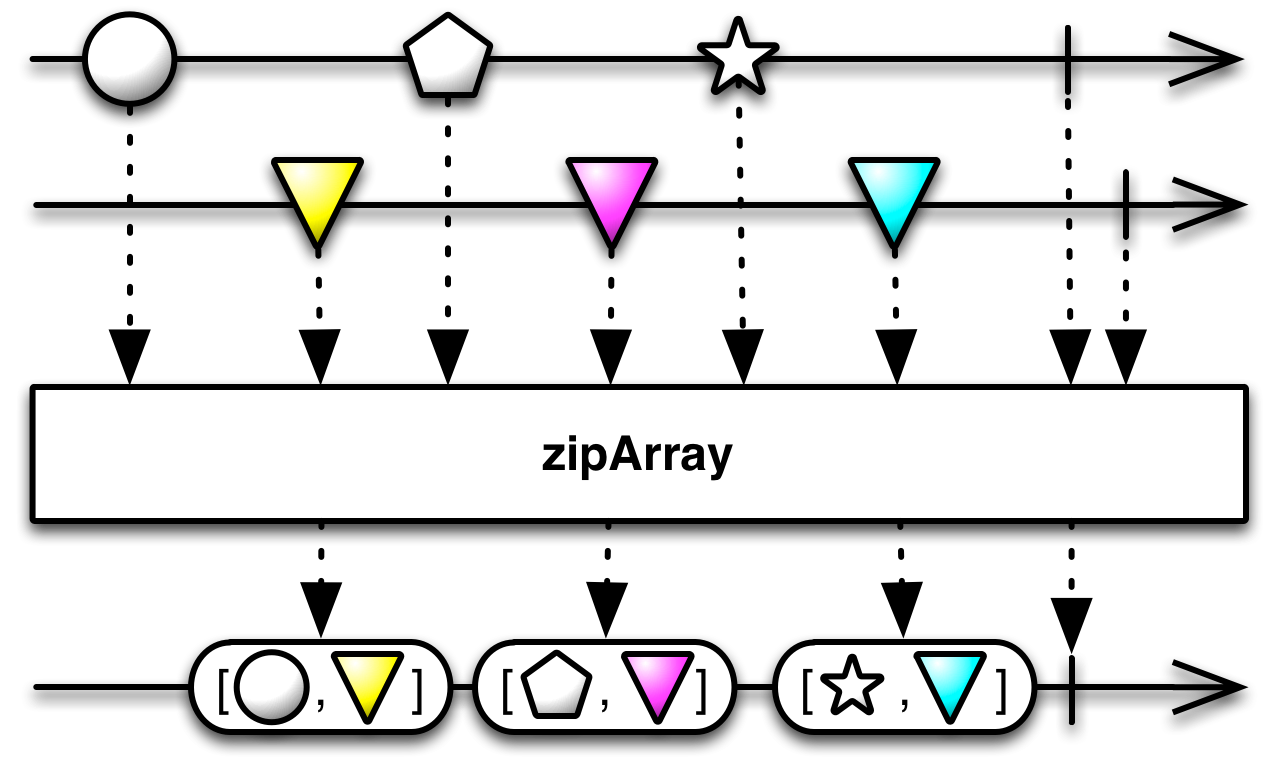
- Scheduler:
zipArraydoes not operate by default on a particularScheduler.
Parameters
| zipper | a function that, when applied to an item emitted by each of the source ObservableSources, results in an item that will be emitted by the resulting ObservableSource |
|---|---|
| delayError | delay errors signalled by any of the source ObservableSource until all ObservableSources terminate |
| bufferSize | the number of elements to prefetch from each source ObservableSource |
| sources | an array of source ObservableSources |
Returns
- an Observable that emits the zipped results
public static Observable<R> zipIterable (Iterable<? extends ObservableSource<? extends T>> sources, Function<? super Object[], ? extends R> zipper, boolean delayError, int bufferSize)
Returns an Observable that emits the results of a specified combiner function applied to combinations of items emitted, in sequence, by an Iterable of other ObservableSources.
zip applies this function in strict sequence, so the first item emitted by the new ObservableSource
will be the result of the function applied to the first item emitted by each of the source ObservableSources;
the second item emitted by the new ObservableSource will be the result of the function applied to the second
item emitted by each of those ObservableSources; and so forth.
The resulting ObservableSource<R> returned from zip will invoke onNext as many times as
the number of onNext invocations of the source ObservableSource that emits the fewest items.
The operator subscribes to its sources in order they are specified and completes eagerly if
one of the sources is shorter than the rest while disposing the other sources. Therefore, it
is possible those other sources will never be able to run to completion (and thus not calling
doOnComplete()). This can also happen if the sources are exactly the same length; if
source A completes and B has been consumed and is about to complete, the operator detects A won't
be sending further values and it will dispose B immediately. For example:
zip(Arrays.asList(range(1, 5).doOnComplete(action1), range(6, 5).doOnComplete(action2)), (a) -> a)action1 will be called but action2 won't.
To work around this termination property, use
doOnDispose(Action) as well or use using() to do cleanup in case of completion
or a dispose() call.
Note on method signature: since Java doesn't allow creating a generic array with new T[], the
implementation of this operator has to create an Object[] instead. Unfortunately, a
Function<Integer[], R> passed to the method would trigger a ClassCastException.

- Scheduler:
zipIterabledoes not operate by default on a particularScheduler.
Parameters
| sources | an Iterable of source ObservableSources |
|---|---|
| zipper | a function that, when applied to an item emitted by each of the source ObservableSources, results in an item that will be emitted by the resulting ObservableSource |
| delayError | delay errors signalled by any of the source ObservableSource until all ObservableSources terminate |
| bufferSize | the number of elements to prefetch from each source ObservableSource |
Returns
- an Observable that emits the zipped results
public final Observable<R> zipWith (ObservableSource<? extends U> other, BiFunction<? super T, ? super U, ? extends R> zipper)
Returns an Observable that emits items that are the result of applying a specified function to pairs of values, one each from the source ObservableSource and another specified ObservableSource.
The operator subscribes to its sources in order they are specified and completes eagerly if
one of the sources is shorter than the rest while disposing the other sources. Therefore, it
is possible those other sources will never be able to run to completion (and thus not calling
doOnComplete()). This can also happen if the sources are exactly the same length; if
source A completes and B has been consumed and is about to complete, the operator detects A won't
be sending further values and it will dispose B immediately. For example:
range(1, 5).doOnComplete(action1).zipWith(range(6, 5).doOnComplete(action2), (a, b) -> a + b)action1 will be called but action2 won't.
To work around this termination property, use
doOnDispose(Action) as well or use using() to do cleanup in case of completion
or a dispose() call.

- Scheduler:
zipWithdoes not operate by default on a particularScheduler.
Parameters
| other | the other ObservableSource |
|---|---|
| zipper | a function that combines the pairs of items from the two ObservableSources to generate the items to be emitted by the resulting ObservableSource |
Returns
- an Observable that pairs up values from the source ObservableSource and the
otherObservableSource and emits the results ofzipFunctionapplied to these pairs
public final Observable<R> zipWith (ObservableSource<? extends U> other, BiFunction<? super T, ? super U, ? extends R> zipper, boolean delayError)
Returns an Observable that emits items that are the result of applying a specified function to pairs of values, one each from the source ObservableSource and another specified ObservableSource.
The operator subscribes to its sources in order they are specified and completes eagerly if
one of the sources is shorter than the rest while disposing the other sources. Therefore, it
is possible those other sources will never be able to run to completion (and thus not calling
doOnComplete()). This can also happen if the sources are exactly the same length; if
source A completes and B has been consumed and is about to complete, the operator detects A won't
be sending further values and it will dispose B immediately. For example:
range(1, 5).doOnComplete(action1).zipWith(range(6, 5).doOnComplete(action2), (a, b) -> a + b)action1 will be called but action2 won't.
To work around this termination property, use
doOnDispose(Action) as well or use using() to do cleanup in case of completion
or a dispose() call.

- Scheduler:
zipWithdoes not operate by default on a particularScheduler.
Parameters
| other | the other ObservableSource |
|---|---|
| zipper | a function that combines the pairs of items from the two ObservableSources to generate the items to be emitted by the resulting ObservableSource |
| delayError | if true, errors from the current Observable or the other ObservableSource is delayed until both terminate |
Returns
- an Observable that pairs up values from the source ObservableSource and the
otherObservableSource and emits the results ofzipFunctionapplied to these pairs
public final Observable<R> zipWith (ObservableSource<? extends U> other, BiFunction<? super T, ? super U, ? extends R> zipper, boolean delayError, int bufferSize)
Returns an Observable that emits items that are the result of applying a specified function to pairs of values, one each from the source ObservableSource and another specified ObservableSource.
The operator subscribes to its sources in order they are specified and completes eagerly if
one of the sources is shorter than the rest while disposing the other sources. Therefore, it
is possible those other sources will never be able to run to completion (and thus not calling
doOnComplete()). This can also happen if the sources are exactly the same length; if
source A completes and B has been consumed and is about to complete, the operator detects A won't
be sending further values and it will dispose B immediately. For example:
range(1, 5).doOnComplete(action1).zipWith(range(6, 5).doOnComplete(action2), (a, b) -> a + b)action1 will be called but action2 won't.
To work around this termination property, use
doOnDispose(Action) as well or use using() to do cleanup in case of completion
or a dispose() call.

- Scheduler:
zipWithdoes not operate by default on a particularScheduler.
Parameters
| other | the other ObservableSource |
|---|---|
| zipper | a function that combines the pairs of items from the two ObservableSources to generate the items to be emitted by the resulting ObservableSource |
| delayError | if true, errors from the current Observable or the other ObservableSource is delayed until both terminate |
| bufferSize | the capacity hint for the buffer in the inner windows |
Returns
- an Observable that pairs up values from the source ObservableSource and the
otherObservableSource and emits the results ofzipFunctionapplied to these pairs
public final Observable<R> zipWith (Iterable<U> other, BiFunction<? super T, ? super U, ? extends R> zipper)
Returns an Observable that emits items that are the result of applying a specified function to pairs of values, one each from the source ObservableSource and a specified Iterable sequence.
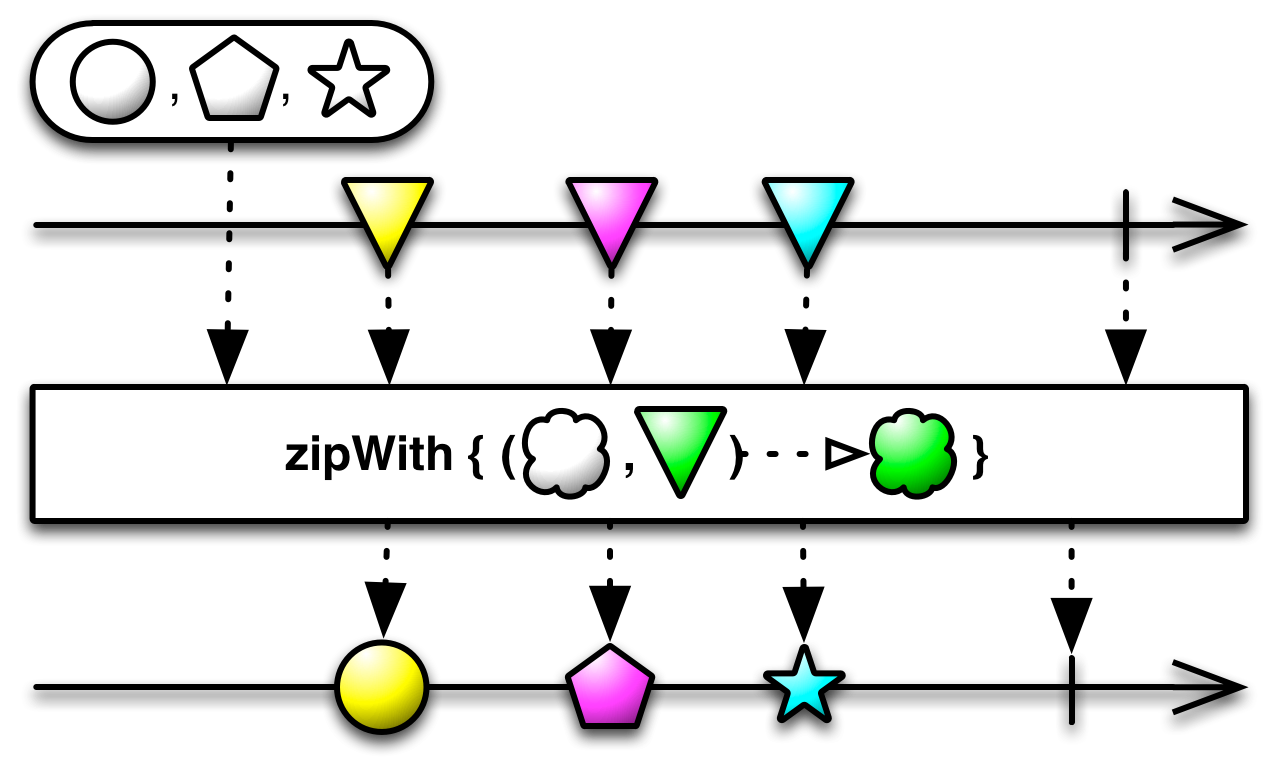
Note that the other Iterable is evaluated as items are observed from the source ObservableSource; it is
not pre-consumed. This allows you to zip infinite streams on either side.
- Scheduler:
zipWithdoes not operate by default on a particularScheduler.
Parameters
| other | the Iterable sequence |
|---|---|
| zipper | a function that combines the pairs of items from the ObservableSource and the Iterable to generate the items to be emitted by the resulting ObservableSource |
Returns
- an Observable that pairs up values from the source ObservableSource and the
otherIterable sequence and emits the results ofzipFunctionapplied to these pairs
Protected Methods
protected abstract void subscribeActual (Observer<? super T> observer)
Operator implementations (both source and intermediate) should implement this method that performs the necessary business logic.
There is no need to call any of the plugin hooks on the current Observable instance or the Subscriber.
Parameters
| observer | the incoming Observer, never null |
|---|
